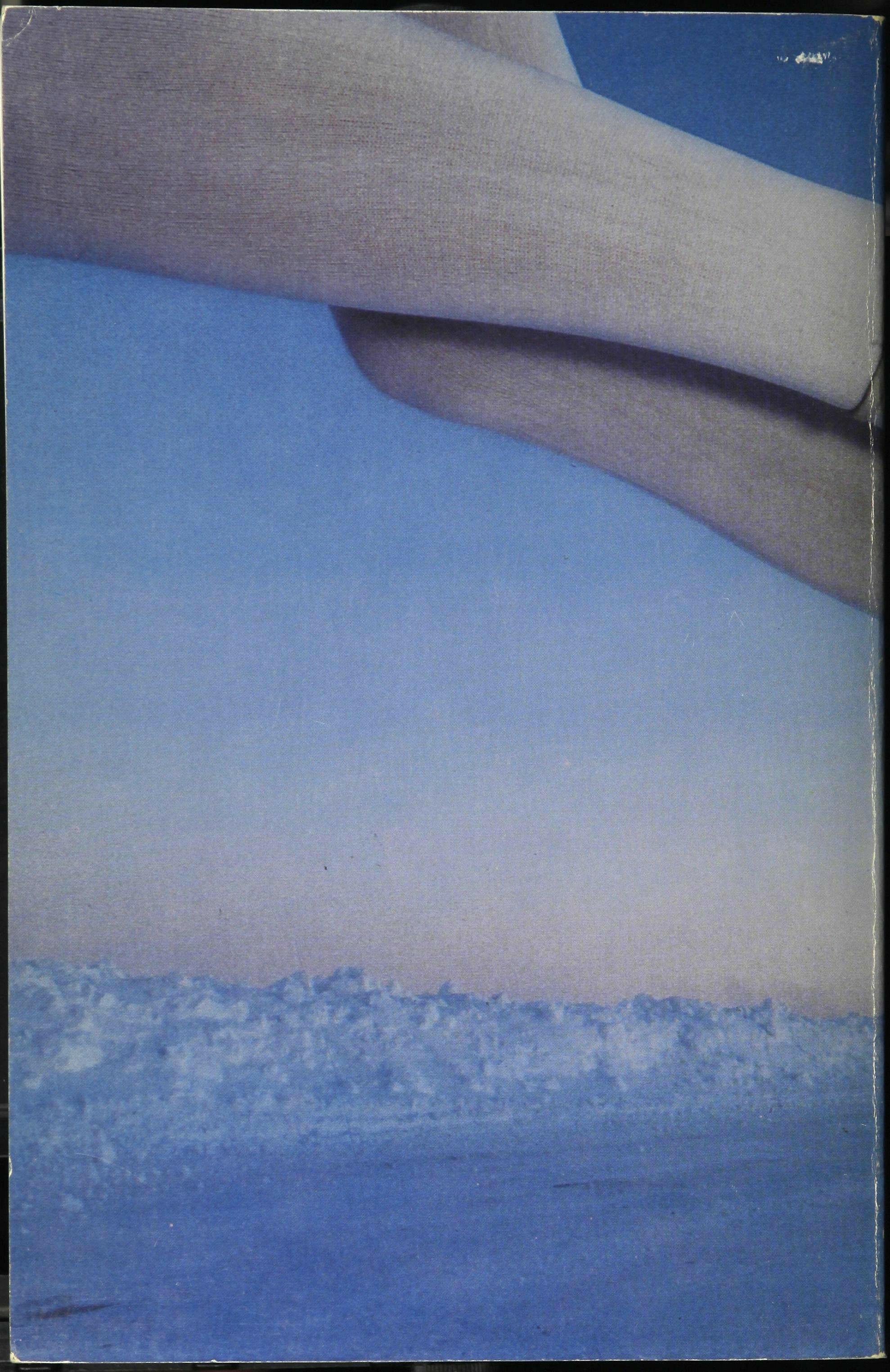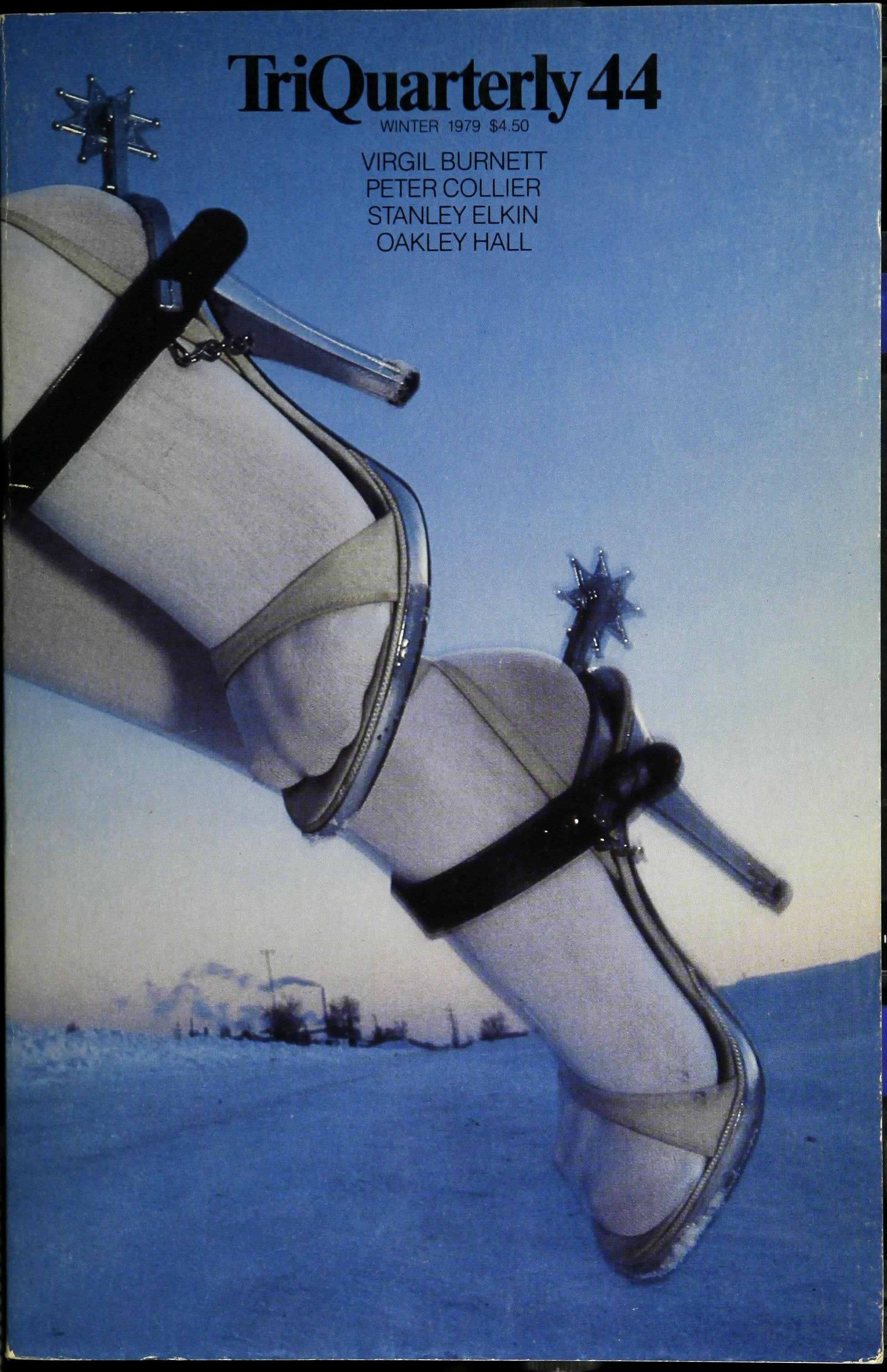
�50
lBtJRNETT A COLLIER
STANLEY ELKIN
OAKLEY HALL




�50


Editors':
Elliott Anderson, Robert Onopa
Art Director: Cynthia Anderson
Managing Editor: Michael McDonnell
Associate Editor: Anne-Marie Zwierzyna
Assistant Editors: Mariam Lease, Sylvia Martin, Mary Elinore Smith
Advisory Editors: Lawrence Levy, Charles Newman
Fulfillment:
Leigh Alexander, Judy Marrs, Mary M. Zakrasek
Contributing Editors:
Robert Alter, Michael Anania, Gerald Graff, John Hawkes, David Hayman, Bill Henderson, Joseph McElroy, Peter Michelson, Robert Ray, Tony Tanner, Nathaniel Tarn
TriQuarterly is an international journal of arts, letters, and opinion published in the fall, winter, and spring at Northwestern University, Evanston, Illinois 60201. Subscription rates: One year $12.00; two years $20.00; three years $30.00. Foreign subscriptions $1.00 per year additional. Single copies usually $4.50. Back issue prices on request. Contributions, correspondence, and subscriptions should be addressed to TriQuarterly, 1735 Benson Avenue, Northwestern University, Evanston, Illinois 60201. The editors invite submissions, but queries are strongly suggested. No manuscripts will be returned unless accompanied by a stamped. self-addressed envelope. All manuscripts accepted for publication become the property of TriQuarterly, unless otherwise indicated. Copyright © 1979 by TriQuarterly. All rights reserved. The views expressed in this magazine are to be attributed to the writers, not the editors or sponsors. Printed in the United States of America. Claims for missing numbers will be honored only within the four-month period after month of issue.
NATIONAL DISTRIBUTOR TO RETAIL TRADE: B. DEBOER, 188 HIGH STREET, NUTLEY, NEW JERSEY 07110. DISTRIBUTOR FOR WEST COAST TRADE: BOOK PEOPLE, 2940 7TH STREET, BERKELEY, CALIFORNIA 94710.
REPRINTS OF BACK ISSUES OF TriQuarterly ARE NOW AVAILABLE IN FULL FORMAT FROM KRAUS REPRINT COMPANY, ROUTE 100, MILLWOOD, NEW YORK 10546, AND IN MICROFORM FROM UMI, A XEROX COMPANY, ANN ARBOR, MICHIGAN 48106.
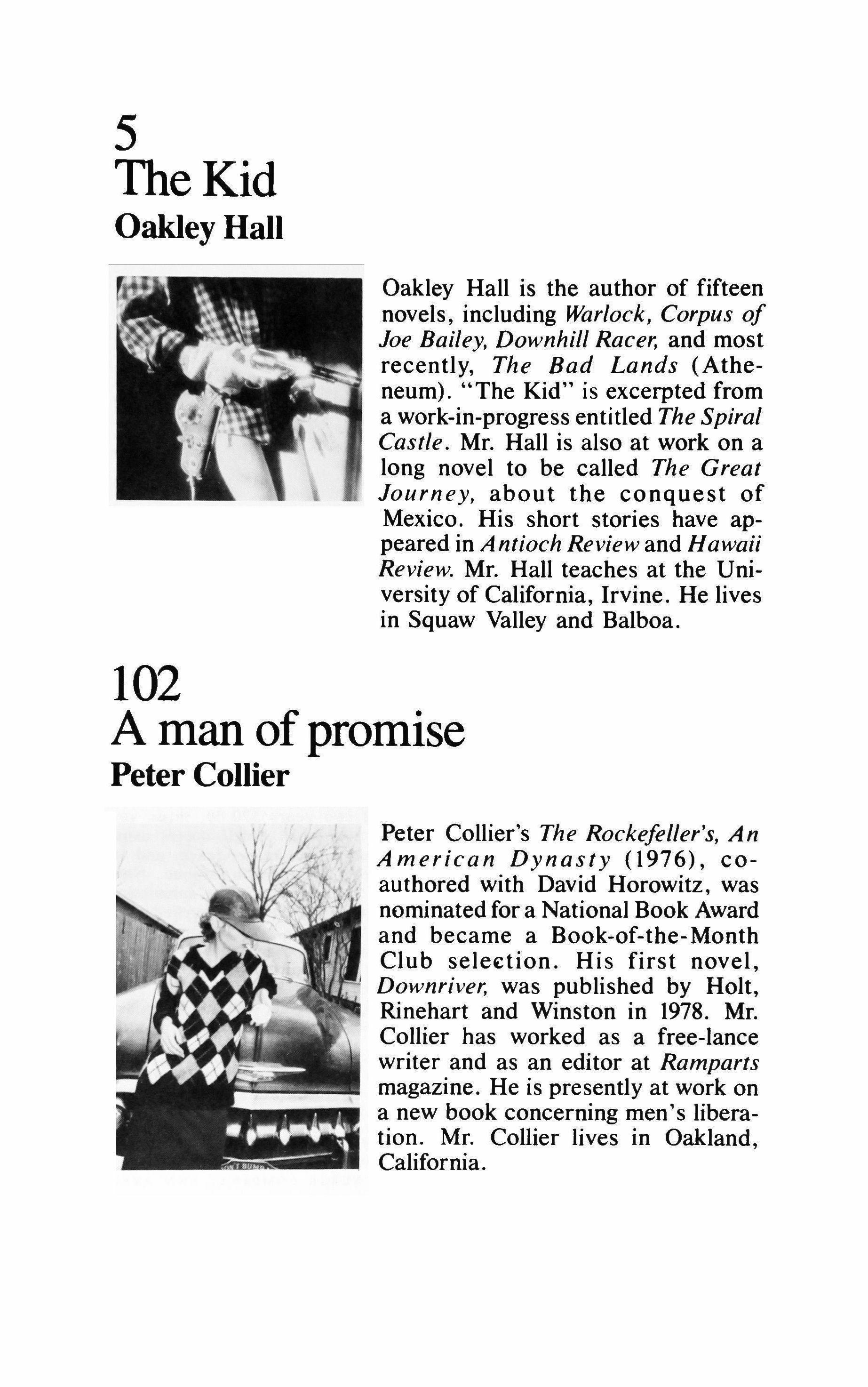
Oakley Hall is the author of fifteen novels, including Warlock, Corpus of Joe Bailey, Downhill Racer, and most recently, The Bad Lands (Atheneum). "The Kid" is excerpted from a work-in-progress entitled The Spiral Castle. Mr. Hall is also at work on a long novel to be called The Great Journey, about the conquest of Mexico. His short stories have appeared in Antioch Review and Hawaii Review. Mr. Hall teaches at the University of California, Irvine. He lives in Squaw Valley and Balboa.
Peter Collier's The Rockefeller's, An American Dynasty (1976), coauthored with David Horowitz, was nominated for a National Book Award and became a Book-of-the-Month Club selection. His first novel, Downriver, was published by Holt, Rinehart and Winston in 1978. Mr. Collier has worked as a free-lance writer and as an editor at Ramparts magazine. He is presently at work on a new book concerning men's liberation. Mr. Collier lives in Oakland, California.
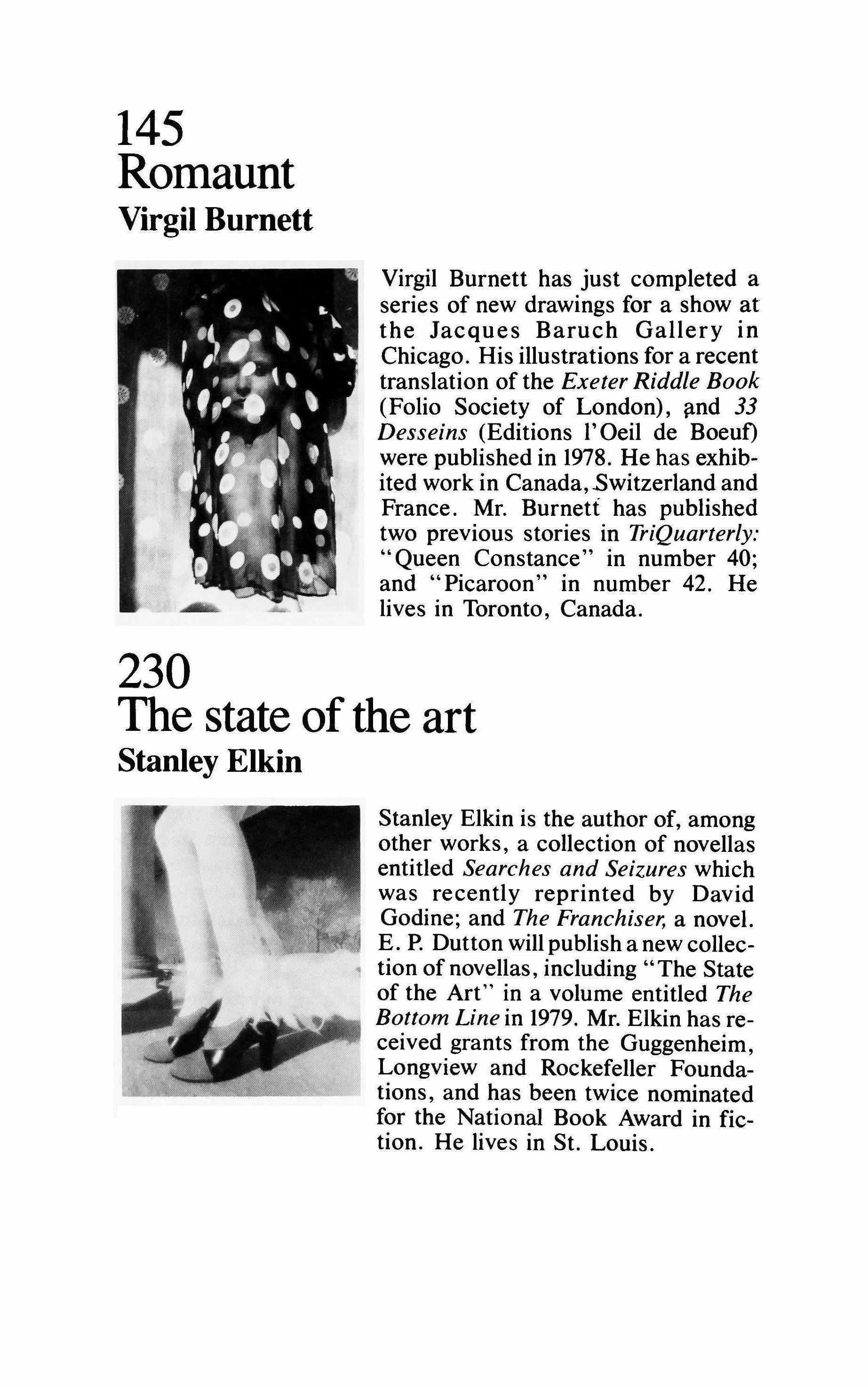
Virgil Burnett has just completed a series of new drawings for a show at the Jacques Baruch Gallery in Chicago. His illustrations for a recent translation of the Exeter Riddle Book (Folio Society of London), and 33 Desseins (Editions l'Oeil de Boeuf) were published in 1978. He has exhibited work in Canada, .Switzerland and France. Mr. Burnett has published two previous stories in TriQuarterly: "Queen Constance" in number 40; and "Picaroon" in number 42. He
lives in Toronto, Canada.
Stanley Elkin is the author of, among other works, a collection of novellas entitled Searches and Seizures which was recently reprinted by David Godine; and The Franchiser, a novel. E. P. Dutton will publish a new collec, tion of novellas, including"The State of the Art" in a volume entitled The Bottom Line in 1979. Mr. Elkin has received grants from the Guggenheim, Longview and Rockefeller Foundations, and has been twice nominated for the National Book Award in fiction. He lives in St. Louis.
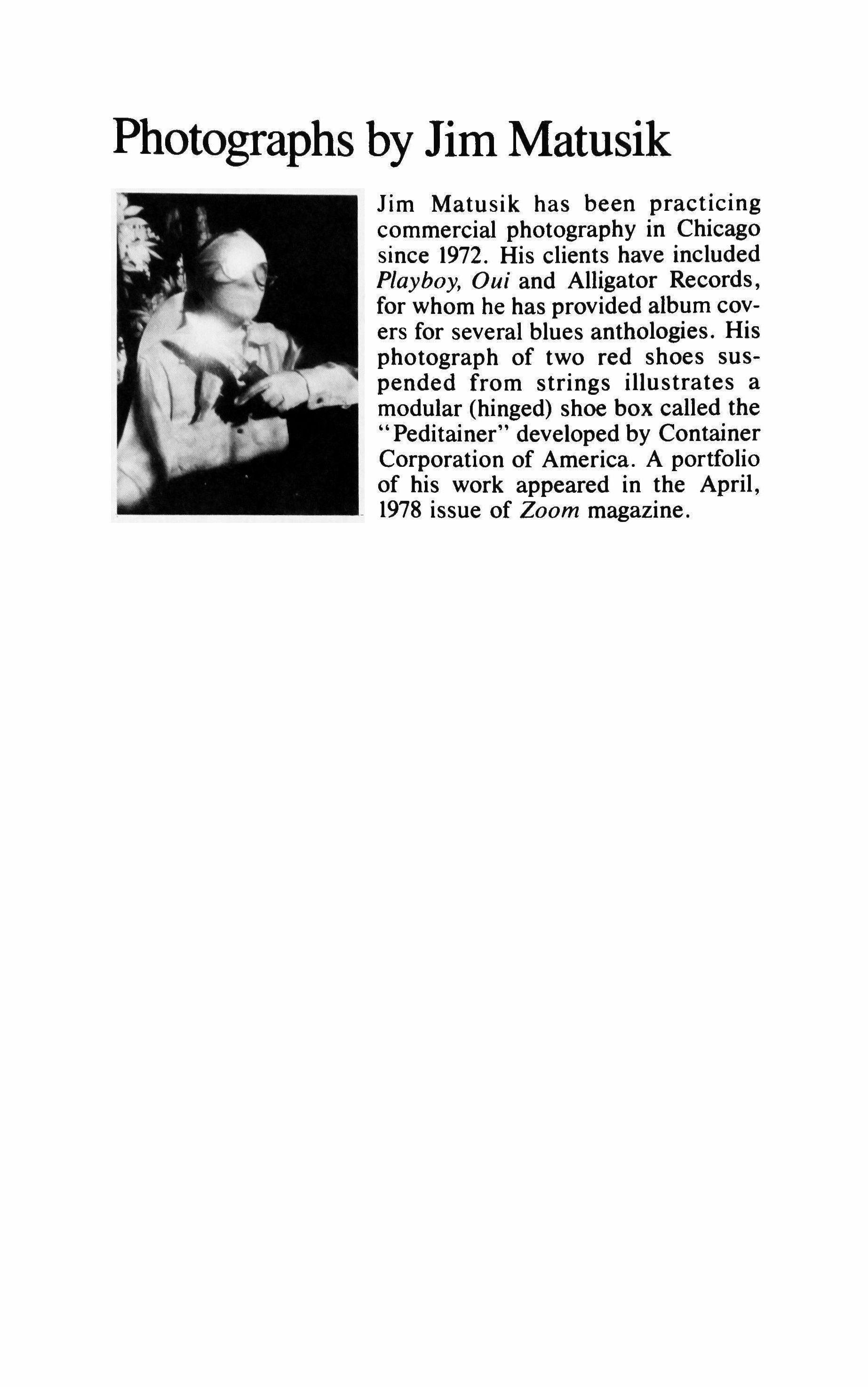
Jim Matusik has been practicing commercial photography in Chicago since 1972. His clients have included Playboy, Oui and Alligator Records, for whom he has provided album covers for several blues anthologies. His photograph of two red shoes suspended from strings illustrates a modular (hinged) shoe box called the "Peditainer" developed by Container Corporation of America. A portfolio of his work appeared in the April, 1978 issue of Zoom magazine.
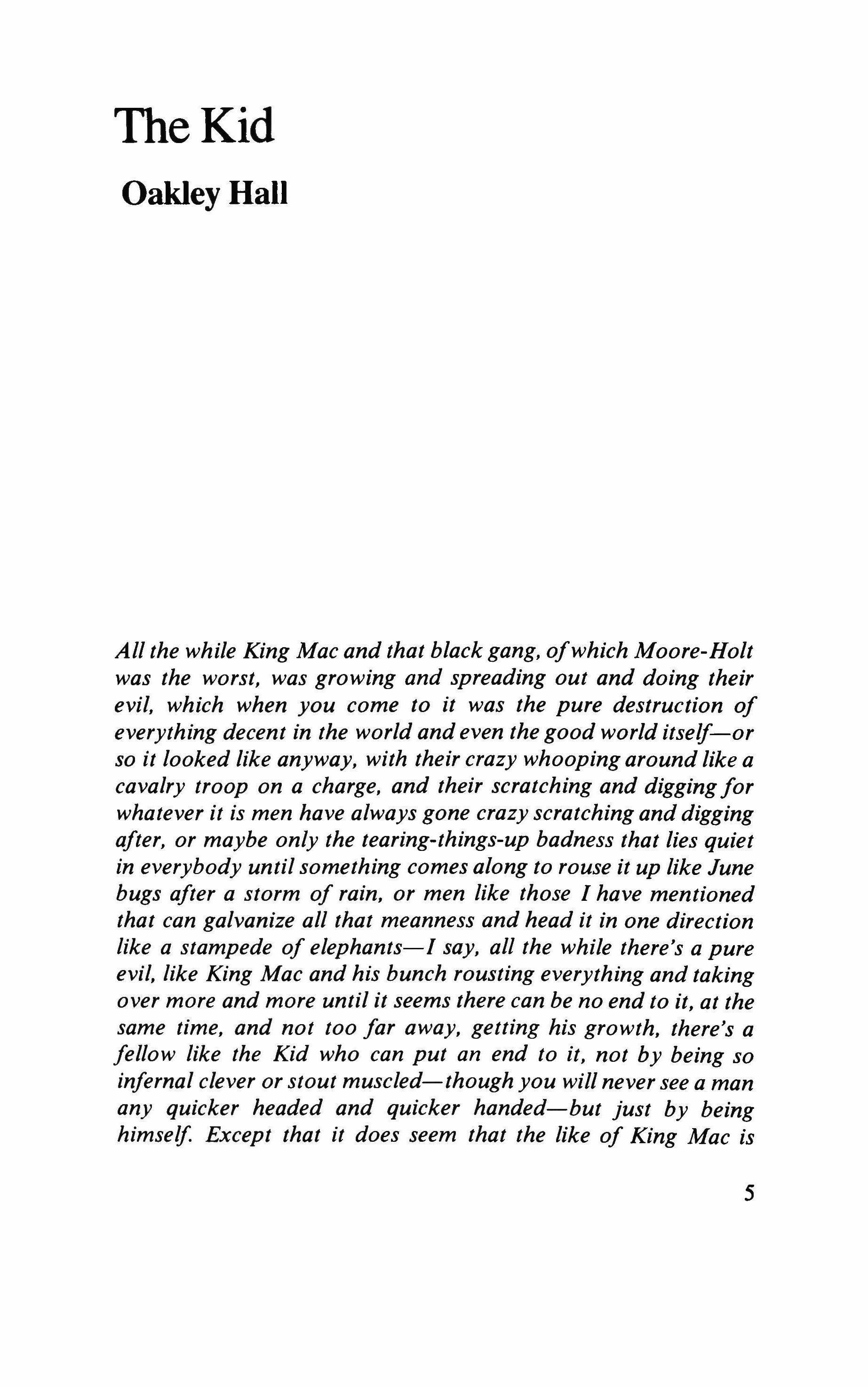
All the while King Mac and that black gang, ofwhich Moore-Holt was the worst, was growing and spreading out and doing their evil, which when you come to it was the pure destruction of everything decent in the world and even the good world itself-or so it looked like anyway, with their crazy whooping around like a cavalry troop on a charge, and their scratching and diggingfor whatever it is men have always gone crazy scratching and digging after, or maybe only the tearing-things-up badness that lies quiet in everybody until something comes along to rouse it up like June bugs after a storm of rain, or men like those I have mentioned that can galvanize all that meanness and head it in one direction like a stampede of elephants-l say, all the while there's a pure evil, like King Mac and his bunch rousting everything and taking over more and more until it seems there can be no end to it, at the same time, and not too far away, getting his growth, there's a fellow like the Kid who can put an end to it, not by being so infernal clever or stout muscled-though you will never see a man any quicker headed and quicker handed-but just by being himself. Except that it does seem that the like of King Mac is
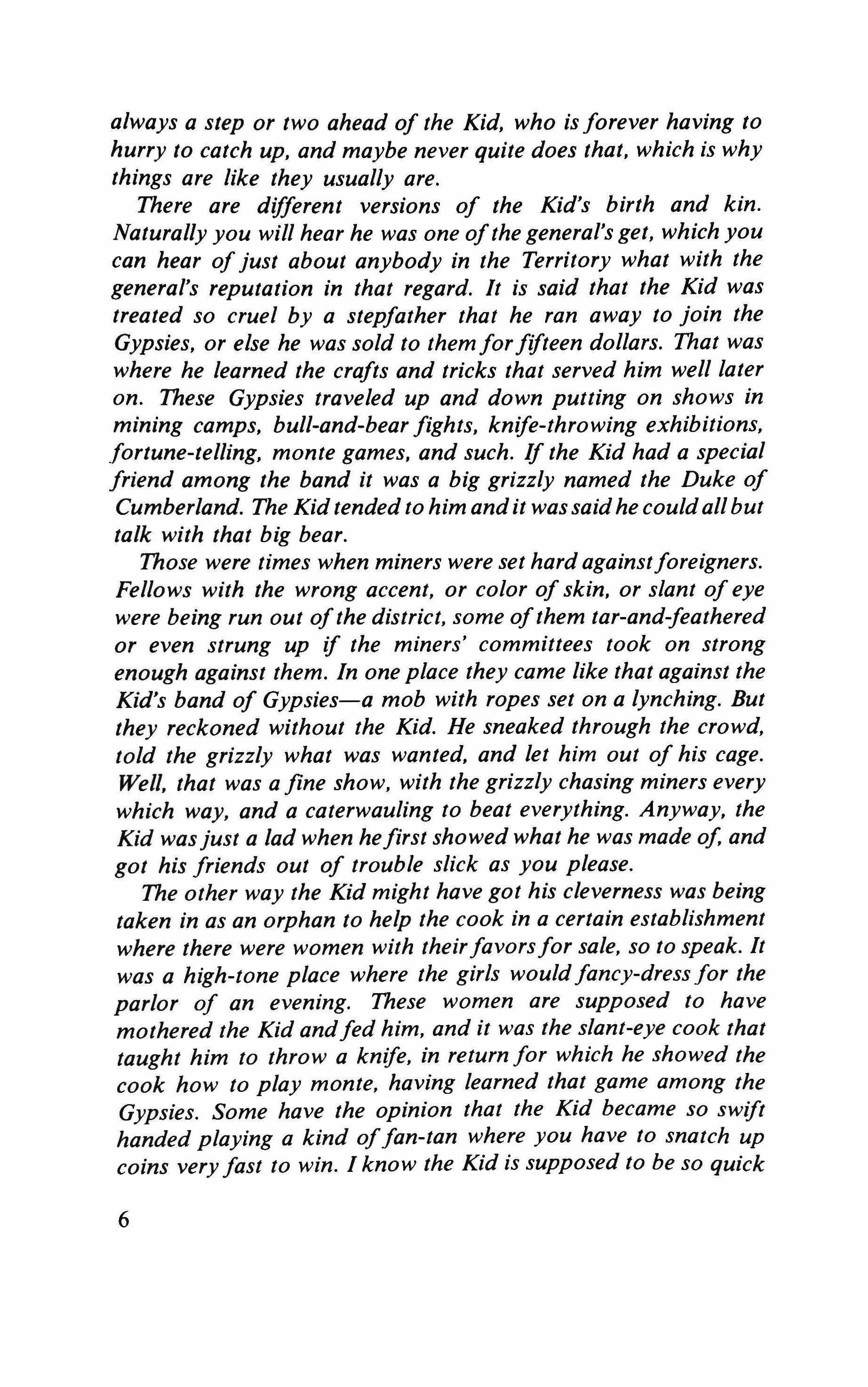
always a step or two ahead of the Kid, who is forever having to hurry to catch up, and maybe never quite does that, which is why things are like they usually are.
There are different versions of the Kid's birth and kin. Naturally you will hear he was one ofthe general's get, which you can hear ofjust about anybody in the Territory what with the general's reputation in that regard. It is said that the Kid was treated so cruel by a stepfather that he ran away to join the Gypsies, or else he was sold to them forfifteen dollars. That was where he learned the crafts and tricks that served him well later on. These Gypsies traveled up and down putting on shows in mining camps, bull-and-bear fights, knife-throwing exhibitions, fortune-telling, monte games, and such. If the Kid had a special friend among the band it was a big grizzly named the Duke of Cumberland. The Kid tended to him and it was said he couldallbut talk with that big bear.
Those were times when miners were set hard againstforeigners. Fellows with the wrong accent, or color of skin, or slant of eye were being run out ofthe district, some ofthem tar-and-feathered or even strung up if the miners' committees took on strong enough against them. In one place they came like that against the Kid's band of Gypsies-a mob with ropes set on a lynching. But they reckoned without the Kid. He sneaked through the crowd, told the grizzly what was wanted, and let him out of his cage. Well, that was a fine show, with the grizzly chasing miners every which way, and a caterwauling to beat everything. Anyway, the Kid was just a lad when hefirst showed what he was made of and got his friends out of trouble slick as you please.
The other way the Kid might have got his cleverness was being taken in as an orphan to help the cook in a certain establishment where there were women with theirfavorsfor sale, so to speak. It was a high-tone place where the girls wouldfancy-dressfor the parlor of an evening. These women are supposed to have mothered the Kid andfed him, and it was the slant-eye cook that taught him to throw a knife, in return for which he showed the cook how to play monte, having learned that game among the Gypsies. Some have the opinion that the Kid became so swift handed playing a kind offan-tan where you have to snatch up coins veryfast to win. I know the Kid is supposed to be so quick
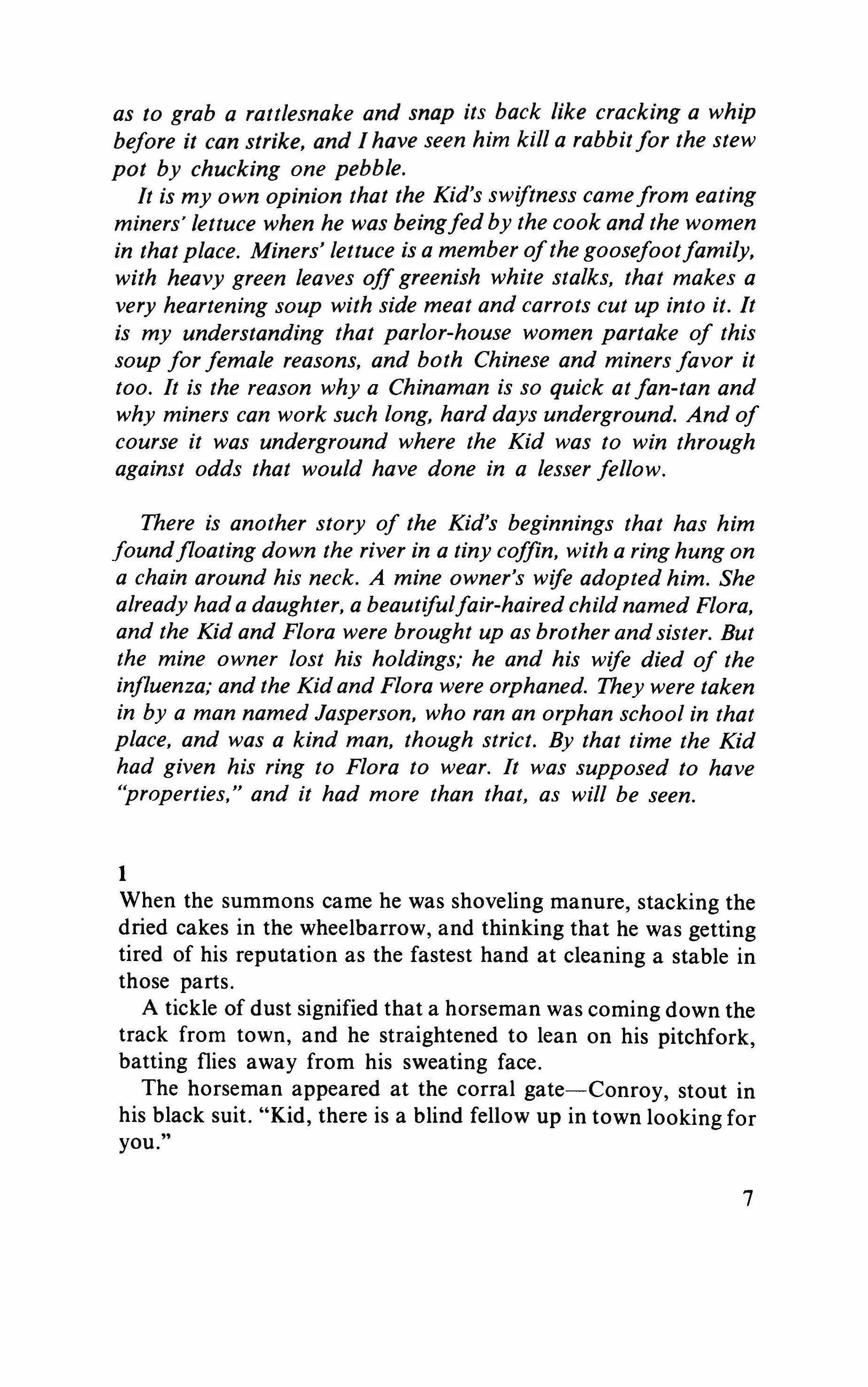
as to grab a rattlesnake and snap its back like cracking a whip before it can strike, and I have seen him kill a rabbitfor the stew pot by chucking one pebble.
It is my own opinion that the Kid's swiftness came from eating minerslettuce when he was beingfedby the cook and the women in that place. Miners' lettuce is a member ofthe goosefootfamily, with heavy green leaves offgreenish white stalks, that makes a very heartening soup with side meat and carrots cut up into it. It is my understanding that parlor-house women partake of this soup forfemale reasons, and both Chinese and miners favor it too. It is the reason why a Chinaman is so quick at fan-tan and why miners can work such long, hard days underground. And of course it was underground where the Kid was to win through against odds that would have done in a lesser fellow.
There is another story of the Kid's beginnings that has him foundfloating down the river in a tiny coffin, with a ring hung on a chain around his neck. A mine owner's wife adopted him. She already had a daughter, a beautifulfair-haired child named Flora, and the Kid and Flora were brought up as brother and sister. But the mine owner lost his holdings; he and his wife died of the influenza; and the Kid and Flora were orphaned. They were taken in by a man named Jasperson, who ran an orphan school in that place, and was a kind man, though strict. By that time the Kid had given his ring to Flora to wear. It was supposed to have "properties," and it had more than that, as will be seen.
1
When the summons came he was shoveling manure, stacking the dried cakes in the wheelbarrow, and thinking that he was getting tired of his reputation as the fastest hand at cleaning a stable in those parts.
A tickle of dust signified that a horseman was coming down the track from town, and he straightened to lean on his pitchfork, batting flies away from his sweating face.
The horseman appeared at the corral gate-Conroy, stout in his black suit. "Kid, there is a blind fellow up in town looking for you." 7
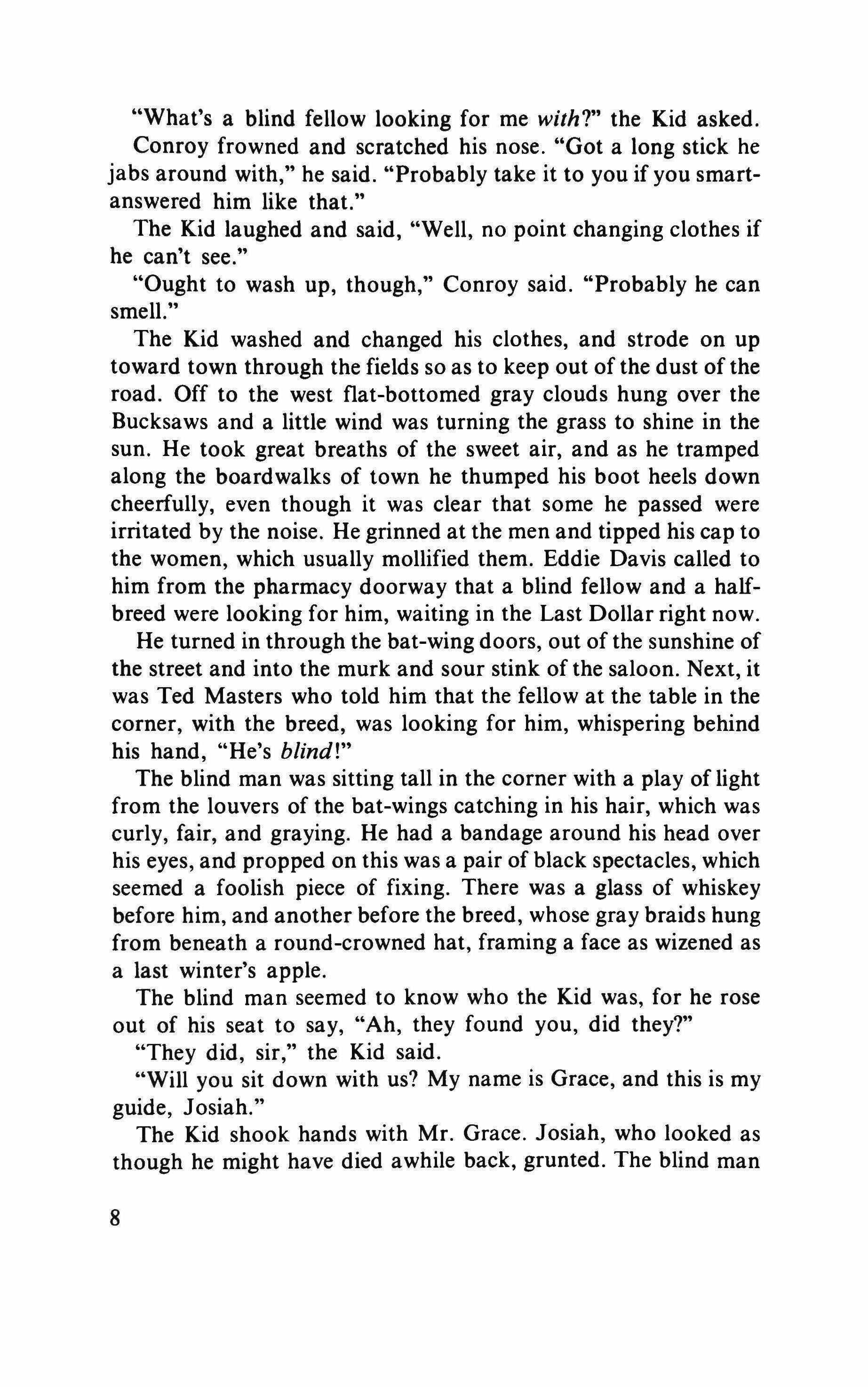
"What's a blind fellow looking for me with?" the Kid asked. Conroy frowned and scratched his nose. "Got a long stick he jabs around with," he said. "Probably take it to you if you smartanswered him like that."
The Kid laughed and said, "Well, no point changing clothes if he can't see."
"Ought to wash up, though," Conroy said. "Probably he can smell."
The Kid washed and changed his clothes, and strode on up toward town through the fields so as to keep out of the dust of the road. Off to the west flat-bottomed gray clouds hung over the Bucksaws and a little wind was turning the grass to shine in the sun. He took great breaths of the sweet air, and as he tramped along the boardwalks of town he thumped his boot heels down cheerfully, even though it was clear that some he passed were irritated by the noise. He grinned at the men and tipped his cap to the women, which usually mollified them. Eddie Davis called to him from the pharmacy doorway that a blind fellow and a halfbreed were looking for him, waiting in the Last Dollar right now. He turned in through the bat-wing doors, out of the sunshine of the street and into the murk and sour stink of the saloon. Next, it was Ted Masters who told him that the fellow at the table in the corner, with the breed, was looking for him, Whispering behind his hand, "He's blind!"
The blind man was sitting tall in the corner with a play of light from the louvers of the bat-wings catching in his hair, which was curly, fair, and graying. He had a bandage around his head over his eyes, and propped on this was a pair of black spectacles, which seemed a foolish piece of fixing. There was a glass of whiskey before him, and another before the breed, whose gray braids hung from beneath a round-crowned hat, framing a face as wizened as a last winter's apple.
The blind man seemed to know who the Kid was, for he rose out of his seat to say, "Ah, they found you, did they?"
"They did, sir," the Kid said.
"Will you sit down with us? My name is Grace, and this is my guide, Josiah."
The Kid shook hands with Mr. Grace. Josiah, who looked as though he might have died awhile back, grunted. The blind man
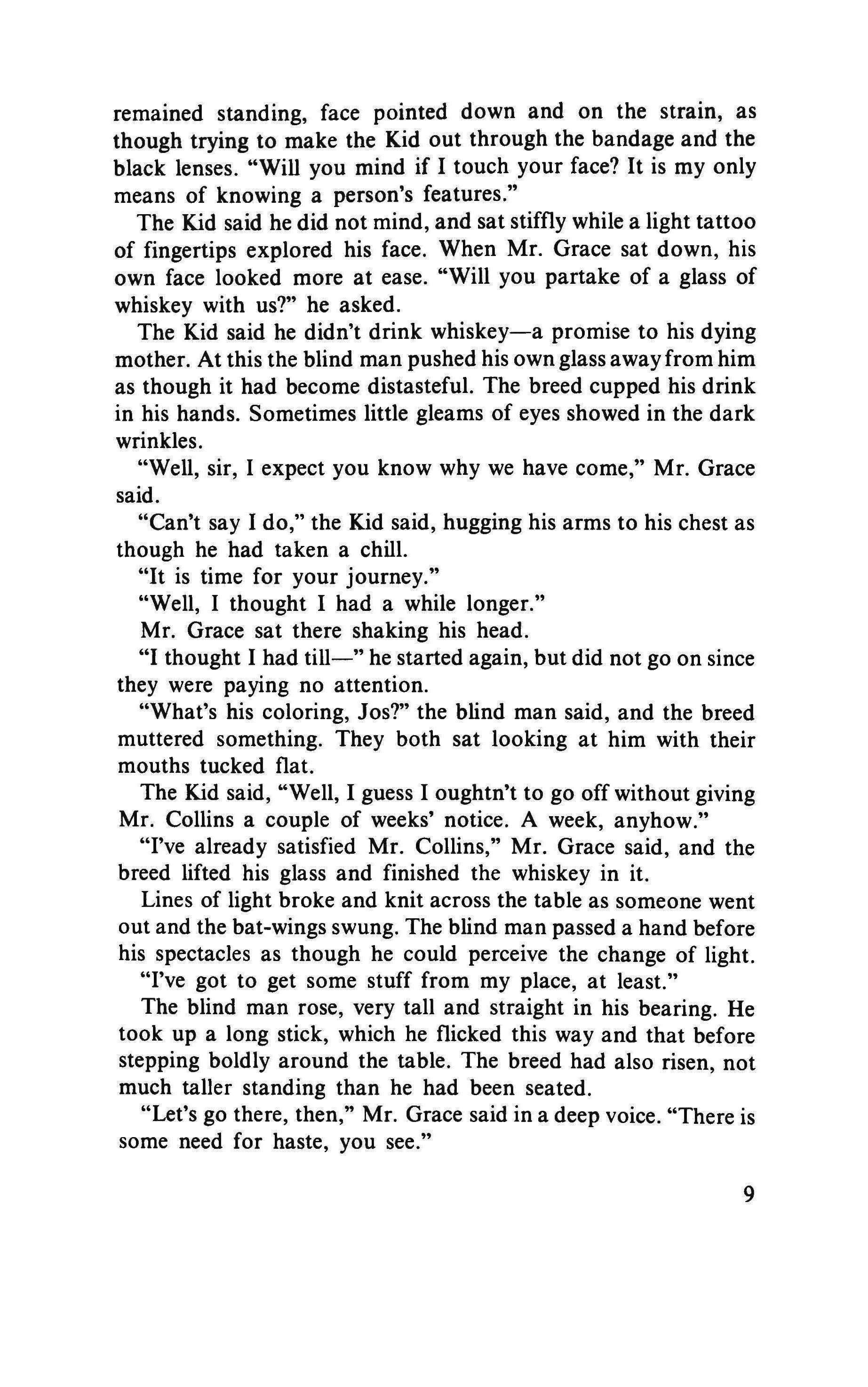
remained standing, face pointed down and on the strain, as though trying to make the Kid out through the bandage and the black lenses. "Will you mind if I touch your face? It is my only means of knowing a person's features."
The Kid said he did not mind, and sat stiffly while a light tattoo of fingertips explored his face. When Mr. Grace sat down, his own face looked more at ease. "Will you partake of a glass of whiskey with us?" he asked.
The Kid said he didn't drink whiskey-a promise to his dying mother. At this the blind man pushed his own glass away from him as though it had become distasteful. The breed cupped his drink in his hands. Sometimes little gleams of eyes showed in the dark wrinkles.
"Well, sir, I expect you know why we have come," Mr. Grace said.
"Can't say I do," the Kid said, hugging his arms to his chest as though he had taken a chill.
"It is time for your journey."
"Well, I thought I had a while longer."
Mr. Grace sat there shaking his head.
"I thought I had till-" he started again, but did not go on since they were paying no attention.
"What's his coloring, Jos?" the blind man said, and the breed muttered something. They both sat looking at him with their mouths tucked flat.
The Kid said, "Well, I guess I oughtn't to go off without giving Mr. Collins a couple of weeks' notice. A week, anyhow."
"I've already satisfied Mr. Collins," Mr. Grace said, and the breed lifted his glass and finished the whiskey in it.
Lines of light broke and knit across the table as someone went out and the bat-wings swung. The blind man passed a hand before his spectacles as though he could perceive the change of light.
"I've got to get some stuff from my place, at least."
The blind man rose, very tall and straight in his bearing. He took up a long stick, which he flicked this way and that before stepping boldly around the table. The breed had also risen, not much taller standing than he had been seated.
"Let's go there, then," Mr. Grace said in a deep voice. "There is some need for haste, you see."
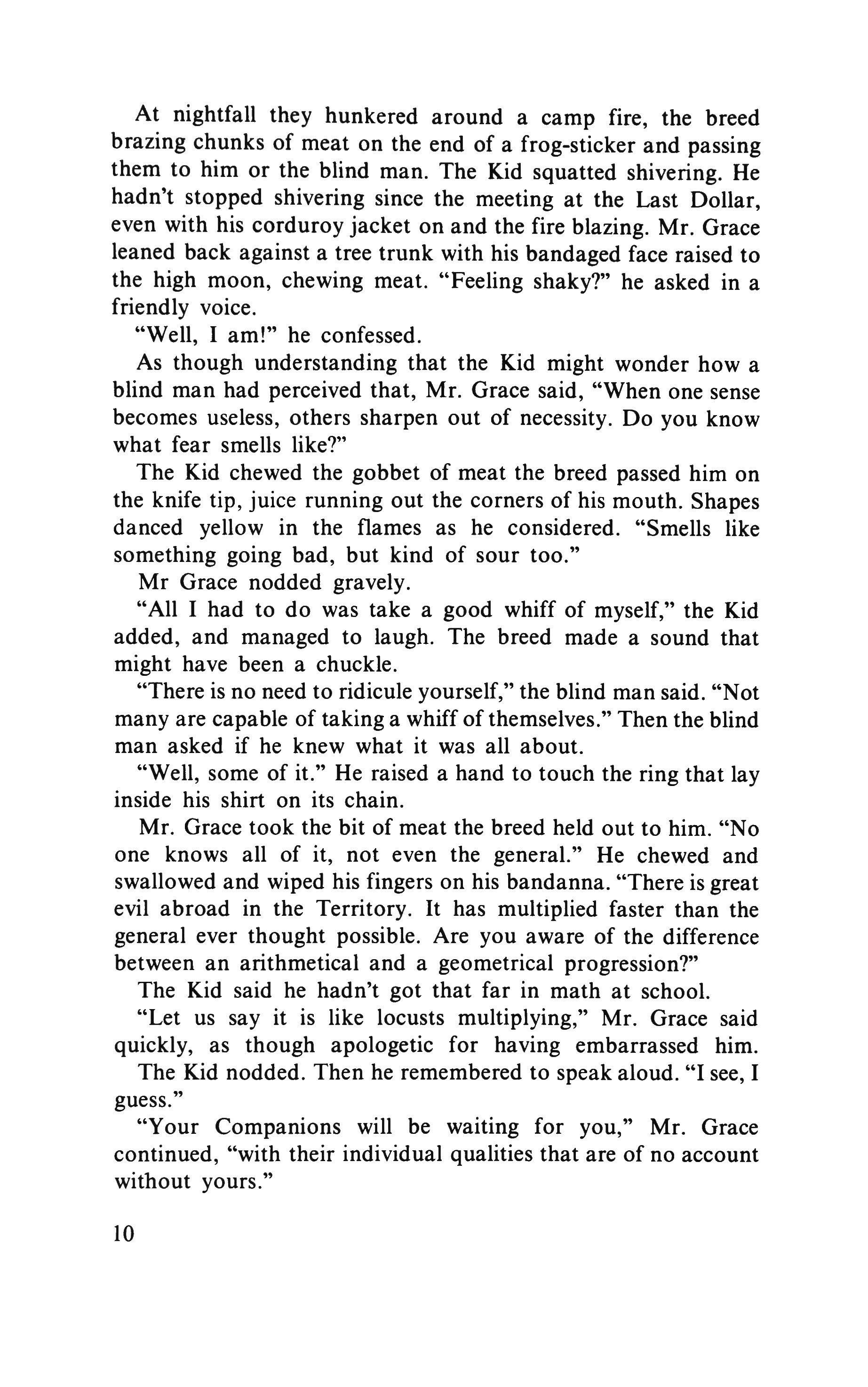
At nightfall they hunkered around a camp fire, the breed brazing chunks of meat on the end of a frog-sticker and passing them to him or the blind man. The Kid squatted shivering. He hadn't stopped shivering since the meeting at the Last Dollar, even with his corduroy jacket on and the fire blazing. Mr. Grace leaned back against a tree trunk with his bandaged face raised to the high moon, chewing meat. "Feeling shaky?" he asked in a friendly voice.
"Well, 1 am!" he confessed.
As though understanding that the Kid might wonder how a blind man had perceived that, Mr. Grace said, "When one sense becomes useless, others sharpen out of necessity. Do you know what fear smells like?"
The Kid chewed the gobbet of meat the breed passed him on the knife tip, juice running out the corners of his mouth. Shapes danced yellow in the flames as he considered. "Smells like something going bad, but kind of sour too."
Mr Grace nodded gravely.
"All 1 had to do was take a good whiff of myself," the Kid added, and managed to laugh. The breed made a sound that might have been a chuckle.
"There is no need to ridicule yourself," the blind man said. "Not many are capable of taking a whiff of themselves." Then the blind man asked if he knew what it was all about.
"Well, some of it." He raised a hand to touch the ring that lay inside his shirt on its chain.
Mr. Grace took the bit of meat the breed held out to him. "No one knows all of it, not even the general." He chewed and swallowed and wiped his fingers on his bandanna. "There is great evil abroad in the Territory. It has multiplied faster than the general ever thought possible. Are you aware of the difference between an arithmetical and a geometrical progression?"
The Kid said he hadn't got that far in math at school.
"Let us say it is like locusts multiplying," Mr. Grace said quickly, as though apologetic for having embarrassed him.
The Kid nodded. Then he remembered to speak aloud. "I see, 1 guess."
"Your Companions will be waiting for you," Mr. Grace continued, "with their individual qualities that are of no account without yours."
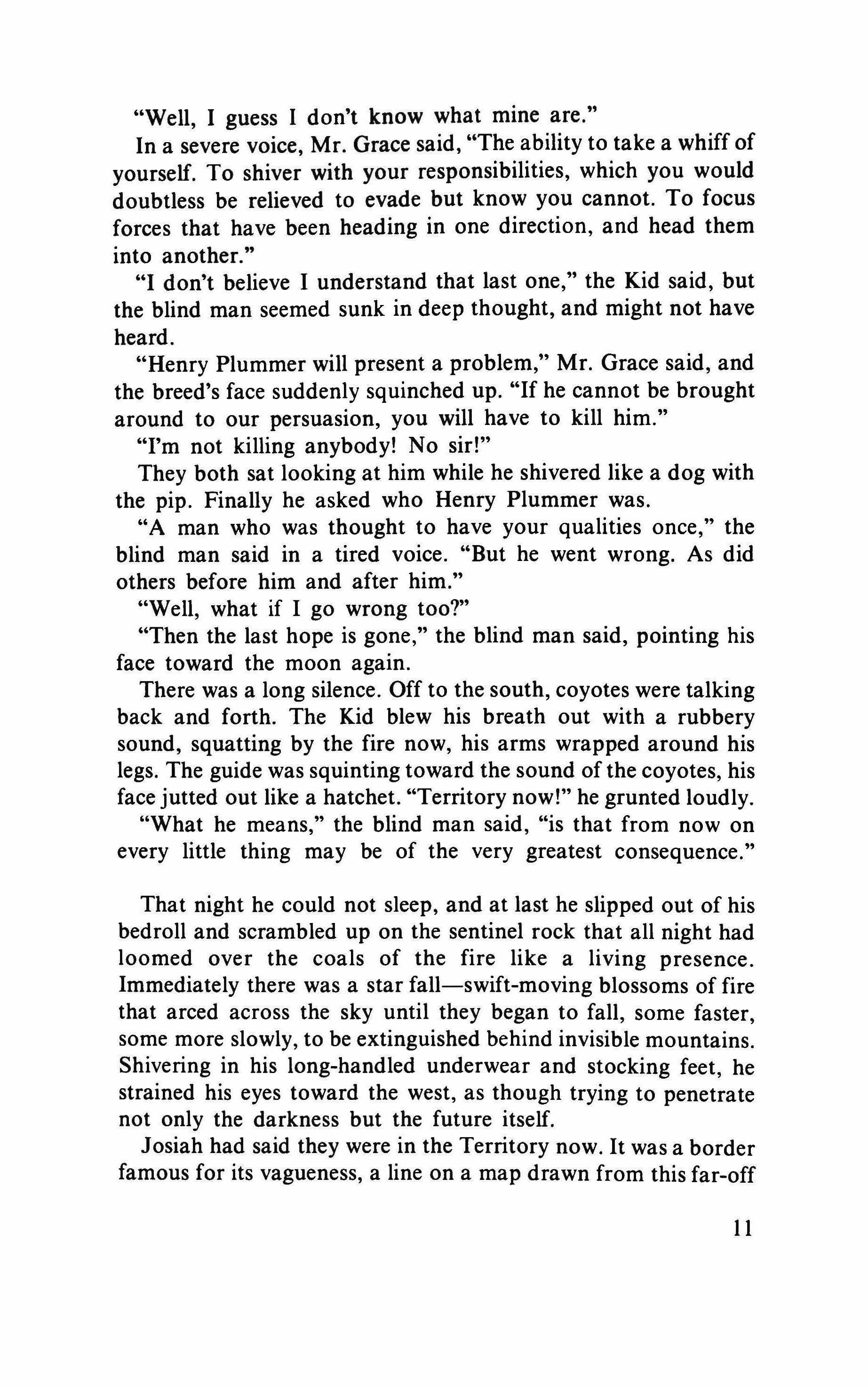
"Well, I guess I don't know what mine are."
In a severe voice, Mr. Grace said, "The ability to take a whiff of yourself. To shiver with your responsibilities, which you would doubtless be relieved to evade but know you cannot. To focus forces that have been heading in one direction, and head them into another."
"I don't believe I understand that last one," the Kid said, but the blind man seemed sunk in deep thought, and might not have heard.
"Henry Plummer will present a problem," Mr. Grace said, and the breed's face suddenly squinched up. "If he cannot be brought around to our persuasion, you will have to kill him."
"I'm not killing anybody! No sir!"
They both sat looking at him while he shivered like a dog with the pip. Finally he asked who Henry Plummer was.
"A man who was thought to have your qualities once," the blind man said in a tired voice. "But he went wrong. As did others before him and after him."
"Well, what if I go wrong too?"
"Then the last hope is gone," the blind man said, pointing his face toward the moon again.
There was a long silence. Off to the south, coyotes were talking back and forth. The Kid blew his breath out with a rubbery sound, squatting by the fire now, his arms wrapped around his legs. The guide was squinting toward the sound of the coyotes, his face jutted out like a hatchet. "Territory now!" he grunted loudly.
"What he means," the blind man said, "is that from now on every little thing may be of the very greatest consequence."
That night he could not sleep, and at last he slipped out of his bedroll and scrambled up on the sentinel rock that all night had loomed over the coals of the fire like a living presence. Immediately there was a star fall-swift-moving blossoms of fire that arced across the sky until they began to fall, some faster, some more slowly, to be extinguished behind invisible mountains. Shivering in his long-handled underwear and stocking feet, he strained his eyes toward the west, as though trying to penetrate not only the darkness but the future itself.
Josiah had said they were in the Territory now. It was a border famous for its vagueness, a line on a map drawn from this far-off
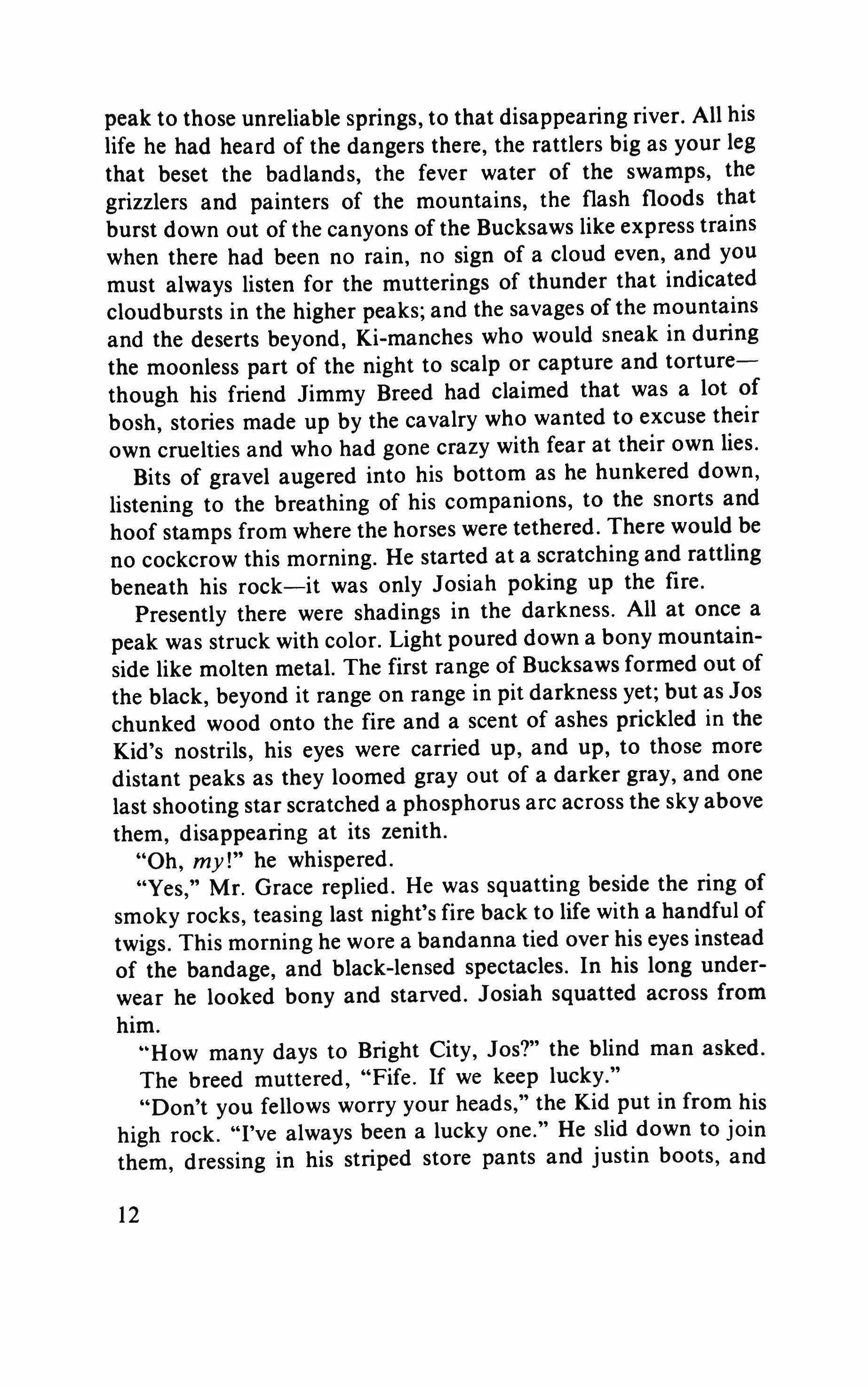
peak to those unreliable springs, to that disappearing river. All his life he had heard of the dangers there, the rattlers big as your leg that beset the badlands, the fever water of the swamps, the grizzlers and painters of the mountains, the flash floods that burst down out of the canyons of the Bucksaws like express trains when there had been no rain, no sign of a cloud even, and you must always listen for the mutterings of thunder that indicated cloudbursts in the higher peaks; and the savages of the mountains and the deserts beyond, Ki-manches who would sneak in during the moonless part of the night to scalp or capture and torturethough his friend Jimmy Breed had claimed that was a lot of bosh, stories made up by the cavalry who wanted to excuse their own cruelties and who had gone crazy with fear at their own lies.
Bits of gravel augered into his bottom as he hunkered down, listening to the breathing of his companions, to the snorts and hoof stamps from where the horses were tethered. There would be no cockcrow this morning. He started at a scratching and rattling beneath his rock-it was only Josiah poking up the fire.
Presently there were shadings in the darkness. All at once a peak was struck with color. Light poured down a bony mountainside like molten metal. The first range of Bucksaws formed out of the black, beyond it range on range in pit darkness yet; but as Jos chunked wood onto the fire and a scent of ashes prickled in the Kid's nostrils, his eyes were carried up, and up, to those more distant peaks as they loomed grayout of a darker gray, and one last shooting star scratched a phosphorus arc across the sky above them, disappearing at its zenith.
"Oh, my!" he whispered.
"Yes," Mr. Grace replied. He was squatting beside the ring of smoky rocks, teasing last night's fire back to life with a handful of twigs. This morning he wore a bandanna tied over his eyes instead of the bandage, and black-lensed spectacles. In his long underwear he looked bony and starved. Josiah squatted across from him.
"How many days to Bright City, Jos?" the blind man asked. The breed muttered, "Fife. If we keep lucky."
"Don't you fellows worry your heads," the Kid put in from his high rock. "I've always been a lucky one." He slid down to join them, dressing in his striped store pants and justin boots, and
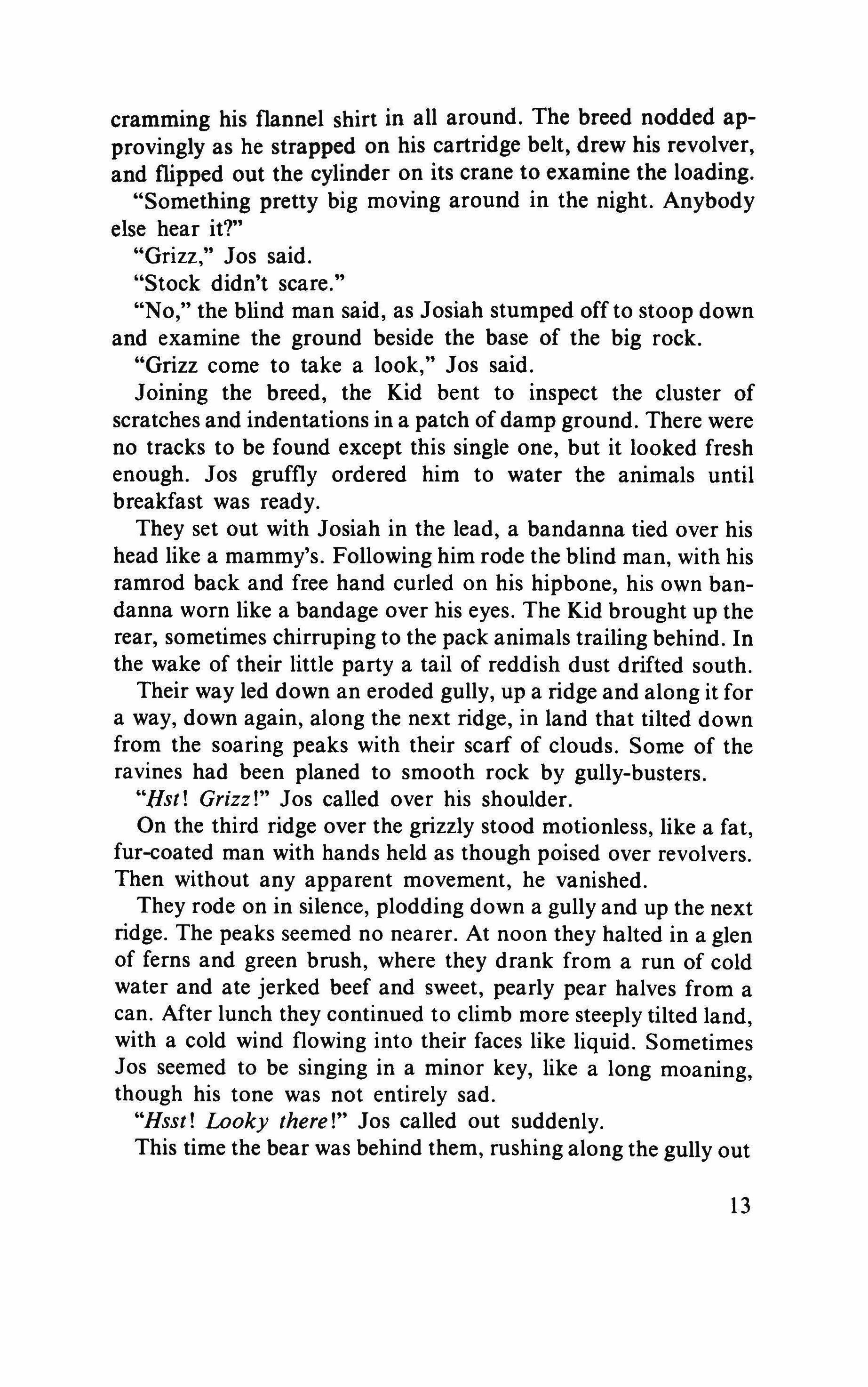
cramming his flannel shirt in all around. The breed nodded approvingly as he strapped on his cartridge belt, drew his revolver, and flipped out the cylinder on its crane to examine the loading.
"Something pretty big moving around in the night. Anybody else hear it?"
"Grizz," Jos said.
"Stock didn't scare."
"No," the blind man said, as Josiah stumped offto stoop down and examine the ground beside the base of the big rock.
"Grizz come to take a look," Jos said.
Joining the breed, the Kid bent to inspect the cluster of scratches and indentations in a patch of damp ground. There were no tracks to be found except this single one, but it looked fresh enough. Jos gruffly ordered him to water the animals until breakfast was ready.
They set out with Josiah in the lead, a bandanna tied over his head like a mammy's. Following him rode the blind man, with his ramrod back and free hand curled on his hipbone, his own bandanna worn like a bandage over his eyes. The Kid brought up the rear, sometimes chirruping to the pack animals trailing behind. In the wake of their little party a tail of reddish dust drifted south.
Their way led down an eroded gully, up a ridge and along it for a way, down again, along the next ridge, in land that tilted down from the soaring peaks with their scarf of clouds. Some of the ravines had been planed to smooth rock by gully-busters.
"Hsti Grizz!" Jos called over his shoulder.
On the third ridge over the grizzly stood motionless, like a fat, fur-coated man with hands held as though poised over revolvers. Then without any apparent movement, he vanished.
They rode on in silence, plodding down a gully and up the next ridge. The peaks seemed no nearer. At noon they halted in a glen of ferns and green brush, where they drank from a run of cold water and ate jerked beef and sweet, pearly pear halves from a can. After lunch they continued to climb more steeply tilted land, with a cold wind flowing into their faces like liquid. Sometimes Jos seemed to be singing in a minor key, like a long moaning, though his tone was not entirely sad.
"Hsst! Looky there!" Jos called out suddenly. This time the bear was behind them, rushing along the gully out
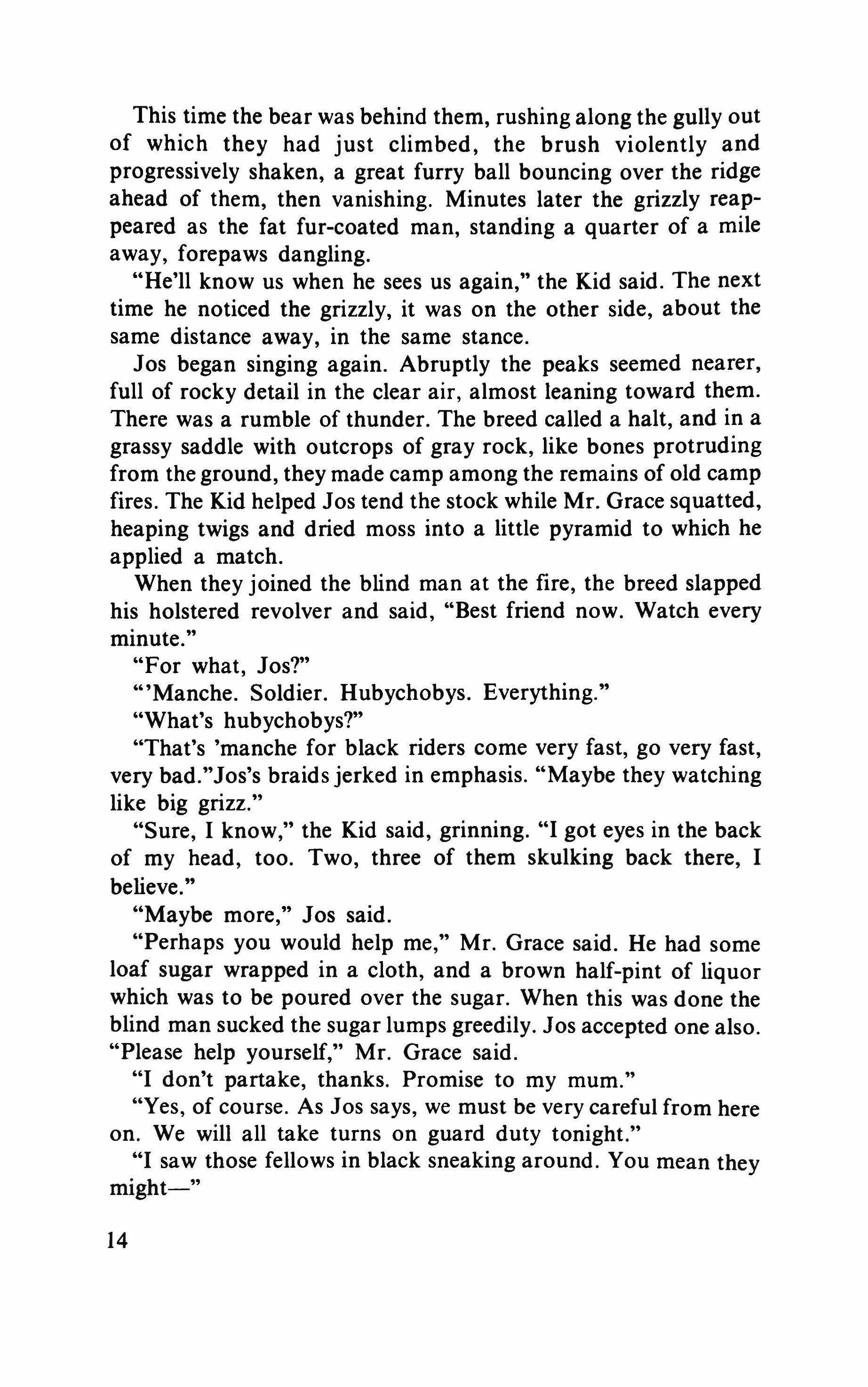
This time the bear was behind them, rushing along the gully out of which they had just climbed, the brush violently and progressively shaken, a great furry ball bouncing over the ridge ahead of them, then vanishing. Minutes later the grizzly reappeared as the fat fur-coated man, standing a quarter of a mile away, forepaws dangling.
"He'll know us when he sees us again," the Kid said. The next time he noticed the grizzly, it was on the other side, about the same distance away, in the same stance.
Jos began singing again. Abruptly the peaks seemed nearer, full of rocky detail in the clear air, almost leaning toward them. There was a rumble of thunder. The breed called a halt, and in a grassy saddle with outcrops of gray rock, like bones protruding from the ground, they made camp among the remains of old camp fires. The Kid helped Jos tend the stock while Mr. Grace squatted, heaping twigs and dried moss into a little pyramid to which he applied a match.
When they joined the blind man at the fire, the breed slapped his holstered revolver and said, "Best friend now. Watch every minute."
"For what, Jos?"
·"Manche. Soldier. Hubychobys. Everything."
"What's hubychobys?"
"That's 'manche for black riders come very fast, go very fast, very bad."Jos's braids jerked in emphasis. "Maybe they watching like big grizz."
"Sure, 1 know," the Kid said, grinning. "I got eyes in the back of my head, too. Two, three of them skulking back there, 1 believe."
"Maybe more," Jos said.
"Perhaps you would help me," Mr. Grace said. He had some loaf sugar wrapped in a cloth, and a brown half-pint of liquor which was to be poured over the sugar. When this was done the blind man sucked the sugar lumps greedily. Jos accepted one also. "Please help yourself," Mr. Grace said.
"I don't partake, thanks. Promise to my mum."
"Yes, of course. As Jos says, we must be very careful from here on. We will all take turns on guard duty tonight."
"I saw those fellows in black sneaking around. You mean they might-"
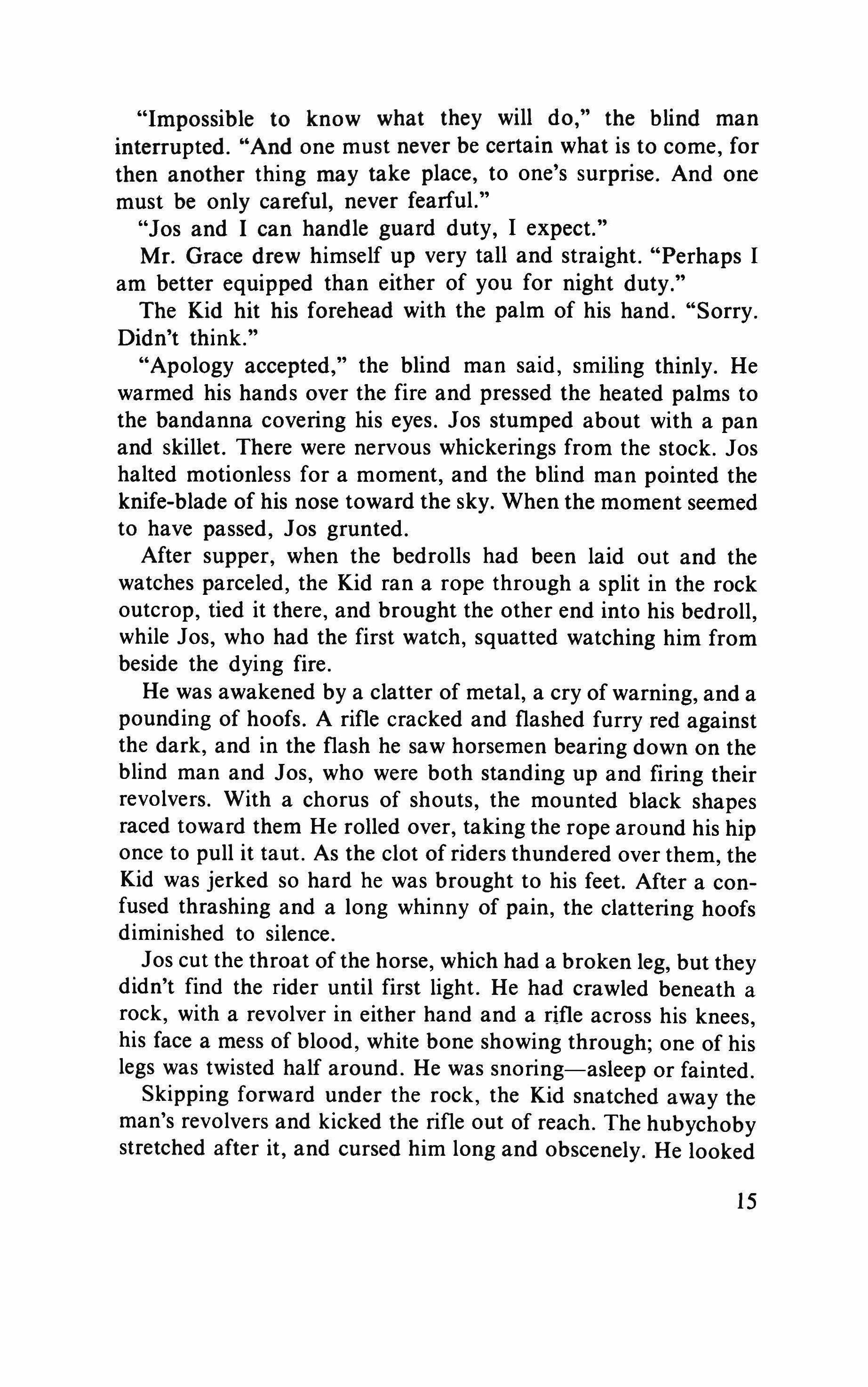
"Impossible to know what they will do," the blind man interrupted. "And one must never be certain what is to come, for then another thing may take place, to one's surprise. And one must be only careful, never fearful."
"Jos and I can handle guard duty, I expect."
Mr. Grace drew himself up very tall and straight. "Perhaps I am better equipped than either of you for night duty."
The Kid hit his forehead with the palm of his hand. "Sorry. Didn't think."
"Apology accepted," the blind man said, smiling thinly. He warmed his hands over the fire and pressed the heated palms to the bandanna covering his eyes. Jos stumped about with a pan and skillet. There were nervous whickerings from the stock. Jos halted motionless for a moment, and the blind man pointed the knife-blade of his nose toward the sky. When the moment seemed to have passed, Jos grunted.
After supper, when the bedrolls had been laid out and the watches parceled, the Kid ran a rope through a split in the rock outcrop, tied it there, and brought the other end into his bedroll, while Jos, who had the first watch, squatted watching him from beside the dying fire.
He was awakened by a clatter of metal, a cry of warning, and a pounding of hoofs. A rifle cracked and flashed furry red against the dark, and in the flash he saw horsemen bearing down on the blind man and Jos, who were both standing up and firing their revolvers. With a chorus of shouts, the mounted black shapes raced toward them He rolled over, taking the rope around his hip once to pull it taut. As the clot of riders thundered over them, the Kid was jerked so hard he was brought to his feet. After a confused thrashing and a long whinny of pain, the clattering hoofs diminished to silence.
Jos cut the throat ofthe horse, which had a broken leg, but they didn't find the rider until first light. He had crawled beneath a rock, with a revolver in either hand and a rifle across his knees, his face a mess of blood, white bone showing through; one of his legs was twisted half around. He was snoring-asleep or fainted.
Skipping forward under the rock, the Kid snatched away the man's revolvers and kicked the rifle out of reach. The hubychoby stretched after it, and cursed him long and obscenely. He looked
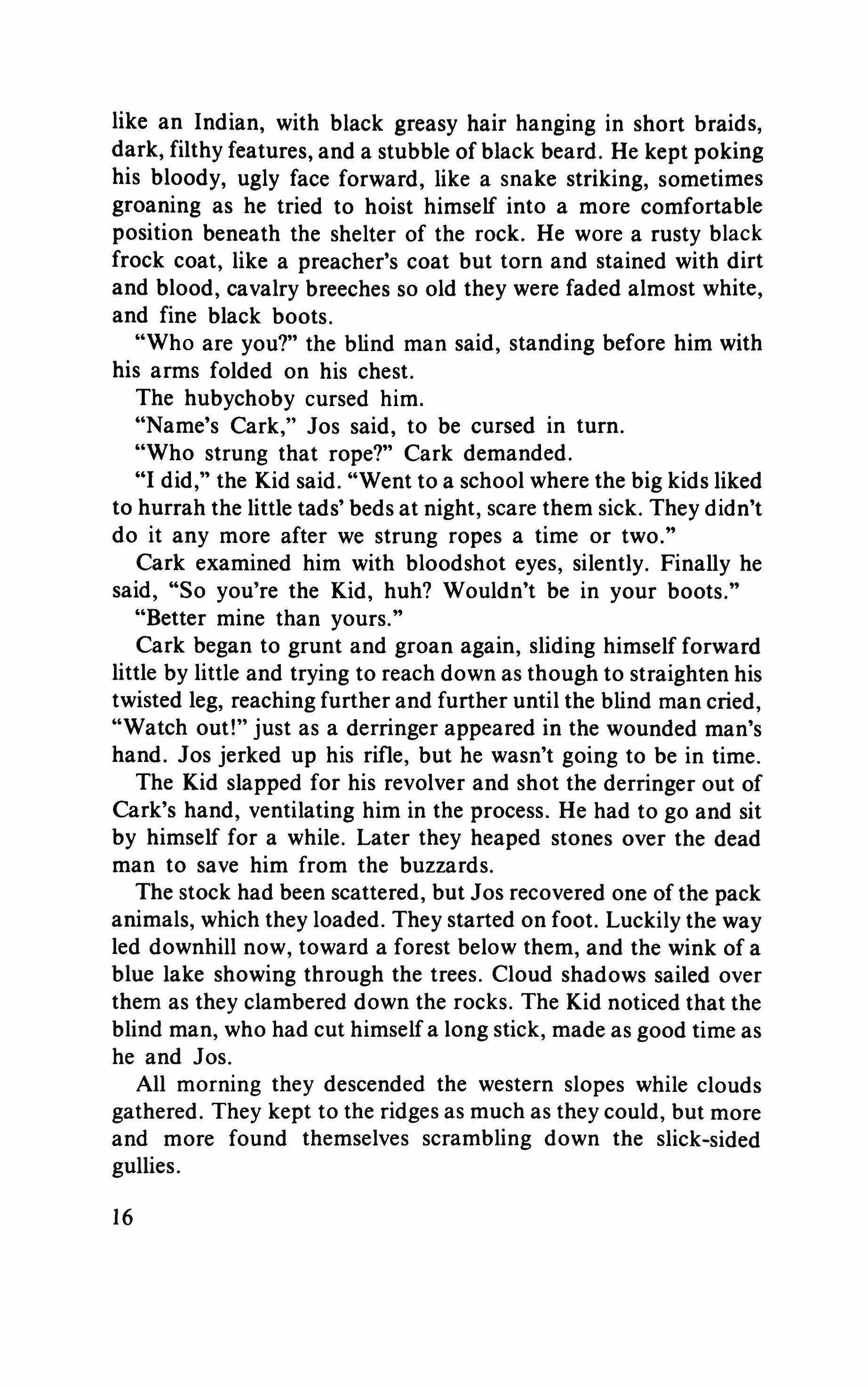
like an Indian, with black greasy hair hanging in short braids, dark, filthy features, and a stubble of black beard. He kept poking his bloody, ugly face forward, like a snake striking, sometimes groaning as he tried to hoist himself into a more comfortable position beneath the shelter of the rock. He wore a rusty black frock coat, like a preacher's coat but torn and stained with dirt and blood, cavalry breeches so old they were faded almost white, and fine black boots.
"Who are you?" the blind man said, standing before him with his arms folded on his chest.
The hubychoby cursed him.
"Name's Cark," los said, to be cursed in turn.
"Who strung that rope?" Cark demanded.
"I did," the Kid said. "Went to a school where the big kids liked to hurrah the little tads' beds at night, scare them sick. They didn't do it any more after we strung ropes a time or two."
Cark examined him with bloodshot eyes, silently. Finally he said, "So you're the Kid, huh? Wouldn't be in your boots."
"Better mine than yours."
Cark began to grunt and groan again, sliding himself forward little by little and trying to reach down as though to straighten his twisted leg, reaching further and further until the blind man cried, "Watch out!" just as a derringer appeared in the wounded man's hand. los jerked up his rifle, but he wasn't going to be in time.
The Kid slapped for his revolver and shot the derringer out of Cark's hand, ventilating him in the process. He had to go and sit by himself for a while. Later they heaped stones over the dead man to save him from the buzzards.
The stock had been scattered, but los recovered one of the pack animals, which they loaded. They started on foot. Luckily the way led downhill now, toward a forest below them, and the wink of a blue lake showing through the trees. Cloud shadows sailed over them as they clambered down the rocks. The Kid noticed that the blind man, who had cut himself a long stick, made as good time as he and los.
All morning they descended the western slopes while clouds gathered. They kept to the ridges as much as they could, but more and more found themselves scrambling down the slick-sided gullies.
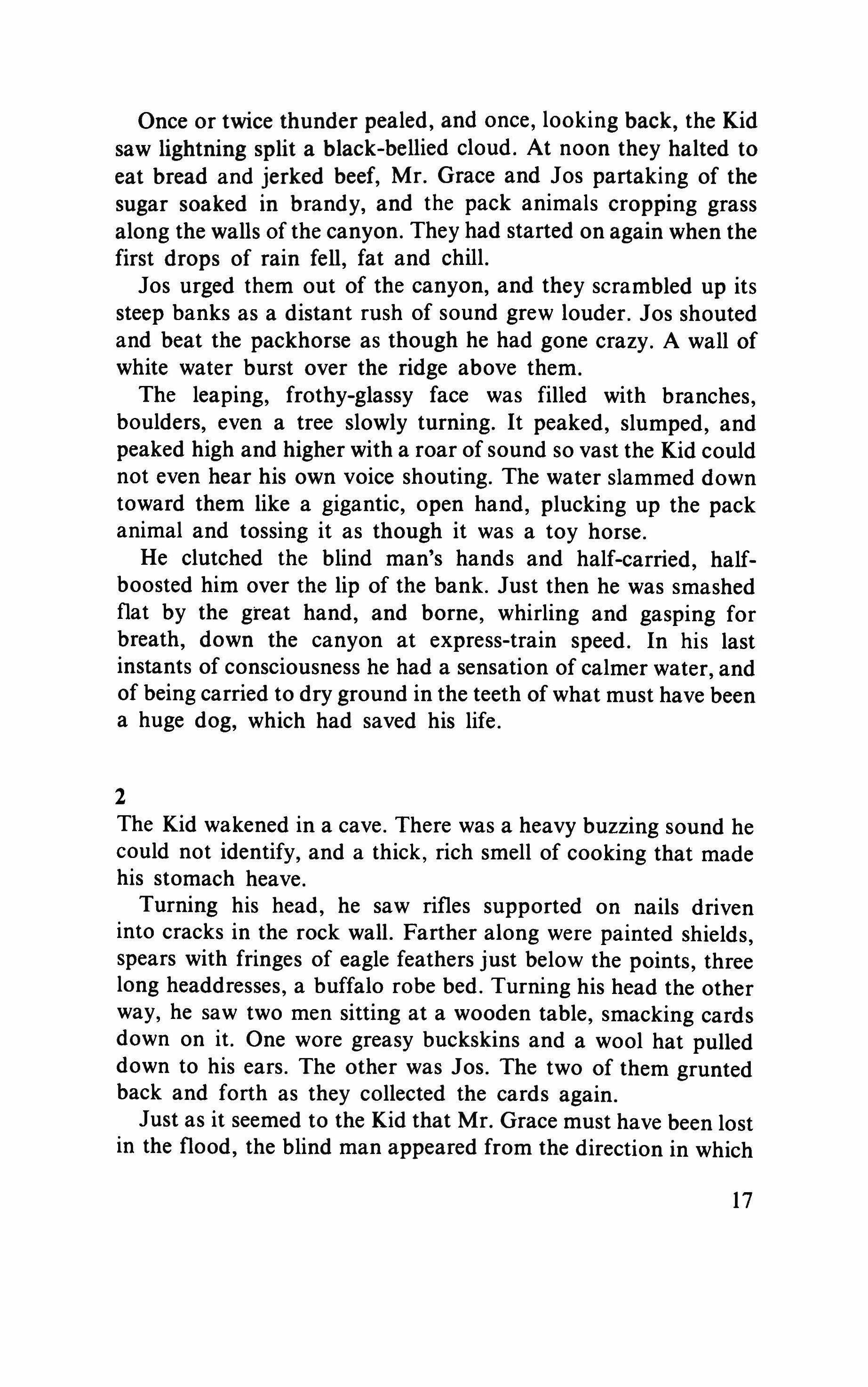
Once or twice thunder pealed, and once, looking back, the Kid saw lightning split a black-bellied cloud. At noon they halted to eat bread and jerked beef, Mr. Grace and Jos partaking of the sugar soaked in brandy, and the pack animals cropping grass along the walls of the canyon. They had started on again when the first drops of rain fell, fat and chill.
Jos urged them out of the canyon, and they scrambled up its steep banks as a distant rush of sound grew louder. Jos shouted and beat the packhorse as though he had gone crazy. A wall of white water burst over the ridge above them.
The leaping, frothy-glassy face was filled with branches, boulders, even a tree slowly turning. It peaked, slumped, and peaked high and higher with a roar of sound so vast the Kid could not even hear his own voice shouting. The water slammed down toward them like a gigantic, open hand, plucking up the pack animal and tossing it as though it was a toy horse.
He clutched the blind man's hands and half-carried, halfboosted him over the lip of the bank. Just then he was smashed flat by the great hand, and borne, whirling and gasping for breath, down the canyon at express-train speed. In his last instants of consciousness he had a sensation of calmer water, and of being carried to dry ground in the teeth of what must have been a huge dog, which had saved his life.
2
The Kid wakened in a cave. There was a heavy buzzing sound he could not identify, and a thick, rich smell of cooking that made his stomach heave.
Turning his head, he saw rifles supported on nails driven into cracks in the rock wall. Farther along were painted shields, spears with fringes of eagle feathers just below the points, three long headdresses, a buffalo robe bed. Turning his head the other way, he saw two men sitting at a wooden table, smacking cards down on it. One wore greasy buckskins and a wool hat pulled down to his ears. The other was Jos. The two of them grunted back and forth as they collected the cards again.
Just as it seemed to the Kid that Mr. Grace must have been lost in the flood, the blind man appeared from the direction in which
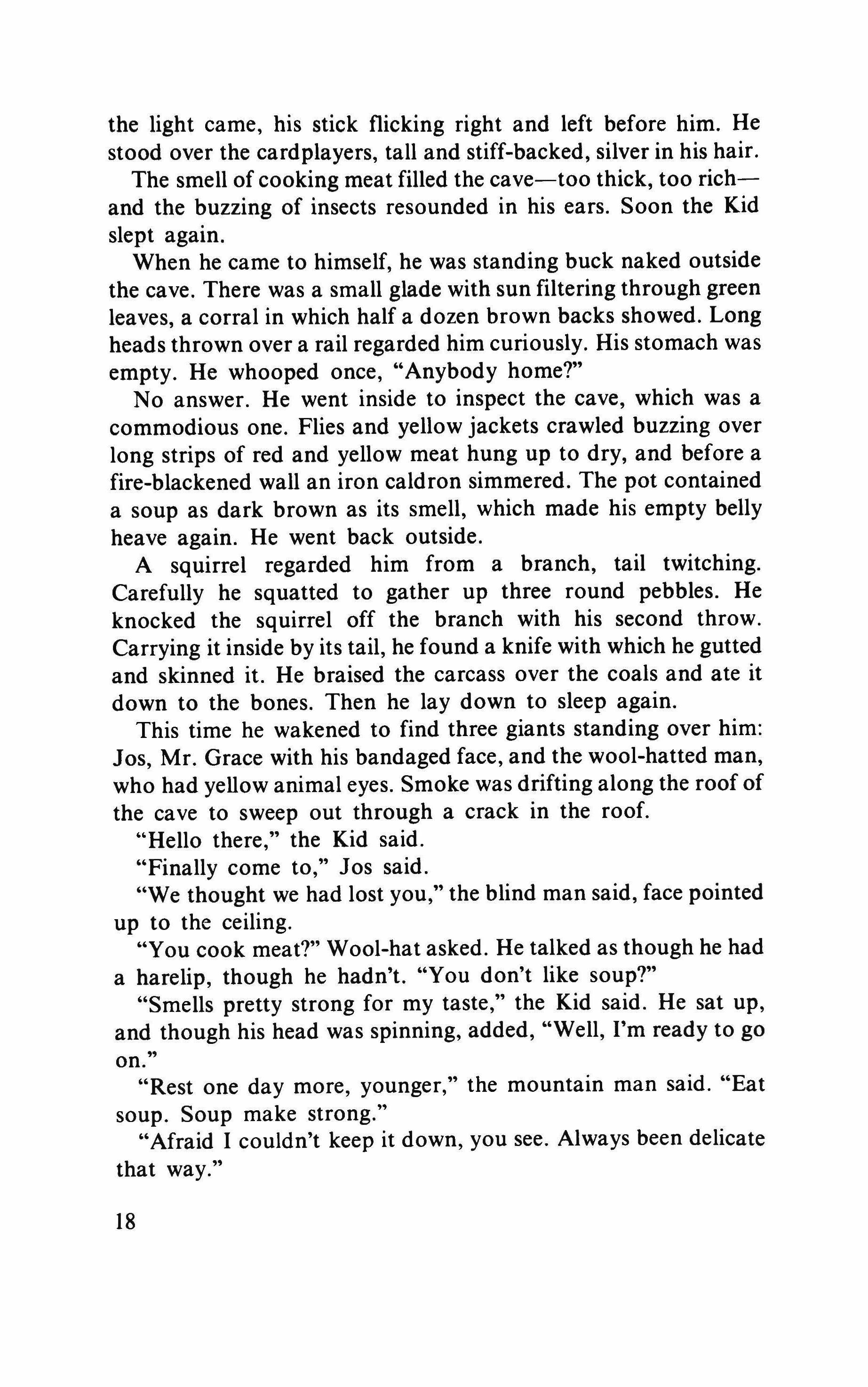
the light came, his stick flicking right and left before him. He stood over the cardplayers, tall and stiff-backed, silver in his hair.
The smell of cooking meat filled the cave-too thick, too richand the buzzing of insects resounded in his ears. Soon the Kid slept again.
When he came to himself, he was standing buck naked outside the cave. There was a small glade with sun filtering through green leaves, a corral in which half a dozen brown backs showed. Long heads thrown over a rail regarded him curiously. His stomach was empty. He whooped once, "Anybody home?"
No answer. He went inside to inspect the cave, which was a commodious one. Flies and yellow jackets crawled buzzing over long strips of red and yellow meat hung up to dry, and before a fire-blackened wall an iron caldron simmered. The pot contained a soup as dark brown as its smell, which made his empty belly heave again. He went back outside.
A squirrel regarded him from a branch, tail twitching. Carefully he squatted to gather up three round pebbles. He knocked the squirrel off the branch with his second throw. Carrying it inside by its tail, he found a knife with which he gutted and skinned it. He braised the carcass over the coals and ate it down to the bones. Then he lay down to sleep again.
This time he wakened to find three giants standing over him: Jos, Mr. Grace with his bandaged face, and the wool-hatted man, who had yellow animal eyes. Smoke was drifting along the roof of the cave to sweep out through a crack in the roof.
"Hello there," the Kid said.
"Finally come to," Jos said.
"We thought we had lost you," the blind man said, face pointed up to the ceiling.
"You cook meat?" Wool-hat asked. He talked as though he had a harelip, though he hadn't. "You don't like soup?"
"Smells pretty strong for my taste," the Kid said. He sat up, and though his head was spinning, added, "Well, I'm ready to go on."
"Rest one day more, younger," the mountain man said. "Eat soup. Soup make strong."
"Afraid I couldn't keep it down, you see. Always been delicate that way."
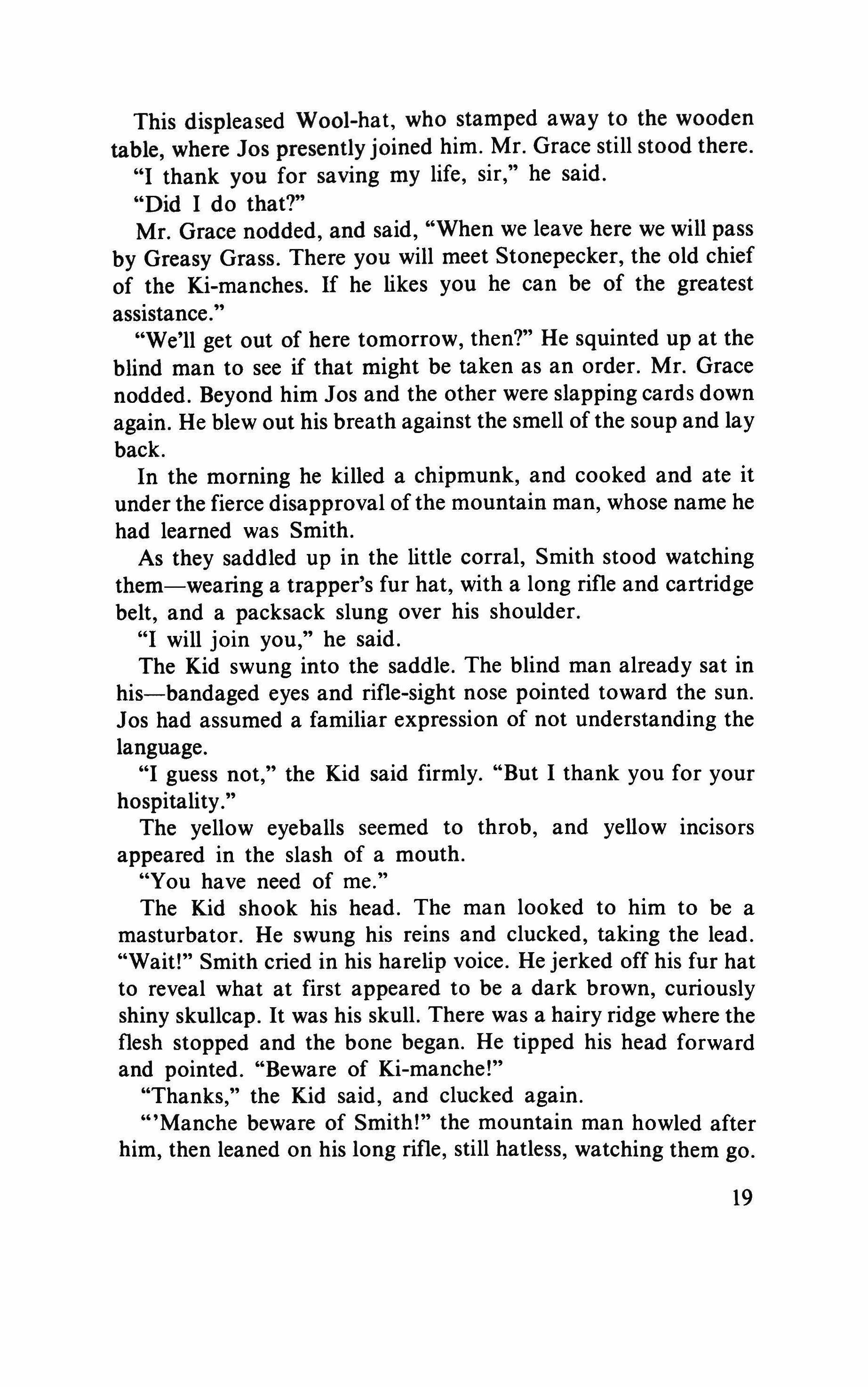
This displeased Wool-hat, who stamped away to the wooden table, where Jos presentlyjoined him. Mr. Grace still stood there.
"I thank you for saving my life, sir," he said.
"Did I do that?"
Mr. Grace nodded, and said, "When we leave here we will pass by Greasy Grass. There you will meet Stonepecker, the old chief of the Ki-rnanches. If he likes you he can be of the greatest assistance. "
"We'll get out of here tomorrow, then?" He squinted up at the blind man to see if that might be taken as an order. Mr. Grace nodded. Beyond him Jos and the other were slapping cards down again. He blew out his breath against the smell of the soup and lay back.
In the morning he killed a chipmunk, and cooked and ate it under the fierce disapproval of the mountain man, whose name he had learned was Smith.
As they saddled up in the little corral, Smith stood watching them-wearing a trapper's fur hat, with a long rifle and cartridge belt, and a packsack slung over his shoulder.
"I will join you," he said.
The Kid swung into the saddle. The blind man already sat in his-bandaged eyes and rifle-sight nose pointed toward the sun. Jos had assumed a familiar expression of not understanding the language.
"I guess not," the Kid said firmly. "But I thank you for your hospitality."
The yellow eyeballs seemed to throb, and yellow incisors appeared in the slash of a mouth.
"You have need of me."
The Kid shook his head. The man looked to him to be a masturbator. He swung his reins and clucked, taking the lead. "Wait!" Smith cried in his harelip voice. He jerked off his fur hat to reveal what at first appeared to be a dark brown, curiously shiny skullcap. It was his skull. There was a hairy ridge where the flesh stopped and the bone began. He tipped his head forward and pointed. "Beware of Ki-manche!"
"Thanks," the Kid said, and clucked again.
"'Manche beware of Smith!" the mountain man howled after him, then leaned on his long rifle, still hatless, watching them go.
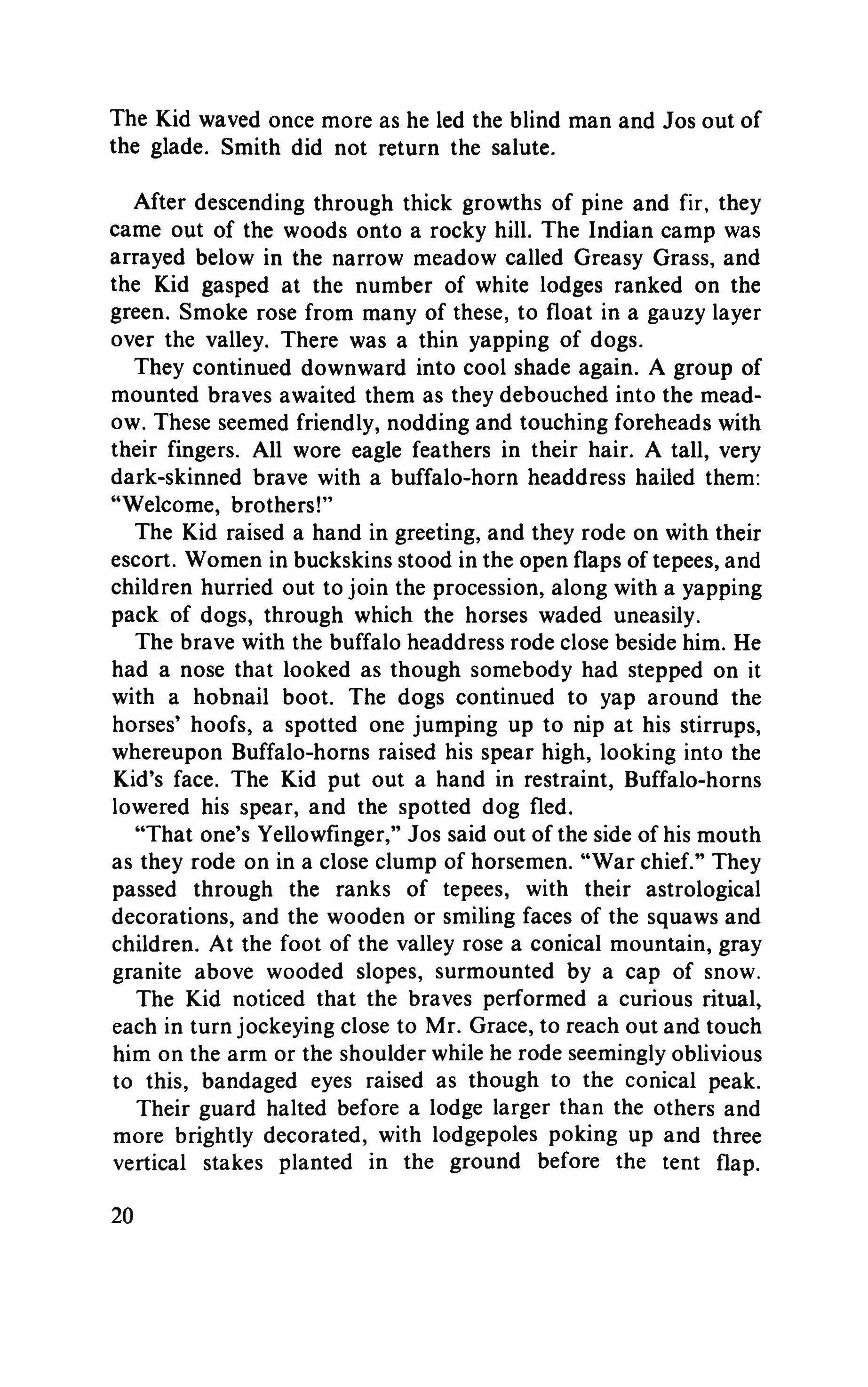
The Kid waved once more as he led the blind man and los out of the glade. Smith did not return the salute.
After descending through thick growths of pine and fir, they came out of the woods onto a rocky hill. The Indian camp was arrayed below in the narrow meadow called Greasy Grass, and the Kid gasped at the number of white lodges ranked on the green. Smoke rose from many of these, to float in a gauzy layer over the valley. There was a thin yapping of dogs.
They continued downward into cool shade again. A group of mounted braves awaited them as they debouched into the meadow. These seemed friendly, nodding and touching foreheads with their fingers. All wore eagle feathers in their hair. A tall, very dark-skinned brave with a buffalo-horn headdress hailed them: "Welcome, brothers!"
The Kid raised a hand in greeting, and they rode on with their escort. Women in buckskins stood in the open flaps oftepees, and children hurried out to join the procession, along with a yapping pack of dogs, through which the horses waded uneasily.
The brave with the buffalo headdress rode close beside him. He had a nose that looked as though somebody had stepped on it with a hobnail boot. The dogs continued to yap around the horses' hoofs, a spotted one jumping up to nip at his stirrups, whereupon Buffalo-horns raised his spear high, looking into the Kid's face. The Kid put out a hand in restraint, Buffalo-horns lowered his spear, and the spotted dog fled.
"That one's Yellowfinger," los said out of the side of his mouth as they rode on in a close clump of horsemen. "War chief." They passed through the ranks of tepees, with their astrological decorations, and the wooden or smiling faces of the squaws and children. At the foot of the valley rose a conical mountain, gray granite above wooded slopes, surmounted by a cap of snow.
The Kid noticed that the braves performed a curious ritual, each in turn jockeying close to Mr. Grace, to reach out and touch him on the arm or the shoulder while he rode seemingly oblivious to this, bandaged eyes raised as though to the conical peak.
Their guard halted before a lodge larger than the others and more brightly decorated, with lodgepoles poking up and three vertical stakes planted in the ground before the tent flap.
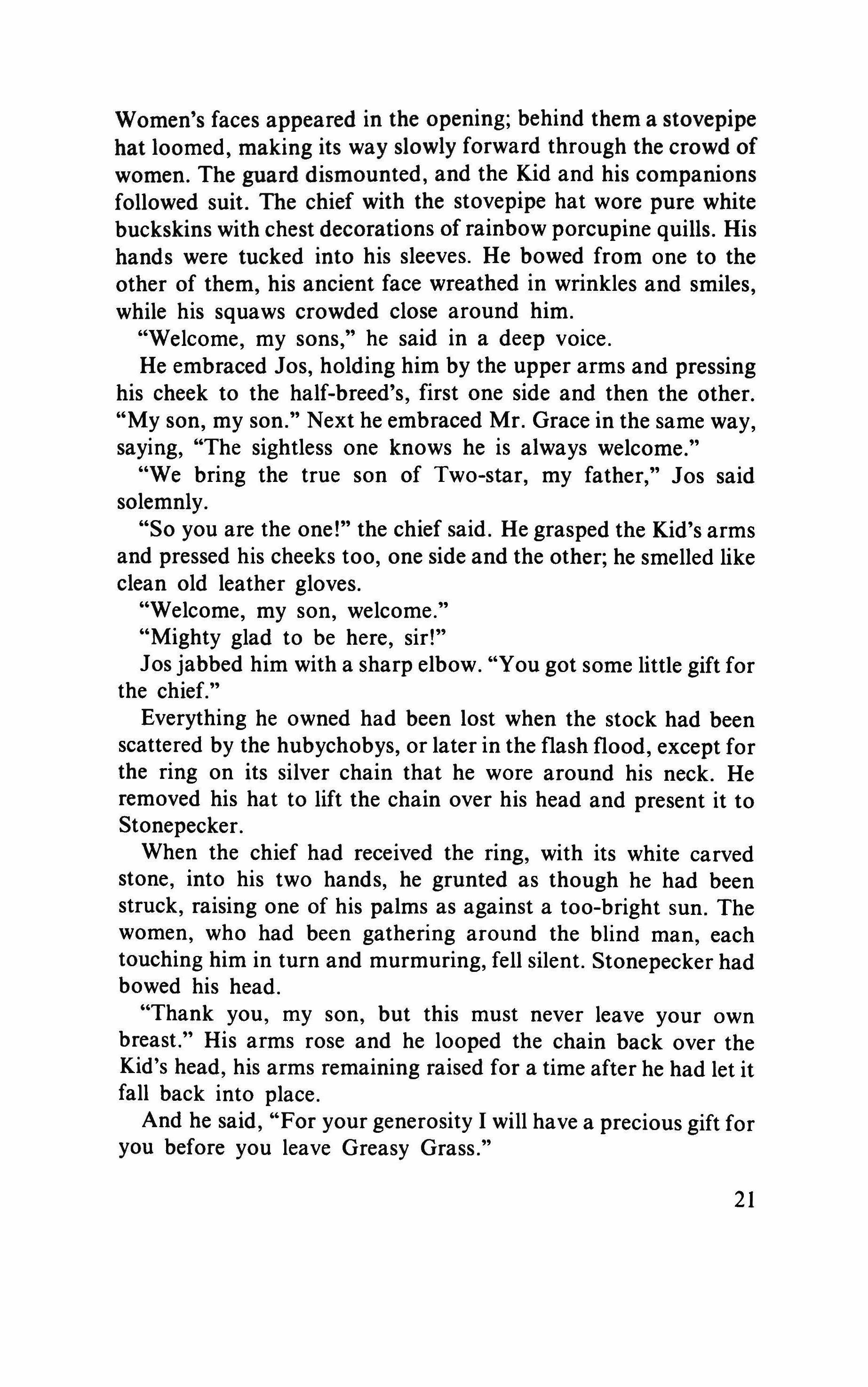
Women's faces appeared in the opening; behind them a stovepipe hat loomed, making its way slowly forward through the crowd of women. The guard dismounted, and the Kid and his companions followed suit. The chief with the stovepipe hat wore pure white buckskins with chest decorations of rainbow porcupine quills. His hands were tucked into his sleeves. He bowed from one to the other of them, his ancient face wreathed in wrinkles and smiles, while his squaws crowded close around him.
"Welcome, my sons," he said in a deep voice.
He embraced Jos, holding him by the upper arms and pressing his cheek to the half-breed's, first one side and then the other. "My son, my son." Next he embraced Mr. Grace in the same way, saying, "The sightless one knows he is always welcome."
"We bring the true son of Two-star, my father," Jos said solemnly.
"So you are the one!" the chief said. He grasped the Kid's arms and pressed his cheeks too, one side and the other; he smelled like clean old leather gloves.
"Welcome, my son, welcome."
"Mighty glad to be here, sir!"
Jos jabbed him with a sharp elbow. "You got some little gift for the chief."
Everything he owned had been lost when the stock had been scattered by the hubychobys, or later in the flash flood, except for the ring on its silver chain that he wore around his neck. He removed his hat to lift the chain over his head and present it to Stonepecker.
When the chief had received the ring, with its white carved stone, into his two hands, he grunted as though he had been struck, raising one of his palms as against a too-bright sun. The women, who had been gathering around the blind man, each touching him in turn and murmuring, fell silent. Stonepecker had bowed his head.
"Thank you, my son, but this must never leave your own breast." His arms rose and he looped the chain back over the Kid's head, his arms remaining raised for a time after he had let it fall back into place.
And he said, "For your generosity I will have a precious gift for you before you leave Greasy Grass."
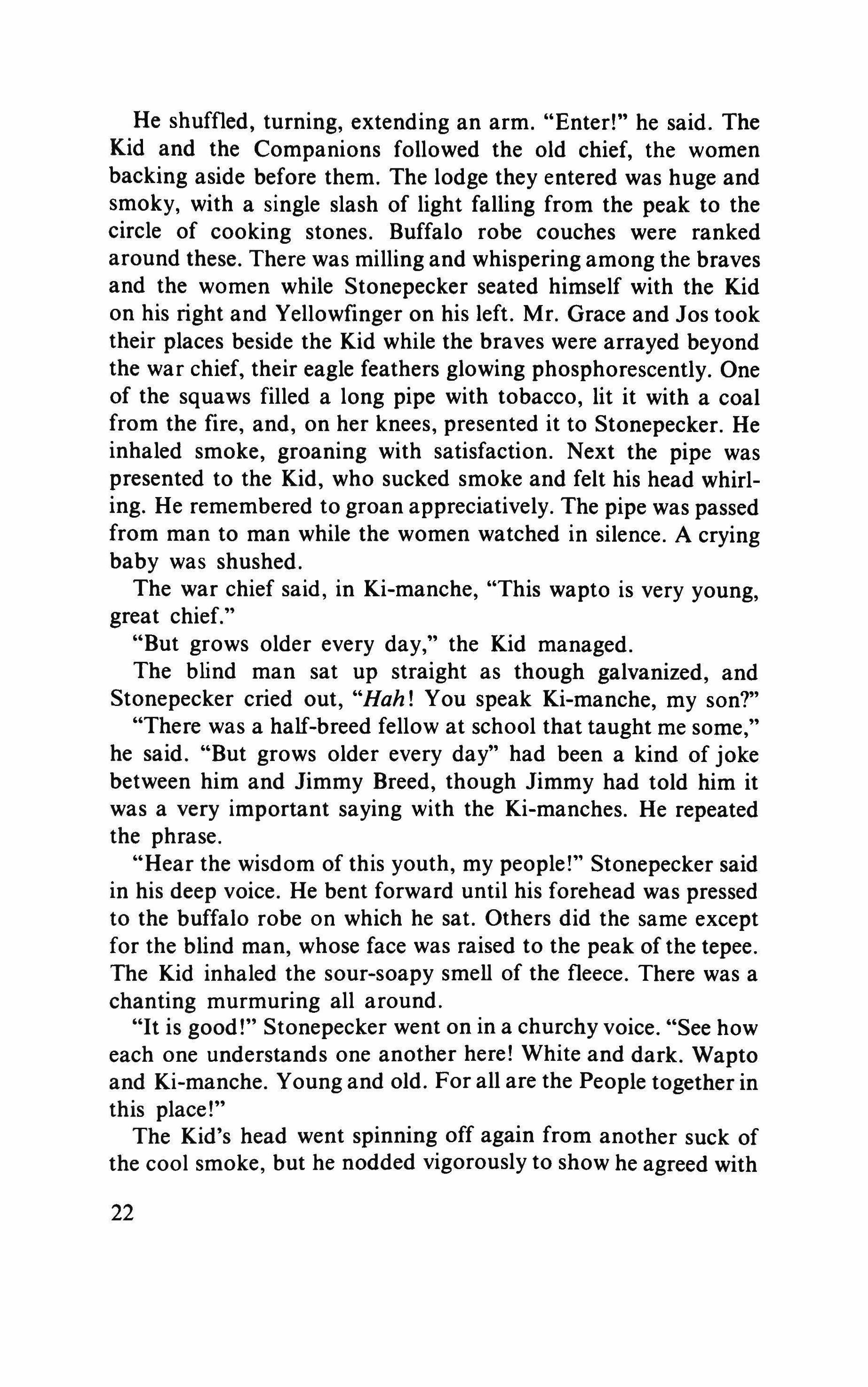
He shuffled, turning, extending an arm. "Enter!" he said. The Kid and the Companions followed the old chief, the women backing aside before them. The lodge they entered was huge and smoky, with a single slash of light falling from the peak to the circle of cooking stones. Buffalo robe couches were ranked around these. There was milling and whispering among the braves and the women while Stonepecker seated himself with the Kid on his right and Yellowfinger on his left. Mr. Grace and Jos took their places beside the Kid while the braves were arrayed beyond the war chief, their eagle feathers glowing phosphorescently. One of the squaws filled a long pipe with tobacco, lit it with a coal from the fire, and, on her knees, presented it to Stonepecker. He inhaled smoke, groaning with satisfaction. Next the pipe was presented to the Kid, who sucked smoke and felt his head whirling. He remembered to groan appreciatively. The pipe was passed from man to man while the women watched in silence. A crying baby was shushed.
The war chief said, in Ki-manche, "This wapto is very young, great chief."
"But grows older every day," the Kid managed.
The blind man sat up straight as though galvanized, and Stonepecker cried out, "Bah! You speak Ki-manche, my son?"
"There was a half-breed fellow at school that taught me some," he said. "But grows older every day" had been a kind of joke between him and Jimmy Breed, though Jimmy had told him it was a very important saying with the Ki-manches, He repeated the phrase.
"Hear the wisdom of this youth, my people!" Stonepecker said in his deep voice. He bent forward until his forehead was pressed to the buffalo robe on which he sat. Others did the same except for the blind man, whose face was raised to the peak of the tepee. The Kid inhaled the sour-soapy smell of the fleece. There was a chanting murmuring all around.
"It is good!" Stonepecker went on in a churchy voice. "See how each one understands one another here! White and dark. Wapto and Ki-manche. Young and old. For all are the People together in this place!"
The Kid's head went spinning off again from another suck of the cool smoke, but he nodded vigorously to show he agreed with 22
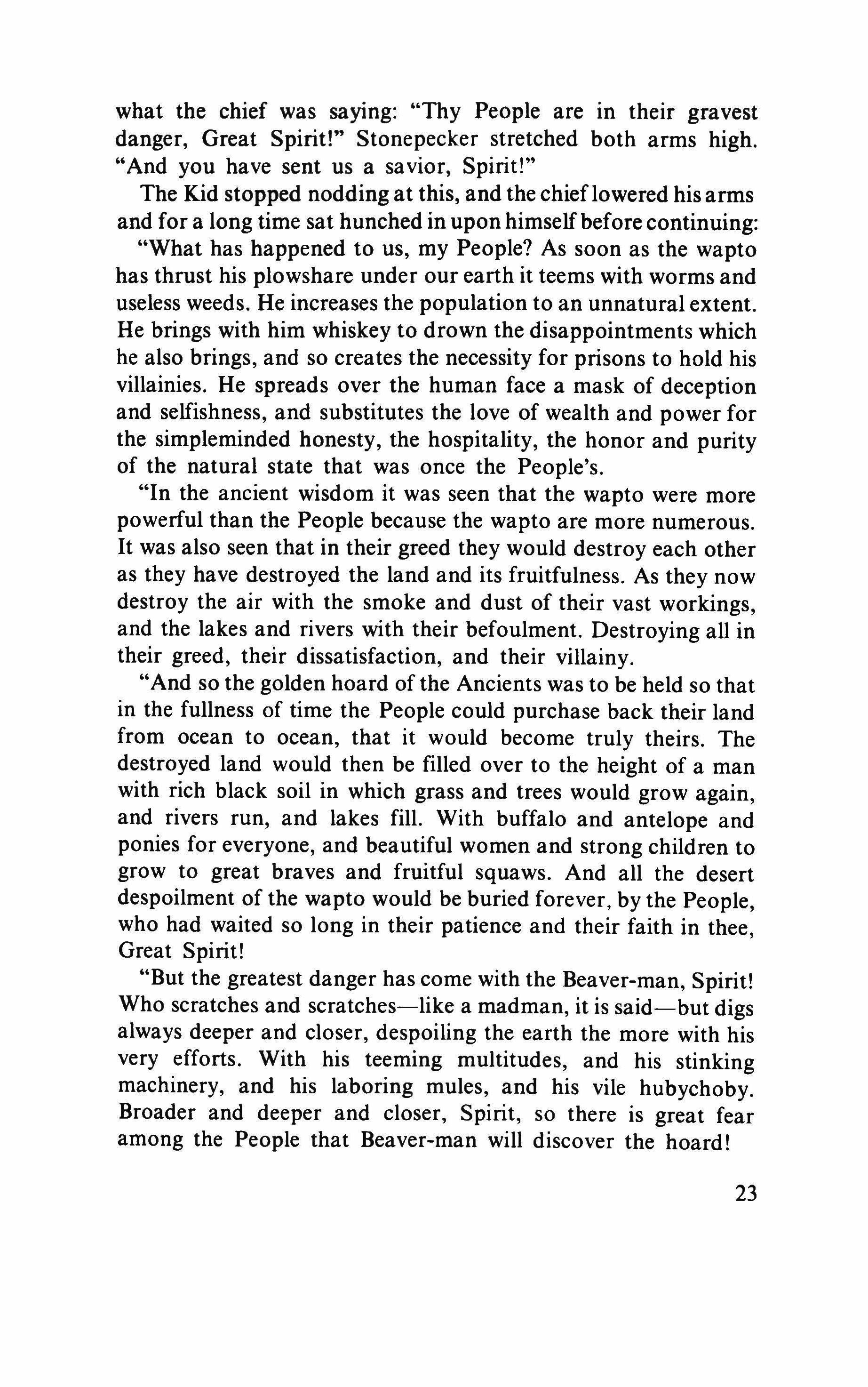
what the chief was saying: "Thy People are in their gravest danger, Great Spirit!" Stonepecker stretched both arms high. "And you have sent us a savior, Spirit!"
The Kid stopped nodding at this, and the chief lowered his arms and for a long time sat hunched in upon himself before continuing:
"What has happened to us, my People? As soon as the wapto has thrust his plowshare under our earth it teems with worms and useless weeds. He increases the population to an unnatural extent. He brings with him whiskey to drown the disappointments which he also brings, and so creates the necessity for prisons to hold his villainies. He spreads over the human face a mask of deception and selfishness, and substitutes the love of wealth and power for the simpleminded honesty, the hospitality, the honor and purity of the natural state that was once the People's.
"In the ancient wisdom it was seen that the wapto were more powerful than the People because the wapto are more numerous. It was also seen that in their greed they would destroy each other as they have destroyed the land and its fruitfulness. As they now destroy the air with the smoke and dust of their vast workings, and the lakes and rivers with their befoulment. Destroying all in their greed, their dissatisfaction, and their villainy.
"And so the golden hoard of the Ancients was to be held so that in the fullness of time the People could purchase back their land from ocean to ocean, that it would become truly theirs. The destroyed land would then be filled over to the height of a man with rich black soil in which grass and trees would grow again, and rivers run, and lakes fill. With buffalo and antelope and ponies for everyone, and beautiful women and strong children to grow to great braves and fruitful squaws. And all the desert despoilment of the wapto would be buried forever, by the People, who had waited so long in their patience and their faith in thee, Great Spirit!
"But the greatest danger has come with the Beaver-man, Spirit! Who scratches and scratches-like a madman, it is said-but digs always deeper and closer, despoiling the earth the more with his very efforts. With his teeming multitudes, and his stinking machinery, and his laboring mules, and his vile hubychoby. Broader and deeper and closer, Spirit, so there is great fear among the People that Beaver-man will discover the hoard!
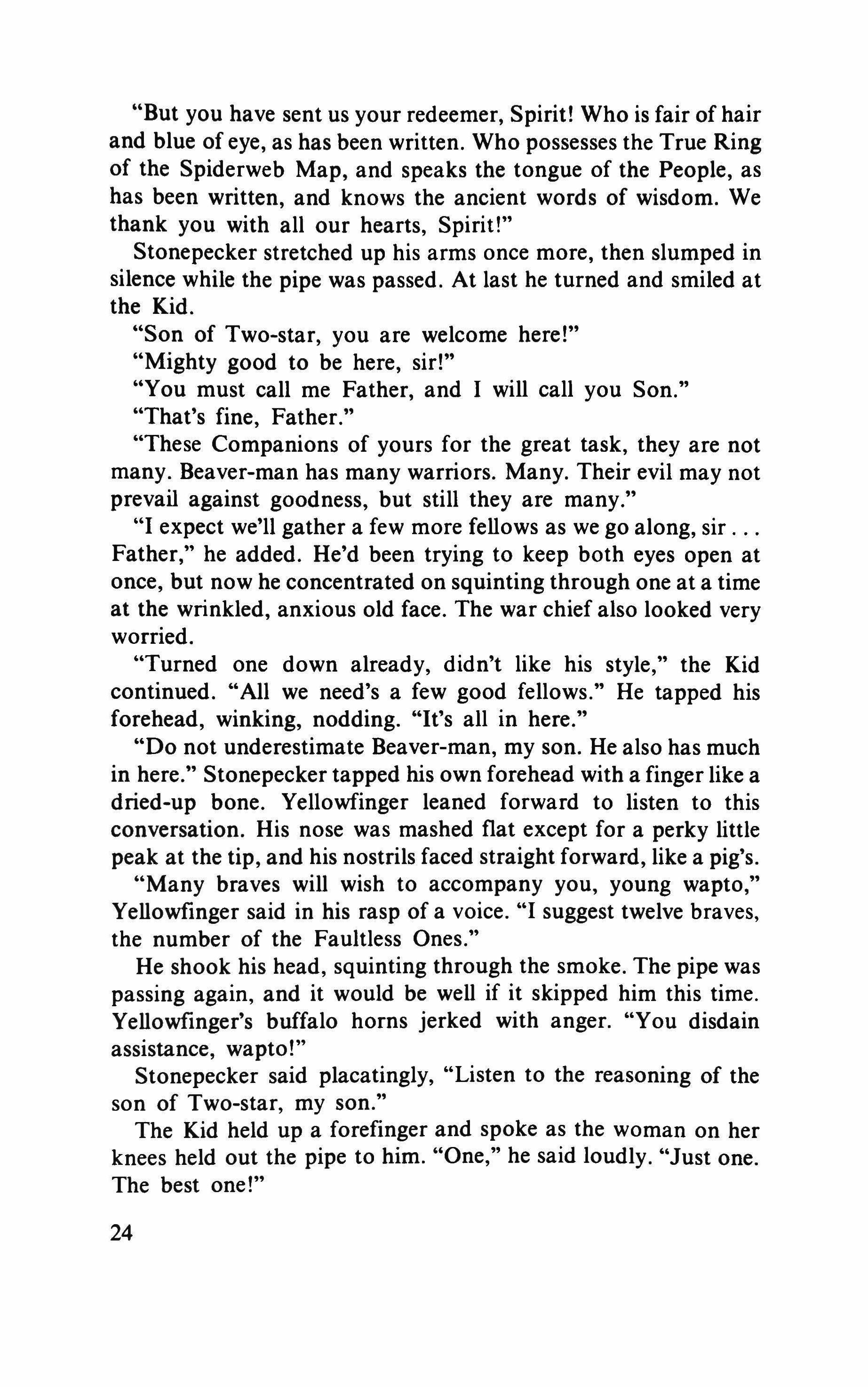
"But you have sent us your redeemer, Spirit! Who is fair of hair and blue of eye, as has been written. Who possesses the True Ring of the Spiderweb Map, and speaks the tongue of the People, as has been written, and knows the ancient words of wisdom. We thank you with all our hearts, Spirit!"
Stonepecker stretched up his arms once more, then slumped in silence while the pipe was passed. At last he turned and smiled at the Kid.
"Son of Two-star, you are welcome here!"
"Mighty good to be here, sir!"
"You must call me Father, and 1 will call you Son."
"That's fine, Father."
"These Companions of yours for the great task, they are not many. Beaver-man has many warriors. Many. Their evil may not prevail against goodness, but still they are many."
"I expect we'll gather a few more fellows as we go along, sir Father," he added. He'd been trying to keep both eyes open at once, but now he concentrated on squinting through one at a time at the wrinkled, anxious old face. The war chief also looked very worried.
"Turned one down already, didn't like his style," the Kid continued. "All we need's a few good fellows." He tapped his forehead, winking, nodding. "It's all in here."
"Do not underestimate Beaver-man, my son. He also has much in here." Stonepecker tapped his own forehead with a finger like a dried-up bone. Yellowfinger leaned forward to listen to this conversation. His nose was mashed flat except for a perky little peak at the tip, and his nostrils faced straight forward, like a pig's.
"Many braves will wish to accompany you, young wapto," Yellowfinger said in his rasp of a voice. "I suggest twelve braves, the number of the Faultless Ones."
He shook his head, squinting through the smoke. The pipe was passing again, and it would be well if it skipped him this time. Yellowfinger's buffalo horns jerked with anger. "You disdain assistance, wapto!"
Stonepecker said placatingly, "Listen to the reasoning of the son of Two-star, my son."
The Kid held up a forefinger and spoke as the woman on her knees held out the pipe to him. "One," he said loudly. "Just one. The best one!"
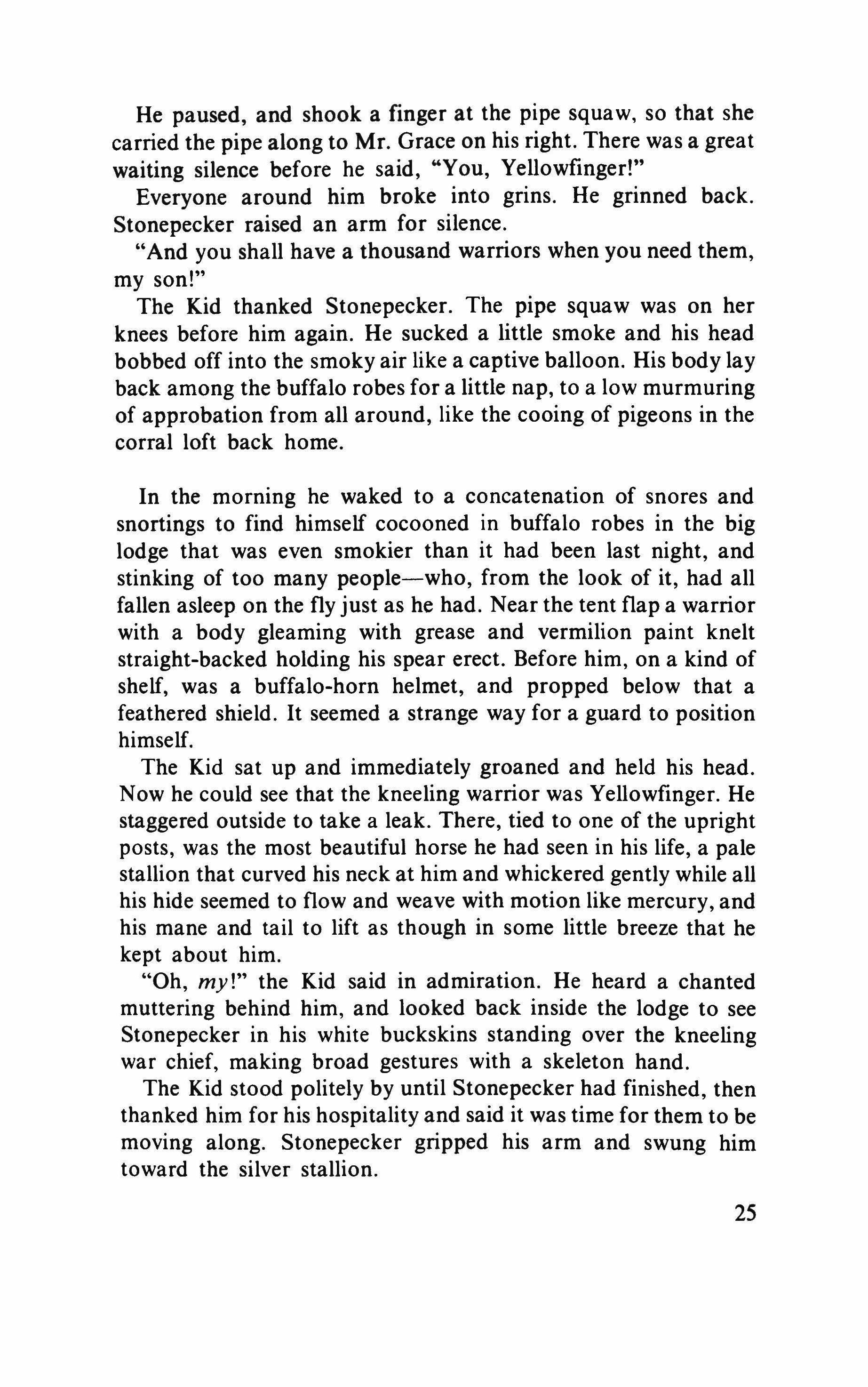
He paused, and shook a finger at the pipe squaw, so that she carried the pipe along to Mr. Grace on his right. There was a great waiting silence before he said, "You, Yellowfinger!"
Everyone around him broke into grins. He grinned back. Stonepecker raised an arm for silence.
"And you shall have a thousand warriors when you need them, my son!"
The Kid thanked Stonepecker. The pipe squaw was on her knees before him again. He sucked a little smoke and his head bobbed off into the smoky air like a captive balloon. His body lay back among the buffalo robes for a little nap, to a low murmuring of approbation from all around, like the cooing of pigeons in the corral loft back home.
In the morning he waked to a concatenation of snores and snortings to find himself cocooned in buffalo robes in the big lodge that was even smokier than it had been last night, and stinking of too many people-who, from the look of it, had all fallen asleep on the fly just as he had. Near the tent flap a warrior with a body gleaming with grease and vermilion paint knelt straight-backed holding his spear erect. Before him, on a kind of shelf, was a buffalo-horn helmet, and propped below that a feathered shield. It seemed a strange way for a guard to position himself.
The Kid sat up and immediately groaned and held his head. Now he could see that the kneeling warrior was Yellowfinger. He staggered outside to take a leak. There, tied to one of the upright posts, was the most beautiful horse he had seen in his life, a pale stallion that curved his neck at him and whickered gently while all his hide seemed to flow and weave with motion like mercury, and his mane and tail to lift as though in some little breeze that he kept about him.
"Oh, my!" the Kid said in admiration. He heard a chanted muttering behind him, and looked back inside the lodge to see Stonepecker in his white buckskins standing over the kneeling war chief, making broad gestures with a skeleton hand.
The Kid stood politely by until Stonepecker had finished, then thanked him for his hospitality and said it was time for them to be moving along. Stonepecker gripped his arm and swung him toward the silver stallion.
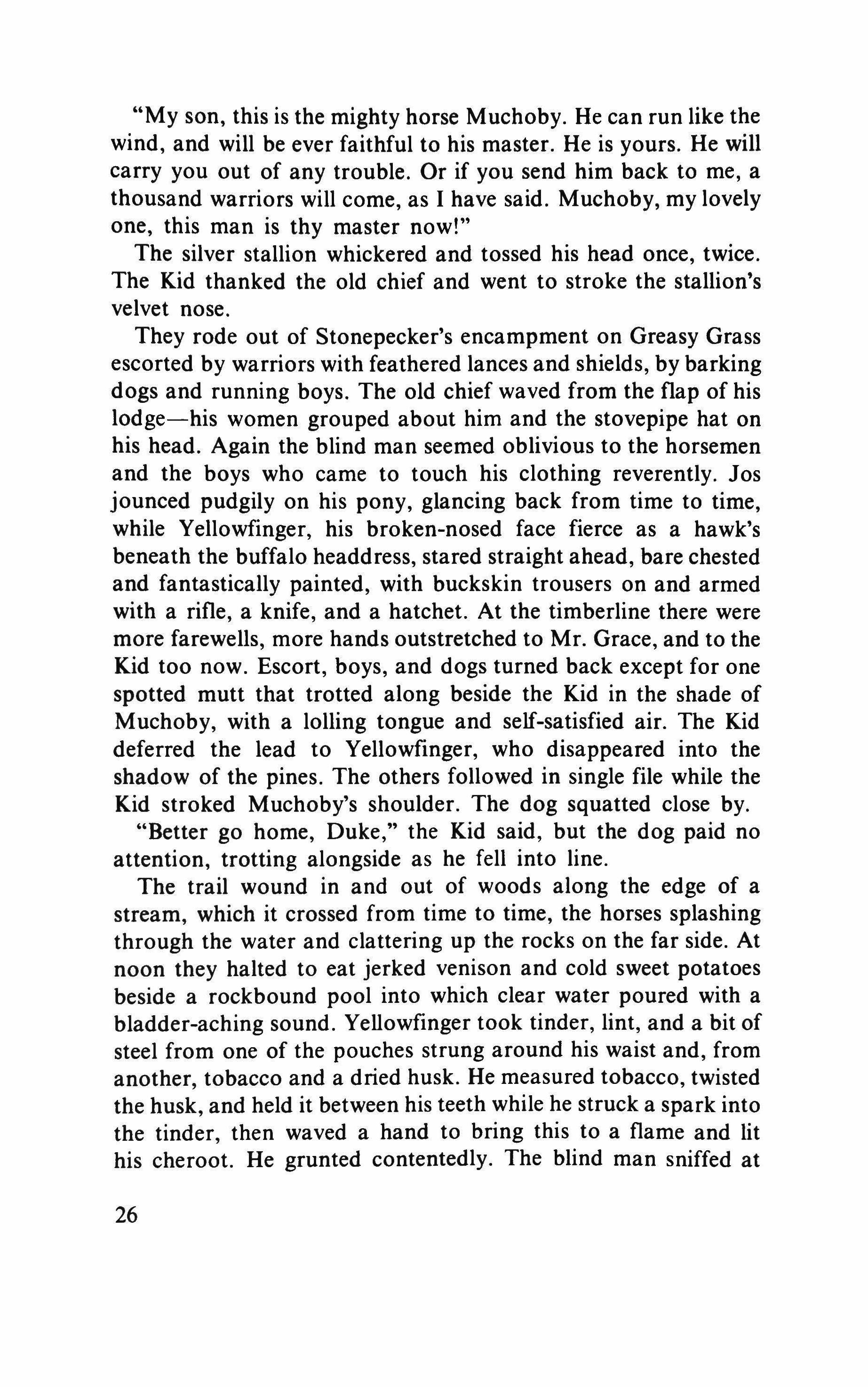
"My son, this is the mighty horse Muchoby. He can run like the wind, and will be ever faithful to his master. He is yours. He will carry you out of any trouble. Or if you send him back to me, a thousand warriors will come, as I have said. Muchoby, my lovely one, this man is thy master now!"
The silver stallion whickered and tossed his head once, twice. The Kid thanked the old chief and went to stroke the stallion's velvet nose.
They rode out of Stonepecker's encampment on Greasy Grass escorted by warriors with feathered lances and shields, by barking dogs and running boys. The old chief waved from the flap of his lodge-his women grouped about him and the stovepipe hat on his head. Again the blind man seemed oblivious to the horsemen and the boys who came to touch his clothing reverently. Jos jounced pudgily on his pony, glancing back from time to time, while Yellowfinger, his broken-nosed face fierce as a hawk's beneath the buffalo headdress, stared straight ahead, bare chested and fantastically painted, with buckskin trousers on and armed with a rifle, a knife, and a hatchet. At the timberline there were more farewells, more hands outstretched to Mr. Grace, and to the Kid too now. Escort, boys, and dogs turned back except for one spotted mutt that trotted along beside the Kid in the shade of Muchoby, with a lolling tongue and self-satisfied air. The Kid deferred the lead to Yellowfinger, who disappeared into the shadow of the pines. The others followed in single file while the Kid stroked Muchoby's shoulder. The dog squatted close by.
"Better go home, Duke," the Kid said, but the dog paid no attention, trotting alongside as he fell into line.
The trail wound in and out of woods along the edge of a stream, which it crossed from time to time, the horses splashing through the water and clattering up the rocks on the far side. At noon they halted to eat jerked venison and cold sweet potatoes beside a rockbound pool into which clear water poured with a bladder-aching sound. Yellowfinger took tinder, lint, and a bit of steel from one of the pouches strung around his waist and, from another, tobacco and a dried husk. He measured tobacco, twisted the husk, and held it between his teeth while he struck a spark into the tinder, then waved a hand to bring this to a flame and lit his cheroot. He grunted contentedly. The blind man sniffed at
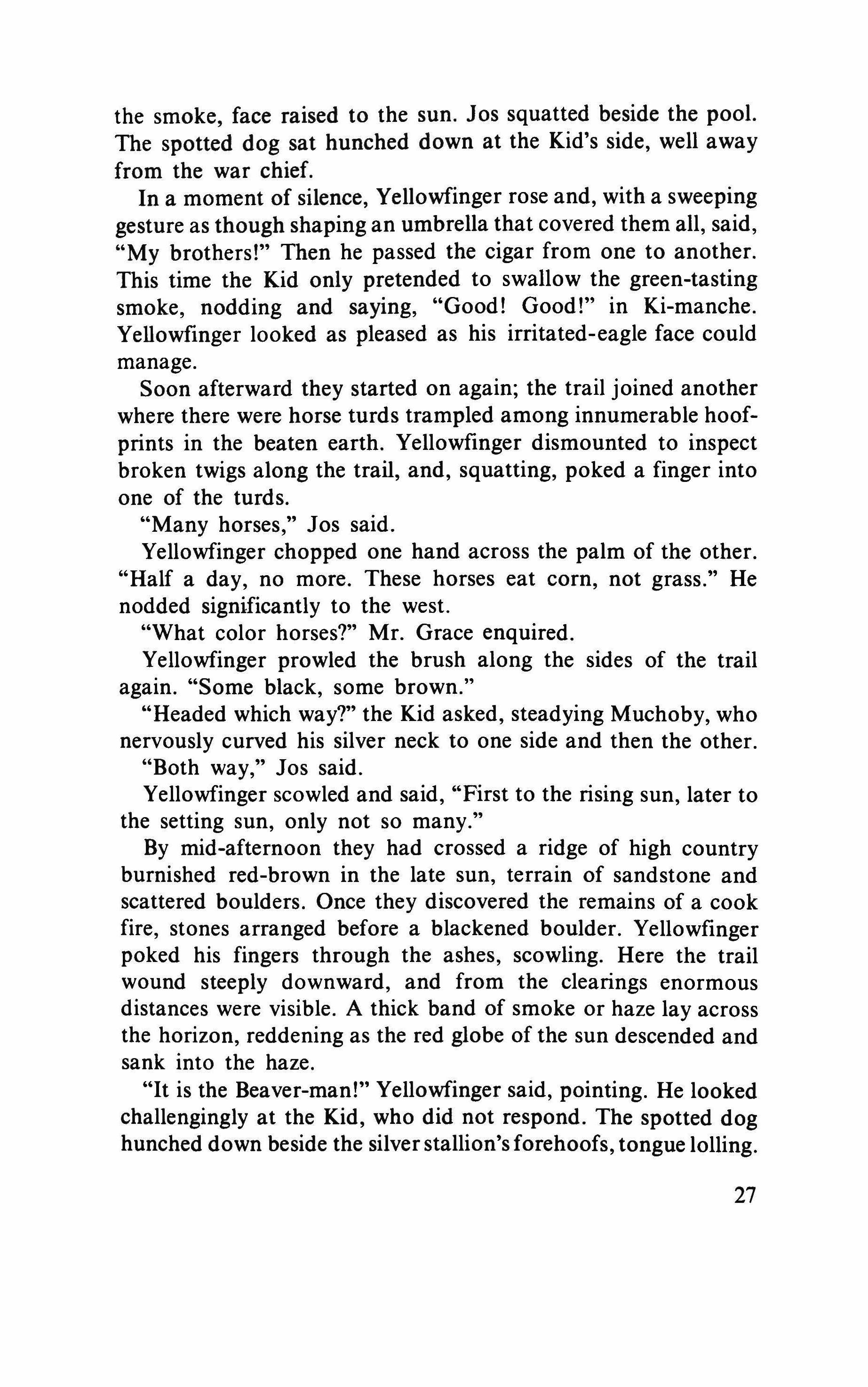
the smoke, face raised to the sun. Jos squatted beside the pool. The spotted dog sat hunched down at the Kid's side, well away from the war chief.
In a moment of silence, Yellowfinger rose and, with a sweeping gesture as though shaping an umbrella that covered them all, said, "My brothers!" Then he passed the cigar from one to another. This time the Kid only pretended to swallow the green-tasting smoke, nodding and saying, "Good! Good!" in Ki-manche, Yellowfinger looked as pleased as his irritated-eagle face could manage.
Soon afterward they started on again; the trail joined another where there were horse turds trampled among innumerable hoofprints in the beaten earth. Yellowfinger dismounted to inspect broken twigs along the trail, and, squatting, poked a finger into one of the turds.
"Many horses," Jos said.
Yellowfinger chopped one hand across the palm of the other. "Half a day, no more. These horses eat corn, not grass." He nodded significantly to the west.
"What color horses?" Mr. Grace enquired.
Yellowfinger prowled the brush along the sides of the trail again. "Some black, some brown."
"Headed which way?" the Kid asked, steadying Muchoby, who nervously curved his silver neck to one side and then the other.
"Both way," Jos said.
Yellowfinger scowled and said, "First to the rising sun, later to the setting sun, only not so many."
By mid-afternoon they had crossed a ridge of high country burnished red-brown in the late sun, terrain of sandstone and scattered boulders. Once they discovered the remains of a cook fire, stones arranged before a blackened boulder. Yellowfinger poked his fingers through the ashes, SCOWling. Here the trail wound steeply downward, and from the clearings enormous distances were visible. A thick band of smoke or haze lay across the horizon, reddening as the red globe of the sun descended and sank into the haze.
"It is the Beaver-man!" Yellowfinger said, pointing. He looked challengingly at the Kid, who did not respond. The spotted dog hunched down beside the silver stallion's forehoofs, tongue lolling.
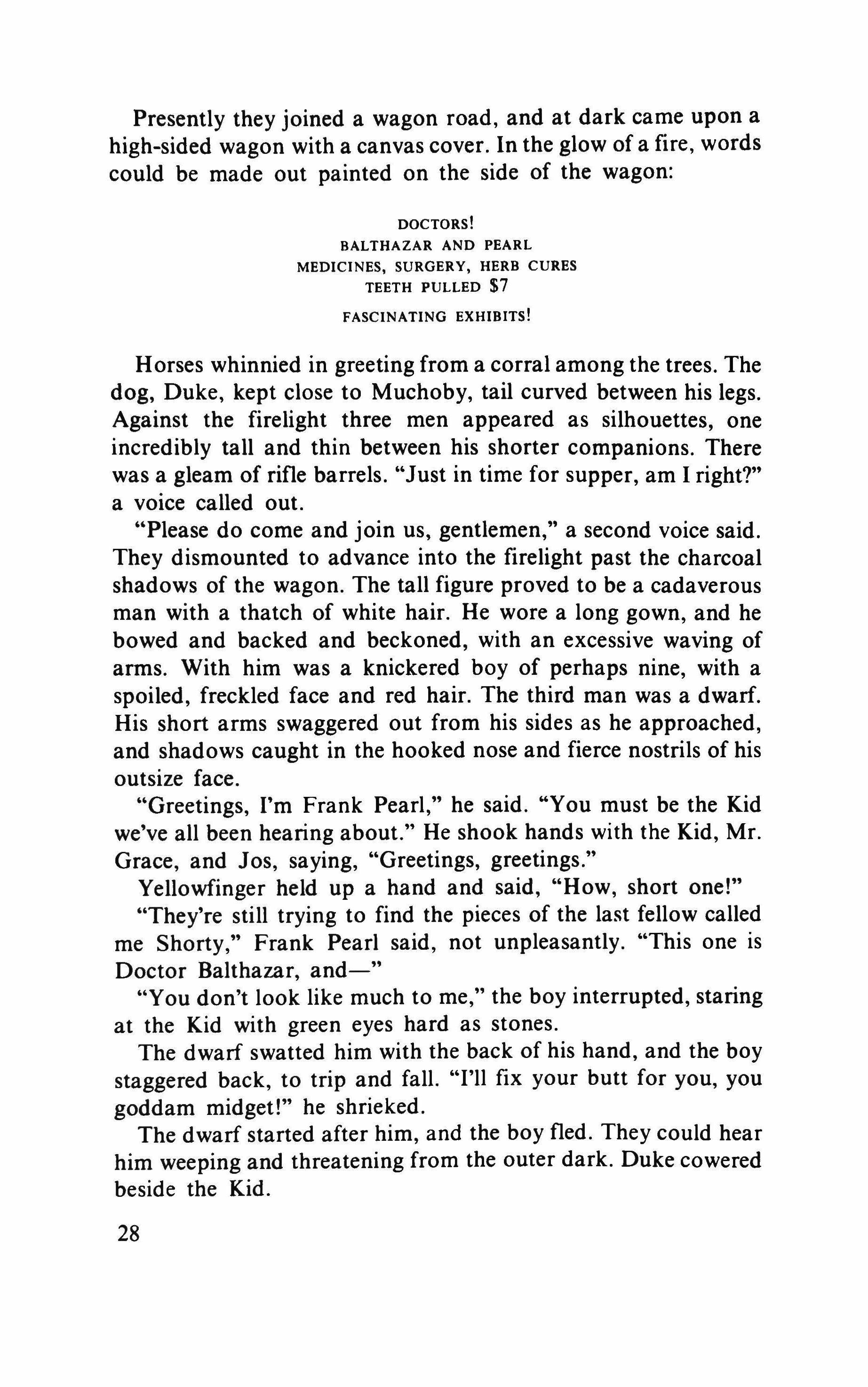
Presently they joined a wagon road, and at dark came upon a high-sided wagon with a canvas cover. In the glow of a fire, words could be made out painted on the side of the wagon:
DOCTORS!
BALTHAZAR AND PEARL
MEDICINES, SURGERY, HERB CURES
TEETH PULLED $7
FASCINATING EXHIBITS!
Horses whinnied in greeting from a corral among the trees. The dog, Duke, kept close to Muchoby, tail curved between his legs. Against the firelight three men appeared as silhouettes, one incredibly tall and thin between his shorter companions. There was a gleam of rifle barrels. "Just in time for supper, am I right?" a voice called out.
"Please do come and join us, gentlemen," a second voice said. They dismounted to advance into the firelight past the charcoal shadows of the wagon. The tall figure proved to be a cadaverous man with a thatch of white hair. He wore a long gown, and he bowed and backed and beckoned, with an excessive waving of arms. With him was a knickered boy of perhaps nine, with a spoiled, freckled face and red hair. The third man was a dwarf. His short arms swaggered out from his sides as he approached, and shadows caught in the hooked nose and fierce nostrils of his outsize face.
"Greetings, I'm Frank Pearl," he said. "You must be the Kid we've all been hearing about." He shook hands with the Kid, Mr. Grace, and Jos, saying, "Greetings, greetings."
Yellowfinger held up a hand and said, "How, short one!"
"They're still trying to find the pieces of the last fellow called me Shorty," Frank Pearl said, not unpleasantly. "This one is Doctor Balthazar, and-"
"You don't look like much to me," the boy interrupted, staring at the Kid with green eyes hard as stones.
The dwarf swatted him with the back of his hand, and the boy staggered back, to trip and fall. "I'll fix your butt for you, you goddam midget!" he shrieked.
The dwarf started after him, and the boy fled. They could hear him weeping and threatening from the outer dark. Duke cowered beside the Kid.
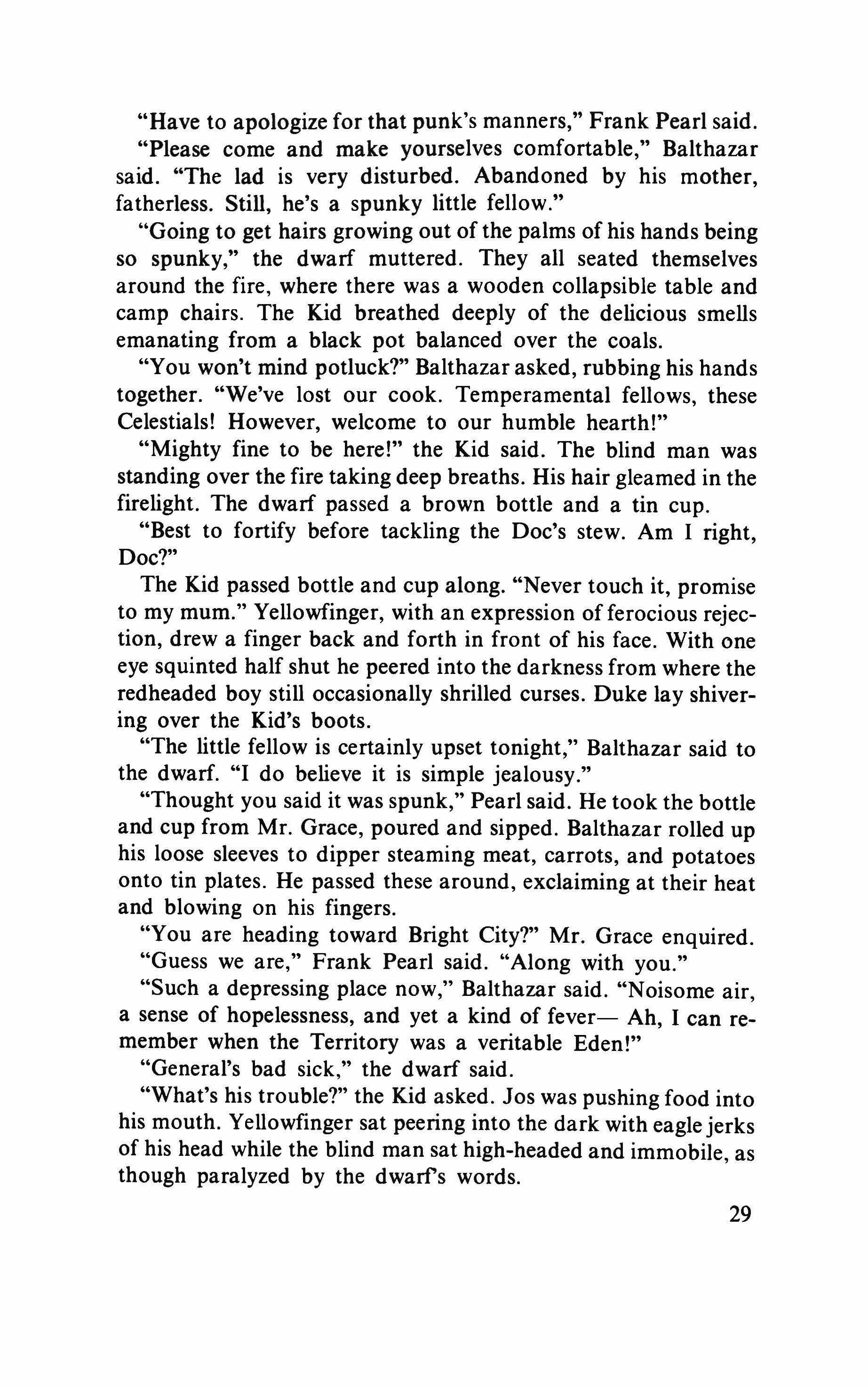
"Have to apologize for that punk's manners," Frank Pearl said. "Please come and make yourselves comfortable," Balthazar said. "The lad is very disturbed. Abandoned by his mother, fatherless. Still, he's a spunky little fellow."
"Going to get hairs growing out of the palms of his hands being so spunky," the dwarf muttered. They all seated themselves around the fire, where there was a wooden collapsible table and camp chairs. The Kid breathed deeply of the delicious smells emanating from a black pot balanced over the coals.
"You won't mind potluck?" Balthazar asked, rubbing his hands together. "We've lost our cook. Temperamental fellows, these Celestials! However, welcome to our humble hearth!"
"Mighty fine to be here!" the Kid said. The blind man was standing over the fire taking deep breaths. His hair gleamed in the firelight. The dwarf passed a brown bottle and a tin cup.
"Best to fortify before tackling the Doc's stew. Am 1 right, Doc?"
The Kid passed bottle and cup along. "Never touch it, promise to my mum." Yellowfinger, with an expression of ferocious rejection, drew a finger back and forth in front of his face. With one eye squinted half shut he peered into the darkness from where the redheaded boy still occasionally shrilled curses. Duke lay shivering over the Kid's boots.
"The little fellow is certainly upset tonight," Balthazar said to the dwarf. "I do believe it is simple jealousy."
"Thought you said it was spunk," Pearl said. He took the bottle and cup from Mr. Grace, poured and sipped. Balthazar rolled up his loose sleeves to dipper steaming meat, carrots, and potatoes onto tin plates. He passed these around, exclaiming at their heat and blowing on his fingers.
"You are heading toward Bright City?" Mr. Grace enquired.
"Guess we are," Frank Pearl said. "Along with you."
"Such a depressing place now," Balthazar said. "Noisome air, a sense of hopelessness, and yet a kind of fever- Ah, 1 can remember when the Territory was a veritable Eden!"
"General's bad sick," the dwarf said.
"What's his trouble?" the Kid asked. Jos was pushing food into his mouth. Yellowfinger sat peering into the dark with eaglejerks of his head while the blind man sat high-headed and immobile, as though paralyzed by the dwarf's words.
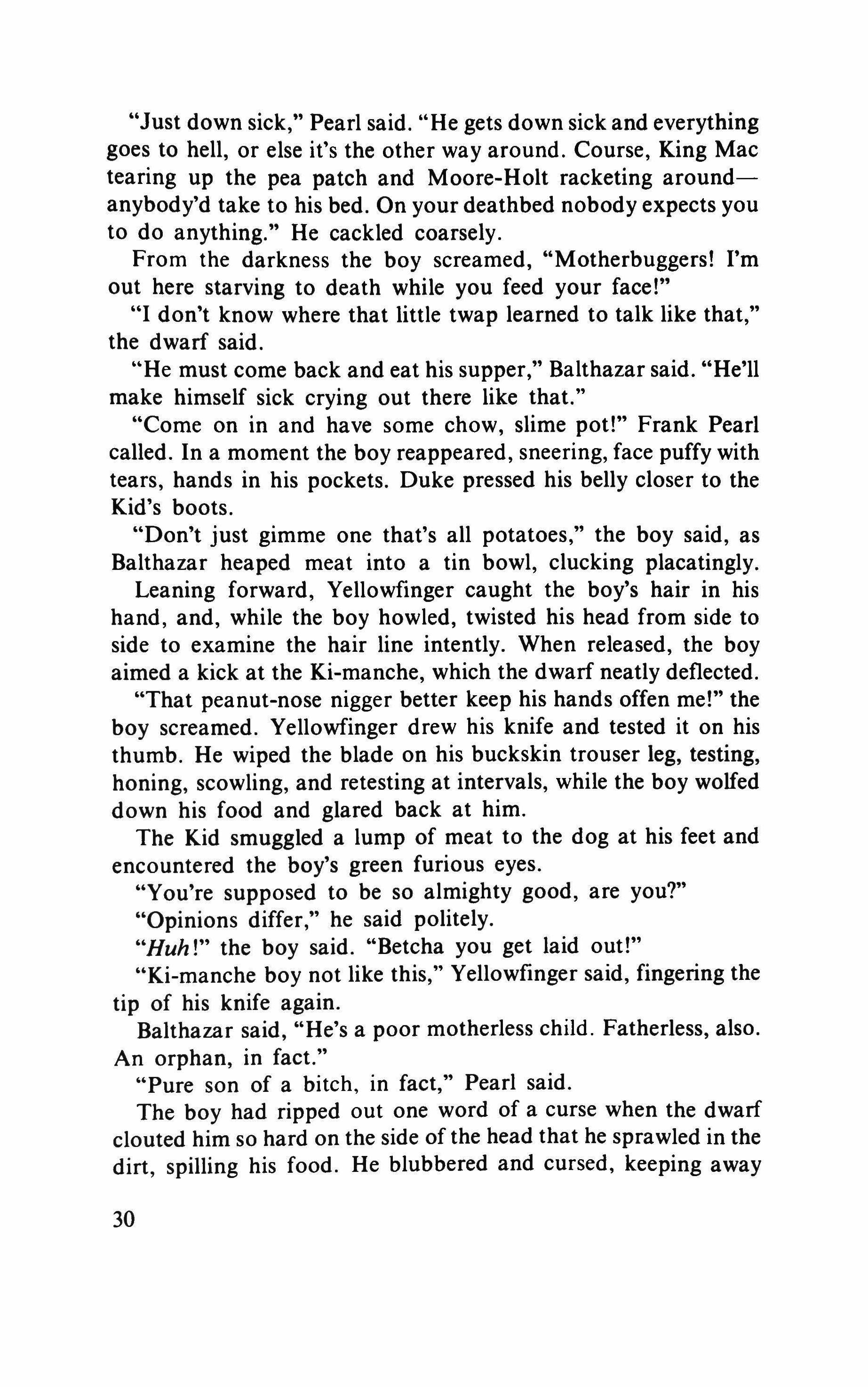
"Just down sick," Pearl said. "He gets down sick and everything goes to hell, or else it's the other way around. Course, King Mac tearing up the pea patch and Moore-Holt racketing aroundanybody'd take to his bed. On your deathbed nobody expects you to do anything." He cackled coarsely.
From the darkness the boy screamed, "Motherbuggers! I'm out here starving to death while you feed your face!"
"I don't know where that little twap learned to talk like that," the dwarf said.
"He must come back and eat his supper," Balthazar said. "He'll make himself sick crying out there like that."
"Come on in and have some chow, slime pot!" Frank Pearl called. In a moment the boy reappeared, sneering, face puffy with tears, hands in his pockets. Duke pressed his belly closer to the Kid's boots.
"Don't just gimme one that's all potatoes," the boy said, as Balthazar heaped meat into a tin bowl, clucking placatingly.
Leaning forward, Yellowfinger caught the boy's hair in his hand, and, while the boy howled, twisted his head from side to side to examine the hair line intently. When released, the boy aimed a kick at the Ki-manche, which the dwarf neatly deflected.
"That peanut-nose nigger better keep his hands offen me!" the boy screamed. Yellowfinger drew his knife and tested it on his thumb. He wiped the blade on his buckskin trouser leg, testing, honing, scowling, and retesting at intervals, while the boy wolfed down his food and glared back at him.
The Kid smuggled a lump of meat to the dog at his feet and encountered the boy's green furious eyes.
"You're supposed to be so almighty good, are you?"
"Opinions differ," he said politely.
"Huh!" the boy said. "Betcha you get laid out!"
"Ki-manche boy not like this," Yellowfinger said, fingering the tip of his knife again.
Balthazar said, "He's a poor motherless child. Fatherless, also. An orphan, in fact."
"Pure son of a bitch, in fact," Pearl said.
The boy had ripped out one word of a curse when the dwarf clouted him so hard on the side of the head that he sprawled in the dirt, spilling his food. He blubbered and cursed, keeping away
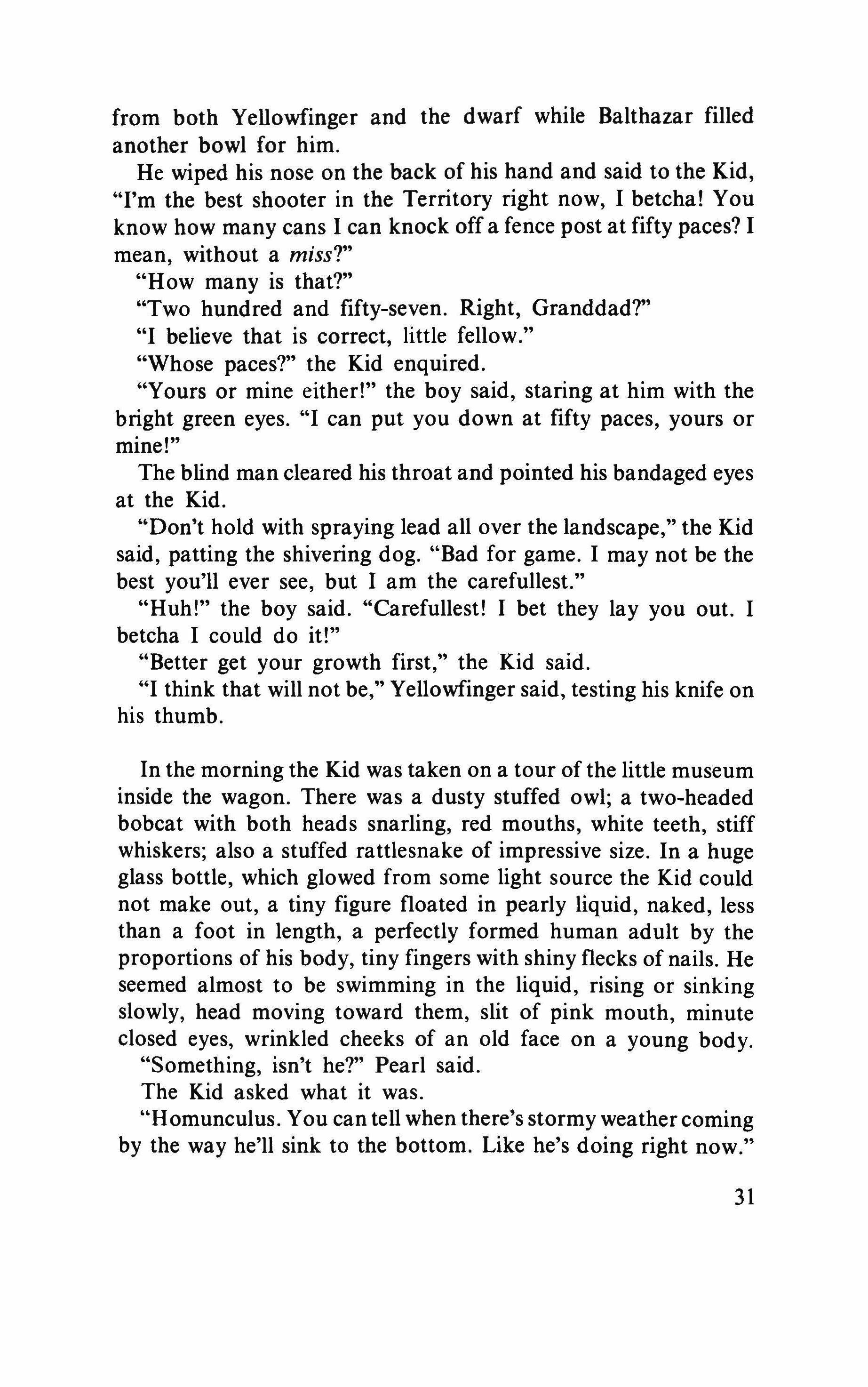
from both Yellowfinger and the dwarf while Balthazar filled another bowl for him.
He wiped his nose on the back of his hand and said to the Kid, "I'm the best shooter in the Territory right now, I betcha! You know how many cans I can knock off a fence post at fifty paces? I mean, without a miss?"
"How many is that?"
"Two hundred and fifty-seven. Right, Granddad?"
"I believe that is correct, little fellow."
"Whose paces?" the Kid enquired.
"Yours or mine either!" the boy said, staring at him with the bright green eyes. "I can put you down at fifty paces, yours or mine!"
The blind man cleared his throat and pointed his bandaged eyes at the Kid.
"Don't hold with spraying lead all over the landscape," the Kid said, patting the shivering dog. "Bad for game. I may not be the best you'll ever see, but I am the carefullest."
"Huh!" the boy said. "Carefullest! I bet they lay you out. I betcha I could do it!"
"Better get your growth first," the Kid said.
"I think that will not be," Yellowfinger said, testing his knife on his thumb.
In the morning the Kid was taken on a tour of the little museum inside the wagon. There was a dusty stuffed owl; a two-headed bobcat with both heads snarling, red mouths, white teeth, stiff whiskers; also a stuffed rattlesnake of impressive size. In a huge glass bottle, which glowed from some light source the Kid could not make out, a tiny figure floated in pearly liquid, naked, less than a foot in length, a perfectly formed human adult by the proportions of his body, tiny fingers with shiny flecks of nails. He seemed almost to be swimming in the liquid, rising or sinking slowly, head moving toward them, slit of pink mouth, minute closed eyes, wrinkled cheeks of an old face on a young body.
"Something, isn't he?" Pearl said.
The Kid asked what it was.
"Homunculus. You can tell when there's stormy weather coming by the way he'll sink to the bottom. Like he's doing right now."
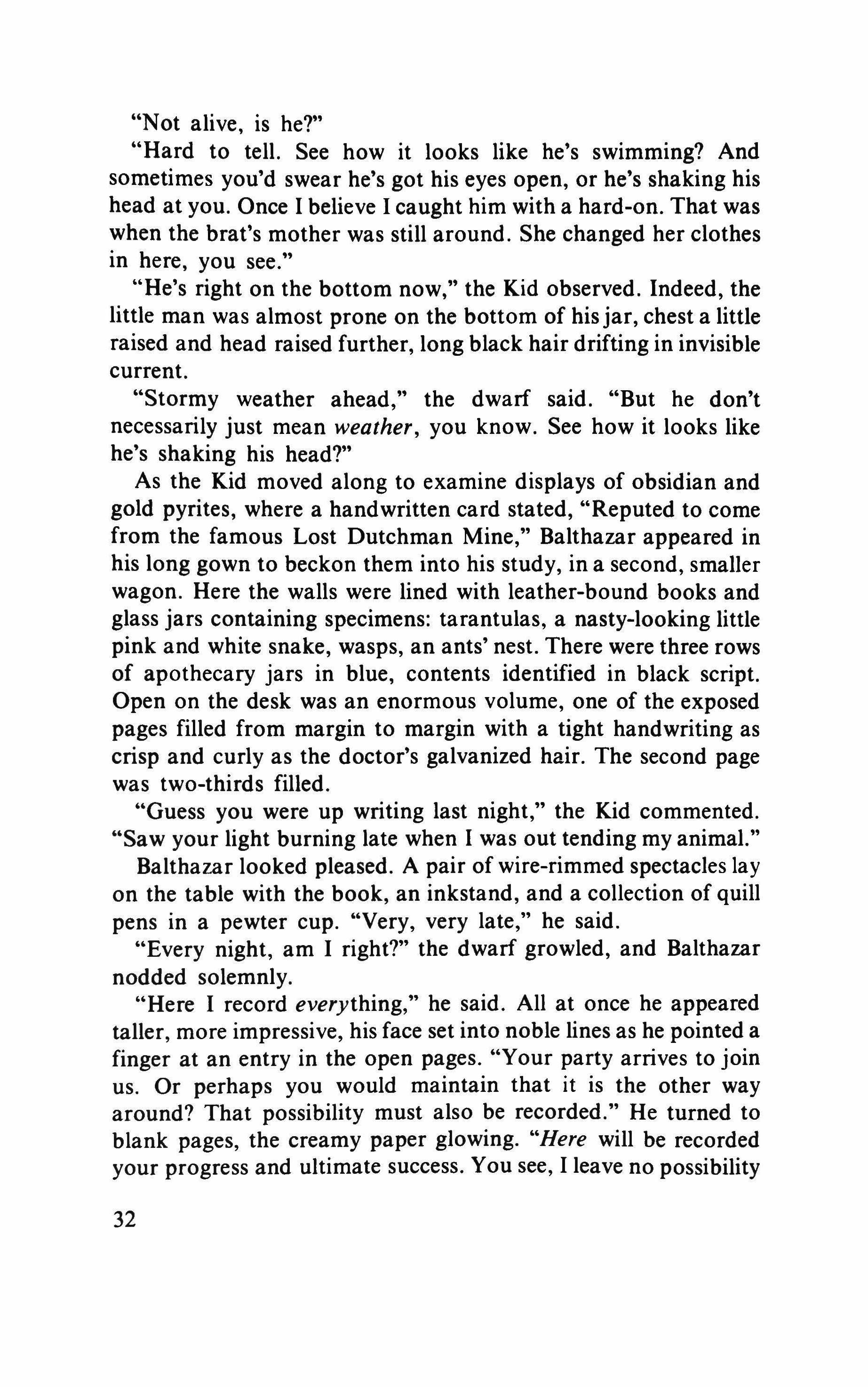
"Not alive, is he?"
"Hard to tell. See how it looks like he's swimming? And sometimes you'd swear he's got his eyes open, or he's shaking his head at you. Once I believe I caught him with a hard-on. That was when the brat's mother was still around. She changed her clothes in here, you see."
"He's right on the bottom now," the Kid observed. Indeed, the little man was almost prone on the bottom of his jar, chest a little raised and head raised further, long black hair drifting in invisible current.
"Stormy weather ahead," the dwarf said. "But he don't necessarily just mean weather, you know. See how it looks like he's shaking his head?"
As the Kid moved along to examine displays of obsidian and gold pyrites, where a handwritten card stated, "Reputed to come from the famous Lost Dutchman Mine," Balthazar appeared in his long gown to beckon them into his study, in a second, smaller wagon. Here the walls were lined with leather-bound books and glass jars containing specimens: tarantulas, a nasty-looking little pink and white snake, wasps, an ants' nest. There were three rows of apothecary jars in blue, contents identified in black script. Open on the desk was an enormous volume, one of the exposed pages filled from margin to margin with a tight handwriting as crisp and curly as the doctor's galvanized hair. The second page was two-thirds filled.
"Guess you were up writing last night," the Kid commented. "Saw your light burning late when I was out tending my animal."
Balthazar looked pleased. A pair of wire-rimmed spectacles lay on the table with the book, an inkstand, and a collection of quill pens in a pewter cup. "Very, very late," he said.
"Every night, am I right?" the dwarf growled, and Balthazar nodded solemnly.
"Here I record everything," he said. All at once he appeared taller, more impressive, his face set into noble lines as he pointed a finger at an entry in the open pages. "Your party arrives to join us. Or perhaps you would maintain that it is the other way around? That possibility must also be recorded." He turned to blank pages, the creamy paper glowing. "Here will be recorded your progress and ultimate success. You see, I leave no possibility
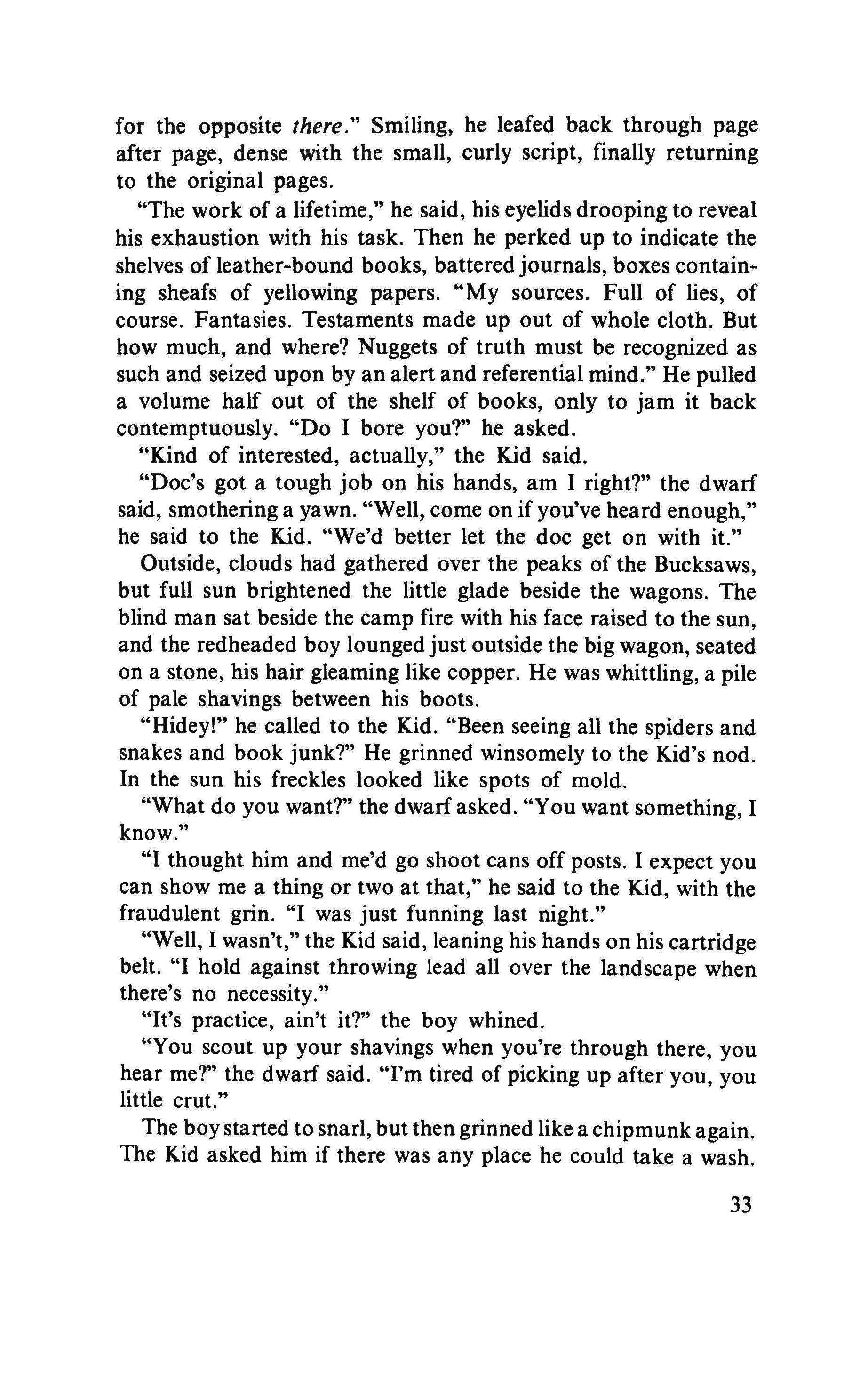
for the opposite there." Smiling, he leafed back through page after page, dense with the small, curly script, finally returning to the original pages.
"The work of a lifetime," he said, his eyelids drooping to reveal his exhaustion with his task. Then he perked up to indicate the shelves of leather-bound books, battered journals, boxes containing sheafs of yellowing papers. "My sources. Full of lies, of course. Fantasies. Testaments made up out of whole cloth. But how much, and where? Nuggets of truth must be recognized as such and seized upon by an alert and referential mind." He pulled a volume half out of the shelf of books, only to jam it back contemptuously. "Do I bore you?" he asked.
"Kind of interested, actually," the Kid said.
"Doc's got a tough job on his hands, am I right?" the dwarf said, smothering a yawn. "Well, come on if you've heard enough," he said to the Kid. "We'd better let the doc get on with it."
Outside, clouds had gathered over the peaks of the Bucksaws, but full sun brightened the little glade beside the wagons. The blind man sat beside the camp fire with his face raised to the sun, and the redheaded boy lounged just outside the big wagon, seated on a stone, his hair gleaming like copper. He was whittling, a pile of pale shavings between his boots.
"Hidey!" he called to the Kid. "Been seeing all the spiders and snakes and book junk?" He grinned winsomely to the Kid's nod. In the sun his freckles looked like spots of mold.
"What do you want?" the dwarf asked. "You want something, I know."
"I thought him and me'd go shoot cans off posts. 1 expect you can show me a thing or two at that," he said to the Kid, with the fraudulent grin. "I was just funning last night."
"Well, 1 wasn't," the Kid said, leaning his hands on his cartridge belt. "I hold against throwing lead all over the landscape when there's no necessity."
"It's practice, ain't it?" the boy whined.
"You scout up your shavings when you're through there, you hear me?" the dwarf said. "I'm tired of picking up after you, you little crut."
The boy started to snarl, but then grinned like a chipmunkagain. The Kid asked him if there was any place he could take a wash.
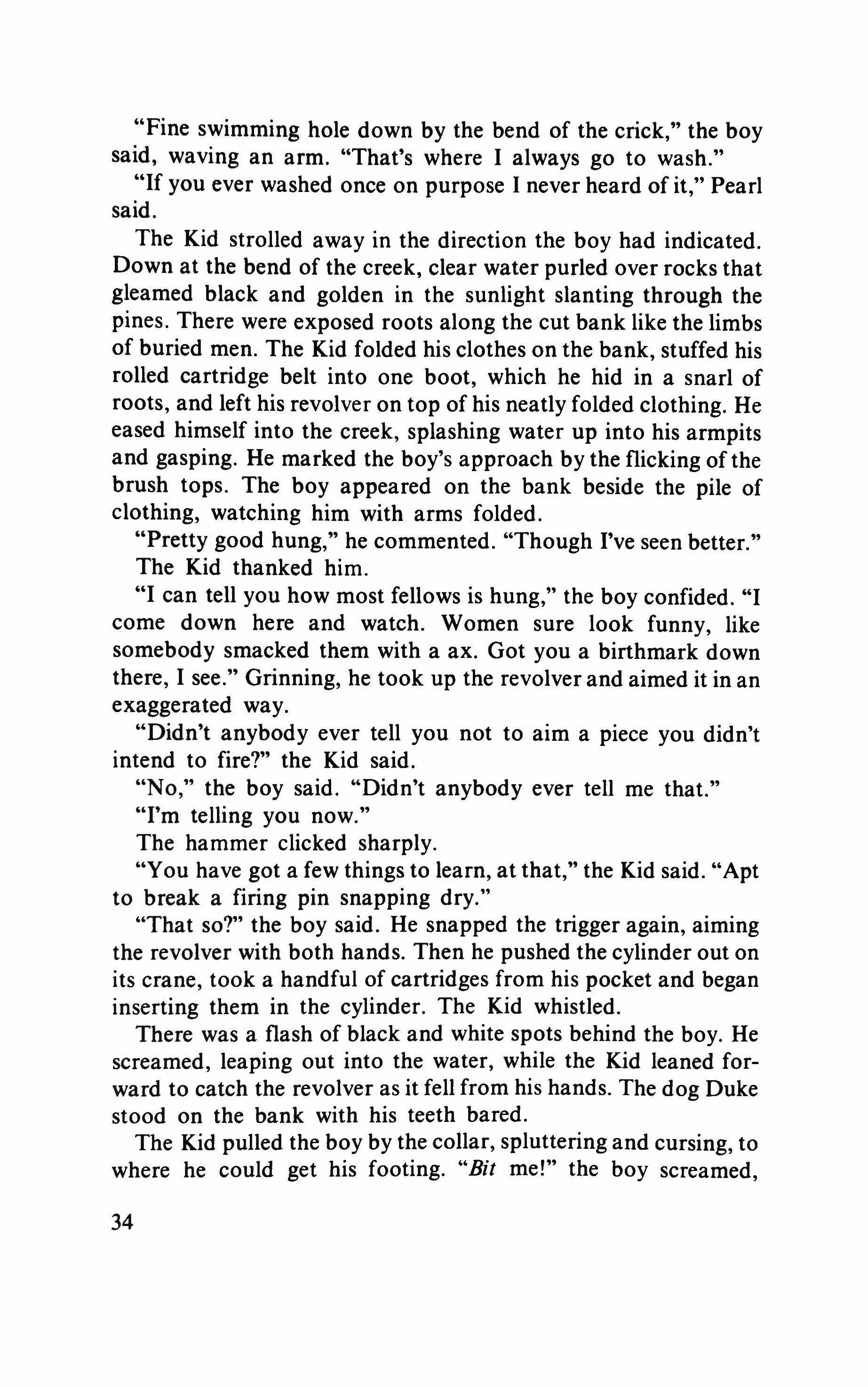
"Fine swimming hole down by the bend of the crick," the boy said, waving an arm. "That's where I always go to wash."
"If you ever washed once on purpose I never heard of it," Pearl said.
The Kid strolled away in the direction the boy had indicated. Down at the bend of the creek, clear water purled over rocks that gleamed black and golden in the sunlight slanting through the pines. There were exposed roots along the cut bank like the limbs of buried men. The Kid folded his clothes on the bank, stuffed his rolled cartridge belt into one boot, which he hid in a snarl of roots, and left his revolver on top of his neatly folded clothing. He eased himself into the creek, splashing water up into his armpits and gasping. He marked the boy's approach by the flicking of the brush tops. The boy appeared on the bank beside the pile of clothing, watching him with arms folded.
"Pretty good hung," he commented. "Though I've seen better."
The Kid thanked him.
"I can tell you how most fellows is hung," the boy confided. "I come down here and watch. Women sure look funny, like somebody smacked them with a ax. Got you a birthmark down there, I see." Grinning, he took up the revolver and aimed it in an exaggerated way.
"Didn't anybody ever tell you not to aim a piece you didn't intend to fire?" the Kid said.
"No," the boy said. "Didn't anybody ever tell me that."
"I'm telling you now."
The hammer clicked sharply.
"You have got a few things to learn, at that," the Kid said. "Apt to break a firing pin snapping dry."
'That so?" the boy said. He snapped the trigger again, aiming the revolver with both hands. Then he pushed the cylinder out on its crane, took a handful of cartridges from his pocket and began inserting them in the cylinder. The Kid whistled.
There was a flash of black and white spots behind the boy. He screamed, leaping out into the water, while the Kid leaned forward to catch the revolver as it fell from his hands. The dog Duke stood on the bank with his teeth bared.
The Kid pulled the boy by the collar, spluttering and cursing, to where he could get his footing. "Bit me!" the boy screamed,
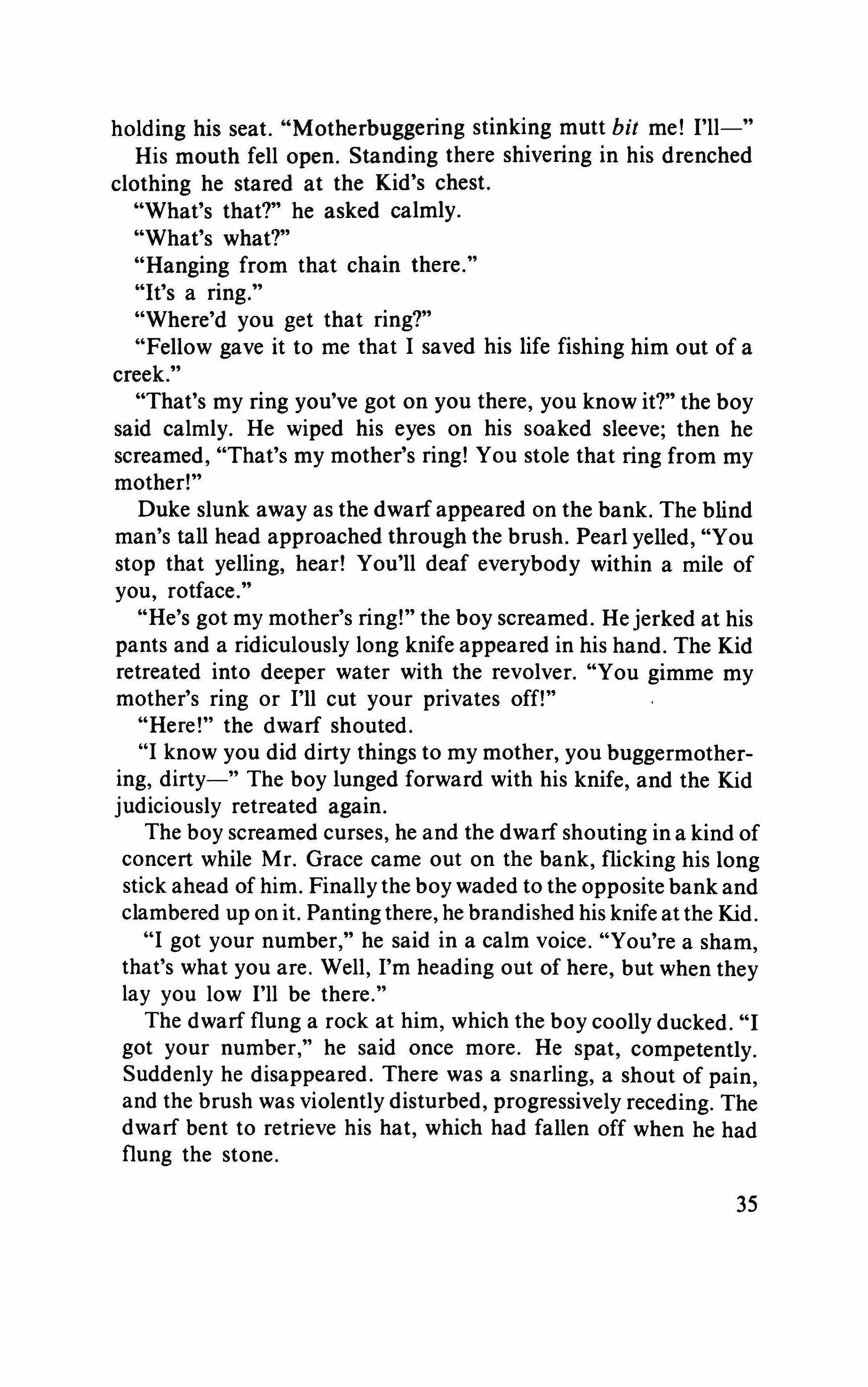
holding his seat. "Motherbuggering stinking mutt bit me! 1'11-" His mouth fell open. Standing there shivering in his drenched clothing he stared at the Kid's chest.
"What's that?" he asked calmly.
"What's what?"
"Hanging from that chain there."
"It's a ring."
"Where'd you get that ring?"
"Fellow gave it to me that 1 saved his life fishing him out of a creek."
"That's my ring you've got on you there, you know it?" the boy said calmly. He wiped his eyes on his soaked sleeve; then he screamed, "That's my mother's ring! You stole that ring from my mother!"
Duke slunk away as the dwarf appeared on the bank. The blind man's tall head approached through the brush. Pearl yelled, "You stop that yelling, hear! You'll deaf everybody within a mile of you, rotface."
"He's got my mother's ring!" the boy screamed. He jerked at his pants and a ridiculously long knife appeared in his hand. The Kid retreated into deeper water with the revolver. "You gimme my mother's ring or I'll cut your privates off!"
"Here!" the dwarf shouted.
"I know you did dirty things to my mother, you buggermothering, dirty-to The boy lunged forward with his knife, and the Kid judiciously retreated again.
The boy screamed curses, he and the dwarf shouting in a kind of concert while Mr. Grace came out on the bank, flicking his long stick ahead of him. Finally the boy waded to the opposite bank and clambered up on it. Pantingthere, he brandished his knife at the Kid.
"I got your number," he said in a calm voice. "You're a sham, that's what you are. Well, I'm heading out of here, but when they lay you low I'll be there."
The dwarf flung a rock at him, which the boy coolly ducked. "I got your number," he said once more. He spat, competently. Suddenly he disappeared. There was a snarling, a shout of pain, and the brush was violently disturbed, progressively receding. The dwarf bent to retrieve his hat, which had fallen off when he had flung the stone.
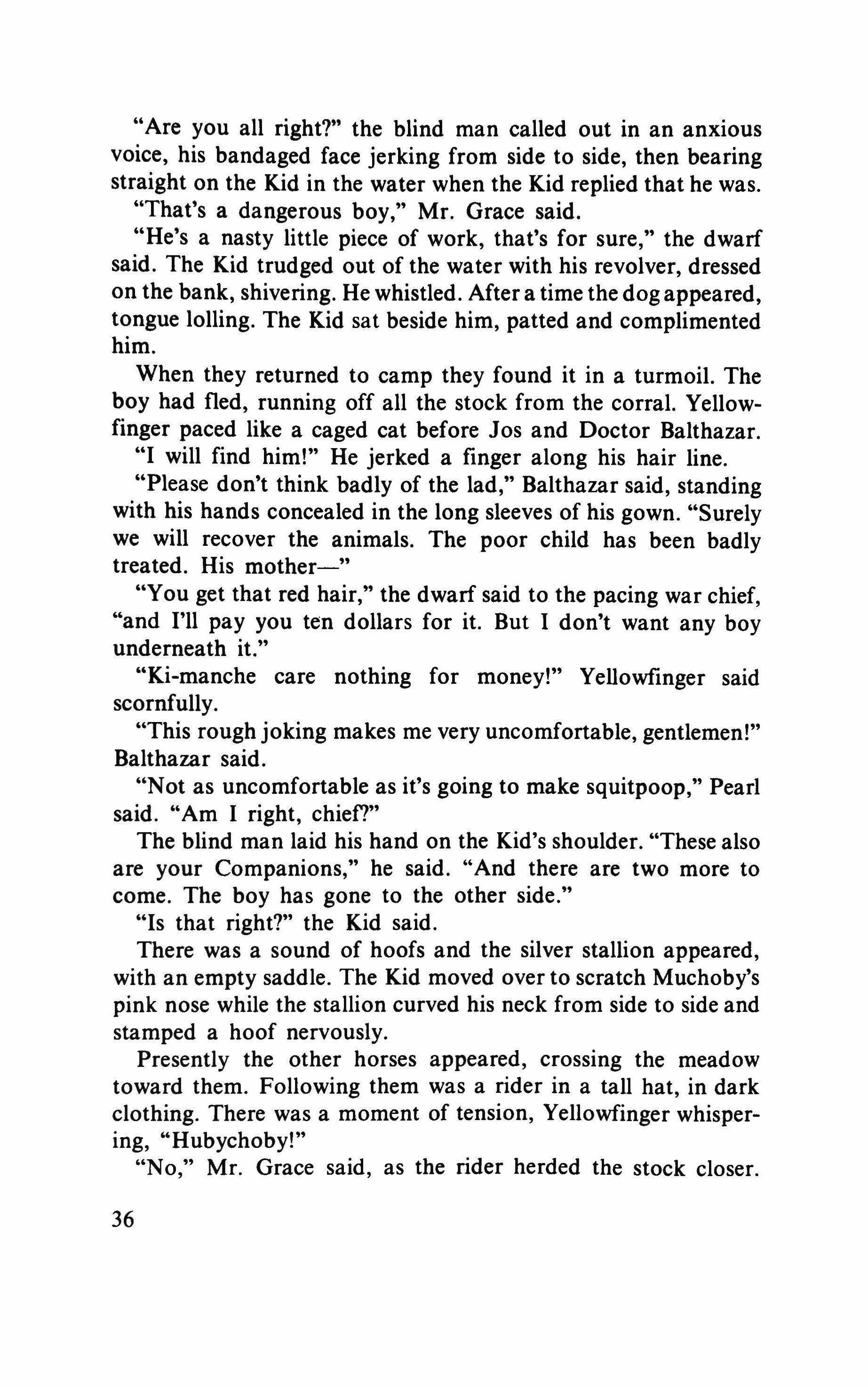
"Are you all right?" the blind man called out in an anxious voice, his bandaged face jerking from side to side, then bearing straight on the Kid in the water when the Kid replied that he was.
"That's a dangerous boy," Mr. Grace said.
"He's a nasty little piece of work, that's for sure," the dwarf said. The Kid trudged out of the water with his revolver, dressed on the bank, shivering. He whistled. After a time the dogappeared, tongue lolling. The Kid sat beside him, patted and complimented him.
When they returned to camp they found it in a turmoil. The boy had fled, running off all the stock from the corral. Yellowfinger paced like a caged cat before Jos and Doctor Balthazar.
"I will find him!" He jerked a finger along his hair line.
"Please don't think badly of the lad," Balthazar said, standing with his hands concealed in the long sleeves of his gown. "Surely we will recover the animals. The poor child has been badly treated. His mother=-"
"You get that red hair," the dwarf said to the pacing war chief, "and I'll pay you ten dollars for it. But I don't want any boy underneath it."
"Ki-manche care nothing for money!" Yellowfinger said scornfully.
"This rough joking makes me very uncomfortable, gentlemen!" Balthazar said.
"Not as uncomfortable as it's going to make squitpoop," Pearl said. "Am I right, chien"
The blind man laid his hand on the Kid's shoulder. "These also are your Companions," he said. "And there are two more to come. The boy has gone to the other side."
"Is that right?" the Kid said.
There was a sound of hoofs and the silver stallion appeared, with an empty saddle. The Kid moved over to scratch Muchoby's pink nose while the stallion curved his neck from side to side and stamped a hoof nervously.
Presently the other horses appeared, crossing the meadow toward them. Following them was a rider in a tall hat, in dark clothing. There was a moment of tension, Yellowfinger whispering, "Hubychoby!"
"No," Mr. Grace said, as the rider herded the stock closer.

Docilely the horses plodded through the open gate of the little corral. The man accompanying them had a dark brown complexion that looked as much due to whiskey as to sun and wind. His eyeballs were yellow, and his graying mustache drooped on either side of his chin. "My name's Dockerty," he said.
The Kid reached up to shake his hand.
"So you finally come," Dockerty said. "Everybody's been waiting a time."
"Thank you for bringing back our stock," the Kid said.
"Horses are what I'm good at," the other said. He hooked a knee around his saddle horn and sat looking from face to face, as though ticking each one off. "Some bunch," he said, and slipped from a pouch a flat pint bottle half full of whiskey. He tipped this to his lips.
"Come to ride along," he said, wiping his mouth and recorking the bottle.
"You are welcome," the Kid said in a firm voice. "But you will have to take the pledge."
"Surely," Dockerty said. He shied the bottle off into the brush, swung down off his black mare, and began to shake hands all around.
3
At first light the Kid rose. Yawning and scratching, and accompanied by snores from the other bedrolls, he wandered around the side of the wagon to relieve himself in a clump of scrub brush in the gully where they had camped the night. A big man in a uniform appeared and stuck the muzzle of a carbine into his ribs.
"Pull 'em down!" the man snarled. "I want to see what you wear on your belly!"
Wincing on the pebbly ground in his bare feet, the Kid started to unshuck his longhandles. There was a flash of black and white as Duke shot out from under the wagon and fastened his teeth into the big soldier's leg. With a curse the man swung the barrel of his carbine, and Duke dodged and fled, yelping. While the Kid pulled down his underwear, _the soldier continued to curse in a monotone. He was a bulky man with a straggle of graying hair protruding from beneath his forage cap. Stacked yellow chevrons
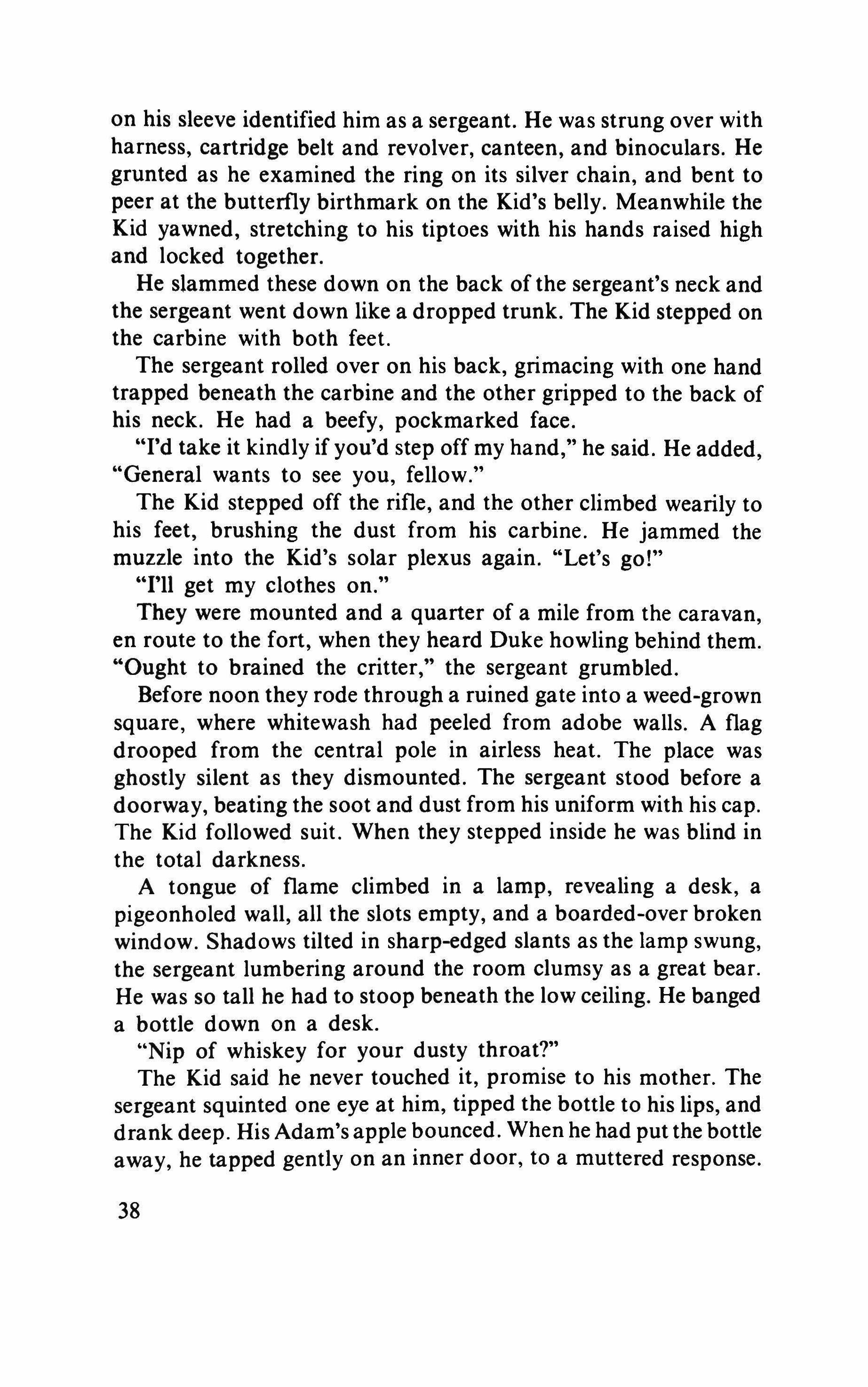
on his sleeve identified him as a sergeant. He was strung over with harness, cartridge belt and revolver, canteen, and binoculars. He grunted as he examined the ring on its silver chain, and bent to peer at the butterfly birthmark on the Kid's belly. Meanwhile the Kid yawned, stretching to his tiptoes with his hands raised high and locked together.
He slammed these down on the back of the sergeant's neck and the sergeant went down like a dropped trunk. The Kid stepped on the carbine with both feet.
The sergeant rolled over on his back, grimacing with one hand trapped beneath the carbine and the other gripped to the back of his neck. He had a beefy, pockmarked face.
"I'd take it kindly if you'd step off my hand," he said. He added, "General wants to see you, fellow."
The Kid stepped off the rifle, and the other climbed wearily to his feet, brushing the dust from his carbine. He jammed the muzzle into the Kid's solar plexus again. "Let's go!"
"I'll get my clothes on."
They were mounted and a quarter of a mile from the caravan, en route to the fort, when they heard Duke howling behind them. "Ought to brained the critter," the sergeant grumbled.
Before noon they rode through a ruined gate into a weed-grown square, where whitewash had peeled from adobe walls. A flag drooped from the central pole in airless heat. The place was ghostly silent as they dismounted. The sergeant stood before a doorway, beating the soot and dust from his uniform with his cap. The Kid followed suit. When they stepped inside he was blind in the total darkness.
A tongue of flame climbed in a lamp, revealing a desk, a pigeonholed wall, all the slots empty, and a boarded-over broken window. Shadows tilted in sharp-edged slants as the lamp swung, the sergeant lumbering around the room clumsy as a great bear. He was so tall he had to stoop beneath the low ceiling. He banged a bottle down on a desk.
"Nip of whiskey for your dusty throat?"
The Kid said he never touched it, promise to his mother. The sergeant squinted one eye at him, tipped the bottle to his lips, and drank deep. His Adam's apple bounced. When he had put the bottle away, he tapped gently on an inner door, to a muttered response.
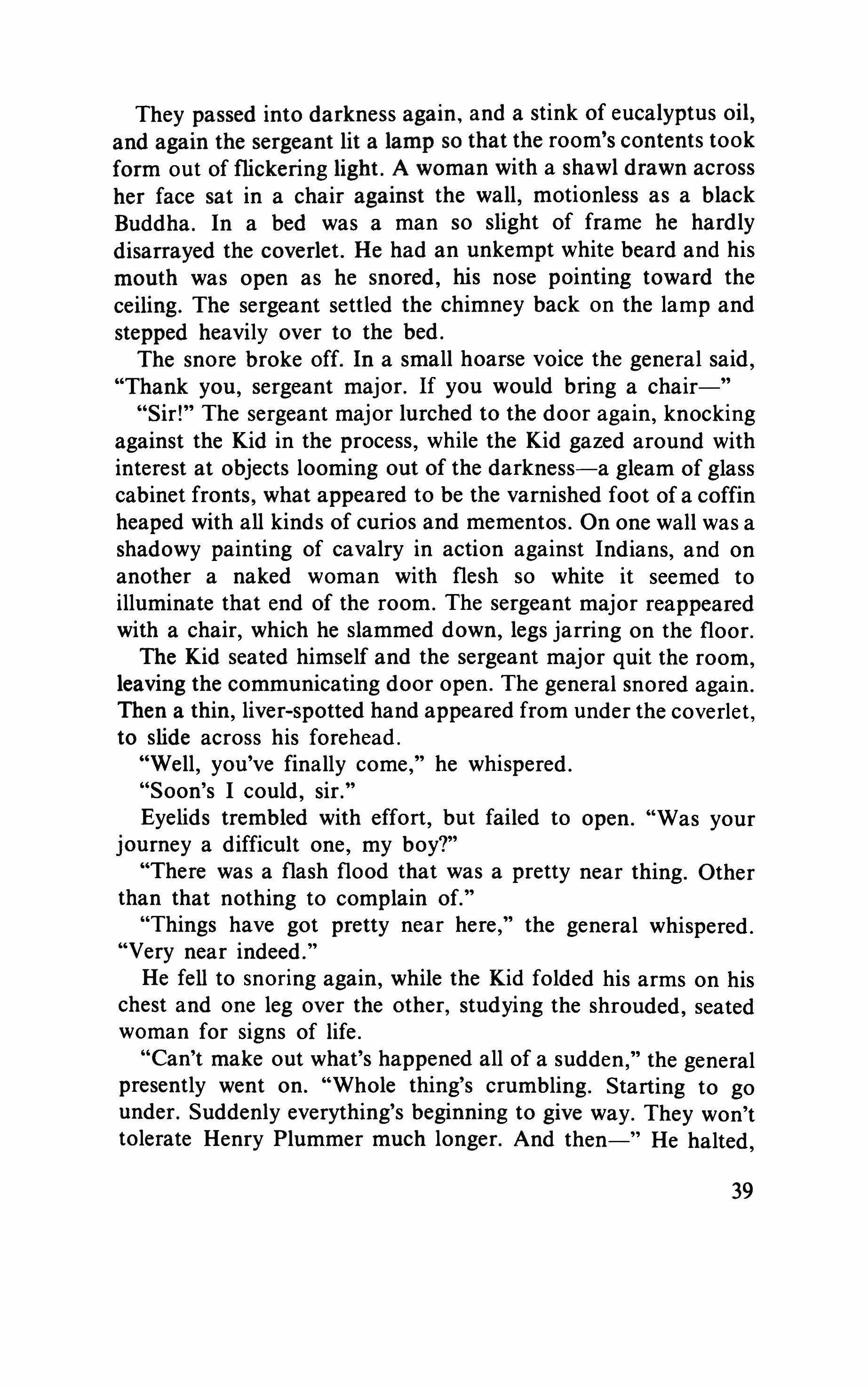
They passed into darkness again, and a stink of eucalyptus oil, and again the sergeant lit a lamp so that the room's contents took form out of flickering light. A woman with a shawl drawn across her face sat in a chair against the wall, motionless as a black Buddha. In a bed was a man so slight of frame he hardly disarrayed the coverlet. He had an unkempt white beard and his mouth was open as he snored, his nose pointing toward the ceiling. The sergeant settled the chimney back on the lamp and stepped heavily over to the bed.
The snore broke off. In a small hoarse voice the general said, "Thank you, sergeant major. If you would bring a chair-to "Sir!" The sergeant major lurched to the door again, knocking against the Kid in the process, while the Kid gazed around with interest at objects looming out of the darkness-a gleam of glass cabinet fronts, what appeared to be the varnished foot of a coffin heaped with all kinds of curios and mementos. On one wall was a shadowy painting of cavalry in action against Indians, and on another a naked woman with flesh so white it seemed to illuminate that end of the room. The sergeant major reappeared with a chair, which he slammed down, legs jarring on the floor.
The Kid seated himself and the sergeant major quit the room, leaving the communicating door open. The general snored again. Then a thin, liver-spotted hand appeared from under the coverlet, to slide across his forehead.
"Well, you've finally come," he whispered. "Soon's I could, sir."
Eyelids trembled with effort, but failed to open. "Was your journey a difficult one, my boy?"
"There was a flash flood that was a pretty near thing. Other than that nothing to complain of."
"Things have got pretty near here," the general whispered. "Very near indeed."
He fell to snoring again, while the Kid folded his arms on his chest and one leg over the other, studying the shrouded, seated woman for signs of life.
"Can't make out what's happened all of a sudden," the general presently went on. "Whole thing's crumbling. Starting to go under. Suddenly everything's beginning to give way. They won't tolerate Henry Plummer much longer. And then-" He halted,
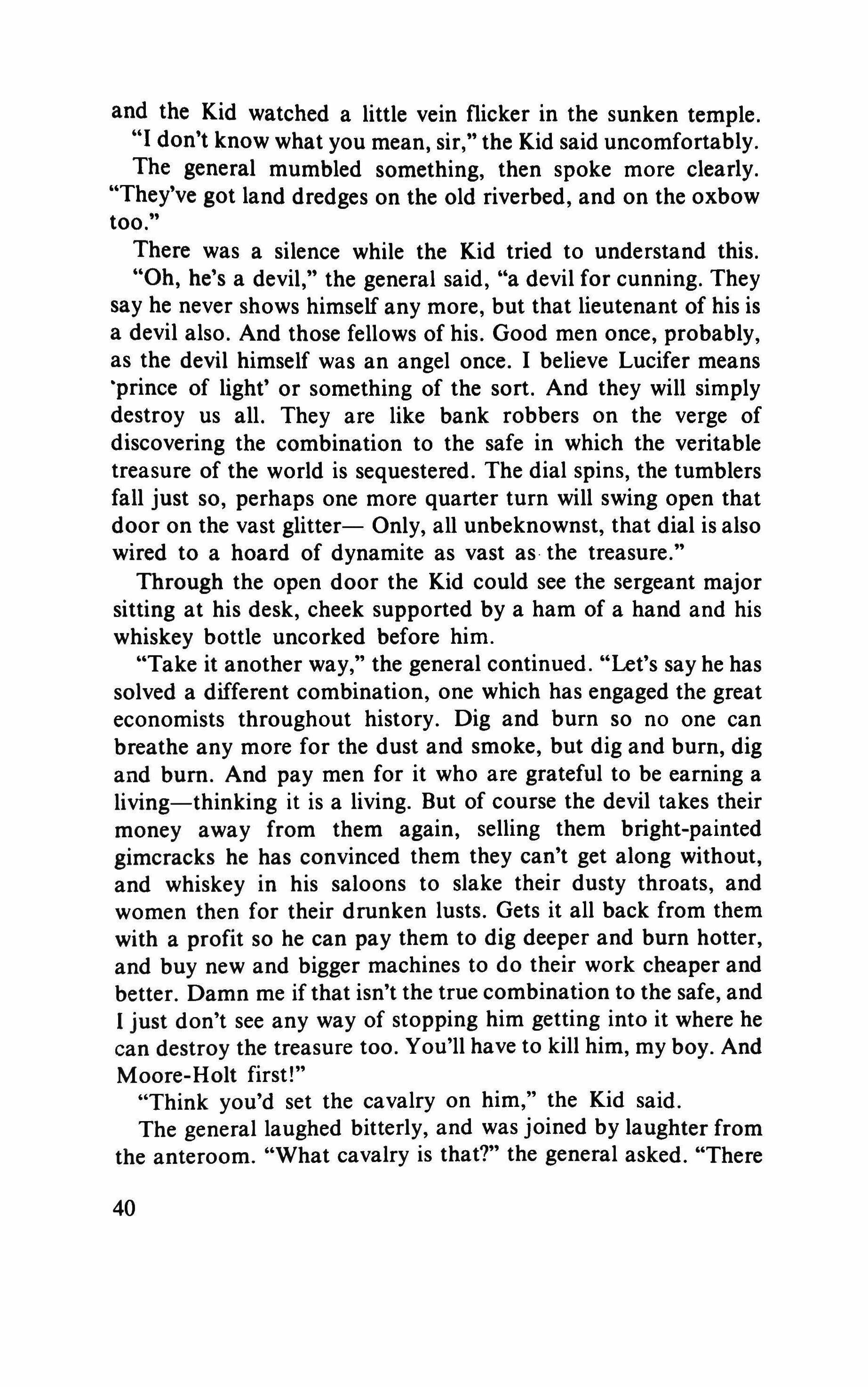
and the Kid watched a little vein flicker in the sunken temple. "I don't know what you mean, sir," the Kid said uncomfortably. The general mumbled something, then spoke more clearly. "They've got land dredges on the old riverbed, and on the oxbow too."
There was a silence while the Kid tried to understand this. "Oh, he's a devil," the general said, "a devil for cunning. They say he never shows himself any more, but that lieutenant of his is a devil also. And those fellows of his. Good men once, probably, as the devil himself was an angel once. 1 believe Lucifer means 'prince of light' or something of the sort. And they will simply destroy us all. They are like bank robbers on the verge of discovering the combination to the safe in which the veritable treasure of the world is sequestered. The dial spins, the tumblers fall just so, perhaps one more quarter turn will swing open that door on the vast glitter- Only, all unbeknownst, that dial is also wired to a hoard of dynamite as vast as the treasure."
Through the open door the Kid could see the sergeant major sitting at his desk, cheek supported by a ham of a hand and his whiskey bottle uncorked before him.
"Take it another way," the general continued. "Let's say he has solved a different combination, one which has engaged the great economists throughout history. Dig and burn so no one can breathe any more for the dust and smoke, but dig and burn, dig and burn. And pay men for it who are grateful to be earning a living-thinking it is a living. But of course the devil takes their money away from them again, selling them bright-painted gimcracks he has convinced them they can't get along without, and whiskey in his saloons to slake their dusty throats, and women then for their drunken lusts. Gets it all back from them with a profit so he can pay them to dig deeper and burn hotter, and buy new and bigger machines to do their work cheaper and better. Damn me if that isn't the true combination to the safe, and I just don't see any way of stopping him getting into it where he can destroy the treasure too. You'll have to kill him, my boy. And Moore-Holt first!"
"Think you'd set the cavalry on him," the Kid said. The general laughed bitterly, and was joined by laughter from the anteroom. "What cavalry is that?" the general asked. "There
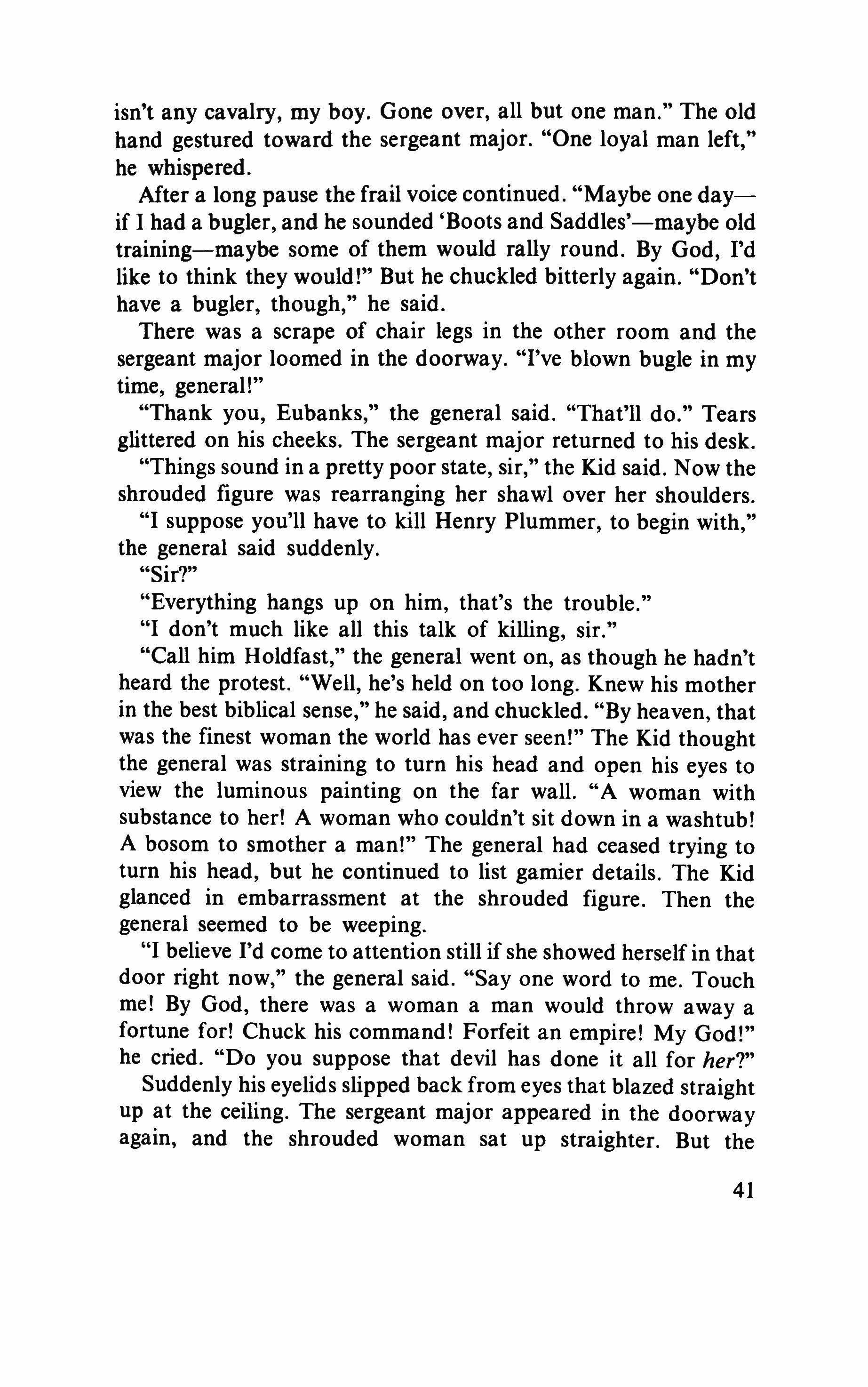
isn't any cavalry, my boy. Gone over, all but one man." The old hand gestured toward the sergeant major. "One loyal man left," he whispered.
After a long pause the frail voice continued. "Maybe one dayif 1 had a bugler, and he sounded 'Boots and Saddles'-maybe old training-maybe some of them would rally round. By God, I'd like to think they would!" But he chuckled bitterly again. "Don't have a bugler, though," he said.
There was a scrape of chair legs in the other room and the sergeant major loomed in the doorway. "I've blown bugle in my time, general!"
"Thank you, Eubanks," the general said. "That'll do." Tears glittered on his cheeks. The sergeant major returned to his desk.
"Things sound in a pretty poor state, sir," the Kid said. Now the shrouded figure was rearranging her shawl over her shoulders.
"I suppose you'll have to kill Henry Plummer, to begin with," the general said suddenly.
"Sir?"
"Everything hangs up on him, that's the trouble."
"I don't much like all this talk of killing, sir."
"Call him Holdfast," the general went on, as though he hadn't heard the protest. "Well, he's held on too long. Knew his mother in the best biblical sense," he said, and chuckled. "By heaven, that was the finest woman the world has ever seen!" The Kid thought the general was straining to turn his head and open his eyes to view the luminous painting on the far wall. "A woman with substance to her! A woman who couldn't sit down in a washtub! A bosom to smother a man!" The general had ceased trying to turn his head, but he continued to list gamier details. The Kid glanced in embarrassment at the shrouded figure. Then the general seemed to be weeping.
"I believe I'd come to attention still if she showed herself in that door right now," the general said. "Say one word to me. Touch me! By God, there was a woman a man would throwaway a fortune for! Chuck his command! Forfeit an empire! My God!" he cried. "Do you suppose that devil has done it all for her?"
Suddenly his eyelids slipped back from eyes that blazed straight up at the ceiling. The sergeant major appeared in the doorway again, and the shrouded woman sat up straighter. But the
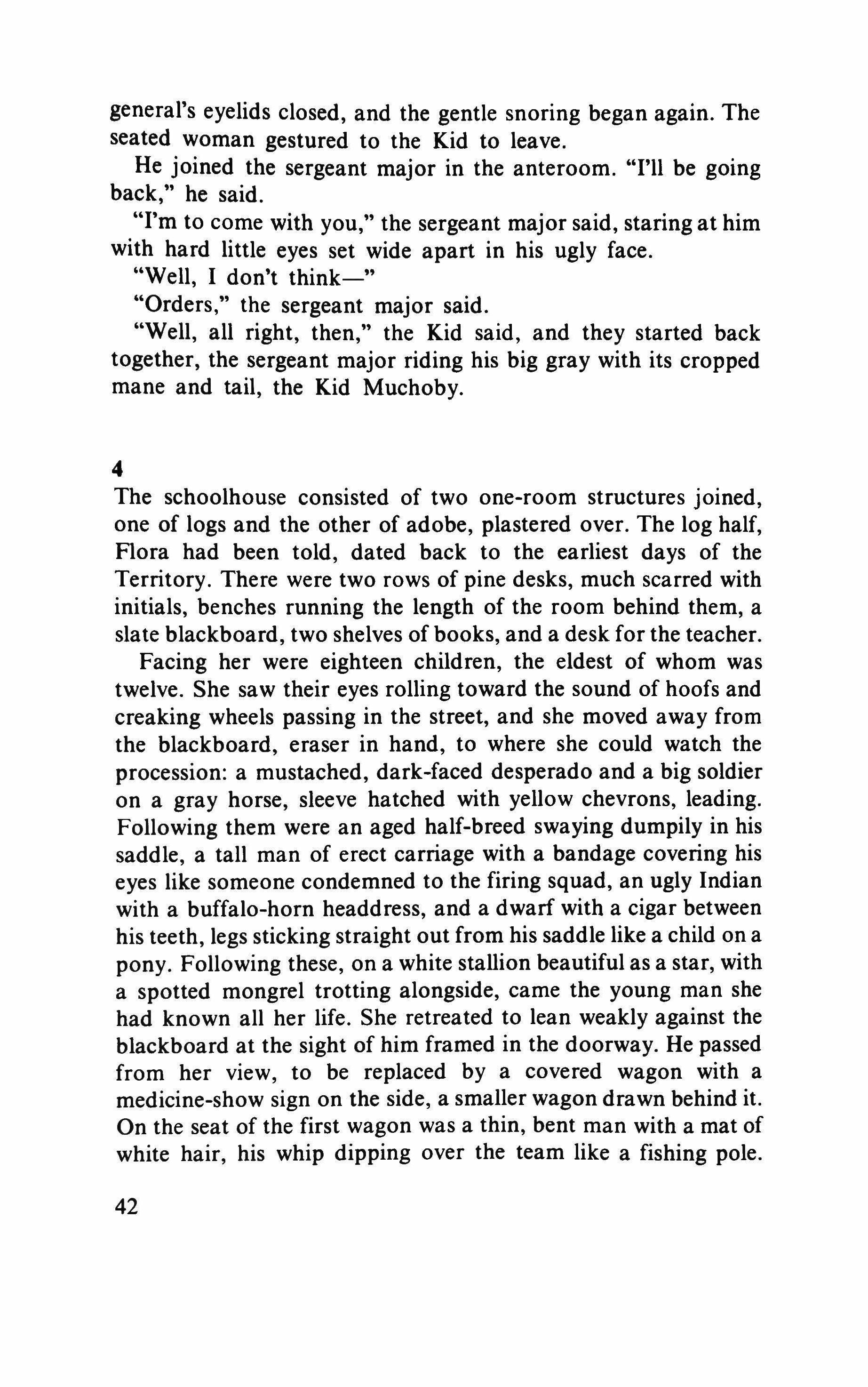
general's eyelids closed, and the gentle snoring began again. The seated woman gestured to the Kid to leave.
He joined the sergeant major in the anteroom. "I'll be going back," he said.
"I'm to come with you," the sergeant major said, staring at him with hard little eyes set wide apart in his ugly face.
"Well, I don't think-"
"Orders," the sergeant major said.
"Well, all right, then," the Kid said, and they started back together, the sergeant major riding his big gray with its cropped mane and tail, the Kid Muchoby.
4
The schoolhouse consisted of two one-room structures joined, one of logs and the other of adobe, plastered over. The log half, flora had been told, dated back to the earliest days of the Territory. There were two rows of pine desks, much scarred with initials, benches running the length of the room behind them, a slate blackboard, two shelves of books, and a desk for the teacher.
Facing her were eighteen children, the eldest of whom was twelve. She saw their eyes rolling toward the sound of hoofs and creaking wheels passing in the street, and she moved away from the blackboard, eraser in hand, to where she could watch the procession: a mustached, dark-faced desperado and a big soldier on a gray horse, sleeve hatched with yellow chevrons, leading. Following them were an aged half-breed swaying dumpily in his saddle, a tall man of erect carriage with a bandage covering his eyes like someone condemned to the firing squad, an ugly Indian with a buffalo-horn headdress, and a dwarf with a cigar between his teeth, legs sticking straight out from his saddle like a child on a pony. Following these, on a white stallion beautiful as a star, with a spotted mongrel trotting alongside, came the young man she had known all her life. She retreated to lean weakly against the blackboard at the sight of him framed in the doorway. He passed from her view, to be replaced by a covered wagon with a medicine-show sign on the side, a smaller wagon drawn behind it. On the seat of the first wagon was a thin, bent man with a mat of white hair, his whip dipping over the team like a fishing pole.
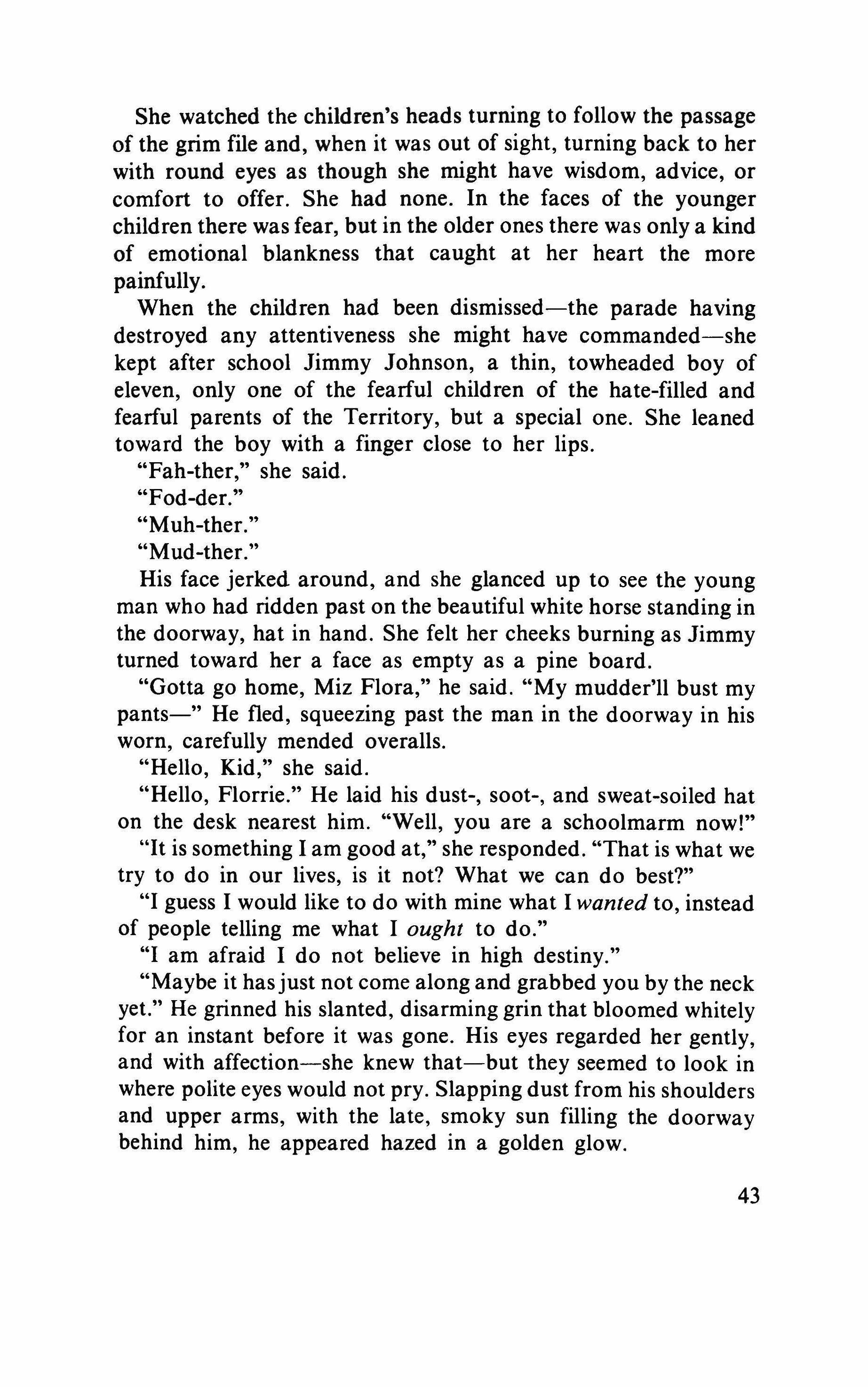
She watched the children's heads turning to follow the passage of the grim file and, when it was out of sight, turning back to her with round eyes as though she might have wisdom, advice, or comfort to offer. She had none. In the faces of the younger children there was fear, but in the older ones there was only a kind of emotional blankness that caught at her heart the more painfully.
When the children had been dismissed-the parade having destroyed any attentiveness she might have commanded-she kept after school Jimmy Johnson, a thin, towheaded boy of eleven, only one of the fearful children of the hate-filled and fearful parents of the Territory, but a special one. She leaned toward the boy with a finger close to her lips.
"Fah-ther," she said.
"Fod-der."
"Muh-ther."
"Mud-ther."
His face jerked around, and she glanced up to see the young man who had ridden past on the beautiful white horse standing in the doorway, hat in hand. She felt her cheeks burning as Jimmy turned toward her a face as empty as a pine board.
"Gotta go home, Miz Flora," he said. "My mudder'll bust my pants-" He fled, squeezing past the man in the doorway in his worn, carefully mended overalls.
"Hello, Kid," she said.
"Hello, Florrie." He laid his dust-, soot-, and sweat-soiled hat on the desk nearest him. "Well, you are a schoolmarm now!"
"It is something I am good at," she responded. "That is what we try to do in our lives, is it not? What we can do best?"
"I guess I would like to do with mine what I wanted to, instead of people telling me what I ought to do."
"I am afraid I do not believe in high destiny."
"Maybe it hasjust not come along and grabbed you by the neck yet." He grinned his slanted, disarming grin that bloomed whitely for an instant before it was gone. His eyes regarded her gently, and with affection-she knew that-but they seemed to look in where polite eyes would not pry. Slapping dust from his shoulders and upper arms, with the late, smoky sun filling the doorway behind him, he appeared hazed in a golden glow.
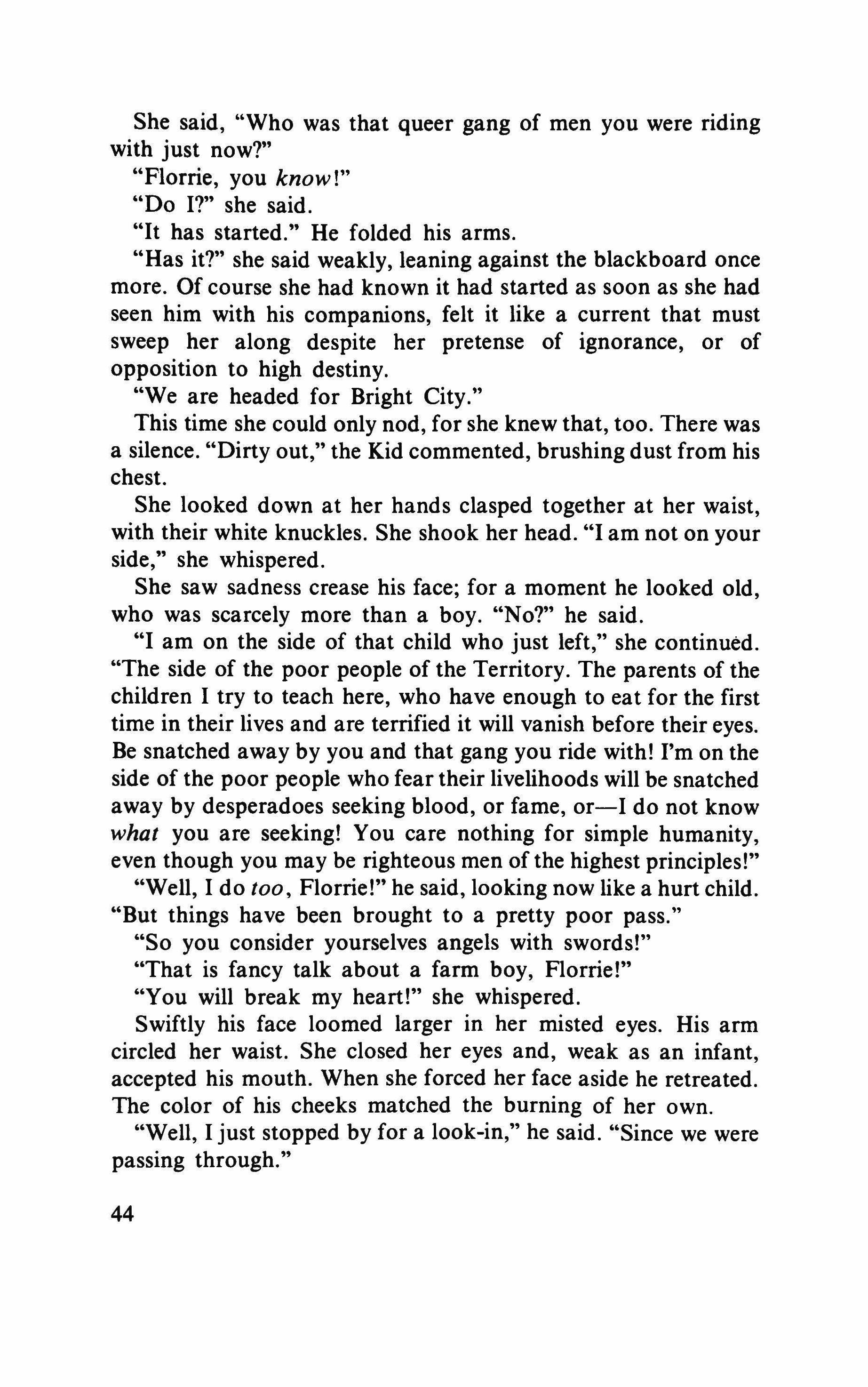
She said, "Who was that queer gang of men you were riding with just now?"
"Florrie, you know!"
"Do I?" she said.
"It has started." He folded his arms.
"Has it?" she said weakly, leaning against the blackboard once more. Of course she had known it had started as soon as she had seen him with his companions, felt it like a current that must sweep her along despite her pretense of ignorance, or of opposition to high destiny.
"We are headed for Bright City."
This time she could only nod, for she knew that, too. There was a silence. "Dirty out," the Kid commented, brushing dust from his chest.
She looked down at her hands clasped together at her waist, with their white knuckles. She shook her head. "I am not on your side," she whispered.
She saw sadness crease his face; for a moment he looked old, who was scarcely more than a boy. "No?" he said.
"I am on the side of that child who just left," she continued. "The side of the poor people ofthe Territory. The parents of the children I try to teach here, who have enough to eat for the first time in their lives and are terrified it will vanish before their eyes. Be snatched away by you and that gang you ride with! I'm on the side of the poor people who fear their livelihoods will be snatched away by desperadoes seeking blood, or fame, or-I do not know what you are seeking! You care nothing for simple humanity, even though you may be righteous men of the highest principles!"
"Well, I do too, Florrie!" he said, looking now like a hurt child. "But things have been brought to a pretty poor pass."
"So you consider yourselves angels with swords!"
"That is fancy talk about a farm boy, Florrie!"
"You will break my heart!" she whispered.
Swiftly his face loomed larger in her misted eyes. His arm circled her waist. She closed her eyes and, weak as an infant, accepted his mouth. When she forced her face aside he retreated. The color of his cheeks matched the burning of her own.
"Well, I just stopped by for a look-in," he said. "Since we were passing through."
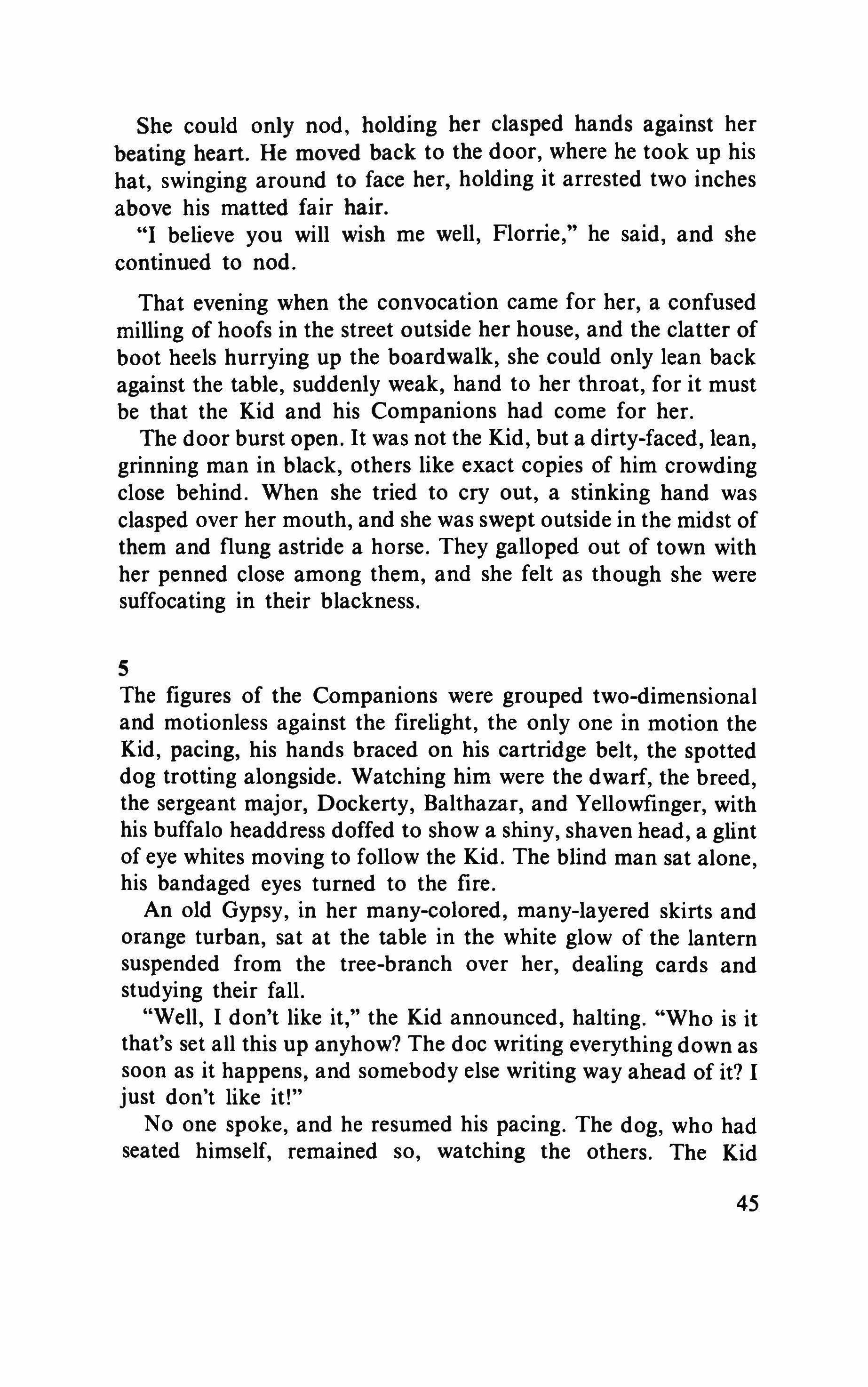
She could only nod, holding her clasped hands against her beating heart. He moved back to the door, where he took up his hat, swinging around to face her, holding it arrested two inches above his matted fair hair.
"I believe you will wish me well, Florrie," he said, and she continued to nod.
That evening when the convocation came for her, a confused milling of hoofs in the street outside her house, and the clatter of boot heels hurrying up the boardwalk, she could only lean back against the table, suddenly weak, hand to her throat, for it must be that the Kid and his Companions had come for her.
The door burst open. It was not the Kid, but a dirty-faced, lean, grinning man in black, others like exact copies of him crowding close behind. When she tried to cry out, a stinking hand was clasped over her mouth, and she was swept outside in the midst of them and flung astride a horse. They galloped out of town with her penned close among them, and she felt as though she were suffocating in their blackness.
5
The figures of the Companions were grouped two-dimensional and motionless against the firelight, the only one in motion the Kid, pacing, his hands braced on his cartridge belt, the spotted dog trotting alongside. Watching him were the dwarf, the breed, the sergeant major, Dockerty, Balthazar, and Yellowfinger, with his buffalo headdress doffed to show a shiny, shaven head, a glint of eye whites moving to follow the Kid. The blind man sat alone, his bandaged eyes turned to the fire.
An old Gypsy, in her many-colored, many-layered skirts and orange turban, sat at the table in the white glow of the lantern suspended from the tree-branch over her, dealing cards and studying their fall.
"Well, I don't like it," the Kid announced, halting. "Who is it that's set all this up anyhow? The doc writing everything down as soon as it happens, and somebody else writing way ahead of it? I just don't like it!"
Noone spoke, and he resumed his pacing. The dog, who had seated himself, remained so, watching the others. The Kid
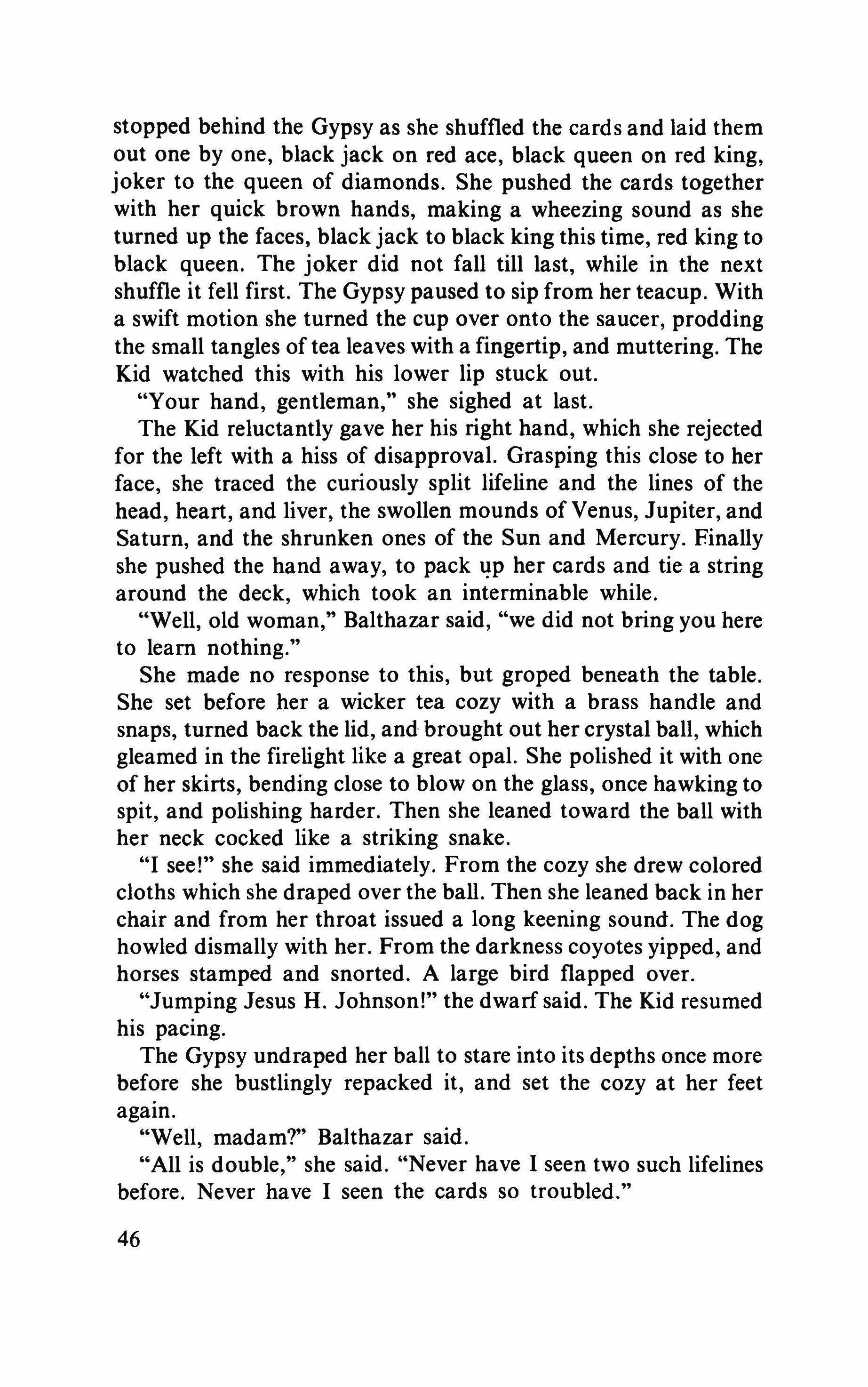
stopped behind the Gypsy as she shuffled the cards and laid them out one by one, black jack on red ace, black queen on red king, joker to the queen of diamonds. She pushed the cards together with her quick brown hands, making a wheezing sound as she turned up the faces, black jack to black king this time, red king to black queen. The joker did not fall till last, while in the next shuffle it fell first. The Gypsy paused to sip from her teacup. With a swift motion she turned the cup over onto the saucer, prodding the small tangles of tea leaves with a fingertip, and muttering. The Kid watched this with his lower lip stuck out.
"Your hand, gentleman," she sighed at last.
The Kid reluctantly gave her his right hand, which she rejected for the left with a hiss of disapproval. Grasping this close to her face, she traced the curiously split lifeline and the lines of the head, heart, and liver, the swollen mounds of Venus, Jupiter, and Saturn, and the shrunken ones of the Sun and Mercury. F.inally she pushed the hand away, to pack up her cards and tie a string around the deck, which took an interminable while.
"Well, old woman," Balthazar said, "we did not bring you here to learn nothing."
She made no response to this, but groped beneath the table. She set before her a wicker tea cozy with a brass handle and snaps, turned back the lid, and brought out her crystal ball, which gleamed in the firelight like a great opal. She polished it with one of her skirts, bending close to blow on the glass, once hawking to spit, and polishing harder. Then she leaned toward the ball with her neck cocked like a striking snake.
"I see!" she said immediately. From the cozy she drew colored cloths which she draped over the ball. Then she leaned back in her chair and from her throat issued a long keening sound. The dog howled dismally with her. From the darkness coyotes yipped, and horses stamped and snorted. A large bird flapped over.
"Jumping Jesus H. Johnson!" the dwarf said. The Kid resumed his pacing.
The Gypsy undraped her ball to stare into its depths once more before she bustlingly repacked it, and set the cozy at her feet again.
"Well, madam?" Balthazar said.
"All is double," she said. "Never have 1 seen two such lifelines before. Never have I seen the cards so troubled."
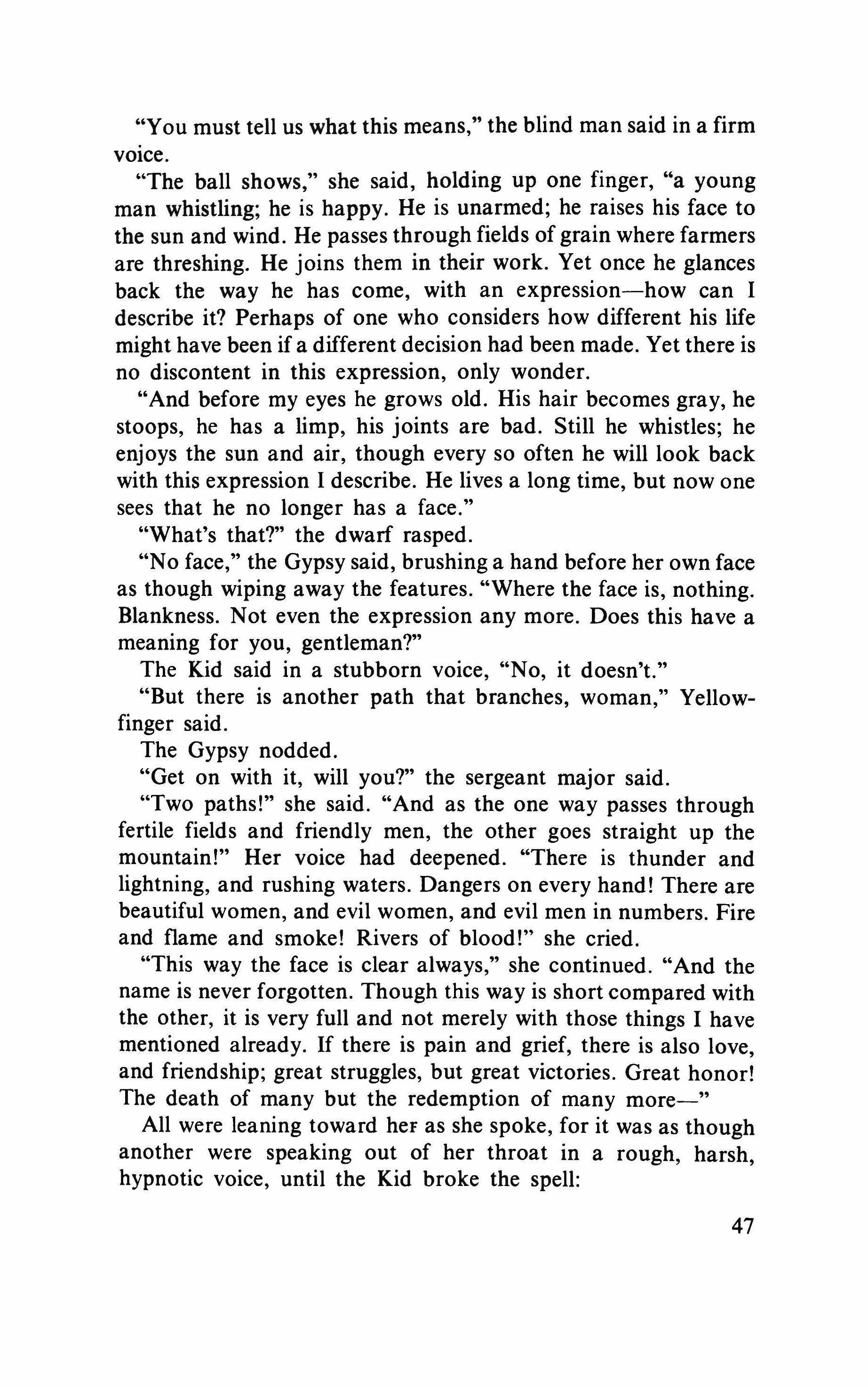
"You must tell us what this means," the blind man said in a firm voice.
"The ball shows," she said, holding up one finger, "a young man whistling; he is happy. He is unarmed; he raises his face to the sun and wind. He passes through fields of grain where farmers are threshing. He joins them in their work. Yet once he glances back the way he has come, with an expression-how can I describe it? Perhaps of one who considers how different his life might have been if a different decision had been made. Yet there is no discontent in this expression, only wonder.
"And before my eyes he grows old. His hair becomes gray, he stoops, he has a limp, his joints are bad. Still he whistles; he enjoys the sun and air, though every so often he will look back with this expression I describe. He lives a long time, but now one sees that he no longer has a face."
"What's that?" the dwarf rasped.
"No face," the Gypsy said, brushing a hand before her own face as though wiping away the features. "Where the face is, nothing. Blankness. Not even the expression any more. Does this have a meaning for you, gentleman?"
The Kid said in a stubborn voice, "No, it doesn't."
"But there is another path that branches, woman," Yellowfinger said.
The Gypsy nodded.
"Get on with it, will you?" the sergeant major said.
"Two paths!" she said. "And as the one way passes through fertile fields and friendly men, the other goes straight up the mountain!" Her voice had deepened. "There is thunder and lightning, and rushing waters. Dangers on every hand! There are beautiful women, and evil women, and evil men in numbers. Fire and flame and smoke! Rivers of blood!" she cried.
"This way the face is clear always," she continued. "And the name is never forgotten. Though this way is short compared with the other, it is very full and not merely with those things I have mentioned already. If there is pain and grief, there is also love, and friendship; great struggles, but great victories. Great honor! The death of many but the redemption of many more-"
All were leaning toward her as she spoke, for it was as though another were speaking out of her throat in a rough, harsh, hypnotic voice, until the Kid broke the spell:
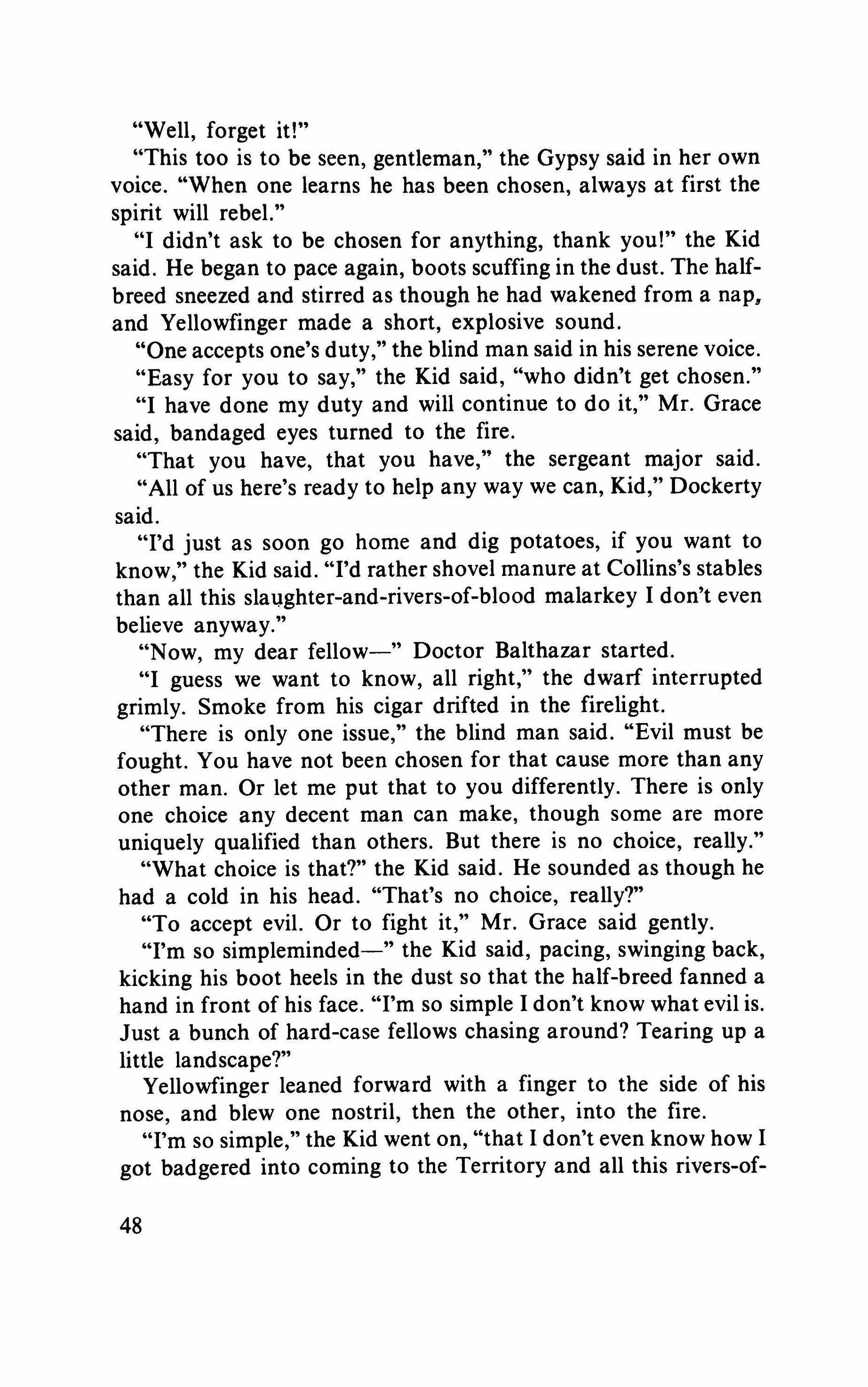
"Well, forget it!"
"This too is to be seen, gentleman," the Gypsy said in her own voice. "When one learns he has been chosen, always at first the spirit will rebel."
"I didn't ask to be chosen for anything, thank you!" the Kid said. He began to pace again, boots scuffing in the dust. The halfbreed sneezed and stirred as though he had wakened from a nap, and Yellowfinger made a short, explosive sound.
"One accepts one's duty," the blind man said in his serene voice.
"Easy for you to say," the Kid said, "who didn't get chosen."
"I have done my duty and will continue to do it," Mr. Grace said, bandaged eyes turned to the fire.
"That you have, that you have," the sergeant major said.
"All of us here's ready to help any way we can, Kid," Dockerty said.
"I'd just as soon go home and dig potatoes, if you want to know," the Kid said. "I'd rather shovel manure at Collins's stables than all this slaughter-and-rivers-of-blood malarkey 1 don't even believe anyway."
"Now, my dear fellow-" Doctor Balthazar started.
"I guess we want to know, all right," the dwarf interrupted grimly. Smoke from his cigar drifted in the firelight.
"There is only one issue," the blind man said. "Evil must be fought. You have not been chosen for that cause more than any other man. Or let me put that to you differently. There is only one choice any decent man can make, though some are more uniquely qualified than others. But there is no choice, really."
"What choice is that?" the Kid said. He sounded as though he had a cold in his head. "That's no choice, really?"
"To accept evil. Or to fight it," Mr. Grace said gently.
"I'm so simpleminded-" the Kid said, pacing, swinging back, kicking his boot heels in the dust so that the half-breed fanned a hand in front of his face. "I'm so simple 1 don't know what evil is. Just a bunch of hard-case fellows chasing around? Tearing up a little landscape?"
Yellowfinger leaned forward with a finger to the side of his nose, and blew one nostril, then the other, into the fire.
"I'm so simple," the Kid went on, "that 1 don't even know how I got badgered into coming to the Territory and all this rivers-of-
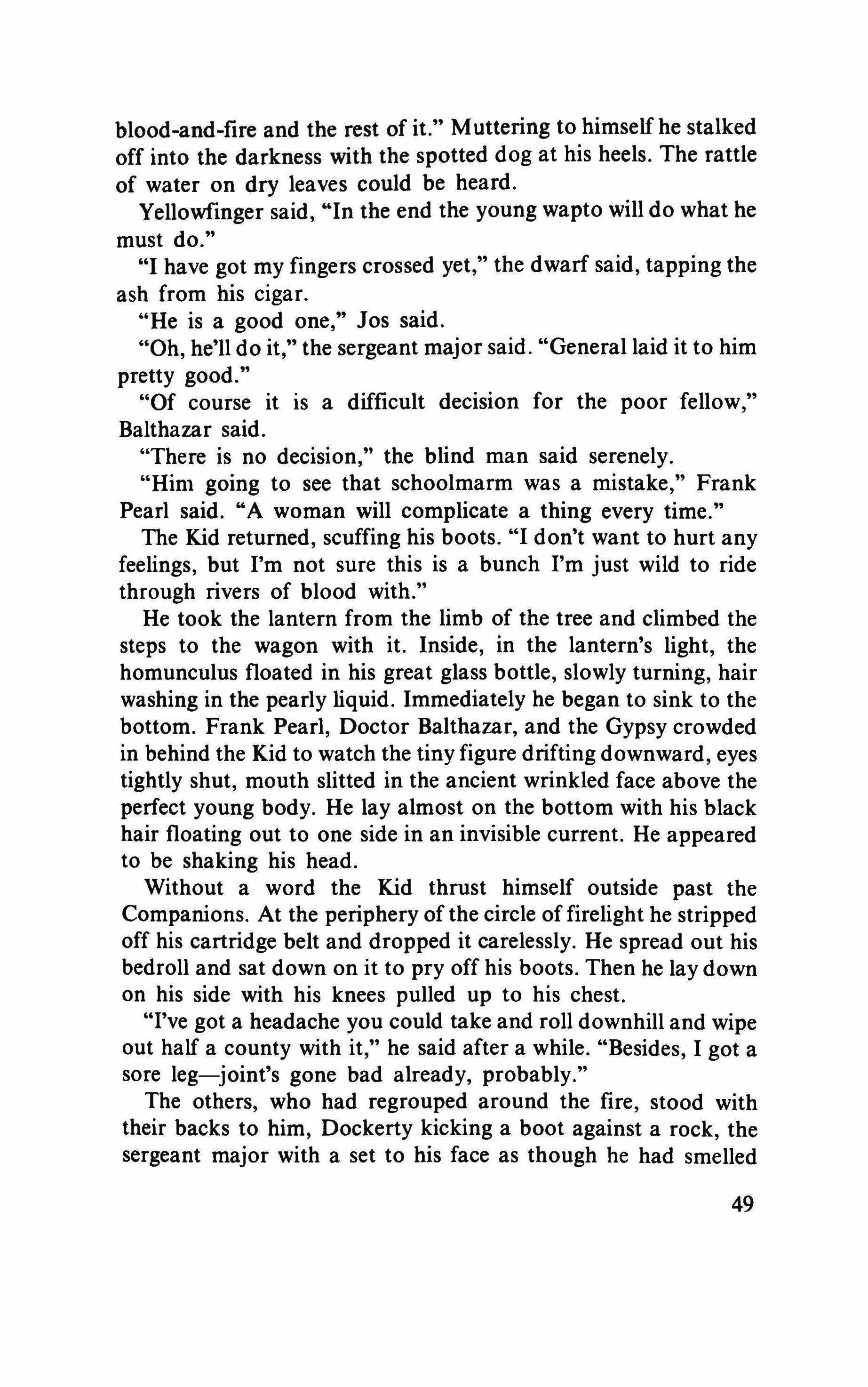
blood-and-fire and the rest of it." Muttering to himself he stalked off into the darkness with the spotted dog at his heels. The rattle of water on dry leaves could be heard.
Yellowfinger said, "In the end the young wapto will do what he must do."
"I have got my fingers crossed yet," the dwarf said, tapping the ash from his cigar.
"He is a good one," Jos said.
"Oh, he'll do it," the sergeant major said. "General laid it to him pretty good."
"Of course it is a difficult decision for the poor fellow," Balthazar said.
"There is no decision," the blind man said serenely.
"Him going to see that schoolmarm was a mistake," Frank Pearl said. "A woman will complicate a thing every time."
The Kid returned, scuffing his boots. "I don't want to hurt any feelings, but I'm not sure this is a bunch I'm just wild to ride through rivers of blood with."
He took the lantern from the limb of the tree and climbed the steps to the wagon with it. Inside, in the lantern's light, the homunculus floated in his great glass bottle, slowly turning, hair washing in the pearly liquid. Immediately he began to sink to the bottom. Frank Pearl, Doctor Balthazar, and the Gypsy crowded in behind the Kid to watch the tiny figure drifting downward, eyes tightly shut, mouth slitted in the ancient wrinkled face above the perfect young body. He lay almost on the bottom with his black hair floating out to one side in an invisible current. He appeared to be shaking his head.
Without a word the Kid thrust himself outside past the Companions. At the periphery of the circle of firelight he stripped off his cartridge belt and dropped it carelessly. He spread out his bedroll and sat down on it to pry off his boots. Then he lay down on his side with his knees pulled up to his chest.
"I've got a headache you could take and roll downhill and wipe out half a county with it," he said after a while. "Besides, I got a sore leg-joint's gone bad already, probably."
The others, who had regrouped around the fire, stood with their backs to him, Dockerty kicking a boot against a rock, the sergeant major with a set to his face as though he had smelled

something bad. "A woman will do it every time, am I right?" the dwarf said.
Yellowfinger hissed for silence.
There was a faint drumming, hoofs approaching at a gallop, a voice shouting. The Kid only strained his legs tighter to his chest.
The rider pulled up in the circle of firelight, his words torn to shards of sound by Duke's barking. The Companions gathered around as the rider piled off his lathered horse, a bareheaded, town-suited man, crying, "They took her!"
"Who took her? What do you mean they took her?"
"Grabbed her right out of her house! Black riders!"
Dockerty groaned. The Kid sat up, pulling on his boots, his face glistening palely in the firelight. He rose, and crouched with his knees spread as he flung his cartridge belt around his hips and buckled it fast.
"Which way'd they go, mister?" he cried.
"Only one way for them to go!"
"Where can we head them?"
"Up by the water holes," the sergeant major said. Yellowfinger had put on his buffalo horns.
"Let's go!" the Kid snapped.
Dockerty whistled once-a long, low, urgent sound-and the horses began eagerly to stamp and whinny. Frank Pearl jumped with excitement.
"Let's go!" the Kid said again, louder, and the blind man stretched out his hand toward the sound of his voice, as though in benediction.
At dawn they were riding hard through red sandstone country where reefs of rock poked gray snouts like beached sharks and stunted trees threw westward shadows. In the lead, the Kid and Dockerty raced flat out with the brims of their hats blown back, Muchoby flowing over the rusty land like quicksilver and Dockerty's black mare only a head behind, followed close by the sergeant major on his pounding gray and Yellowfinger yipping on his calico. Farther back were Frank Pearl and the doctor, gray hair snapping in the wind of their passage, and, last of all, the breed and Mr. Grace, the blind man clinging to his saddle horn while Jos guided him along by the reins.
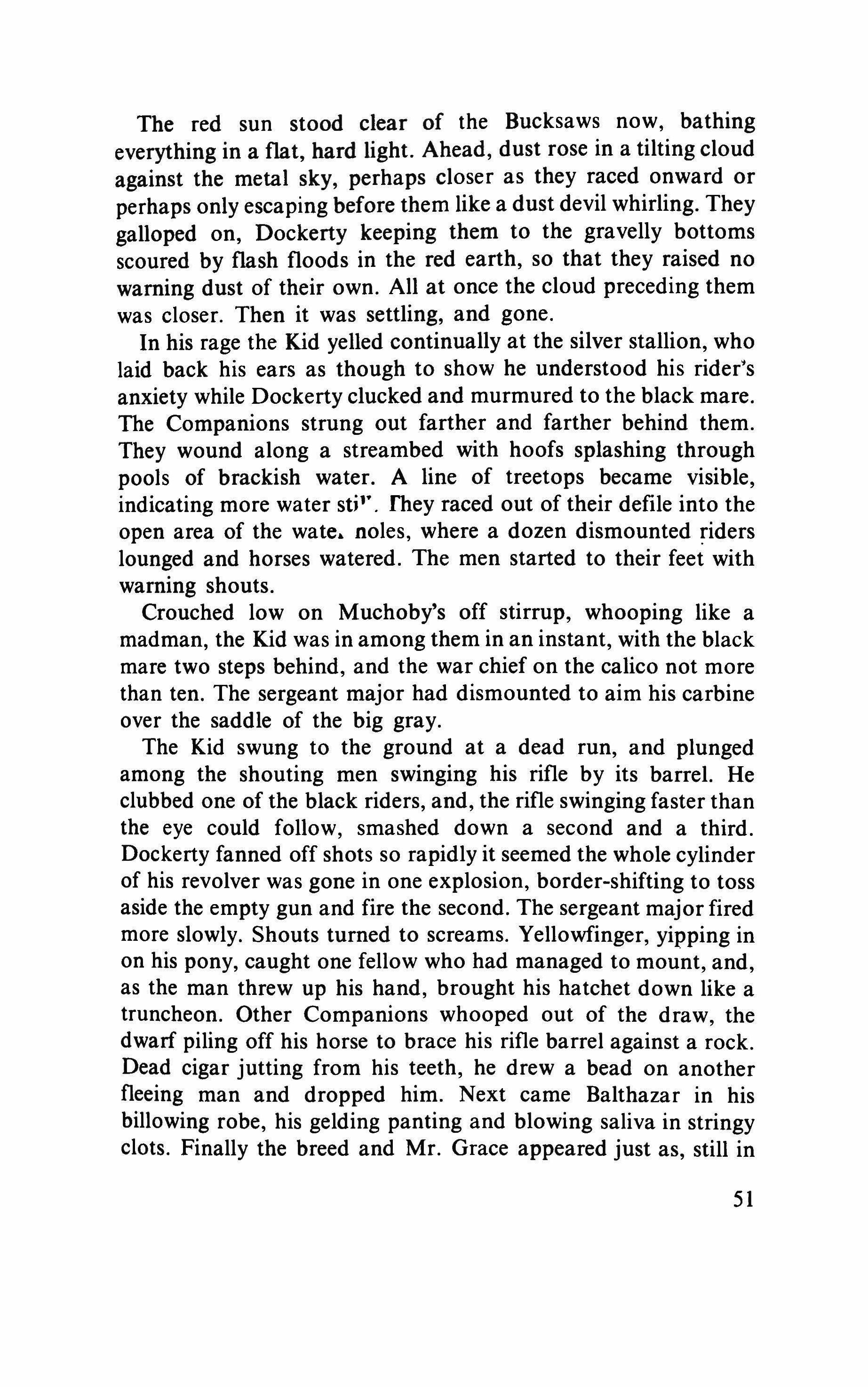
The red sun stood clear of the Bucksaws now, bathing everything in a flat, hard light. Ahead, dust rose in a tilting cloud against the metal sky, perhaps closer as they raced onward or perhaps only escaping before them like a dust devil whirling. They galloped on, Dockerty keeping them to the gravelly bottoms scoured by flash floods in the red earth, so that they raised no warning dust of their own. All at once the cloud preceding them was closer. Then it was settling, and gone.
In his rage the Kid yelled continually at the silver stallion, who laid back his ears as though to show he understood his rider's anxiety while Dockerty clucked and murmured to the black mare. The Companions strung out farther and farther behind them. They wound along a streambed with hoofs splashing through pools of brackish water. A line of treetops became visible, indicating more water sti". fhey raced out of their defile into the open area of the wate, noles, where a dozen dismounted riders lounged and horses watered. The men started to their feet with warning shouts.
Crouched low on Muchoby's off stirrup, whooping like a madman, the Kid was in among them in an instant, with the black mare two steps behind, and the war chief on the calico not more than ten. The sergeant major had dismounted to aim his carbine over the saddle of the big gray.
The Kid swung to the ground at a dead run, and plunged among the shouting men swinging his rifle by its barrel. He clubbed one of the black riders, and, the rifle swinging faster than the eye could follow, smashed down a second and a third. Dockerty fanned off shots so rapidly it seemed the whole cylinder of his revolver was gone in one explosion, border-shifting to toss aside the empty gun and fire the second. The sergeant major fired more slowly. Shouts turned to screams. Yellowfinger, yipping in on his pony, caught one fellow who had managed to mount, and, as the man threw up his hand, brought his hatchet down like a truncheon. Other Companions whooped out of the draw, the dwarf piling off his horse to brace his rifle barrel against a rock. Dead cigar jutting from his teeth, he drew a bead on another fleeing man and dropped him. Next came Balthazar in his billowing robe, his gelding panting and blowing saliva in stringy clots. Finally the breed and Mr. Grace appeared just as, still in
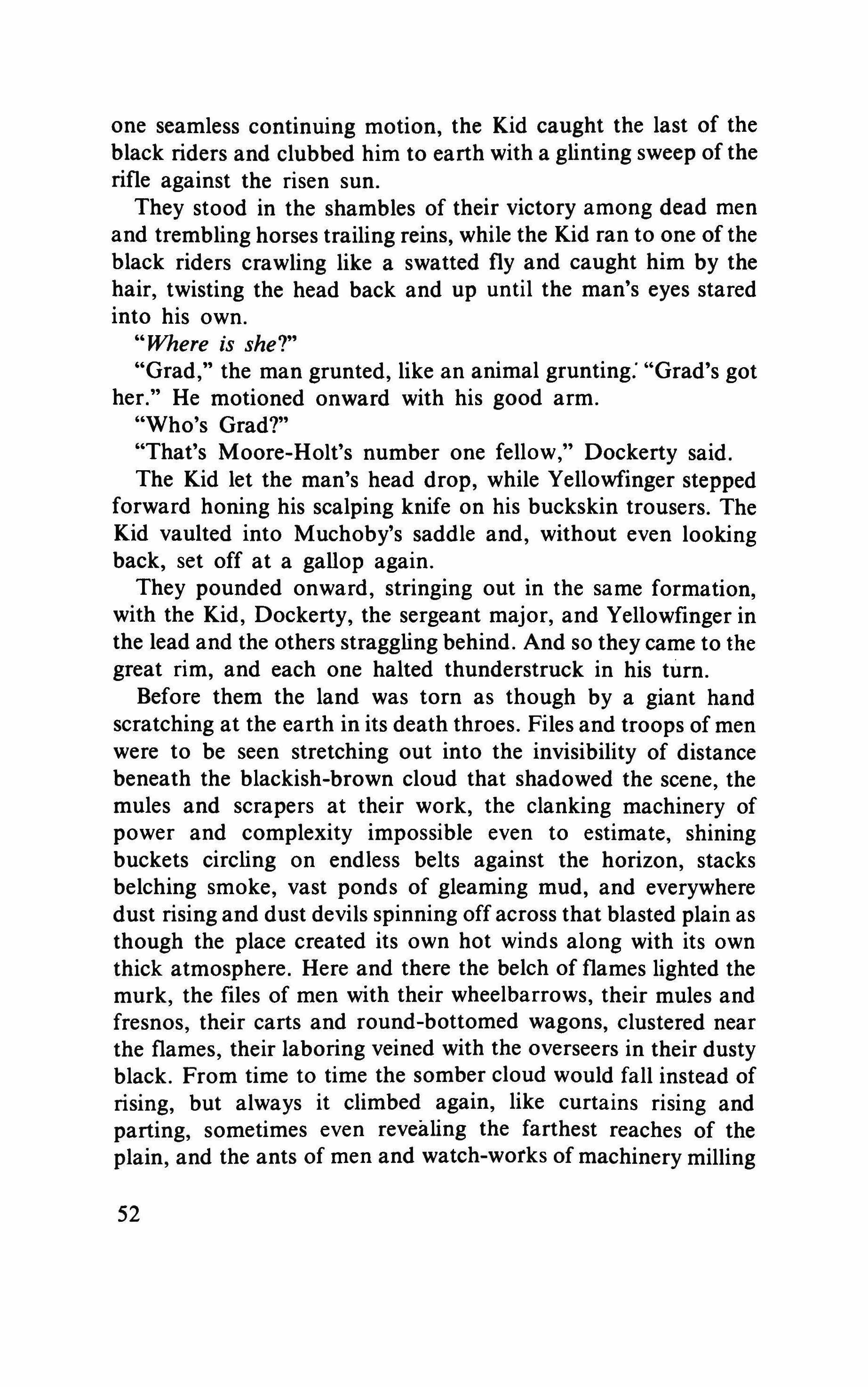
one seamless continuing motion, the Kid caught the last of the black riders and clubbed him to earth with a glinting sweep of the rifle against the risen sun.
They stood in the shambles of their victory among dead men and trembling horses trailing reins, while the Kid ran to one of the black riders crawling like a swatted fly and caught him by the hair, twisting the head back and up until the man's eyes stared into his own.
"Where is she?"
"Grad," the man grunted, like an animal grunting: "Grad's got her." He motioned onward with his good arm.
"Who's Grad?"
"That's Moore-Holt's number one fellow," Dockerty said.
The Kid let the man's head drop, while Yellowfinger stepped forward honing his scalping knife on his buckskin trousers. The Kid vaulted into Muchoby's saddle and, without even looking back, set off at a gallop again.
They pounded onward, stringing out in the same formation, with the Kid, Dockerty, the sergeant major, and Yellowfinger in the lead and the others straggling behind. And so they came to the great rim, and each one halted thunderstruck in his turn.
Before them the land was torn as though by a giant hand scratching at the earth in its death throes. Files and troops of men were to be seen stretching out into the invisibility of distance beneath the blackish-brown cloud that shadowed the scene, the mules and scrapers at their work, the clanking machinery of power and complexity impossible even to estimate, shining buckets circling on endless belts against the horizon, stacks belching smoke, vast ponds of gleaming mud, and everywhere dust rising and dust devils spinning off across that blasted plain as though the place created its own hot winds along with its own thick atmosphere. Here and there the belch of flames lighted the murk, the files of men with their wheelbarrows, their mules and fresnos, their carts and round-bottomed wagons, clustered near the flames, their laboring veined with the overseers in their dusty black. From time to time the somber cloud would fall instead of rising, but always it climbed again, like curtains rising and parting, sometimes even revealing the farthest reaches of the plain, and the ants of men and watch-works of machinery milling
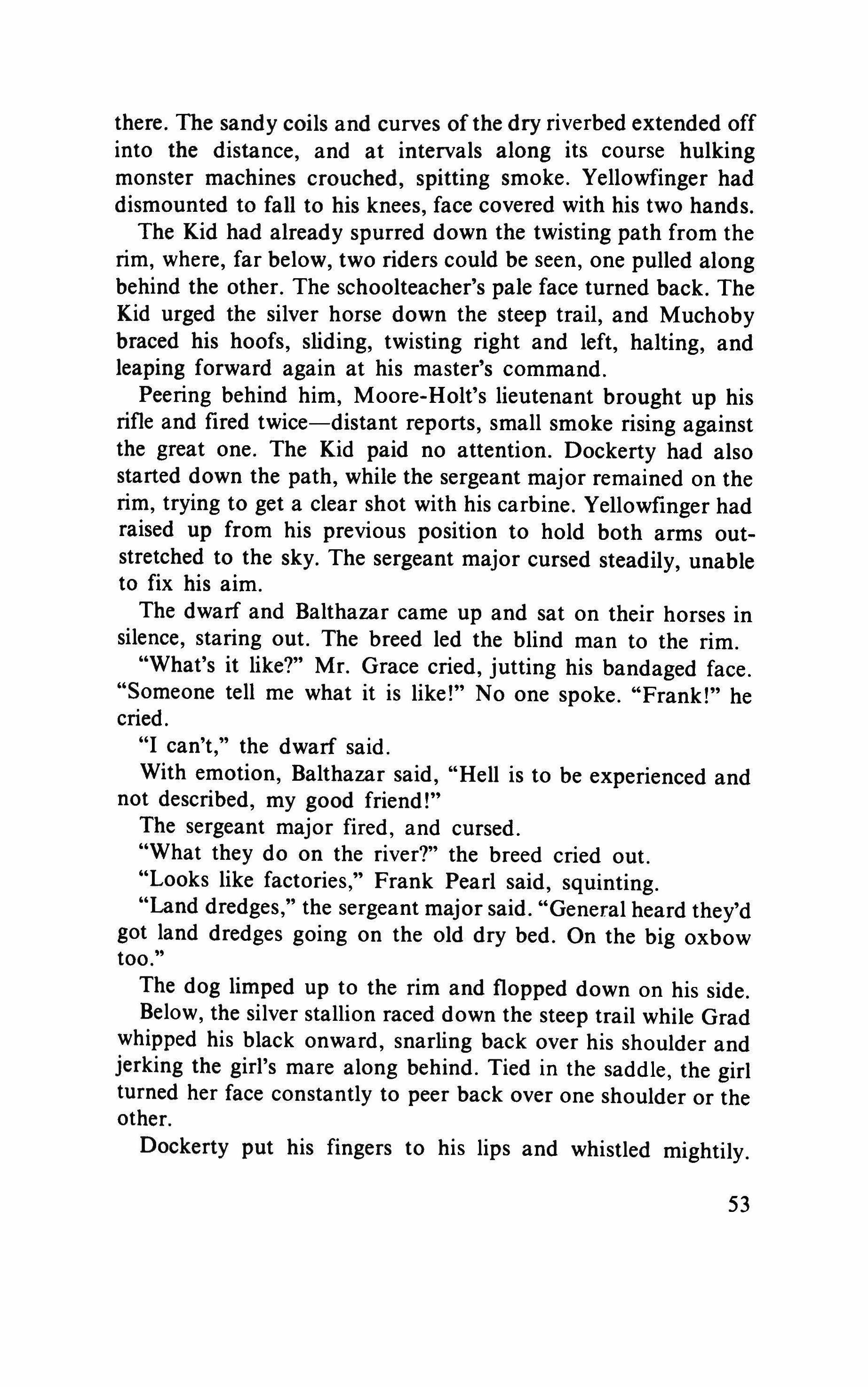
there. The sandy coils and curves of the dry riverbed extended off into the distance, and at intervals along its course hulking monster machines crouched, spitting smoke. Yellowfinger had dismounted to fall to his knees, face covered with his two hands.
The Kid had already spurred down the twisting path from the rim, where, far below, two riders could be seen, one pulled along behind the other. The schoolteacher's pale face turned back. The Kid urged the silver horse down the steep trail, and Muchoby braced his hoofs, sliding, twisting right and left, halting, and leaping forward again at his master's command.
Peering behind him, Moore-Holt's lieutenant brought up his rifle and fired twice-distant reports, small smoke rising against the great one. The Kid paid no attention. Dockerty had also started down the path, while the sergeant major remained on the rim, trying to get a clear shot with his carbine. Yellowfinger had raised up from his previous position to hold both arms outstretched to the sky. The sergeant major cursed steadily, unable to fix his aim.
The dwarf and Balthazar came up and sat on their horses in silence, staring out. The breed led the blind man to the rim.
"What's it like?" Mr. Grace cried, jutting his bandaged face. "Someone tell me what it is like!" No one spoke. "Frank!" he cried.
"I can't," the dwarf said.
With emotion, Balthazar said, "Hell is to be experienced and not described, my good friend!"
The sergeant major fired, and cursed.
"What they do on the river?" the breed cried out.
"Looks like factories," Frank Pearl said, squinting.
"Land dredges," the sergeant major said. "General heard they'd got land dredges going on the old dry bed. On the big oxbow too."
The dog limped up to the rim and flopped down on his side. Below, the silver stallion raced down the steep trail while Grad whipped his black onward, snarling back over his shoulder and jerking the girl's mare along behind. Tied in the saddle, the girl turned her face constantly to peer back over one shoulder or the other.
Dockerty put his fingers to his lips and whistled mightily.
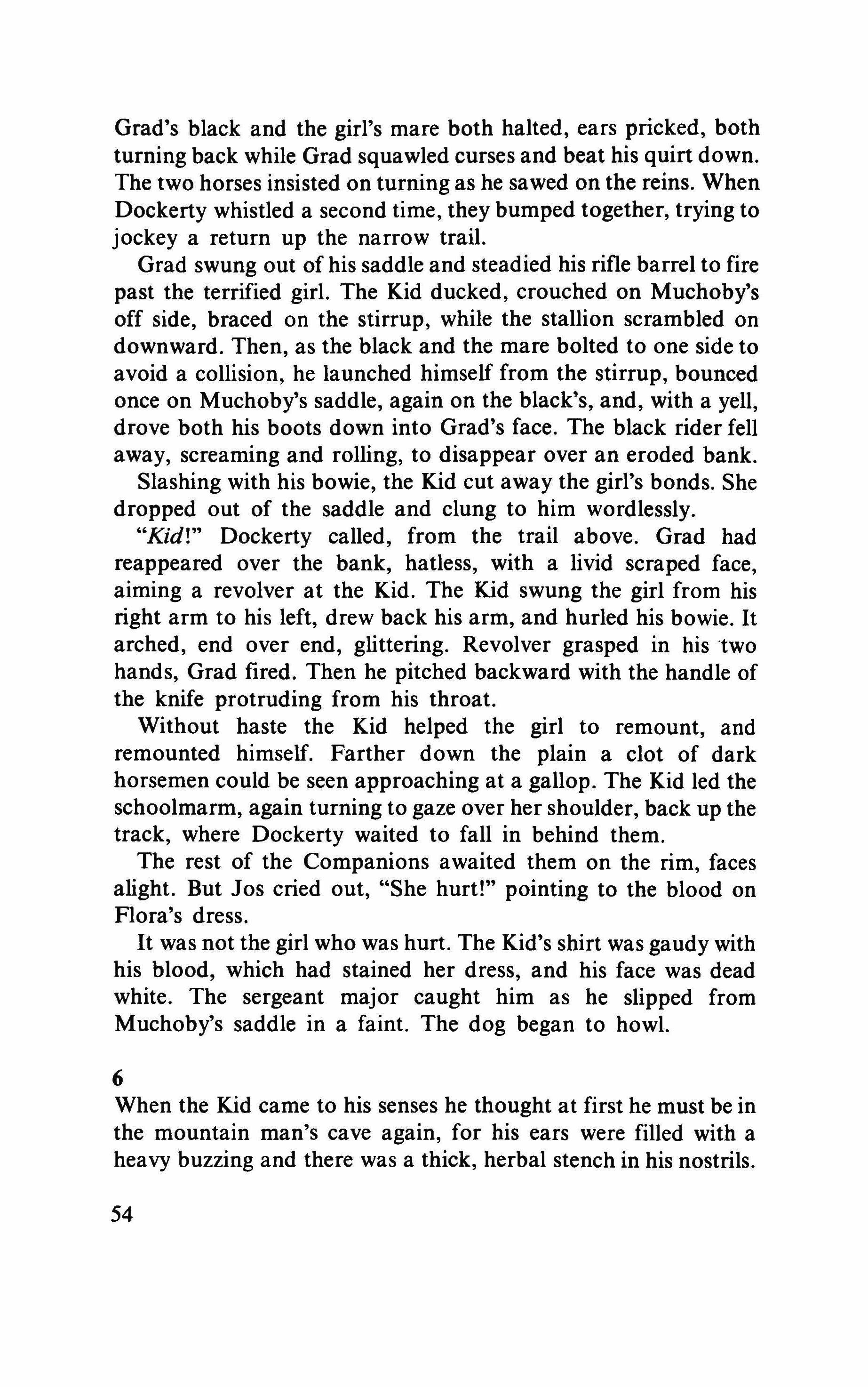
Grad's black and the girl's mare both halted, ears pricked, both turning back while Grad squawled curses and beat his quirt down. The two horses insisted on turning as he sawed on the reins. When Dockerty whistled a second time, they bumped together, trying to jockey a return up the narrow trail.
Grad swung out of his saddle and steadied his rifle barrel to fire past the terrified girl. The Kid ducked, crouched on Muchoby's off side, braced on the stirrup, while the stallion scrambled on downward. Then, as the black and the mare bolted to one side to avoid a collision, he launched himself from the stirrup, bounced once on Muchoby's saddle, again on the black's, and, with a yell, drove both his boots down into Grad's face. The black rider fell away, screaming and rolling, to disappear over an eroded bank.
Slashing with his bowie, the Kid cut away the girl's bonds. She dropped out of the saddle and clung to him wordlessly.
"Kid!" Dockerty called, from the trail above. Grad had reappeared over the bank, hatless, with a livid scraped face, aiming a revolver at the Kid. The Kid swung the girl from his right arm to his left, drew back his arm, and hurled his bowie. It arched, end over end, glittering. Revolver grasped in his two hands, Grad fired. Then he pitched backward with the handle of the knife protruding from his throat.
Without haste the Kid helped the girl to remount, and remounted himself. Farther down the plain a clot of dark horsemen could be seen approaching at a gallop. The Kid led the schoolmarm, again turning to gaze over her shoulder, back up the track, where Dockerty waited to fall in behind them.
The rest of the Companions awaited them on the rim, faces alight. But los cried out, "She hurt!" pointing to the blood on Flora's dress.
It was not the girl who was hurt. The Kid's shirt was gaudy with his blood, which had stained her dress, and his face was dead white. The sergeant major caught him as he slipped from Muchoby's saddle in a faint. The dog began to howl.
6
When the Kid came to his senses he thought at first he must be in the mountain man's cave again, for his ears were filled with a heavy buzzing and there was a thick, herbal stench in his nostrils.
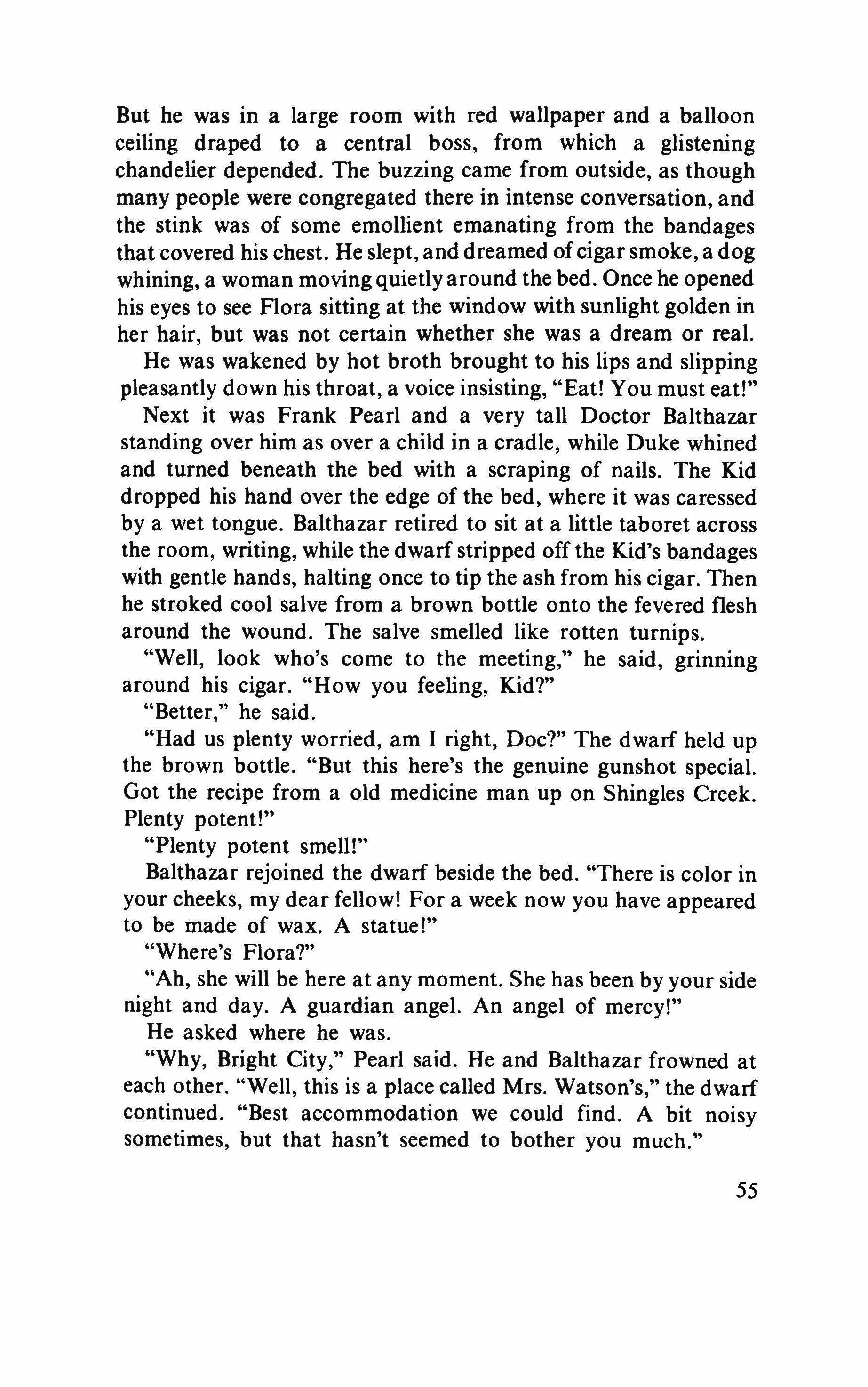
But he was in a large room with red wallpaper and a balloon ceiling draped to a central boss, from which a glistening chandelier depended. The buzzing came from outside, as though many people were congregated there in intense conversation, and the stink was of some emollient emanating from the bandages that covered his chest. He slept, and dreamed ofcigar smoke, a dog whining, a woman moving quietlyaround the bed. Once he opened his eyes to see Flora sitting at the window with sunlight golden in her hair, but was not certain whether she was a dream or real.
He was wakened by hot broth brought to his lips and slipping pleasantly down his throat, a voice insisting, "Eat! You must eat!"
Next it was Frank Pearl and a very tall Doctor Balthazar standing over him as over a child in a cradle, while Duke whined and turned beneath the bed with a scraping of nails. The Kid dropped his hand over the edge of the bed, where it was caressed by a wet tongue. Balthazar retired to sit at a little taboret across the room, writing, while the dwarf stripped off the Kid's bandages with gentle hands, halting once to tip the ash from his cigar. Then he stroked cool salve from a brown bottle onto the fevered flesh around the wound. The salve smelled like rotten turnips.
"Well, look who's come to the meeting," he said, grinning around his cigar. "How you feeling, Kid?"
"Better," he said.
"Had us plenty worried, am I right, Doc?" The dwarf held up the brown bottle. "But this here's the genuine gunshot special. Got the recipe from a old medicine man up on Shingles Creek. Plenty potent!"
"Plenty potent smell!"
Balthazar rejoined the dwarf beside the bed. "There is color in your cheeks, my dear fellow! For a week now you have appeared to be made of wax. A statue!"
"Where's Flora?"
"Ah, she will be here at any moment. She has been by your side night and day. A guardian angel. An angel of mercy!"
He asked where he was.
"Why, Bright City," Pearl said. He and Balthazar frowned at each other. "Well, this is a place called Mrs. Watson's," the dwarf continued. "Best accommodation we could find. A bit noisy sometimes, but that hasn't seemed to bother you much."
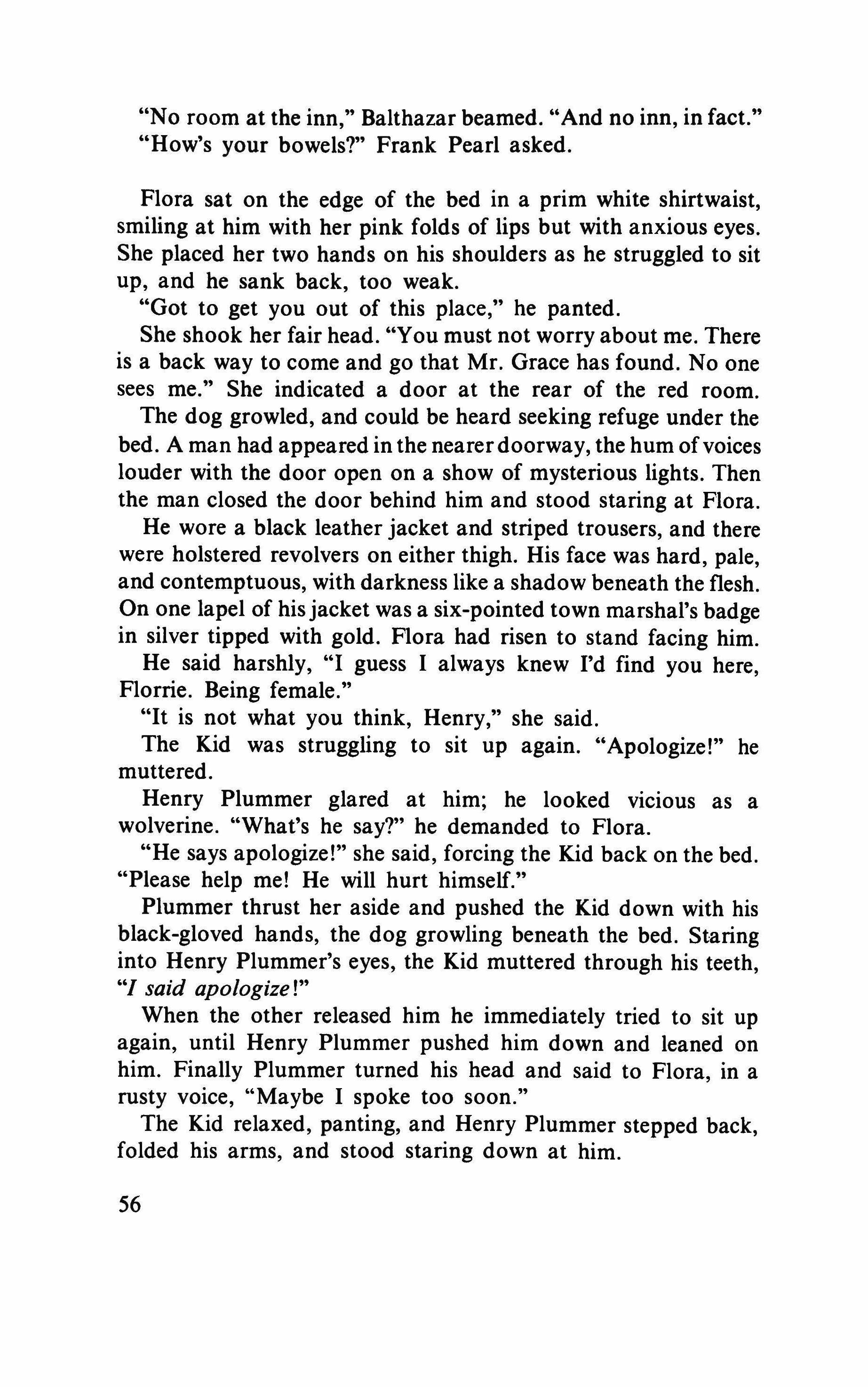
"No room at the inn," Balthazar beamed. "And no inn, in fact."
"How's your bowels?" Frank Pearl asked.
Flora sat on the edge of the bed in a prim white shirtwaist, smiling at him with her pink folds of lips but with anxious eyes. She placed her two hands on his shoulders as he struggled to sit up, and he sank back, too weak.
"Got to get you out of this place," he panted.
She shook her fair head. "You must not worry about me. There is a back way to come and go that Mr. Grace has found. No one sees me." She indicated a door at the rear of the red room.
The dog growled, and could be heard seeking refuge under the bed. A man had appeared in the nearer doorway, the hum ofvoices louder with the door open on a show of mysterious lights. Then the man closed the door behind him and stood staring at Flora.
He wore a black leather jacket and striped trousers, and there were holstered revolvers on either thigh. His face was hard, pale, and contemptuous, with darkness like a shadow beneath the flesh. On one lapel of hisjacket was a six-pointed town marshal's badge in silver tipped with gold. Flora had risen to stand facing him.
He said harshly, "I guess I always knew I'd find you here, Florrie. Being female."
"It is not what you think, Henry," she said. The Kid was struggling to sit up again. "Apologize!" he muttered.
Henry Plummer glared at him; he looked vicious as a wolverine. "What's he say?" he demanded to Flora.
"He says apologize!" she said, forcing the Kid back on the bed. "Please help me! He will hurt himself."
Plummer thrust her aside and pushed the Kid down with his black-gloved hands, the dog growling beneath the bed. Staring into Henry Plummer's eyes, the Kid muttered through his teeth, "I said apologize!"
When the other released him he immediately tried to sit up again, until Henry Plummer pushed him down and leaned on him. Finally Plummer turned his head and said to Flora, in a rusty voice, "Maybe I spoke too soon."
The Kid relaxed, panting, and Henry Plummer stepped back, folded his arms, and stood staring down at him.
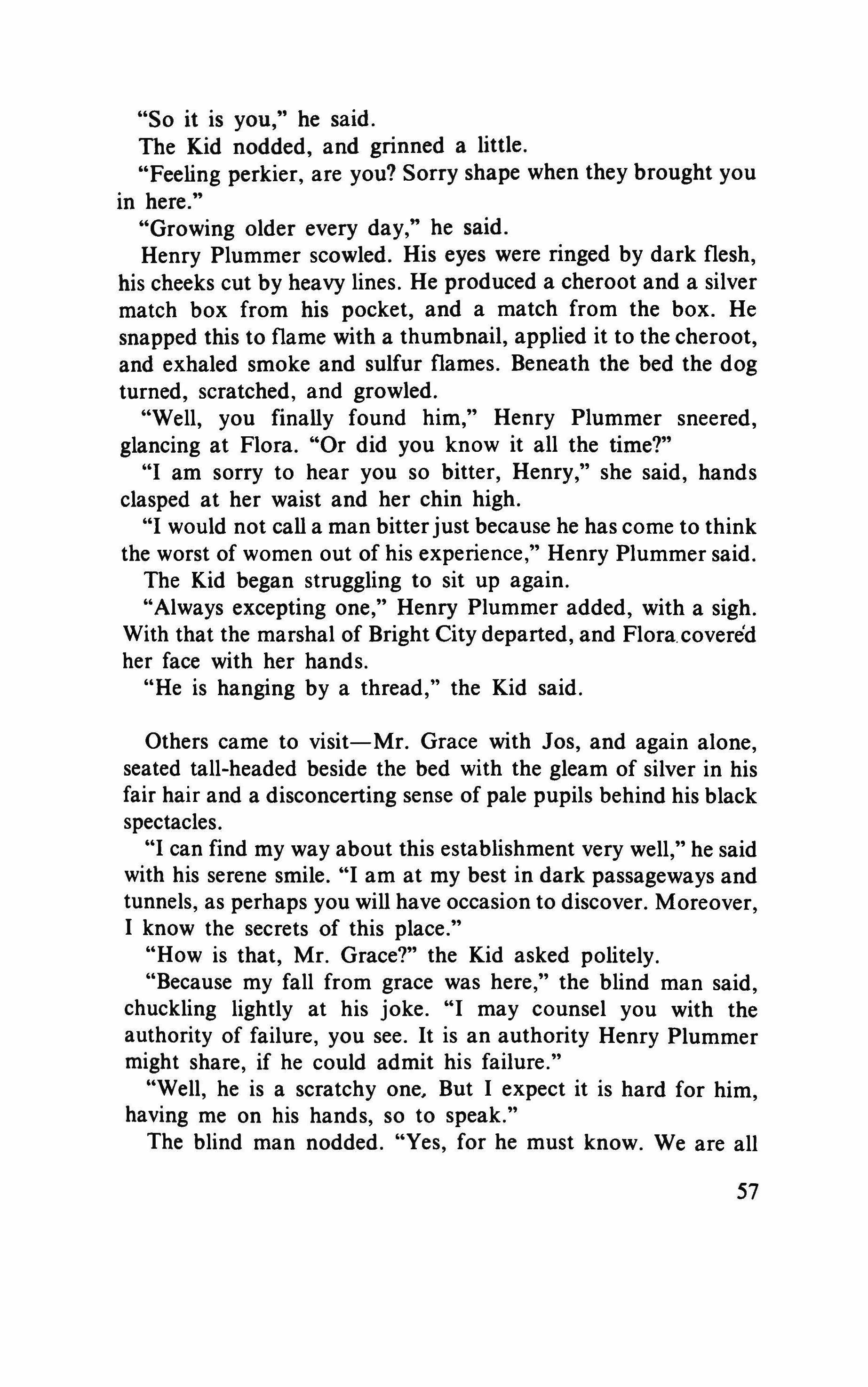
"So it is you," he said.
The Kid nodded, and grinned a little.
"Feeling perkier, are you? Sorry shape when they brought you in here."
"Growing older every day," he said.
Henry Plummer scowled. His eyes were ringed by dark flesh, his cheeks cut by heavy lines. He produced a cheroot and a silver match box from his pocket, and a match from the box. He snapped this to flame with a thumbnail, applied it to the cheroot, and exhaled smoke and sulfur flames. Beneath the bed the dog turned, scratched, and growled.
"Well, you finally found him," Henry Plummer sneered, glancing at Flora. "Or did you know it all the time?"
"I am sorry to hear you so bitter, Henry," she said, hands clasped at her waist and her chin high.
"I would not call a man bitterjust because he has come to think the worst of women out of his experience," Henry Plummer said.
The Kid began struggling to sit up again.
"Always excepting one," Henry Plummer added, with a sigh. With that the marshal of Bright City departed, and Flora.covered her face with her hands.
"He is hanging by a thread," the Kid said.
Others came to visit-Mr. Grace with Jos, and again alone, seated tall-headed beside the bed with the gleam of silver in his fair hair and a disconcerting sense of pale pupils behind his black spectacles.
"I can find my way about this establishment very well," he said with his serene smile. "I am at my best in dark passageways and tunnels, as perhaps you will have occasion to discover. Moreover, 1 know the secrets of this place."
"How is that, Mr. Grace?" the Kid asked politely.
"Because my fall from grace was here," the blind man said, chuckling lightly at his joke. "I may counsel you with the authority of failure, you see. It is an authority Henry Plummer might share, if he could admit his failure."
"Well, he is a scratchy one. But 1 expect it is hard for him, having me on his hands, so to speak."
The blind man nodded. "Yes, for he must know. We are all
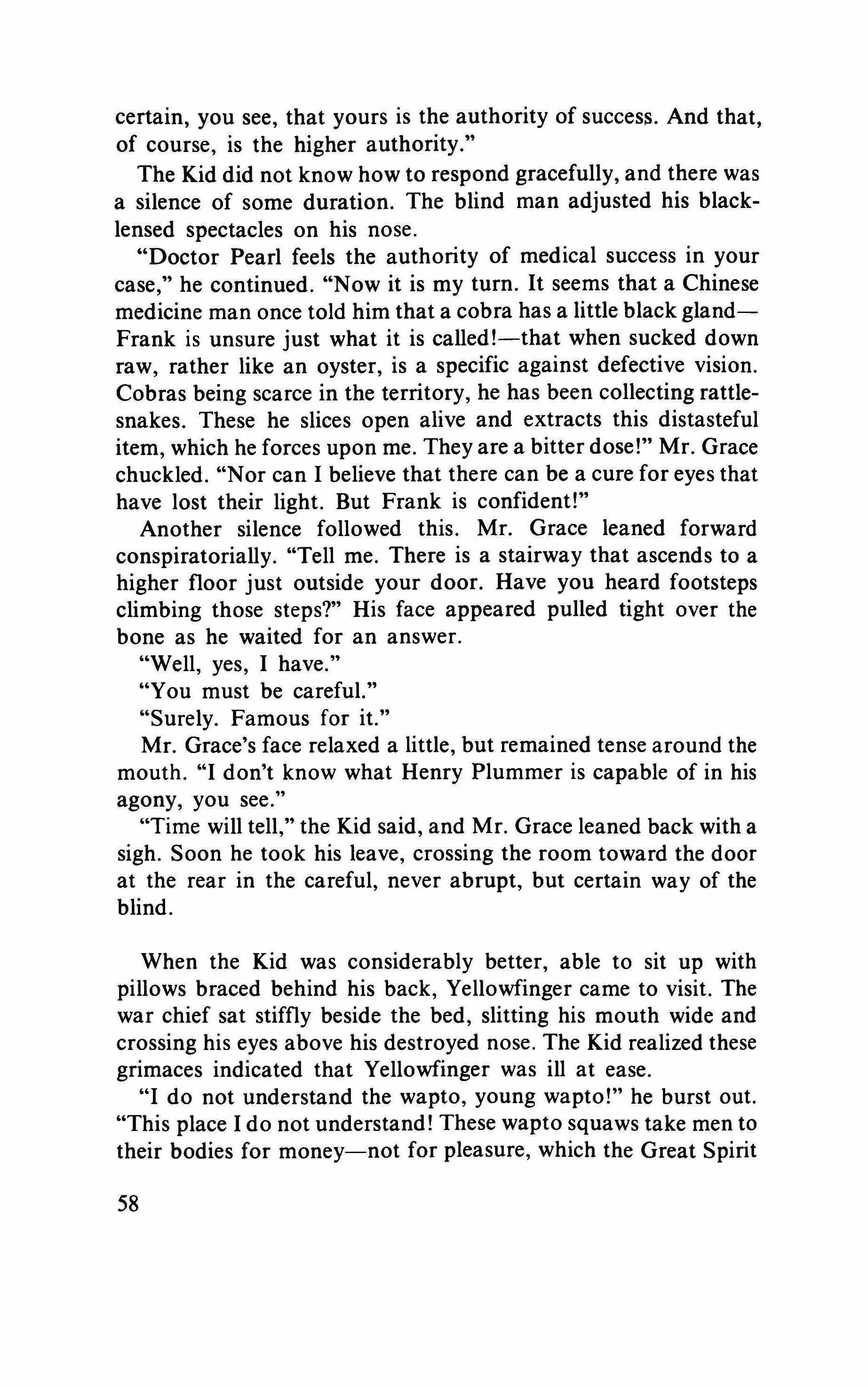
certain, you see, that yours is the authority of success. And that, of course, is the higher authority."
The Kid did not know how to respond gracefully, and there was a silence of some duration. The blind man adjusted his blacklensed spectacles on his nose.
"Doctor Pearl feels the authority of medical success in your case," he continued. "Now it is my turn. It seems that a Chinese medicine man once told him that a cobra has a little black glandFrank is unsure just what it is called!-that when sucked down raw, rather like an oyster, is a specific against defective vision. Cobras being scarce in the territory, he has been collecting rattlesnakes. These he slices open alive and extracts this distasteful item, which he forces upon me. They are a bitter dose!" Mr. Grace chuckled. "Nor can I believe that there can be a cure for eyes that have lost their light. But Frank is confident!"
Another silence followed this. Mr. Grace leaned forward conspiratorially. "Tell me. There is a stairway that ascends to a higher floor just outside your door. Have you heard footsteps climbing those steps?" His face appeared pulled tight over the bone as he waited for an answer.
"Well, yes, I have."
"You must be careful."
"Surely. Famous for it."
Mr. Grace's face relaxed a little, but remained tense around the mouth. "I don't know what Henry Plummer is capable of in his agony, you see."
"Time will tell," the Kid said, and Mr. Grace leaned back with a sigh. Soon he took his leave, crossing the room toward the door at the rear in the careful, never abrupt, but certain way of the blind.
When the Kid was considerably better, able to sit up with pillows braced behind his back, Yellowfinger came to visit. The war chief sat stiffly beside the bed, slitting his mouth wide and crossing his eyes above his destroyed nose. The Kid realized these grimaces indicated that Yellowfinger was ill at ease.
"I do not understand the wapto, young wapto!" he burst out. "This place I do not understand! These wapto squaws take men to their bodies for money-not for pleasure, which the Great Spirit
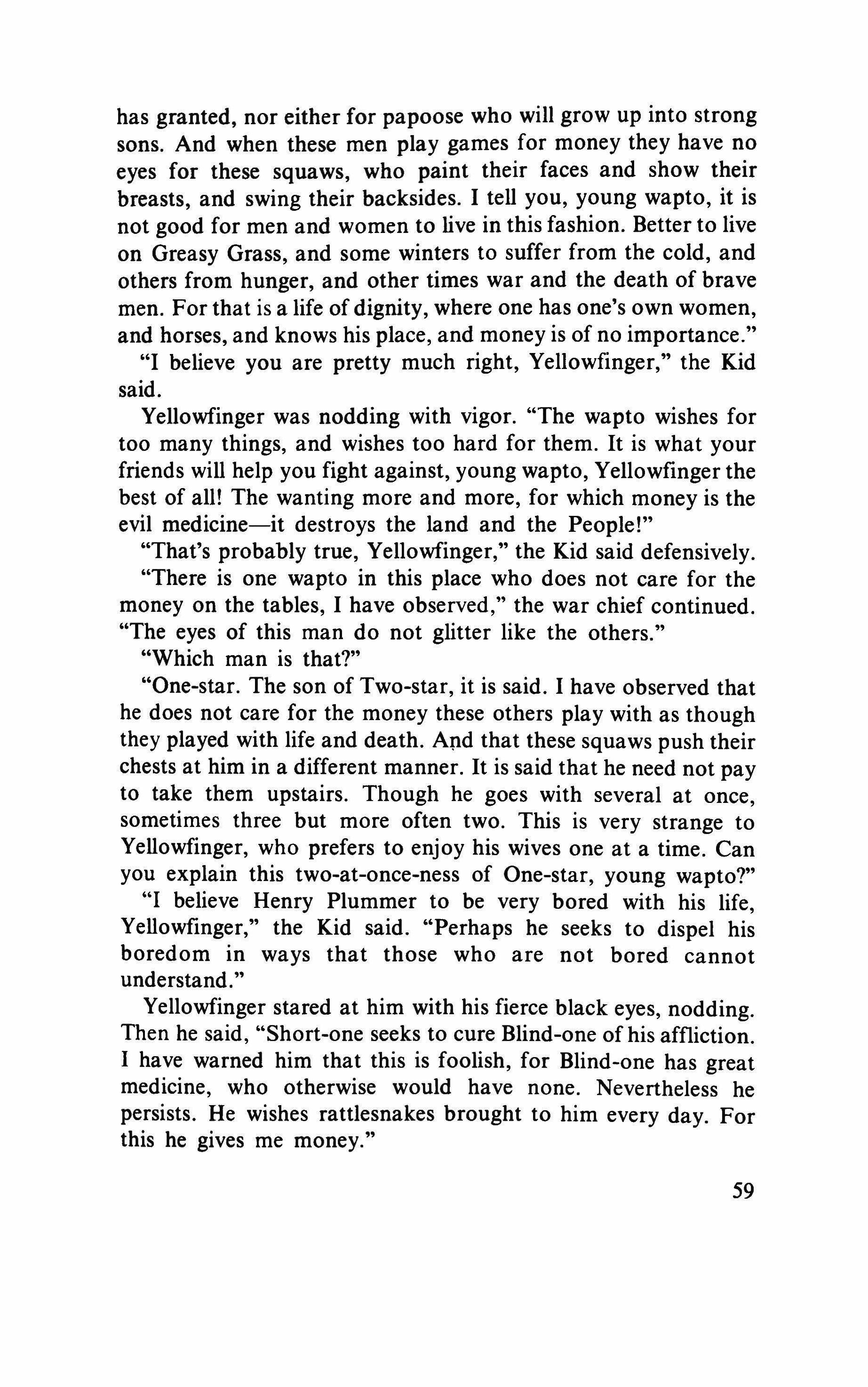
has granted, nor either for papoose who will grow up into strong sons. And when these men play games for money they have no eyes for these squaws, who paint their faces and show their breasts, and swing their backsides. I tell you, young wapto, it is not good for men and women to live in this fashion. Better to live on Greasy Grass, and some winters to suffer from the cold, and others from hunger, and other times war and the death of brave men. For that is a life of dignity, where one has one's own women, and horses, and knows his place, and money is of no importance."
"I believe you are pretty much right, Yellowfinger," the Kid said.
Yellowfinger was nodding with vigor. "The wapto wishes for too many things, and wishes too hard for them. It is what your friends will help you fight against, young wapto, Yellowfinger the best of all! The wanting more and more, for which money is the evil medicine-it destroys the land and the People!"
"That's probably true, Yellowfinger," the Kid said defensively.
"There is one wapto in this place who does not care for the money on the tables, I have observed," the war chief continued. "The eyes of this man do not glitter like the others."
"Which man is that?"
"One-star. The son of Two-star, it is said. I have observed that he does not care for the money these others play with as though they played with life and death. And that these squaws push their chests at him in a different manner. It is said that he need not pay to take them upstairs. Though he goes with several at once, sometimes three but more often two. This is very strange to Yellowfinger, who prefers to enjoy his wives one at a time. Can you explain this two-at-once-ness of One-star, young wapto?"
"I believe Henry Plummer to be very bored with his life, Yellowfinger," the Kid said. "Perhaps he seeks to dispel his boredom in ways that those who are not bored cannot understand.
Yellowfinger stared at him with his fierce black eyes, nodding. Then he said, "Short-one seeks to cure Blind-one of his affliction. I have warned him that this is foolish, for Blind-one has great medicine, who otherwise would have none. Nevertheless he persists. He wishes rattlesnakes brought to him every day. For this he gives me money."
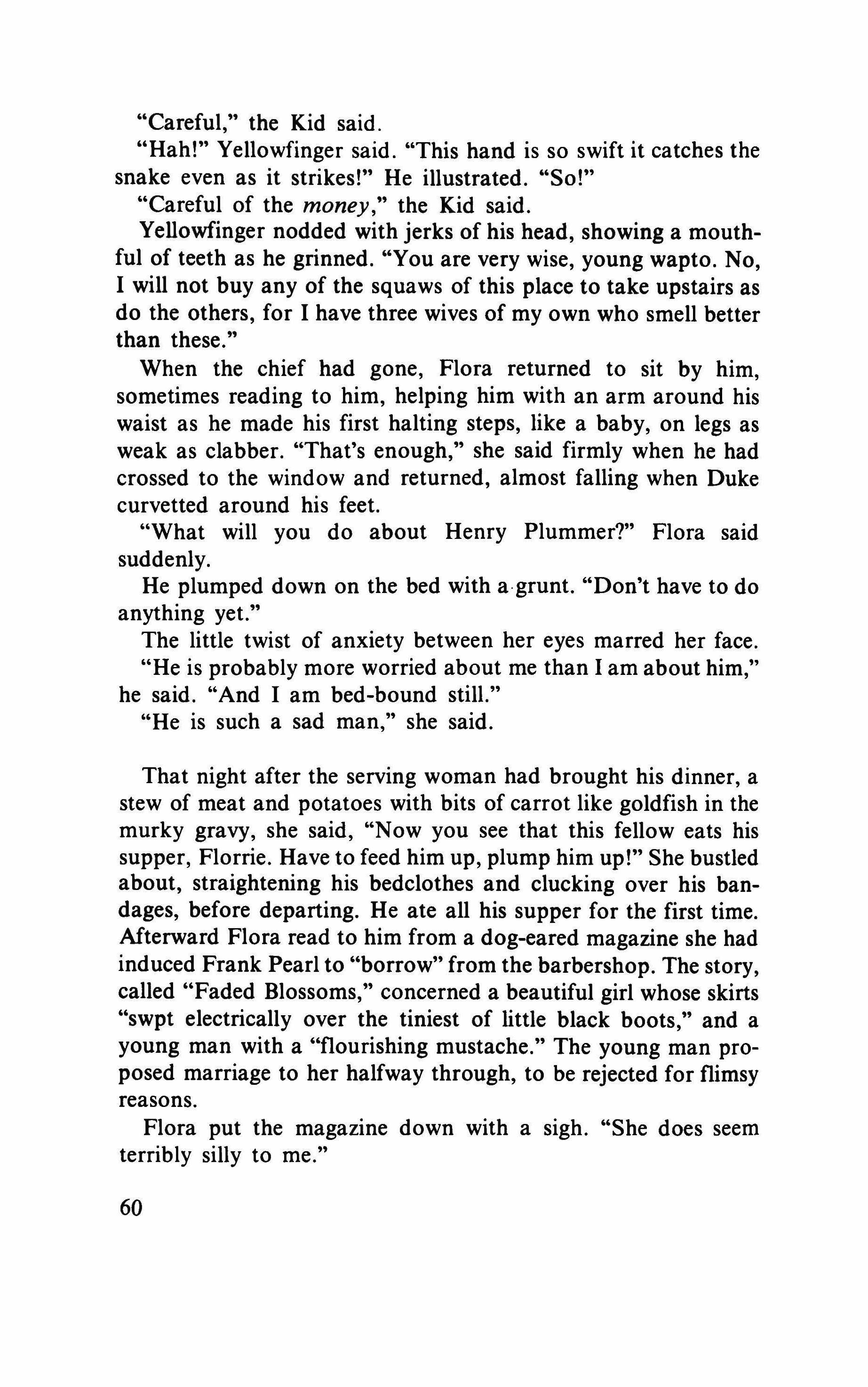
"Careful," the Kid said. "Hah!" Yellowfinger said. "This hand is so swift it catches the snake even as it strikes!" He illustrated. "So!"
"Careful of the money," the Kid said.
Yellowfinger nodded with jerks of his head, showing a mouthful of teeth as he grinned. "You are very wise, young wapto. No, I will not buy any of the squaws of this place to take upstairs as do the others, for I have three wives of my own who smell better than these."
When the chief had gone, Flora returned to sit by him, sometimes reading to him, helping him with an arm around his waist as he made his first halting steps, like a baby, on legs as weak as clabber. "That's enough," she said firmly when he had crossed to the window and returned, almost falling when Duke curvetted around his feet.
"What will you do about Henry Plummer?" Flora said suddenly.
He plumped down on the bed with a grunt. "Don't have to do anything yet."
The little twist of anxiety between her eyes marred her face.
"He is probably more worried about me than I am about him," he said. "And I am bed-bound still."
"He is such a sad man," she said.
That night after the serving woman had brought his dinner, a stew of meat and potatoes with bits of carrot like goldfish in the murky gravy, she said, "Now you see that this fellow eats his supper, Florrie. Have to feed him up, plump him up!" She bustled about, straightening his bedclothes and clucking over his bandages, before departing. He ate all his supper for the first time. Afterward Flora read to him from a dog-eared magazine she had induced Frank Pearl to "borrow" from the barbershop. The story, called "Faded Blossoms," concerned a beautiful girl whose skirts "swpt electrically over the tiniest of little black boots," and a young man with a "flourishing mustache." The young man proposed marriage to her halfway through, to be rejected for flimsy reasons.
Flora put the magazine down with a sigh. "She does seem terribly silly to me."
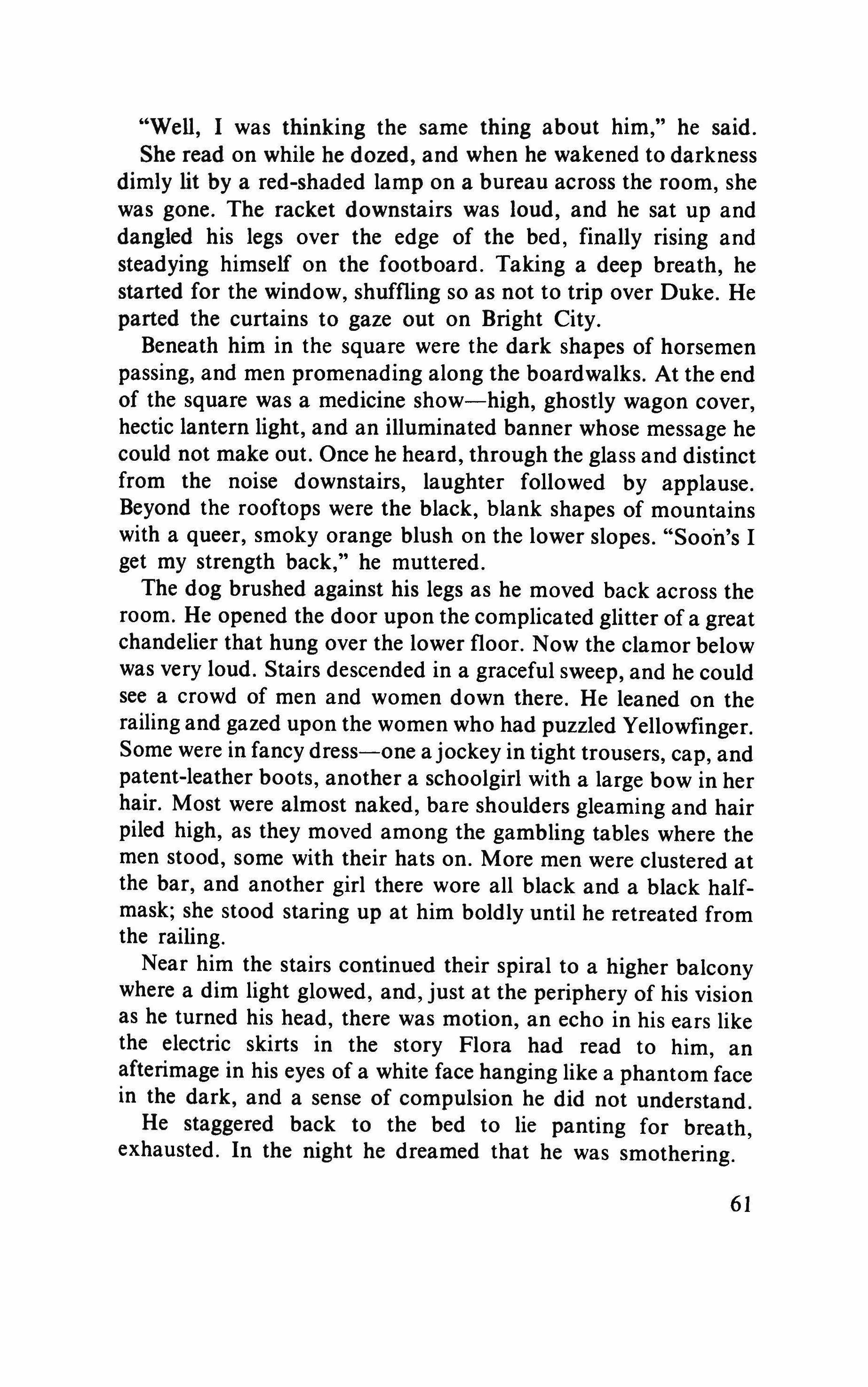
"Well, I was thinking the same thing about him," he said. She read on while he dozed, and when he wakened to darkness dimly lit by a red-shaded lamp on a bureau across the room, she was gone. The racket downstairs was loud, and he sat up and dangled his legs over the edge of the bed, finally rising and steadying himself on the footboard. Taking a deep breath, he started for the window, shuffling so as not to trip over Duke. He parted the curtains to gaze out on Bright City.
Beneath him in the square were the dark shapes of horsemen passing, and men promenading along the boardwalks. At the end of the square was a medicine show-high, ghostly wagon cover, hectic lantern light, and an illuminated banner whose message he could not make out. Once he heard, through the glass and distinct from the noise downstairs, laughter followed by applause. Beyond the rooftops were the black, blank shapes of mountains with a queer, smoky orange blush on the lower slopes. "Soon's I get my strength back," he muttered.
The dog brushed against his legs as he moved back across the room. He opened the door upon the complicated glitter of a great chandelier that hung over the lower floor. Now the clamor below was very loud. Stairs descended in a graceful sweep, and he could see a crowd of men and women down there. He leaned on the railing and gazed upon the women who had puzzled Yellowfinger. Some were in fancy dress-one a jockey in tight trousers, cap, and patent-leather boots, another a schoolgirl with a large bow in her hair. Most were almost naked, bare shoulders gleaming and hair piled high, as they moved among the gambling tables where the men stood, some with their hats on. More men were clustered at the bar, and another girl there wore all black and a black halfmask; she stood staring up at him boldly until he retreated from the railing.
Near him the stairs continued their spiral to a higher balcony where a dim light glowed, and, just at the periphery of his vision as he turned his head, there was motion, an echo in his ears like the electric skirts in the story Flora had read to him, an afterimage in his eyes of a white face hanging like a phantom face in the dark, and a sense of compulsion he did not understand. He staggered back to the bed to lie panting for breath, exhausted. In the night he dreamed that he was smothering.
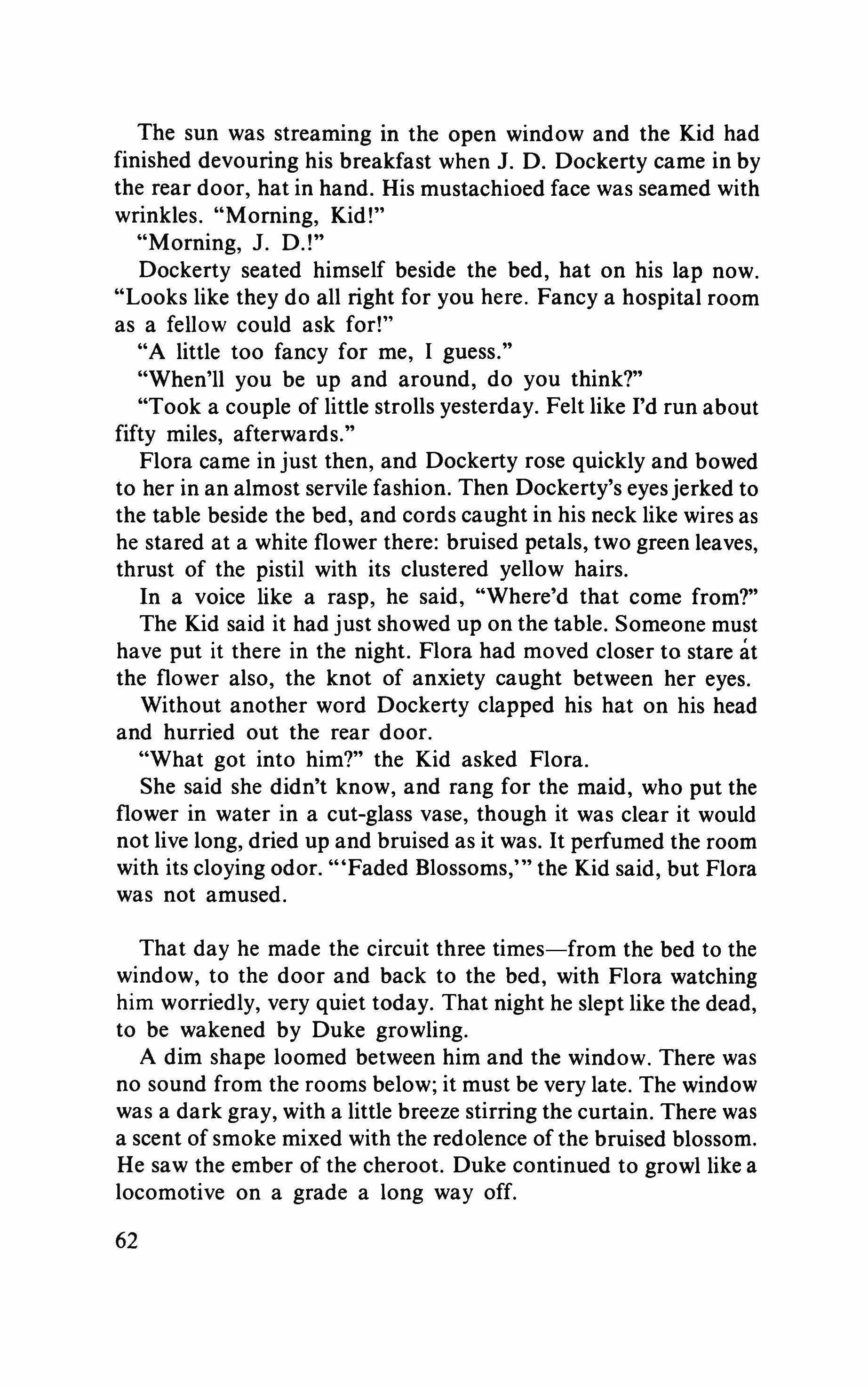
The sun was streaming in the open window and the Kid had finished devouring his breakfast when J. D. Dockerty came in by the rear door, hat in hand. His mustachioed face was seamed with wrinkles. "Morning, Kid!"
"Morning, J. D.!"
Dockerty seated himself beside the bed, hat on his lap now. "Looks like they do all right for you here. Fancy a hospital room as a fellow could ask for!"
"A little too fancy for me, I guess."
"When'll you be up and around, do you think?"
"Took a couple of little strolls yesterday. Felt like I'd run about fifty miles, afterwards."
Flora came in just then, and Dockerty rose quickly and bowed to her in an almost servile fashion. Then Dockerty's eyes jerked to the table beside the bed, and cords caught in his neck like wires as he stared at a white flower there: bruised petals, two green leaves, thrust of the pistil with its clustered yellow hairs.
In a voice like a rasp, he said, "Where'd that come from?"
The Kid said it had just showed up on the table. Someone must have put it there in the night. Flora had moved closer to stare at the flower also, the knot of anxiety caught between her eyes. Without another word Dockerty clapped his hat on his head and hurried out the rear door.
"What got into him?" the Kid asked Flora.
She said she didn't know, and rang for the maid, who put the flower in water in a cut-glass vase, though it was clear it would not live long, dried up and bruised as it was. It perfumed the room with its cloying odor. '''Faded Blossoms,'" the Kid said, but Flora was not amused.
That day he made the circuit three times-from the bed to the window, to the door and back to the bed, with Flora watching him worriedly, very quiet today. That night he slept like the dead, to be wakened by Duke growling.
A dim shape loomed between him and the window. There was no sound from the rooms below; it must be very late. The window was a dark gray, with a little breeze stirring the curtain. There was a scent of smoke mixed with the redolence of the bruised blossom. He saw the ember of the cheroot. Duke continued to growl like a locomotive on a grade a long way off.
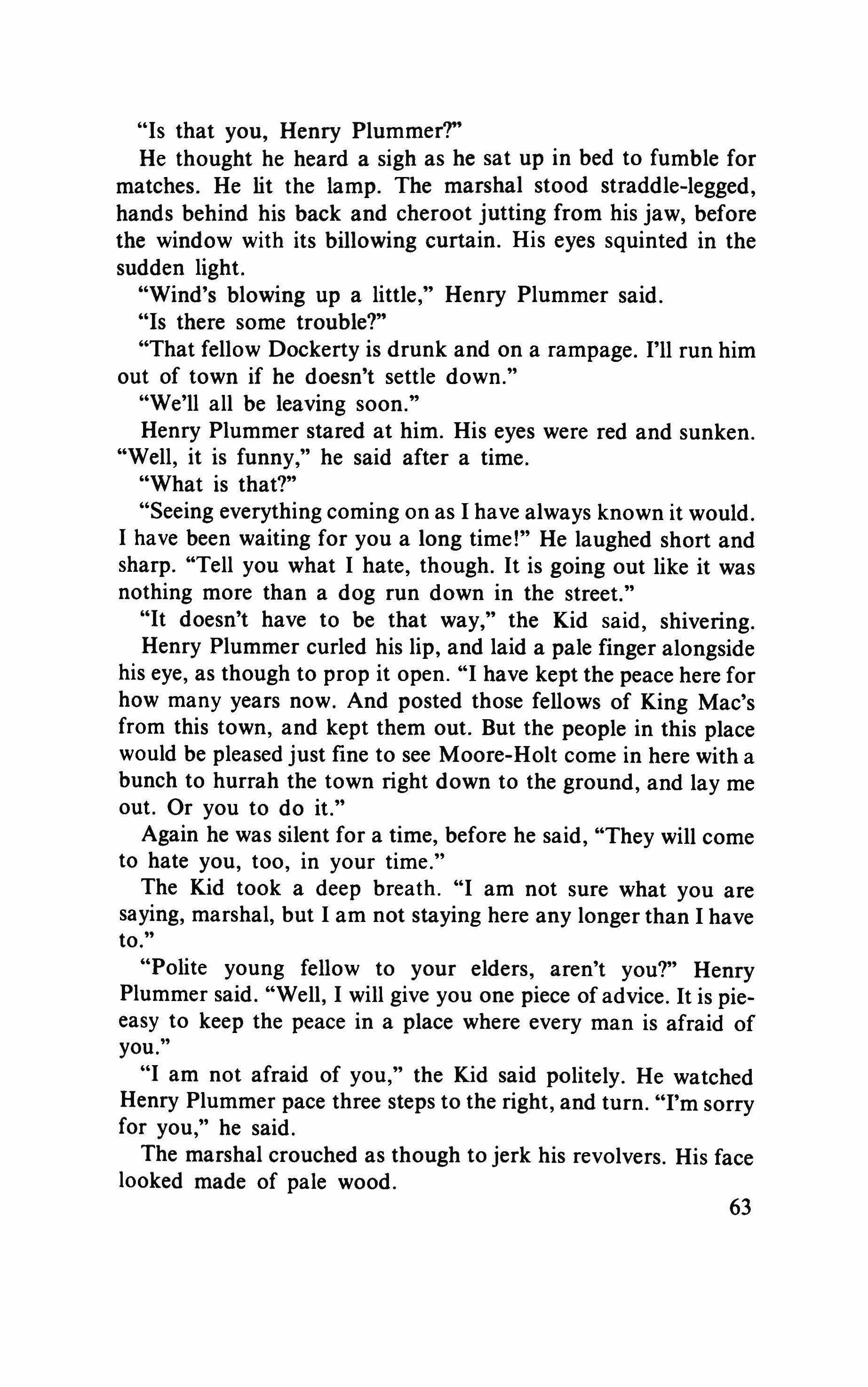
"Is that you, Henry Plummer?"
He thought he heard a sigh as he sat up in bed to fumble for matches. He lit the lamp. The marshal stood straddle-legged, hands behind his back and cheroot jutting from his jaw, before the window with its billowing curtain. His eyes squinted in the sudden light.
"Wind's blowing up a little," Henry Plummer said.
"Is there some trouble?"
"That fellow Dockerty is drunk and on a rampage. I'll run him out of town if he doesn't settle down."
"We'll all be leaving soon."
Henry Plummer stared at him. His eyes were red and sunken. "Well, it is funny," he said after a time.
"What is that?"
"Seeing everything coming on as 1 have always known it would. I have been waiting for you a long time!" He laughed short and sharp. "Tell you what I hate, though. It is going out like it was nothing more than a dog run down in the street."
"It doesn't have to be that way," the Kid said, shivering.
Henry Plummer curled his lip, and laid a pale finger alongside his eye, as though to prop it open. "I have kept the peace here for how many years now. And posted those fellows of King Mac's from this town, and kept them out. But the people in this place would be pleased just fine to see Moore-Holt come in here with a bunch to hurrah the town right down to the ground, and lay me out. Or you to do it."
Again he was silent for a time, before he said, "They will come to hate you, too, in your time."
The Kid took a deep breath. "I am not sure what you are saying, marshal, but 1 am not staying here any longer than 1 have to."
"Polite young fellow to your elders, aren't you?" Henry Plummer said. "Well, 1 will give you one piece of advice. It is pieeasy to keep the peace in a place where every man is afraid of you."
"I am not afraid of you," the Kid said politely. He watched Henry Plummer pace three steps to the right, and turn. "I'm sorry for you," he said.
The marshal crouched as though to jerk his revolvers. His face looked made of pale wood.

"Sitting here for how long waiting for somebody to come and lay you out," the Kid went on. "Moore-Holt and those people of King Mac's, or somebody else. Or both. And knowing all the time it was you should have gone after King Mac."
Henry Plummer's teeth appeared at the corner of his mouth, but not in a smile. "Not so polite as I said, are you?" He straightened, hooked his thumbs in his cartridge belt. "Didn't care to go after them," he said. "None of my jurisdiction what devilment they were getting into over there."
"Everybody's jurisdiction," the Kid said.
"You are telling me where I went wrong, are you?"
"That's right. You just sat tight minding your jurisdiction, and now it has almost gone by you. Almost, I say."
"Damn you to hell!" Henry Plummer said through his teeth.
"Almost. We will be moving against King Mac when I get my strength back. Will you come with us?"
Henry Plummer passed a hand before his eyes as though brushing away something sticky. "Not interested," he said.
"I will ask you one more time."
"Not interested in your side or the other one either."
"Just sitting here singing sad songs to yourself," the Kid said gently. "I am sorry for you, Henry Plummer."
The other turned to face the window; smoke from his cheroot carried back into the room. A knife was thrust between the crossed cartridge belts at the small of his back. He stood gazing out the window into the dark.
"Looks like a medicine show out in the square," the Kid said.
"There's a fellow that throws knives," the marshal said in a dead voice. "Girl that sings. They are not much of a show." Turning, he paced slowly across the room, halting as though he'd run into a glass wall at the sight of the browning flower in its little vase. "Where'd you get that?"
"Somebody left it on the table there last night. Didn't even get a growl out of Duke." Duke growled faintly, as though to make up for his dereliction.
"You took it on yourself to give me some advice a while ago," Henry Plummer said in a deep voice. "I'll give you some back. Don't bother yourself about where that flower came from."
"Well, I don't. But everybody else seems to."
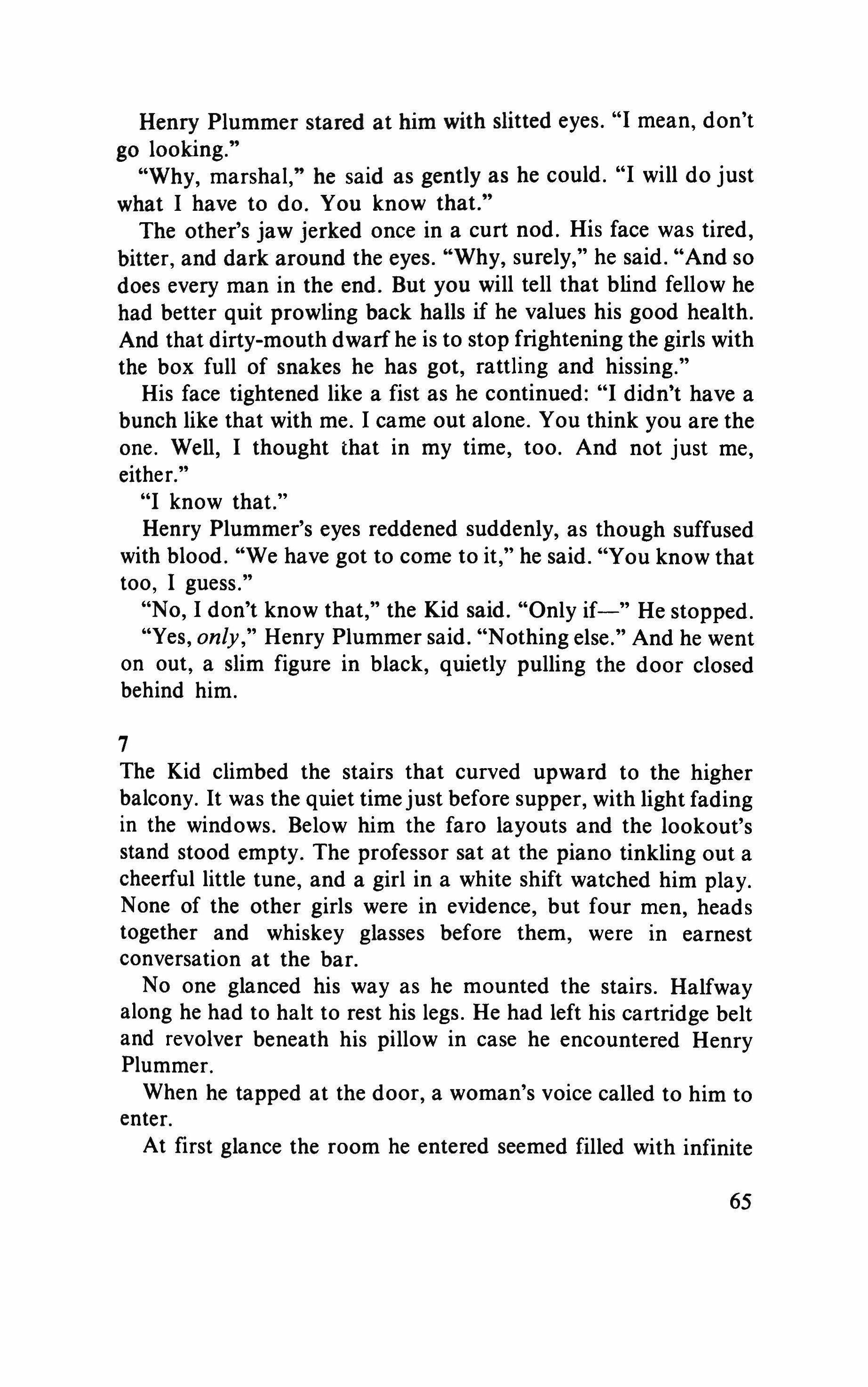
Henry Plummer stared at him with slitted eyes. "I mean, don't go looking."
"Why, marshal," he said as gently as he could. "I will do just what I have to do. You know that."
The other's jaw jerked once in a curt nod. His face was tired, bitter, and dark around the eyes. "Why, surely," he said. "And so does every man in the end. But you will tell that blind fellow he had better quit prowling back halls if he values his good health. And that dirty-mouth dwarf he is to stop frightening the girls with the box full of snakes he has got, rattling and hissing."
His face tightened like a fist as he continued: "I didn't have a bunch like that with me. I came out alone. You think you are the one. Well, I thought that in my time, too. And not just me, either."
"I know that."
Henry Plummer's eyes reddened suddenly, as though suffused with blood. "We have got to come to it," he said. "You know that too, I guess."
"No, I don't know that," the Kid said. "Only if-" He stopped. "Yes, only," Henry Plummer said. "Nothing else." And he went on out, a slim figure in black, quietly pulling the door closed behind him.
7
The Kid climbed the stairs that curved upward to the higher balcony. It was the quiet time just before supper, with light fading in the windows. Below him the faro layouts and the lookout's stand stood empty. The professor sat at the piano tinkling out a cheerful little tune, and a girl in a white shift watched him play. None of the other girls were in evidence, but four men, heads together and whiskey glasses before them, were in earnest conversation at the bar.
No one glanced his way as he mounted the stairs. Halfway along he had to halt to rest his legs. He had left his cartridge belt and revolver beneath his pillow in case he encountered Henry Plummer.
When he tapped at the door, a woman's voice called to him to enter.
At first glance the room he entered seemed filled with infinite
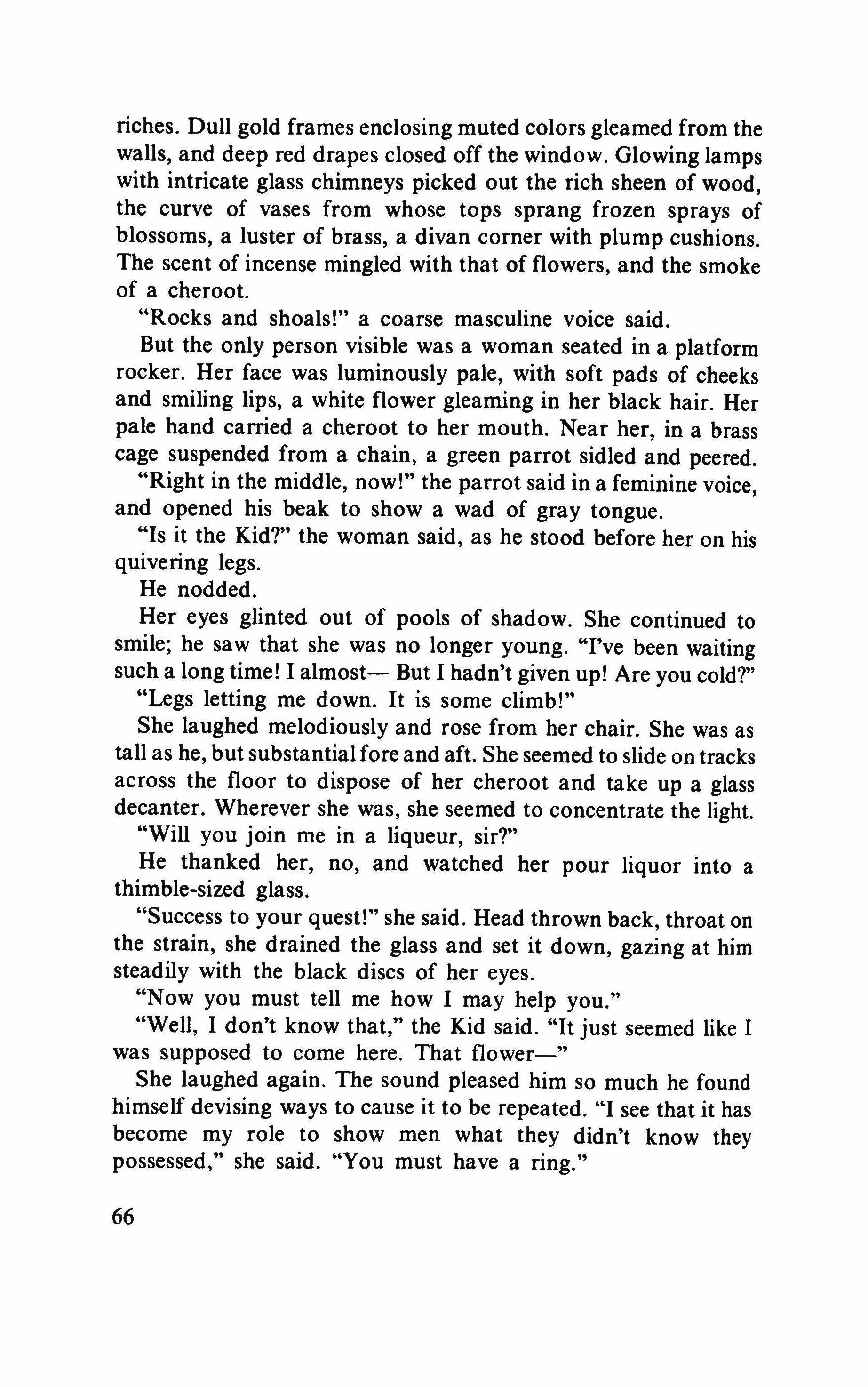
riches. Dull gold frames enclosing muted colors gleamed from the walls, and deep red drapes closed off the window. Glowing lamps with intricate glass chimneys picked out the rich sheen of wood, the curve of vases from whose tops sprang frozen sprays of blossoms, a luster of brass, a divan corner with plump cushions. The scent of incense mingled with that of flowers, and the smoke of a cheroot.
"Rocks and shoals!" a coarse masculine voice said.
But the only person visible was a woman seated in a platform rocker. Her face was luminously pale, with soft pads of cheeks and smiling lips, a white flower gleaming in her black hair. Her pale hand carried a cheroot to her mouth. Near her, in a brass cage suspended from a chain, a green parrot sidled and peered.
"Right in the middle, now!" the parrot said in a feminine voice, and opened his beak to show a wad of gray tongue.
"Is it the Kid?" the woman said, as he stood before her on his quivering legs.
He nodded.
Her eyes glinted out of pools of shadow. She continued to smile; he saw that she was no longer young. "I've been waiting such a long time! I almost- But I hadn't given up! Are you cold?"
"Legs letting me down. It is some climb!"
She laughed melodiously and rose from her chair. She was as tall as he, but substantial fore and aft. She seemed to slide on tracks across the floor to dispose of her cheroot and take up a glass decanter. Wherever she was, she seemed to concentrate the light.
"Will you join me in a liqueur, sir?"
He thanked her, no, and watched her pour liquor into a thimble-sized glass.
"Success to your quest!" she said. Head thrown back, throat on the strain, she drained the glass and set it down, gazing at him steadily with the black discs of her eyes.
"Now you must tell me how I may help you."
"Well, I don't know that," the Kid said. "It just seemed like I was supposed to come here. That flower-"
She laughed again. The sound pleased him so much he found himself devising ways to cause it to be repeated. "I see that it has become my role to show men what they didn't know they possessed," she said. "You must have a ring."
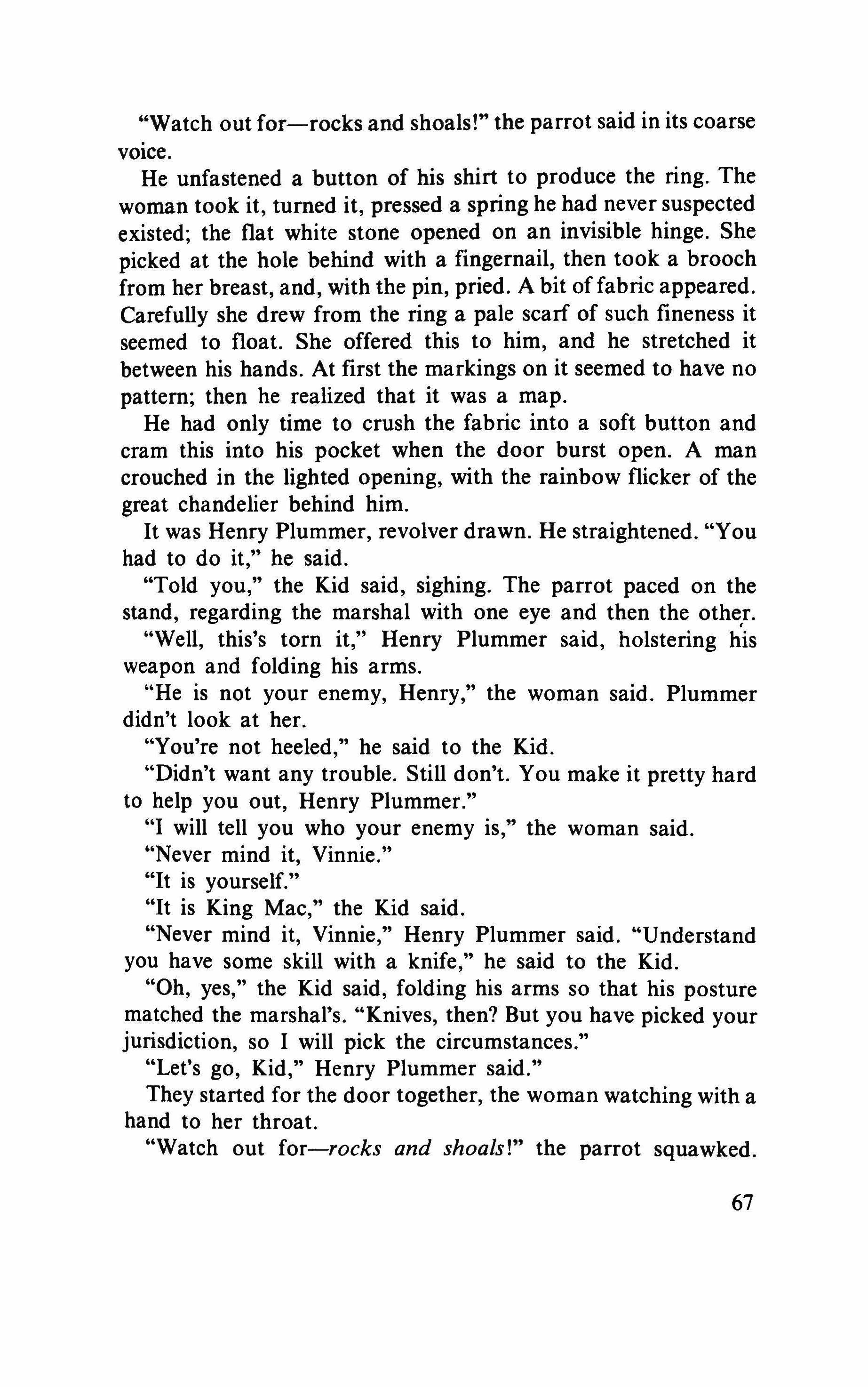
"Watch out for-rocks and shoals!" the parrot said in its coarse voice.
He unfastened a button of his shirt to produce the ring. The woman took it, turned it, pressed a spring he had never suspected existed; the flat white stone opened on an invisible hinge. She picked at the hole behind with a fingernail, then took a brooch from her breast, and, with the pin, pried. A bit of fabric appeared. Carefully she drew from the ring a pale scarf of such fineness it seemed to float. She offered this to him, and he stretched it between his hands. At first the markings on it seemed to have no pattern; then he realized that it was a map.
He had only time to crush the fabric into a soft button and cram this into his pocket when the door burst open. A man crouched in the lighted opening, with the rainbow flicker of the great chandelier behind him.
It was Henry Plummer, revolver drawn. He straightened. "You had to do it," he said.
"Told you," the Kid said, sighing. The parrot paced on the stand, regarding the marshal with one eye and then the other.
"Well, this's torn it," Henry Plummer said, holstering his weapon and folding his arms.
"He is not your enemy, Henry," the woman said. Plummer didn't look at her.
"You're not heeled," he said to the Kid.
"Didn't want any trouble. Still don't. You make it pretty hard to help you out, Henry Plummer."
"I will tell you who your enemy is," the woman said.
"Never mind it, Vinnie."
"It is yourself."
"It is King Mac," the Kid said.
"Never mind it, Vinnie," Henry Plummer said. "Understand you have some skill with a knife," he said to the Kid.
"Oh, yes," the Kid said, folding his arms so that his posture matched the marshal's. "Knives, then? But you have picked your jurisdiction, so 1 will pick the circumstances."
"Let's go, Kid," Henry Plummer said."
They started for the door together, the woman watching with a hand to her throat.
"Watch out for-rocks and shoals!" the parrot squawked.
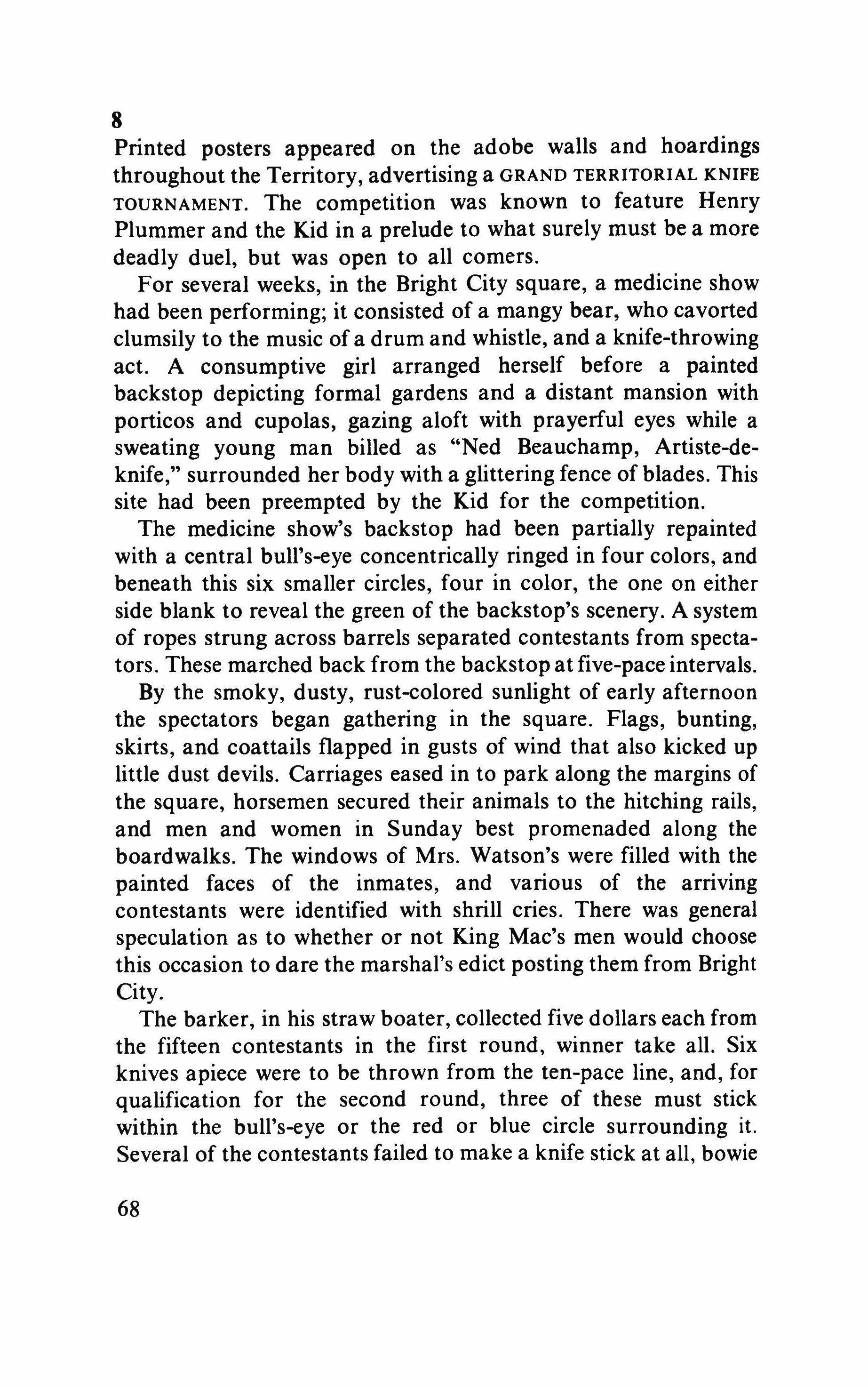
Printed posters appeared on the adobe walls and hoardings throughout the Territory, advertising a GRAND TERRITORIAL KNIFE TOURNAMENT. The competition was known to feature Henry Plummer and the Kid in a prelude to what surely must be a more deadly duel, but was open to all comers.
For several weeks, in the Bright City square, a medicine show had been performing; it consisted of a mangy bear, who cavorted clumsily to the music of a drum and whistle, and a knife-throwing act. A consumptive girl arranged herself before a painted backstop depicting formal gardens and a distant mansion with porticos and cupolas, gazing aloft with prayerful eyes while a sweating young man billed as "Ned Beauchamp, Artiste-deknife," surrounded her body with a glittering fence of blades. This site had been preempted by the Kid for the competition.
The medicine show's backstop had been partially repainted with a central bull's-eye concentrically ringed in four colors, and beneath this six smaller circles, four in color, the one on either side blank to reveal the green of the backstop's scenery. A system of ropes strung across barrels separated contestants from spectators. These marched back from the backstop at five-pace intervals. By the smoky, dusty, rust-colored sunlight of early afternoon the spectators began gathering in the square. Flags, bunting, skirts, and coattails flapped in gusts of wind that also kicked up little dust devils. Carriages eased in to park along the margins of the square, horsemen secured their animals to the hitching rails, and men and women in Sunday best promenaded along the boardwalks. The windows of Mrs. Watson's were filled with the painted faces of the inmates, and various of the arriving contestants were identified with shrill cries. There was general speculation as to whether or not King Mac's men would choose this occasion to dare the marshal's edict posting them from Bright City.
The barker, in his straw boater, collected five dollars each from the fifteen contestants in the first round, winner take all. Six knives apiece were to be thrown from the ten-pace line, and, for qualification for the second round, three of these must stick within the bull's-eye or the red or blue circle surrounding it. Several of the contestants failed to make a knife stick at all, bowie
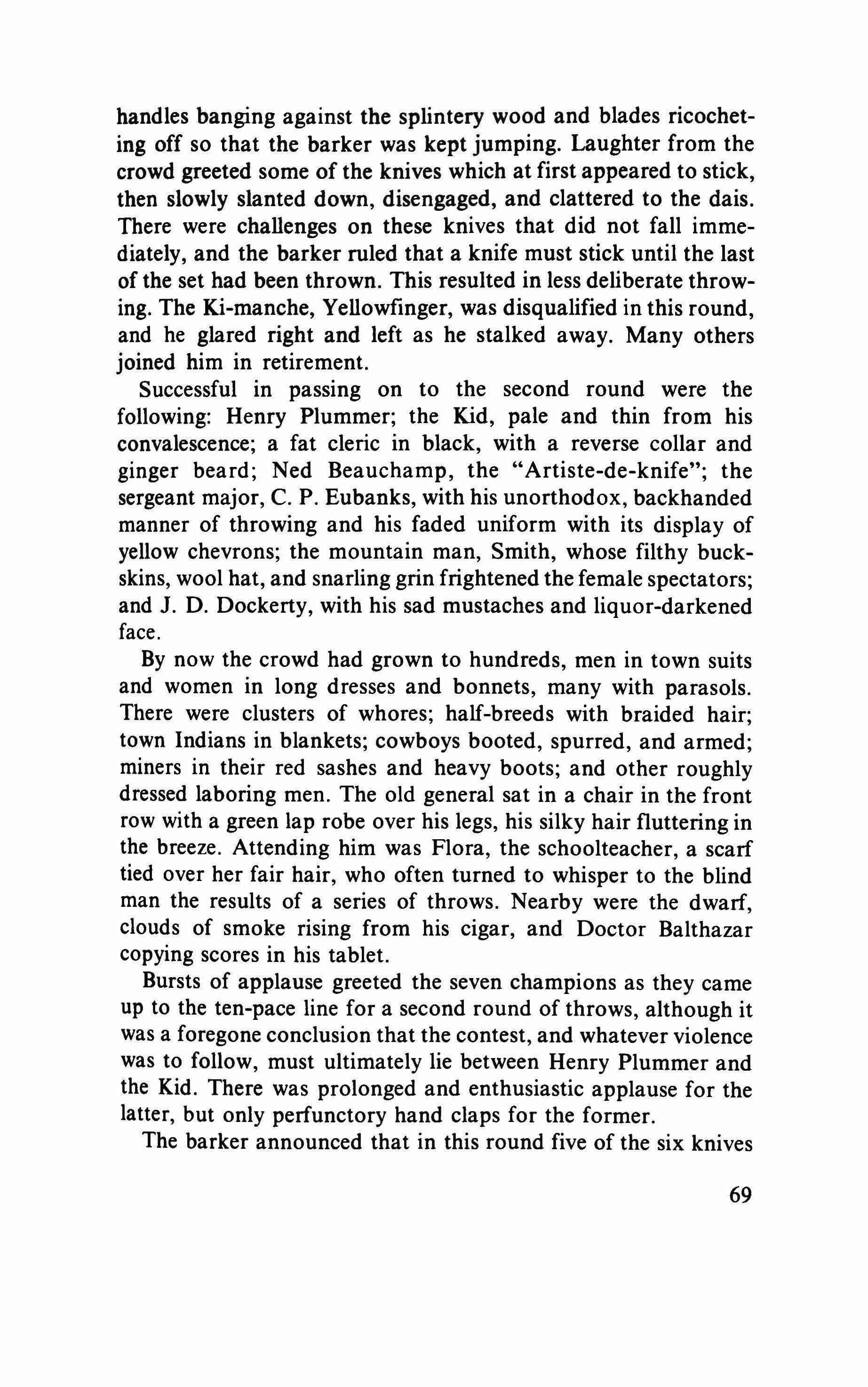
handles banging against the splintery wood and blades ricocheting off so that the barker was kept jumping. Laughter from the crowd greeted some of the knives which at first appeared to stick, then slowly slanted down, disengaged, and clattered to the dais. There were challenges on these knives that did not fall immediately, and the barker ruled that a knife must stick until the last of the set had been thrown. This resulted in less deliberate throwing. The Ki-manche, Yellowfinger, was disqualified in this round, and he glared right and left as he stalked away. Many others joined him in retirement.
Successful in passing on to the second round were the following: Henry Plummer; the Kid, pale and thin from his convalescence; a fat cleric in black, with a reverse collar and ginger beard; Ned Beauchamp, the "Artiste-de-knife"; the sergeant major, C. P. Eubanks, with his unorthodox, backhanded manner of throwing and his faded uniform with its display of yellow chevrons; the mountain man, Smith, whose filthy buckskins, wool hat, and snarling grin frightened the female spectators; and J. D. Dockerty, with his sad mustaches and liquor-darkened face.
By now the crowd had grown to hundreds, men in town suits and women in long dresses and bonnets, many with parasols. There were clusters of whores; half-breeds with braided hair; town Indians in blankets; cowboys booted, spurred, and armed; miners in their red sashes and heavy boots; and other roughly dressed laboring men. The old general sat in a chair in the front row with a green lap robe over his legs, his silky hair fluttering in the breeze. Attending him was Flora, the schoolteacher, a scarf tied over her fair hair, who often turned to whisper to the blind man the results of a series of throws. Nearby were the dwarf, clouds of smoke rising from his cigar, and Doctor Balthazar copying scores in his tablet.
Bursts of applause greeted the seven champions as they came up to the ten-pace line for a second round of throws, although it was a foregone conclusion that the contest, and whatever violence was to follow, must ultimately lie between Henry Plummer and the Kid. There was prolonged and enthusiastic applause for the latter, but only perfunctory hand claps for the former.
The barker announced that in this round five of the six knives
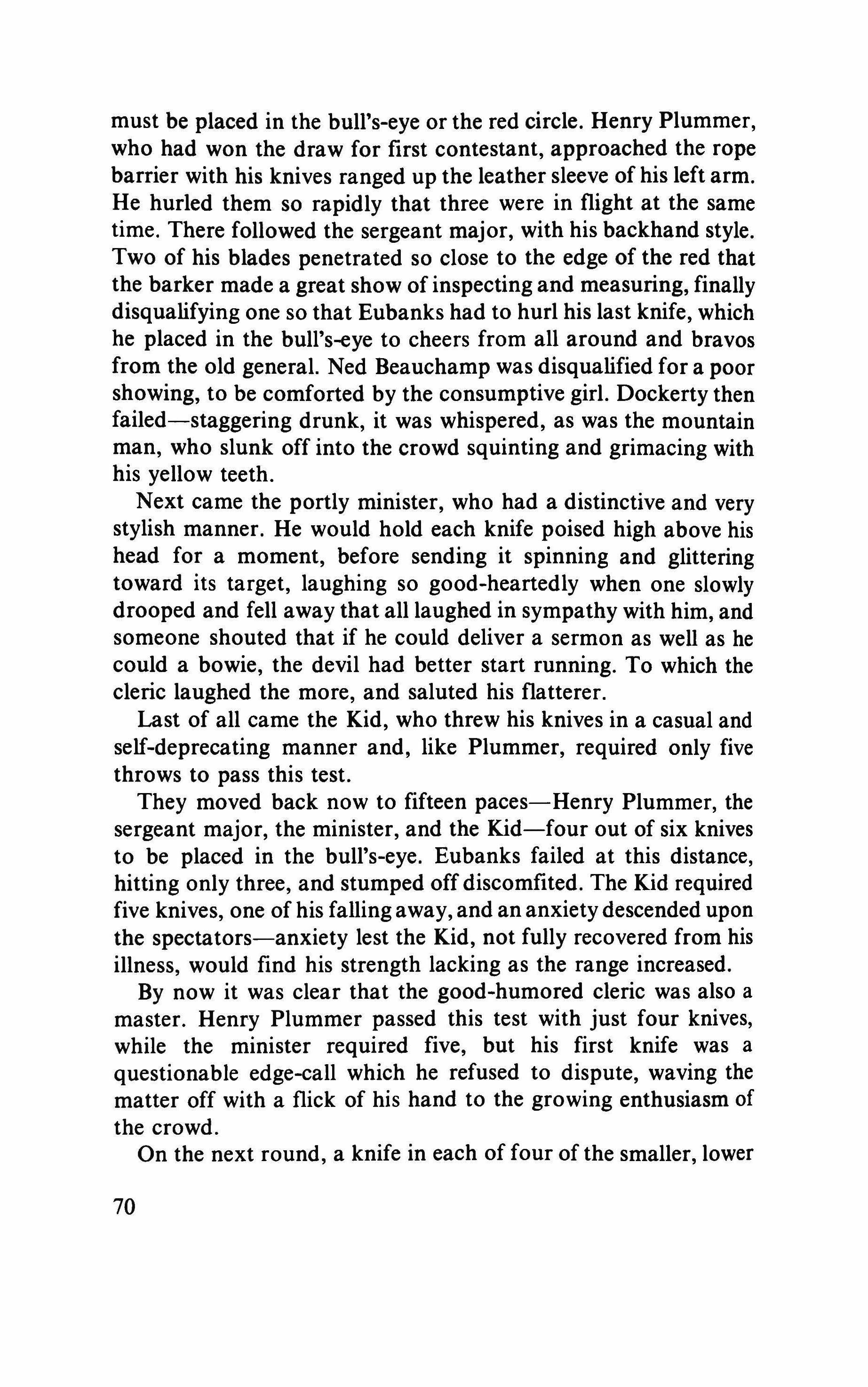
must be placed in the bull's-eye or the red circle. Henry Plummer, who had won the draw for first contestant, approached the rope barrier with his knives ranged up the leather sleeve of his left arm. He hurled them so rapidly that three were in flight at the same time. There followed the sergeant major, with his backhand style. Two of his blades penetrated so close to the edge of the red that the barker made a great show of inspecting and measuring, finally disqualifying one so that Eubanks had to hurl his last knife, which he placed in the bull's-eye to cheers from all around and bravos from the old general. Ned Beauchamp was disqualified for a poor showing, to be comforted by the consumptive girl. Dockerty then failed-staggering drunk, it was whispered, as was the mountain man, who slunk off into the crowd squinting and grimacing with his yellow teeth.
Next came the portly minister, who had a distinctive and very stylish manner. He would hold each knife poised high above his head for a moment, before sending it spinning and glittering toward its target, laughing so good-heartedly when one slowly drooped and fell away that all laughed in sympathy with him, and someone shouted that if he could deliver a sermon as well as he could a bowie, the devil had better start running. To which the cleric laughed the more, and saluted his flatterer.
Last of all came the Kid, who threw his knives in a casual and self-deprecating manner and, like Plummer, required only five throws to pass this test.
They moved back now to fifteen paces-Henry Plummer, the sergeant major, the minister, and the Kid-four out of six knives to be placed in the bull's-eye. Eubanks failed at this distance, hitting only three, and stumped off discomfited. The Kid required five knives, one of his falling away, and an anxiety descended upon the spectators-anxiety lest the Kid, not fully recovered from his illness, would find his strength lacking as the range increased.
By now it was clear that the good-humored cleric was also a master. Henry Plummer passed this test with just four knives, while the minister required five, but his first knife was a questionable edge-call which he refused to dispute, waving the matter off with a flick of his hand to the growing enthusiasm of the crowd.
On the next round, a knife in each of four of the smaller, lower
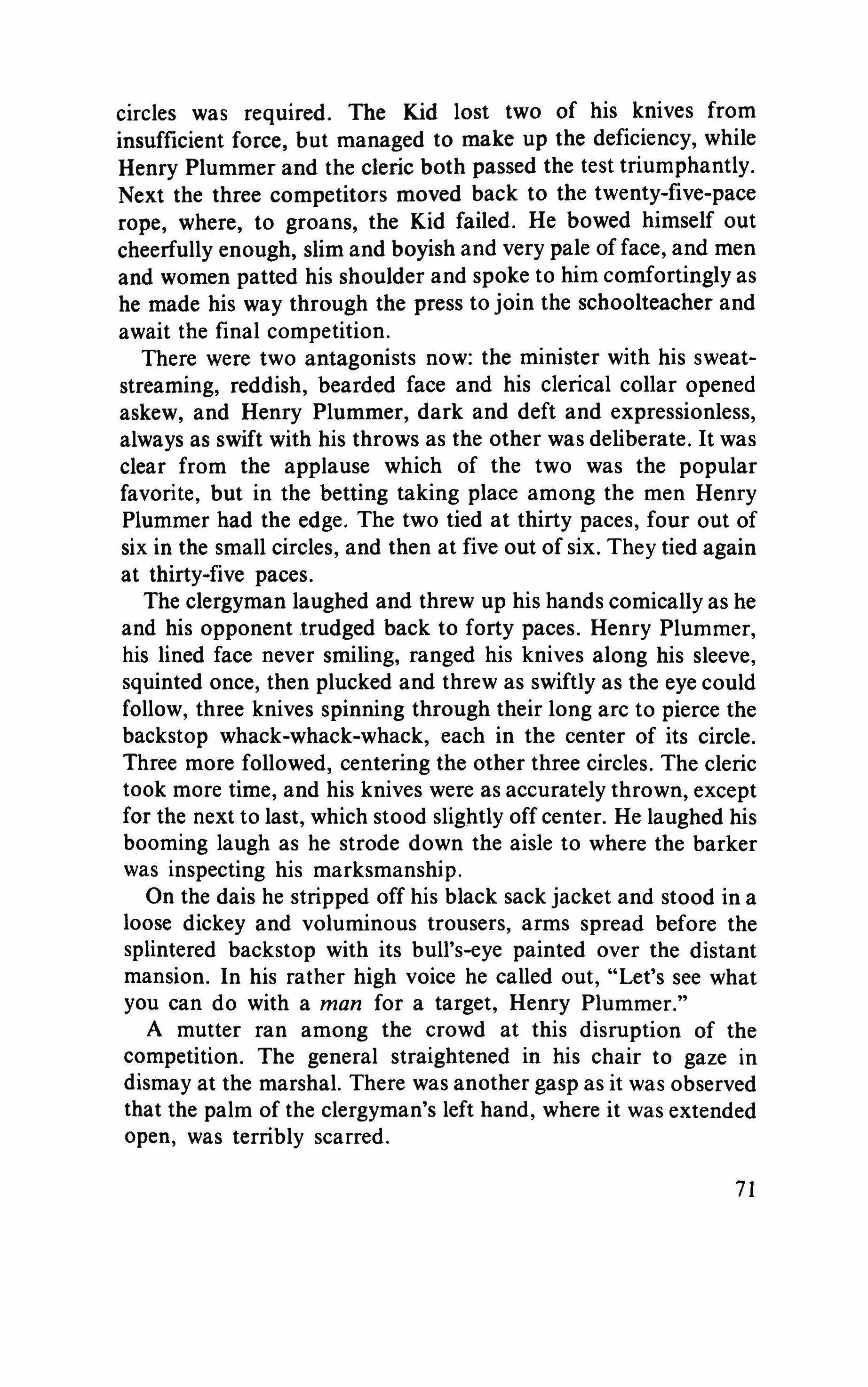
circles was required. The Kid lost two of his knives from insufficient force, but managed to make up the deficiency, while Henry Plummer and the cleric both passed the test triumphantly. Next the three competitors moved back to the twenty-five-pace rope, where, to groans, the Kid failed. He bowed himself out cheerfully enough, slim and boyish and very pale of face, and men and women patted his shoulder and spoke to him comfortingly as he made his way through the press to join the schoolteacher and await the final competition.
There were two antagonists now: the minister with his sweatstreaming, reddish, bearded face and his clerical collar opened askew, and Henry Plummer, dark and deft and expressionless, always as swift with his throws as the other was deliberate. It was clear from the applause which of the two was the popular favorite, but in the betting taking place among the men Henry Plummer had the edge. The two tied at thirty paces, four out of six in the small circles, and then at five out of six. They tied again at thirty-five paces.
The clergyman laughed and threw up his hands comically as he and his opponent trudged back to forty paces. Henry Plummer, his lined face never smiling, ranged his knives along his sleeve, squinted once, then plucked and threw as swiftly as the eye could follow, three knives spinning through their long arc to pierce the backstop whack-whack-whack, each in the center of its circle. Three more followed, centering the other three circles. The cleric took more time, and his knives were as accurately thrown, except for the next to last, which stood slightly off center. He laughed his booming laugh as he strode down the aisle to where the barker was inspecting his marksmanship.
On the dais he stripped off his black sack jacket and stood in a loose dickey and voluminous trousers, arms spread before the splintered backstop with its bull's-eye painted over the distant mansion. In his rather high voice he called out, "Let's see what you can do with a man for a target, Henry Plummer."
A mutter ran among the crowd at this disruption of the competition. The general straightened in his chair to gaze in dismay at the marshal. There was another gasp as it was observed that the palm of the clergyman's left hand, where it was extended open, was terribly scarred.
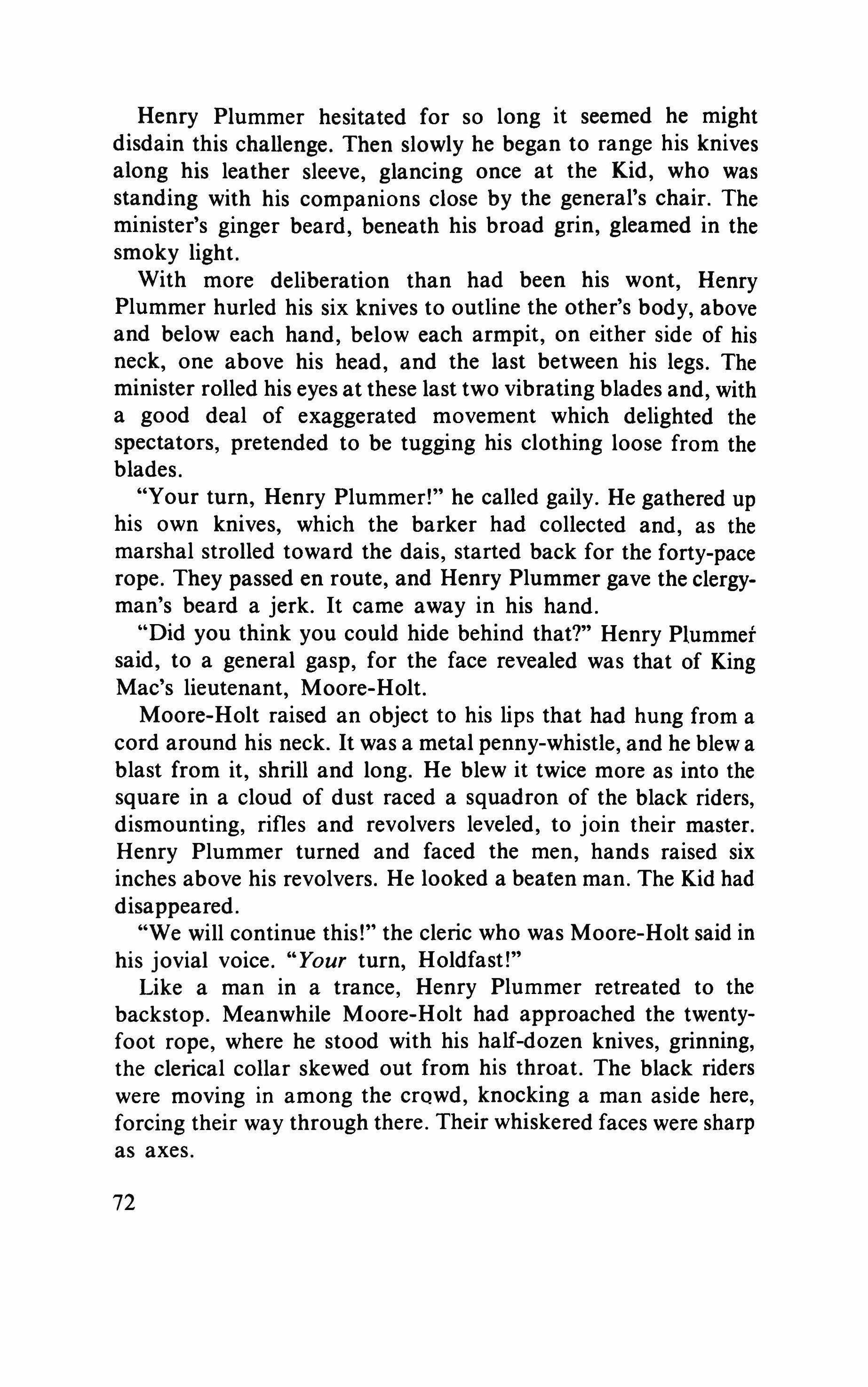
Henry Plummer hesitated for so long it seemed he might disdain this challenge. Then slowly he began to range his knives along his leather sleeve, glancing once at the Kid, who was standing with his companions close by the general's chair. The minister's ginger beard, beneath his broad grin, gleamed in the smoky light.
With more deliberation than had been his wont, Henry Plummer hurled his six knives to outline the other's body, above and below each hand, below each armpit, on either side of his neck, one above his head, and the last between his legs. The minister rolled his eyes at these last two vibrating blades and, with a good deal of exaggerated movement which delighted the spectators, pretended to be tugging his clothing loose from the blades.
"Your turn, Henry Plummer!" he called gaily. He gathered up his own knives, which the barker had collected and, as the marshal strolled toward the dais, started back for the forty-pace rope. They passed en route, and Henry Plummer gave the clergyman's beard a jerk. It came away in his hand.
"Did you think you could hide behind that?" Henry Plummet said, to a general gasp, for the face revealed was that of King Mac's lieutenant, Moore-Holt.
Moore-Holt raised an object to his lips that had hung from a cord around his neck. It was a metal penny-whistle, and he blew a blast from it, shrill and long. He blew it twice more as into the square in a cloud of dust raced a squadron of the black riders, dismounting, rifles and revolvers leveled, to join their master. Henry Plummer turned and faced the men, hands raised six inches above his revolvers. He looked a beaten man. The Kid had disappeared.
"We will continue this!" the cleric who was Moore-Holt said in his jovial voice. "Your turn, Holdfast!"
Like a man in a trance, Henry Plummer retreated to the backstop. Meanwhile Moore-Holt had approached the twentyfoot rope, where he stood with his half-dozen knives, grinning, the clerical collar skewed out from his throat. The black riders were moving in among the crowd, knocking a man aside here, forcing their way through there. Their whiskered faces were sharp as axes.
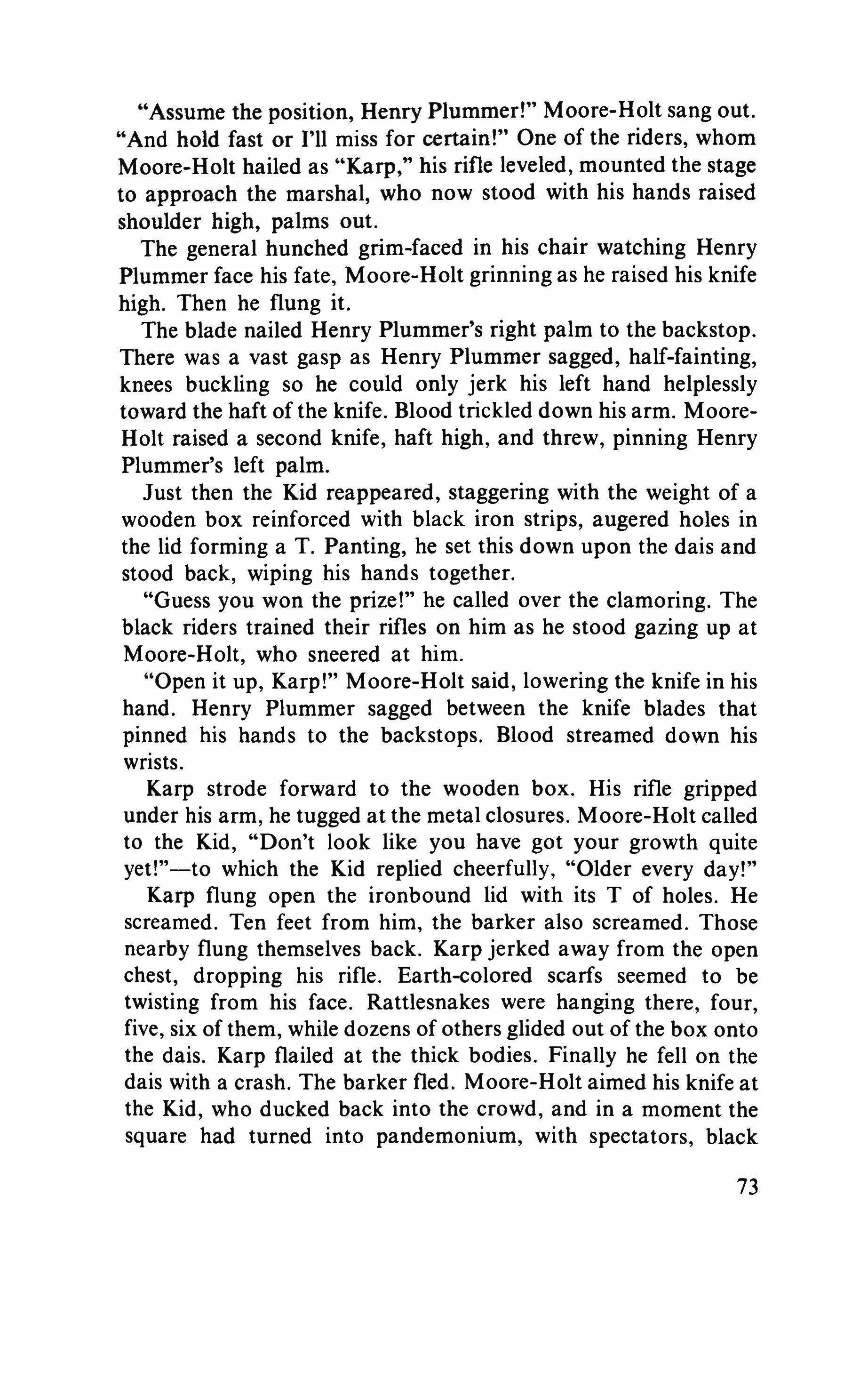
"Assume the position, Henry Plummer!" Moore-Holt sang out. "And hold fast or I'll miss for certain!" One of the riders, whom Moore-Holt hailed as "Karp," his rifle leveled, mounted the stage to approach the marshal, who now stood with his hands raised shoulder high, palms out.
The general hunched grim-faced in his chair watching Henry Plummer face his fate, Moore-Holt grinning as he raised his knife high. Then he flung it.
The blade nailed Henry Plummer's right palm to the backstop. There was a vast gasp as Henry Plummer sagged, half-fainting, knees buckling so he could only jerk his left hand helplessly toward the haft of the knife. Blood trickled down his arm. MooreHolt raised a second knife, haft high, and threw, pinning Henry Plummer's left palm.
Just then the Kid reappeared, staggering with the weight of a wooden box reinforced with black iron strips, augered holes in the lid forming a T. Panting, he set this down upon the dais and stood back, wiping his hands together.
"Guess you won the prize!" he called over the clamoring. The black riders trained their rifles on him as he stood gazing up at Moore-Holt, who sneered at him.
"Open it up, Karp!" Moore-Holt said, lowering the knife in his hand. Henry Plummer sagged between the knife blades that pinned his hands to the backstops. Blood streamed down his wrists.
Karp strode forward to the wooden box. His rifle gripped under his arm, he tugged at the metal closures. Moore-Holt called to the Kid, "Don't look like you have got your growth quite yet!"-to which the Kid replied cheerfully, "Older every day!"
Karp flung open the ironbound lid with its T of holes. He screamed. Ten feet from him, the barker also screamed. Those nearby flung themselves back. Karp jerked away from the open chest, dropping his rifle. Earth-colored scarfs seemed to be twisting from his face. Rattlesnakes were hanging there, four, five, six of them, while dozens of others glided out of the box onto the dais. Karp flailed at the thick bodies. Finally he fell on the dais with a crash. The barker fled. Moore-Holt aimed his knife at the Kid, who ducked back into the crowd, and in a moment the square had turned into pandemonium, with spectators, black
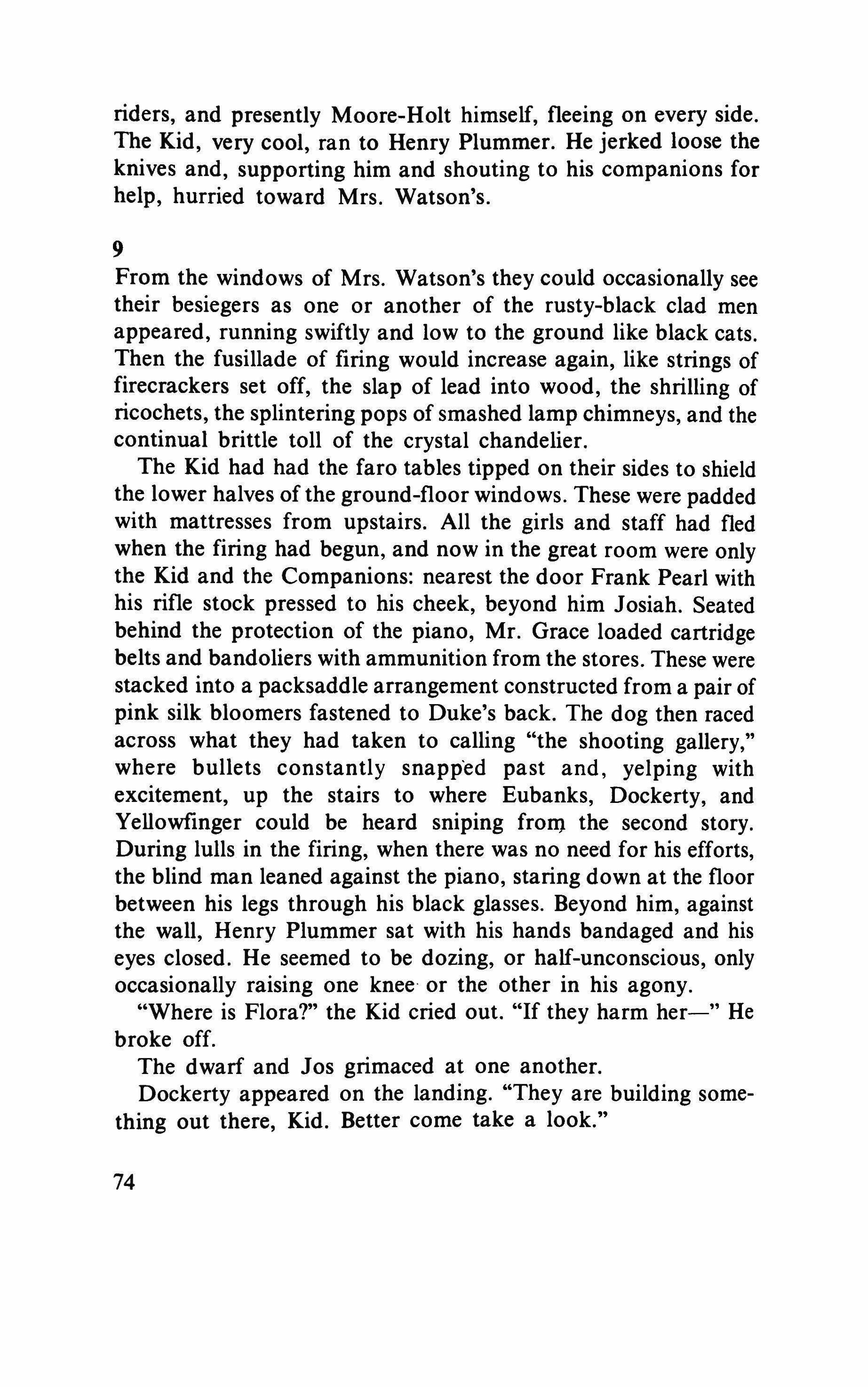
riders, and presently Moore-Holt himself, fleeing on every side. The Kid, very cool, ran to Henry Plummer. He jerked loose the knives and, supporting him and shouting to his companions for help, hurried toward Mrs. Watson's.
9
From the windows of Mrs. Watson's they could occasionally see their besiegers as one or another of the rusty-black clad men appeared, running swiftly and low to the ground like black cats. Then the fusillade of firing would increase again, like strings of firecrackers set off, the slap of lead into wood, the shrilling of ricochets, the splintering pops of smashed lamp chimneys, and the continual brittle toll of the crystal chandelier.
The Kid had had the faro tables tipped on their sides to shield the lower halves of the ground-floor windows. These were padded with mattresses from upstairs. All the girls and staff had fled when the firing had begun, and now in the great room were only the Kid and the Companions: nearest the door Frank Pearl with his rifle stock pressed to his cheek, beyond him Josiah, Seated behind the protection of the piano, Mr. Grace loaded cartridge belts and bandoliers with ammunition from the stores. These were stacked into a packsaddle arrangement constructed from a pair of pink silk bloomers fastened to Duke's back. The dog then raced across what they had taken to calling "the shooting gallery," where bullets constantly snapped past and, yelping with excitement, up the stairs to where Eubanks, Dockerty, and Yellowfinger could be heard sniping from the second story. During lulls in the firing, when there was no need for his efforts, the blind man leaned against the piano, staring down at the floor between his legs through his black glasses. Beyond him, against the wall, Henry Plummer sat with his hands bandaged and his eyes closed. He seemed to be dozing, or half-unconscious, only occasionally raising one knee- or the other in his agony.
"Where is Flora?" the Kid cried out. "If they harm her-" He broke off.
The dwarf and los grimaced at one another. Dockerty appeared on the landing. "They are building something out there, Kid. Better come take a look."
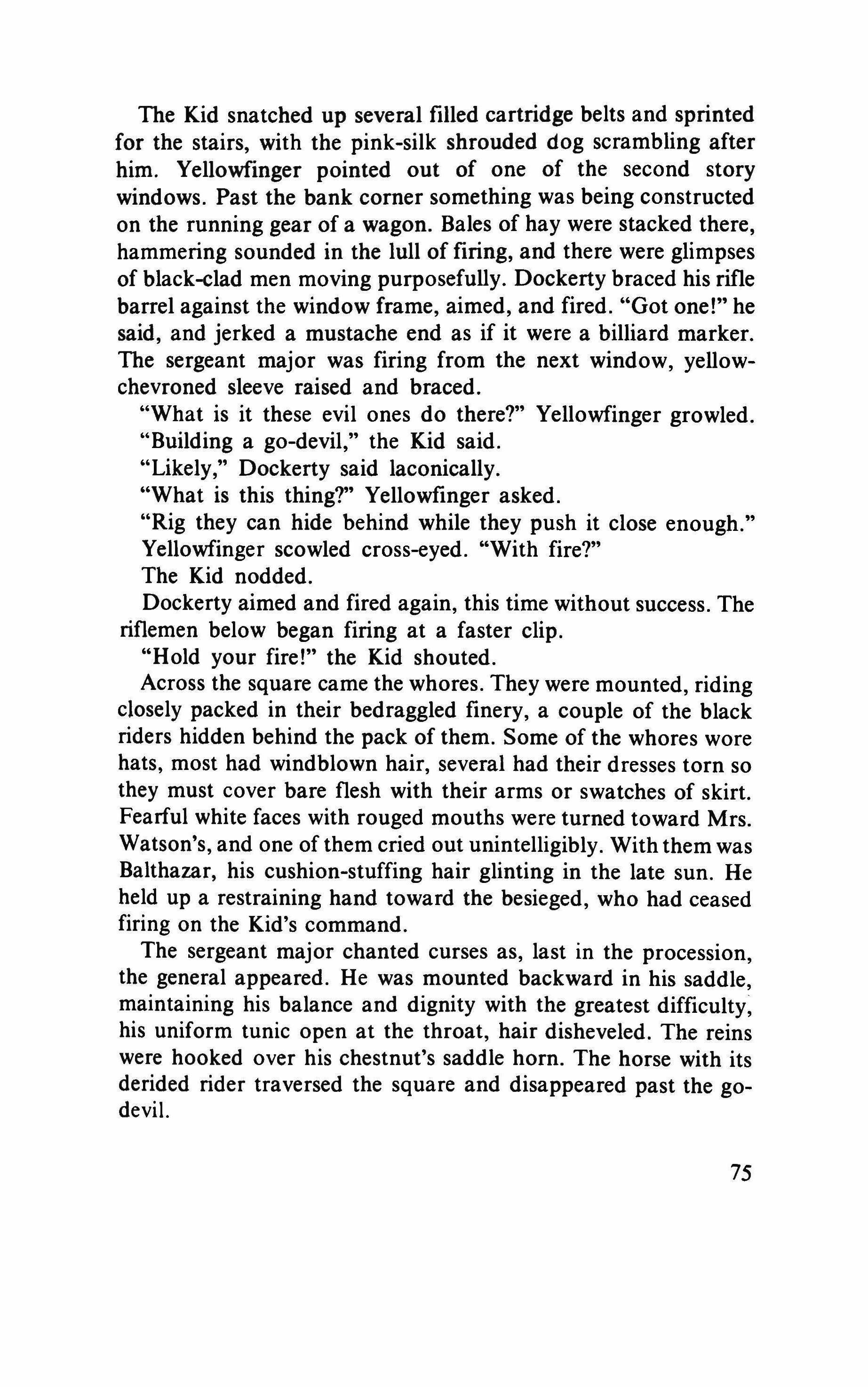
The Kid snatched up several filled cartridge belts and sprinted for the stairs, with the pink-silk shrouded dog scrambling after him. Yellowfinger pointed out of one of the second story windows. Past the bank corner something was being constructed on the running gear of a wagon. Bales of hay were stacked there, hammering sounded in the lull of firing, and there were glimpses of black-clad men moving purposefully. Dockerty braced his rifle barrel against the window frame, aimed, and fired. "Got one!" he said, and jerked a mustache end as if it were a billiard marker.
The sergeant major was firing from the next window, yellowchevroned sleeve raised and braced.
"What is it these evil ones do there?" Yellowfinger growled.
"Building a go-devil," the Kid said.
"Likely," Dockerty said laconically.
"What is this thing?" Yellowfinger asked.
"Rig they can hide behind while they push it close enough."
Yellowfinger scowled cross-eyed. "With fire?"
The Kid nodded.
Dockerty aimed and fired again, this time without success. The riflemen below began firing at a faster clip.
"Hold your fire!" the Kid shouted.
Across the square came the whores. They were mounted, riding closely packed in their bedraggled finery, a couple of the black riders hidden behind the pack of them. Some of the whores wore hats, most had windblown hair, several had their dresses torn so they must cover bare flesh with their arms or swatches of skirt. Fearful white faces with rouged mouths were turned toward Mrs. Watson's, and one of them cried out unintelligibly. With them was Balthazar, his cushion-stuffing hair glinting in the late sun. He held up a restraining hand toward the besieged, who had ceased firing on the Kid's command.
The sergeant major chanted curses as, last in the procession, the general appeared. He was mounted backward in his saddle, maintaining his balance and dignity with the greatest difficulty, his uniform tunic open at the throat, hair disheveled. The reins were hooked over his chestnut's saddle horn. The horse with its derided rider traversed the square and disappeared past the godevil.
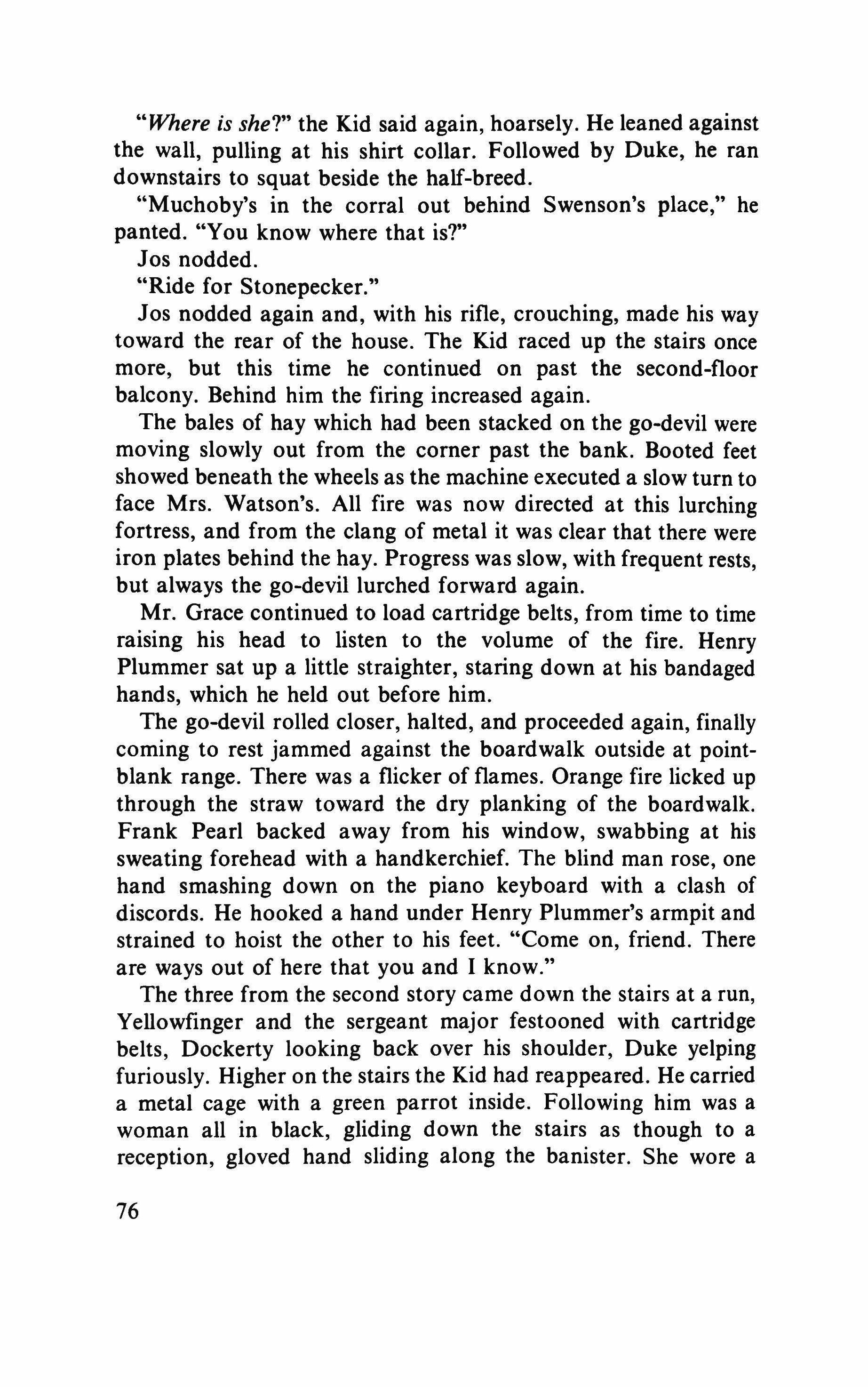
"Where is she?" the Kid said again, hoarsely. He leaned against the wall, pulling at his shirt collar. Followed by Duke, he ran downstairs to squat beside the half-breed.
"Muchoby's in the corral out behind Swenson's place," he panted. "You know where that is?"
Jos nodded.
"Ride for Stonepecker."
Jos nodded again and, with his rifle, crouching, made his way toward the rear of the house. The Kid raced up the stairs once more, but this time he continued on past the second-floor balcony. Behind him the firing increased again.
The bales of hay which had been stacked on the go-devil were moving slowly out from the corner past the bank. Booted feet showed beneath the wheels as the machine executed a slow turn to face Mrs. Watson's. All fire was now directed at this lurching fortress, and from the clang of metal it was clear that there were iron plates behind the hay. Progress was slow, with frequent rests, but always the go-devil lurched forward again.
Mr. Grace continued to load cartridge belts, from time to time raising his head to listen to the volume of the fire. Henry Plummer sat up a little straighter, staring down at his bandaged hands, which he held out before him.
The go-devil rolled closer, halted, and proceeded again, finally coming to rest jammed against the boardwalk outside at pointblank range. There was a flicker of flames. Orange fire licked up through the straw toward the dry planking of the boardwalk. Frank Pearl backed away from his window, swabbing at his sweating forehead with a handkerchief. The blind man rose, one hand smashing down on the piano keyboard with a clash of discords. He hooked a hand under Henry Plummer's armpit and strained to hoist the other to his feet. "Come on, friend. There are ways out of here that you and I know."
The three from the second story came down the stairs at a run, Yellowfinger and the sergeant major festooned with cartridge belts, Dockerty looking back over his shoulder, Duke yelping furiously. Higher on the stairs the Kid had reappeared. He carried a metal cage with a green parrot inside. Following him was a woman all in black, gliding down the stairs as though to a reception, gloved hand sliding along the banister. She wore a
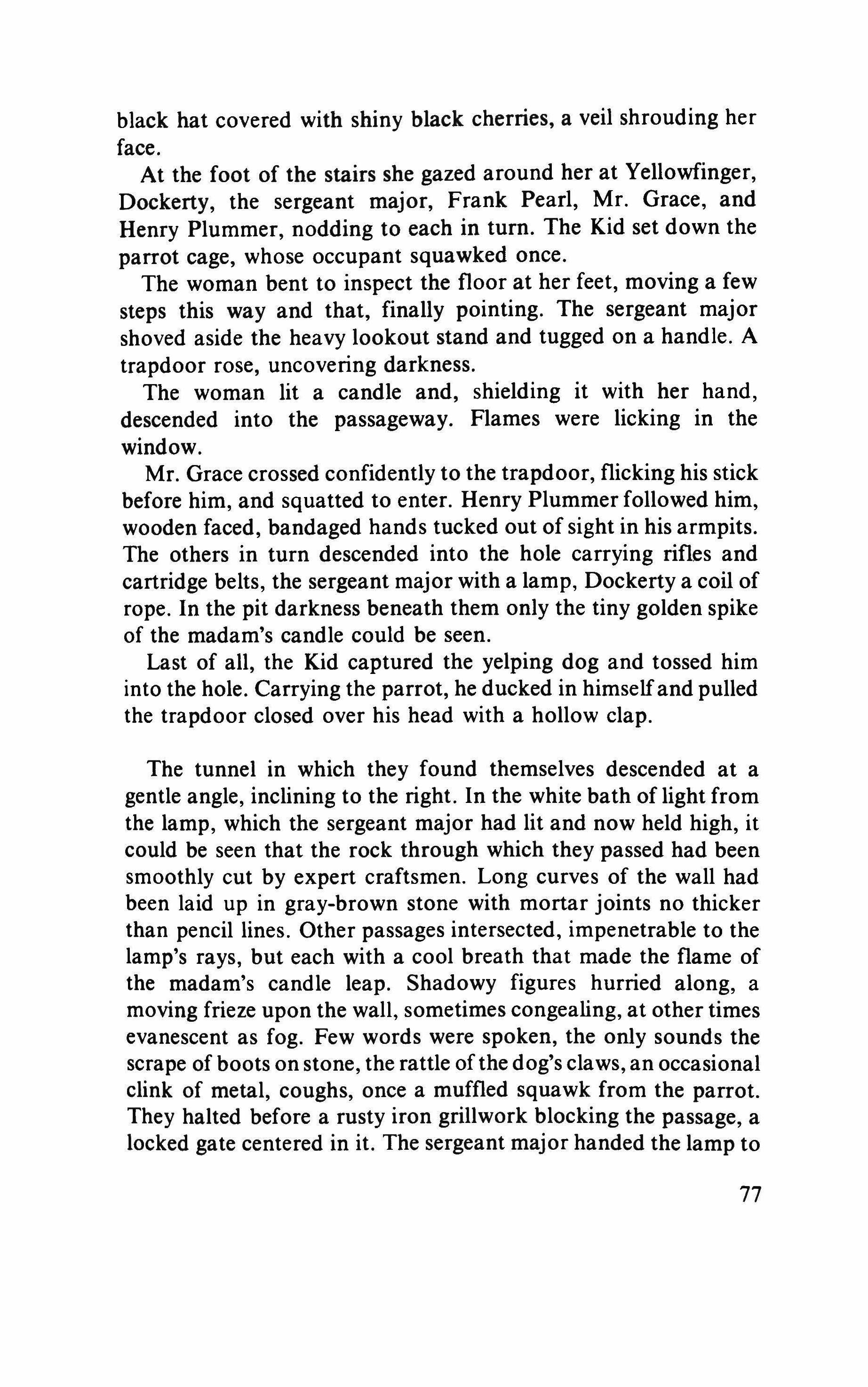
black hat covered with shiny black cherries, a veil shrouding her face.
At the foot of the stairs she gazed around her at Yellowfinger, Dockerty, the sergeant major, Frank Pearl, Mr. Grace, and Henry Plummer, nodding to each in turn. The Kid set down the parrot cage, whose occupant squawked once.
The woman bent to inspect the floor at her feet, moving a few steps this way and that, finally pointing. The sergeant major shoved aside the heavy lookout stand and tugged on a handle. A trapdoor rose, uncovering darkness.
The woman lit a candle and, shielding it with her hand, descended into the passageway. Flames were licking in the window.
Mr. Grace crossed confidently to the trapdoor, flicking his stick before him, and squatted to enter. Henry Plummer followed him, wooden faced, bandaged hands tucked out of sight in his armpits. The others in turn descended into the hole carrying rifles and cartridge belts, the sergeant major with a lamp, Dockertya coil of rope. In the pit darkness beneath them only the tiny golden spike of the madam's candle could be seen.
Last of all, the Kid captured the yelping dog and tossed him into the hole. Carrying the parrot, he ducked in himselfand pulled the trapdoor closed over his head with a hollow clap.
The tunnel in which they found themselves descended at a gentle angle, inclining to the right. In the white bath of light from the lamp, which the sergeant major had lit and now held high, it could be seen that the rock through which they passed had been smoothly cut by expert craftsmen. Long curves of the wall had been laid up in gray-brown stone with mortar joints no thicker than pencil lines. Other passages intersected, impenetrable to the lamp's rays, but each with a cool breath that made the flame of the madam's candle leap. Shadowy figures hurried along, a moving frieze upon the wall, sometimes congealing, at other times evanescent as fog. Few words were spoken, the only sounds the scrape of boots on stone, the rattle of the dog's claws, an occasional clink of metal, coughs, once a muffled squawk from the parrot. They halted before a rusty iron grillwork blocking the passage, a locked gate centered in it. The sergeant major handed the lamp to
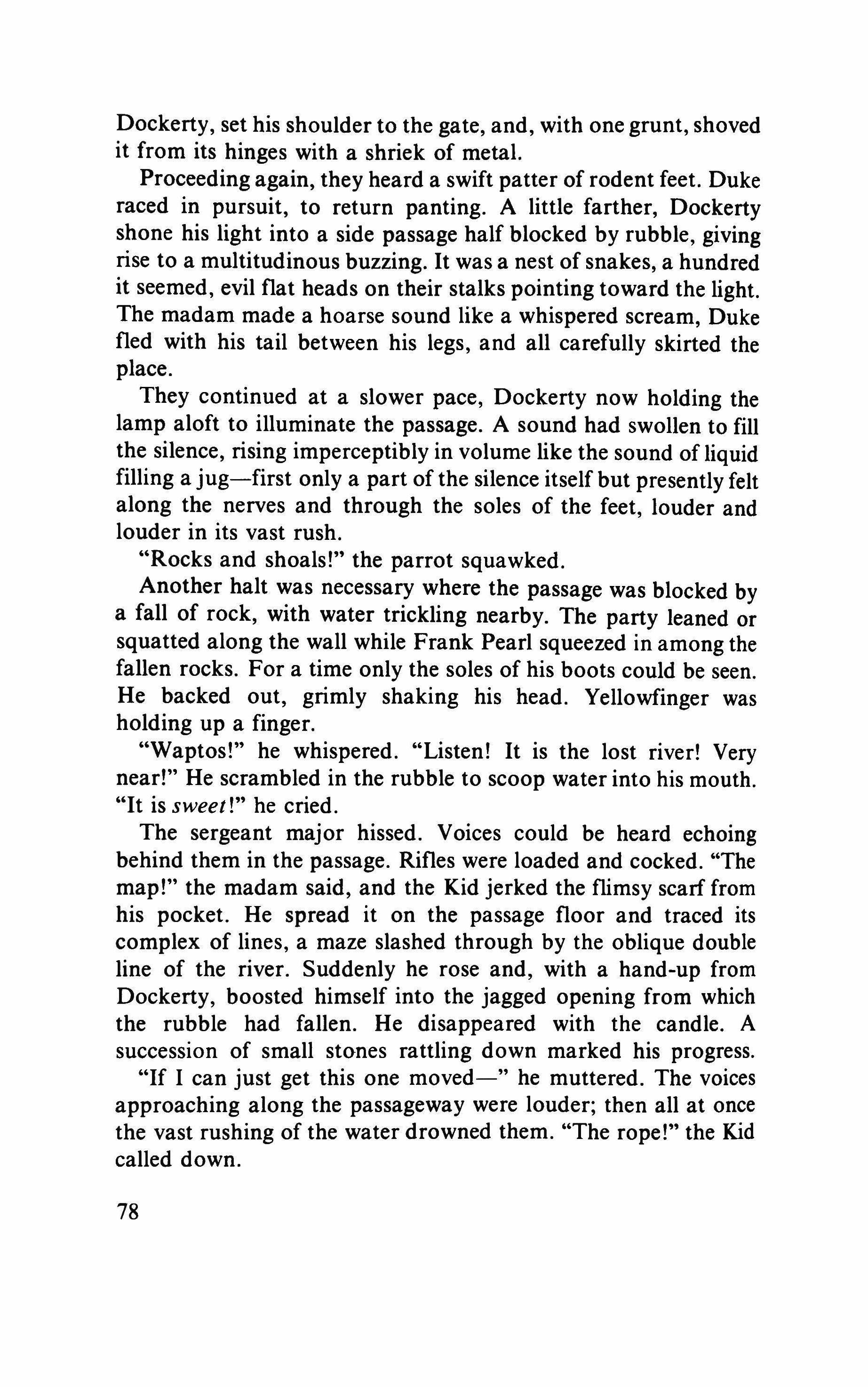
Dockerty, set his shoulder to the gate, and, with one grunt, shoved it from its hinges with a shriek of metal.
Proceeding again, they heard a swift patter of rodent feet. Duke raced in pursuit, to return panting. A little farther, Dockerty shone his light into a side passage half blocked by rubble, giving rise to a multitudinous buzzing. It was a nest of snakes, a hundred it seemed, evil flat heads on their stalks pointing toward the light. The madam made a hoarse sound like a whispered scream, Duke fled with his tail between his legs, and all carefully skirted the place.
They continued at a slower pace, Dockerty now holding the lamp aloft to illuminate the passage. A sound had swollen to fill the silence, rising imperceptibly in volume like the sound of liquid filling a jug-first only a part of the silence itself but presently felt along the nerves and through the soles of the feet, louder and louder in its vast rush.
"Rocks and shoals!" the parrot squawked.
Another halt was necessary where the passage was blocked by a fall of rock, with water trickling nearby. The party leaned or squatted along the wall while Frank Pearl squeezed in among the fallen rocks. For a time only the soles of his boots could be seen. He backed out, grimly shaking his head. Yellowfinger was holding up a finger.
"Waptos!" he whispered. "Listen! It is the lost river! Very near!" He scrambled in the rubble to scoop water into his mouth. "It is sweet!" he cried.
The sergeant major hissed. Voices could be heard echoing behind them in the passage. Rifles were loaded and cocked. "The map!" the madam said, and the Kid jerked the flimsy scarf from his pocket. He spread it on the passage floor and traced its complex of lines, a maze slashed through by the oblique double line of the river. Suddenly he rose and, with a hand-up from Dockerty, boosted himself into the jagged opening from which the rubble had fallen. He disappeared with the candle. A succession of small stones rattling down marked his progress.
"If I can just get this one moved-" he muttered. The voices approaching along the passageway were louder; then all at once the vast rushing of the water drowned them. "The rope!" the Kid called down.
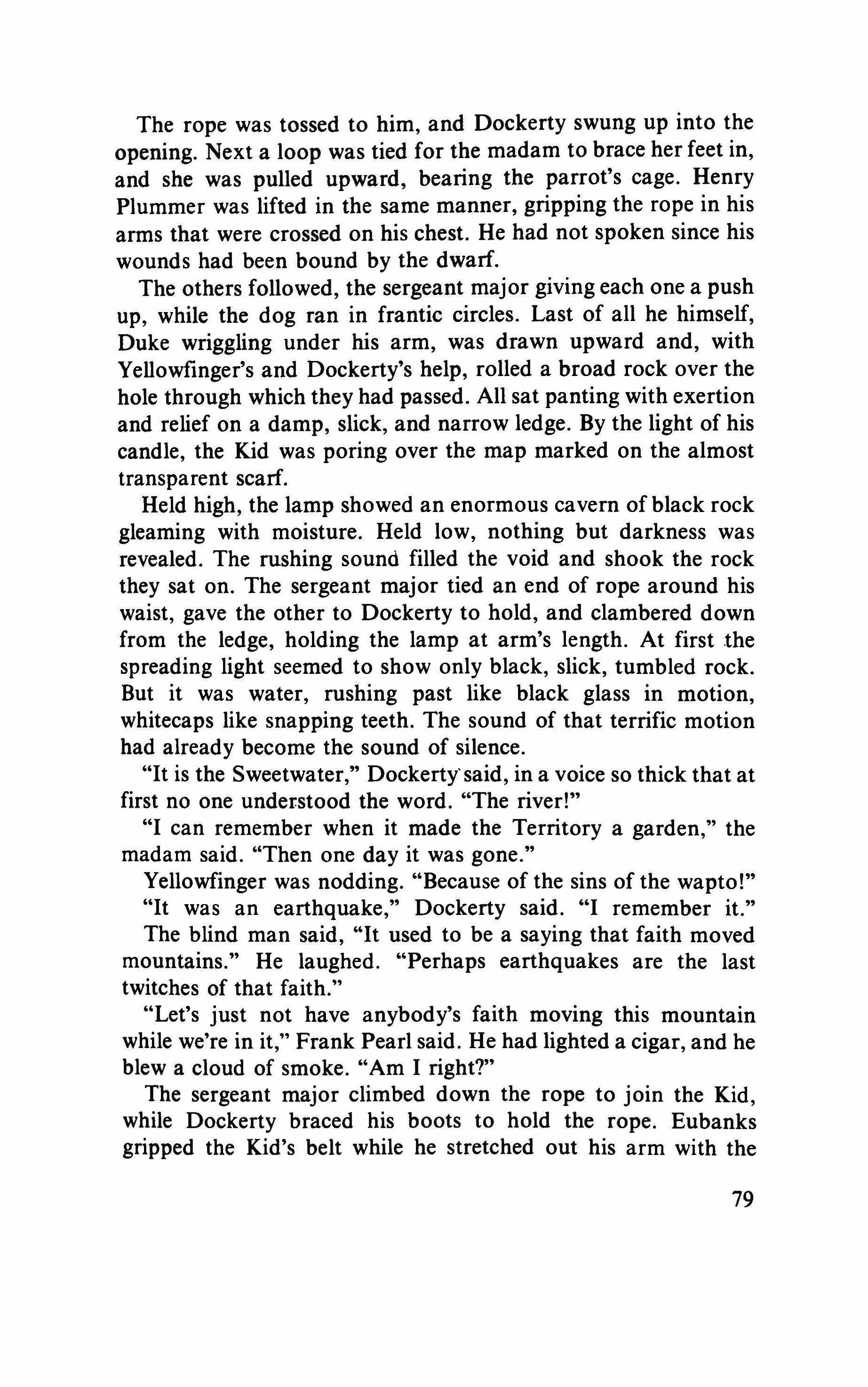
The rope was tossed to him, and Dockerty swung up into the opening. Next a loop was tied for the madam to brace her feet in, and she was pulled upward, bearing the parrot's cage. Henry Plummer was lifted in the same manner, gripping the rope in his arms that were crossed on his chest. He had not spoken since his wounds had been bound by the dwarf.
The others followed, the sergeant major giving each one a push up, while the dog ran in frantic circles. Last of all he himself, Duke wriggling under his arm, was drawn upward and, with YeUowfinger's and Dockerty's help, rolled a broad rock over the hole through which they had passed. All sat panting with exertion and relief on a damp, slick, and narrow ledge. By the light of his candle, the Kid was poring over the map marked on the almost transparent scarf.
Held high, the lamp showed an enormous cavern of black rock gleaming with moisture. Held low, nothing but darkness was revealed. The rushing sound filled the void and shook the rock they sat on. The sergeant major tied an end of rope around his waist, gave the other to Dockerty to hold, and clambered down from the ledge, holding the lamp at arm's length. At first the spreading light seemed to show only black, slick, tumbled rock. But it was water, rushing past like black glass in motion, whitecaps like snapping teeth. The sound of that terrific motion had already become the sound of silence.
"It is the Sweetwater," Dockertysaid, in a voice so thick that at first no one understood the word. "The river!"
"I can remember when it made the Territory a garden," the madam said. "Then one day it was gone."
Yellowfinger was nodding. "Because of the sins of the wapto!"
"It was an earthquake," Dockerty said. "I remember it."
The blind man said, "It used to be a saying that faith moved mountains." He laughed. "Perhaps earthquakes are the last twitches of that faith."
"Let's just not have anybody's faith moving this mountain while we're in it," Frank Pearl said. He had lighted a cigar, and he blew a cloud of smoke. "Am I right?"
The sergeant major climbed down the rope to join the Kid, while Dockerty braced his boots to hold the rope. Eubanks gripped the Kid's belt while he stretched out his arm with the 79
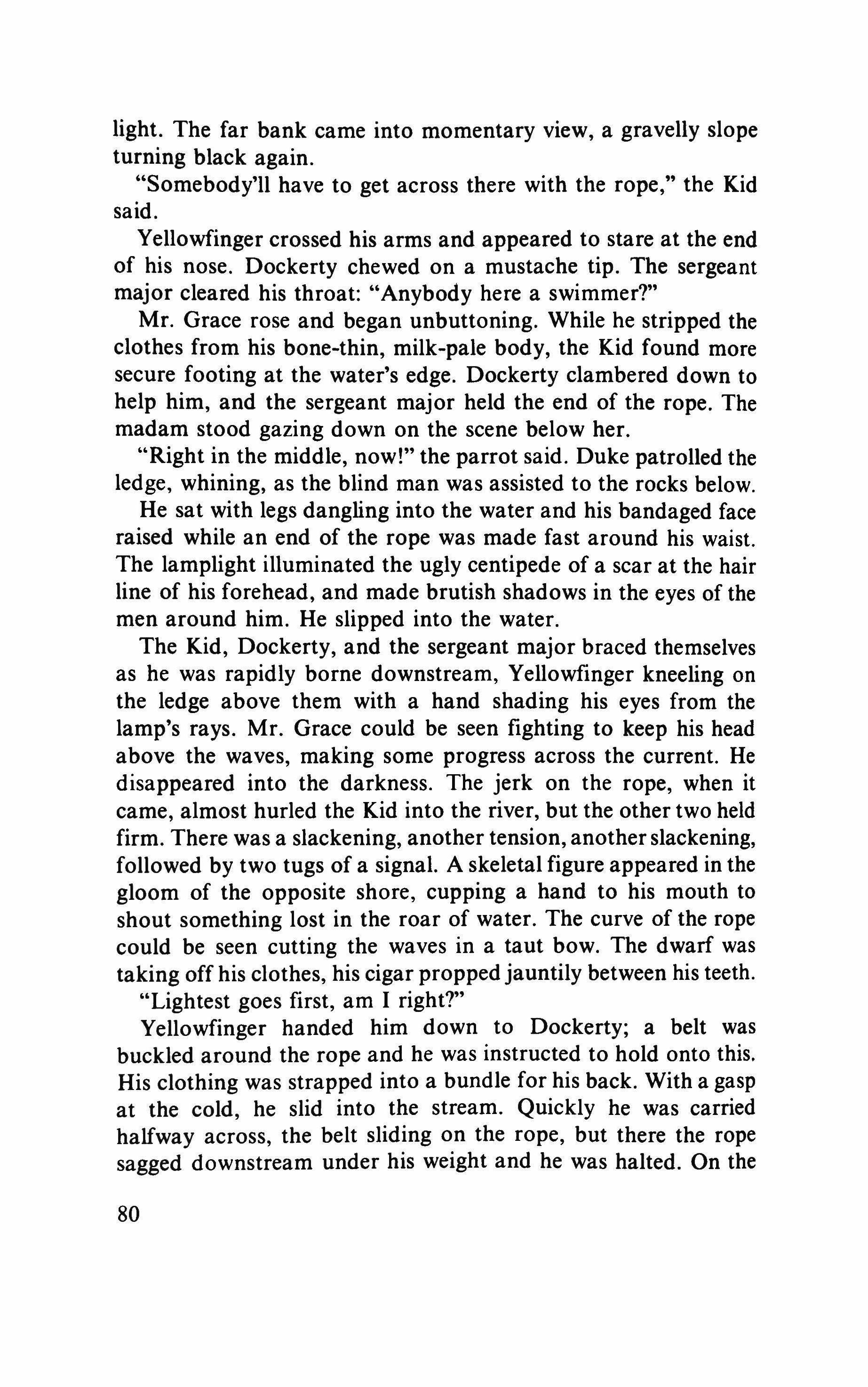
light. The far bank came into momentary view, a gravelly slope turning black again.
"Somebody'll have to get across there with the rope," the Kid said.
Yellowfinger crossed his arms and appeared to stare at the end of his nose. Dockerty chewed on a mustache tip. The sergeant major cleared his throat: "Anybody here a swimmer?"
Mr. Grace rose and began unbuttoning. While he stripped the clothes from his bone-thin, milk-pale body, the Kid found more secure footing at the water's edge. Dockerty clambered down to help him, and the sergeant major held the end of the rope. The madam stood gazing down on the scene below her.
"Right in the middle, now!" the parrot said. Duke patrolled the ledge, whining, as the blind man was assisted to the rocks below. He sat with legs dangling into the water and his bandaged face raised while an end of the rope was made fast around his waist. The lamplight illuminated the ugly centipede of a scar at the hair line of his forehead, and made brutish shadows in the eyes of the men around him. He slipped into the water.
The Kid, Dockerty, and the sergeant major braced themselves as he was rapidly borne downstream, Yellowfinger kneeling on the ledge above them with a hand shading his eyes from the lamp's rays. Mr. Grace could be seen fighting to keep his head above the waves, making some progress across the current. He disappeared into the darkness. The jerk on the rope, when it came, almost hurled the Kid into the river, but the other two held firm. There was a slackening, another tension, another slackening, followed by two tugs of a signal. A skeletal figure appeared in the gloom of the opposite shore, cupping a hand to his mouth to shout something lost in the roar of water. The curve of the rope could be seen cutting the waves in a taut bow. The dwarf was taking off his clothes, his cigar proppedjauntily between his teeth.
"Lightest goes first, am I right?"
Yellowfinger handed him down to Dockerty; a belt was buckled around the rope and he was instructed to hold onto this. His clothing was strapped into a bundle for his back. With a gasp at the cold, he slid into the stream. Quickly he was carried halfway across, the belt sliding on the rope, but there the rope sagged downstream under his weight and he was halted. On the
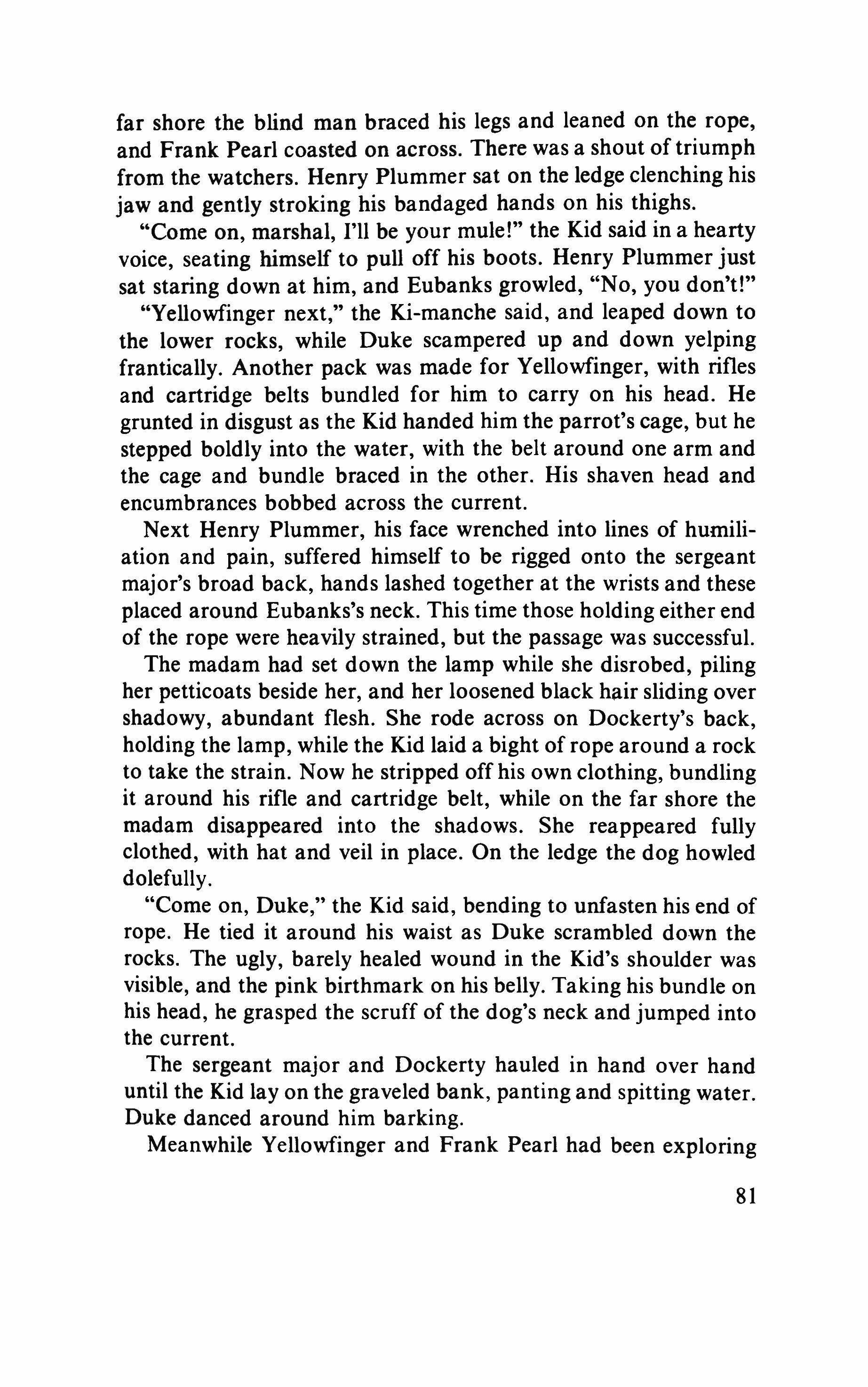
far shore the blind man braced his legs and leaned on the rope, and Frank Pearl coasted on across. There was a shout of triumph from the watchers. Henry Plummer sat on the ledge clenching his jaw and gently stroking his bandaged hands on his thighs.
"Come on, marshal, I'll be your mule!" the Kid said in a hearty voice, seating himself to pull off his boots. Henry Plummer just sat staring down at him, and Eubanks growled, "No, you don't!"
"Yellowfinger next," the Ki-manche said, and leaped down to the lower rocks, while Duke scampered up and down yelping frantically. Another pack was made for Yellowfinger, with rifles and cartridge belts bundled for him to carryon his head. He grunted in disgust as the Kid handed him the parrot's cage, but he stepped boldly into the water, with the belt around one arm and the cage and bundle braced in the other. His shaven head and encumbrances bobbed across the current.
Next Henry Plummer, his face wrenched into lines of humiliation and pain, suffered himself to be rigged onto the sergeant major's broad back, hands lashed together at the wrists and these placed around Eubanks's neck. This time those holding either end of the rope were heavily strained, but the passage was successful.
The madam had set down the lamp while she disrobed, piling her petticoats beside her, and her loosened black hair sliding over shadowy, abundant flesh. She rode across on Dockerty's back, holding the lamp, while the Kid laid a bight of rope around a rock to take the strain. Now he stripped off his own clothing, bundling it around his rifle and cartridge belt, while on the far shore the madam disappeared into the shadows. She reappeared fully clothed, with hat and veil in place. On the ledge the dog howled dolefully.
"Come on, Duke," the Kid said, bending to unfasten his end of rope. He tied it around his waist as Duke scrambled down the rocks. The ugly, barely healed wound in the Kid's shoulder was visible, and the pink birthmark on his belly. Taking his bundle on his head, he grasped the scruff of the dog's neck and jumped into the current.
The sergeant major and Dockerty hauled in hand over hand until the Kid lay on the graveled bank, panting and spitting water. Duke danced around him barking.
Meanwhile Yellowfinger and Frank Pearl had been exploring
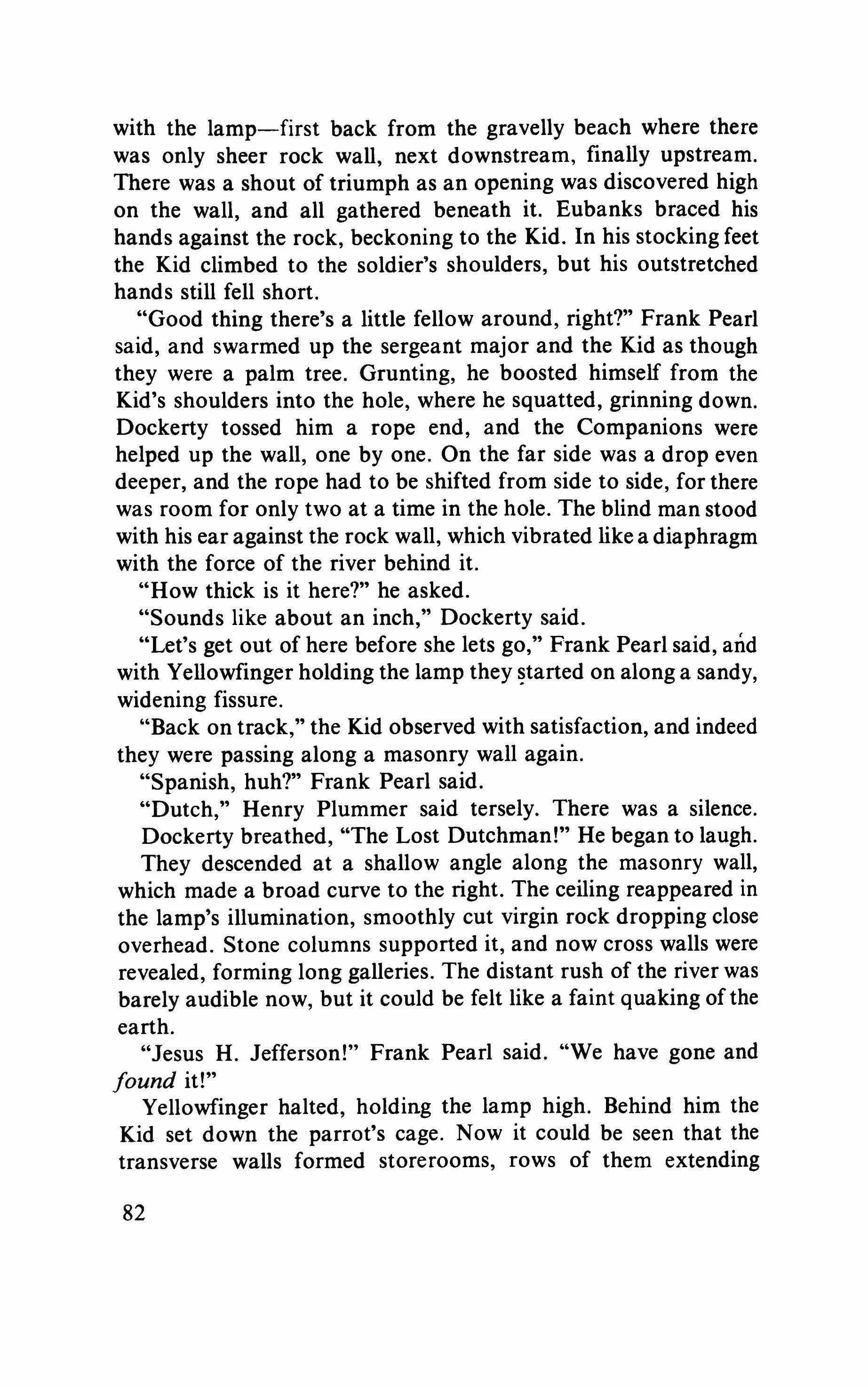
with the lamp-first back from the gravelly beach where there was only sheer rock wall, next downstream, finally upstream. There was a shout of triumph as an opening was discovered high on the wall, and all gathered beneath it. Eubanks braced his hands against the rock, beckoning to the Kid. In his stocking feet the Kid climbed to the soldier's shoulders, but his outstretched hands still fell short.
"Good thing there's a little fellow around, right?" Frank Pearl said, and swarmed up the sergeant major and the Kid as though they were a palm tree. Grunting, he boosted himself from the Kid's shoulders into the hole, where he squatted, grinning down. Dockerty tossed him a rope end, and the Companions were helped up the wall, one by one. On the far side was a drop even deeper, and the rope had to be shifted from side to side, for there was room for only two at a time in the hole. The blind man stood with his ear against the rock wall, which vibrated like a diaphragm with the force of the river behind it.
"How thick is it here?" he asked.
"Sounds like about an inch," Dockerty said.
"Let's get out of here before she lets go," Frank Pearl said, and with Yellowfinger holding the lamp they started on along a sandy, widening fissure.
"Back on track," the Kid observed with satisfaction, and indeed they were passing along a masonry wall again.
"Spanish, huh?" Frank Pearl said.
"Dutch," Henry Plummer said tersely. There was a silence. Dockerty breathed, "The Lost Dutchman!" He began to laugh. They descended at a shallow angle along the masonry wall, which made a broad curve to the right. The ceiling reappeared in the lamp's illumination, smoothly cut virgin rock dropping close overhead. Stone columns supported it, and now cross walls were revealed, forming long galleries. The distant rush of the river was barely audible now, but it could be felt like a faint quaking ofthe earth.
"Jesus H. Jefferson!" Frank Pearl said. "We have gone and found it!"
Yellowfinger halted, holding the lamp high. Behind him the Kid set down the parrot's cage. Now it could be seen that the transverse walls formed storerooms, rows of them extending
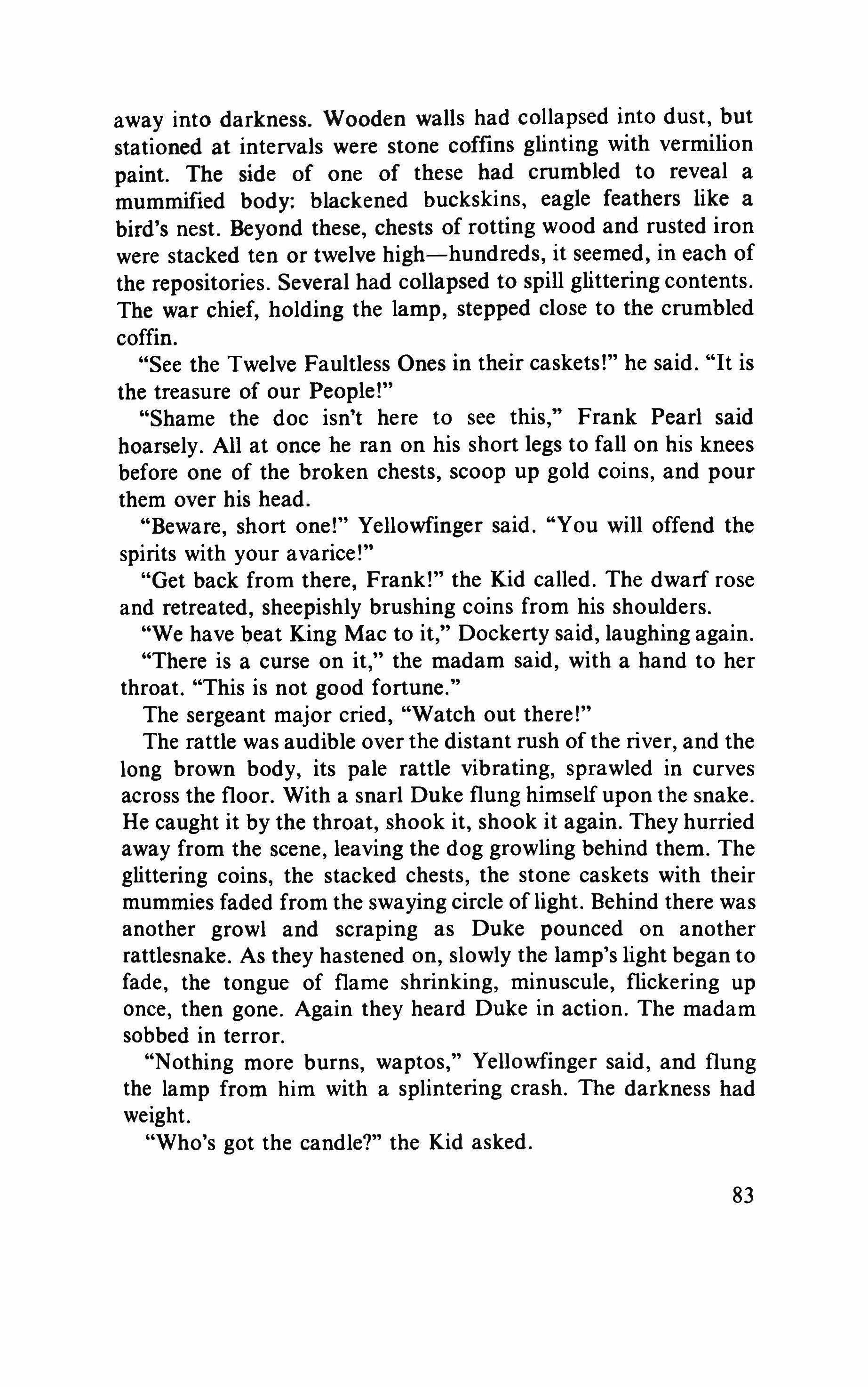
away into darkness. Wooden walls had collapsed into dust, but stationed at intervals were stone coffins glinting with vermilion paint. The side of one of these had crumbled to reveal a mummified body: blackened buckskins, eagle feathers like a bird's nest. Beyond these, chests of rotting wood and rusted iron were stacked ten or twelve high-hundreds, it seemed, in each of the repositories. Several had collapsed to spill glittering contents. The war chief, holding the lamp, stepped close to the crumbled coffin.
"See the Twelve Faultless Ones in their caskets!" he said. "It is the treasure of our People!"
"Shame the doc isn't here to see this," Frank Pearl said hoarsely. All at once he ran on his short legs to fall on his knees before one of the broken chests, scoop up gold coins, and pour them over his head.
"Beware, short one!" Yellowfinger said. "You will offend the spirits with your avarice!"
"Get back from there, Frank!" the Kid called. The dwarf rose and retreated, sheepishly brushing coins from his shoulders.
"We have beat King Mac to it," Dockerty said, laughing again.
"There is a curse on it," the madam said, with a hand to her throat. "This is not good fortune."
The sergeant major cried, "Watch out there!"
The rattle was audible over the distant rush of the river, and the long brown body, its pale rattle vibrating, sprawled in curves across the floor. With a snarl Duke flung himself upon the snake. He caught it by the throat, shook it, shook it again. They hurried away from the scene, leaving the dog growling behind them. The glittering coins, the stacked chests, the stone caskets with their mummies faded from the swaying circle of light. Behind there was another growl and scraping as Duke pounced on another rattlesnake. As they hastened on, slowly the lamp's light began to fade. the tongue of flame shrinking, minuscule, flickering up once, then gone. Again they heard Duke in action. The madam sobbed in terror.
"Nothing more burns, waptos," Yellowfinger said, and flung the lamp from him with a splintering crash. The darkness had weight.
"Who's got the candle?" the Kid asked. 83

"Save your candle," Mr. Grace said. "I can lead you."
They formed a line along the rope, while the blind man took the lead. They could hear the tapping of his stick ahead. Once more Duke growled. Grasping the rope, sometimes touching the stonework wall on their right, they followed their blind leader. There was no longer any sense of ascending or descending, turning right or left, but the stagnant air grew warmer. Ahead there was a scraping sound; the rope jerked once, then went slack.
The blind man's voice came from below them. "Careful. There's a hole here."
A match flickered, a candle flame swelled, dancing in a cool breeze that blew into their faces. Dockerty held the candle over a hole, where Mr. Grace's bandaged face could be seen. He was surrounded by stacks of wooden boxes. The sergeant major scrambled down to join him.
"It's a kind of dynamite locker down here!" he called.
"Air's moving," Dockerty said, shielding his candle flame.
Eubanks began stacking the square boxes to form a stair. The current of air flowed strong and sweet into their faces as they carefully stepped down on the cases that had black printing and red devils imprinted on them. The Kid set down the parrot cage and took the madam's hand to assist her descent.
The dynamite locker opened onto a tunnel where the air was flowing, and they all stood breathing deeply of it. This passage was supported by heavy wooden timbering; there was no stonework. The blind man, his face tense and pale in the candlelight, asked for a knife. He pried the lid from one of the boxes and turned back the heavy waxed paper to reveal red dynamite sticks connected by their gray fuses, like firecrackers. He drew some of these from the paper and hung them in strands around his neck.
His voice shook as he said, "1 will be leaving you here."
The Kid gazed at him with dismay. The others swung around to face him.
"A while back 1 said there used to be faith that could move mountains," Mr. Grace went on. "Well, 1 have kept that faith."
"Afraid 1 don't understand you," the Kid said in an embarrassed voice.
"Once an old Gypsy told me something 1 didn't understand
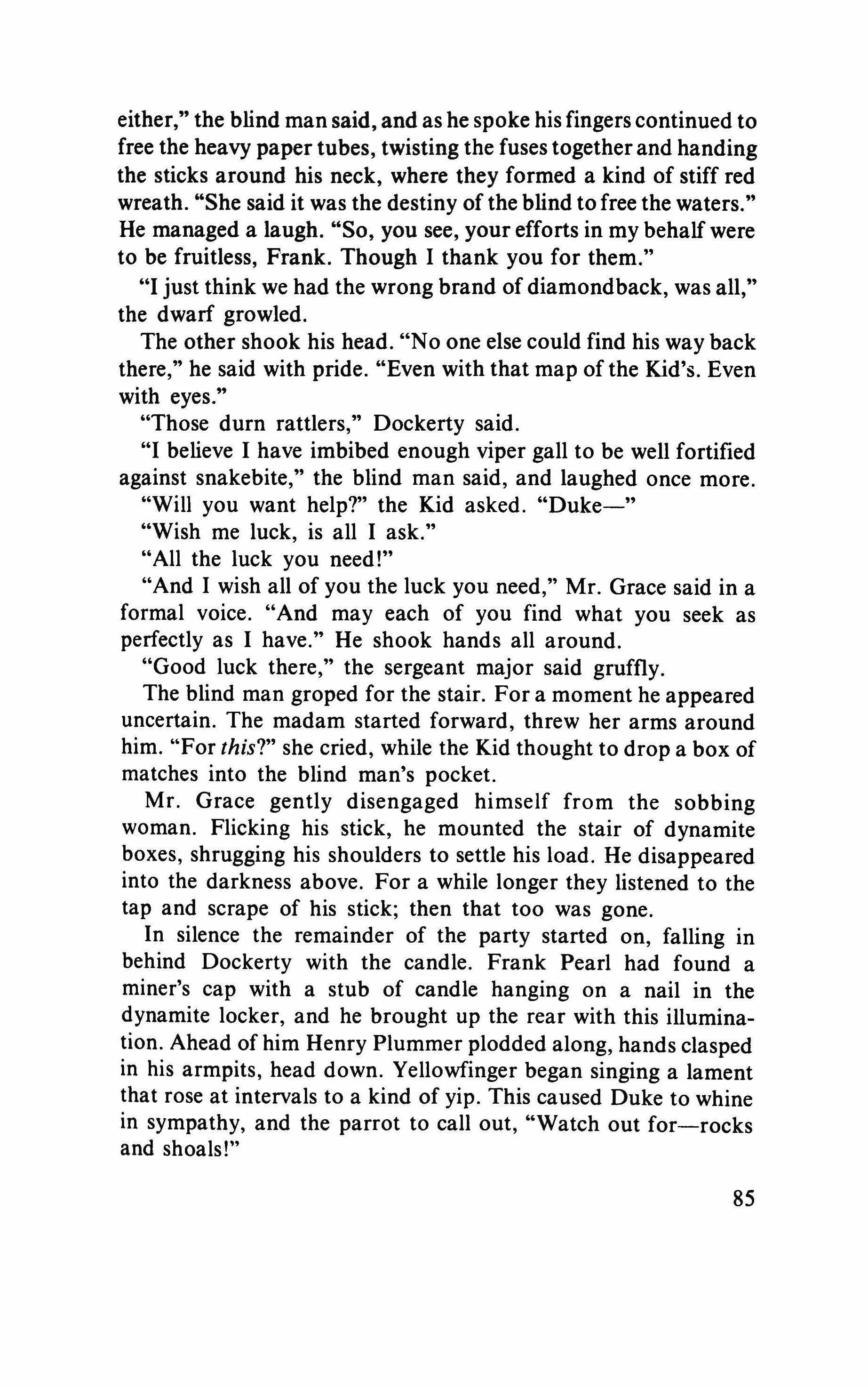
either," the blind man said, and as he spoke his fingers continued to free the heavy paper tubes, twisting the fuses together and handing the sticks around his neck, where they formed a kind of stiff red wreath. "She said it was the destiny of the blind to free the waters." He managed a laugh. "So, you see, your efforts in my behalf were to be fruitless, Frank. Though I thank you for them."
"I just think we had the wrong brand of diamondback, was all," the dwarf growled.
The other shook his head. "No one else could find his way back there," he said with pride. "Even with that map of the Kid's. Even with eyes."
"Those durn rattlers," Dockerty said.
"I believe I have imbibed enough viper gall to be well fortified against snakebite," the blind man said, and laughed once more.
"Will you want help?" the Kid asked. "Duke-"
"Wish me luck, is all I ask."
"All the luck you need!"
"And I wish all of you the luck you need," Mr. Grace said in a formal voice. "And may each of you find what you seek as perfectly as I have." He shook hands all around.
"Good luck there," the sergeant major said gruffly.
The blind man groped for the stair. For a moment he appeared uncertain. The madam started forward, threw her arms around him. "For this?" she cried, while the Kid thought to drop a box of matches into the blind man's pocket.
Mr. Grace gently disengaged himself from the sobbing woman. Flicking his stick, he mounted the stair of dynamite boxes, shrugging his shoulders to settle his load. He disappeared into the darkness above. For a while longer they listened to the tap and scrape of his stick; then that too was gone.
In silence the remainder of the party started on, falling in behind Dockerty with the candle. Frank Pearl had found a miner's cap with a stub of candle hanging on a nail in the dynamite locker, and he brought up the rear with this illumination. Ahead of him Henry Plummer plodded along, hands clasped in his armpits, head down. Yellowfinger began singing a lament that rose at intervals to a kind of yip. This caused Duke to whine in sympathy, and the parrot to call out, "Watch out for-rocks and shoals!"
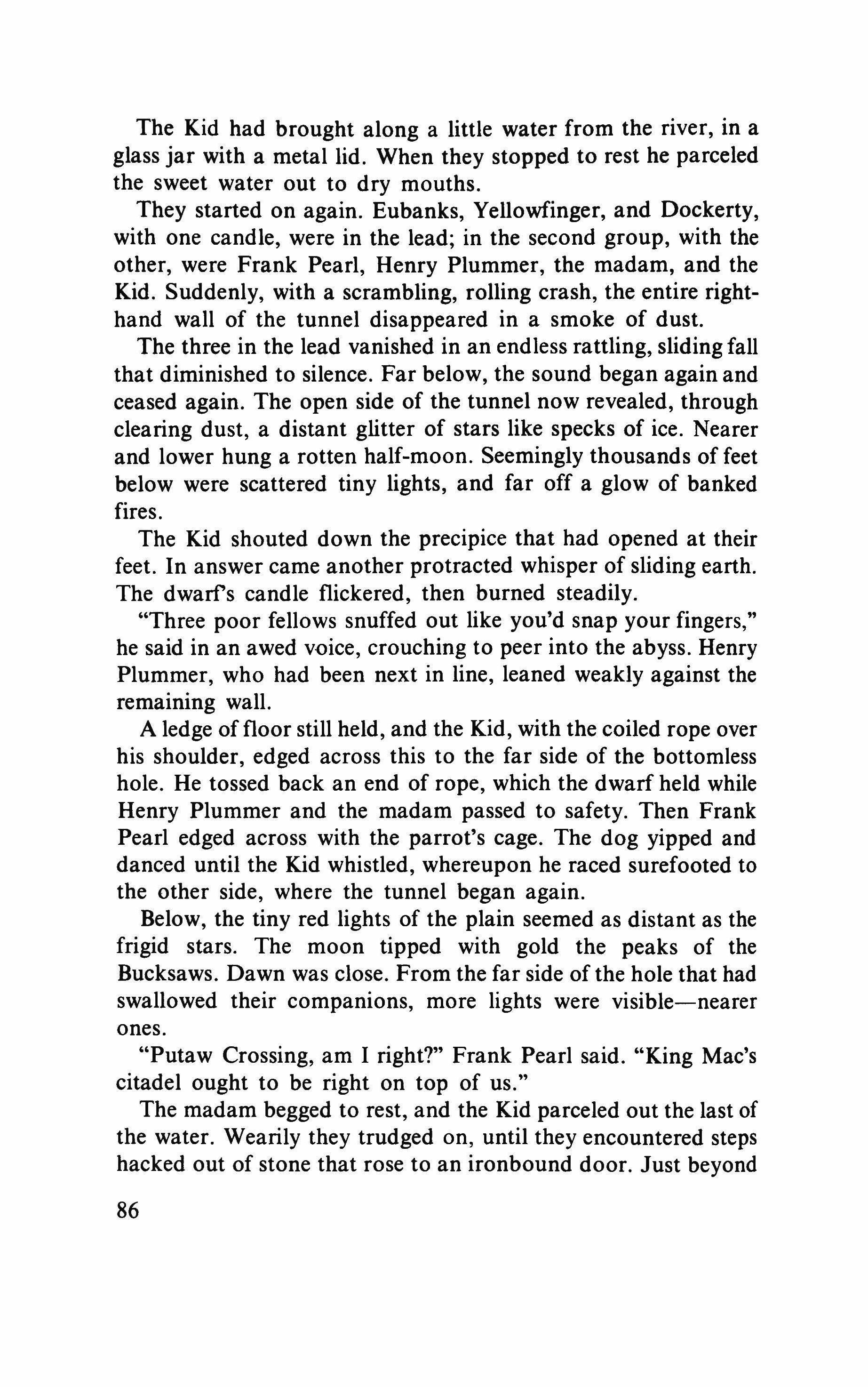
The Kid had brought along a little water from the river, in a glass jar with a metal lid. When they stopped to rest he parceled the sweet water out to dry mouths.
They started on again. Eubanks, Yellowfinger, and Dockerty, with one candle, were in the lead; in the second group, with the other, were Frank Pearl, Henry Plummer, the madam, and the Kid. Suddenly, with a scrambling, rolling crash, the entire righthand wall of the tunnel disappeared in a smoke of dust.
The three in the lead vanished in an endless rattling, sliding fall that diminished to silence. Far below, the sound began again and ceased again. The open side of the tunnel now revealed, through clearing dust, a distant glitter of stars like specks of ice. Nearer and lower hung a rotten half-moon. Seemingly thousands of feet below were scattered tiny lights, and far off a glow of banked fires.
The Kid shouted down the precipice that had opened at their feet. In answer came another protracted whisper of sliding earth. The dwarfs candle flickered, then burned steadily.
"Three poor fellows snuffed out like you'd snap your fingers," he said in an awed voice, crouching to peer into the abyss. Henry Plummer, who had been next in line, leaned weakly against the remaining wall.
A ledge of floor still held, and the Kid, with the coiled rope over his shoulder, edged across this to the far side of the bottomless hole. He tossed back an end of rope, which the dwarf held while Henry Plummer and the madam passed to safety. Then Frank Pearl edged across with the parrot's cage. The dog yipped and danced until the Kid whistled, whereupon he raced surefooted to the other side, where the tunnel began again.
Below, the tiny red lights of the plain seemed as distant as the frigid stars. The moon tipped with gold the peaks of the Bucksaws. Dawn was close. From the far side of the hole that had swallowed their companions, more lights were visible-nearer ones.
"Putaw Crossing, am I right?" Frank Pearl said. "King Mac's citadel ought to be right on top of us."
The madam begged to rest, and the Kid parceled out the last of the water. Wearily they trudged on, until they encountered steps hacked out of stone that rose to an ironbound door. Just beyond
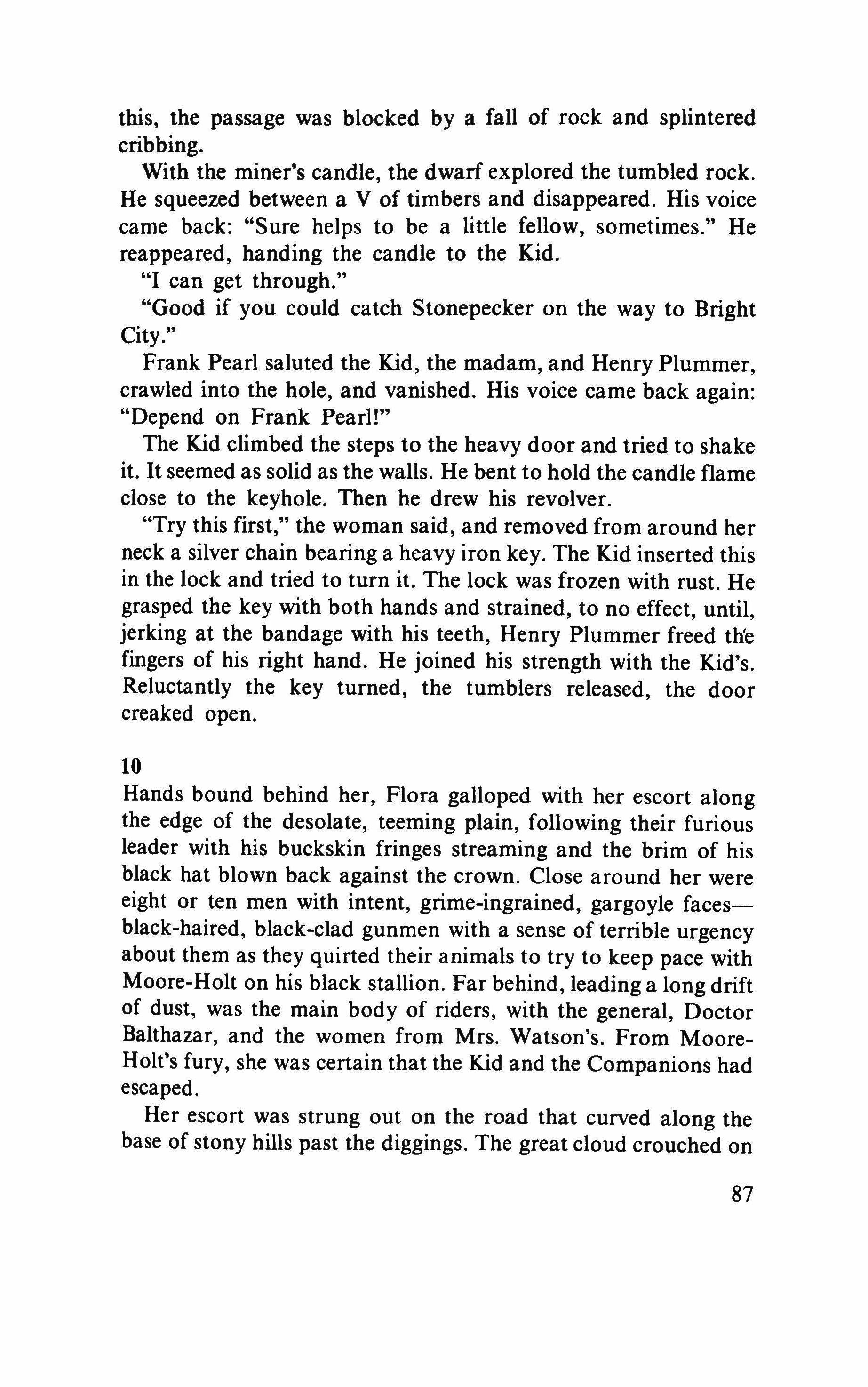
this, the passage was blocked by a fall of rock and splintered cribbing.
With the miner's candle, the dwarf explored the tumbled rock. He squeezed between a V of timbers and disappeared. His voice came back: "Sure helps to be a little fellow, sometimes." He reappeared, handing the candle to the Kid.
"I can get through."
"Good if you could catch Stonepecker on the way to Bright City."
Frank Pearl saluted the Kid, the madam, and Henry Plummer, crawled into the hole, and vanished. His voice came back again: "Depend on Frank Pearl!"
The Kid climbed the steps to the heavy door and tried to shake it. It seemed as solid as the walls. He bent to hold the candle flame close to the keyhole. Then he drew his revolver.
"Try this first," the woman said, and removed from around her neck a silver chain bearing a heavy iron key. The Kid inserted this in the lock and tried to turn it. The lock was frozen with rust. He grasped the key with both hands and strained, to no effect, until, jerking at the bandage with his teeth, Henry Plummer freed the fingers of his right hand. He joined his strength with the Kid's. Reluctantly the key turned, the tumblers released, the door creaked open.
10
Hands bound behind her, Flora galloped with her escort along the edge of the desolate, teeming plain, following their furious leader with his buckskin fringes streaming and the brim of his black hat blown back against the crown. Close around her were eight or ten men with intent, grime-ingrained, gargoyle facesblack-haired, black-clad gunmen with a sense of terrible urgency about them as they quirted their animals to try to keep pace with Moore-Holt on his black stallion. Far behind, leading a long drift of dust, was the main body of riders, with the general, Doctor Balthazar, and the women from Mrs. Watson's. From MooreHolt's fury, she was certain that the Kid and the Companions had escaped.
Her escort was strung out on the road that curved along the base of stony hills past the diggings. The great cloud crouched on
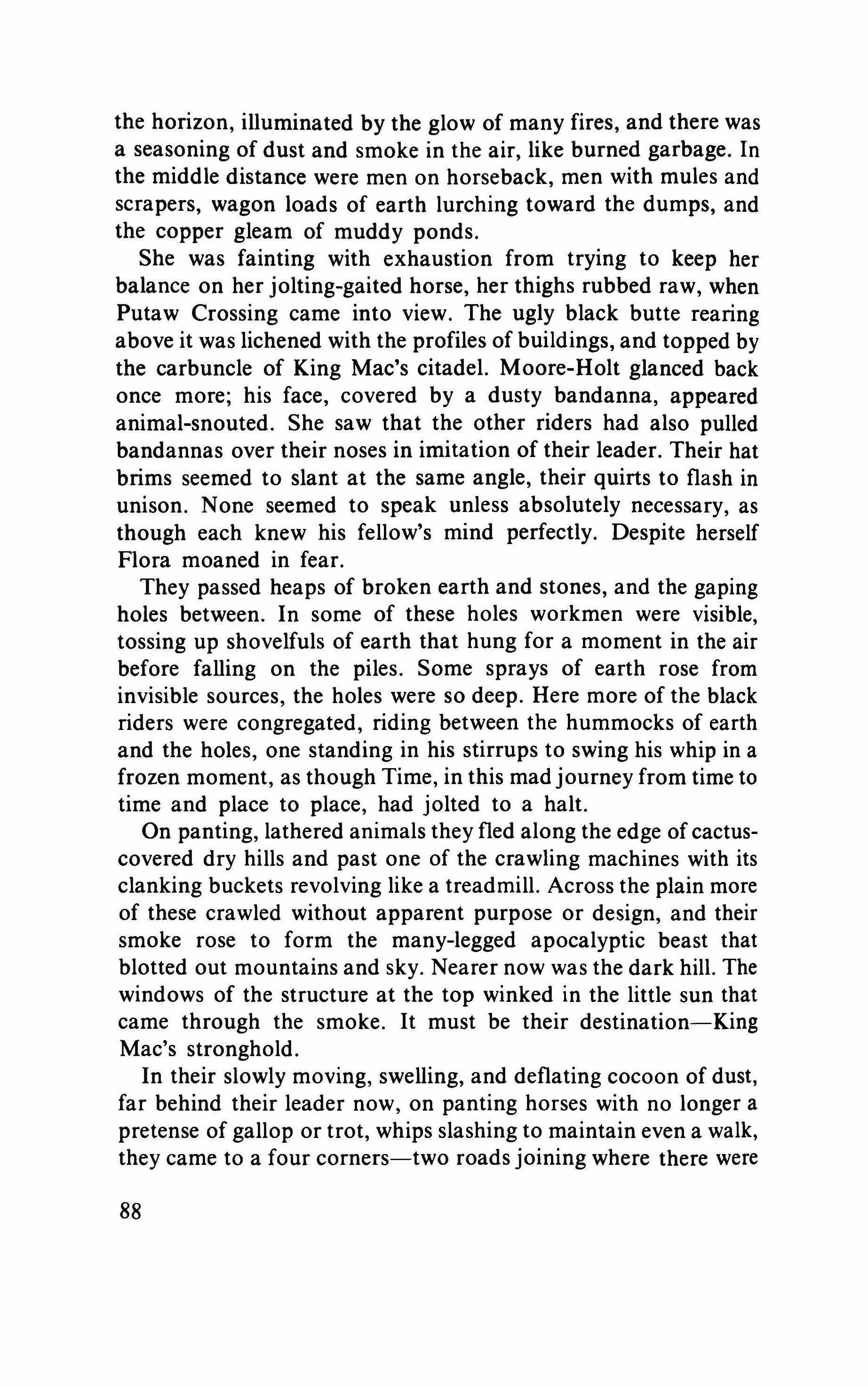
the horizon, illuminated by the glow of many fires, and there was a seasoning of dust and smoke in the air, like burned garbage. In the middle distance were men on horseback, men with mules and scrapers, wagon loads of earth lurching toward the dumps, and the copper gleam of muddy ponds.
She was fainting with exhaustion from trying to keep her balance on her jolting-gaited horse, her thighs rubbed raw, when Putaw Crossing came into view. The ugly black butte rearing above it was lichened with the profiles of buildings, and topped by the carbuncle of King Mac's citadel. Moore-Holt glanced back once more; his face, covered by a dusty bandanna, appeared animal-snouted. She saw that the other riders had also pulled bandannas over their noses in imitation of their leader. Their hat brims seemed to slant at the same angle, their quirts to flash in unison. None seemed to speak unless absolutely necessary, as though each knew his fellow's mind perfectly. Despite herself Flora moaned in fear.
They passed heaps of broken earth and stones, and the gaping holes between. In some of these holes workmen were visible, tossing up shovelfuls of earth that hung for a moment in the air before falling on the piles. Some sprays of earth rose from invisible sources, the holes were so deep. Here more of the black riders were congregated, riding between the hummocks of earth and the holes, one standing in his stirrups to swing his whip in a frozen moment, as though Time, in this mad journey from time to time and place to place, had jolted to a halt.
On panting, lathered animals they fled along the edge of cactuscovered dry hills and past one of the crawling machines with its clanking buckets revolving like a treadmill. Across the plain more of these crawled without apparent purpose or design, and their smoke rose to form the many-legged apocalyptic beast that blotted out mountains and sky. Nearer now was the dark hill. The windows of the structure at the top winked in the little sun that came through the smoke. It must be their destination-King Mac's stronghold.
In their slowly moving, swelling, and deflating cocoon of dust, far behind their leader now, on panting horses with no longer a pretense of gallop or trot, whips slashing to maintain even a walk, they came to a four corners-two roads joining where there were
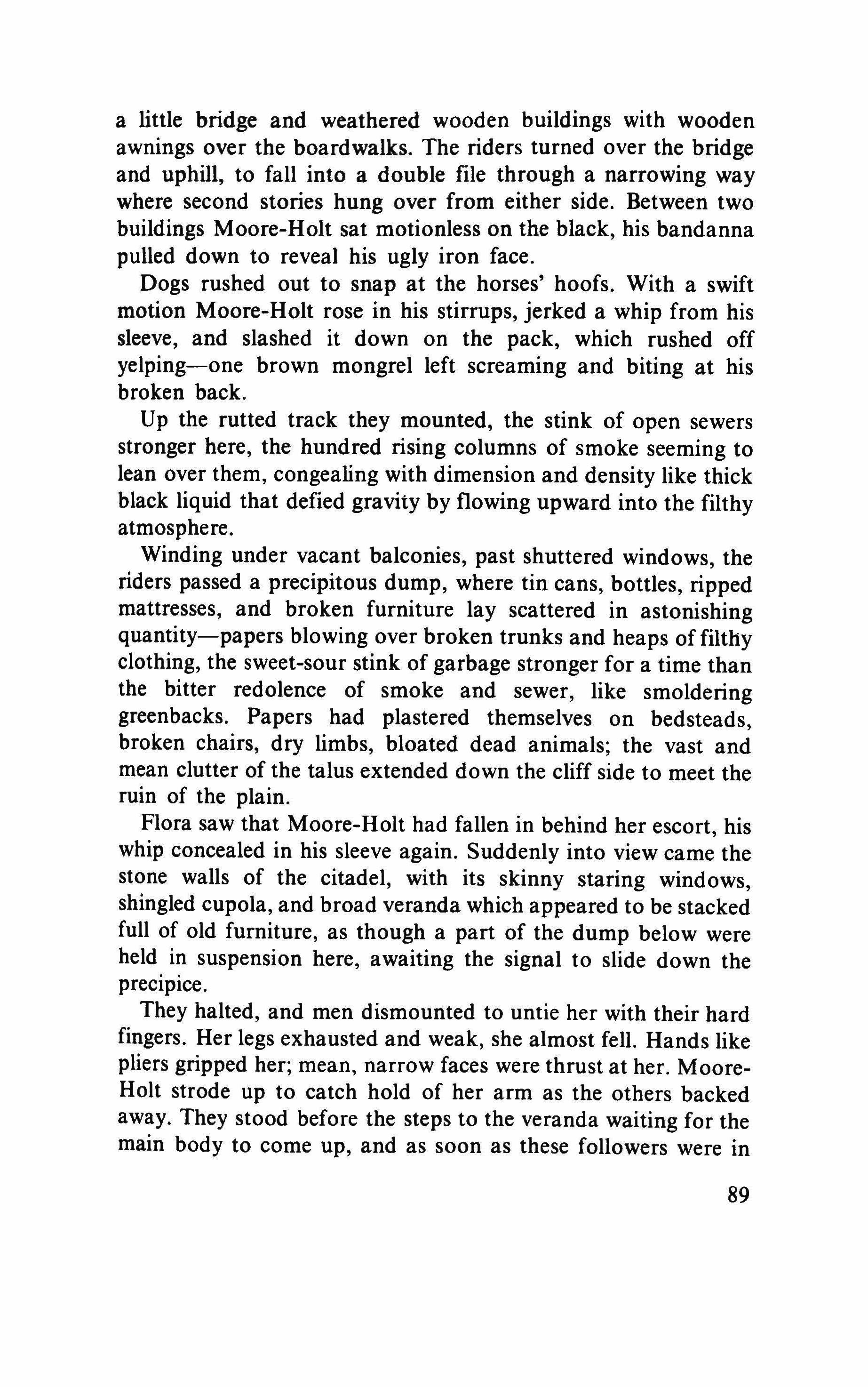
a little bridge and weathered wooden buildings with wooden awnings over the boardwalks. The riders turned over the bridge and uphill, to fall into a double file through a narrowing way where second stories hung over from either side. Between two buildings Moore-Holt sat motionless on the black, his bandanna pulled down to reveal his ugly iron face.
Dogs rushed out to snap at the horses' hoofs. With a swift motion Moore-Holt rose in his stirrups, jerked a whip from his sleeve, and slashed it down on the pack, which rushed off yelping-one brown mongrel left screaming and biting at his broken back.
Up the rutted track they mounted, the stink of open sewers stronger here, the hundred rising columns of smoke seeming to lean over them, congealing with dimension and density like thick black liquid that defied gravity by flowing upward into the filthy atmosphere.
Winding under vacant balconies, past shuttered windows, the riders passed a precipitous dump, where tin cans, bottles, ripped mattresses, and broken furniture lay scattered in astonishing quantity-papers blowing over broken trunks and heaps of filthy clothing, the sweet-sour stink of garbage stronger for a time than the bitter redolence of smoke and sewer, like smoldering greenbacks. Papers had plastered themselves on bedsteads, broken chairs, dry limbs, bloated dead animals; the vast and mean clutter of the talus extended down the cliff side to meet the ruin of the plain.
Flora saw that Moore-Holt had fallen in behind her escort, his whip concealed in his sleeve again. Suddenly into view came the stone walls of the citadel, with its skinny staring windows, shingled cupola, and broad veranda which appeared to be stacked full of old furniture, as though a part of the dump below were held in suspension here, awaiting the signal to slide down the precipice.
They halted, and men dismounted to untie her with their hard fingers. Her legs exhausted and weak, she almost fell. Hands like pliers gripped her; mean, narrow faces were thrust at her. MooreHolt strode up to catch hold of her arm as the others backed away. They stood before the steps to the veranda waiting for the main body to come up, and as soon as these followers were in
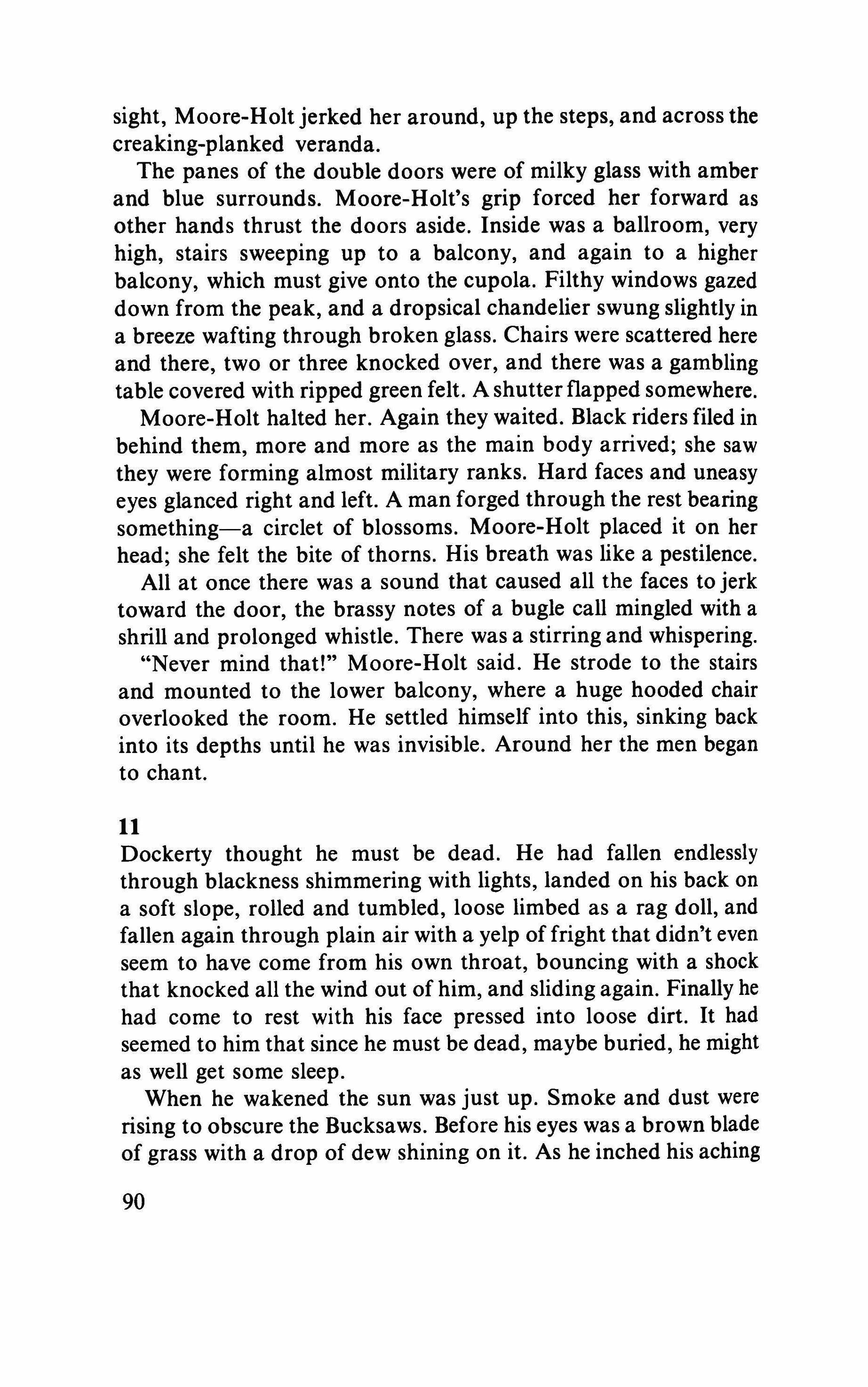
sight, Moore-Holt jerked her around, up the steps, and across the creaking-planked veranda.
The panes of the double doors were of milky glass with amber and blue surrounds. Moore-Holt's grip forced her forward as other hands thrust the doors aside. Inside was a ballroom, very high, stairs sweeping up to a balcony, and again to a higher balcony, which must give onto the cupola. Filthy windows gazed down from the peak, and a dropsical chandelier swung slightly in a breeze wafting through broken glass. Chairs were scattered here and there, two or three knocked over, and there was a gambling table covered with ripped green felt. A shutter flapped somewhere.
Moore-Holt halted her. Again they waited. Black riders filed in behind them, more and more as the main body arrived; she saw they were forming almost military ranks. Hard faces and uneasy eyes glanced right and left. A man forged through the rest bearing something-a circlet of blossoms. Moore-Holt placed it on her head; she felt the bite of thorns. His breath was like a pestilence.
All at once there was a sound that caused all the faces to jerk toward the door, the brassy notes of a bugle call mingled with a shrill and prolonged whistle. There was a stirring and Whispering.
"Never mind that!" Moore-Holt said. He strode to the stairs and mounted to the lower balcony, where a huge hooded chair overlooked the room. He settled himself into this, sinking back into its depths until he was invisible. Around her the men began to chant.
11
Dockerty thought he must be dead. He had fallen endlessly through blackness shimmering with lights, landed on his back on a soft slope, rolled and tumbled, loose limbed as a rag doll, and fallen again through plain air with a yelp offright that didn't even seem to have come from his own throat, bouncing with a shock that knocked all the wind out of him, and sliding again. Finally he had come to rest with his face pressed into loose dirt. It had seemed to him that since he must be dead, maybe buried, he might as well get some sleep.
When he wakened the sun was just up. Smoke and dust were rising to obscure the Bucksaws. Before his eyes was a brown blade of grass with a drop of dew shining on it. As he inched his aching
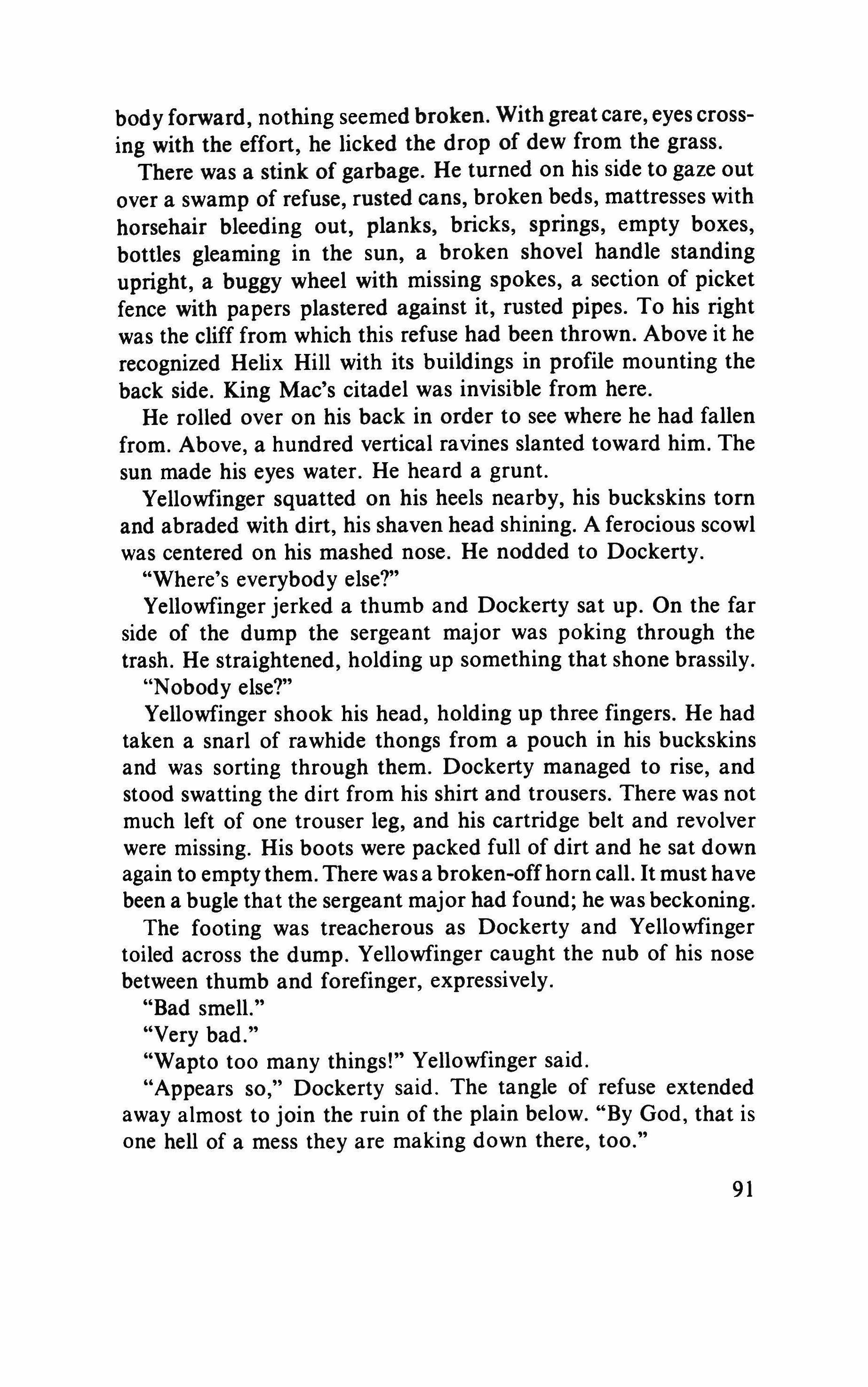
body forward, nothing seemed broken. With great care, eyes crossing with the effort, he licked the drop of dew from the grass.
There was a stink of garbage. He turned on his side to gaze out over a swamp of refuse, rusted cans, broken beds, mattresses with horsehair bleeding out, planks, bricks, springs, empty boxes, bottles gleaming in the sun, a broken shovel handle standing upright, a buggy wheel with missing spokes, a section of picket fence with papers plastered against it, rusted pipes. To his right was the cliff from which this refuse had been thrown. Above it he recognized Helix Hill with its buildings in profile mounting the back side. King Mac's citadel was invisible from here.
He rolled over on his back in order to see where he had fallen from. Above, a hundred vertical ravines slanted toward him. The sun made his eyes water. He heard a grunt.
Yellowfinger squatted on his heels nearby, his buckskins torn and abraded with dirt, his shaven head shining. A ferocious scowl was centered on his mashed nose. He nodded to Dockerty.
"Where's everybody else?"
Yellowfinger jerked a thumb and Dockerty sat up. On the far side of the dump the sergeant major was poking through the trash. He straightened, holding up something that shone brassily.
"Nobody else?"
Yellowfinger shook his head, holding up three fingers. He had taken a snarl of rawhide thongs from a pouch in his buckskins and was sorting through them. Dockerty managed to rise, and stood swatting the dirt from his shirt and trousers. There was not much left of one trouser leg, and his cartridge belt and revolver were missing. His boots were packed full of dirt and he sat down again to empty them. There was a broken-off horn call. It must have been a bugle that the sergeant major had found; he was beckoning.
The footing was treacherous as Dockerty and Yellowfinger toiled across the dump. Yellowfinger caught the nub of his nose between thumb and forefinger, expressively.
"Bad smell."
"Very bad."
"Wapto too many things!" Yellowfinger said. "Appears so," Dockerty said. The tangle of refuse extended away almost to join the ruin of the plain below. "By God, that is one hell of a mess they are making down there, too."
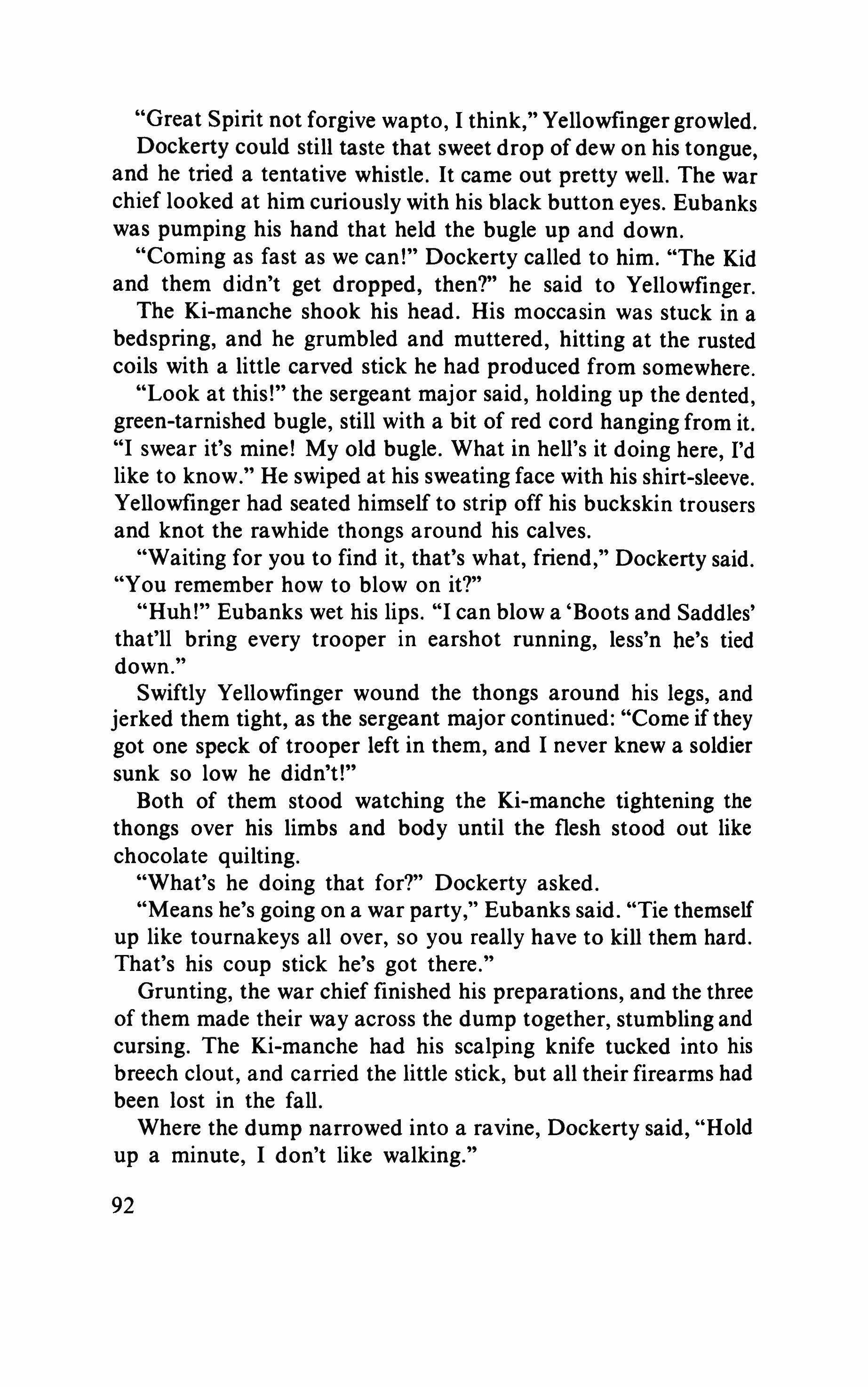
"Great Spirit not forgive wapto, 1 think," Yellowfinger growled. Dockerty could still taste that sweet drop of dew on his tongue, and he tried a tentative whistle. It came out pretty well. The war chief looked at him curiously with his black button eyes. Eubanks was pumping his hand that held the bugle up and down.
"Coming as fast as we can!" Dockerty called to him. "The Kid and them didn't get dropped, then?" he said to Yellowfinger.
The Ki-manche shook his head. His moccasin was stuck in a bedspring, and he grumbled and muttered, hitting at the rusted coils with a little carved stick he had produced from somewhere.
"Look at this!" the sergeant major said, holding up the dented, green-tarnished bugle, still with a bit of red cord hanging from it. "I swear it's mine! Myoid bugle. What in hell's it doing here, I'd like to know." He swiped at his sweating face with his shirt-sleeve. Yellowfinger had seated himself to strip off his buckskin trousers and knot the rawhide thongs around his calves.
"Waiting for you to find it, that's what, friend," Dockerty said. "You remember how to blow on it?"
"Huh!" Eubanks wet his lips. "I can blow a 'Boots and Saddles' that'll bring every trooper in earshot running, less'n he's tied down."
Swiftly Yellowfinger wound the thongs around his legs, and jerked them tight, as the sergeant major continued: "Come if they got one speck of trooper left in them, and 1 never knew a soldier sunk so low he didn't!"
Both of them stood watching the Ki-manche tightening the thongs over his limbs and body until the flesh stood out like chocolate quilting.
"What's he doing that for?" Dockerty asked.
"Means he's going on a war party," Eubanks said. "Tie themself up like tournakeys all over, so you really have to kill them hard. That's his coup stick he's got there."
Grunting, the war chief finished his preparations, and the three of them made their way across the dump together, stumbling and cursing. The Ki-manche had his scalping knife tucked into his breech clout, and carried the little stick, but all their firearms had been lost in the fall.
Where the dump narrowed into a ravine, Dockerty said, "Hold up a minute, 1 don't like walking."
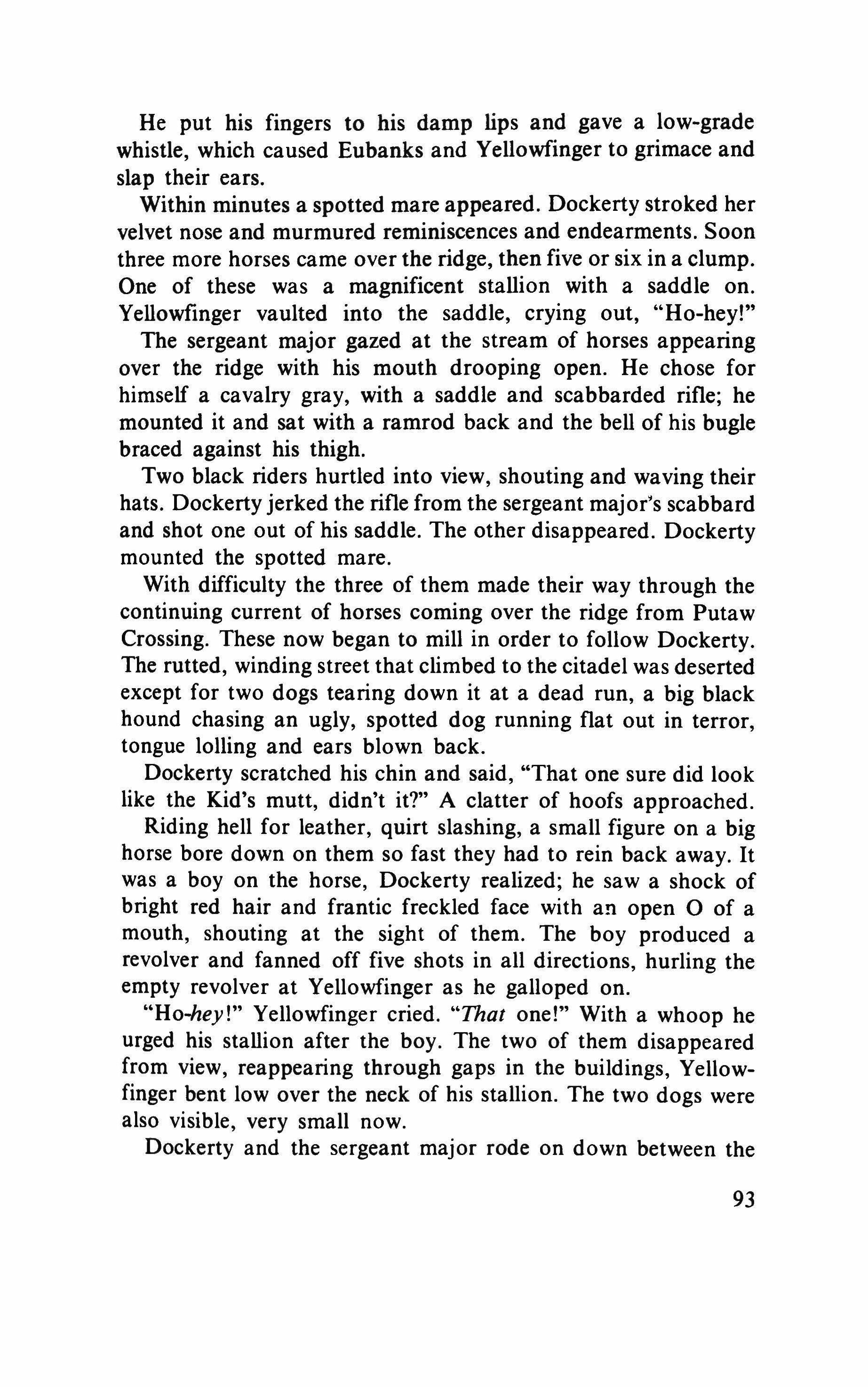
He put his fingers to his damp lips and gave a low-grade whistle, which caused Eubanks and Yellowfinger to grimace and slap their ears.
Within minutes a spotted mare appeared. Dockerty stroked her velvet nose and murmured reminiscences and endearments. Soon three more horses came over the ridge, then five or six in a clump. One of these was a magnificent stallion with a saddle on. Yellowfinger vaulted into the saddle, crying out, "Ho-hey!"
The sergeant major gazed at the stream of horses appearing over the ridge with his mouth drooping open. He chose for himself a cavalry gray, with a saddle and scabbarded rifle; he mounted it and sat with a ramrod back and the bell of his bugle braced against his thigh.
Two black riders hurtled into view, shouting and waving their hats. Dockerty jerked the rifle from the sergeant major's scabbard and shot one out of his saddle. The other disappeared. Dockerty mounted the spotted mare.
With difficulty the three of them made their way through the continuing current of horses coming over the ridge from Putaw Crossing. These now began to mill in order to follow Dockerty. The rutted, winding street that climbed to the citadel was deserted except for two dogs tearing down it at a dead run, a big black hound chasing an ugly, spotted dog running flat out in terror, tongue lolling and ears blown back.
Dockerty scratched his chin and said, "That one sure did look like the Kid's mutt, didn't it?" A clatter of hoofs approached.
Riding hell for leather, quirt slashing, a small figure on a big horse bore down on them so fast they had to rein back away. It was a boy on the horse, Dockerty realized; he saw a shock of bright red hair and frantic freckled face with an open 0 of a mouth, shouting at the sight of them. The boy produced a revolver and fanned off five shots in all directions, hurling the empty revolver at Yellowfinger as he galloped on.
"Ho-hey!" Yellowfinger cried. "That one!" With a whoop he urged his stallion after the boy. The two of them disappeared from view, reappearing through gaps in the buildings, Yellowfinger bent low over the neck of his stallion. The two dogs were also visible, very small now.
Dockerty and the sergeant major rode on down between the 93
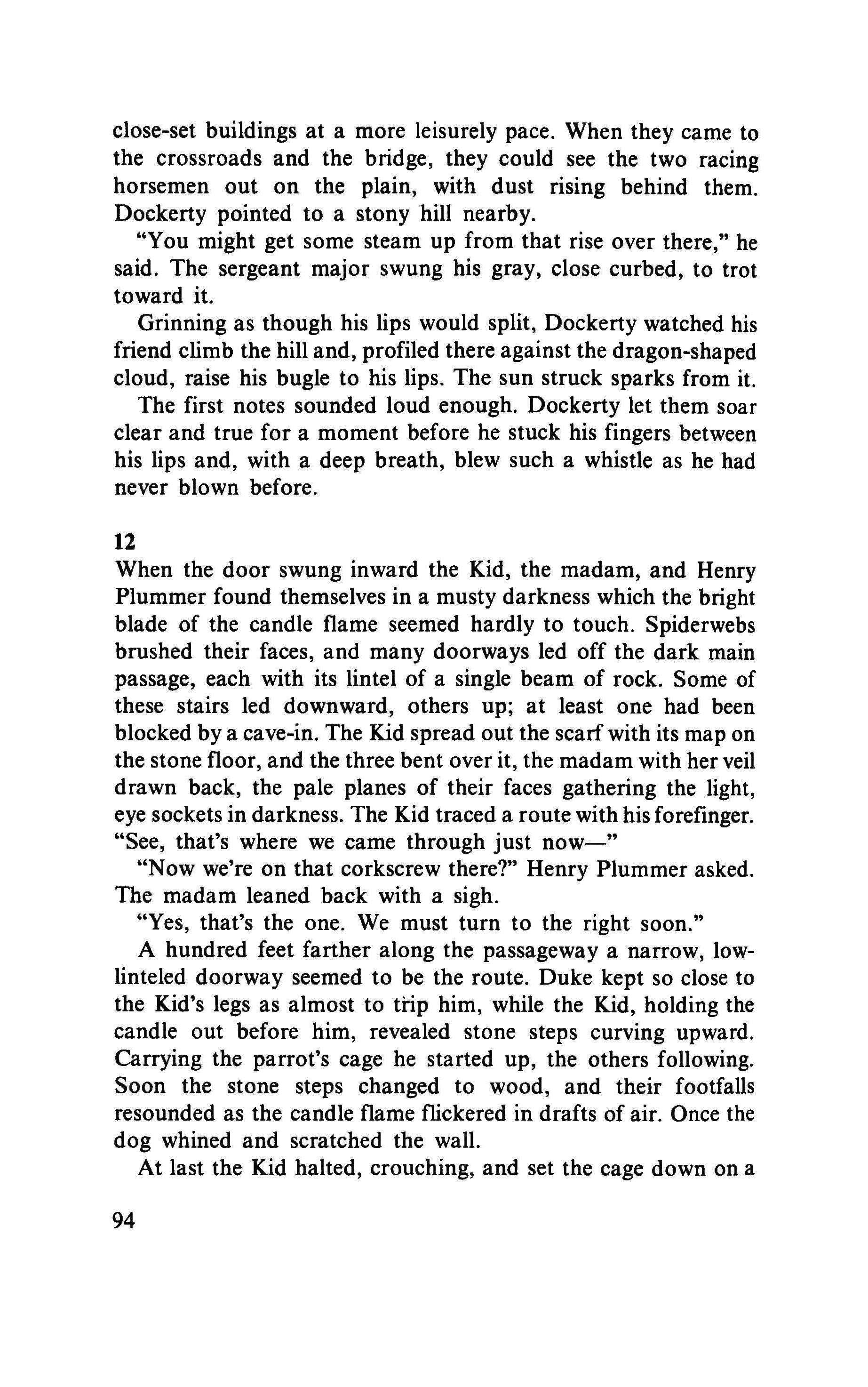
close-set buildings at a more leisurely pace. When they came to the crossroads and the bridge, they could see the two racing horsemen out on the plain, with dust rising behind them. Dockerty pointed to a stony hill nearby.
"You might get some steam up from that rise over there," he said. The sergeant major swung his gray, close curbed, to trot toward it.
Grinning as though his lips would split, Dockerty watched his friend climb the hill and, profiled there against the dragon-shaped cloud, raise his bugle to his lips. The sun struck sparks from it.
The first notes sounded loud enough. Dockerty let them soar clear and true for a moment before he stuck his fingers between his lips and, with a deep breath, blew such a whistle as he had never blown before.
12
When the door swung inward the Kid, the madam, and Henry Plummer found themselves in a musty darkness which the bright blade of the candle flame seemed hardly to touch. Spiderwebs brushed their faces, and many doorways led off the dark main passage, each with its lintel of a single beam of rock. Some of these stairs led downward, others up; at least one had been blocked by a cave-in. The Kid spread out the scarf with its map on the stone floor, and the three bent over it, the madam with her veil drawn back, the pale planes of their faces gathering the light, eye sockets in darkness. The Kid traced a route with his forefinger. "See, that's where we came through just now-"
"Now we're on that corkscrew there?" Henry Plummer asked. The madam leaned back with a sigh.
"Yes, that's the one. We must turn to the right soon."
A hundred feet farther along the passageway a narrow, lowlinteled doorway seemed to be the route. Duke kept so close to the Kid's legs as almost to trip him, while the Kid, holding the candle out before him, revealed stone steps curving upward. Carrying the parrot's cage he started up, the others following. Soon the stone steps changed to wood, and their footfalls resounded as the candle flame flickered in drafts of air. Once the dog whined and scratched the wall.
At last the Kid halted, crouching, and set the cage down on a
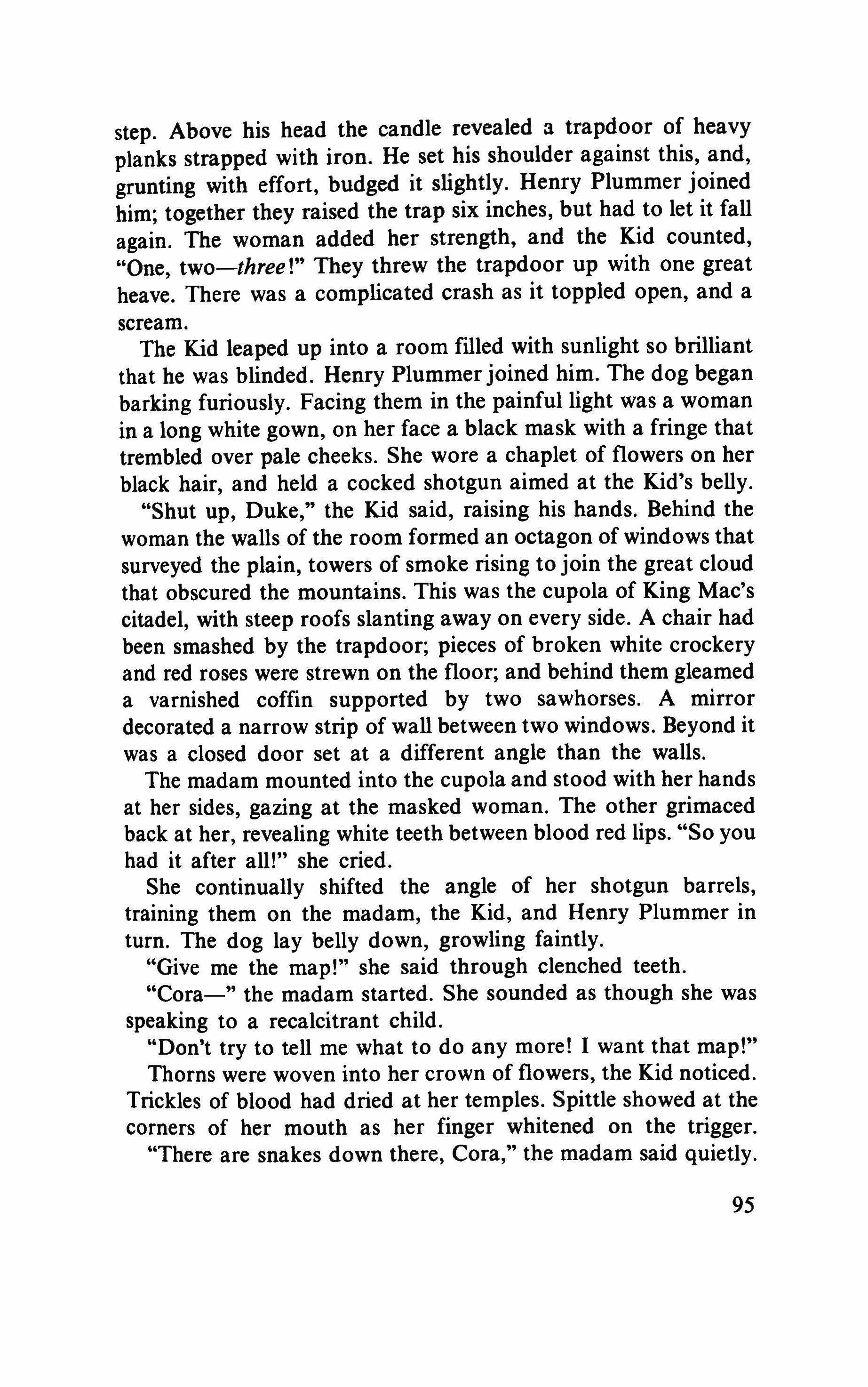
step. Above his head the candle revealed a trapdoor of heavy planks strapped with iron. He set his shoulder against this, and, grunting with effort, budged it slightly. Henry Plummer joined him; together they raised the trap six inches, but had to let it fall again. The woman added her strength, and the Kid counted, "One, two-three!" They threw the trapdoor up with one great heave. There was a complicated crash as it toppled open, and a scream.
The Kid leaped up into a room filled with sunlight so brilliant that he was blinded. Henry Plummer joined him. The dog began barking furiously. Facing them in the painful light was a woman in a long white gown, on her face a black mask with a fringe that trembled over pale cheeks. She wore a chaplet of flowers on her black hair, and held a cocked shotgun aimed at the Kid's belly.
"Shut up, Duke," the Kid said, raising his hands. Behind the woman the walls of the room formed an octagon of windows that surveyed the plain, towers of smoke rising to join the great cloud that obscured the mountains. This was the cupola of King Mac's citadel, with steep roofs slanting away on every side. A chair had been smashed by the trapdoor; pieces of broken white crockery and red roses were strewn on the floor; and behind them gleamed a varnished coffin supported by two sawhorses. A mirror decorated a narrow strip of wall between two windows. Beyond it was a closed door set at a different angle than the walls.
The madam mounted into the cupola and stood with her hands at her sides, gazing at the masked woman. The other grimaced back at her, revealing white teeth between blood red lips. "So you had it after all!" she cried.
She continually shifted the angle of her shotgun barrels, training them on the madam, the Kid, and Henry Plummer in turn. The dog lay belly down, growling faintly.
"Give me the map!" she said through clenched teeth.
"Cora-" the madam started. She sounded as though she was speaking to a recalcitrant child.
"Don't try to tell me what to do any more! I want that map!"
Thorns were woven into her crown of flowers, the Kid noticed. Trickles of blood had dried at her temples. Spittle showed at the corners of her mouth as her finger whitened on the trigger.
"There are snakes down there, Cora," the madam said quietly.
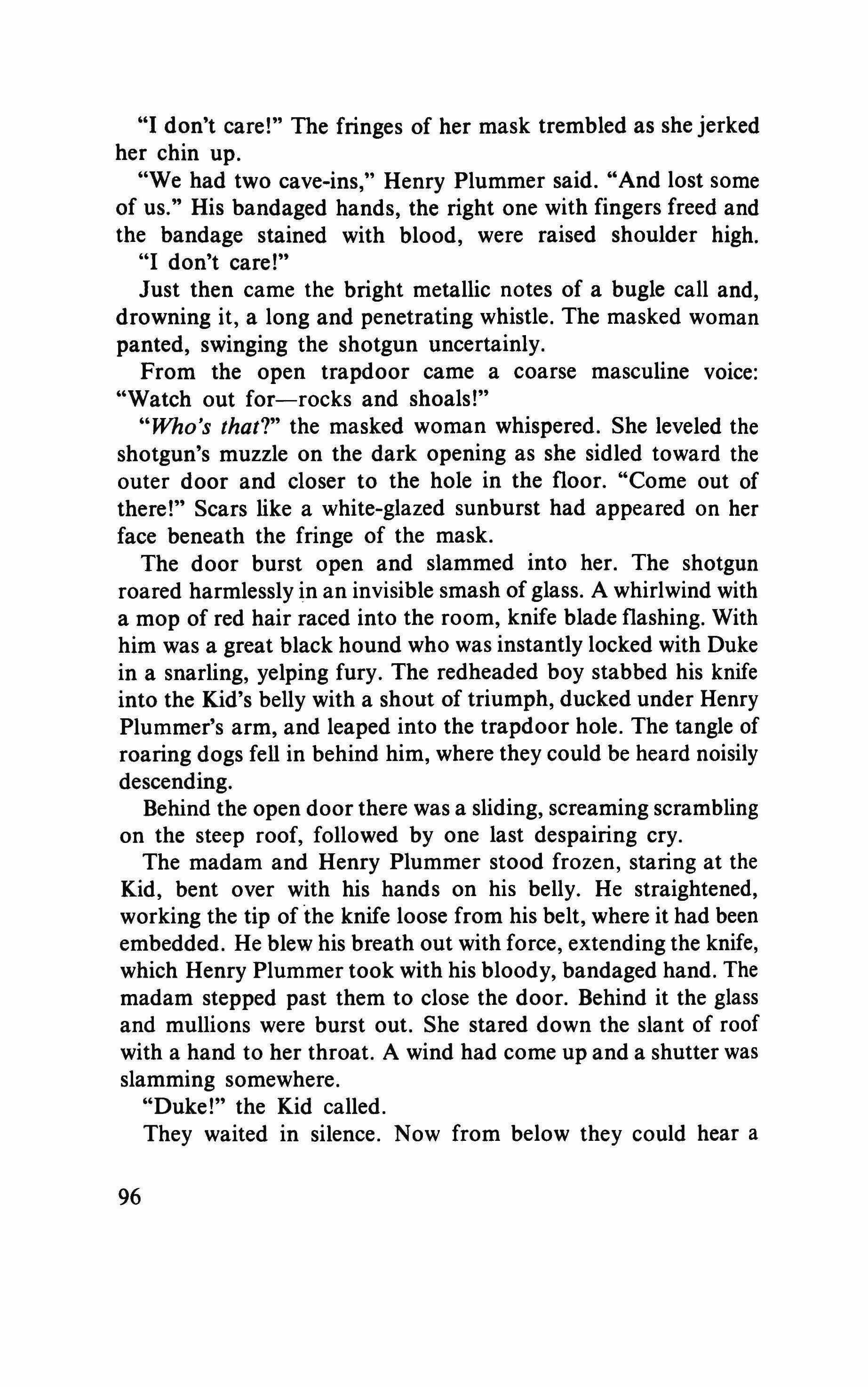
"I don't care!" The fringes of her mask trembled as she jerked her chin up.
"We had two cave-ins," Henry Plummer said. "And lost some of us." His bandaged hands, the right one with fingers freed and the bandage stained with blood, were raised shoulder high.
"I don't care!"
Just then came the bright metallic notes of a bugle call and, drowning it, a long and penetrating whistle. The masked woman panted, swinging the shotgun uncertainly.
From the open trapdoor came a coarse masculine voice: "Watch out for-rocks and shoals!"
"Who's that?" the masked woman whispered. She leveled the shotgun's muzzle on the dark opening as she sidled toward the outer door and closer to the hole in the floor. "Come out of there!" Scars like a white-glazed sunburst had appeared on her face beneath the fringe of the mask.
The door burst open and slammed into her. The shotgun roared harmlessly in an invisible smash of glass. A whirlwind with a mop of red hair raced into the room, knife blade flashing. With him was a great black hound who was instantly locked with Duke in a snarling, yelping fury. The redheaded boy stabbed his knife into the Kid's belly with a shout of triumph, ducked under Henry Plummer's arm, and leaped into the trapdoor hole. The tangle of roaring dogs fell in behind him, where they could be heard noisily descending.
Behind the open door there was a sliding, screaming scrambling on the steep roof, followed by one last despairing cry.
The madam and Henry Plummer stood frozen, staring at the Kid, bent over with his hands on his belly. He straightened, working the tip of "the knife loose from his belt, where it had been embedded. He blew his breath out with force, extending the knife, which Henry Plummer took with his bloody, bandaged hand. The madam stepped past them to close the door. Behind it the glass and mullions were burst out. She stared down the slant of roof with a hand to her throat. A wind had come up and a shutter was slamming somewhere.
"Duke!" the Kid called. They waited in silence. Now from below they could hear a
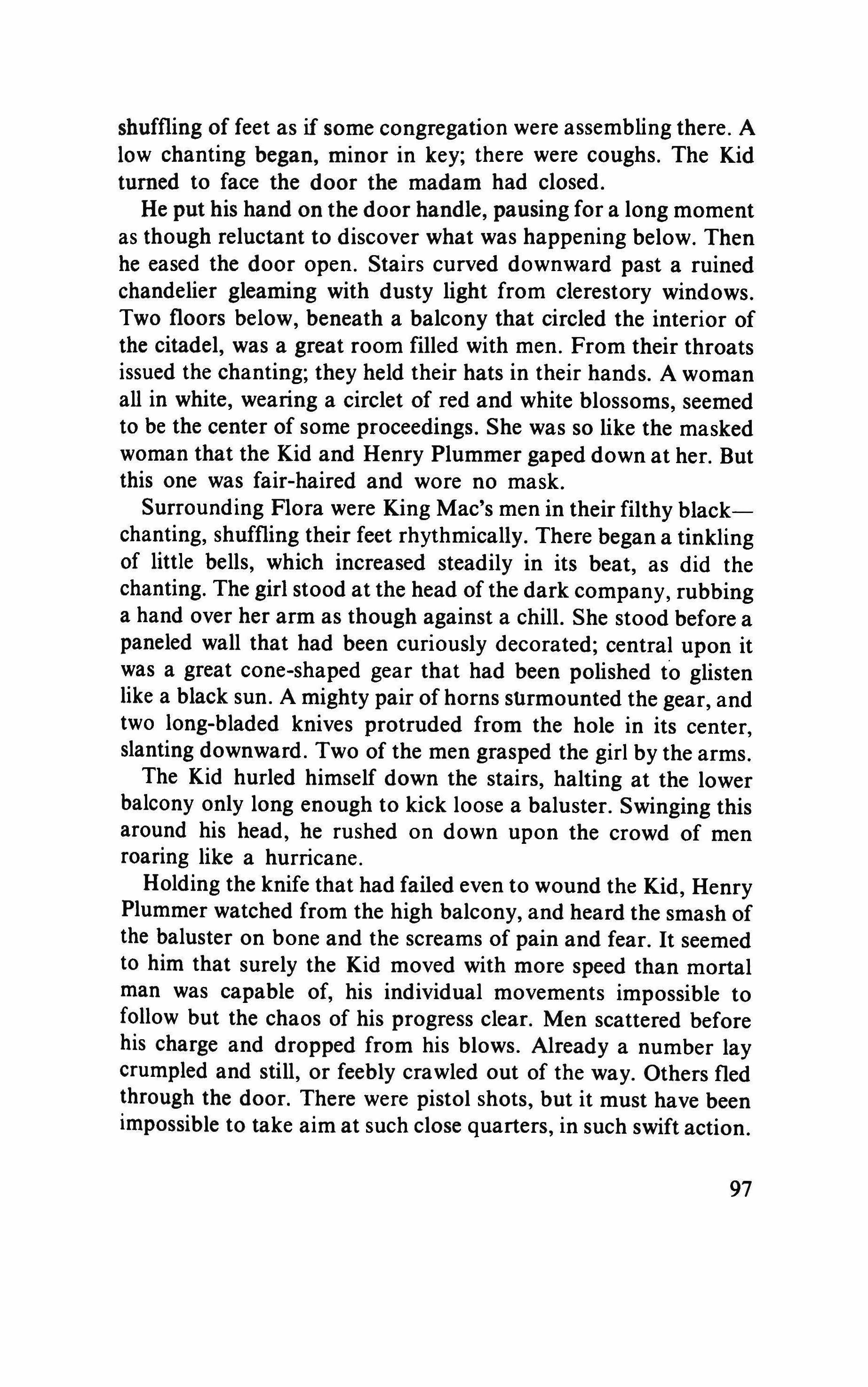
shuffling of feet as if some congregation were assembling there. A low chanting began, minor in key; there were coughs. The Kid turned to face the door the madam had closed.
He put his hand on the door handle, pausing for a long moment as though reluctant to discover what was happening below. Then he eased the door open. Stairs curved downward past a ruined chandelier gleaming with dusty light from clerestory windows. Two floors below, beneath a balcony that circled the interior of the citadel, was a great room filled with men. From their throats issued the chanting; they held their hats in their hands. A woman all in white, wearing a circlet of red and white blossoms, seemed to be the center of some proceedings. She was so like the masked woman that the Kid and Henry Plummer gaped down at her. But this one was fair-haired and wore no mask.
Surrounding Flora were King Mac's men in their filthy blackchanting, shuffling their feet rhythmically. There began a tinkling of little bells, which increased steadily in its beat, as did the chanting. The girl stood at the head ofthe dark company, rubbing a hand over her arm as though against a chill. She stood before a paneled wall that had been curiously decorated; central upon it was a great cone-shaped gear that had been polished to glisten like a black sun. A mighty pair of horns surmounted the gear, and two long-bladed knives protruded from the hole in its center, slanting downward. Two of the men grasped the girl by the arms.
The Kid hurled himself down the stairs, halting at the lower balcony only long enough to kick loose a baluster. Swinging this around his head, he rushed on down upon the crowd of men roaring like a hurricane.
Holding the knife that had failed even to wound the Kid, Henry Plummer watched from the high balcony, and heard the smash of the baluster on bone and the screams of pain and fear. It seemed to him that surely the Kid moved with more speed than mortal man was capable of, his individual movements impossible to follow but the chaos of his progress clear. Men scattered before his charge and dropped from his blows. Already a number lay crumpled and still, or feebly crawled out of the way. Others fled through the door. There were pistol shots, but it must have been impossible to take aim at such close quarters, in such swift action.
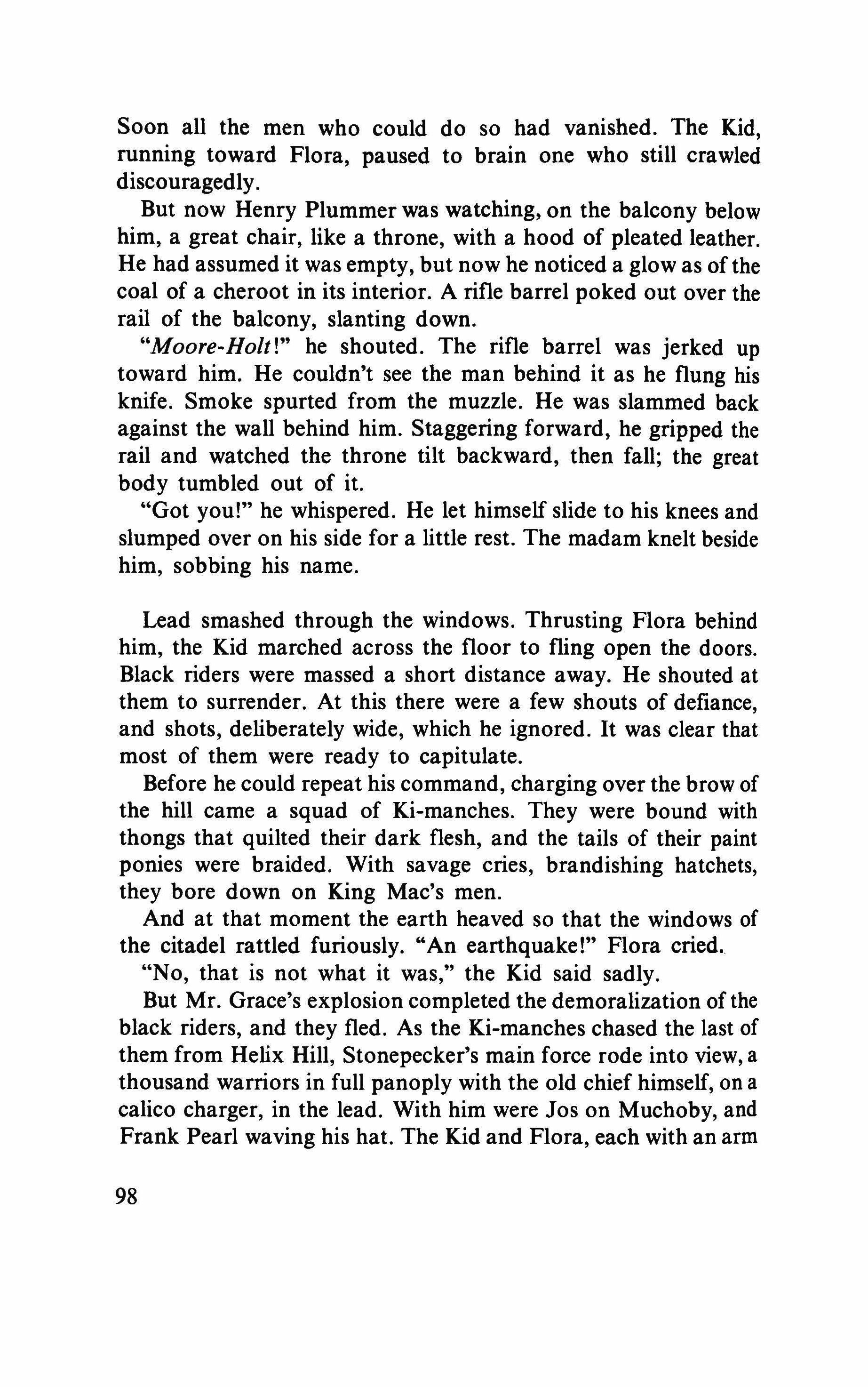
Soon all the men who could do so had vanished. The Kid, running toward Flora, paused to brain one who still crawled discouragedly.
But now Henry Plummer was watching, on the balcony below him, a great chair, like a throne, with a hood of pleated leather. He had assumed it was empty, but now he noticed a glow as ofthe coal of a cheroot in its interior. A rifle barrel poked out over the rail of the balcony, slanting down.
"Moore-Holt!" he shouted. The rifle barrel was jerked up toward him. He couldn't see the man behind it as he flung his knife. Smoke spurted from the muzzle. He was slammed back against the wall behind him. Staggering forward, he gripped the rail and watched the throne tilt backward, then fall; the great body tumbled out of it.
"Got you!" he whispered. He let himself slide to his knees and slumped over on his side for a little rest. The madam knelt beside him, sobbing his name.
Lead smashed through the windows. Thrusting Flora behind him, the Kid marched across the floor to fling open the doors. Black riders were massed a short distance away. He shouted at them to surrender. At this there were a few shouts of defiance, and shots, deliberately wide, which he ignored. It was clear that most of them were ready to capitulate.
Before he could repeat his command, charging over the brow of the hill came a squad of Ki-manches, They were bound with thongs that quilted their dark flesh, and the tails of their paint ponies were braided. With savage cries, brandishing hatchets, they bore down on King Mac's men.
And at that moment the earth heaved so that the windows of the citadel rattled furiously. "An earthquake!" Flora cried.
"No, that is not what it was," the Kid said sadly.
But Mr. Grace's explosion completed the demoralization of the black riders, and they fled. As the Ki-manches chased the last of them from Helix Hill, Stonepecker's main force rode into view, a thousand warriors in full panoply with the old chief himself, on a calico charger, in the lead. With him were Jos on Muchoby, and Frank Pearl waving his hat. The Kid and Flora, each with an arm
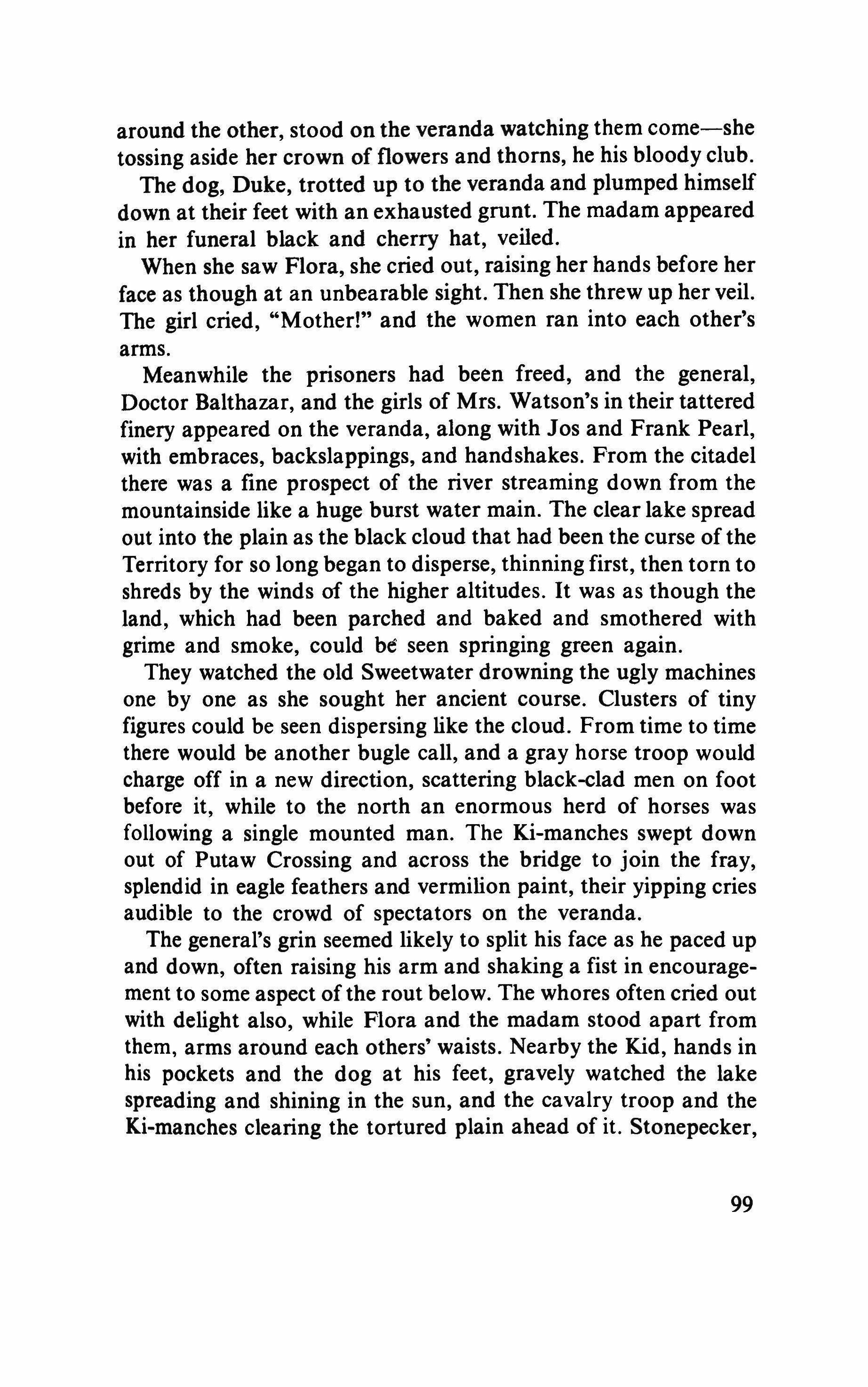
around the other, stood on the veranda watching them come-she tossing aside her crown of flowers and thoms, he his bloody club.
The dog, Duke, trotted up to the veranda and plumped himself down at their feet with an exhausted grunt. The madam appeared in her funeral black and cherry hat, veiled.
When she saw Flora, she cried out, raising her hands before her face as though at an unbearable sight. Then she threw up her veil. The girl cried, "Mother!" and the women ran into each other's arms.
Meanwhile the prisoners had been freed, and the general, Doctor Balthazar, and the girls of Mrs. Watson's in their tattered finery appeared on the veranda, along with Jos and Frank Pearl, with embraces, backslappings, and handshakes. From the citadel there was a fine prospect of the river streaming down from the mountainside like a huge burst water main. The clear lake spread out into the plain as the black cloud that had been the curse of the Territory for so long began to disperse, thinning first, then tom to shreds by the winds of the higher altitudes. It was as though the land, which had been parched and baked and smothered with grime and smoke, could be! seen springing green again.
They watched the old Sweetwater drowning the ugly machines one by one as she sought her ancient course. Clusters of tiny figures could be seen dispersing like the cloud. From time to time there would be another bugle call, and a gray horse troop would charge off in a new direction, scattering black-clad men on foot before it, while to the north an enormous herd of horses was following a single mounted man. The Ki-manches swept down out of Putaw Crossing and across the bridge to join the fray, splendid in eagle feathers and vermilion paint, their yipping cries audible to the crowd of spectators on the veranda.
The general's grin seemed likely to split his face as he paced up and down, often raising his arm and shaking a fist in encouragement to some aspect of the rout below. The whores often cried out with delight also, while Flora and the madam stood apart from them, arms around each others' waists. Nearby the Kid, hands in his pockets and the dog at his feet, gravely watched the lake spreading and shining in the sun, and the cavalry troop and the Ki-manches clearing the tortured plain ahead of it. Stonepecker,
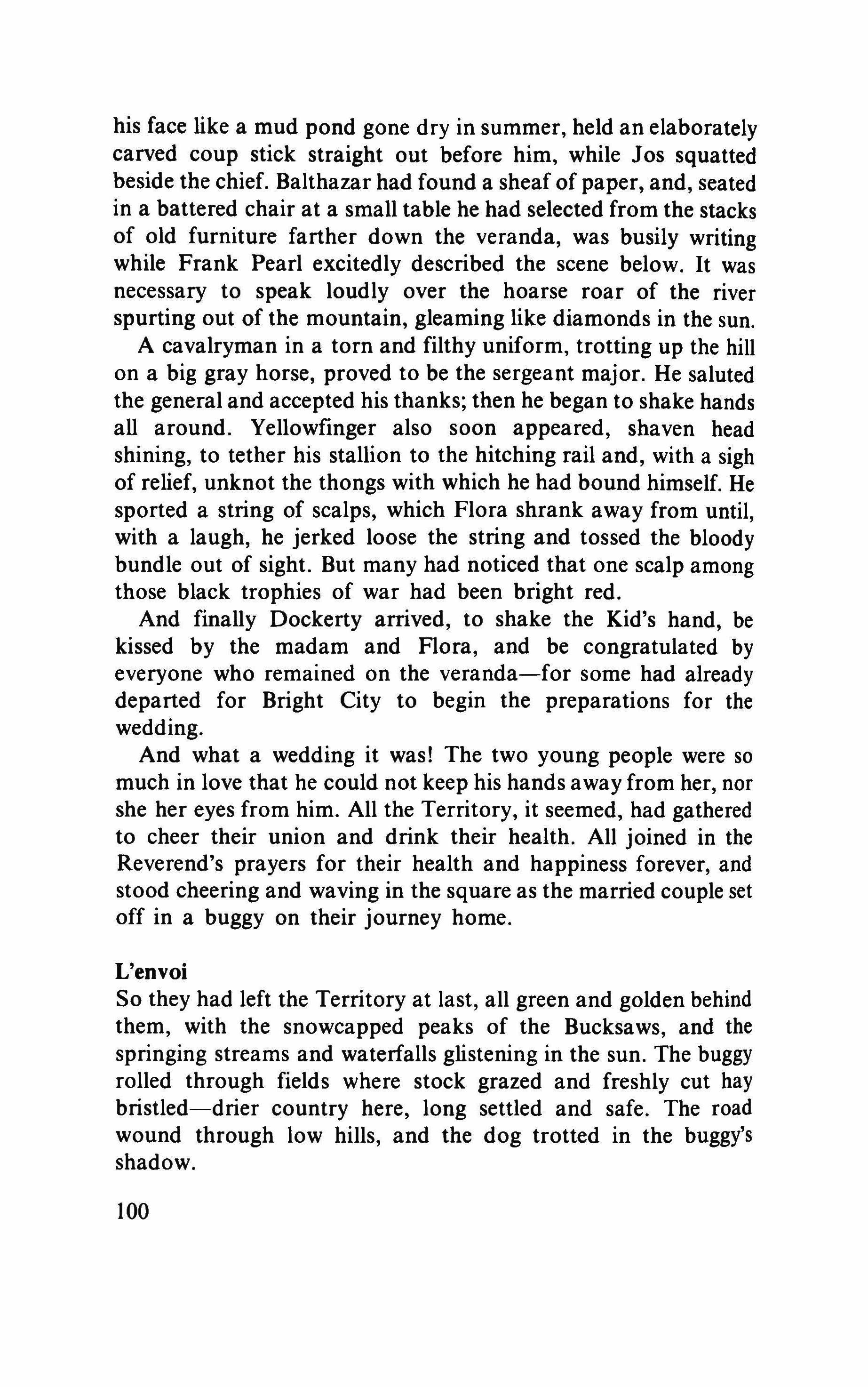
his face like a mud pond gone dry in summer, held an elaborately carved coup stick straight out before him, while Jos squatted beside the chief. Balthazar had found a sheaf of paper, and, seated in a battered chair at a small table he had selected from the stacks of old furniture farther down the veranda, was busily writing while Frank Pearl excitedly described the scene below. It was necessary to speak loudly over the hoarse roar of the river spurting out of the mountain, gleaming like diamonds in the sun.
A cavalryman in a torn and filthy uniform, trotting up the hill on a big gray horse, proved to be the sergeant major. He saluted the general and accepted his thanks; then he began to shake hands all around. Yellowfinger also soon appeared, shaven head shining, to tether his stallion to the hitching rail and, with a sigh of relief, unknot the thongs with which he had bound himself. He sported a string of scalps, which Flora shrank away from until, with a laugh, he jerked loose the string and tossed the bloody bundle out of sight. But many had noticed that one scalp among those black trophies of war had been bright red.
And finally Dockerty arrived, to shake the Kid's hand, be kissed by the madam and Flora, and be congratulated by everyone who remained on the veranda-for some had already departed for Bright City to begin the preparations for the wedding.
And what a wedding it was! The two young people were so much in love that he could not keep his hands away from her, nor she her eyes from him. All the Territory, it seemed, had gathered to cheer their union and drink their health. All joined in the Reverend's prayers for their health and happiness forever, and stood cheering and waving in the square as the married couple set off in a buggy on their journey home.
L'envoi
So they had left the Territory at last, all green and golden behind them, with the snowcapped peaks of the Bucksaws, and the springing streams and waterfalls glistening in the sun. The buggy rolled through fields where stock grazed and freshly cut hay bristled-drier country here, long settled and safe. The road wound through low hills, and the dog trotted in the buggy's shadow.
100
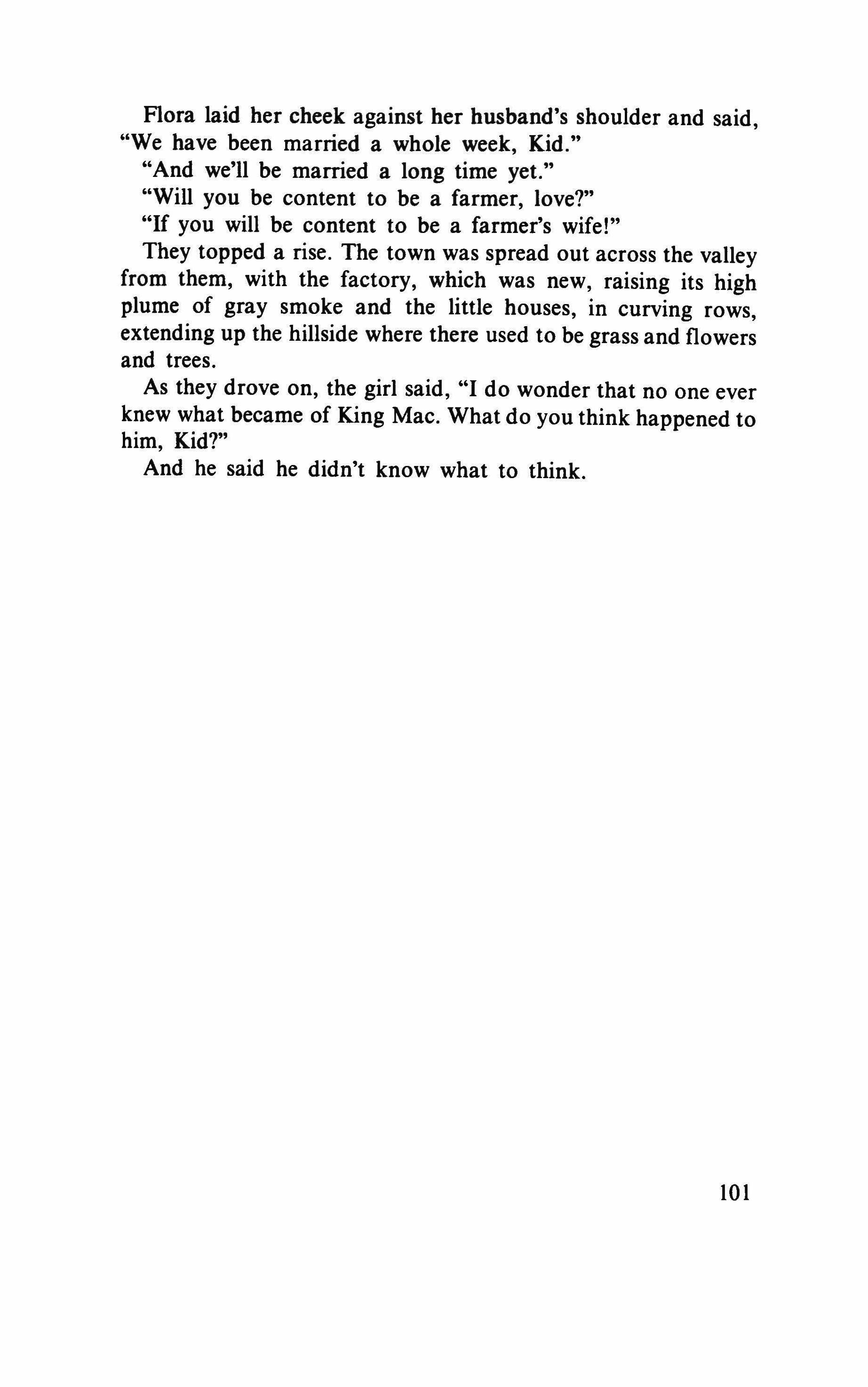
Flora laid her cheek against her husband's shoulder and said, "We have been married a whole week, Kid."
"And we'll be married a long time yet."
"Will you be content to be a farmer, love?"
"If you will be content to be a farmer's wife!"
They topped a rise. The town was spread out across the valley from them, with the factory, which was new, raising its high plume of gray smoke and the little houses, in curving rows, extending up the hillside where there used to be grass and flowers and trees.
As they drove on, the girl said, "I do wonder that no one ever knew what became of King Mac. What do you think happened to him, Kid?"
And he said he didn't know what to think.
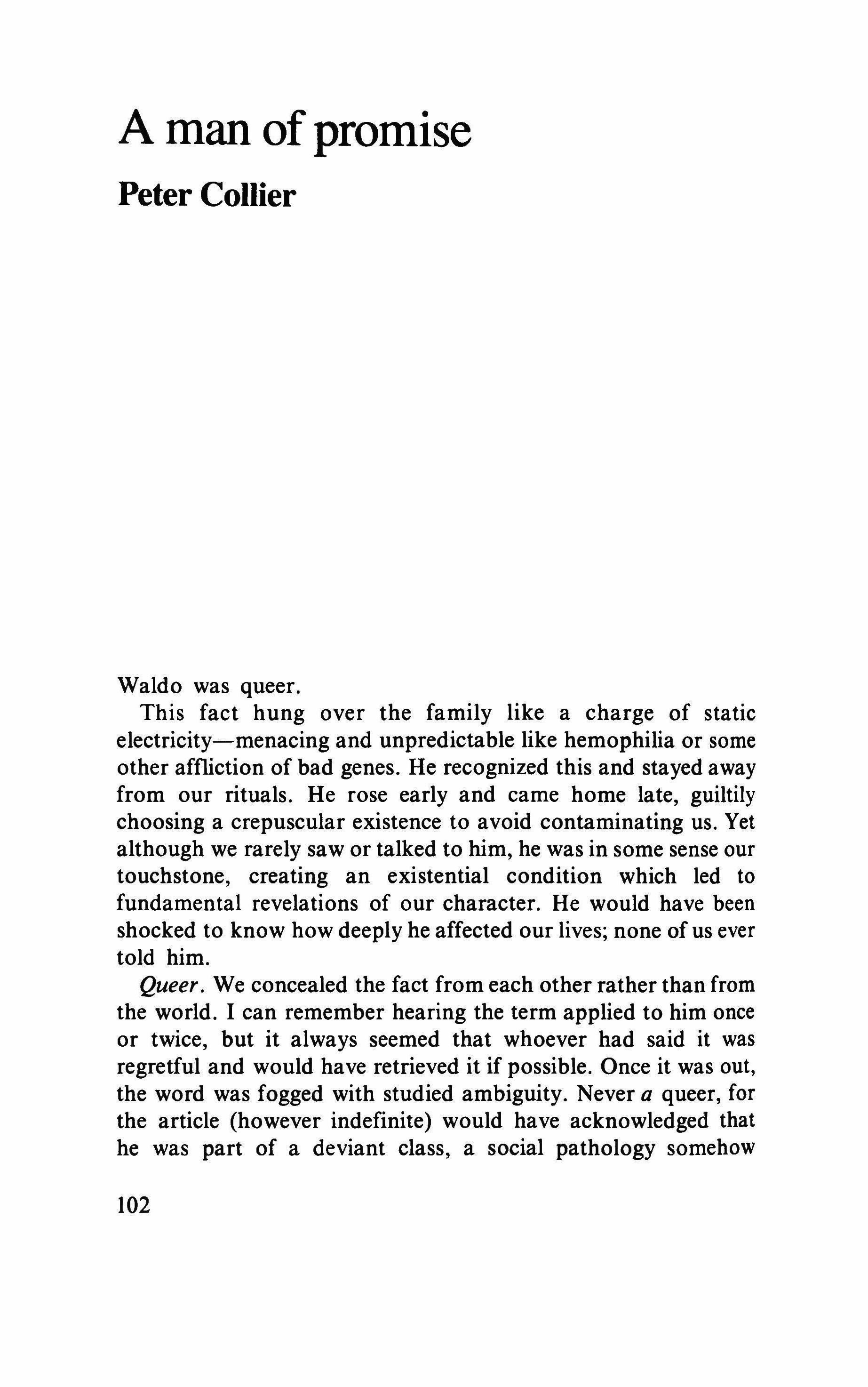
Waldo was queer.
This fact hung over the family like a charge of static electricity-menacing and unpredictable like hemophilia or some other affliction of bad genes. He recognized this and stayed away from our rituals. He rose early and came home late, guiltily choosing a crepuscular existence to avoid contaminating us. Yet although we rarely saw or talked to him, he was in some sense our touchstone, creating an existential condition which led to fundamental revelations of our character. He would have been shocked to know how deeply he affected our lives; none of us ever told him.
Queer. We concealed the fact from each other rather than from the world. I can remember hearing the term applied to him once or twice, but it always seemed that whoever had said it was regretful and would have retrieved it if possible. Once it was out, the word was fogged with studied ambiguity. Never a queer, for the article (however indefinite) would have acknowledged that he was part of a deviant class, a social pathology somehow
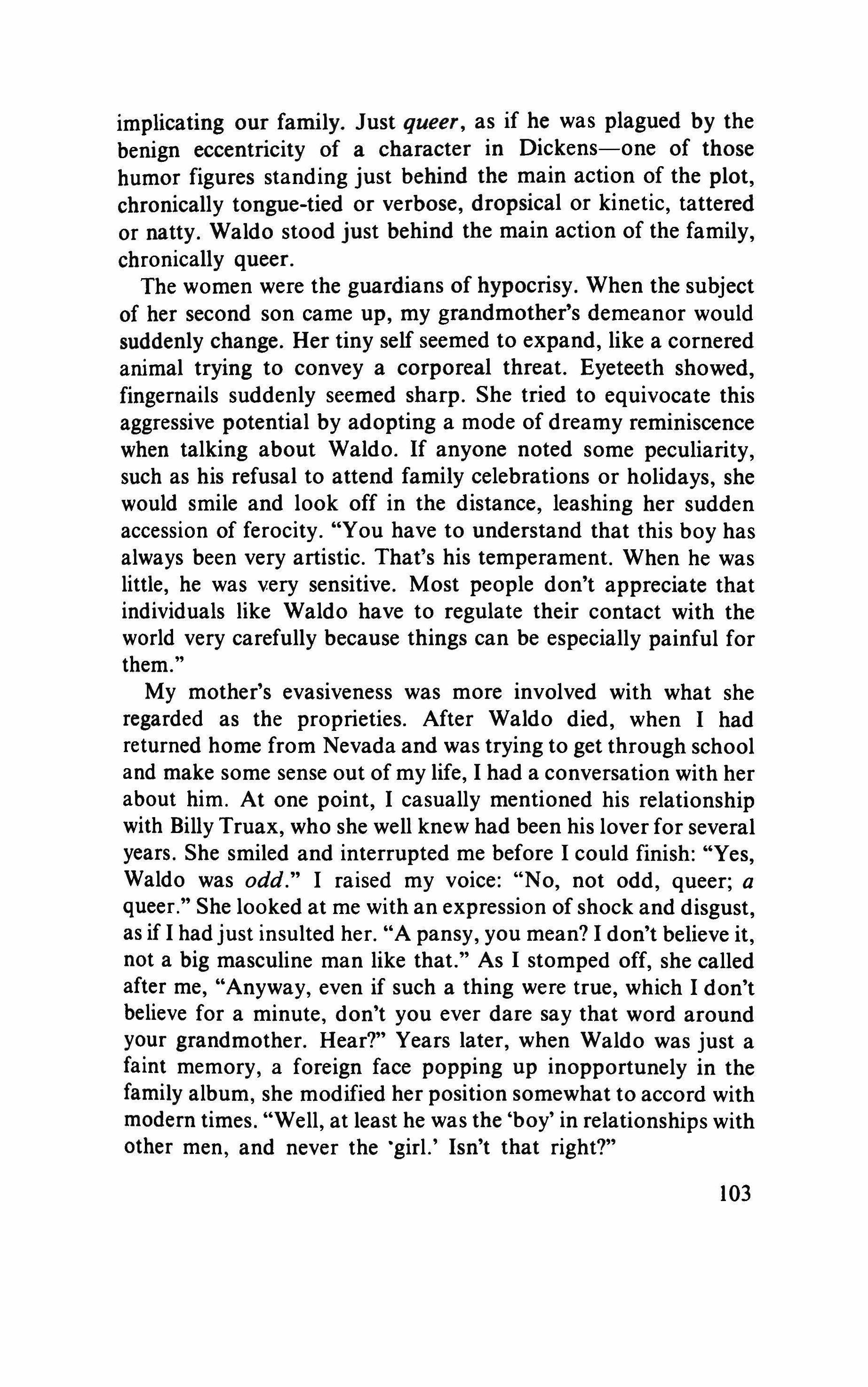
implicating our family. Just queer, as if he was plagued by the benign eccentricity of a character in Dickens-one of those humor figures standing just behind the main action of the plot, chronically tongue-tied or verbose, dropsical or kinetic, tattered or natty. Waldo stood just behind the main action of the family, chronically queer.
The women were the guardians of hypocrisy. When the subject of her second son came up, my grandmother's demeanor would suddenly change. Her tiny self seemed to expand, like a cornered animal trying to convey a corporeal threat. Eyeteeth showed, fingernails suddenly seemed sharp. She tried to equivocate this aggressive potential by adopting a mode of dreamy reminiscence when talking about Waldo. If anyone noted some peculiarity, such as his refusal to attend family celebrations or holidays, she would smile and look off in the distance, leashing her sudden accession of ferocity. "You have to understand that this boy has always been very artistic. That's his temperament. When he was little, he was very sensitive. Most people don't appreciate that individuals like Waldo have to regulate their contact with the world very carefully because things can be especially painful for them."
My mother's evasiveness was more involved with what she regarded as the proprieties. After Waldo died, when I had returned home from Nevada and was trying to get through school and make some sense out of my life, I had a conversation with her about him. At one point, I casually mentioned his relationship with Billy Truax, who she well knew had been his lover for several years. She smiled and interrupted me before I could finish: "Yes, Waldo was odd." I raised my voice: "No, not odd, queer; a queer." She looked at me with an expression of shock and disgust, as if I had just insulted her. "A pansy, you mean? I don't believe it, not a big masculine man like that." As I stomped off, she called after me, "Anyway, even if such a thing were true, which I don't believe for a minute, don't you ever dare say that word around your grandmother. Hear?" Years later, when Waldo was just a faint memory, a foreign face popping up inopportunely in the family album, she modified her position somewhat to accord with modern times. "Well, at least he was the 'boy' in relationships with other men, and never the "girl.' Isn't that right?"
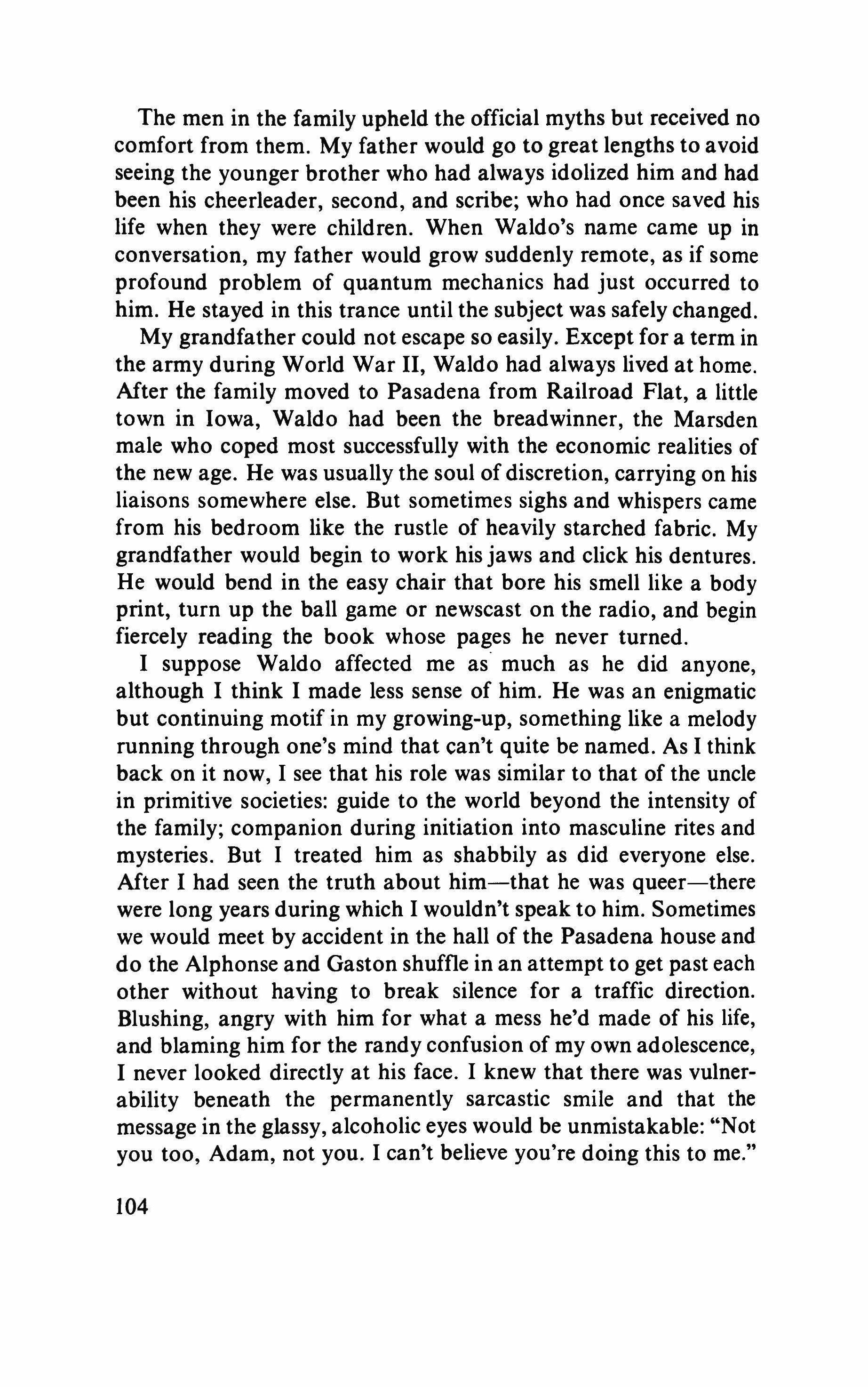
The men in the family upheld the official myths but received no comfort from them. My father would go to great lengths to avoid seeing the younger brother who had always idolized him and had been his cheerleader, second, and scribe; who had once saved his life when they were children. When Waldo's name came up in conversation, my father would grow suddenly remote, as if some profound problem of quantum mechanics had just occurred to him. He stayed in this trance until the subject was safely changed. My grandfather could not escape so easily. Except for a term in the army during World War II, Waldo had always lived at home. After the family moved to Pasadena from Railroad Flat, a little town in Iowa, Waldo had been the breadwinner, the Marsden male who coped most successfully with the economic realities of the new age. He was usually the soul of discretion, carrying on his liaisons somewhere else. But sometimes sighs and whispers came from his bedroom like the rustle of heavily starched fabric. My grandfather would begin to work his jaws and click his dentures. He would bend in the easy chair that bore his smell like a body print, turn up the ball game or newscast on the radio, and begin fiercely reading the book whose pages he never turned.
I suppose Waldo affected me as' much as he did anyone, although I think I made less sense of him. He was an enigmatic but continuing motif in my growing-up, something like a melody running through one's mind that can't quite be named. As I think back on it now, I see that his role was similar to that of the uncle in primitive societies: guide to the world beyond the intensity of the family; companion during initiation into masculine rites and mysteries. But I treated him as shabbily as did everyone else. After I had seen the truth about him-that he was queer-there were long years during which I wouldn't speak to him. Sometimes we would meet by accident in the hall of the Pasadena house and do the Alphonse and Gaston shuffle in an attempt to get past each other without having to break silence for a traffic direction. Blushing, angry with him for what a mess he'd made of his life, and blaming him for the randy confusion of my own adolescence, I never looked directly at his face. I knew that there was vulnerability beneath the permanently sarcastic smile and that the message in the glassy, alcoholic eyes would be unmistakable: "Not you too, Adam, not you. I can't believe you're doing this to me."
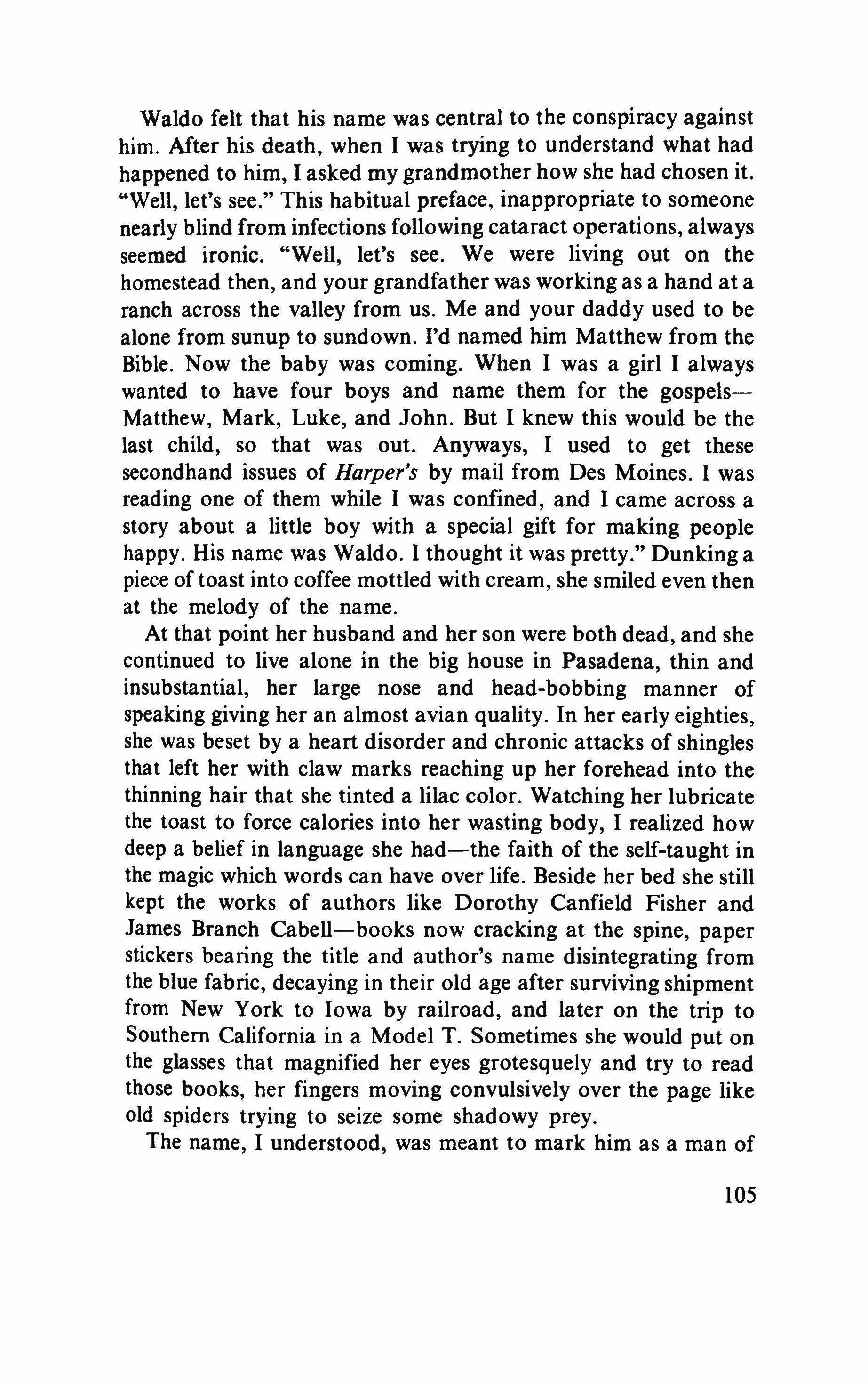
Waldo felt that his name was central to the conspiracy against him. After his death, when I was trying to understand what had happened to him, I asked my grandmother how she had chosen it. "Well, let's see." This habitual preface, inappropriate to someone nearly blind from infections following cataract operations, always seemed ironic. "Well, let's see. We were living out on the homestead then, and your grandfather was working as a hand at a ranch across the valley from us. Me and your daddy used to be alone from sunup to sundown. I'd named him Matthew from the Bible. Now the baby was coming. When I was a girl I always wanted to have four boys and name them for the gospelsMatthew, Mark, Luke, and John. But I knew this would be the last child, so that was out. Anyways, I used to get these secondhand issues of Harper's by mail from Des Moines. I was reading one of them while I was confined, and I came across a story about a little boy with a special gift for making people happy. His name was Waldo. I thought it was pretty." Dunking a piece of toast into coffee mottled with cream, she smiled even then at the melody of the name.
At that point her husband and her son were both dead, and she continued to live alone in the big house in Pasadena, thin and insubstantial, her large nose and head-bobbing manner of speaking giving her an almost avian quality. In her early eighties, she was beset by a heart disorder and chronic attacks of shingles that left her with claw marks reaching up her forehead into the thinning hair that she tinted a lilac color. Watching her lubricate the toast to force calories into her wasting body, I realized how deep a belief in language she had-the faith of the self-taught in the magic which words can have over life. Beside her bed she still kept the works of authors like Dorothy Canfield Fisher and James Branch Cabell-books now cracking at the spine, paper stickers bearing the title and author's name disintegrating from the blue fabric, decaying in their old age after surviving shipment from New York to Iowa by railroad, and later on the trip to Southern California in a Model T. Sometimes she would put on the glasses that magnified her eyes grotesquely and try to read those books, her fingers moving convulsively over the page like old spiders trying to seize some shadowy prey.
The name, I understood, was meant to mark him as a man of
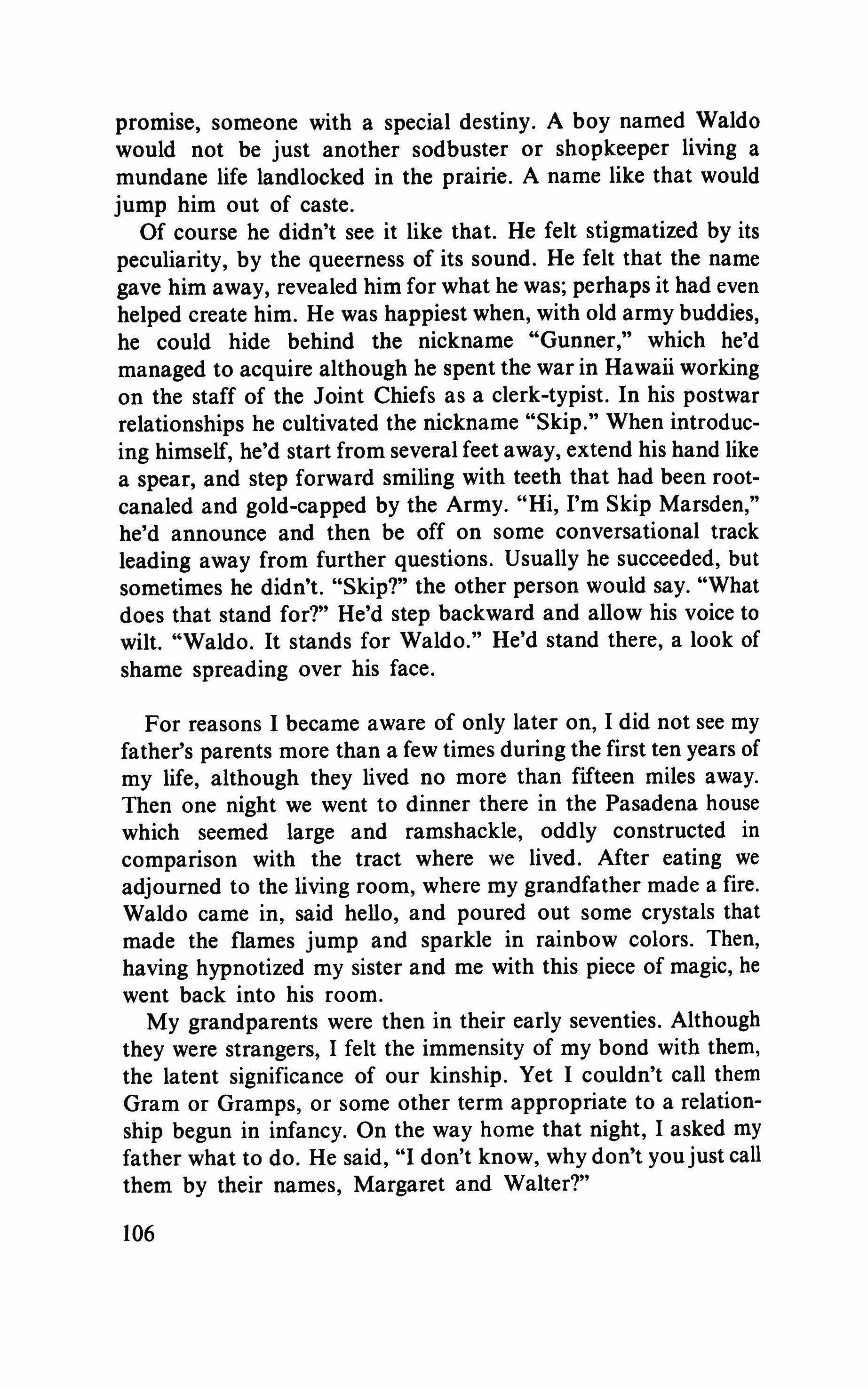
promise, someone with a special destiny. A boy named Waldo would not be just another sodbuster or shopkeeper living a mundane life landlocked in the prairie. A name like that would jump him out of caste.
Of course he didn't see it like that. He felt stigmatized by its peculiarity, by the queerness of its sound. He felt that the name gave him away, revealed him for what he was; perhaps it had even helped create him. He was happiest when, with old army buddies, he could hide behind the nickname "Gunner," which he'd managed to acquire although he spent the war in Hawaii working on the staff of the Joint Chiefs as a clerk-typist. In his postwar relationships he cultivated the nickname "Skip." When introducing himself, he'd start from several feet away, extend his hand like a spear, and step forward smiling with teeth that had been rootcanaled and gold-capped by the Army. "Hi, I'm Skip Marsden," he'd announce and then be off on some conversational track leading away from further questions. Usually he succeeded, but sometimes he didn't. "Skip?" the other person would say. "What does that stand for?" He'd step backward and allow his voice to wilt. "Waldo. It stands for Waldo." He'd stand there, a look of shame spreading over his face.
For reasons I became aware of only later on, I did not see my father's parents more than a few times during the first ten years of my life, although they lived no more than fifteen miles away. Then one night we went to dinner there in the Pasadena house which seemed large and ramshackle, oddly constructed in comparison with the tract where we lived. After eating we adjourned to the living room, where my grandfather made a fire. Waldo came in, said hello, and poured out some crystals that made the flames jump and sparkle in rainbow colors. Then, having hypnotized my sister and me with this piece of magic, he went back into his room.
My grandparents were then in their early seventies. Although they were strangers, 1 felt the immensity of my bond with them, the latent significance of our kinship. Yet 1 couldn't call them Gram or Gramps, or some other term appropriate to a relationship begun in infancy. On the way home that night, 1 asked my father what to do. He said, "I don't know, why don't youjust call them by their names, Margaret and Walter?"
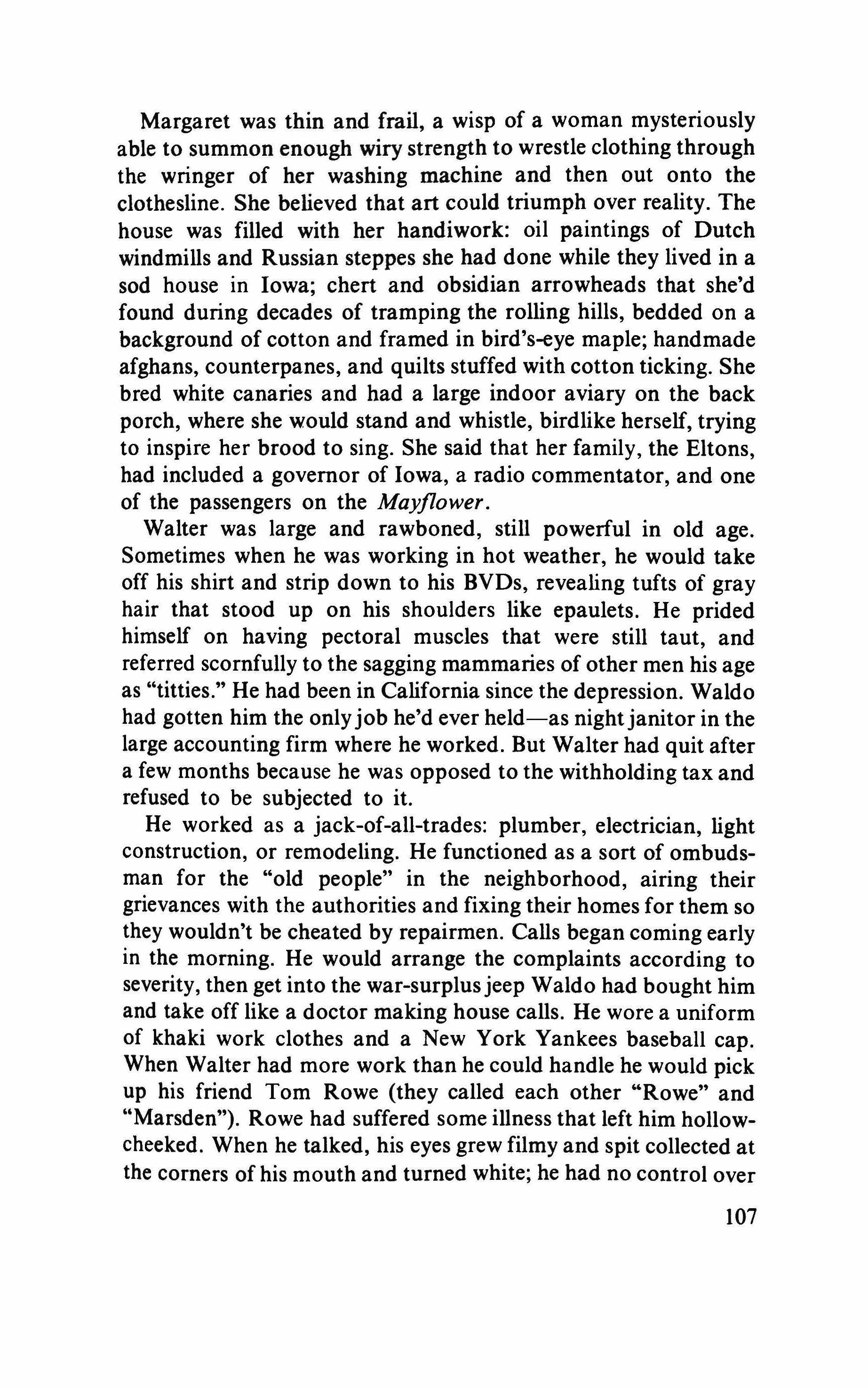
Margaret was thin and frail, a wisp of a woman mysteriously able to summon enough wiry strength to wrestle clothing through the wringer of her washing machine and then out onto the clothesline. She believed that art could triumph over reality. The house was filled with her handiwork: oil paintings of Dutch windmills and Russian steppes she had done while they lived in a sod house in Iowa; chert and obsidian arrowheads that she'd found during decades of tramping the rolling hills, bedded on a background of cotton and framed in bird's-eye maple; handmade afghans, counterpanes, and quilts stuffed with cotton ticking. She bred white canaries and had a large indoor aviary on the back porch, where she would stand and whistle, birdlike herself, trying to inspire her brood to sing. She said that her family, the Eltons, had included a governor of Iowa, a radio commentator, and one of the passengers on the Mayflower.
Walter was large and rawboned, still powerful in old age. Sometimes when he was working in hot weather, he would take off his shirt and strip down to his BVDs, revealing tufts of gray hair that stood up on his shoulders like epaulets. He prided himself on having pectoral muscles that were still taut, and referred scornfully to the sagging mammaries of other men his age as "titties." He had been in California since the depression. Waldo had gotten him the onlyjob he'd ever held-as nightjanitor in the large accounting firm where he worked. But Walter had quit after a few months because he was opposed to the withholding tax and refused to be subjected to it.
He worked as a jack-of-all-trades: plumber, electrician, light construction, or remodeling. He functioned as a sort of ombudsman for the "old people" in the neighborhood, airing their grievances with the authorities and fixing their homes for them so they wouldn't be cheated by repairmen. Calls began coming early in the morning. He would arrange the complaints according to severity, then get into the war-surplusjeep Waldo had bought him and take off like a doctor making house calls. He wore a uniform of khaki work clothes and a New York Yankees baseball cap. When Walter had more work than he could handle he would pick up his friend Tom Rowe (they called each other "Rowe" and "Marsden"). Rowe had suffered some illness that left him hollowcheeked. When he talked, his eyes grew filmy and spit collected at the comers of his mouth and turned white; he had no control over
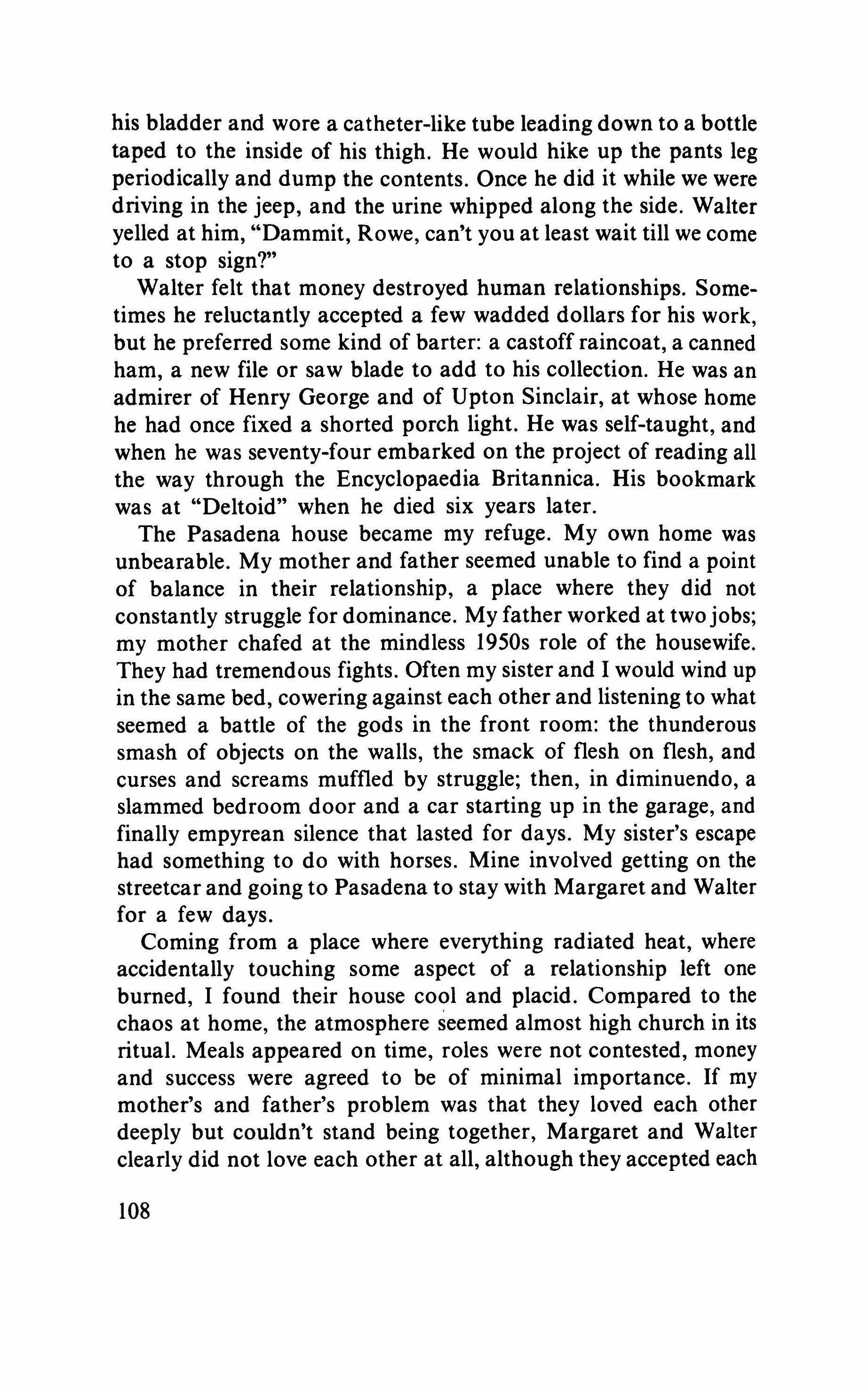
his bladder and wore a catheter-like tube leading down to a bottle taped to the inside of his thigh. He would hike up the pants leg periodically and dump the contents. Once he did it while we were driving in the jeep, and the urine whipped along the side. Walter yelled at him, "Dammit, Rowe, can't you at least wait till we come to a stop sign?"
Walter felt that money destroyed human relationships. Sometimes he reluctantly accepted a few wadded dollars for his work, but he preferred some kind of barter: a castoff raincoat, a canned ham, a new file or saw blade to add to his collection. He was an admirer of Henry George and of Upton Sinclair, at whose home he had once fixed a shorted porch light. He was self-taught, and when he was seventy-four embarked on the project of reading all the way through the Encyclopaedia Britannica. His bookmark was at "Deltoid" when he died six years later.
The Pasadena house became my refuge. My own home was unbearable. My mother and father seemed unable to find a point of balance in their relationship, a place where they did not constantly struggle for dominance. My father worked at two jobs; my mother chafed at the mindless 1950s role of the housewife. They had tremendous fights. Often my sister and I would wind up in the same bed, cowering against each other and listening to what seemed a battle of the gods in the front room: the thunderous smash of objects on the walls, the smack of flesh on flesh, and curses and screams muffled by struggle; then, in diminuendo, a slammed bedroom door and a car starting up in the garage, and finally empyrean silence that lasted for days. My sister's escape had something to do with horses. Mine involved getting on the streetcar and going to Pasadena to stay with Margaret and Walter for a few days.
Coming from a place where everything radiated heat, where accidentally touching some aspect of a relationship left one burned, I found their house cool and placid. Compared to the chaos at home, the atmosphere seemed almost high church in its ritual. Meals appeared on time, roles were not contested, money and success were agreed to be of minimal importance. If my mother's and father's problem was that they loved each other deeply but couldn't stand being together, Margaret and Walter clearly did not love each other at all, although they accepted each
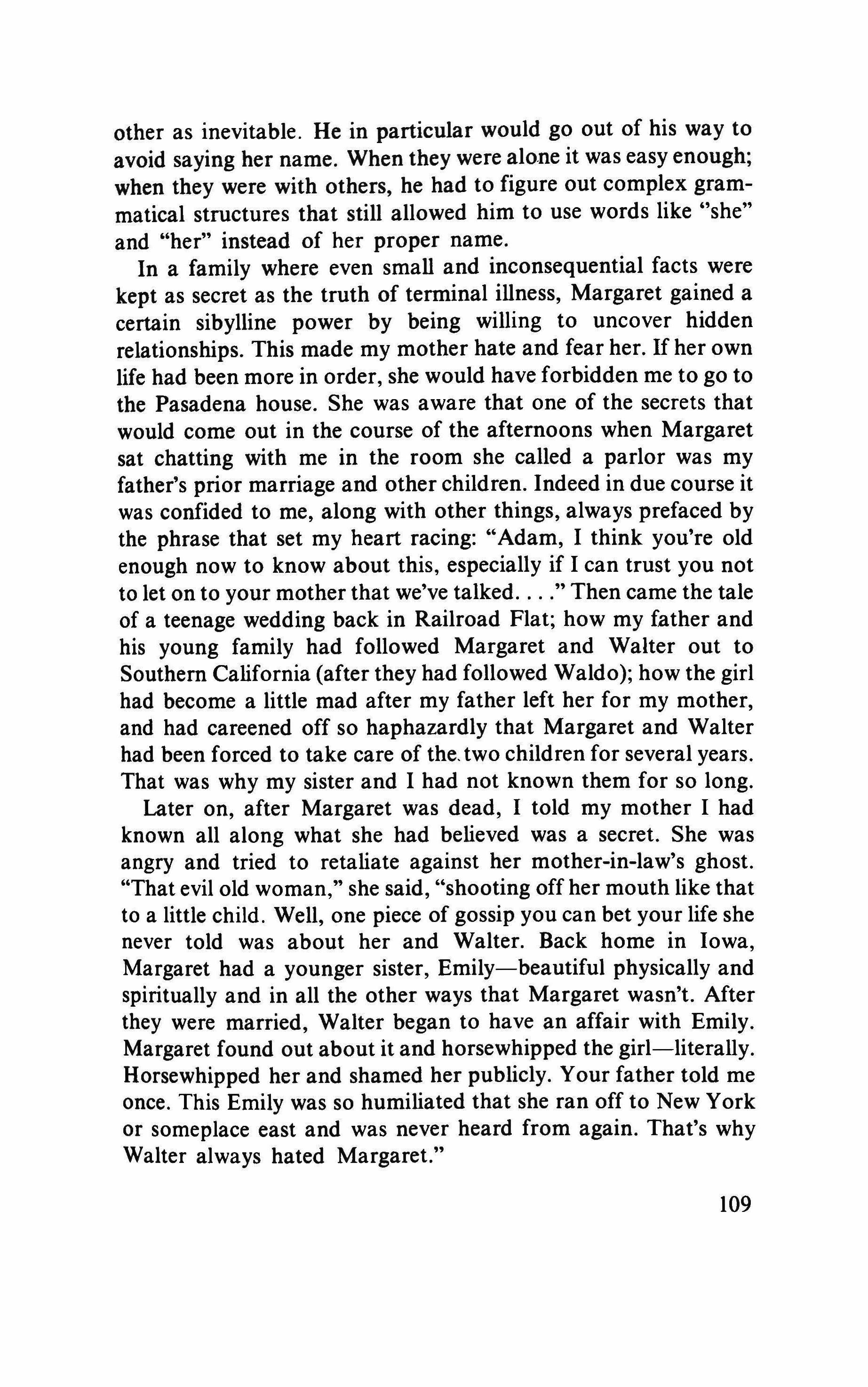
other as inevitable. He in particular would go out of his way to avoid saying her name. When they were alone it was easy enough; when they were with others, he had to figure out complex grammatical structures that still allowed him to use words like "she" and "her" instead of her proper name.
In a family where even small and inconsequential facts were kept as secret as the truth of terminal illness, Margaret gained a certain sibylline power by being willing to uncover hidden relationships. This made my mother hate and fear her. If her own life had been more in order, she would have forbidden me to go to the Pasadena house. She was aware that one of the secrets that would come out in the course of the afternoons when Margaret sat chatting with me in the room she called a parlor was my father's prior marriage and other children. Indeed in due course it was confided to me, along with other things, always prefaced by the phrase that set my heart racing: "Adam, I think you're old enough now to know about this, especially if I can trust you not to let on to your mother that we've talked Then came the tale of a teenage wedding back in Railroad Flat; how my father and his young family had followed Margaret and Walter out to Southern California (after they had followed Waldo); how the girl had become a little mad after my father left her for my mother, and had careened off so haphazardly that Margaret and Walter had been forced to take care of the. two children for several years. That was why my sister and I had not known them for so long. Later on, after Margaret was dead, I told my mother I had known all along what she had believed was a secret. She was angry and tried to retaliate against her mother-in-Iaw's ghost. "That evil old woman," she said, "shooting off her mouth like that to a little child. Well, one piece of gossip you can bet your life she never told was about her and Walter. Back home in Iowa, Margaret had a younger sister, Emily-beautiful physically and spiritually and in all the other ways that Margaret wasn't. After they were married, Walter began to have an affair with Emily. Margaret found out about it and horsewhipped the girl-literally. Horsewhipped her and shamed her publicly. Your father told me once. This Emily was so humiliated that she ran off to New York or someplace east and was never heard from again. That's why Walter always hated Margaret."
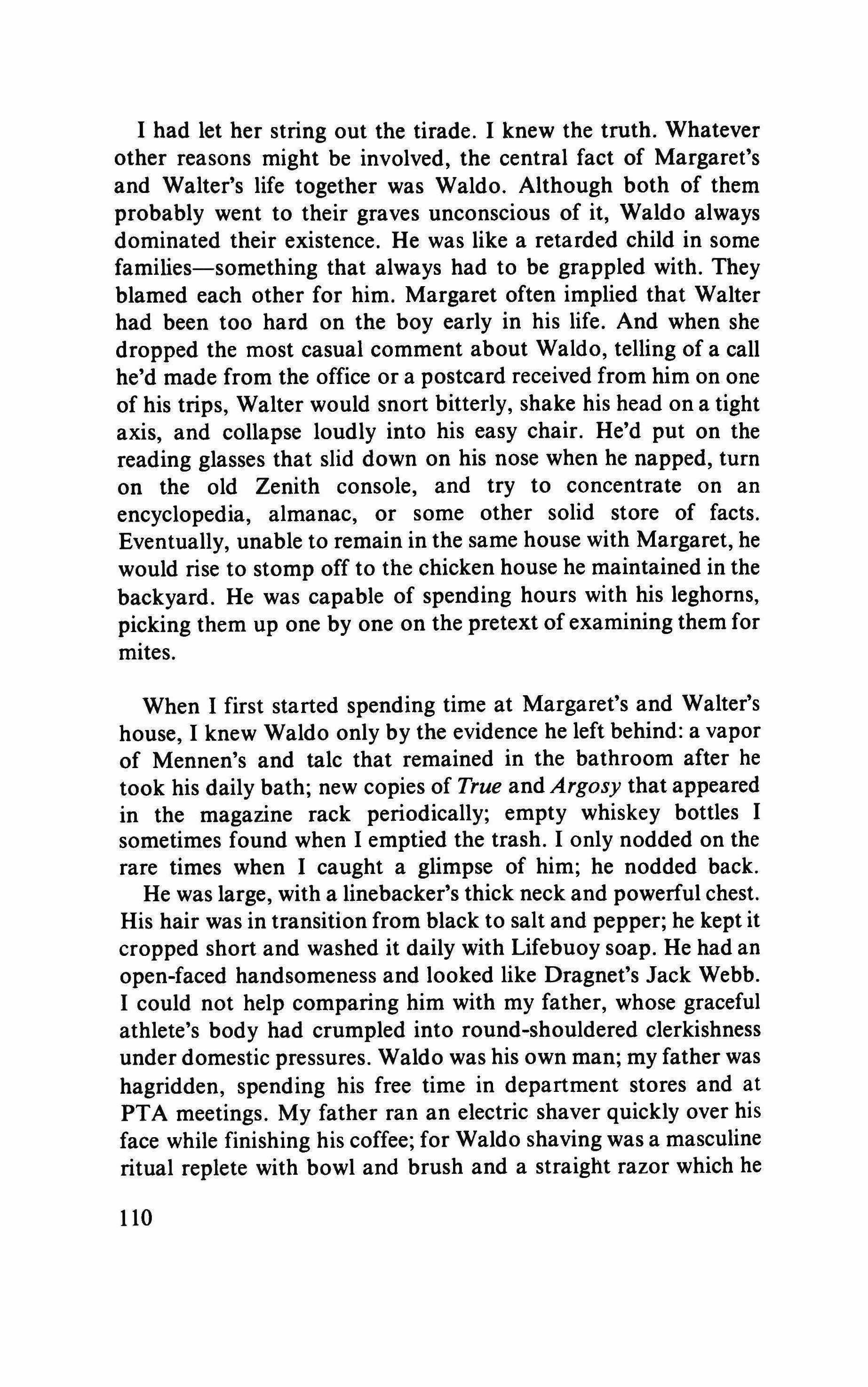
I had let her string out the tirade. I knew the truth. Whatever other reasons might be involved, the central fact of Margaret's and Walter's life together was Waldo. Although both of them probably went to their graves unconscious of it, Waldo always dominated their existence. He was like a retarded child in some families-something that always had to be grappled with. They blamed each other for him. Margaret often implied that Walter had been too hard on the boy early in his life. And when she dropped the most casual comment about Waldo, telling of a call he'd made from the office or a postcard received from him on one of his trips, Walter would snort bitterly, shake his head on a tight axis, and collapse loudly into his easy chair. He'd put on the reading glasses that slid down on his nose when he napped, turn on the old Zenith console, and try to concentrate on an encyclopedia, almanac, or some other solid store of facts. Eventually, unable to remain in the same house with Margaret, he would rise to stomp off to the chicken house he maintained in the backyard. He was capable of spending hours with his leghorns, picking them up one by one on the pretext of examining them for mites.
When I first started spending time at Margaret's and Walter's house, I knew Waldo only by the evidence he left behind: a vapor of Mennen's and talc that remained in the bathroom after he took his daily bath; new copies of True and Argosy that appeared in the magazine rack periodically; empty whiskey bottles I sometimes found when I emptied the trash. I only nodded on the rare times when I caught a glimpse of him; he nodded back. He was large, with a linebacker's thick neck and powerful chest. His hair was in transition from black to salt and pepper; he kept it cropped short and washed it daily with Lifebuoy soap. He had an open-faced handsomeness and looked like Dragnet's Jack Webb. I could not help comparing him with my father, whose graceful athlete's body had crumpled into round-shouldered clerkishness under domestic pressures. Waldo was his own man; my father was hagridden, spending his free time in department stores and at PTA meetings. My father ran an electric shaver quickly over his face while finishing his coffee; for Waldo shaving was a masculine ritual replete with bowl and brush and a straight razor which he
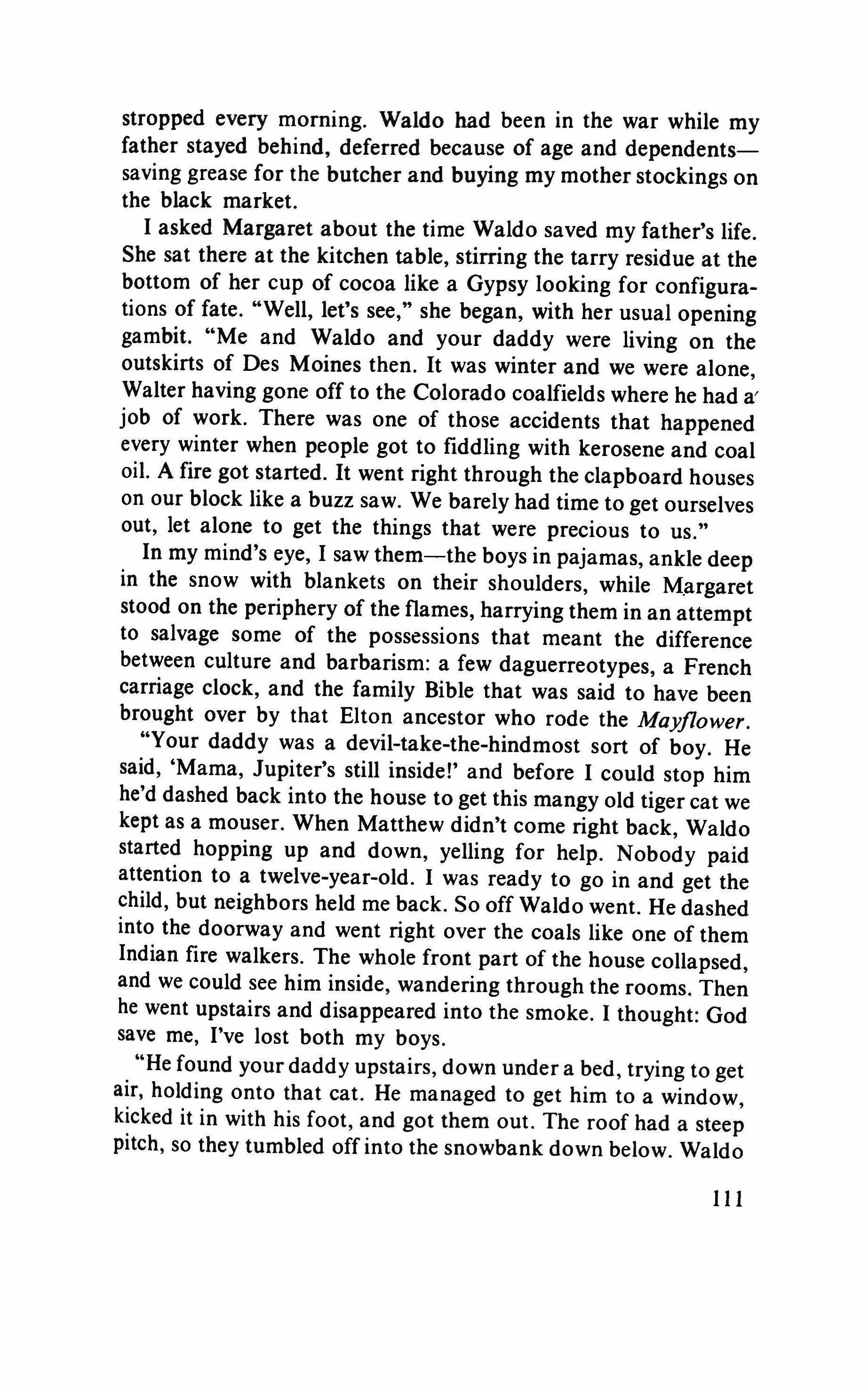
stropped every morning. Waldo had been in the war while my father stayed behind, deferred because of age and dependentssaving grease for the butcher and buying my mother stockings on the black market.
I asked Margaret about the time Waldo saved my father's life. She sat there at the kitchen table, stirring the tarry residue at the bottom of her cup of cocoa like a Gypsy looking for configurations of fate. "Well, let's see," she began, with her usual opening gambit. "Me and Waldo and your daddy were living on the outskirts of Des Moines then. It was winter and we were alone, Walter having gone off to the Colorado coalfields where he had at job of work. There was one of those accidents that happened every winter when people got to fiddling with kerosene and coal oil. A fire got started. It went right through the clapboard houses on our block like a buzz saw. We barely had time to get ourselves out, let alone to get the things that were precious to us."
In my mind's eye, I saw them-the boys in pajamas, ankle deep in the snow with blankets on their shoulders, while Margaret stood on the periphery of the flames, harrying them in an attempt to salvage some of the possessions that meant the difference between culture and barbarism: a few daguerreotypes, a French carriage clock, and the family Bible that was said to have been brought over by that Elton ancestor who rode the Mayflower.
"Your daddy was a devil-take-the-hindmost sort of boy. He said, 'Mama, Jupiter's still inside!' and before I could stop him he'd dashed back into the house to get this mangy old tiger cat we kept as a mouser. When Matthew didn't come right back, Waldo started hopping up and down, yelling for help. Nobody paid attention to a twelve-year-old. I was ready to go in and get the child, but neighbors held me back. So off Waldo went. He dashed into the doorway and went right over the coals like one of them Indian fire walkers. The whole front part of the house collapsed, and we could see him inside, wandering through the rooms. Then he went upstairs and disappeared into the smoke. I thought: God save me, I've lost both my boys.
"He found your daddy upstairs, down under a bed, trying to get air, holding onto that cat. He managed to get him to a window, kicked it in with his foot, and got them out. The roof had a steep pitch, so they tumbled off into the snowbank down below. Waldo
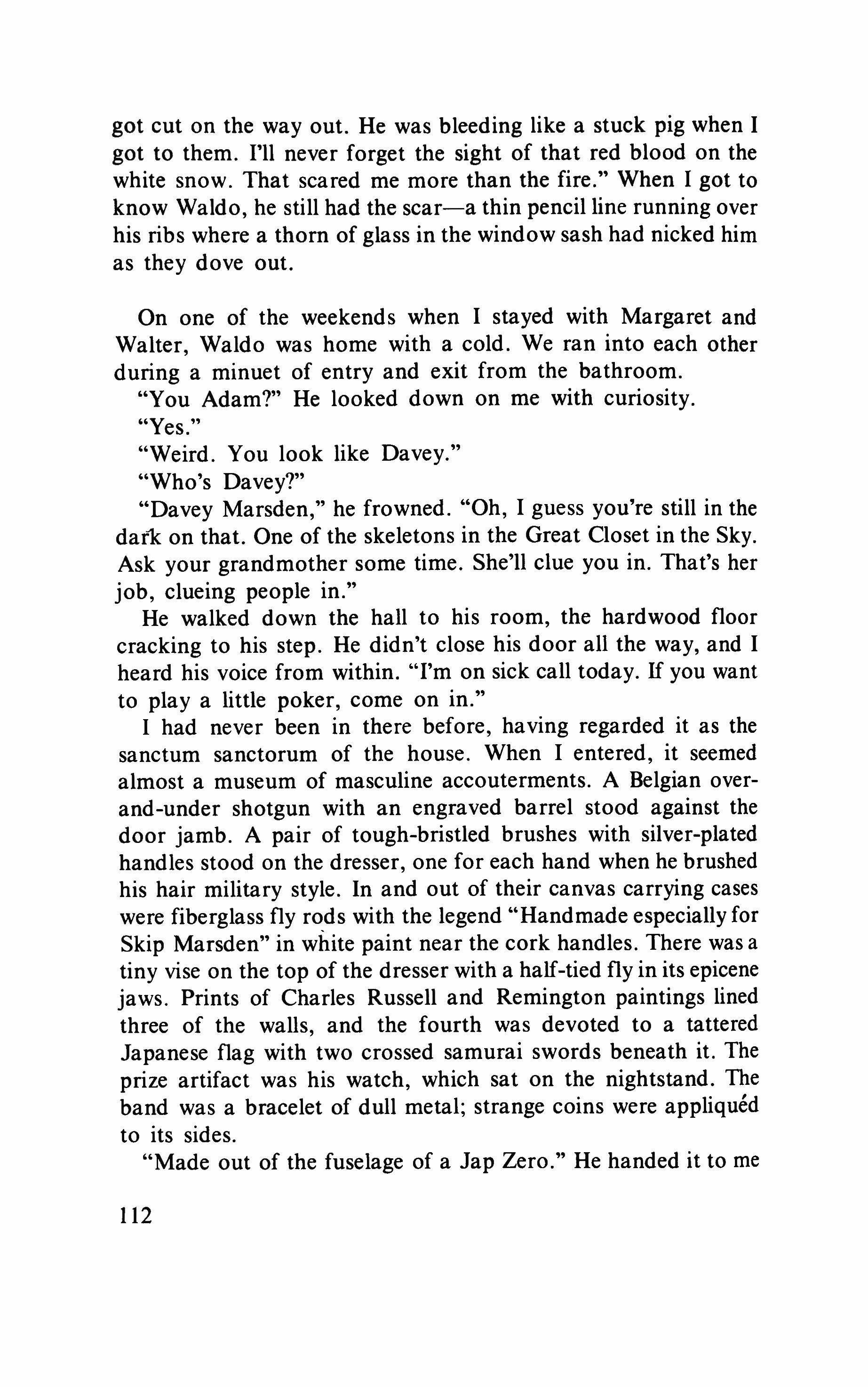
got cut on the way out. He was bleeding like a stuck pig when I got to them. I'll never forget the sight of that red blood on the white snow. That scared me more than the fire." When I got to know Waldo, he still had the scar-a thin pencil line running over his ribs where a thorn of glass in the window sash had nicked him as they dove out.
On one of the weekends when I stayed with Margaret and Walter, Waldo was home with a cold. We ran into each other during a minuet of entry and exit from the bathroom.
"You Adam?" He looked down on me with curiosity.
"Yes."
"Weird. You look like Davey."
"Who's Davey?"
"Davey Marsden," he frowned. "Oh, I guess you're still in the dark on that. One of the skeletons in the Great Closet in the Sky. Ask your grandmother some time. She'll clue you in. That's her job, clueing people in."
He walked down the hall to his room, the hardwood floor cracking to his step. He didn't close his door all the way, and I heard his voice from within. "I'm on sick call today. If you want to playa little poker, come on in."
I had never been in there before, having regarded it as the sanctum sanctorum of the house. When I entered, it seemed almost a museum of masculine accouterments. A Belgian overand-under shotgun with an engraved barrel stood against the door jamb. A pair of tough-bristled brushes with silver-plated handles stood on the dresser, one for each hand when he brushed his hair military style. In and out of their canvas carrying cases were fiberglass fly rods with the legend "Handmade especially for Skip Marsden" in white paint near the cork handles. There was a tiny vise on the top of the dresser with a half-tied fly in its epicene jaws. Prints of Charles Russell and Remington paintings lined three of the walls, and the fourth was devoted to a tattered Japanese flag with two crossed samurai swords beneath it. The prize artifact was his watch, which sat on the nightstand. The band was a bracelet of dull metal; strange coins were appliqued to its sides.
"Made out of the fuselage of a Jap Zero." He handed it to me
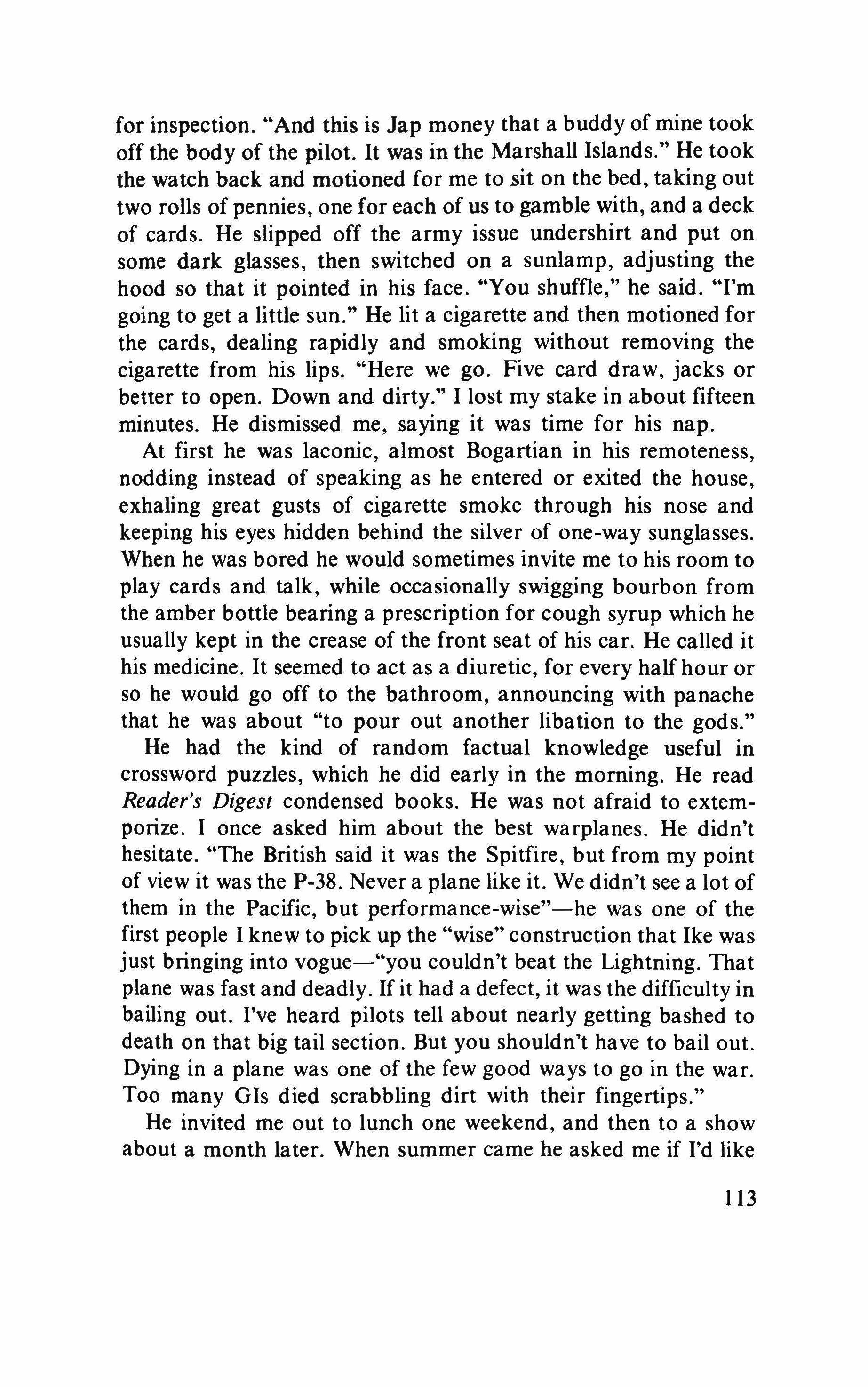
for inspection. "And this is Jap money that a buddy of mine took off the body of the pilot. It was in the Marshall Islands." He took the watch back and motioned for me to sit on the bed, taking out two rolls of pennies, one for each of us to gamble with, and a deck of cards. He slipped off the army issue undershirt and put on some dark glasses, then switched on a sunlamp, adjusting the hood so that it pointed in his face. "You shuffle," he said. "I'm going to get a little sun." He lit a cigarette and then motioned for the cards, dealing rapidly and smoking without removing the cigarette from his lips. "Here we go. Five card draw, jacks or better to open. Down and dirty." I lost my stake in about fifteen minutes. He dismissed me, saying it was time for his nap.
At first he was laconic, almost Bogartian in his remoteness, nodding instead of speaking as he entered or exited the house, exhaling great gusts of cigarette smoke through his nose and keeping his eyes hidden behind the silver of one-way sunglasses. When he was bored he would sometimes invite me to his room to play cards and talk, while occasionally swigging bourbon from the amber bottle bearing a prescription for cough syrup which he usually kept in the crease of the front seat of his car. He called it his medicine. It seemed to act as a diuretic, for every half hour or so he would go off to the bathroom, announcing with panache that he was about "to pour out another libation to the gods."
He had the kind of random factual knowledge useful in crossword puzzles, which he did early in the morning. He read Reader's Digest condensed books. He was not afraid to extemporize. I once asked him about the best warplanes. He didn't hesitate. "The British said it was the Spitfire, but from my point of view it was the P-38. Never a plane like it. We didn't see a lot of them in the Pacific, but performance-wise"-he was one of the first people I knew to pick up the "wise" construction that Ike was just bringing into vogue-"you couldn't beat the Lightning. That plane was fast and deadly. If it had a defect, it was the difficulty in bailing out. I've heard pilots tell about nearly getting bashed to death on that big tail section. But you shouldn't have to bailout. Dying in a plane was one of the few good ways to go in the war. Too many GIs died scrabbling dirt with their fingertips."
He invited me out to lunch one weekend, and then to a show about a month later. When summer came he asked me if I'd like
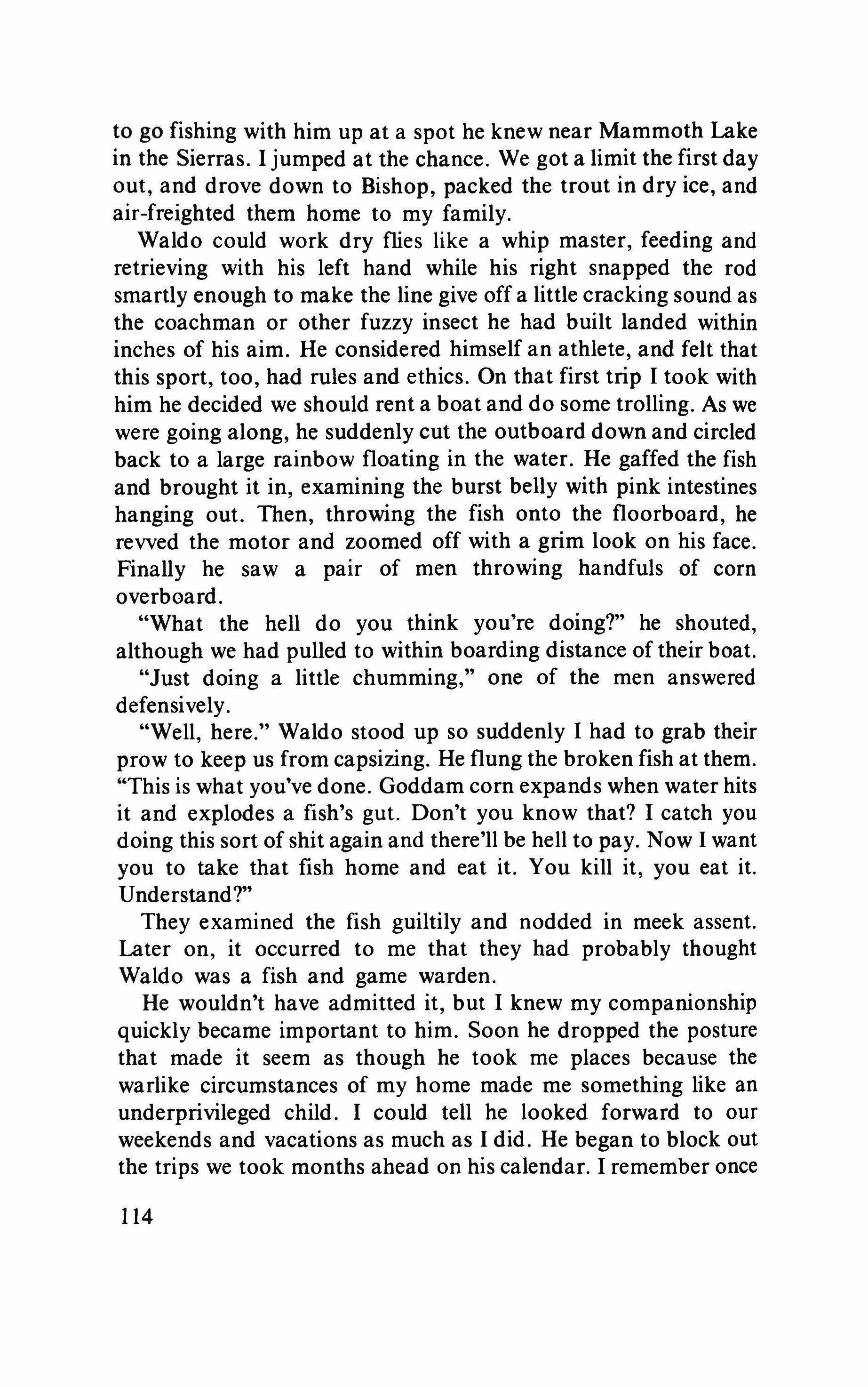
to go fishing with him up at a spot he knew near Mammoth Lake in the Sierras. I jumped at the chance. We got a limit the first day out, and drove down to Bishop, packed the trout in dry ice, and air-freighted them home to my family.
Waldo could work dry flies like a whip master, feeding and retrieving with his left hand while his right snapped the rod smartly enough to make the line give off a little cracking sound as the coachman or other fuzzy insect he had built landed within inches of his aim. He considered himself an athlete, and felt that this sport, too, had rules and ethics. On that first trip I took with him he decided we should rent a boat and do some trolling. As we were going along, he suddenly cut the outboard down and circled back to a large rainbow floating in the water. He gaffed the fish and brought it in, examining the burst belly with pink intestines hanging out. Then, throwing the fish onto the floorboard, he revved the motor and zoomed off with a grim look on his face. Finally he saw a pair of men throwing handfuls of corn overboard.
"What the hell do you think you're doing?" he shouted, although we had pulled to within boarding distance of their boat.
"Just doing a little chumming," one of the men answered defensively.
"Well, here." Waldo stood up so suddenly I had to grab their prow to keep us from capsizing. He flung the broken fish at them. "This is what you've done. Goddam corn expands when water hits it and explodes a fish's gut. Don't you know that? I catch you doing this sort of shit again and there'll be hell to pay. Now I want you to take that fish home and eat it. You kill it, you eat it. Understand?"
They examined the fish guiltily and nodded in meek assent. Later on, it occurred to me that they had probably thought Waldo was a fish and game warden.
He wouldn't have admitted it, but I knew my companionship quickly became important to him. Soon he dropped the posture that made it seem as though he took me places because the warlike circumstances of my home made me something like an underprivileged child. I could tell he looked forward to our weekends and vacations as much as I did. He began to block out the trips we took months ahead on his calendar. I remember once
114
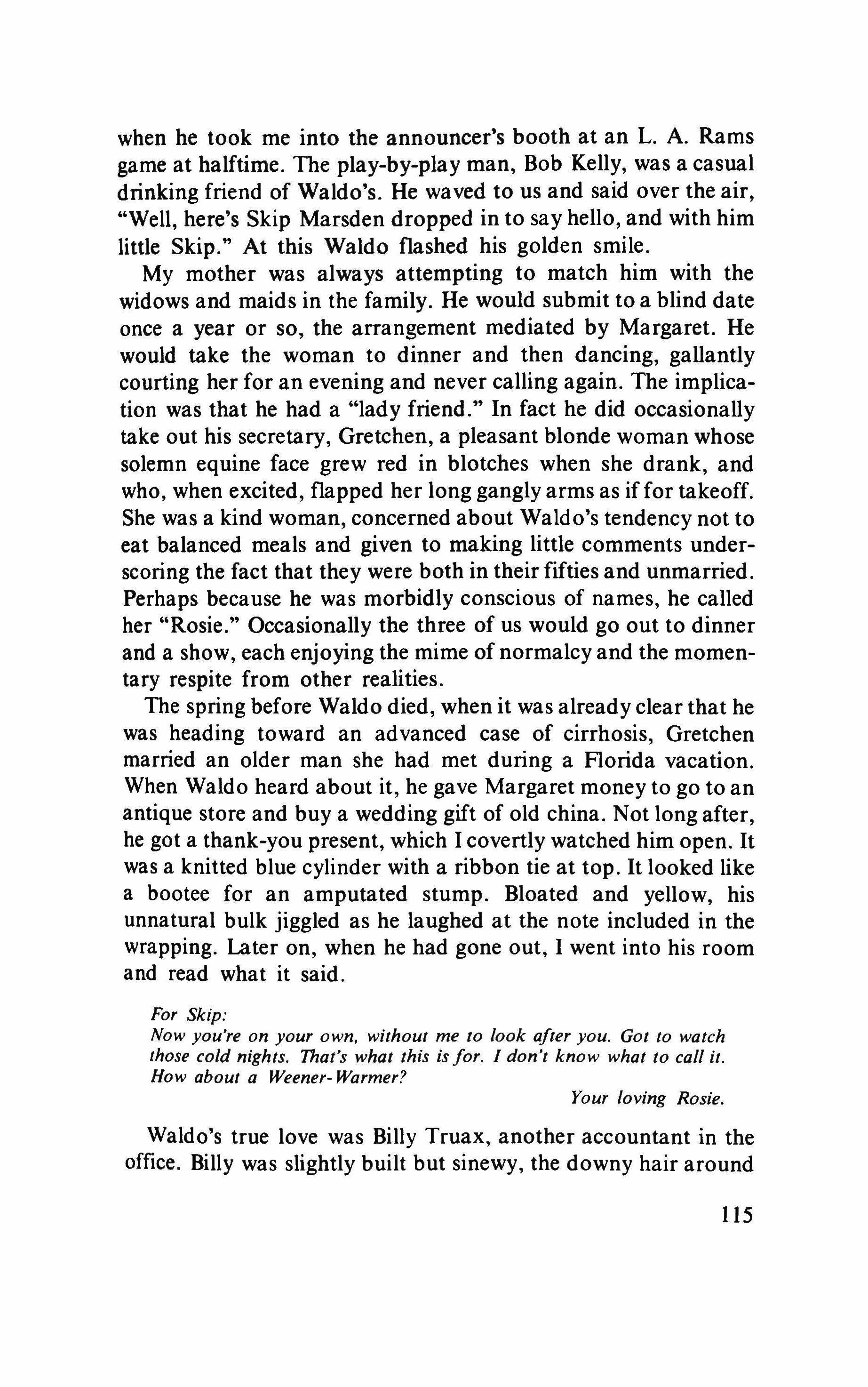
when he took me into the announcer's booth at an L. A. Rams game at halftime. The play-by-play man, Bob Kelly, was a casual drinking friend of Waldo's. He waved to us and said over the air, "Well, here's Skip Marsden dropped in to say hello, and with him little Skip." At this Waldo flashed his golden smile.
My mother was always attempting to match him with the widows and maids in the family. He would submit to a blind date once a year or so, the arrangement mediated by Margaret. He would take the woman to dinner and then dancing, gallantly courting her for an evening and never calling again. The implication was that he had a "lady friend." In fact he did occasionally take out his secretary, Gretchen, a pleasant blonde woman whose solemn equine face grew red in blotches when she drank, and who, when excited, flapped her long gangly arms as if for takeoff. She was a kind woman, concerned about Waldo's tendency not to eat balanced meals and given to making little comments underscoring the fact that they were both in their fifties and unmarried. Perhaps because he was morbidly conscious of names, he called her "Rosie." Occasionally the three of us would go out to dinner and a show, each enjoying the mime of normalcy and the momentary respite from other realities.
The spring before Waldo died, when it was already clear that he was heading toward an advanced case of cirrhosis, Gretchen married an older man she had met during a Florida vacation. When Waldo heard about it, he gave Margaret money to go to an antique store and buy a wedding gift of old china. Not long after, he got a thank-you present, which I covertly watched him open. It was a knitted blue cylinder with a ribbon tie at top. It looked like a bootee for an amputated stump. Bloated and yellow, his unnatural bulk jiggled as he laughed at the note included in the wrapping. Later on, when he had gone out, I went into his room and read what it said.
For Skip:
Now you're on your own, without me to look after you. Got to watch those cold nights. That's what this is for. I don't know what to call it. How about a Weener- Warmer?
Your loving Rosie.
Waldo's true love was Billy Truax, another accountant in the office. Billy was slightly built but sinewy, the downy hair around
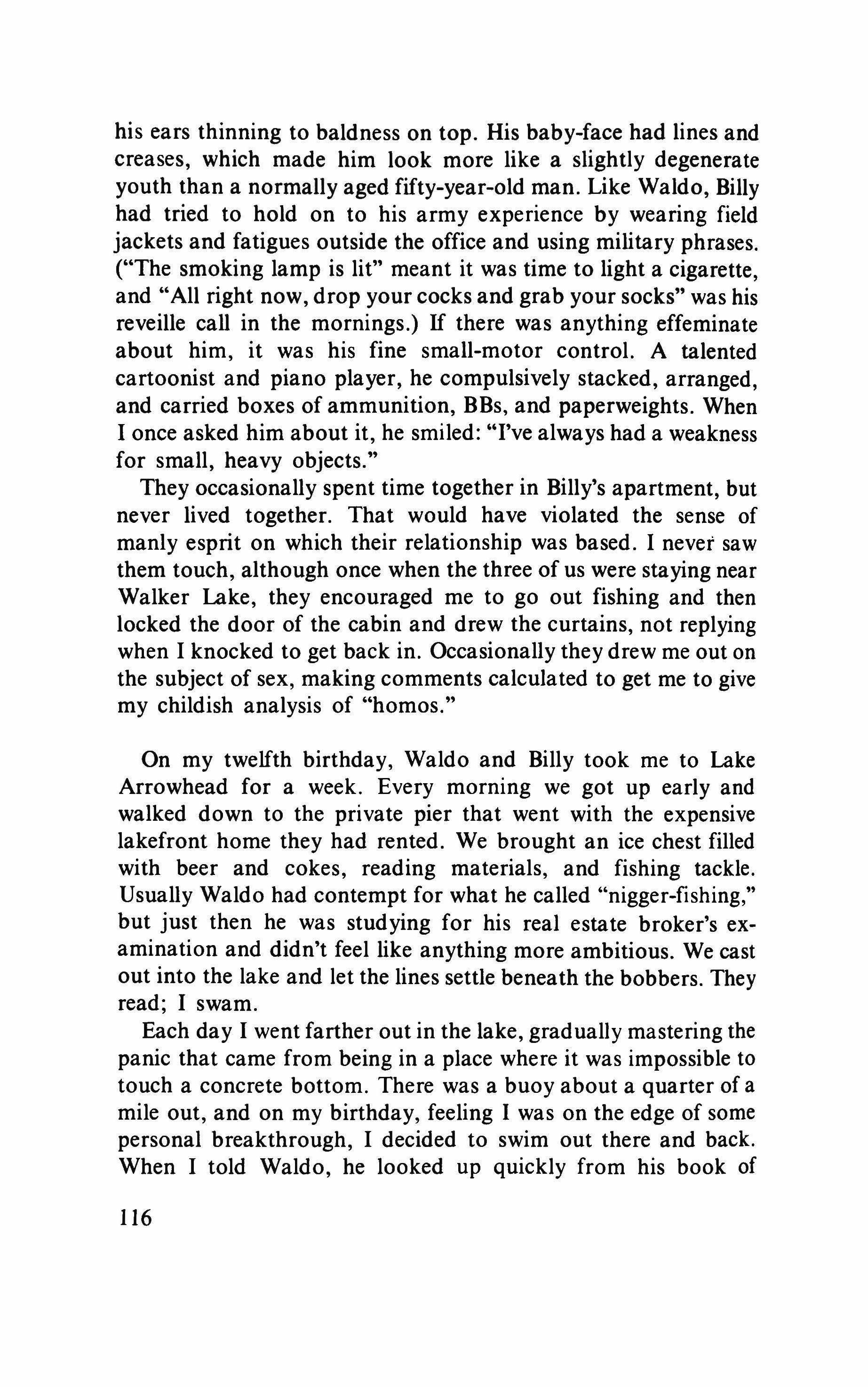
his ears thinning to baldness on top. His baby-face had lines and creases, which made him look more like a slightly degenerate youth than a normally aged fifty-year-old man. Like Waldo, Billy had tried to hold on to his army experience by wearing field jackets and fatigues outside the office and using military phrases. ("The smoking lamp is lit" meant it was time to light a cigarette, and "All right now, drop your cocks and grab your socks" was his reveille call in the mornings.) If there was anything effeminate about him, it was his fine small-motor control. A talented cartoonist and piano player, he compulsively stacked, arranged, and carried boxes of ammunition, BBs, and paperweights. When I once asked him about it, he smiled: "I've always had a weakness for small, heavy objects."
They occasionally spent time together in Billy's apartment, but never lived together. That would have violated the sense of manly esprit on which their relationship was based. I never saw them touch, although once when the three of us were staying near Walker Lake, they encouraged me to go out fishing and then locked the door of the cabin and drew the curtains, not replying when I knocked to get back in. Occasionally they drew me out on the subject of sex, making comments calculated to get me to give my childish analysis of "homos."
On my twelfth birthday, Waldo and Billy took me to Lake Arrowhead for a week. Every morning we got up early and walked down to the private pier that went with the expensive lakefront home they had rented. We brought an ice chest filled with beer and cokes, reading materials, and fishing tackle. Usually Waldo had contempt for what he called "nigger-fishing," but just then he was studying for his real estate broker's examination and didn't feel like anything more ambitious. We cast out into the lake and let the lines settle beneath the bobbers. They read; I swam.
Each day I went farther out in the lake, gradually mastering the panic that came from being in a place where it was impossible to touch a concrete bottom. There was a buoy about a quarter of a mile out, and on my birthday, feeling I was on the edge of some personal breakthrough, I decided to swim out there and back. When I told Waldo, he looked up quickly from his book of
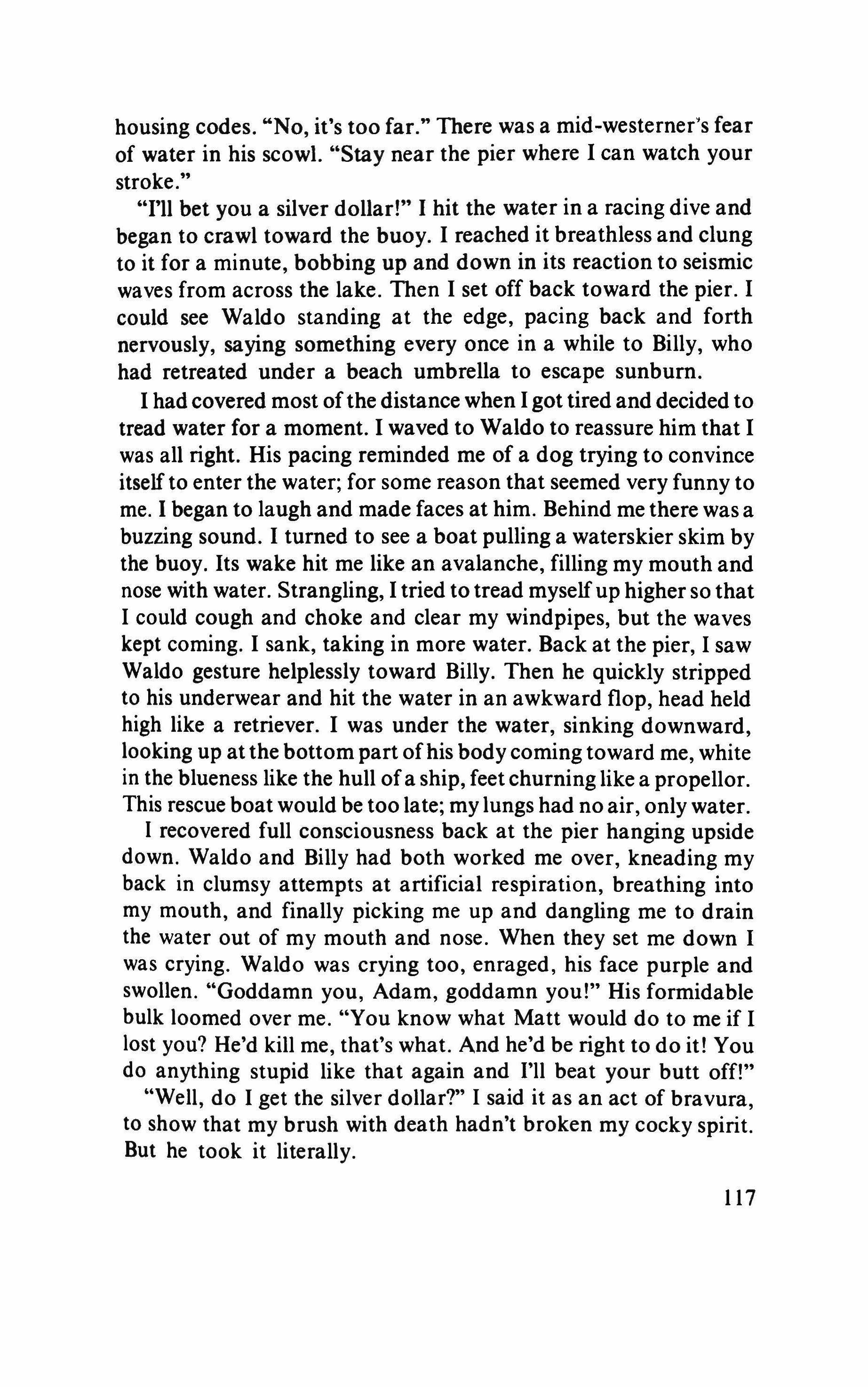
housing codes. "No, it's too far." There was a mid-westerner's fear of water in his scowl. "Stay near the pier where I can watch your stroke."
"I'll bet you a silver dollar!" I hit the water in a racing dive and began to crawl toward the buoy. I reached it breathless and clung to it for a minute, bobbing up and down in its reaction to seismic waves from across the lake. Then I set off back toward the pier. I could see Waldo standing at the edge, pacing back and forth nervously, saying something every once in a while to Billy, who had retreated under a beach umbrella to escape sunburn.
I had covered most ofthe distance when I got tired and decided to tread water for a moment. I waved to Waldo to reassure him that I was all right. His pacing reminded me of a dog trying to convince itself to enter the water; for some reason that seemed very funny to me. I began to laugh and made faces at him. Behind me there was a buzzing sound. I turned to see a boat pulling a waterskier skim by the buoy. Its wake hit me like an avalanche, filling my mouth and nose with water. Strangling, I tried to tread myself up higher so that I could cough and choke and clear my windpipes, but the waves kept coming. I sank, taking in more water. Back at the pier, I saw Waldo gesture helplessly toward Billy. Then he quickly stripped to his underwear and hit the water in an awkward flop, head held high like a retriever. I was under the water, sinking downward, looking up at the bottom part ofhis bodycoming toward me, white in the blueness like the hull of a ship, feet churning like a propellor. This rescue boat would be too late; my lungs had no air, only water.
I recovered full consciousness back at the pier hanging upside down. Waldo and Billy had both worked me over, kneading my back in clumsy attempts at artificial respiration, breathing into my mouth, and finally picking me up and dangling me to drain the water out of my mouth and nose. When they set me down I was crying. Waldo was crying too, enraged, his face purple and swollen. "Goddamn you, Adam, goddamn you!" His formidable bulk loomed over me. "You know what Matt would do to me if I lost you? He'd kill me, that's what. And he'd be right to do it! You do anything stupid like that again and I'll beat your butt off!"
"Well, do I get the silver dollar?" I said it as an act of bravura, to show that my brush with death hadn't broken my cocky spirit. But he took it literally.
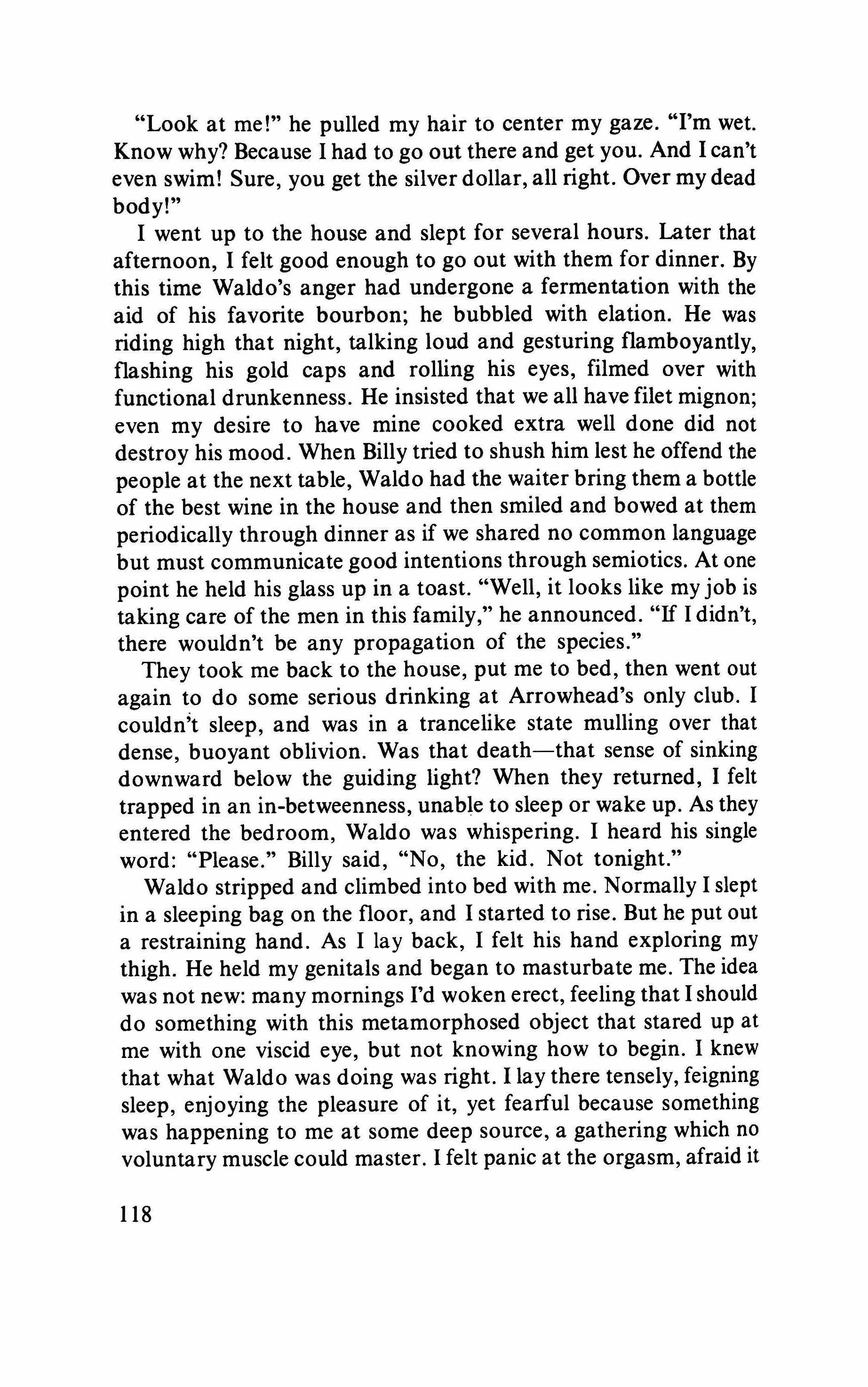
"Look at me!" he pulled my hair to center my gaze. "I'm wet. Know why? Because I had to go out there and get you. And I can't even swim! Sure, you get the silver dollar, all right. Over my dead body!"
I went up to the house and slept for several hours. Later that afternoon, I felt good enough to go out with them for dinner. By this time Waldo's anger had undergone a fermentation with the aid of his favorite bourbon; he bubbled with elation. He was riding high that night, talking loud and gesturing flamboyantly, flashing his gold caps and rolling his eyes, filmed over with functional drunkenness. He insisted that we all have filet mignon; even my desire to have mine cooked extra well done did not destroy his mood. When Billy tried to shush him lest he offend the people at the next table, Waldo had the waiter bring them a bottle of the best wine in the house and then smiled and bowed at them periodically through dinner as if we shared no common language but must communicate good intentions through semiotics. At one point he held his glass up in a toast. "Well, it looks like my job is taking care of the men in this family," he announced. "If I didn't, there wouldn't be any propagation of the species."
They took me back to the house, put me to bed, then went out again to do some serious drinking at Arrowhead's only club. I couldn't sleep, and was in a trancelike state mulling over that dense, buoyant oblivion. Was that death-that sense of sinking downward below the guiding light? When they returned, I felt trapped in an in-betweenness, unable to sleep or wake up. As they entered the bedroom, Waldo was whispering. I heard his single word: "Please." Billy said, "No, the kid. Not tonight."
Waldo stripped and climbed into bed with me. Normally I slept in a sleeping bag on the floor, and I started to rise. But he put out a restraining hand. As I lay back, I felt his hand exploring my thigh. He held my genitals and began to masturbate me. The idea was not new: many mornings I'd woken erect, feeling that I should do something with this metamorphosed object that stared up at me with one viscid eye, but not knowing how to begin. I knew that what Waldo was doing was right. I lay there tensely, feigning sleep, enjoying the pleasure of it, yet fearful because something was happening to me at some deep source, a gathering which no voluntary muscle could master. I felt panic at the orgasm, afraid it
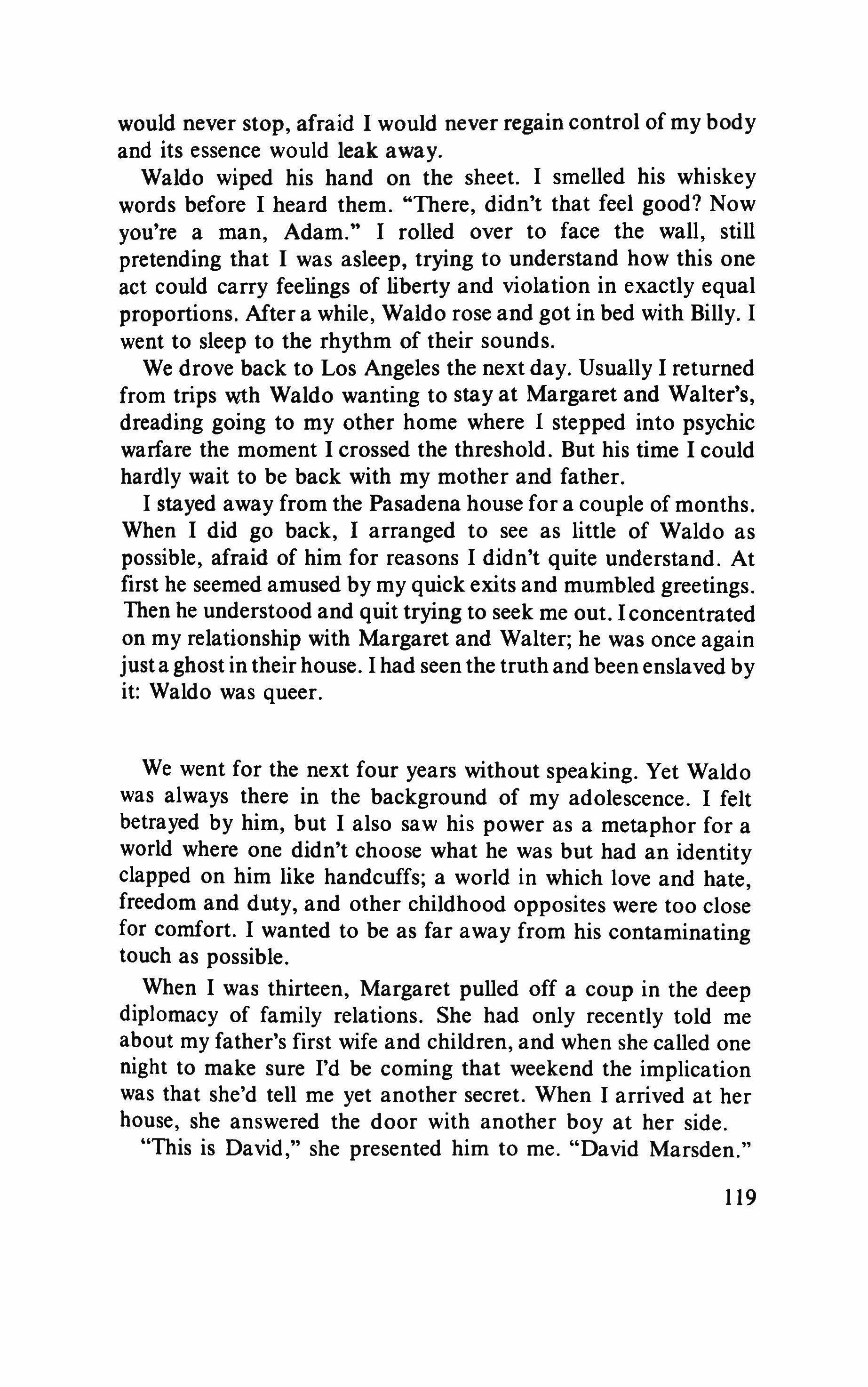
would never stop, afraid I would never regain control of my body and its essence would leak away.
Waldo wiped his hand on the sheet. I smelled his whiskey words before I heard them. "There, didn't that feel good? Now you're a man, Adam." I rolled over to face the wall, still pretending that I was asleep, trying to understand how this one act could carry feelings of liberty and violation in exactly equal proportions. After a while, Waldo rose and got in bed with Billy. I went to sleep to the rhythm of their sounds.
We drove back to Los Angeles the next day. Usually I returned from trips wth Waldo wanting to stay at Margaret and Walter's, dreading going to my other home where I stepped into psychic warfare the moment I crossed the threshold. But his time I could hardly wait to be back with my mother and father.
I stayed away from the Pasadena house for a couple of months. When I did go back, I arranged to see as little of Waldo as possible, afraid of him for reasons I didn't quite understand. At first he seemed amused by my quick exits and mumbled greetings. Then he understood and quit trying to seek me out. I concentrated on my relationship with Margaret and Walter; he was once again justaghost in their house. I had seen the truth and been enslaved by it: Waldo was queer.
We went for the next four years without speaking. Yet Waldo was always there in the background of my adolescence. I felt betrayed by him, but I also saw his power as a metaphor for a world where one didn't choose what he was but had an identity clapped on him like handcuffs; a world in which love and hate, freedom and duty, and other childhood opposites were too close for comfort. I wanted to be as far away from his contaminating touch as possible.
When I was thirteen, Margaret pulled off a coup in the deep diplomacy of family relations. She had only recently told me about my father's first wife and children, and when she called one night to make sure I'd be coming that weekend the implication was that she'd tell me yet another secret. When I arrived at her house, she answered the door with another boy at her side.
"This is David," she presented him to me. "David Marsden."
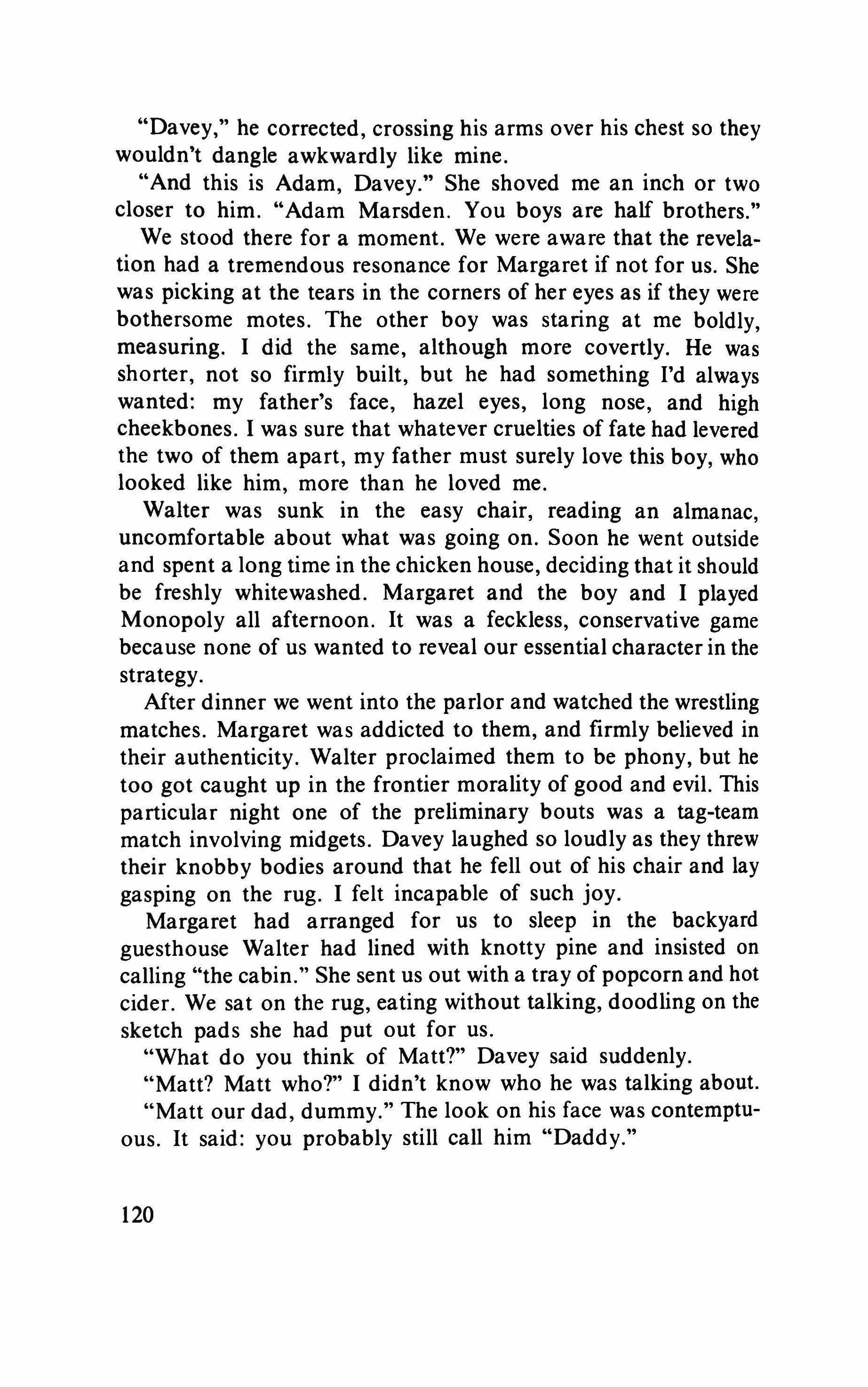
"Davey," he corrected, crossing his arms over his chest so they wouldn't dangle awkwardly like mine.
"And this is Adam, Davey." She shoved me an inch or two closer to him. "Adam Marsden. You boys are half brothers."
We stood there for a moment. We were aware that the revelation had a tremendous resonance for Margaret if not for us. She was picking at the tears in the corners of her eyes as if they were bothersome motes. The other boy was staring at me boldly, measuring. I did the same, although more covertly. He was shorter, not so firmly built, but he had something I'd always wanted: my father's face, hazel eyes, long nose, and high cheekbones. I was sure that whatever cruelties of fate had levered the two of them apart, my father must surely love this boy, who looked like him, more than he loved me.
Walter was sunk in the easy chair, reading an almanac, uncomfortable about what was going on. Soon he went outside and spent a long time in the chicken house, deciding that it should be freshly whitewashed. Margaret and the boy and I played Monopoly all afternoon. It was a feckless, conservative game because none of us wanted to reveal our essential character in the strategy.
After dinner we went into the parlor and watched the wrestling matches. Margaret was addicted to them, and firmly believed in their authenticity. Walter proclaimed them to be phony, but he too got caught up in the frontier morality of good and evil. This particular night one of the preliminary bouts was a tag-team match involving midgets. Davey laughed so loudly as they threw their knobby bodies around that he fell out of his chair and lay gasping on the rug. I felt incapable of such joy.
Margaret had arranged for us to sleep in the backyard guesthouse Walter had lined with knotty pine and insisted on calling "the cabin." She sent us out with a tray of popcorn and hot cider. We sat on the rug, eating without talking, doodling on the sketch pads she had put out for us.
"What do you think of Matt?" Davey said suddenly.
"Matt? Matt who?" I didn't know who he was talking about.
"Matt our dad, dummy." The look on his face was contemptuous. It said: you probably still call him "Daddy."
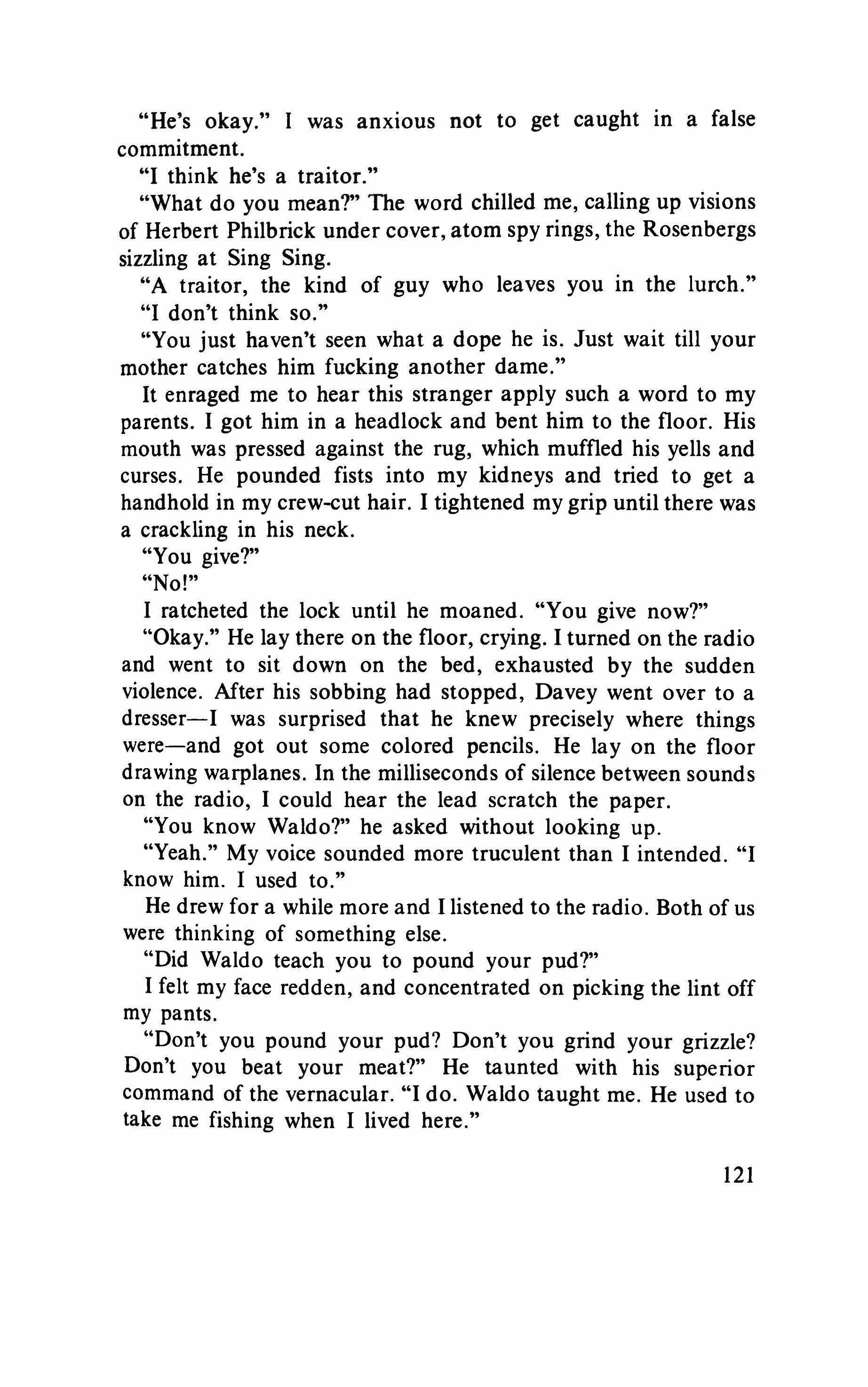
"He's okay." I was anxious not to get caught in a false commitment.
"I think he's a traitor."
"What do you mean?" The word chilled me, calling up visions of Herbert Philbrick under cover, atom spy rings, the Rosenbergs sizzling at Sing Sing.
"A traitor, the kind of guy who leaves you in the lurch."
"I don't think so."
"You just haven't seen what a dope he is. Just wait till your mother catches him fucking another dame."
It enraged me to hear this stranger apply such a word to my parents. I got him in a headlock and bent him to the floor. His mouth was pressed against the rug, which muffled his yells and curses. He pounded fists into my kidneys and tried to get a handhold in my crew-cut hair. I tightened my grip until there was a crackling in his neck.
"You give?"
"No'"
I ratcheted the lock until he moaned. "You give now?" "Okay." He lay there on the floor, crying. I turned on the radio and went to sit down on the bed, exhausted by the sudden violence. After his sobbing had stopped, Davey went over to a dresser-I was surprised that he knew precisely where things were-and got out some colored pencils. He lay on the floor drawing warplanes. In the milliseconds of silence between sounds on the radio, I could hear the lead scratch the paper.
"You know Waldo?" he asked without looking up.
"Yeah." My voice sounded more truculent than I intended. "I know him. I used to."
He drew for a while more and I listened to the radio. Both of us were thinking of something else.
"Did Waldo teach you to pound your pud?"
I felt my face redden, and concentrated on picking the lint off my pants.
"Don't you pound your pud? Don't you grind your grizzle? Don't you beat your meat?" He taunted with his superior command of the vernacular. "I do. Waldo taught me. He used to take me fishing when I lived here."
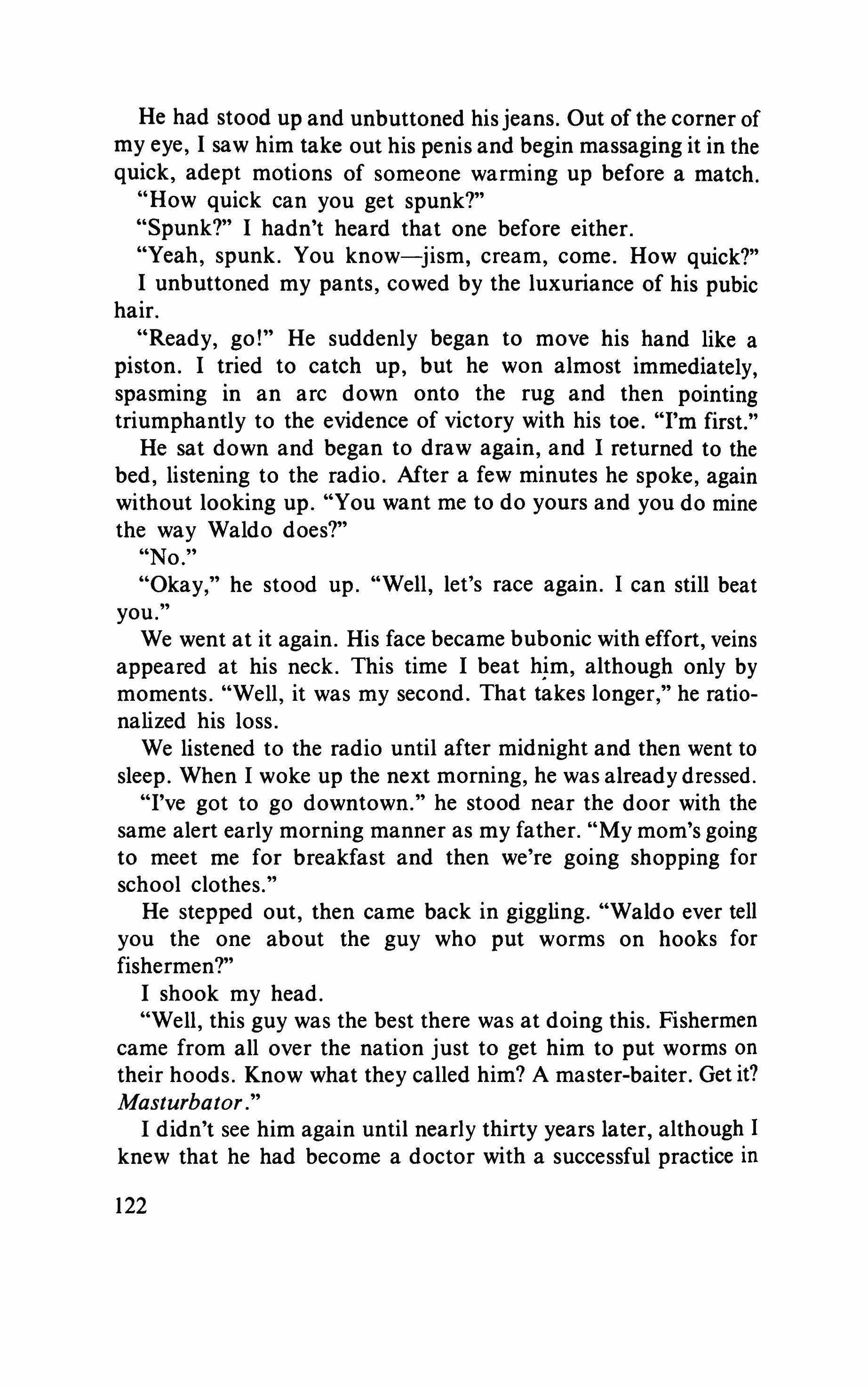
He had stood up and unbuttoned his jeans. Out of the corner of my eye, I saw him take out his penis and begin massaging it in the quick, adept motions of someone warming up before a match.
"How quick can you get spunk?"
"Spunk?" I hadn't heard that one before either.
"Yeah, spunk. You know-jism, cream, come. How quick?" I unbuttoned my pants, cowed by the luxuriance of his pubic hair.
"Ready, go!" He suddenly began to move his hand like a piston. I tried to catch up, but he won almost immediately, spasming in an arc down onto the rug and then pointing triumphantly to the evidence of victory with his toe. "I'm first."
He sat down and began to draw again, and I returned to the bed, listening to the radio. After a few minutes he spoke, again without looking up. "You want me to do yours and you do mine the way Waldo does?"
"No."
"Okay," he stood up. "Well, let's race again. I can still beat you."
We went at it again. His face became bubonic with effort, veins appeared at his neck. This time I beat him, although only by moments. "Well, it was my second. That takes longer," he rationalized his loss.
We listened to the radio until after midnight and then went to sleep. When I woke up the next morning, he was already dressed.
"I've got to go downtown." he stood near the door with the same alert early morning manner as my father. "My mom's going to meet me for breakfast and then we're going shopping for school clothes."
He stepped out, then came back in giggling. "Waldo ever tell you the one about the guy who put worms on hooks for fishermen?"
I shook my head.
"Well, this guy was the best there was at doing this. Fishermen came from all over the nation just to get him to put worms on their hoods. Know what they called him? A master-baiter. Get it? Masturbator."
I didn't see him again until nearly thirty years later, although I knew that he had become a doctor with a successful practice in 122
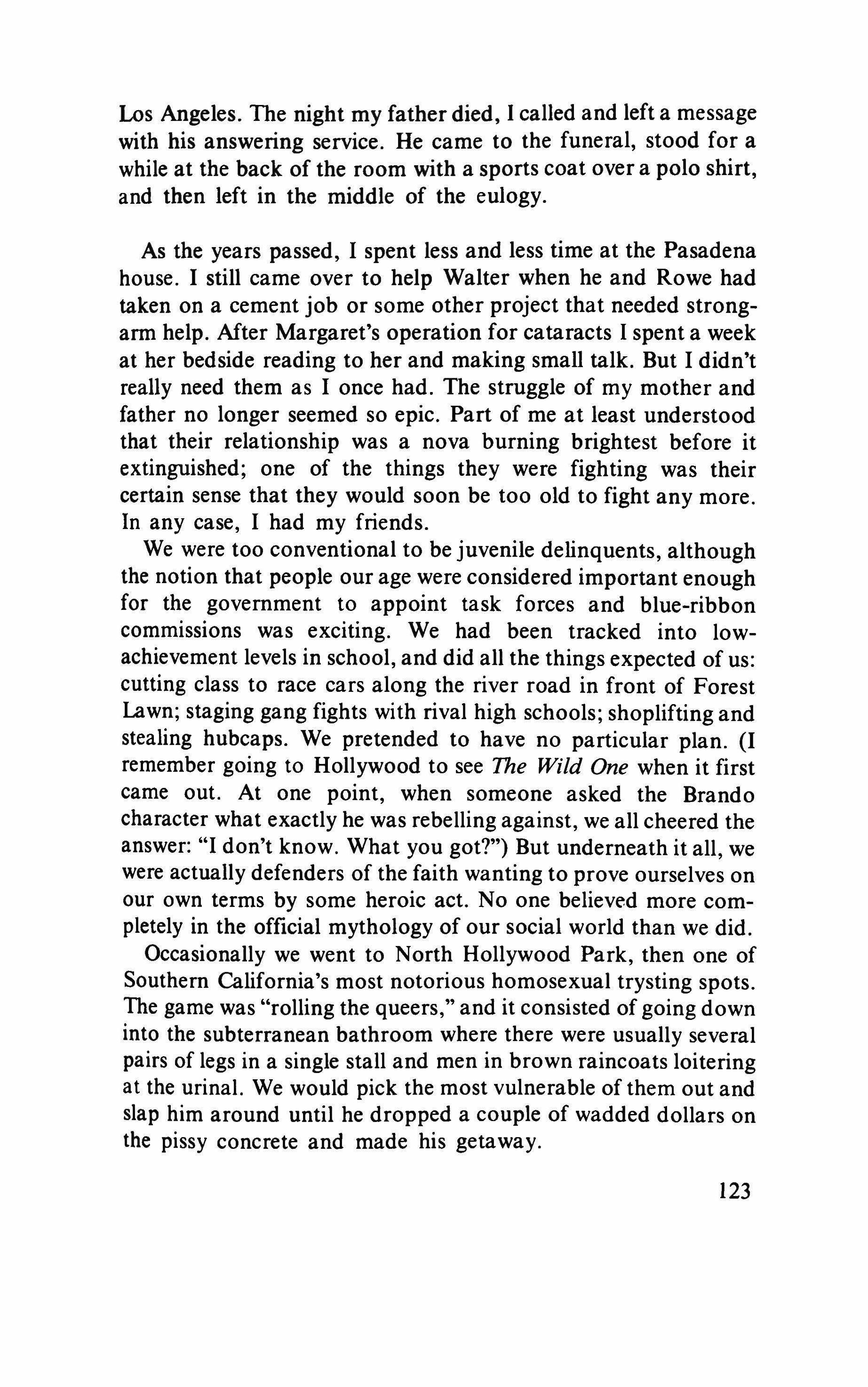
Los Angeles. The night my father died, I called and left a message with his answering service. He came to the funeral, stood for a while at the back of the room with a sports coat over a polo shirt, and then left in the middle of the eulogy.
As the years passed, I spent less and less time at the Pasadena house. I still came over to help Walter when he and Rowe had taken on a cement job or some other project that needed strongarm help. After Margaret's operation for cataracts I spent a week at her bedside reading to her and making small talk. But I didn't really need them as I once had. The struggle of my mother and father no longer seemed so epic. Part of me at least understood that their relationship was a nova burning brightest before it extinguished; one of the things they were fighting was their certain sense that they would soon be too old to fight any more. In any case, I had my friends.
We were too conventional to be juvenile delinquents, although the notion that people our age were considered important enough for the government to appoint task forces and blue-ribbon commissions was exciting. We had been tracked into lowachievement levels in school, and did all the things expected of us: cutting class to race cars along the river road in front of Forest Lawn; staging gang fights with rival high schools; shoplifting and stealing hubcaps. We pretended to have no particular plan. (I remember going to Hollywood to see The Wild One when it first came out. At one point, when someone asked the Brando character what exactly he was rebelling against, we all cheered the answer: "I don't know. What you got?") But underneath it all, we were actually defenders of the faith wanting to prove ourselves on our own terms by some heroic act. No one believed more completely in the official mythology of our social world than we did.
Occasionally we went to North Hollywood Park, then one of Southern California's most notorious homosexual trysting spots. The game was "rolling the queers," and it consisted of going down into the subterranean bathroom where there were usually several pairs of legs in a single stall and men in brown raincoats loitering at the urinal. We would pick the most vulnerable of them out and slap him around until he dropped a couple of wadded dollars on the pissy concrete and made his getaway.
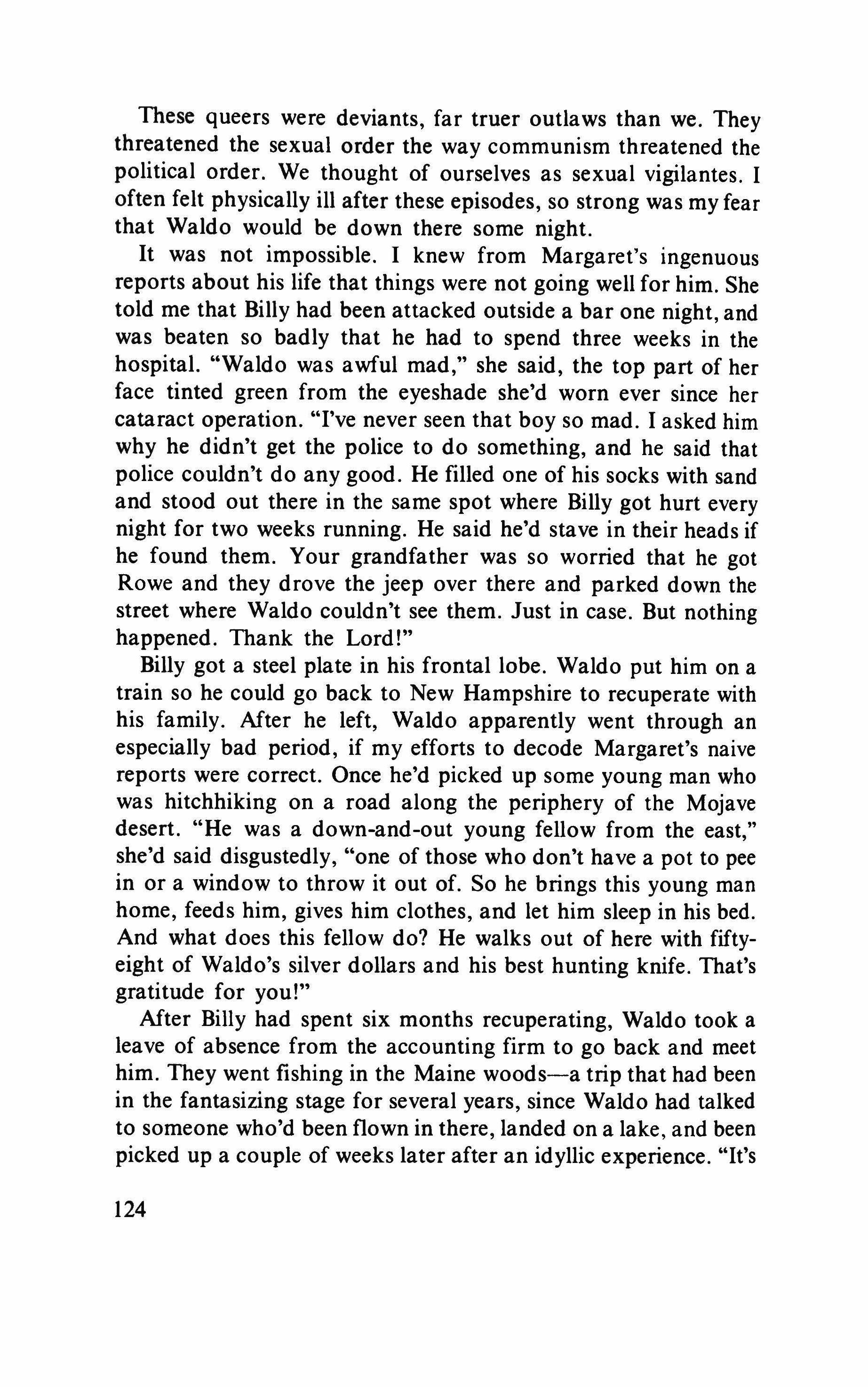
These queers were deviants, far truer outlaws than we. They threatened the sexual order the way communism threatened the political order. We thought of ourselves as sexual vigilantes. I often felt physically ill after these episodes, so strong was my fear that Waldo would be down there some night.
It was not impossible. I knew from Margaret's ingenuous reports about his life that things were not going well for him. She told me that Billy had been attacked outside a bar one night, and was beaten so badly that he had to spend three weeks in the hospital. "Waldo was awful mad," she said, the top part of her face tinted green from the eyeshade she'd worn ever since her cataract operation. "I've never seen that boy so mad. I asked him why he didn't get the police to do something, and he said that police couldn't do any good. He filled one of his socks with sand and stood out there in the same spot where Billy got hurt every night for two weeks running. He said he'd stave in their heads if he found them. Your grandfather was so worried that he got Rowe and they drove the jeep over there and parked down the street where Waldo couldn't see them. Just in case. But nothing happened. Thank the Lord!"
Billy got a steel plate in his frontal lobe. Waldo put him on a train so he could go back to New Hampshire to recuperate with his family. After he left, Waldo apparently went through an especially bad period, if my efforts to decode Margaret's naive reports were correct. Once he'd picked up some young man who was hitchhiking on a road along the periphery of the Mojave desert. "He was a down-and-out young fellow from the east," she'd said disgustedly, "one of those who don't have a pot to pee in or a window to throw it out of. So he brings this young man home, feeds him, gives him clothes, and let him sleep in his bed. And what does this fellow do? He walks out of here with fiftyeight of Waldo's silver dollars and his best hunting knife. That's gratitude for you!"
After Billy had spent six months recuperating, Waldo took a leave of absence from the accounting firm to go back and meet him. They went fishing in the Maine woods-a trip that had been in the fantasizing stage for several years, since Waldo had talked to someone who'd been flown in there, landed on a lake, and been picked up a couple of weeks later after an idyllic experience. "It's
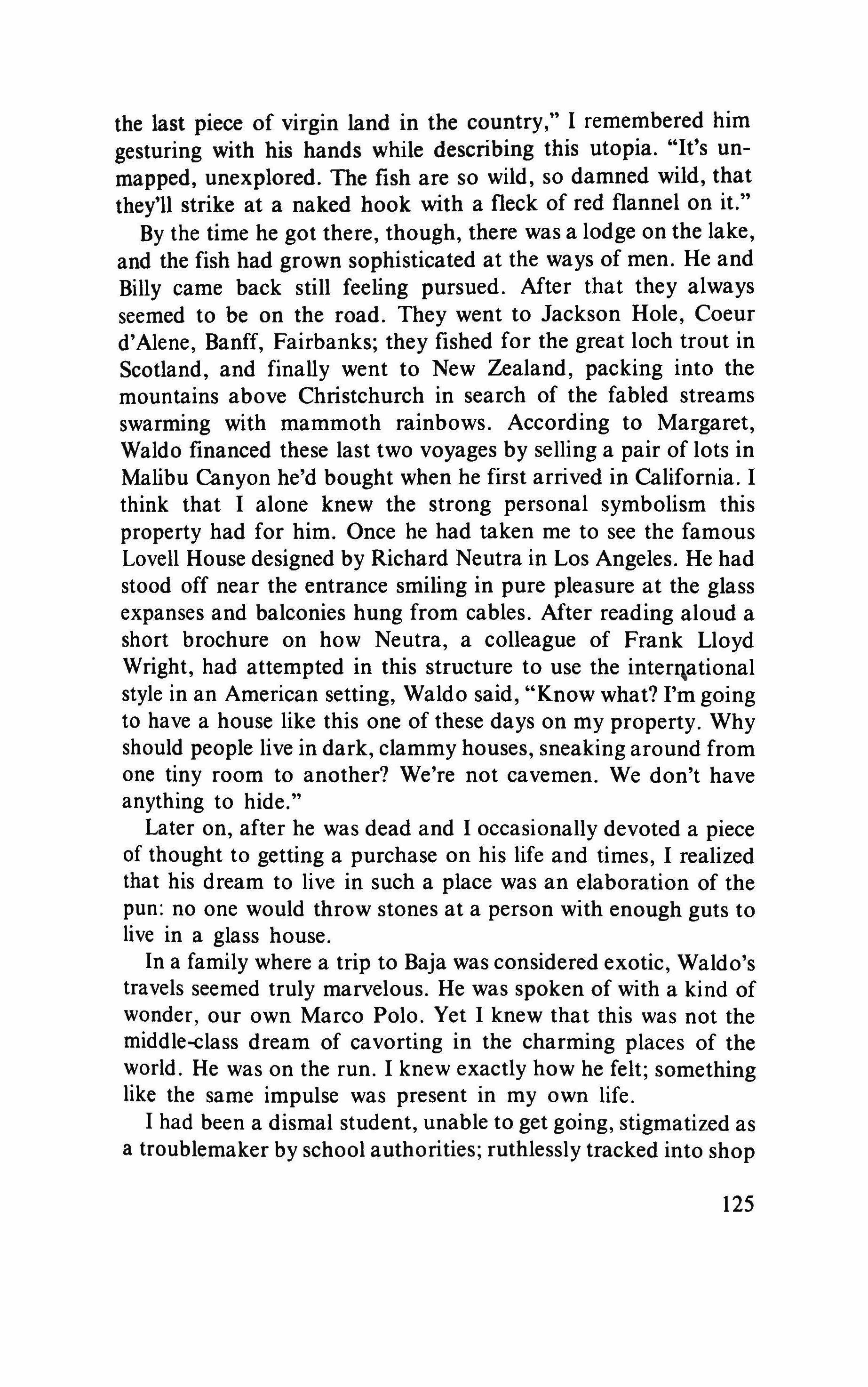
the last piece of virgin land in the country," I remembered him gesturing with his hands while describing this utopia. "It's unmapped, unexplored. The fish are so wild, so damned wild, that they'll strike at a naked hook with a fleck of red flannel on it."
By the time he got there, though, there was a lodge on the lake, and the fish had grown sophisticated at the ways of men. He and Billy came back still feeling pursued. After that they always seemed to be on the road. They went to Jackson Hole, Coeur d'Alene, Banff, Fairbanks; they fished for the great loch trout in Scotland, and finally went to New Zealand, packing into the mountains above Christchurch in search of the fabled streams swarming with mammoth rainbows. According to Margaret, Waldo financed these last two voyages by selling a pair of lots in Malibu Canyon he'd bought when he first arrived in California. I think that I alone knew the strong personal symbolism this property had for him. Once he had taken me to see the famous Lovell House designed by Richard Neutra in Los Angeles. He had stood off near the entrance smiling in pure pleasure at the glass expanses and balconies hung from cables. After reading aloud a short brochure on how Neutra, a colleague of Frank Lloyd Wright, had attempted in this structure to use the international style in an American setting, Waldo said, "Know what? I'm going to have a house like this one of these days on my property. Why should people live in dark, clammy houses, sneaking around from one tiny room to another? We're not cavemen. We don't have anything to hide."
Later on, after he was dead and I occasionally devoted a piece of thought to getting a purchase on his life and times, I realized that his dream to live in such a place was an elaboration of the pun: no one would throw stones at a person with enough guts to live in a glass house.
In a family where a trip to Baja was considered exotic, Waldo's travels seemed truly marvelous. He was spoken of with a kind of wonder, our own Marco Polo. Yet I knew that this was not the middle-class dream of cavorting in the charming places of the world. He was on the run. I knew exactly how he felt; something like the same impulse was present in my own life.
I had been a dismal student, unable to get going, stigmatized as a troublemaker by school authorities; ruthlessly tracked into shop
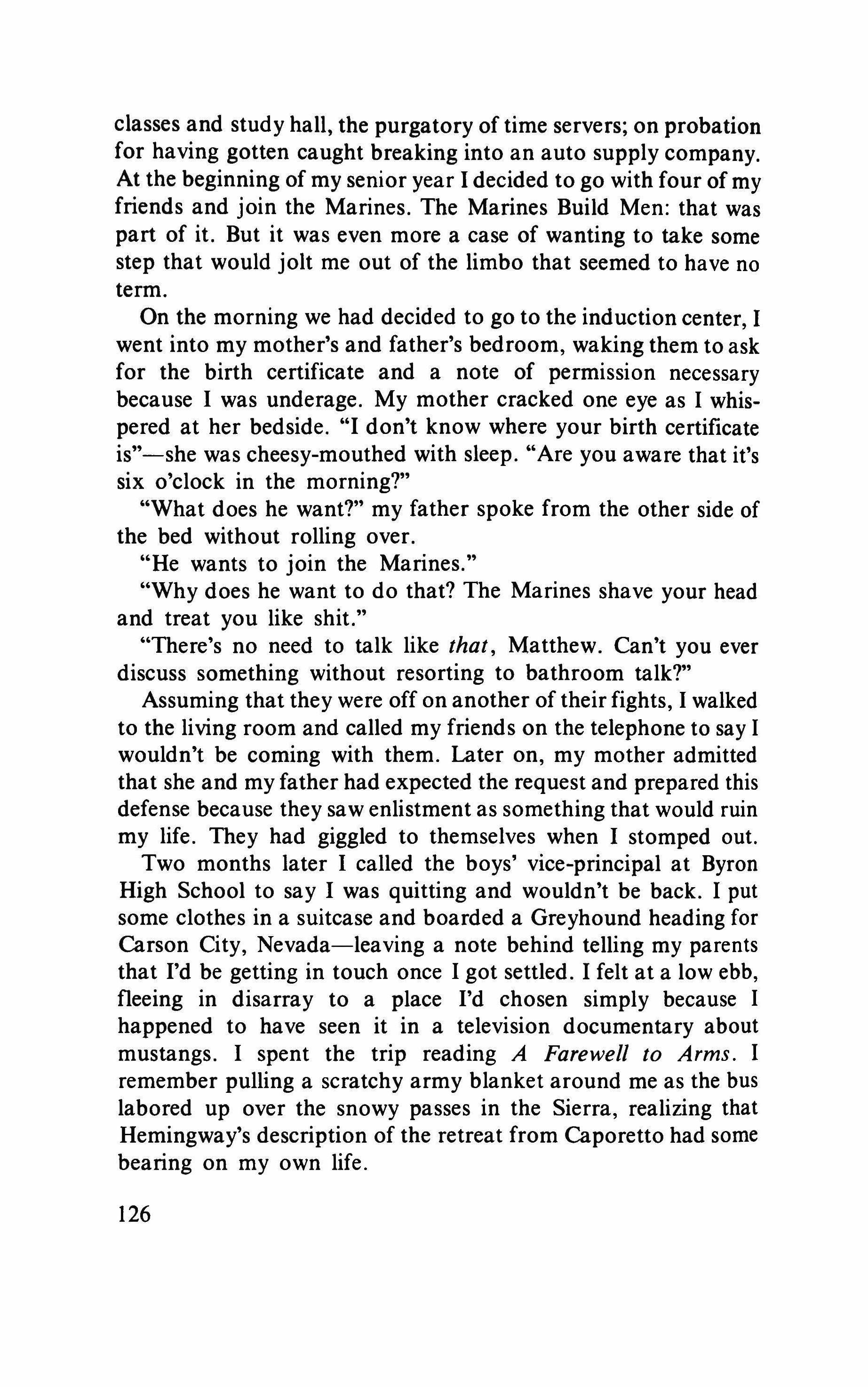
classes and study hall, the purgatory of time servers; on probation for having gotten caught breaking into an auto supply company. At the beginning of my senior year 1 decided to go with four of my friends and join the Marines. The Marines Build Men: that was part of it. But it was even more a case of wanting to take some step that would jolt me out of the limbo that seemed to have no term.
On the morning we had decided to go to the induction center, 1 went into my mother's and father's bedroom, waking them to ask for the birth certificate and a note of permission necessary because 1 was underage. My mother cracked one eye as I whispered at her bedside. "I don't know where your birth certificate is"-she was cheesy-mouthed with sleep. "Are you aware that it's six o'clock in the morning?"
"What does he want?" my father spoke from the other side of the bed without rolling over.
"He wants to join the Marines."
"Why does he want to do that? The Marines shave your head and treat you like shit."
"There's no need to talk like that, Matthew. Can't you ever discuss something without resorting to bathroom talk?"
Assuming that they were off on another of their fights, I walked to the living room and called my friends on the telephone to say I wouldn't be coming with them. Later on, my mother admitted that she and my father had expected the request and prepared this defense because they saw enlistment as something that would ruin my life. They had giggled to themselves when 1 stomped out.
Two months later 1 called the boys' vice-principal at Byron High School to say 1 was quitting and wouldn't be back. I put some clothes in a suitcase and boarded a Greyhound heading for Carson City, Nevada-leaving a note behind telling my parents that I'd be getting in touch once I got settled. 1 felt at a low ebb, fleeing in disarray to a place I'd chosen simply because I happened to have seen it in a television documentary about mustangs. I spent the trip reading A Farewell to Arms. I remember pulling a scratchy army blanket around me as the bus labored up over the snowy passes in the Sierra, realizing that Hemingway's description of the retreat from Caporetto had some bearing on my own life.
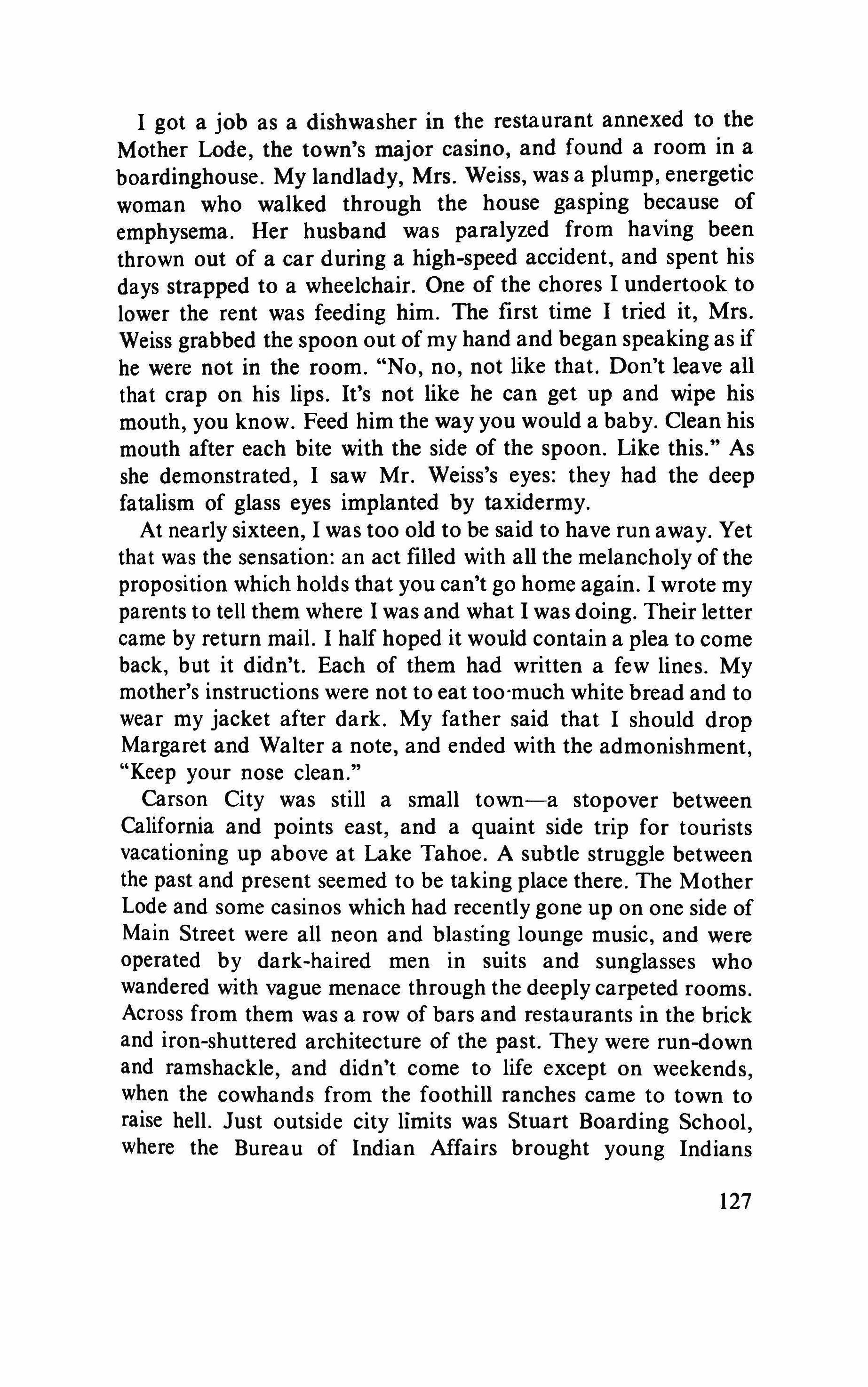
I got a job as a dishwasher in the restaurant annexed to the Mother Lode, the town's major casino, and found a room in a boardinghouse. My landlady, Mrs. Weiss, was a plump, energetic woman who walked through the house gasping because of emphysema. Her husband was paralyzed from having been thrown out of a car during a high-speed accident, and spent his days strapped to a wheelchair. One of the chores I undertook to lower the rent was feeding him. The first time I tried it, Mrs. Weiss grabbed the spoon out of my hand and began speaking as if he were not in the room. "No, no, not like that. Don't leave all that crap on his lips. It's not like he can get up and wipe his mouth, you know. Feed him the way you would a baby. Clean his mouth after each bite with the side of the spoon. Like this." As she demonstrated, I saw Mr. Weiss's eyes: they had the deep fatalism of glass eyes implanted by taxidermy.
At nearly sixteen, I was too old to be said to have run away. Yet that was the sensation: an act filled with all the melancholy of the proposition which holds that you can't go home again. I wrote my parents to tell them where I was and what I was doing. Their letter came by return mail. I half hoped it would contain a plea to come back, but it didn't. Each of them had written a few lines. My mother's instructions were not to eat too-much white bread and to wear my jacket after dark. My father said that I should drop Margaret and Walter a note, and ended with the admonishment, "Keep your nose clean."
Carson City was still a small town-a stopover between California and points east, and a quaint side trip for tourists vacationing up above at Lake Tahoe. A subtle struggle between the past and present seemed to be taking place there. The Mother Lode and some casinos which had recently gone up on one side of Main Street were all neon and blasting lounge music, and were operated by dark-haired men in suits and sunglasses who wandered with vague menace through the deeply carpeted rooms. Across from them was a row of bars and restaurants in the brick and iron-shuttered architecture of the past. They were run-down and ramshackle, and didn't come to life except on weekends, when the cowhands from the foothill ranches came to town to raise hell. Just outside city limits was Stuart Boarding School, where the Burea u of Indian Affairs brought young Indians
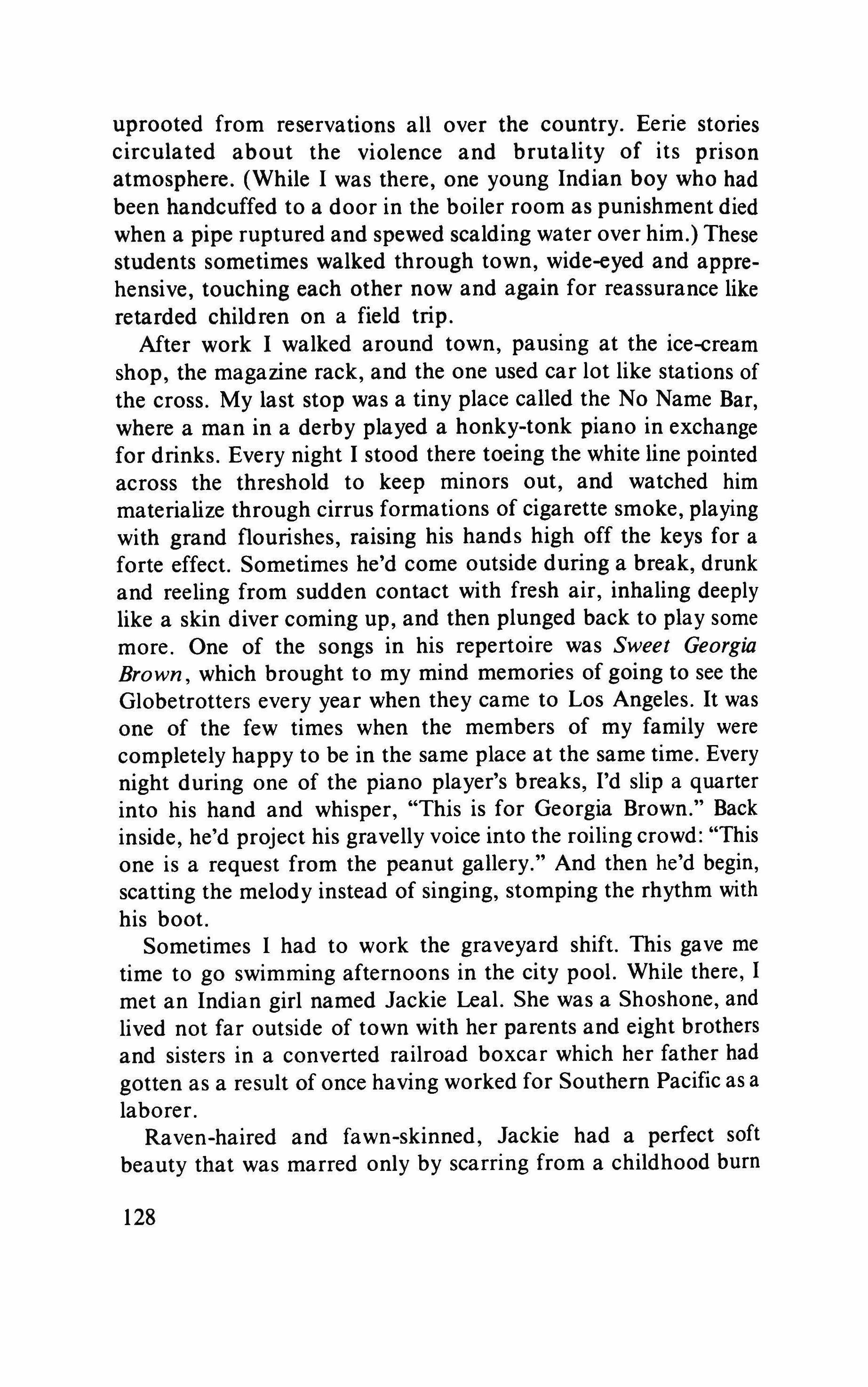
uprooted from reservations all over the country. Eerie stories circulated about the violence and brutality of its prison atmosphere. (While I was there, one young Indian boy who had been handcuffed to a door in the boiler room as punishment died when a pipe ruptured and spewed scalding water over him.) These students sometimes walked through town, wide-eyed and apprehensive, touching each other now and again for reassurance like retarded children on a field trip.
After work I walked around town, pausing at the ice-cream shop, the magazine rack, and the one used car lot like stations of the cross. My last stop was a tiny place called the No Name Bar, where a man in a derby played a honky-tonk piano in exchange for drinks. Every night I stood there toeing the white line pointed across the threshold to keep minors out, and watched him materialize through cirrus formations of cigarette smoke, playing with grand flourishes, raising his hands high off the keys for a forte effect. Sometimes he'd come outside during a break, drunk and reeling from sudden contact with fresh air, inhaling deeply like a skin diver coming up, and then plunged back to play some more. One of the songs in his repertoire was Sweet Georgia Brown, which brought to my mind memories of going to see the Globetrotters every year when they came to Los Angeles. It was one of the few times when the members of my family were completely happy to be in the same place at the same time. Every night during one of the piano player's breaks, I'd slip a quarter into his hand and whisper, "This is for Georgia Brown." Back inside, he'd project his gravelly voice into the roiling crowd: "This one is a request from the peanut gallery." And then he'd begin, scatting the melody instead of singing, stomping the rhythm with his boot.
Sometimes 1 had to work the graveyard shift. This gave me time to go swimming afternoons in the city pool. While there, I met an Indian girl named Jackie Leal. She was a Shoshone, and lived not far outside of town with her parents and eight brothers and sisters in a converted railroad boxcar which her father had gotten as a result of once having worked for Southern Pacific as a laborer.
Raven-haired and fawn-skinned, Jackie had a perfect soft beauty that was marred only by scarring from a childhood burn
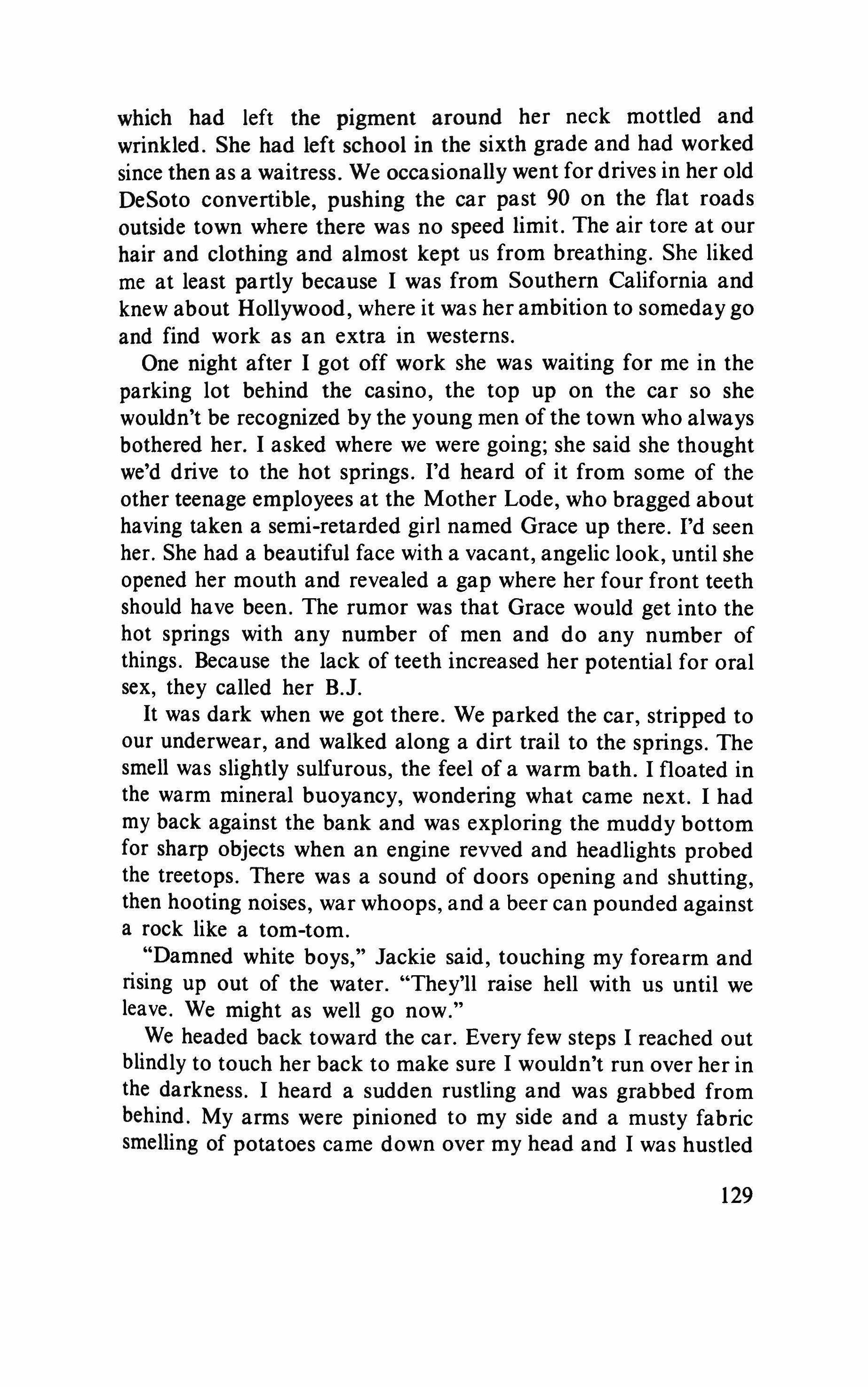
which had left the pigment around her neck mottled and wrinkled. She had left school in the sixth grade and had worked since then as a waitress. We occasionally went for drives in her old DeSoto convertible, pushing the car past 90 on the flat roads outside town where there was no speed limit. The air tore at our hair and clothing and almost kept us from breathing. She liked me at least partly because I was from Southern California and knew about Hollywood, where it was her ambition to someday go and find work as an extra in westerns.
One night after I got off work she was waiting for me in the parking lot behind the casino, the top up on the car so she wouldn't be recognized by the young men of the town who always bothered her. I asked where we were going; she said she thought we'd drive to the hot springs. I'd heard of it from some of the other teenage employees at the Mother Lode, who bragged about having taken a semi-retarded girl named Grace up there. I'd seen her. She had a beautiful face with a vacant, angelic look, until she opened her mouth and revealed a gap where her four front teeth should have been. The rumor was that Grace would get into the hot springs with any number of men and do any number of things. Because the lack of teeth increased her potential for oral sex, they called her B.J.
It was dark when we got there. We parked the car, stripped to our underwear, and walked along a dirt trail to the springs. The smell was slightly sulfurous, the feel of a warm bath. I floated in the warm mineral buoyancy, wondering what carne next. I had my back against the bank and was exploring the muddy bottom for sharp objects when an engine revved and headlights probed the treetops. There was a sound of doors opening and shutting, then hooting noises, war whoops, and a beer can pounded against a rock like a torn-torn.
"Damned white boys," Jackie said, touching my forearm and rising up out of the water. "They'll raise hell with us until we leave. We might as well go now."
We headed back toward the car. Every few steps I reached out blindly to touch her back to make sure I wouldn't run over her in the darkness. I heard a sudden rustling and was grabbed from behind. My arms were pinioned to my side and a musty fabric smelling of potatoes carne down over my head and I was hustled
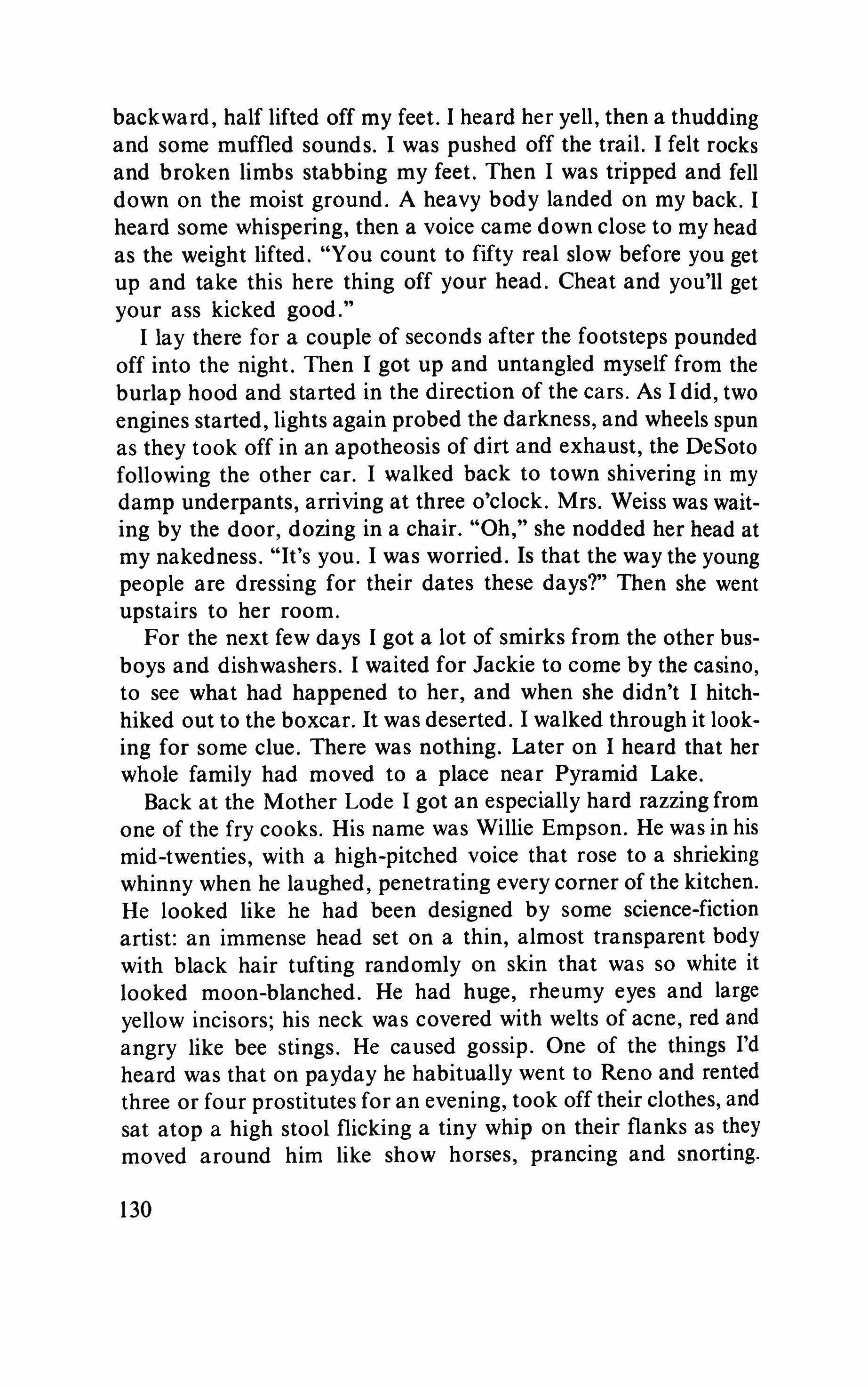
backward, half lifted off my feet. I heard her yell, then a thudding and some muffled sounds. I was pushed off the trail. I felt rocks and broken limbs stabbing my feet. Then I was tripped and fell down on the moist ground. A heavy body landed on my back. I heard some whispering, then a voice came down close to my head as the weight lifted. "You count to fifty real slow before you get up and take this here thing off your head. Cheat and you'll get your ass kicked good."
I lay there for a couple of seconds after the footsteps pounded off into the night. Then I got up and untangled myself from the burlap hood and started in the direction of the cars. As I did, two engines started, lights again probed the darkness, and wheels spun as they took off in an apotheosis of dirt and exhaust, the DeSoto following the other car. I walked back to town shivering in my damp underpants, arriving at three o'clock. Mrs. Weiss was waiting by the door, dozing in a chair. "Oh," she nodded her head at my nakedness. "It's you. I was worried. Is that the way the young people are dressing for their dates these days?" Then she went upstairs to her room.
For the next few days I got a lot of smirks from the other busboys and dishwashers. I waited for Jackie to come by the casino, to see what had happened to her, and when she didn't I hitchhiked out to the boxcar. It was deserted. I walked through it looking for some clue. There was nothing. Later on I heard that her whole family had moved to a place near Pyramid Lake.
Back at the Mother Lode I got an especially hard razzing from one of the fry cooks. His name was Willie Empson. He was in his mid-twenties, with a high-pitched voice that rose to a shrieking whinny when he laughed, penetrating every corner of the kitchen. He looked like he had been designed by some science-fiction artist: an immense head set on a thin, almost transparent body with black hair tufting randomly on skin that was so white it looked moon-blanched. He had huge, rheumy eyes and large yellow incisors; his neck was covered with welts of acne, red and angry like bee stings. He caused gossip. One of the things I'd heard was that on payday he habitually went to Reno and rented three or four prostitutes for an evening, took off their clothes, and sat atop a high stool flicking a tiny whip on their flanks as they moved around him like show horses, prancing and snorting.
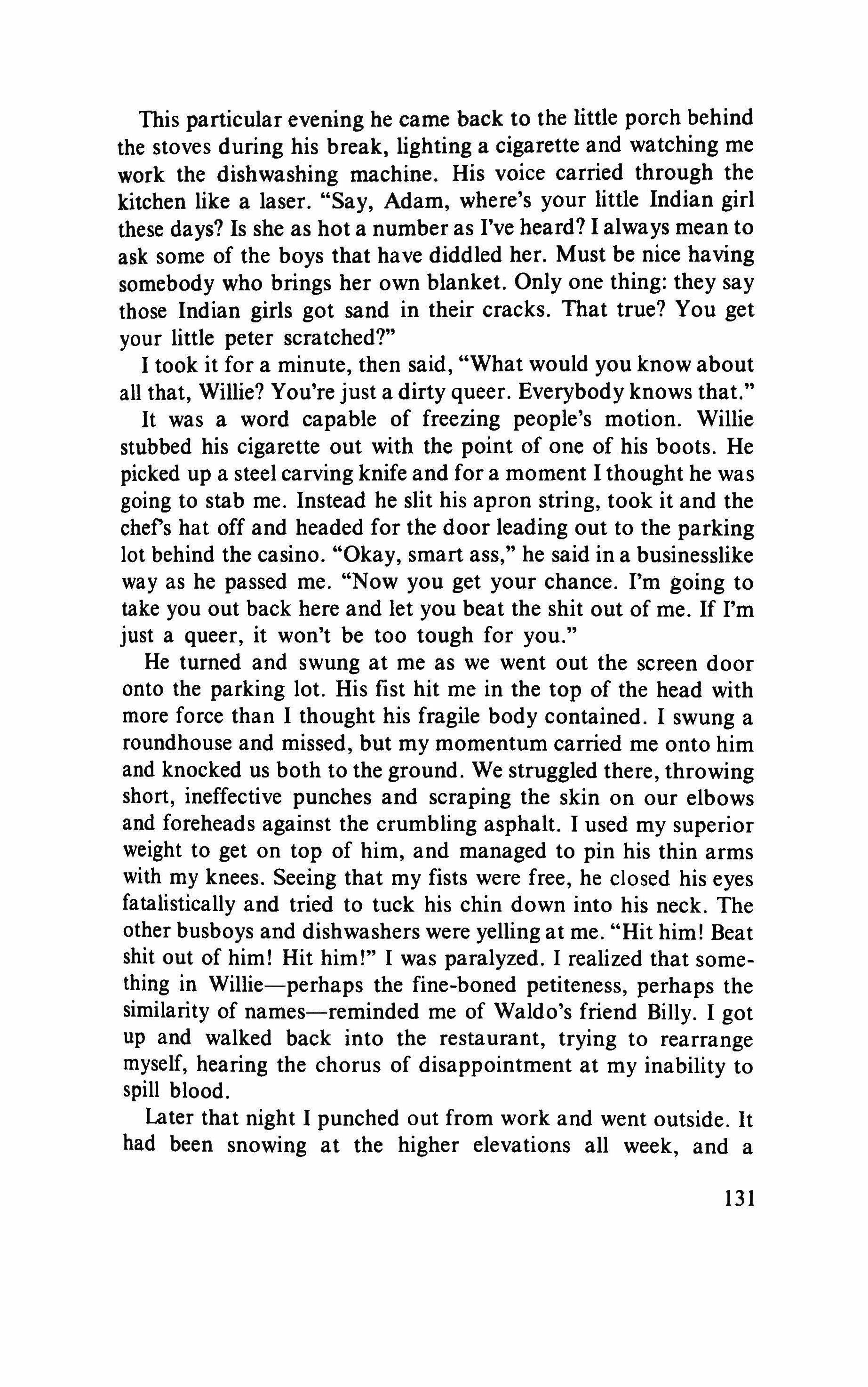
This particular evening he came back to the little porch behind the stoves during his break, lighting a cigarette and watching me work the dishwashing machine. His voice carried through the kitchen like a laser. "Say, Adam, where's your little Indian girl these days? Is she as hot a number as I've heard? I always mean to ask some of the boys that have diddled her. Must be nice having somebody who brings her own blanket. Only one thing: they say those Indian girls got sand in their cracks. That true? You get your little peter scratched?"
I took it for a minute, then said, "What would you know about all that, Willie? You're just a dirty queer. Everybody knows that."
It was a word capable of freezing people's motion. Willie stubbed his cigarette out with the point of one of his boots. He picked up a steel carving knife and for a moment I thought he was going to stab me. Instead he slit his apron string, took it and the chefs hat off and headed for the door leading out to the parking lot behind the casino. "Okay, smart ass," he said in a businesslike way as he passed me. "Now you get your chance. I'm going to take you out back here and let you beat the shit out of me. If I'm just a queer, it won't be too tough for you."
He turned and swung at me as we went out the screen door onto the parking lot. His fist hit me in the top of the head with more force than I thought his fragile body contained. I swung a roundhouse and missed, but my momentum carried me onto him and knocked us both to the ground. We struggled there, throwing short, ineffective punches and scraping the skin on our elbows and foreheads against the crumbling asphalt. I used my superior weight to get on top of him, and managed to pin his thin arms with my knees. Seeing that my fists were free, he closed his eyes fatalistically and tried to tuck his chin down into his neck. The other busboys and dishwashers were yelling at me. "Hit him! Beat shit out of him! Hit him!" I was paralyzed. I realized that something in Willie-perhaps the fine-boned petiteness, perhaps the similarity of names-reminded me of Waldo's friend Billy. I got up and walked back into the restaurant, trying to rearrange myself, hearing the chorus of disappointment at my inability to spill blood.
Later that night I punched out from work and went outside. It had been snowing at the higher elevations all week, and a
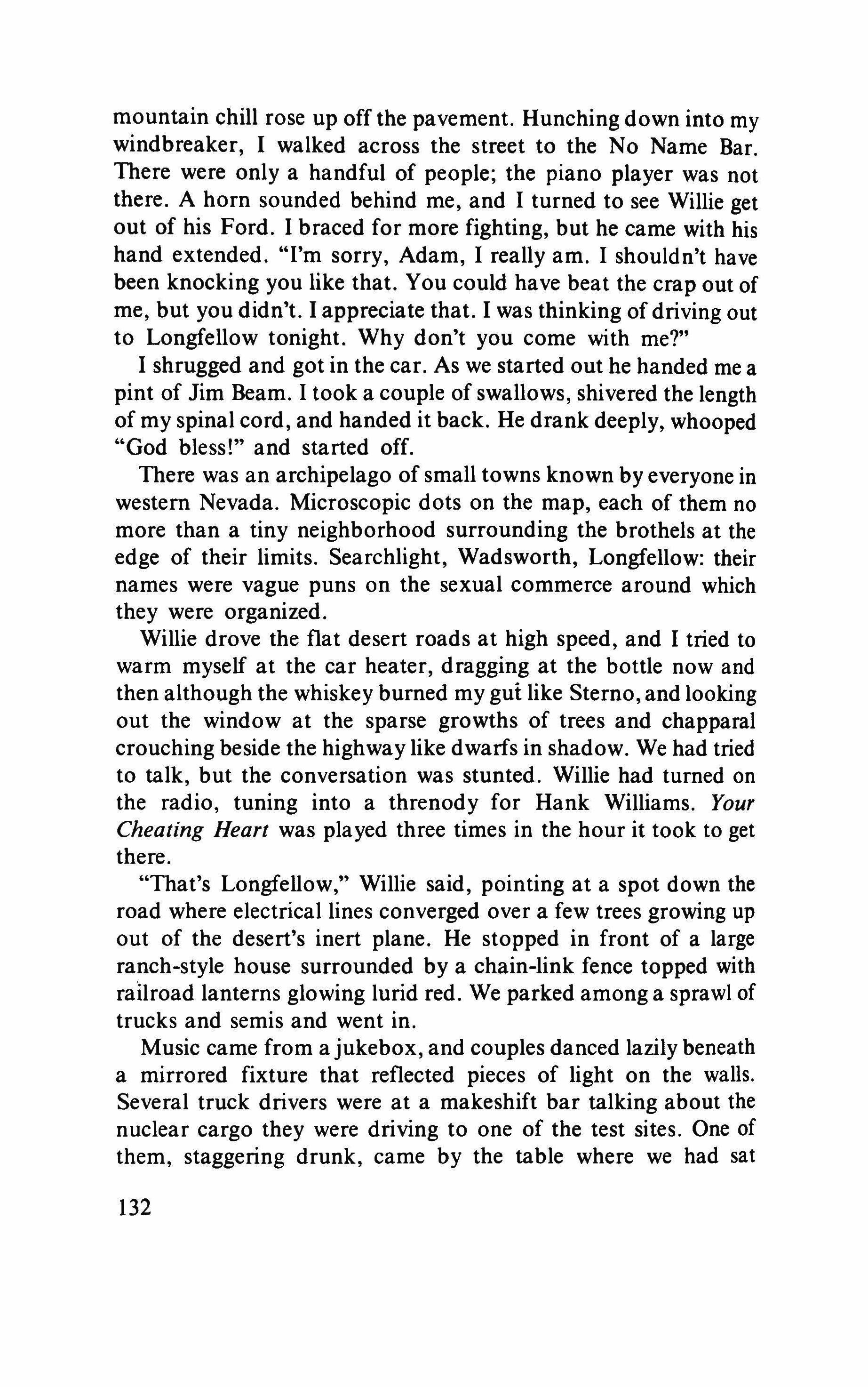
mountain chill rose up off the pavement. Hunching down into my windbreaker, I walked across the street to the No Name Bar. There were only a handful of people; the piano player was not there. A horn sounded behind me, and I turned to see Willie get out of his Ford. I braced for more fighting, but he came with his hand extended. "I'm sorry, Adam, I really am. I shouldn't have been knocking you like that. You could have beat the crap out of me, but you didn't. I appreciate that. I was thinking of driving out to Longfellow tonight. Why don't you come with me?"
I shrugged and got in the car. As we started out he handed me a pint of Jim Beam. I took a couple of swallows, shivered the length of my spinal cord, and handed it back. He drank deeply, whooped "God bless!" and started off.
There was an archipelago of small towns known by everyone in western Nevada. Microscopic dots on the map, each of them no more than a tiny neighborhood surrounding the brothels at the edge of their limits. Searchlight, Wadsworth, Longfellow: their names were vague puns on the sexual commerce around which they were organized.
Willie drove the flat desert roads at high speed, and I tried to warm myself at the car heater, dragging at the bottle now and then although the whiskey burned my gut like Sterno, and looking out the window at the sparse growths of trees and chapparal crouching beside the highway like dwarfs in shadow. We had tried to talk, but the conversation was stunted. Willie had turned on the radio, tuning into a threnody for Hank Williams. Your Cheating Heart was played three times in the hour it took to get there.
"That's Longfellow," Willie said, pointing at a spot down the road where electrical lines converged over a few trees growing up out of the desert's inert plane. He stopped in front of a large ranch-style house surrounded by a chain-link fence topped with railroad lanterns glowing lurid red. We parked among a sprawl of trucks and semis and went in.
Music came from ajukebox, and couples danced lazily beneath a mirrored fixture that reflected pieces of light on the walls. Several truck drivers were at a makeshift bar talking about the nuclear cargo they were driving to one of the test sites. One of them, staggering drunk, came by the table where we had sat
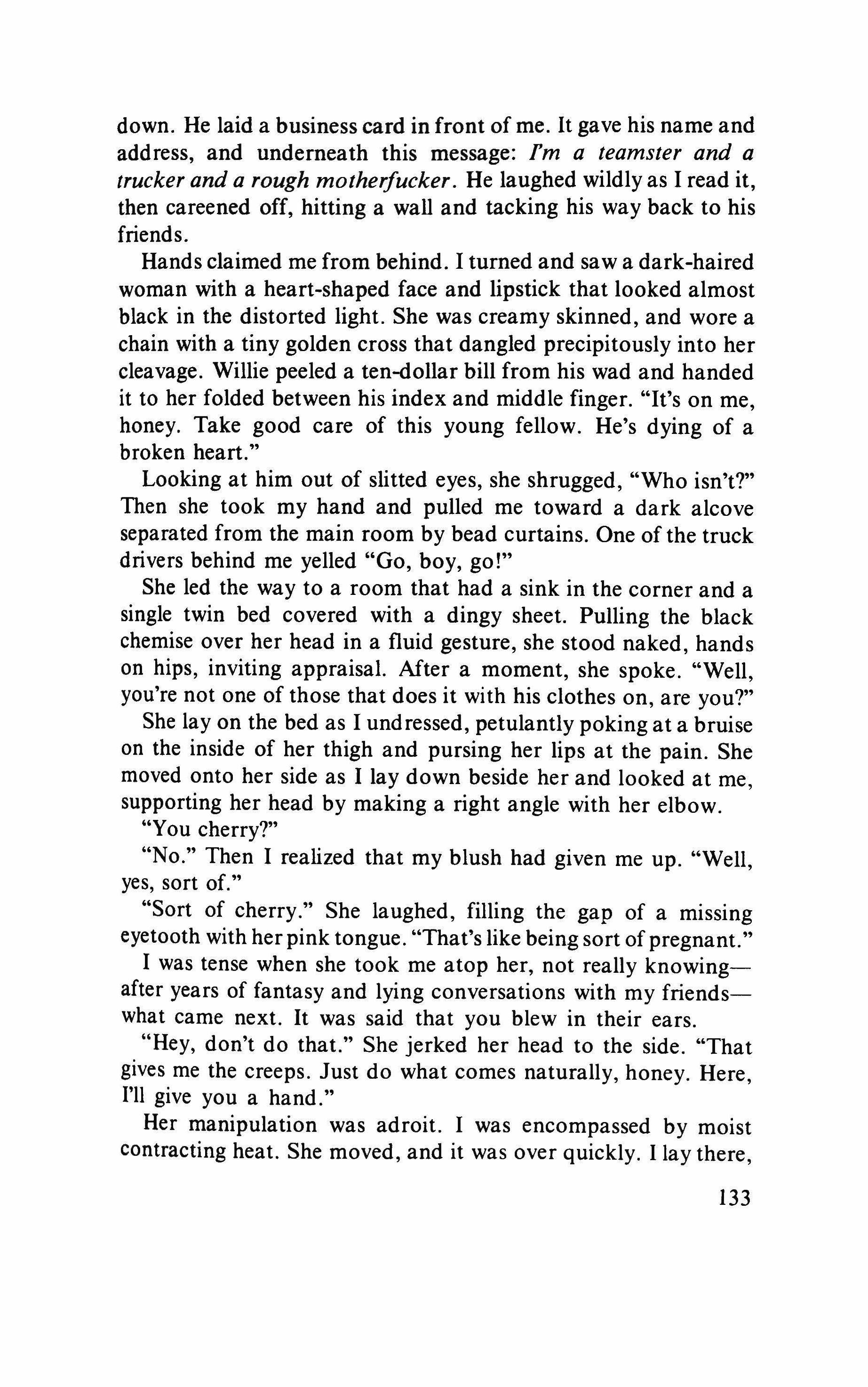
down. He laid a business card in front of me. It gave his name and address, and underneath this message: I'm a teamster and a trucker and a rough motherfucker. He laughed wildly as I read it, then careened off, hitting a wall and tacking his way back to his friends.
Hands claimed me from behind. I turned and saw a dark-haired woman with a heart-shaped face and lipstick that looked almost black in the distorted light. She was creamy skinned, and wore a chain with a tiny golden cross that dangled precipitously into her cleavage. Willie peeled a ten-dollar bill from his wad and handed it to her folded between his index and middle finger. "It's on me, honey. Take good care of this young fellow. He's dying of a broken heart."
Looking at him out of slitted eyes, she shrugged, "Who isn't?" Then she took my hand and pulled me toward a dark alcove separated from the main room by bead curtains. One of the truck drivers behind me yelled "Go, boy, go!"
She led the way to a room that had a sink in the corner and a single twin bed covered with a dingy sheet. Pulling the black chemise over her head in a fluid gesture, she stood naked, hands on hips, inviting appraisal. After a moment, she spoke. "Well, you're not one of those that does it with his clothes on, are you?"
She lay on the bed as I undressed, petulantly poking at a bruise on the inside of her thigh and pursing her lips at the pain. She moved onto her side as I lay down beside her and looked at me, supporting her head by making a right angle with her elbow.
"You cherry?"
"No." Then I realized that my blush had given me up. "Well, yes, sort of."
"Sort of cherry." She laughed, filling the gap of a missing eyetooth with her pink tongue. "That's like being sort of pregnant."
I was tense when she took me atop her, not really knowingafter years of fantasy and lying conversations with my friendswhat came next. It was said that you blew in their ears.
"Hey, don't do that." She jerked her head to the side. "That gives me the creeps. Just do what comes naturally, honey. Here, I'll give you a hand."
Her manipulation was adroit. I was encompassed by moist contracting heat. She moved, and it was over quickly. I lay there, 133
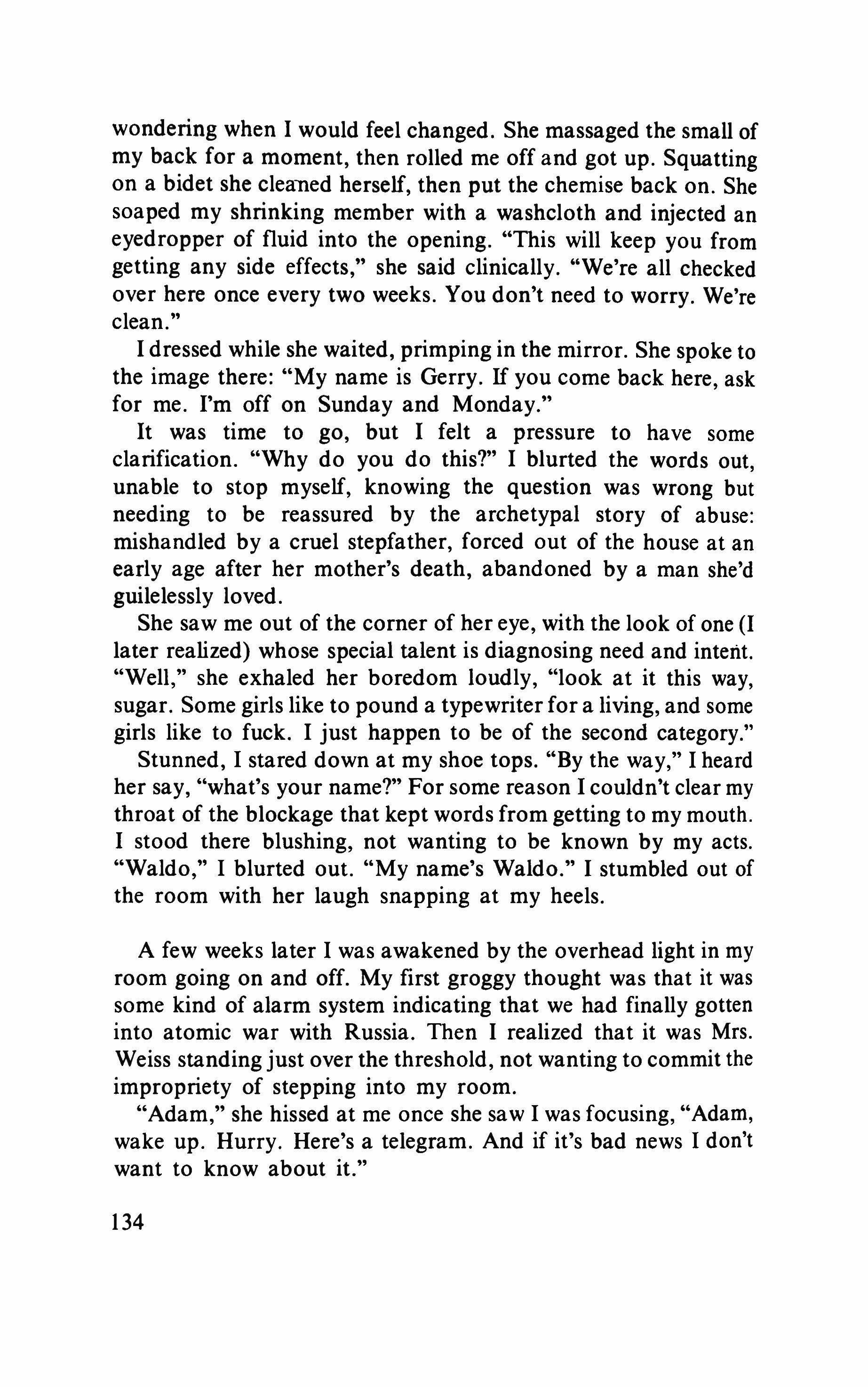
wondering when I would feel changed. She massaged the small of my back for a moment, then rolled me off and got up. Squatting on a bidet she cleaned herself, then put the chemise back on. She soaped my shrinking member with a washcloth and injected an eyedropper of fluid into the opening. "This will keep you from getting any side effects," she said clinically. "We're all checked over here once every two weeks. You don't need to worry. We're clean.
I dressed while she waited, primping in the mirror. She spoke to the image there: "My name is Gerry. If you come back here, ask for me. I'm off on Sunday and Monday."
It was time to go, but I felt a pressure to have some clarification. "Why do you do this?" I blurted the words out, unable to stop myself, knowing the question was wrong but needing to be reassured by the archetypal story of abuse: mishandled by a cruel stepfather, forced out of the house at an early age after her mother's death, abandoned by a man she'd guilelessly loved.
She saw me out of the corner of her eye, with the look of one (I later realized) whose special talent is diagnosing need and intent. "Well," she exhaled her boredom loudly, "look at it this way, sugar. Some girls like to pound a typewriter for a living, and some girls like to fuck. I just happen to be of the second category."
Stunned, I stared down at my shoe tops. "By the way," I heard her say, "what's your name?" For some reason I couldn't clear my throat of the blockage that kept words from getting to my mouth. I stood there blushing, not wanting to be known by my acts. "Waldo," I blurted out. "My name's Waldo." I stumbled out of the room with her laugh snapping at my heels.
A few weeks later I was awakened by the overhead light in my room going on and off. My first groggy thought was that it was some kind of alarm system indicating that we had finally gotten into atomic war with Russia. Then I realized that it was Mrs. Weiss standing just over the threshold, not wanting to commit the impropriety of stepping into my room.
"Adam," she hissed at me once she saw I was focusing, "Adam, wake up. Hurry. Here's a telegram. And if it's bad news I don't want to know about it."
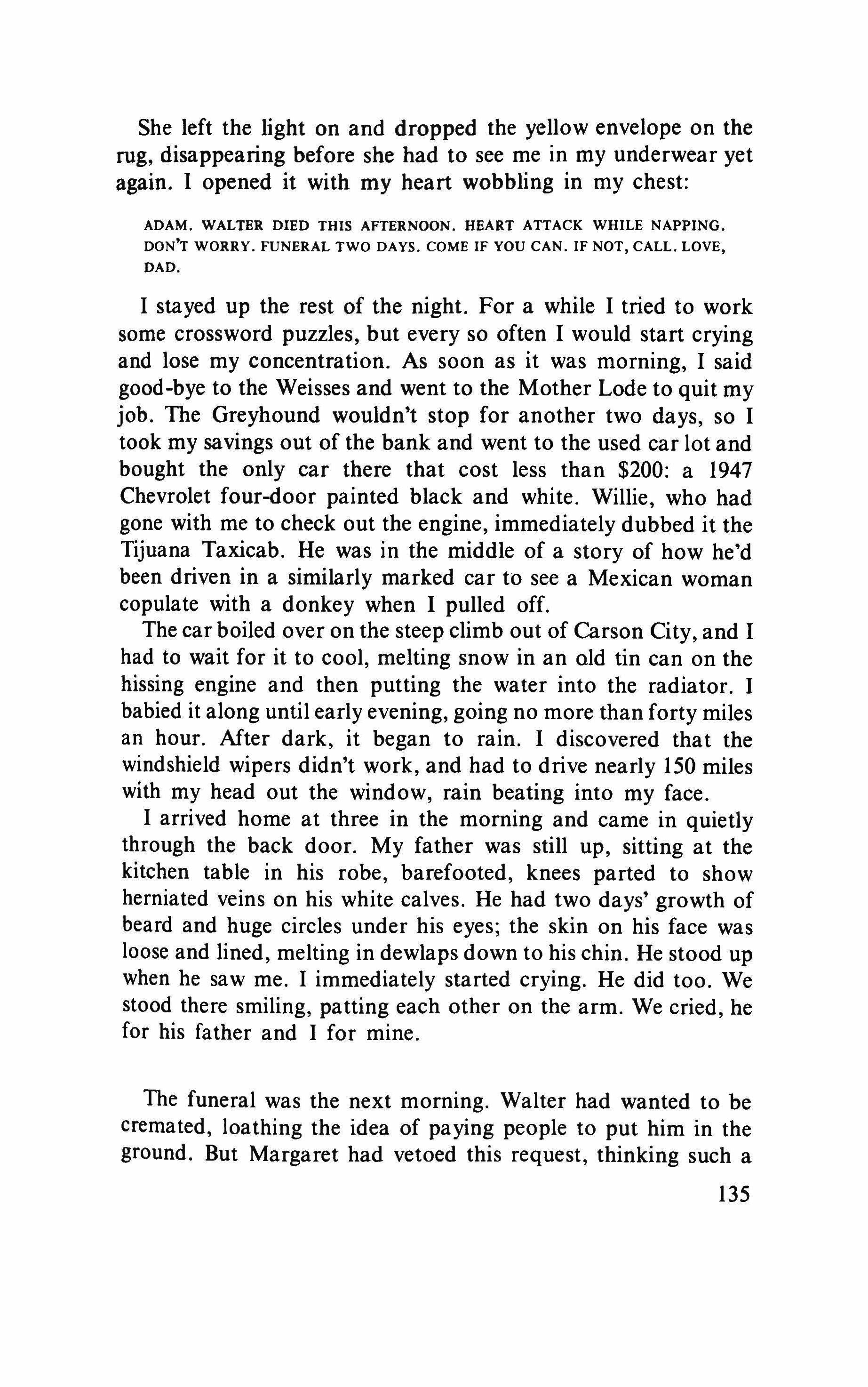
She left the light on and dropped the yellow envelope on the rug, disappearing before she had to see me in my underwear yet again. I opened it with my heart wobbling in my chest:
ADAM. WALTER DIED THIS AFTERNOON. HEART ATTACK WHILE NAPPING. DON'T WORRY. FUNERAL TWO DAYS. COME IF YOU CAN. IF NOT, CALL. LOVE, DAD.
I stayed up the rest of the night. For a while I tried to work some crossword puzzles, but every so often I would start crying and lose my concentration. As soon as it was morning, I said good-bye to the Weisses and went to the Mother Lode to quit my job. The Greyhound wouldn't stop for another two days, so I took my savings out of the bank and went to the used car lot and bought the only car there that cost less than $200: a 1947 Chevrolet four-door painted black and white. Willie, who had gone with me to check out the engine, immediately dubbed it the Tijuana Taxicab. He was in the middle of a story of how he'd been driven in a similarly marked car to see a Mexican woman copulate with a donkey when I pulled off.
The car boiled over on the steep climb out of Carson City, and I had to wait for it to cool, melting snow in an old tin can on the hissing engine and then putting the water into the radiator. I babied it along until early evening, going no more than forty miles an hour. After dark, it began to rain. I discovered that the windshield wipers didn't work, and had to drive nearly 150 miles with my head out the window, rain beating into my face.
I arrived home at three in the morning and came in quietly through the back door. My father was still up, sitting at the kitchen table in his robe, barefooted, knees parted to show herniated veins on his white calves. He had two days' growth of beard and huge circles under his eyes; the skin on his face was loose and lined, melting in dewlaps down to his chin. He stood up when he saw me. I immediately started crying. He did too. We stood there smiling, patting each other on the arm. We cried, he for his father and I for mine.
The funeral was the next morning. Walter had wanted to be cremated, loathing the idea of paying people to put him in the ground. But Margaret had vetoed this request, thinking such a 135
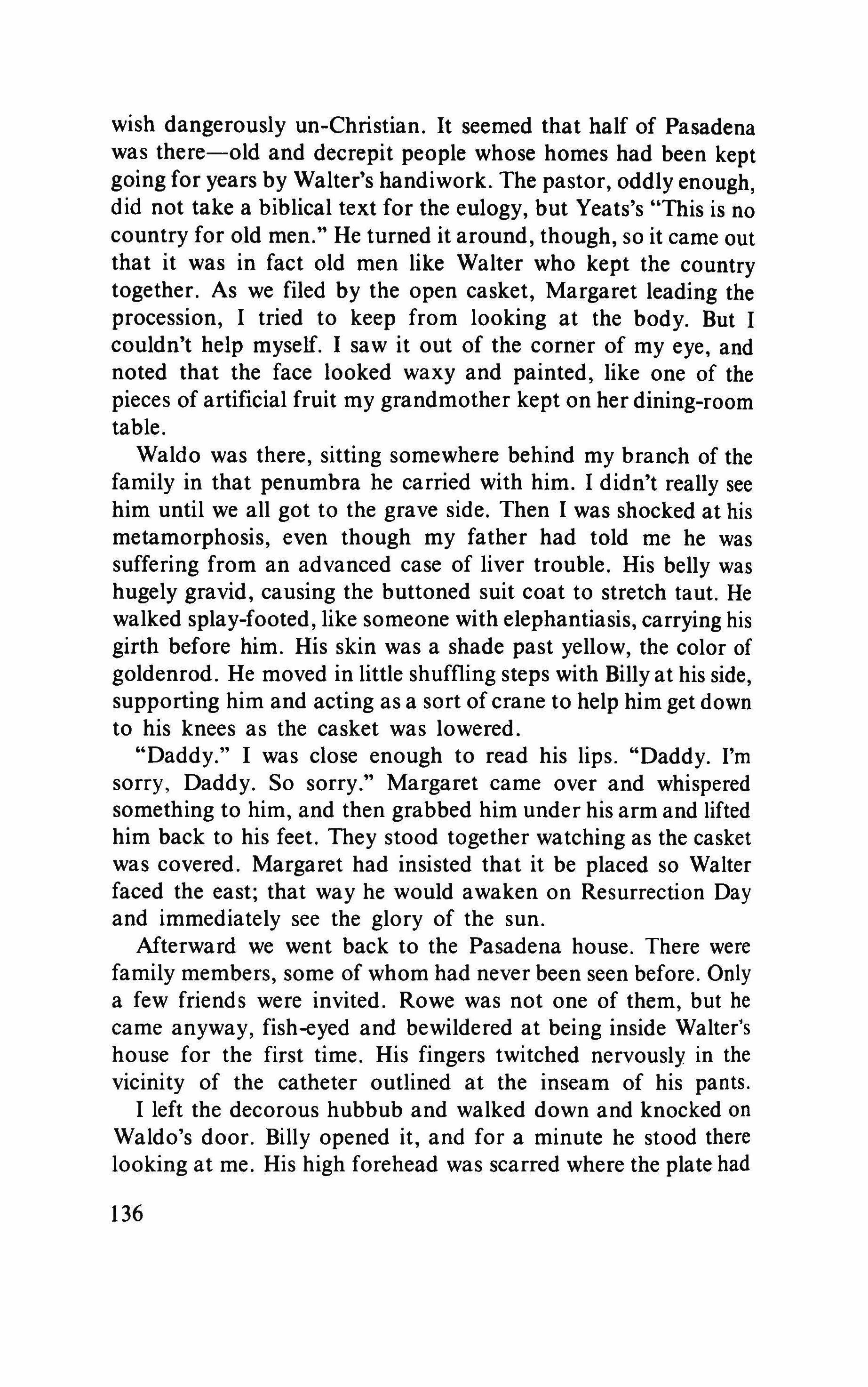
wish dangerously un-Christian. It seemed that half of Pasadena was there-old and decrepit people whose homes had been kept going for years by Walter's handiwork. The pastor, oddly enough, did not take a biblical text for the eulogy, but Yeats's "This is no country for old men." He turned it around, though, so it came out that it was in fact old men like Walter who kept the country together. As we filed by the open casket, Margaret leading the procession, I tried to keep from looking at the body. But I couldn't help myself. I saw it out of the corner of my eye, and noted that the face looked waxy and painted, like one of the pieces of artificial fruit my grandmother kept on her dining-room table.
Waldo was there, sitting somewhere behind my branch of the family in that penumbra he carried with him. I didn't really see him until we all got to the grave side. Then I was shocked at his metamorphosis, even though my father had told me he was suffering from an advanced case of liver trouble. His belly was hugely gravid, causing the buttoned suit coat to stretch taut. He walked splay-footed, like someone with elephantiasis, carrying his girth before him. His skin was a shade past yellow, the color of goldenrod. He moved in little shuffling steps with Billy at his side, supporting him and acting as a sort of crane to help him get down to his knees as the casket was lowered.
"Daddy." I was close enough to read his lips. "Daddy. I'm sorry, Daddy. So sorry." Margaret came over and whispered something to him, and then grabbed him under his arm and lifted him back to his feet. They stood together watching as the casket was covered. Margaret had insisted that it be placed so Walter faced the east; that way he would awaken on Resurrection Day and immediately see the glory of the sun.
Afterward we went back to the Pasadena house. There were family members, some of whom had never been seen before. Only a few friends were invited. Rowe was not one of them, but he came anyway, fish-eyed and bewildered at being inside Walter's house for the first time. His fingers twitched nervously in the vicinity of the catheter outlined at the inseam of his pants. I left the decorous hubbub and walked down and knocked on Waldo's door. Billy opened it, and for a minute he stood there looking at me. His high forehead was scarred where the plate had
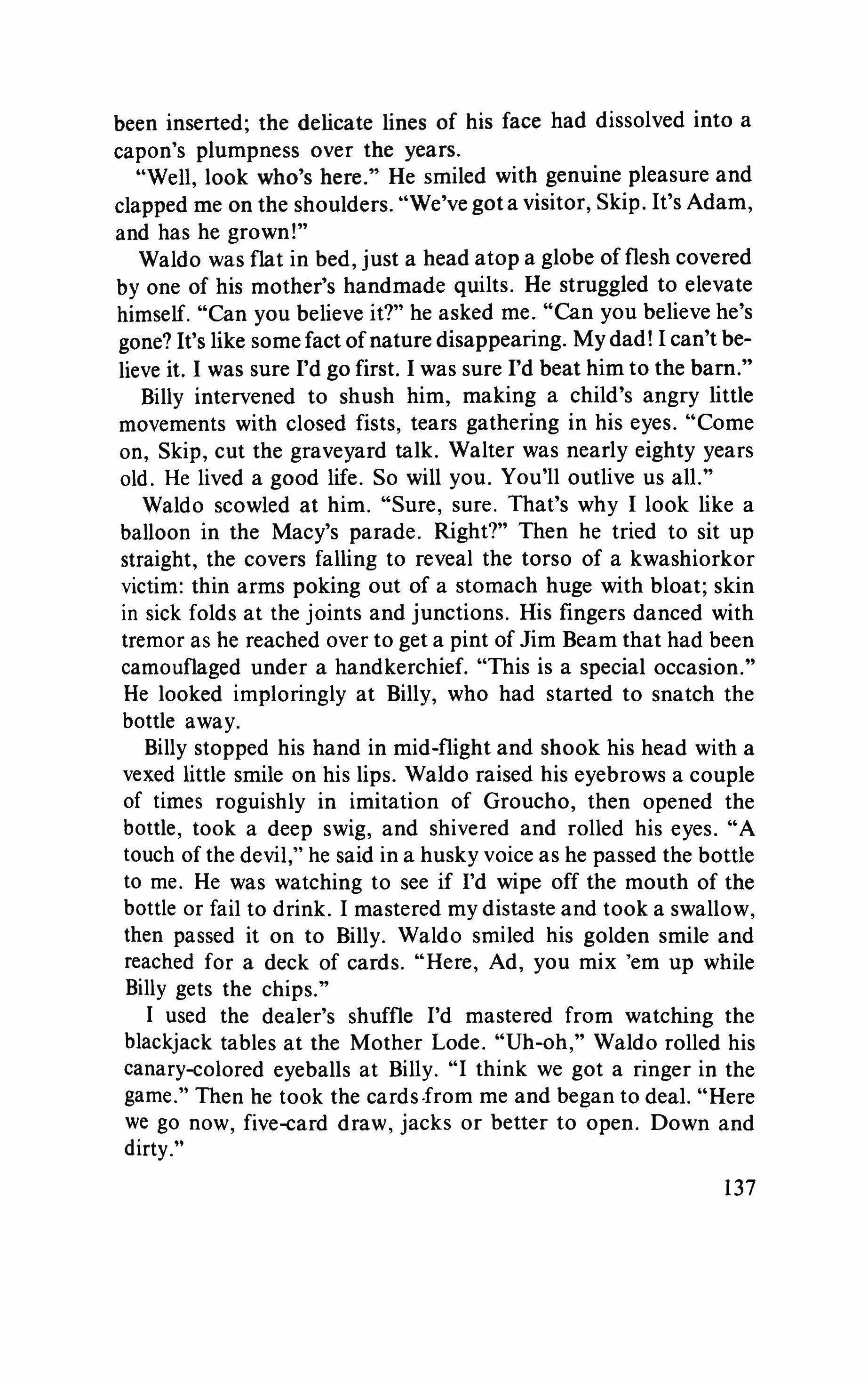
been inserted; the delicate lines of his face had dissolved into a capon's plumpness over the years.
"Well, look who's here." He smiled with genuine pleasure and clapped me on the shoulders. "We've gota visitor, Skip. It's Adam, and has he grown!"
Waldo was flat in bed, just a head atop a globe of flesh covered by one of his mother's handmade quilts. He struggled to elevate himself. "Can you believe it?" he asked me. "Can you believe he's gone? It's like some fact of nature disappearing. My dad! I can't believe it. I was sure I'd go first. I was sure I'd beat him to the barn."
Billy intervened to shush him, making a child's angry little movements with closed fists, tears gathering in his eyes. "Come on, Skip, cut the graveyard talk. Walter was nearly eighty years old. He lived a good life. So will you. You'll outlive us all."
Waldo scowled at him. "Sure, sure. That's why I look like a balloon in the Macy's parade. Right?" Then he tried to sit up straight, the covers falling to reveal the torso of a kwashiorkor victim: thin arms poking out of a stomach huge with bloat; skin in sick folds at the joints and junctions. His fingers danced with tremor as he reached over to get a pint of Jim Beam that had been camouflaged under a handkerchief. "This is a special occasion." He looked imploringly at Billy, who had started to snatch the bottle away.
Billy stopped his hand in mid-flight and shook his head with a vexed little smile on his lips. Waldo raised his eyebrows a couple of times roguishly in imitation of Groucho, then opened the bottle, took a deep swig, and shivered and rolled his eyes. "A touch of the devil," he said in a husky voice as he passed the bottle to me. He was watching to see if I'd wipe off the mouth of the bottle or fail to drink. I mastered my distaste and took a swallow, then passed it on to Billy. Waldo smiled his golden smile and reached for a deck of cards. "Here, Ad, you mix 'em up while Billy gets the chips."
1 used the dealer's shuffle I'd mastered from watching the blackjack tables at the Mother Lode. "Uh-oh," Waldo rolled his canary-colored eyeballs at Billy. "I think we got a ringer in the game." Then he took the cards-from me and began to deal. "Here we go now, five-card draw, jacks or better to open. Down and dirty."
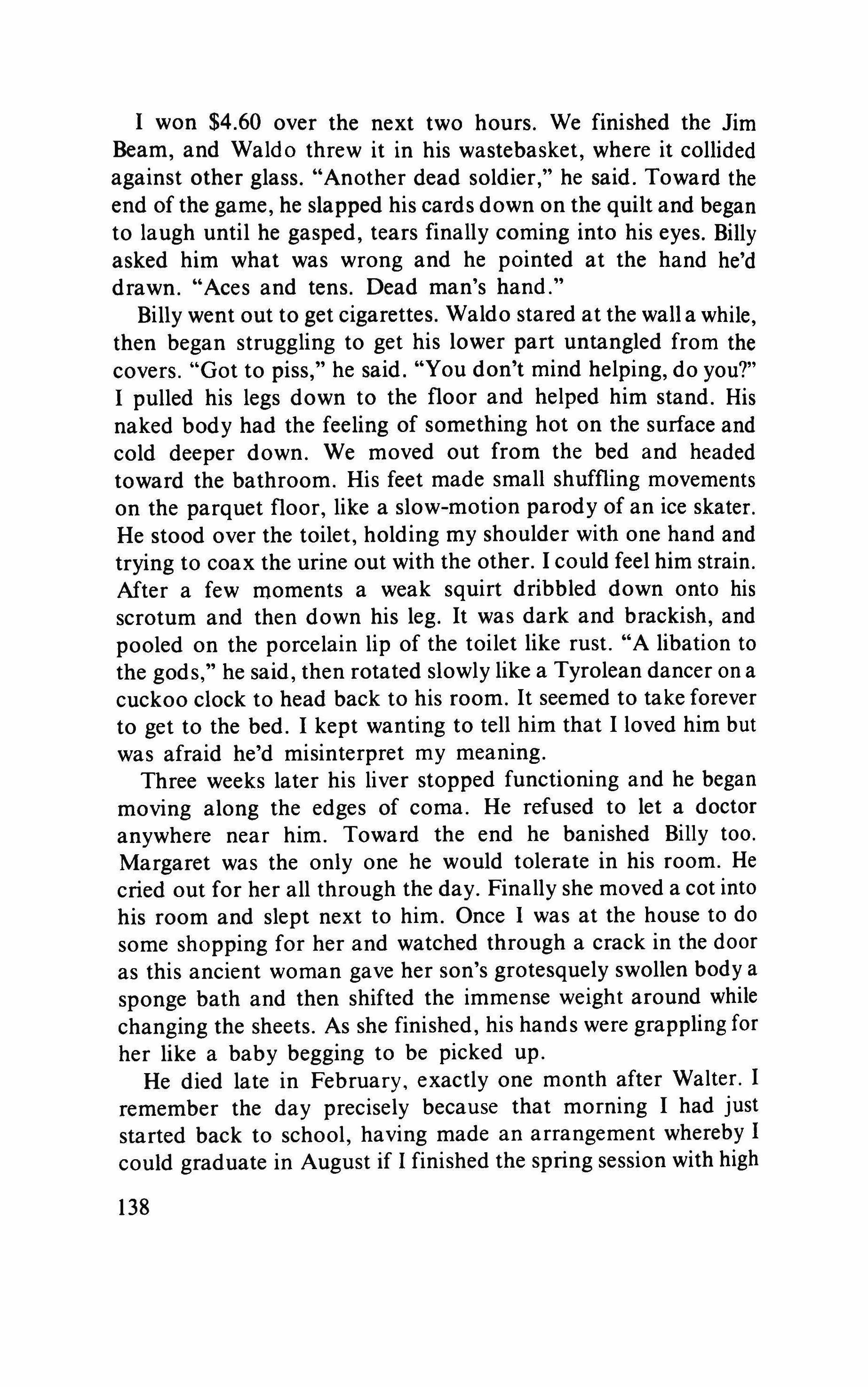
I won $4.60 over the next two hours. We finished the Jim Beam, and Waldo threw it in his wastebasket, where it collided against other glass. "Another dead soldier," he said. Toward the end of the game, he slapped his cards down on the quilt and began to laugh until he gasped, tears finally coming into his eyes. Billy asked him what was wrong and he pointed at the hand he'd drawn. "Aces and tens. Dead man's hand."
Billy went out to get cigarettes. Waldo stared at the wall a while, then began struggling to get his lower part untangled from the covers. "Got to piss," he said. "You don't mind helping, do you?" I pulled his legs down to the floor and helped him stand. His naked body had the feeling of something hot on the surface and cold deeper down. We moved out from the bed and headed toward the bathroom. His feet made small shuffling movements on the parquet floor, like a slow-motion parody of an ice skater. He stood over the toilet, holding my shoulder with one hand and trying to coax the urine out with the other. I could feel him strain. After a few moments a weak squirt dribbled down onto his scrotum and then down his leg. It was dark and brackish, and pooled on the porcelain lip of the toilet like rust. "A libation to the gods," he said, then rotated slowly like a Tyrolean dancer on a cuckoo clock to head back to his room. It seemed to take forever to get to the bed. I kept wanting to tell him that I loved him but was afraid he'd misinterpret my meaning.
Three weeks later his liver stopped functioning and he began moving along the edges of coma. He refused to let a doctor anywhere near him. Toward the end he banished Billy too. Margaret was the only one he would tolerate in his room. He cried out for her all through the day. Finally she moved a cot into his room and slept next to him. Once I was at the house to do some shopping for her and watched through a crack in the door as this ancient woman gave her son's grotesquely swollen body a sponge bath and then shifted the immense weight around while changing the sheets. As she finished, his hands were grappling for her like a baby begging to be picked up.
He died late in February, exactly one month after Walter. I remember the day precisely because that morning I had just started back to school, having made an arrangement whereby I could graduate in August if I finished the spring session with high
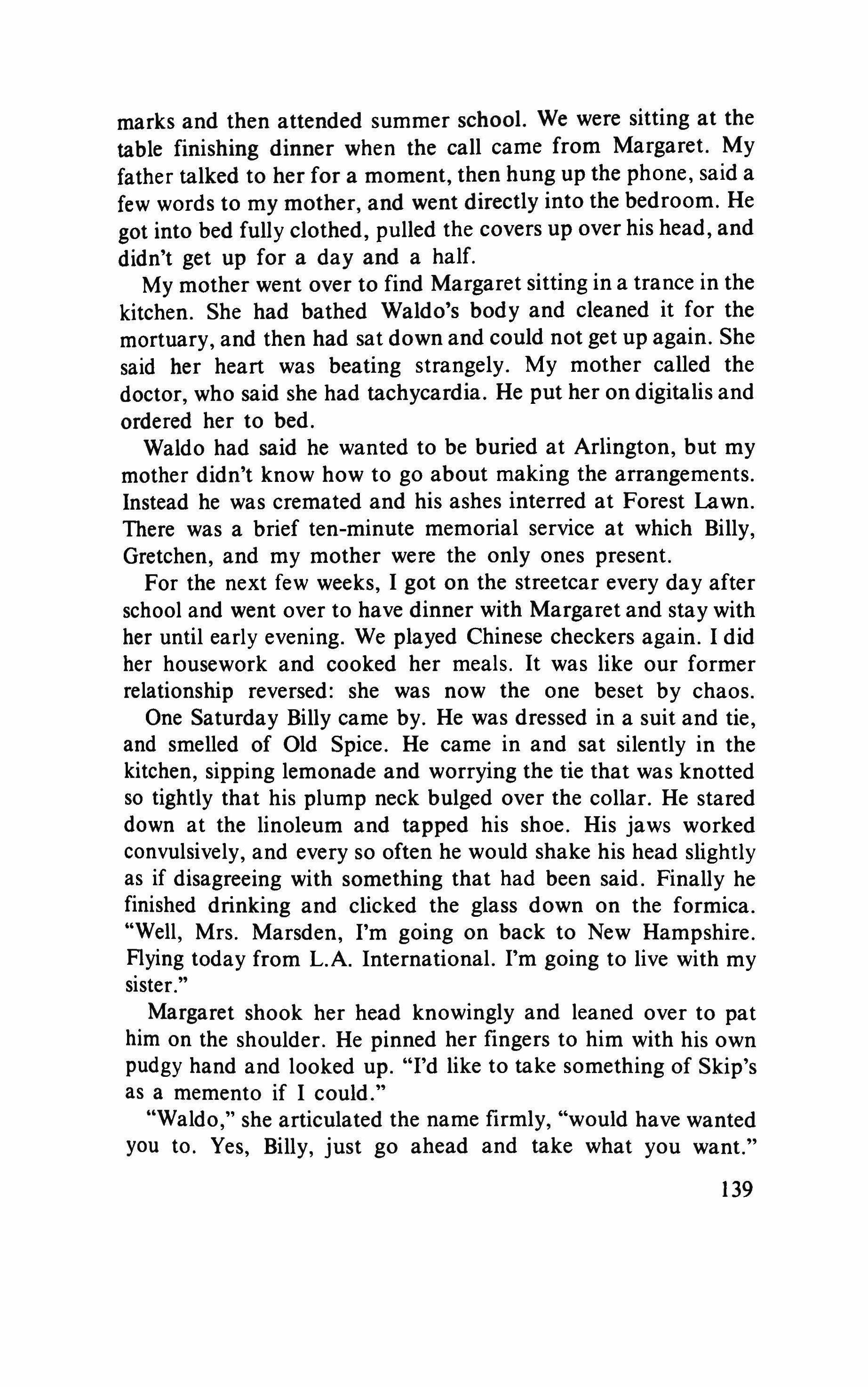
marks and then attended summer school. We were sitting at the table finishing dinner when the call came from Margaret. My father talked to her for a moment, then hung up the phone, said a few words to my mother, and went directly into the bedroom. He got into bed fully clothed, pulled the covers up over his head, and didn't get up for a day and a half.
My mother went over to find Margaret sitting in a trance in the kitchen. She had bathed Waldo's body and cleaned it for the mortuary, and then had sat down and could not get up again. She said her heart was beating strangely. My mother called the doctor, who said she had tachycardia. He put her on digitalis and ordered her to bed.
Waldo had said he wanted to be buried at Arlington, but my mother didn't know how to go about making the arrangements. Instead he was cremated and his ashes interred at Forest Lawn. There was a brief ten-minute memorial service at which Billy, Gretchen, and my mother were the only ones present.
For the next few weeks, I got on the streetcar every day after school and went over to have dinner with Margaret and stay with her until early evening. We played Chinese checkers again. I did her housework and cooked her meals. It was like our former relationship reversed: she was now the one beset by chaos.
One Saturday Billy came by. He was dressed in a suit and tie, and smelled of Old Spice. He came in and sat silently in the kitchen, sipping lemonade and worrying the tie that was knotted so tightly that his plump neck bulged over the collar. He stared down at the linoleum and tapped his shoe. His jaws worked convulsively, and every so often he would shake his head slightly as if disagreeing with something that had been said. Finally he finished drinking and clicked the glass down on the formica. "Well, Mrs. Marsden, I'm going on back to New Hampshire. Flying today from L.A. International. I'm going to live with my sister."
Margaret shook her head knowingly and leaned over to pat him on the shoulder. He pinned her fingers to him with his own pudgy hand and looked up. "I'd like to take something of Skip's as a memento if I could."
"Waldo," she articulated the name firmly, "would have wanted you to. Yes, Billy, just go ahead and take what you want."
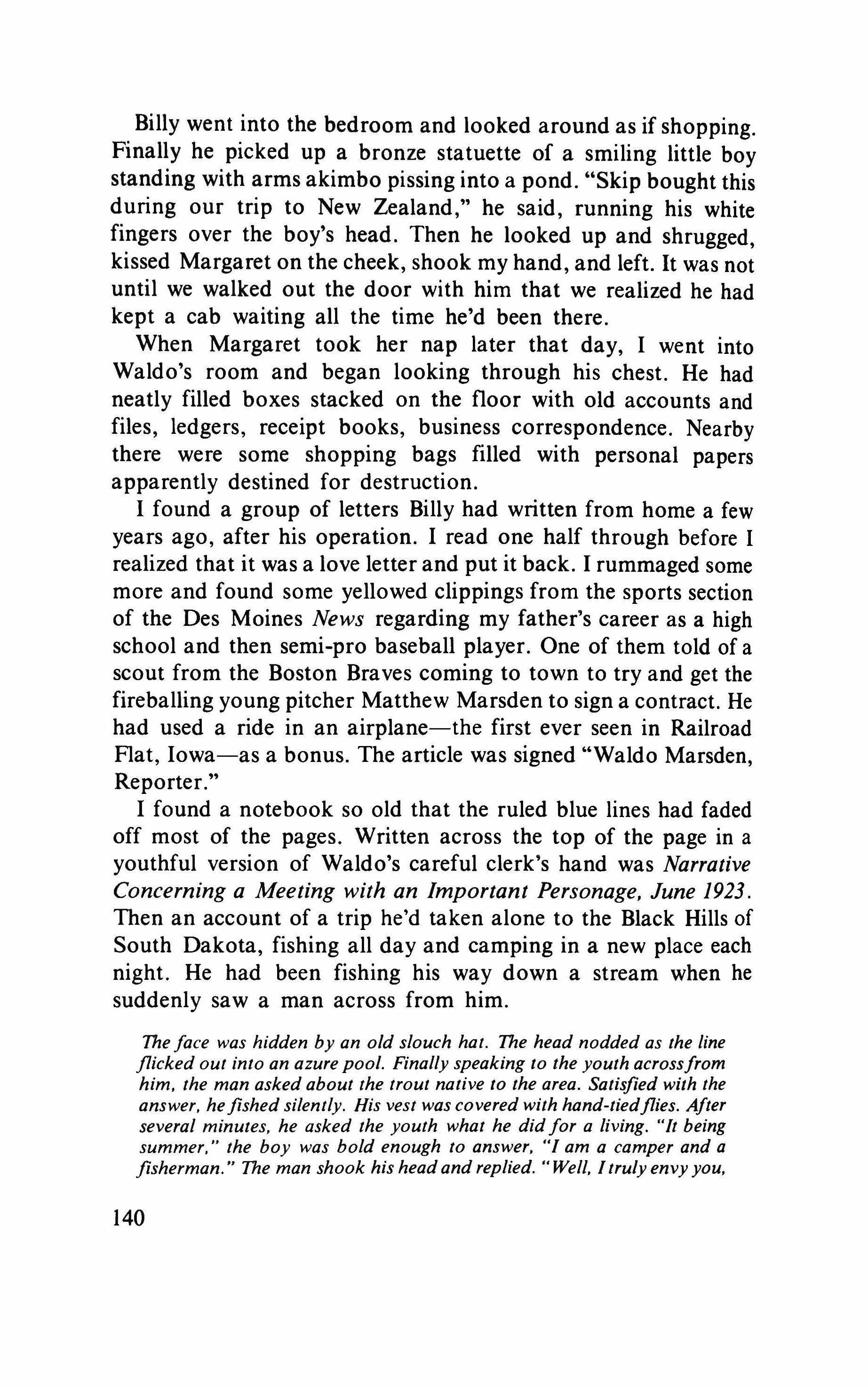
Billy went into the bedroom and looked around as if shopping. Finally he picked up a bronze statuette of a smiling little boy standing with arms akimbo pissing into a pond. "Skip bought this during our trip to New Zealand," he said, running his white fingers over the boy's head. Then he looked up and shrugged, kissed Margaret on the cheek, shook my hand, and left. It was not until we walked out the door with him that we realized he had kept a cab waiting all the time he'd been there.
When Margaret took her nap later that day, I went into Waldo's room and began looking through his chest. He had neatly filled boxes stacked on the floor with old accounts and files, ledgers, receipt books, business correspondence. Nearby there were some shopping bags filled with personal papers apparently destined for destruction.
I found a group of letters Billy had written from home a few years ago, after his operation. I read one half through before I realized that it was a love letter and put it back. I rummaged some more and found some yellowed clippings from the sports section of the Des Moines News regarding my father's career as a high school and then semi-pro baseball player. One of them told of a scout from the Boston Braves coming to town to try and get the fireballing young pitcher Matthew Marsden to sign a contract. He had used a ride in an airplane-the first ever seen in Railroad Flat, Iowa-as a bonus. The article was signed "Waldo Marsden, Reporter."
I found a notebook so old that the ruled blue lines had faded off most of the pages. Written across the top of the page in a youthful version of Waldo's careful clerk's hand was Narrative Concerning a Meeting with an Important Personage, June 1923. Then an account of a trip he'd taken alone to the Black Hills of South Dakota, fishing all day and camping in a new place each night. He had been fishing his way down a stream when he suddenly saw a man across from him.
The face was hidden by an old slouch hat. The head nodded as the line flicked out into an azure pool. Finally speaking to the youth acrossfrom him. the man asked about the trout native to the area. Satisfied with the answer. hefished silently. His vest was covered with hand-tiedflies. A/ter several minutes. he asked the youth what he didfor a living. "It being summer." the boy was bold enough to answer. "I am a camper and a fisherman." The man shook his head and replied." Well. Itruly envy you.
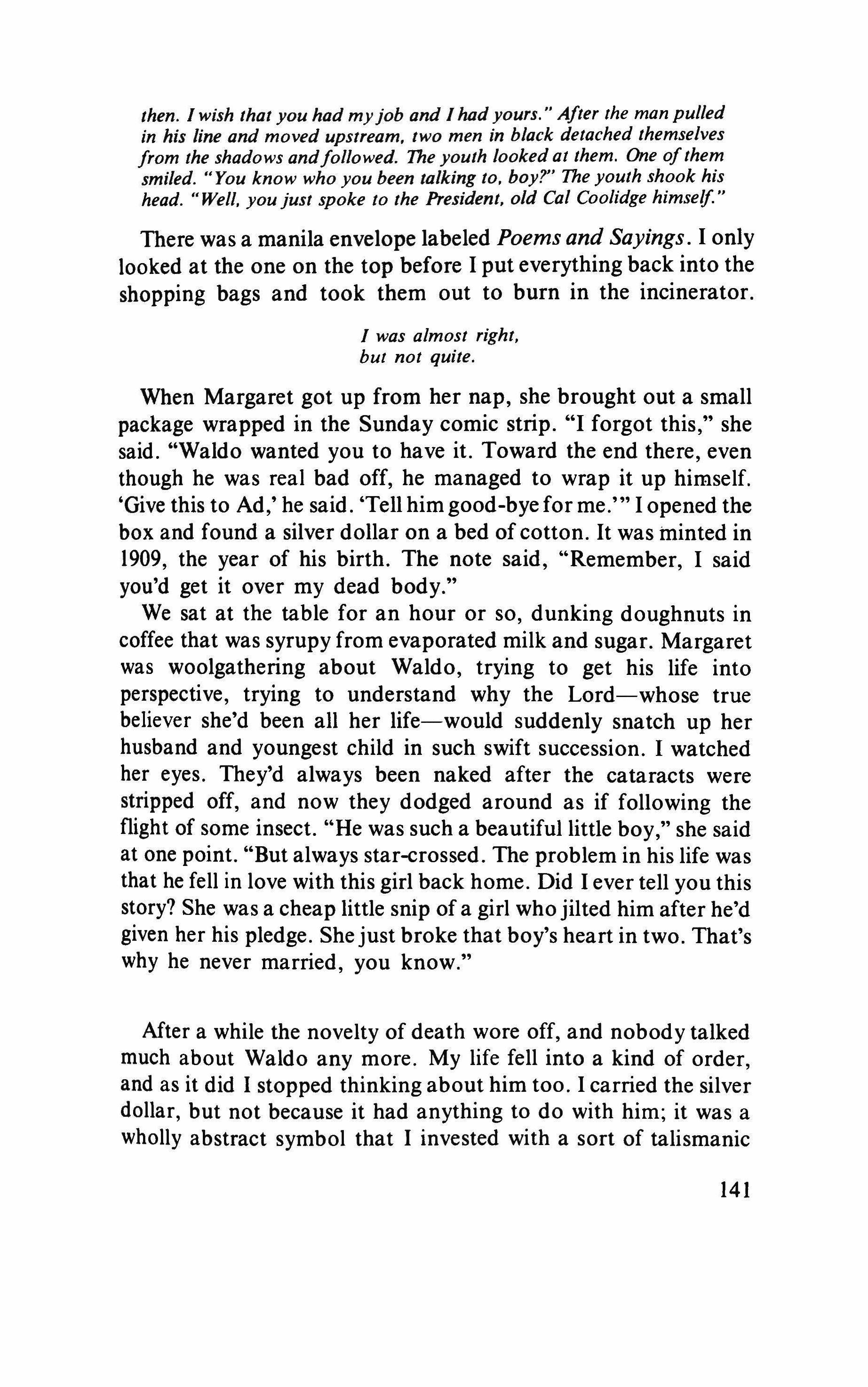
then. I wish that you had myjob and I had yours." After the man pulled in his line and moved upstream. two men in black detached themselves from the shadows andfollowed. The youth looked at them. One ofthem smiled. "You know who you been talking to. boy?" The youth shook his head. "Well. you just spoke to the President. old Cal Coolidge himself"
There was a manila envelope labeled Poems and Sayings. 1 only looked at the one on the top before 1 put everything back into the shopping bags and took them out to burn in the incinerator.
I was almost right. but not quite.
When Margaret got up from her nap, she brought out a small package wrapped in the Sunday comic strip. "I forgot this," she said. "Waldo wanted you to have it. Toward the end there, even though he was real bad off, he managed to wrap it up himself. 'Give this to Ad,' he said. 'Tell him good-bye for me." 1 opened the box and found a silver dollar on a bed of cotton. It was minted in 1909, the year of his birth. The note said, "Remember, 1 said you'd get it over my dead body."
We sat at the table for an hour or so, dunking doughnuts in coffee that was syrupy from evaporated milk and sugar. Margaret was woolgathering about Waldo, trying to get his life into perspective, trying to understand why the Lord-whose true believer she'd been all her life-would suddenly snatch up her husband and youngest child in such swift succession. 1 watched her eyes. They'd always been naked after the cataracts were stripped off, and now they dodged around as if following the flight of some insect. "He was such a beautiful little boy," she said at one point. "But always star-crossed. The problem in his life was that he fell in love with this girl back home. Did I ever tell you this story? She was a cheap little snip of a girl who jilted him after he'd given her his pledge. She just broke that boy's heart in two. That's why he never married, you know."
After a while the novelty of death wore off, and nobody talked much about Waldo any more. My life fell into a kind of order, and as it did I stopped thinking about him too. I carried the silver dollar, but not because it had anything to do with him; it was a wholly abstract symbol that I invested with a sort of talismanic
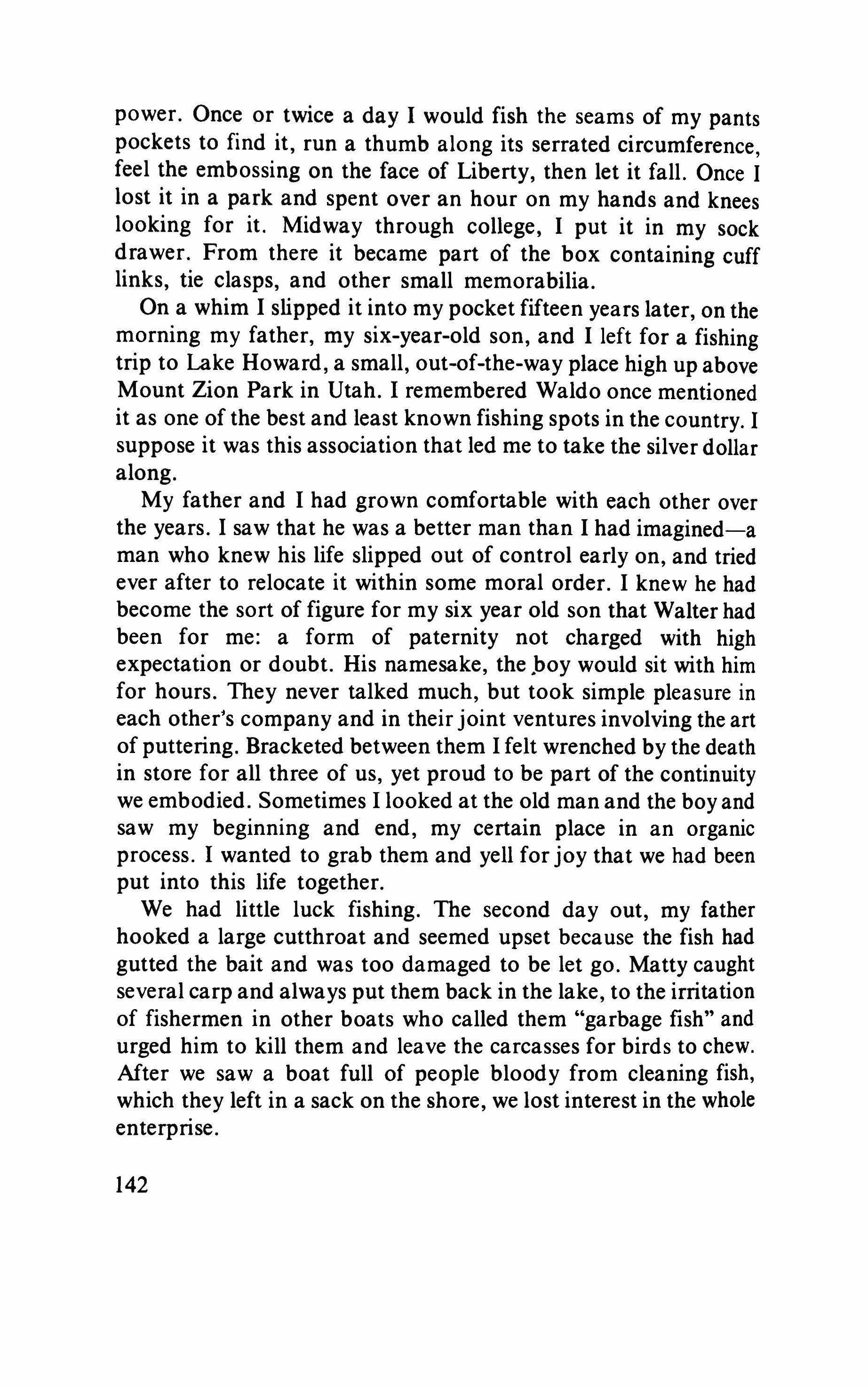
power. Once or twice a day I would fish the seams of my pants pockets to find it, run a thumb along its serrated circumference, feel the embossing on the face of Liberty, then let it fall. Once I lost it in a park and spent over an hour on my hands and knees looking for it. Midway through college, I put it in my sock drawer. From there it became part of the box containing cuff links, tie clasps, and other small memorabilia.
On a whim I slipped it into my pocket fifteen years later, on the morning my father, my six-year-old son, and I left for a fishing trip to Lake Howard, a small, out-of-the-way place high up above Mount Zion Park in Utah. I remembered Waldo once mentioned it as one of the best and least known fishing spots in the country. I suppose it was this association that led me to take the silver dollar along.
My father and I had grown comfortable with each other over the years. I saw that he was a better man than I had imagined-a man who knew his life slipped out of control early on, and tried ever after to relocate it within some moral order. I knew he had become the sort of figure for my six year old son that Walter had been for me: a form of paternity not charged with high expectation or doubt. His namesake, the ,boy would sit with him for hours. They never talked much, but took simple pleasure in each other's company and in their joint ventures involving the art of puttering. Bracketed between them I felt wrenched by the death in store for all three of us, yet proud to be part of the continuity we embodied. Sometimes I looked at the old man and the boy and saw my beginning and end, my certain place in an organic process. I wanted to grab them and yell for joy that we had been put into this life together.
We had little luck fishing. The second day out, my father hooked a large cutthroat and seemed upset because the fish had gutted the bait and was too damaged to be let go. Matty caught several carp and always put them back in the lake, to the irritation of fishermen in other boats who called them "garbage fish" and urged him to kill them and leave the carcasses for birds to chew. After we saw a boat full of people bloody from cleaning fish, which they left in a sack on the shore, we lost interest in the whole enterprise.
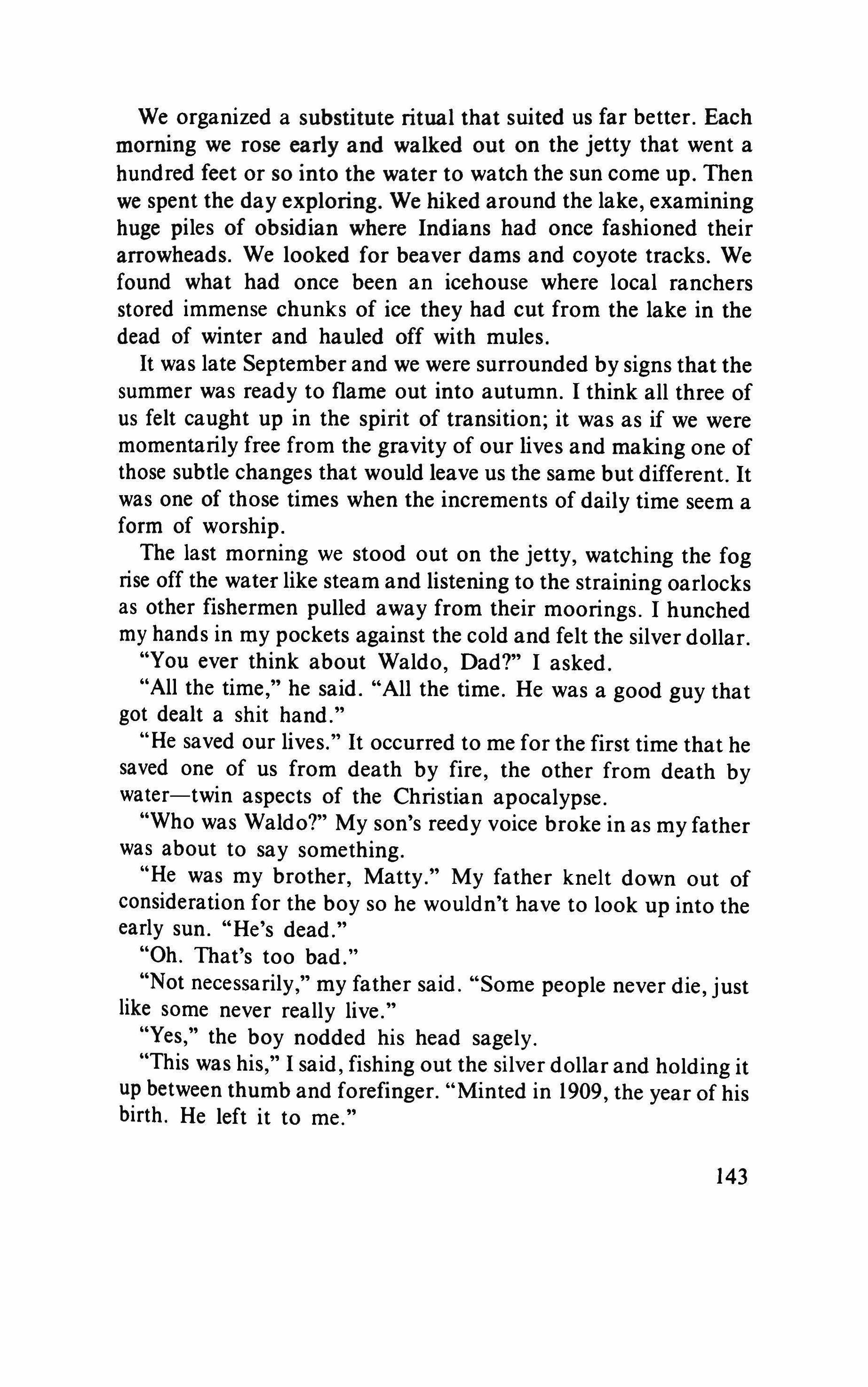
We organized a substitute ritual that suited us far better. Each morning we rose early and walked out on the jetty that went a hundred feet or so into the water to watch the sun come up. Then we spent the day exploring. We hiked around the lake, examining huge piles of obsidian where Indians had once fashioned their arrowheads. We looked for beaver dams and coyote tracks. We found what had once been an icehouse where local ranchers stored immense chunks of ice they had cut from the lake in the dead of winter and hauled off with mules.
It was late September and we were surrounded by signs that the summer was ready to flame out into autumn. I think all three of us felt caught up in the spirit of transition; it was as if we were momentarily free from the gravity of our lives and making one of those subtle changes that would leave us the same but different. It was one of those times when the increments of daily time seem a form of worship.
The last morning we stood out on the jetty, watching the fog rise off the water like steam and listening to the straining oarlocks as other fishermen pulled away from their moorings. I hunched my hands in my pockets against the cold and felt the silver dollar.
"You ever think about Waldo, Dad?" I asked.
"All the time," he said. "All the time. He was a good guy that got dealt a shit hand."
"He saved our lives." It occurred to me for the first time that he saved one of us from death by fire, the other from death by water-twin aspects of the Christian apocalypse.
"Who was Waldo?" My son's reedy voice broke in as my father was about to say something.
"He was my brother, Matty." My father knelt down out of consideration for the boy so he wouldn't have to look up into the early sun. "He's dead."
"Oh. That's too bad."
"Not necessarily," my father said. "Some people never die, just like some never really live."
"Yes," the boy nodded his head sagely.
"This was his," I said, fishing out the silver dollar and holding it up between thumb and forefinger. "Minted in 1909, the year of his birth. He left it to me."
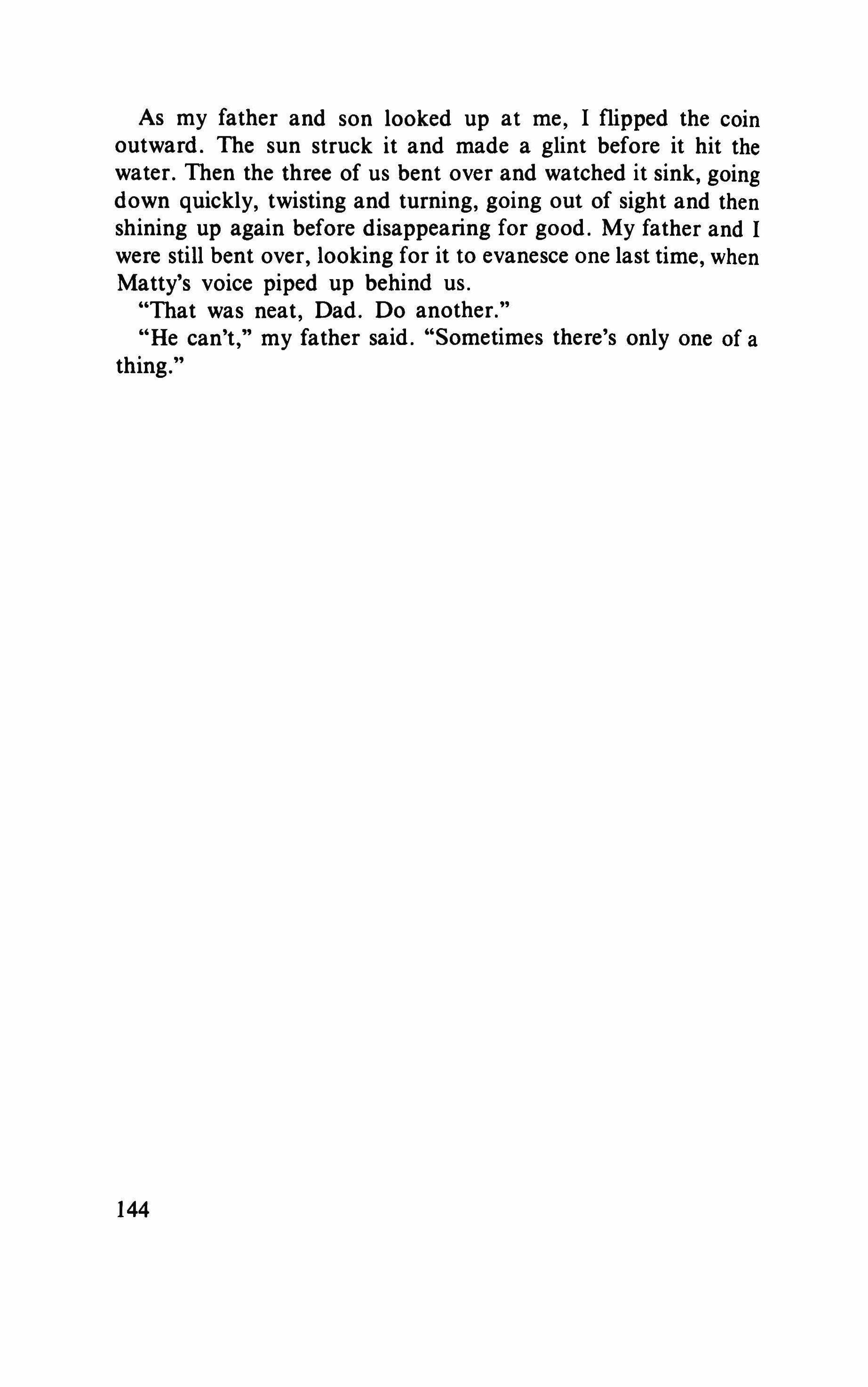
As my father and son looked up at me, I flipped the coin outward. The sun struck it and made a glint before it hit the water. Then the three of us bent over and watched it sink, going down quickly, twisting and turning, going out of sight and then shining up again before disappearing for good. My father and I were still bent over, looking for it to evanesce one last time, when Matty's voice piped up behind us.
"That was neat, Dad. Do another."
"He can't," my father said. "Sometimes there's only one of a thing."
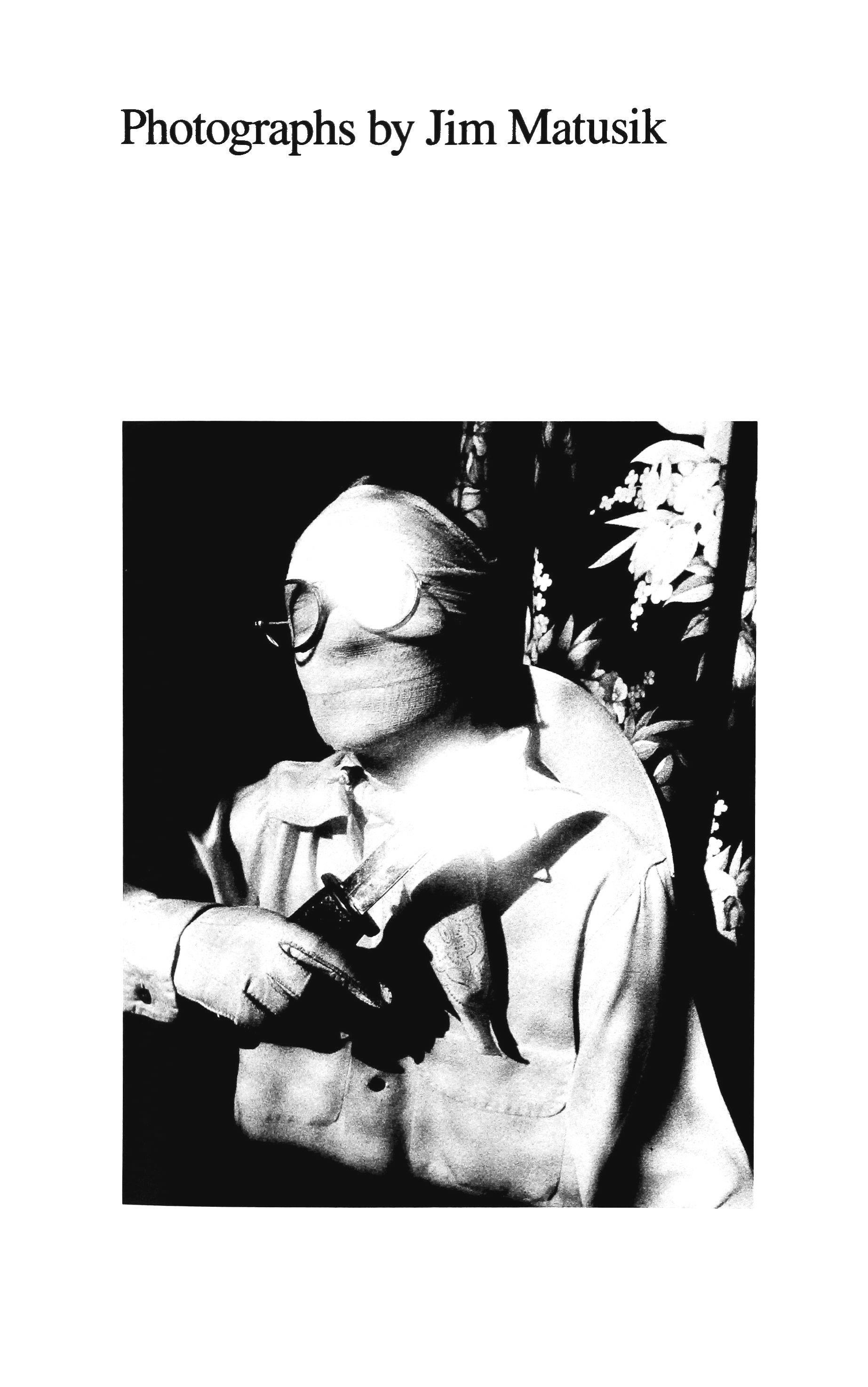
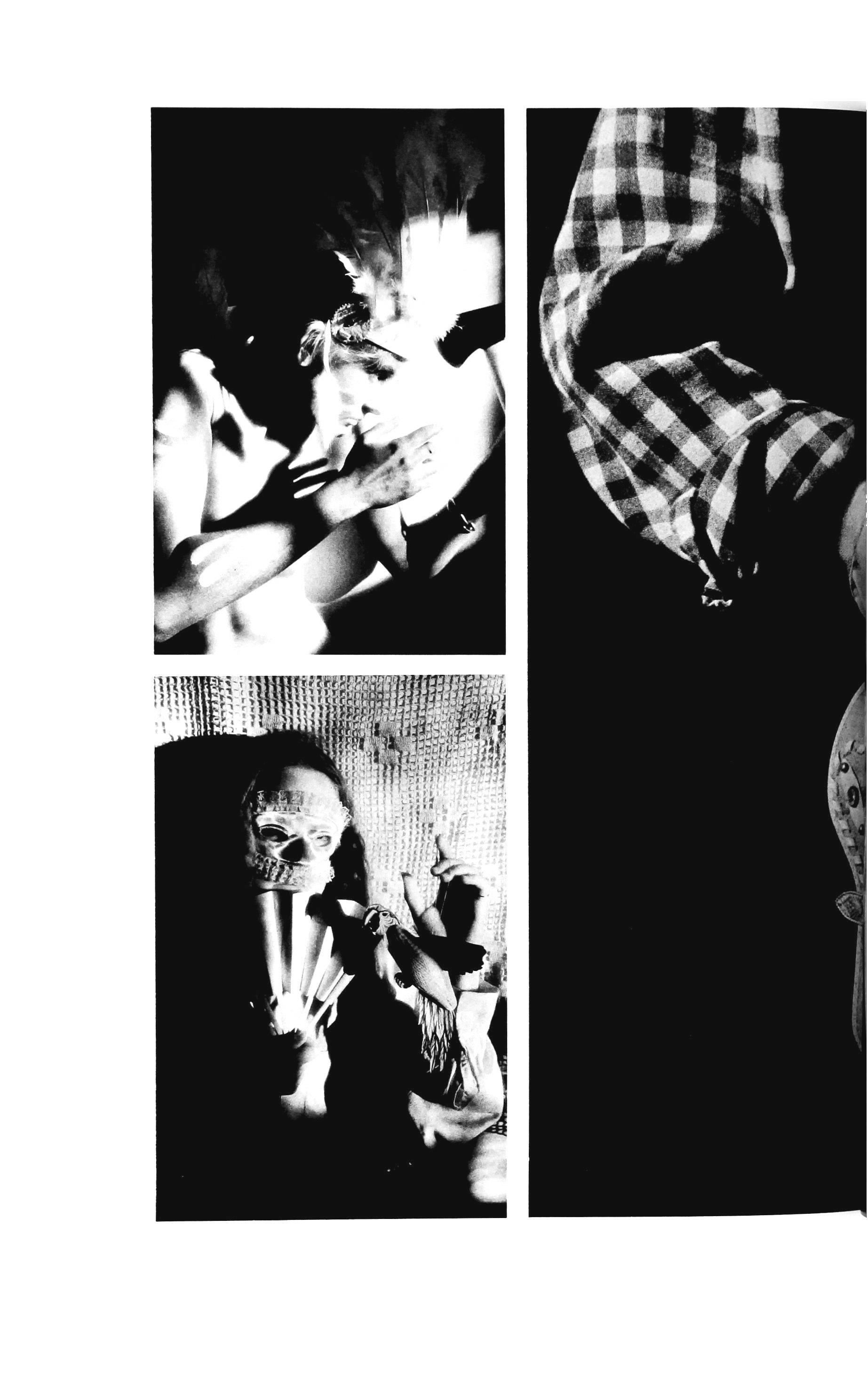
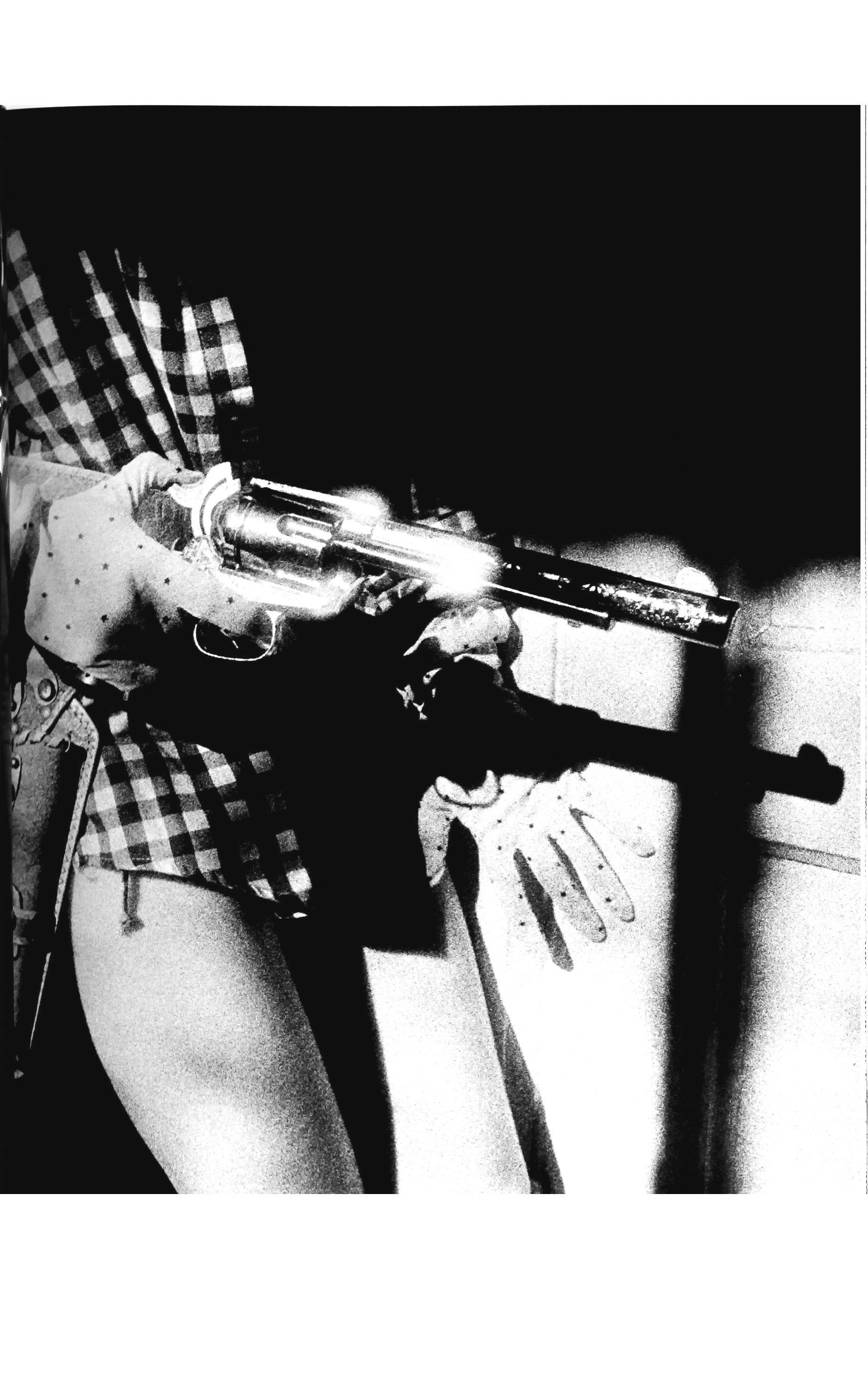
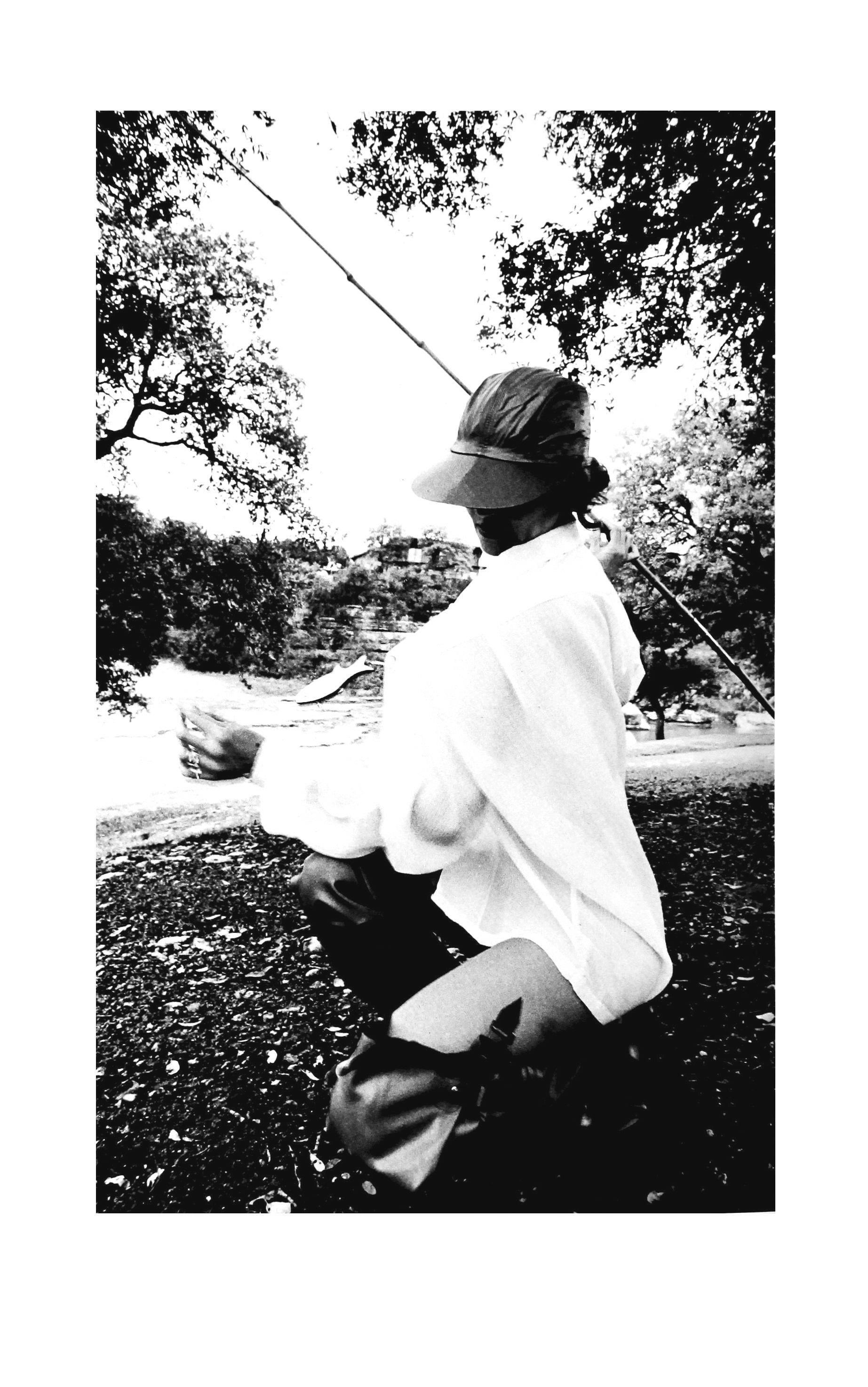
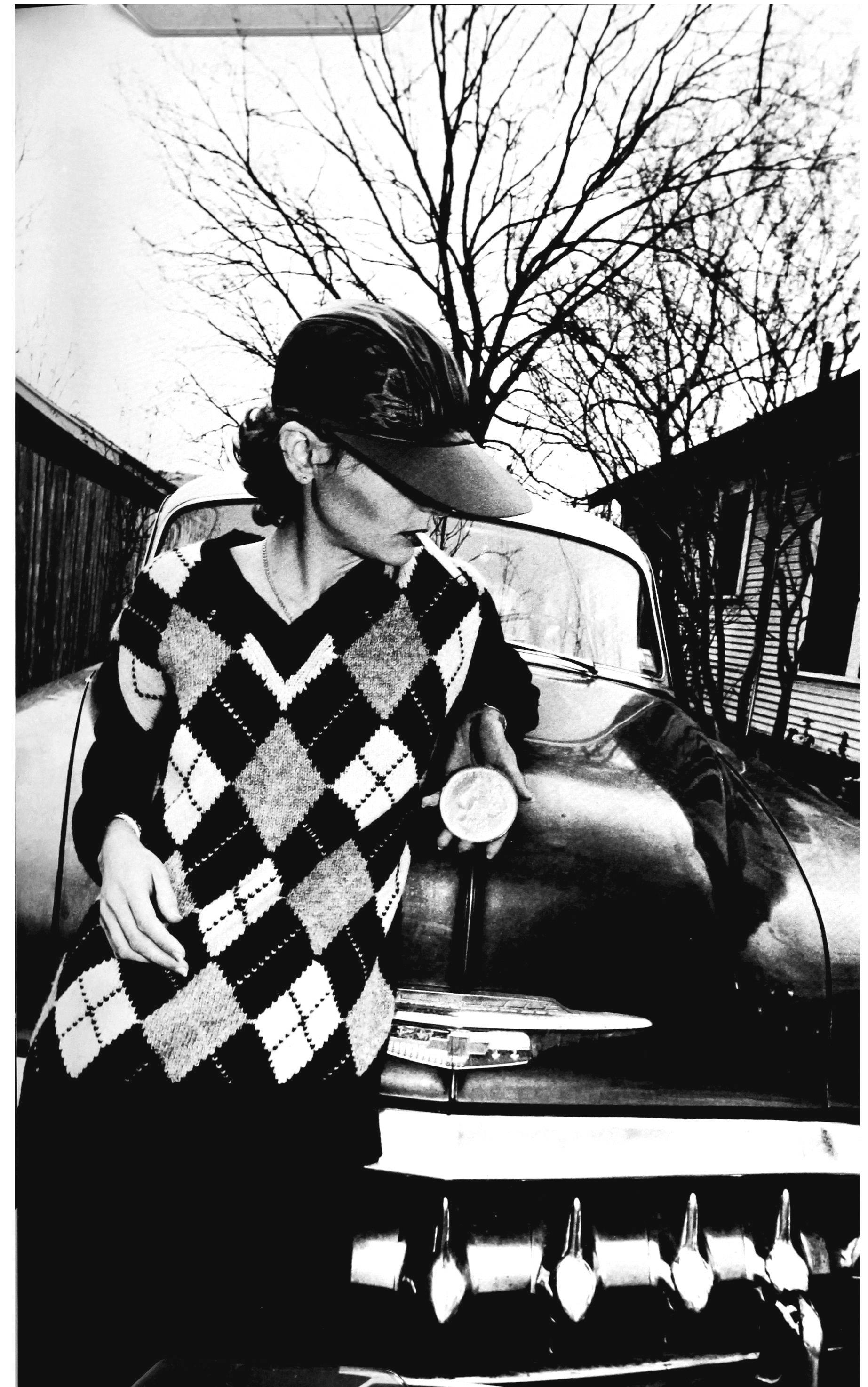
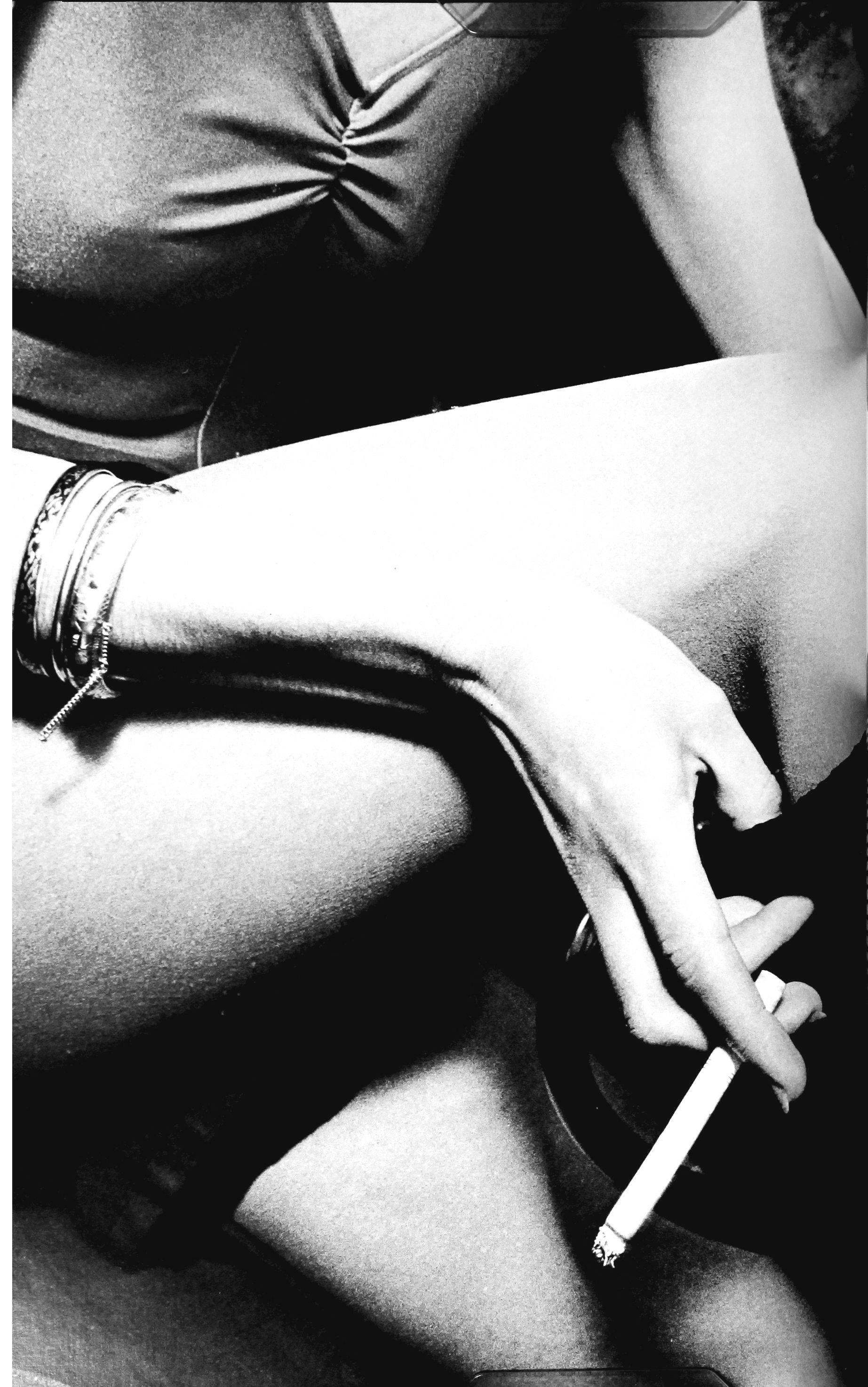
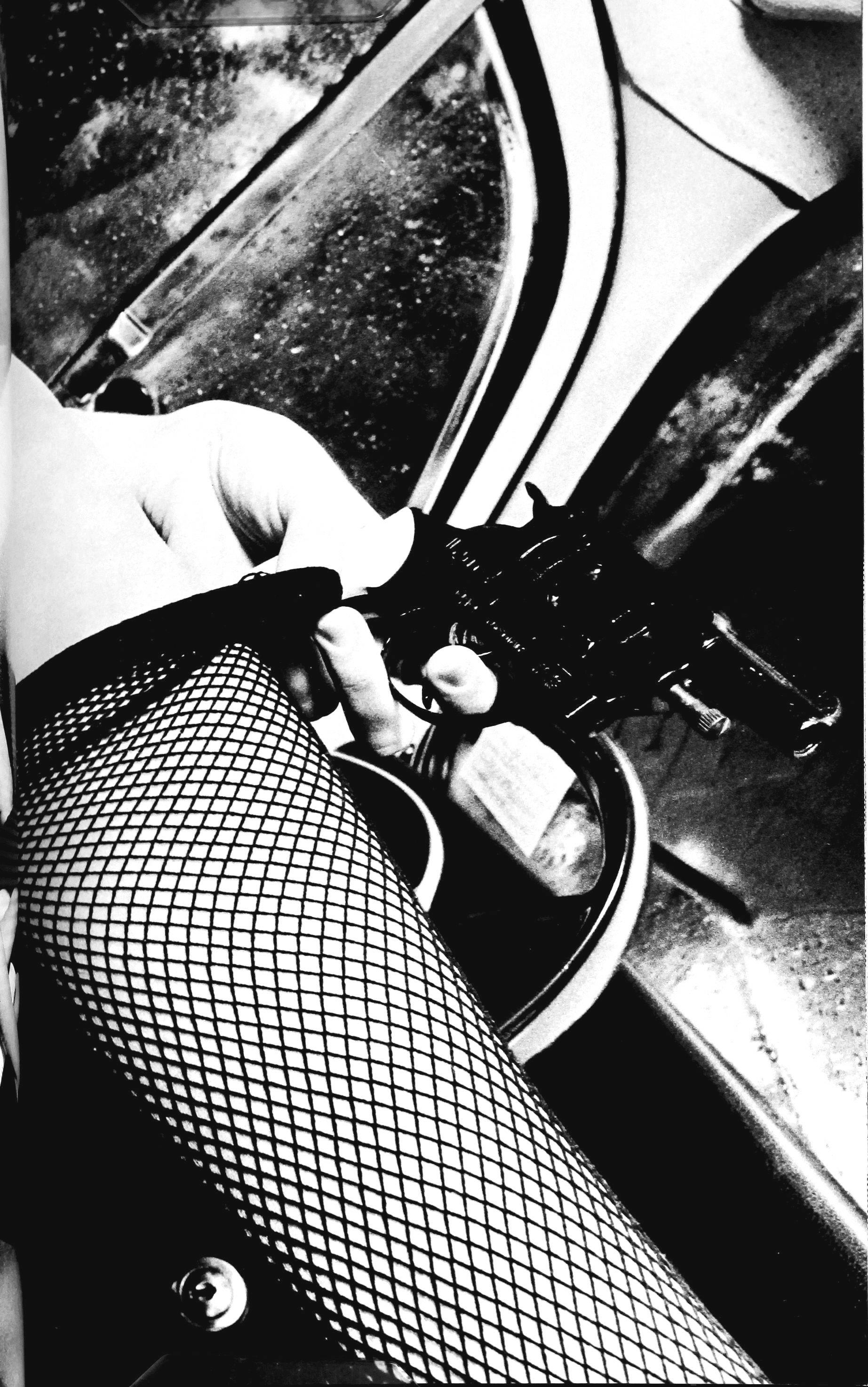
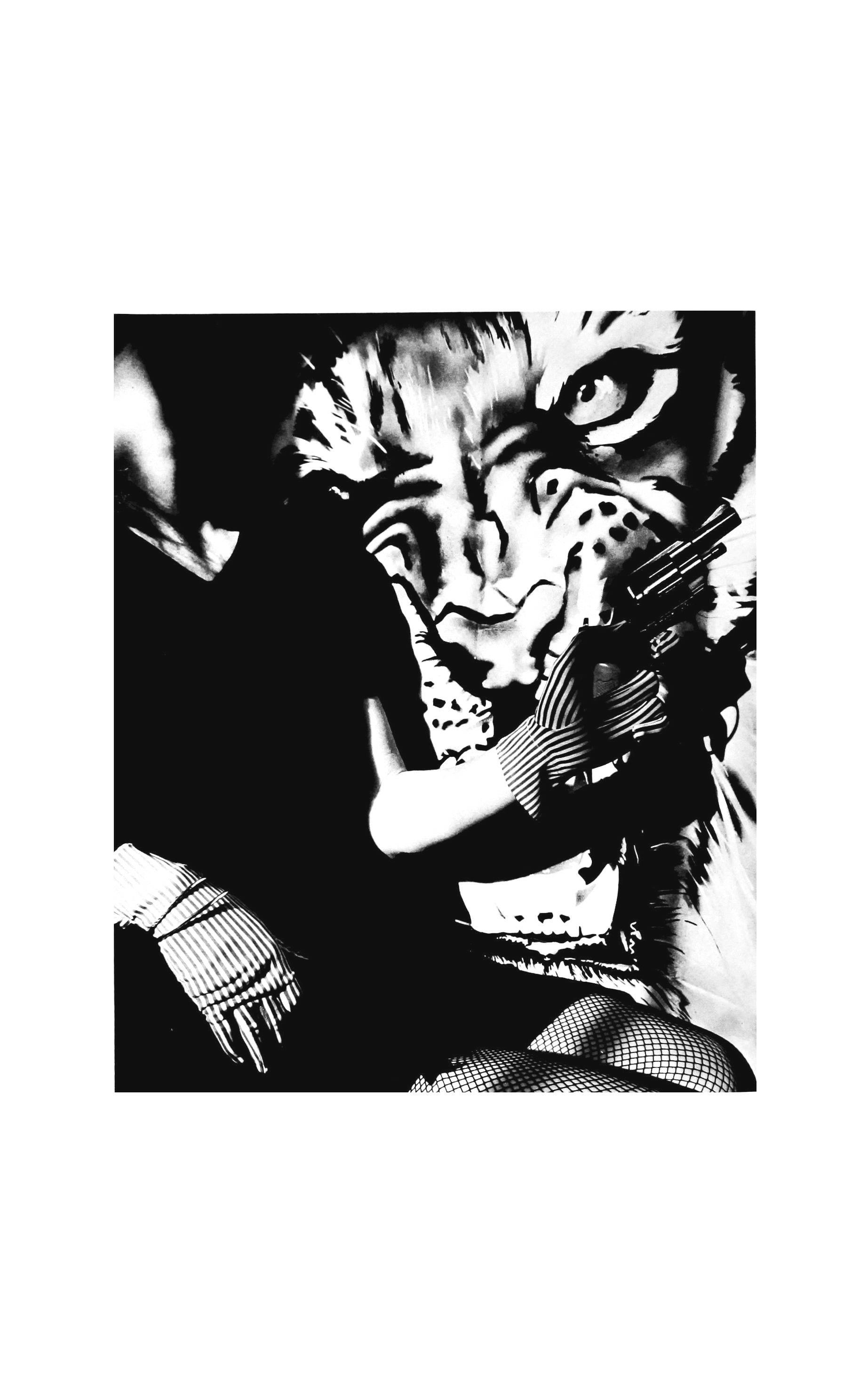
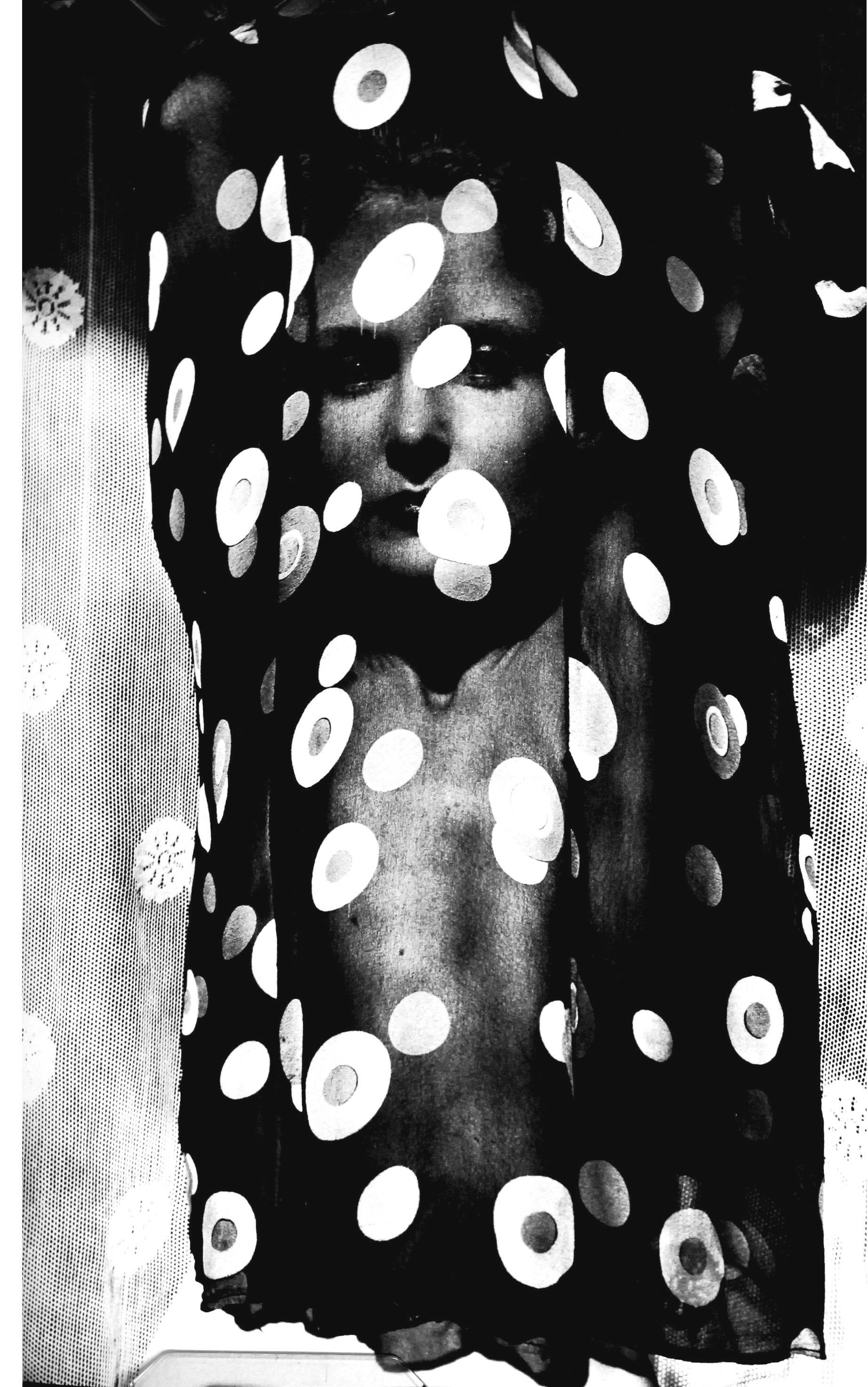
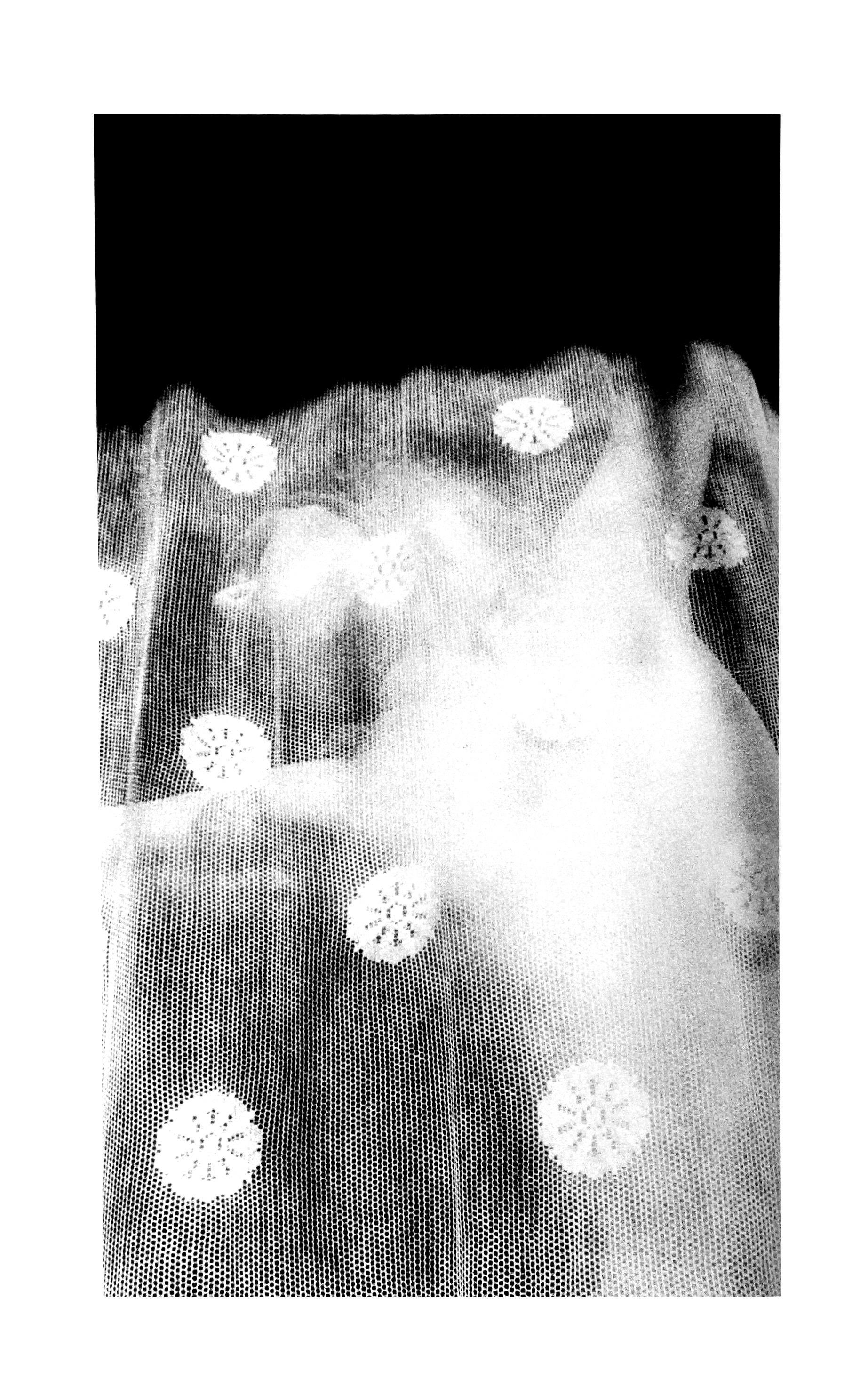
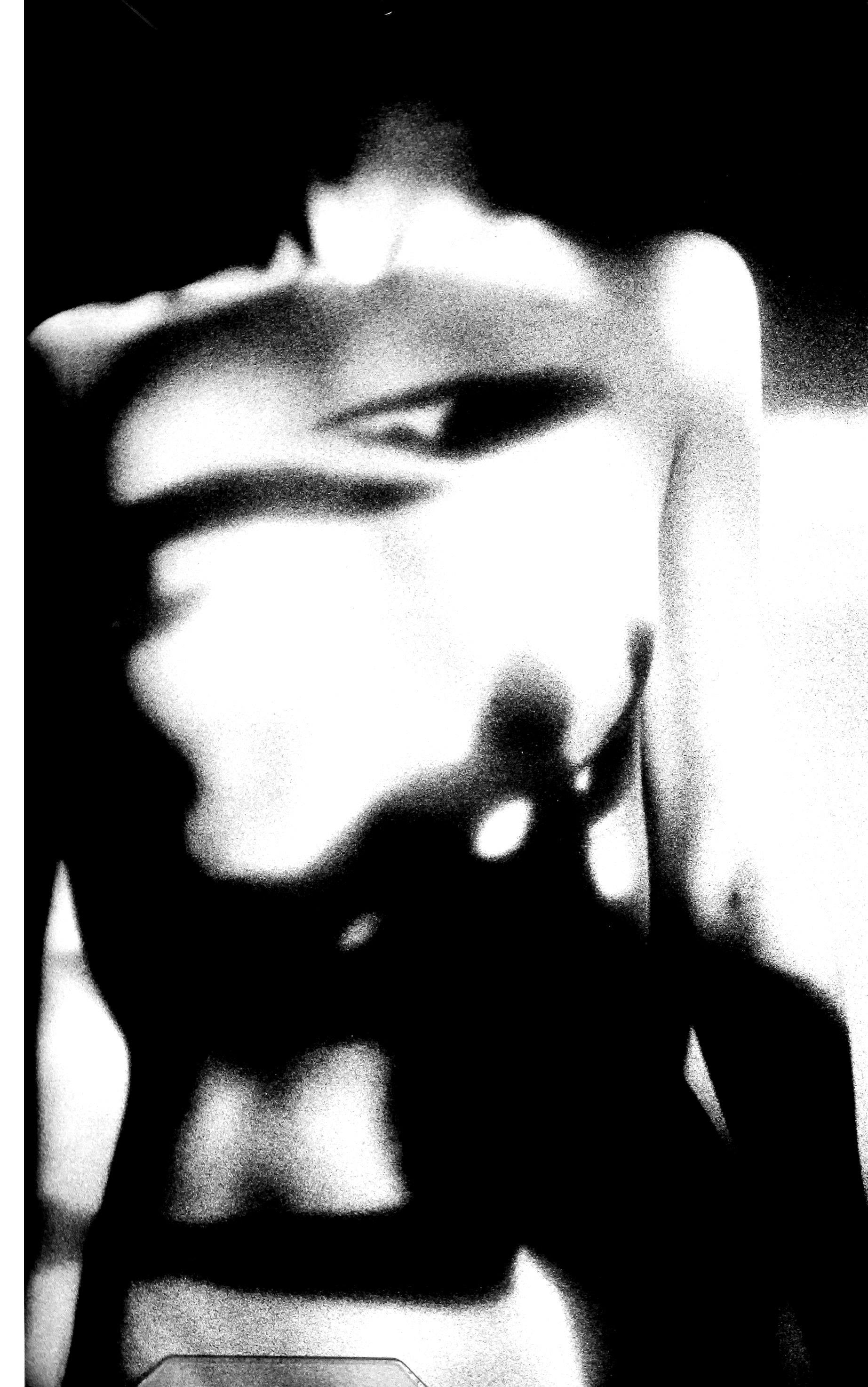
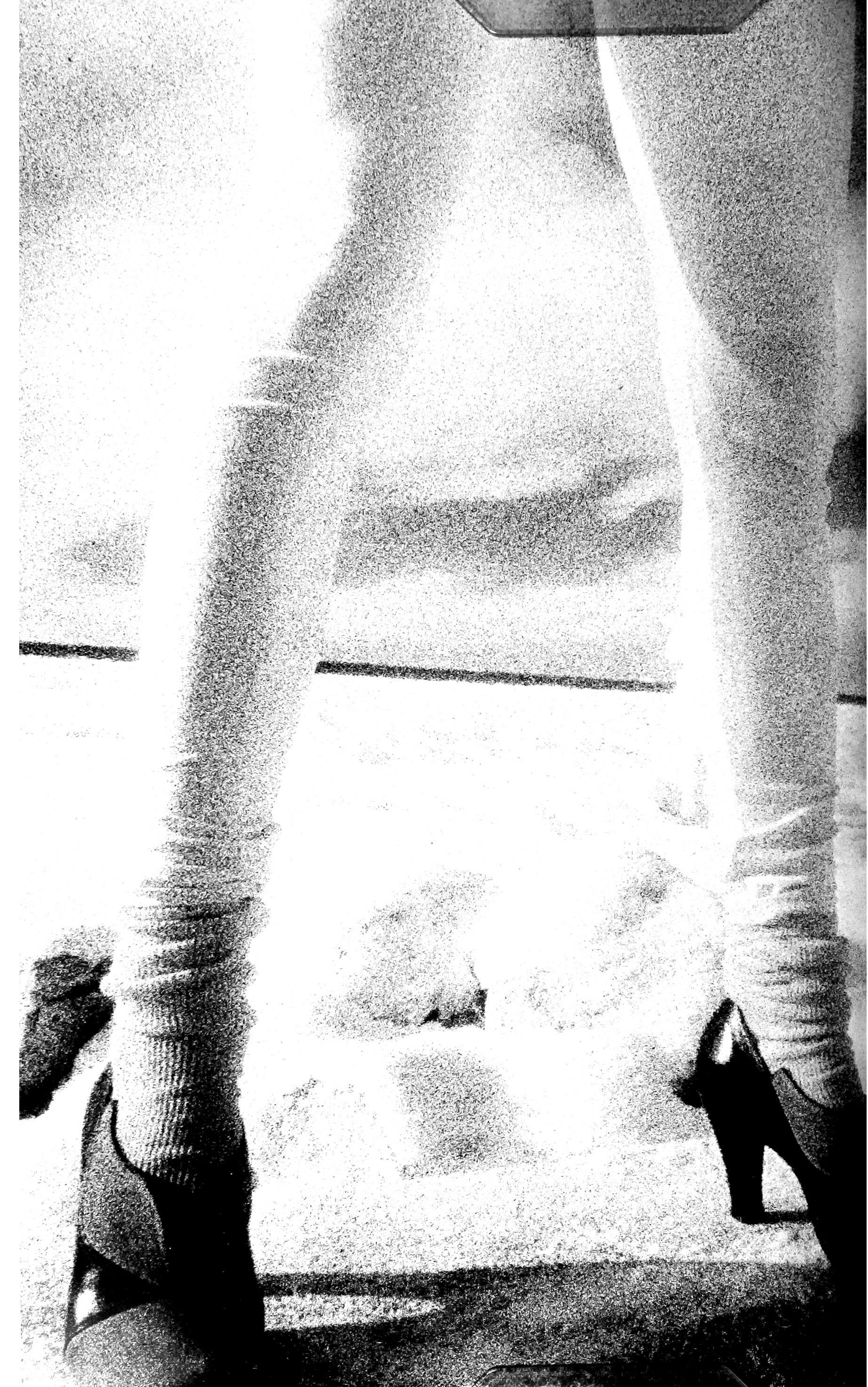
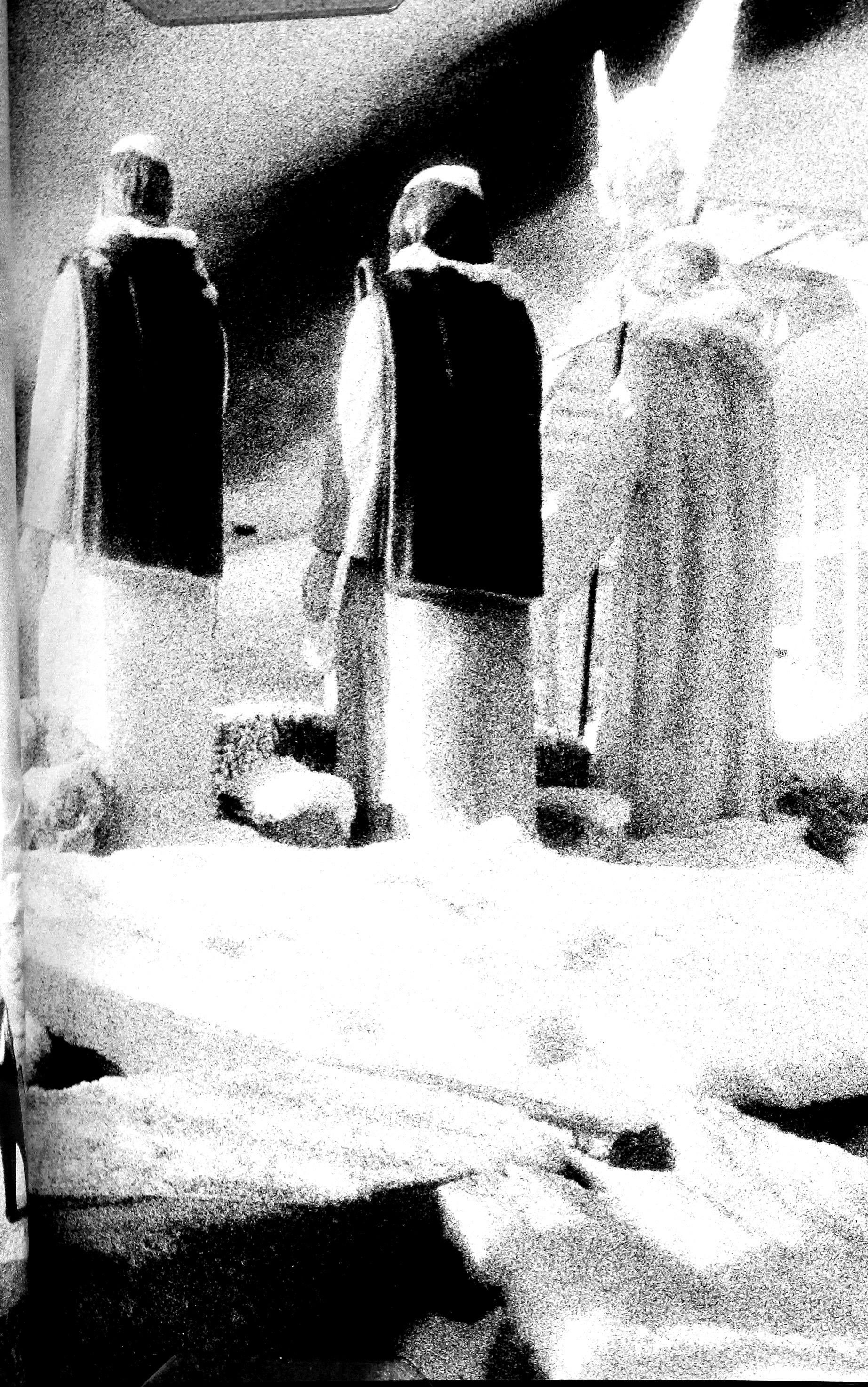
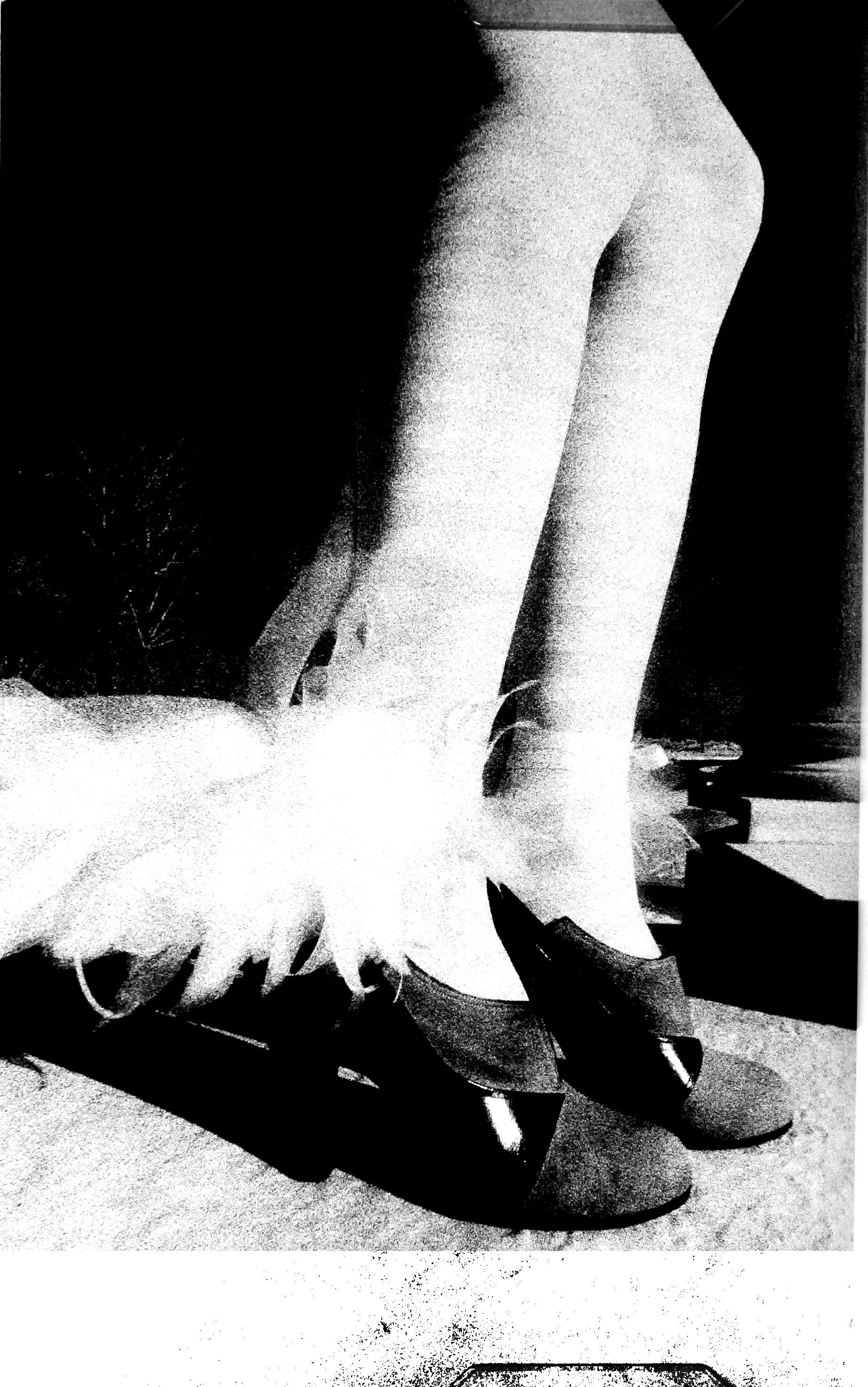
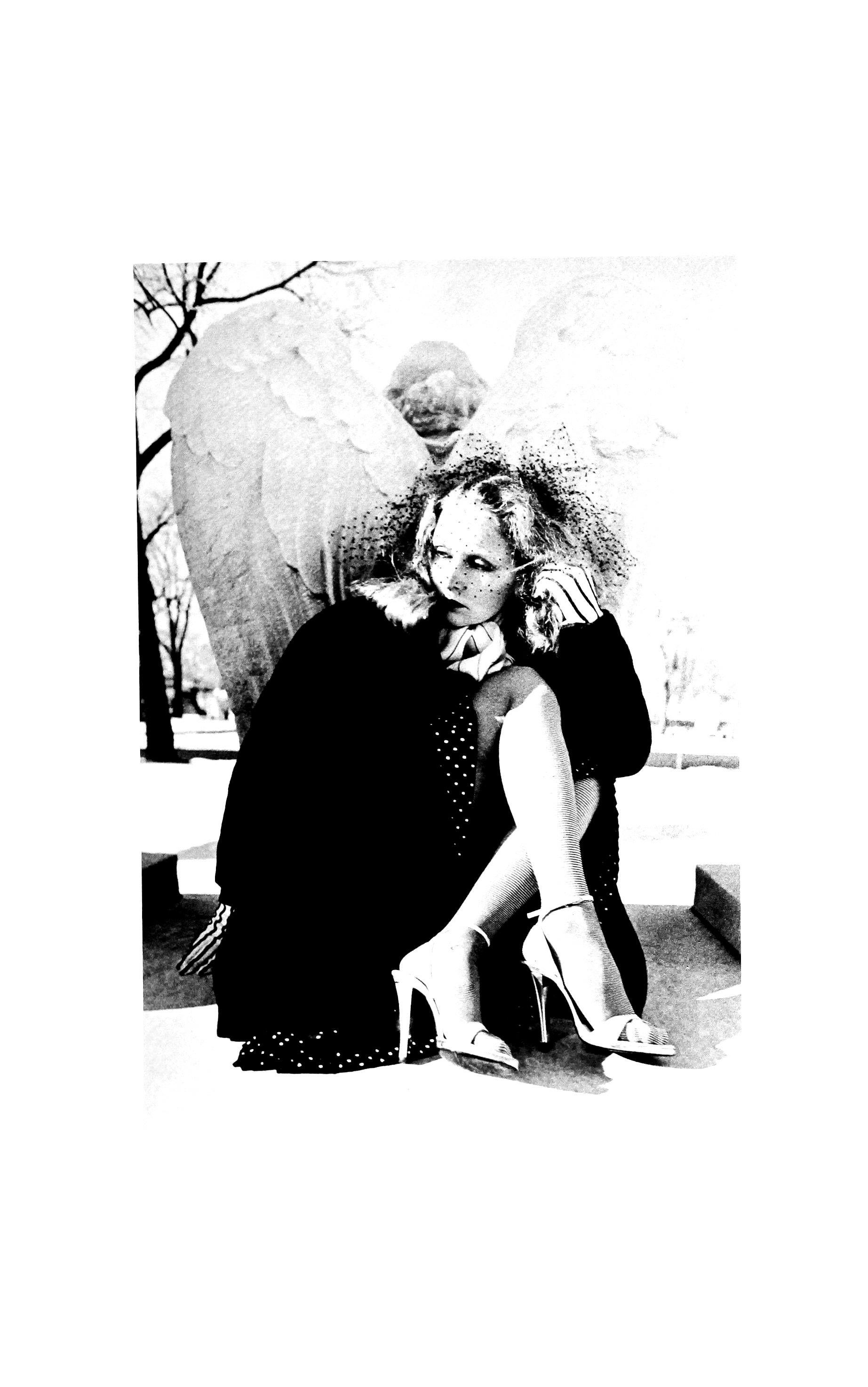
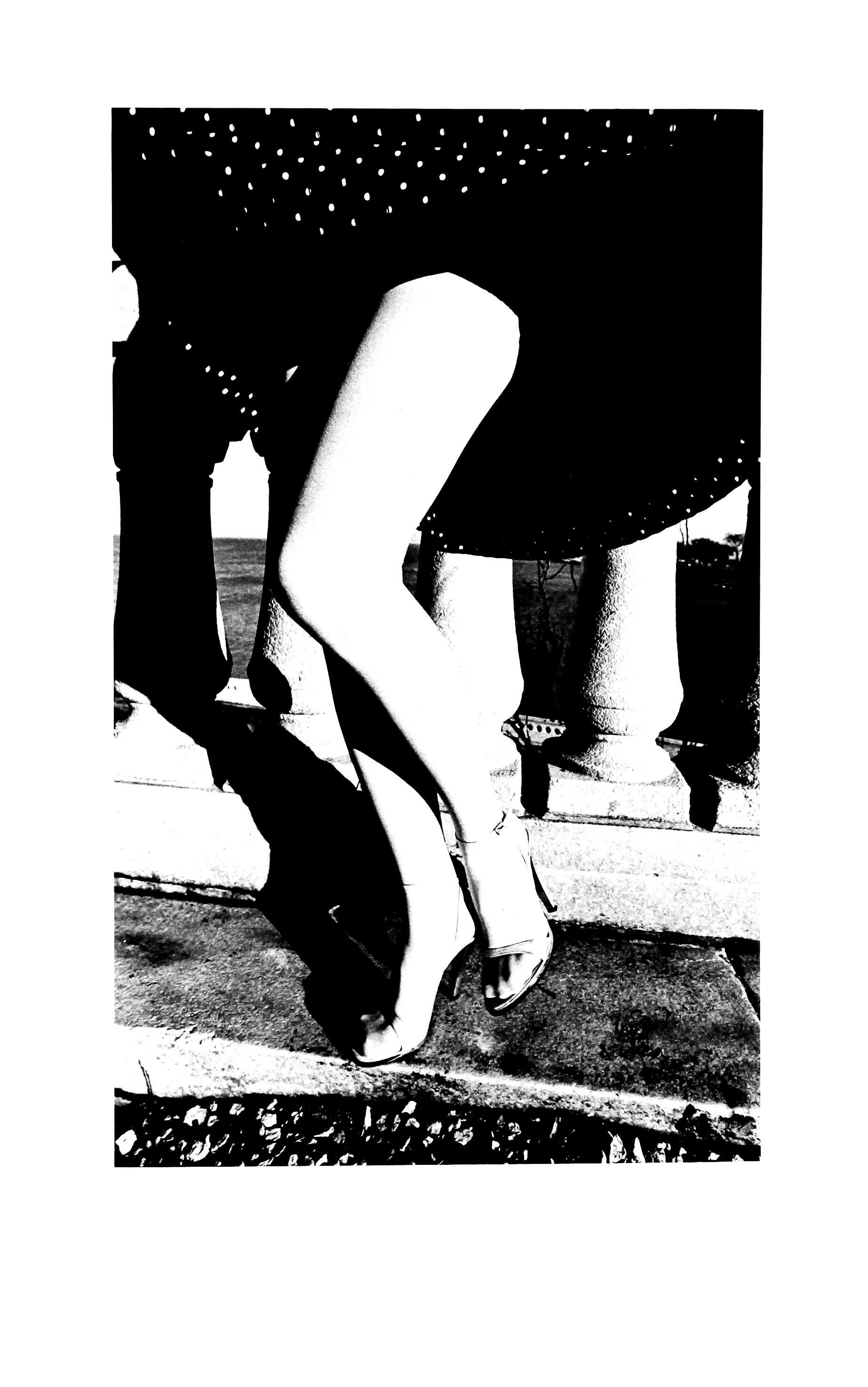
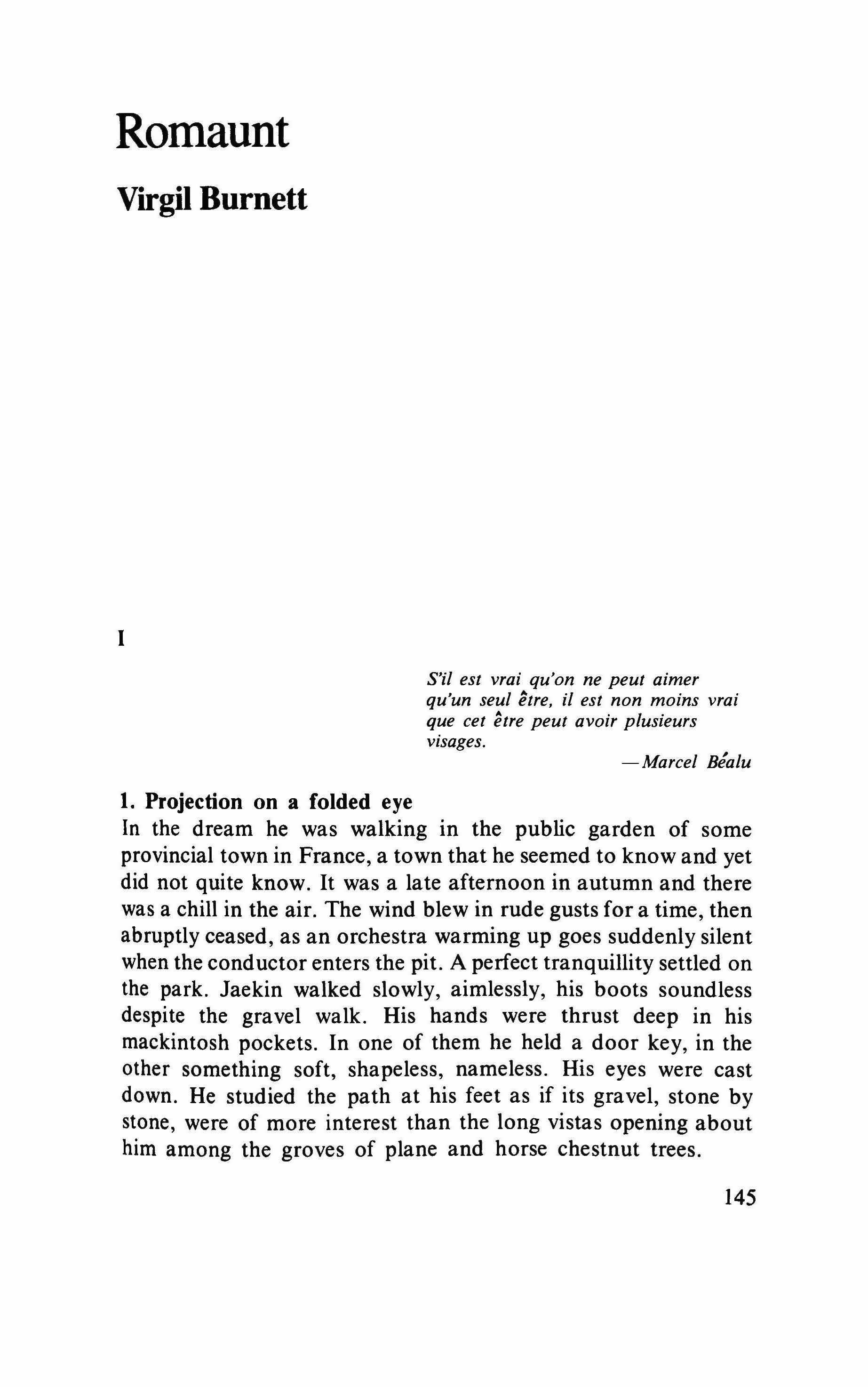
I1. Projection on a folded eye
S'il est vrai qu'on ne peut aimer qu'un seul ;tre, il est non moins vrai que eet etre peut avoir plusieurs visages.
- Marcel Bealu
In the dream he was walking in the public garden of some provincial town in France, a town that he seemed to know and yet did not quite know. It was a late afternoon in autumn and there was a chill in the air. The wind blew in rude gusts for a time, then abruptly ceased, as an orchestra warming up goes suddenly silent when the conductor enters the pit. A perfect tranquillity settled on the park. Jaekin walked slowly, aimlessly, his boots soundless despite the gravel walk. His hands were thrust deep in his mackintosh pockets. In one of them he held a door key, in the other something soft, shapeless, nameless. His eyes were cast down. He studied the path at his feet as if its gravel, stone by stone, were of more interest than the long vistas opening about him among the groves of plane and horse chestnut trees.
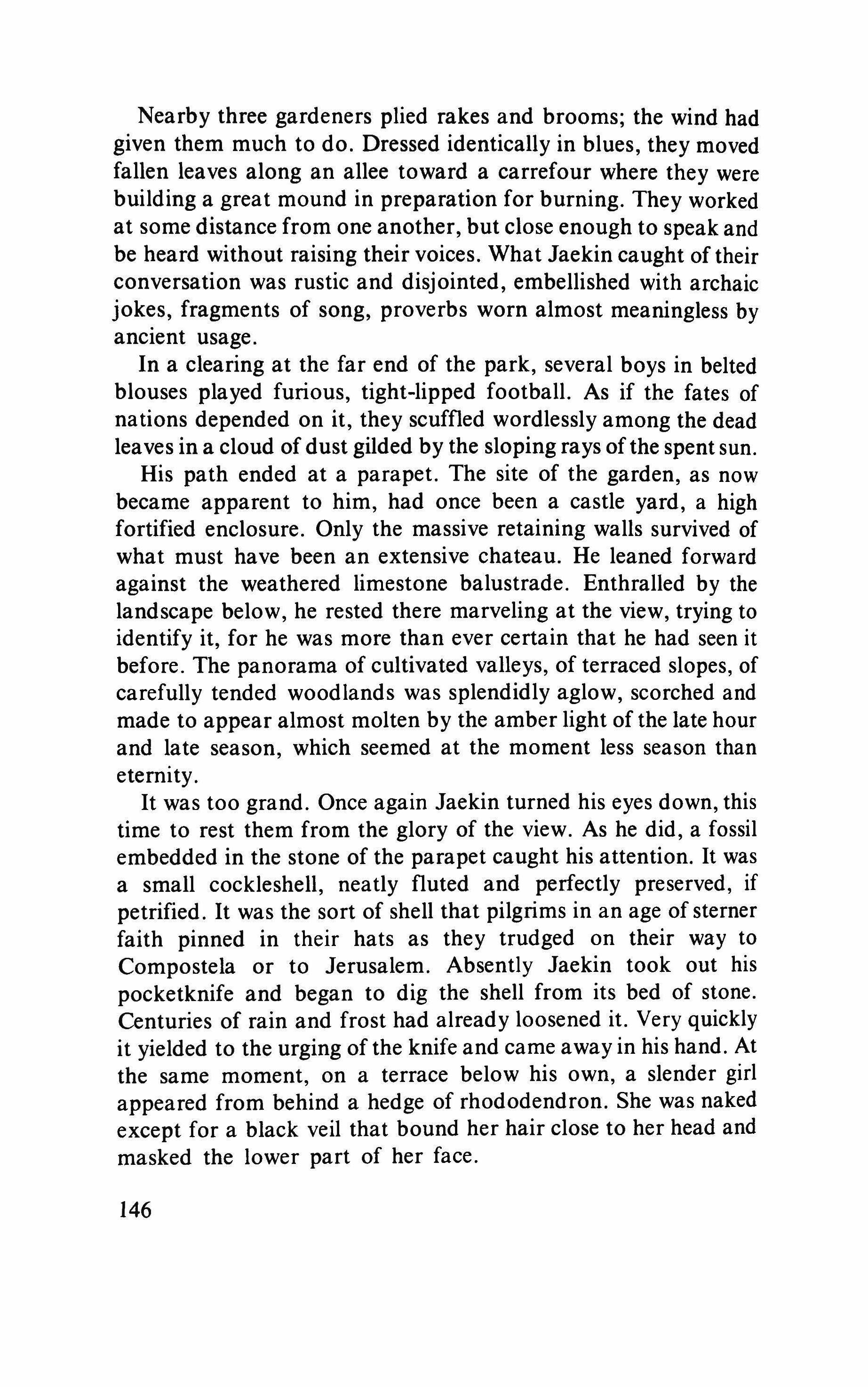
Nearby three gardeners plied rakes and brooms; the wind had given them much to do. Dressed identically in blues, they moved fallen leaves along an allee toward a carrefour where they were building a great mound in preparation for burning. They worked at some distance from one another, but close enough to speak and be heard without raising their voices. What Jaekin caught of their conversation was rustic and disjointed, embellished with archaic jokes, fragments of song, proverbs worn almost meaningless by ancient usage.
In a clearing at the far end of the park, several boys in belted blouses played furious, tight-lipped football. As if the fates of nations depended on it, they scuffled wordlessly among the dead leaves in a cloud of dust gilded by the sloping rays ofthe spent sun.
His path ended at a parapet. The site of the garden, as now became apparent to him, had once been a castle yard, a high fortified enclosure. Only the massive retaining walls survived of what must have been an extensive chateau. He leaned forward against the weathered limestone balustrade. Enthralled by the landscape below, he rested there marveling at the view, trying to identify it, for he was more than ever certain that he had seen it before. The panorama of cultivated valleys, of terraced slopes, of carefully tended woodlands was splendidly aglow, scorched and made to appear almost molten by the amber light of the late hour and late season, which seemed at the moment less season than eternity.
It was too grand. Once again Jaekin turned his eyes down, this time to rest them from the glory of the view. As he did, a fossil embedded in the stone of the parapet caught his attention. It was a small cockleshell, neatly fluted and perfectly preserved, if petrified. It was the sort of shell that pilgrims in an age of sterner faith pinned in their hats as they trudged on their way to Compostela or to Jerusalem. Absently Jaekin took out his pocketknife and began to dig the shell from its bed of stone. Centuries of rain and frost had already loosened it. Very quickly it yielded to the urging ofthe knife and came away in his hand. At the same moment, on a terrace below his own, a slender girl appeared from behind a hedge of rhododendron. She was naked except for a black veil that bound her hair close to her head and masked the lower part of her face.
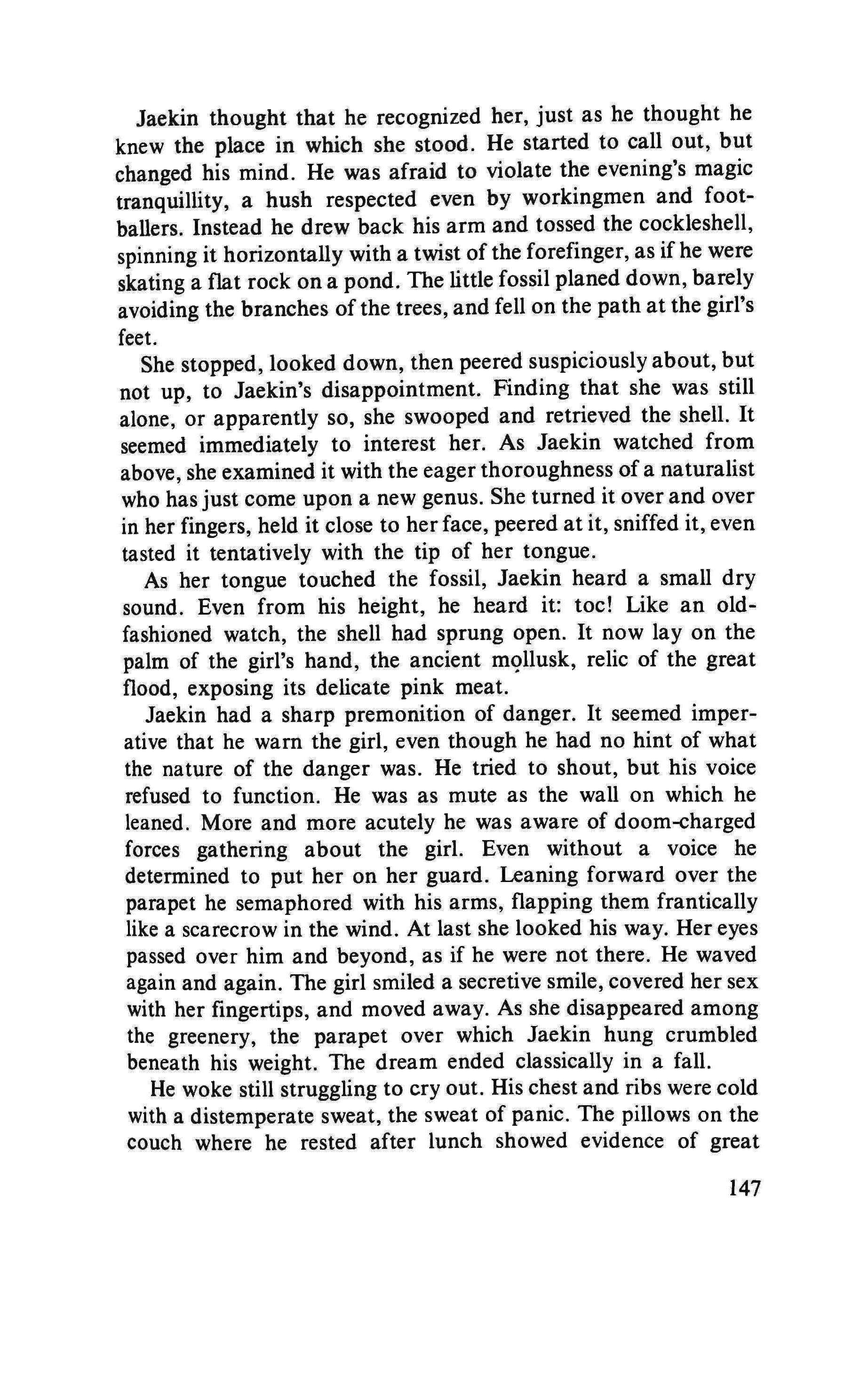
Jaekin thought that he recognized her, just as he thought he knew the place in which she stood. He started to call out, but changed his mind. He was afraid to violate the evening's magic tranquillity, a hush respected even by workingmen and footballers. Instead he drew back his arm and tossed the cockleshell, spinning it horizontally with a twist of the forefinger, as if he were skating a flat rock on a pond. The little fossil planed down, barely avoiding the branches of the trees, and fell on the path at the girl's feet.
She stopped, looked down, then peered suspiciously about, but not up, to Jaekin's disappointment. Finding that she was still alone, or apparently so, she swooped and retrieved the shell. It seemed immediately to interest her. As Jaekin watched from above, she examined it with the eager thoroughness of a naturalist who has just come upon a new genus. She turned it over and over in her fingers, held it close to her face, peered at it, sniffed it, even tasted it tentatively with the tip of her tongue.
As her tongue touched the fossil, Jaekin heard a small dry sound. Even from his height, he heard it: toe! Like an oldfashioned watch, the shell had sprung open. It now lay on the palm of the girl's hand, the ancient mollusk, relic of the great flood, exposing its delicate pink meat.
Jaekin had a sharp premonition of danger. It seemed imperative that he warn the girl, even though he had no hint of what the nature of the danger was. He tried to shout, but his voice refused to function. He was as mute as the wall on which he leaned. More and more acutely he was aware of doom-charged forces gathering about the girl. Even without a voice he determined to put her on her guard. Leaning forward over the parapet he semaphored with his arms, flapping them frantically like a scarecrow in the wind. At last she looked his way. Her eyes passed over him and beyond, as if he were not there. He waved again and again. The girl smiled a secretive smile, covered her sex with her fingertips, and moved away. As she disappeared among the greenery, the parapet over which Jaekin hung crumbled beneath his weight. The dream ended classically in a fall.
He woke still struggling to cry out. His chest and ribs were cold with a distemperate sweat, the sweat of panic. The pillows on the couch where he rested after lunch showed evidence of great
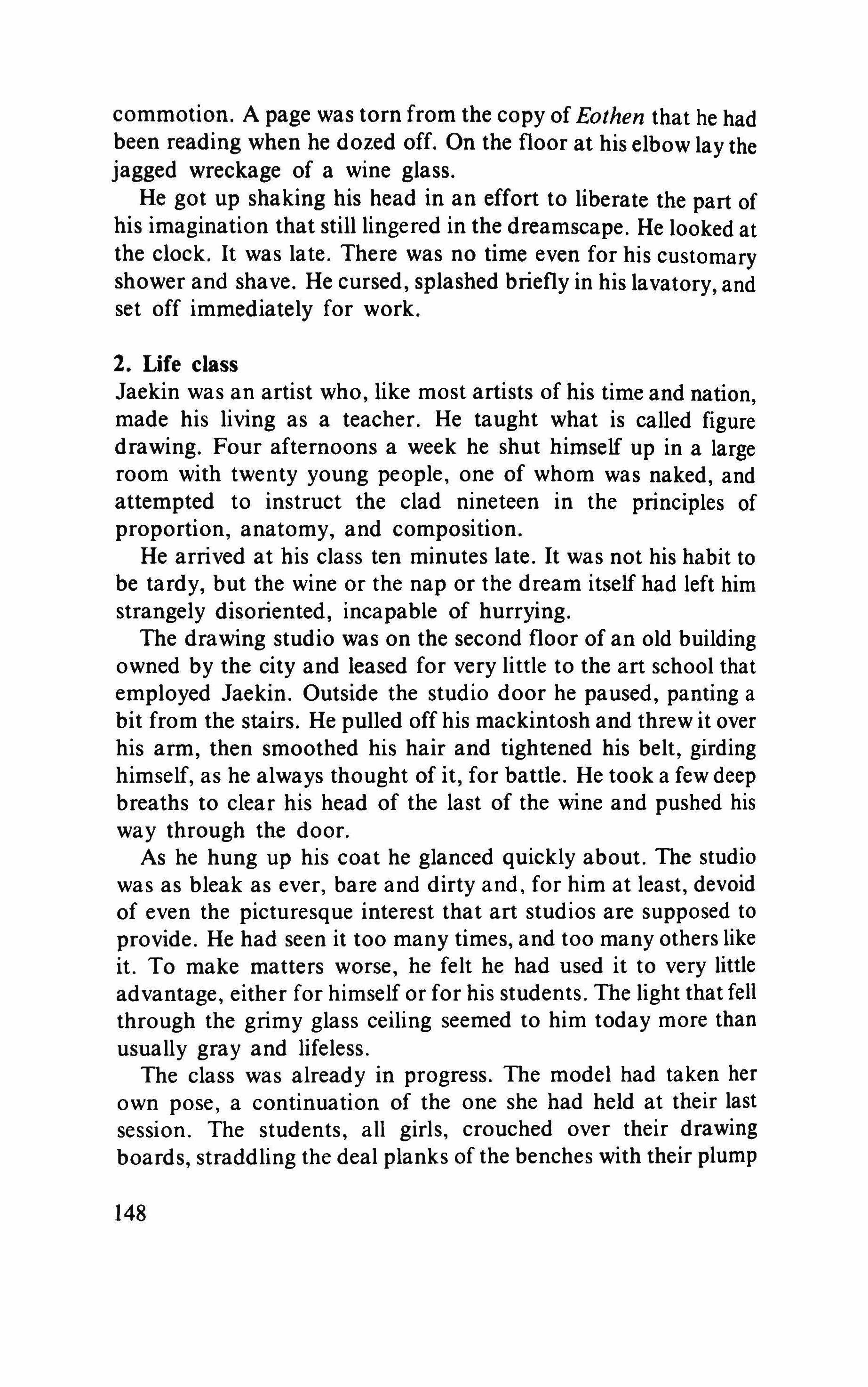
commotion. A page was torn from the copy of Eothen that he had been reading when he dozed off. On the floor at his elbow lay the jagged wreckage of a wine glass.
He got up shaking his head in an effort to liberate the part of his imagination that still lingered in the dreamscape. He looked at the clock. It was late. There was no time even for his customary shower and shave. He cursed, splashed briefly in his lavatory, and set off immediately for work.
Jaekin was an artist who, like most artists of his time and nation, made his living as a teacher. He taught what is called figure drawing. Four afternoons a week he shut himself up in a large room with twenty young people, one of whom was naked, and attempted to instruct the clad nineteen in the principles of proportion, anatomy, and composition.
He arrived at his class ten minutes late. It was not his habit to be tardy, but the wine or the nap or the dream itself had left him strangely disoriented, incapable of hurrying.
The drawing studio was on the second floor of an old building owned by the city and leased for very little to the art school that employed Jaekin. Outside the studio door he paused, panting a bit from the stairs. He pulled off his mackintosh and threw it over his arm, then smoothed his hair and tightened his belt, girding himself, as he always thought of it, for battle. He took a few deep breaths to clear his head of the last of the wine and pushed his way through the door.
As he hung up his coat he glanced quickly about. The studio was as bleak as ever, bare and dirty and, for him at least, devoid of even the picturesque interest that art studios are supposed to provide. He had seen it too many times, and too many others like it. To make matters worse, he felt he had used it to very little advantage, either for himself or for his students. The light that fell through the grimy glass ceiling seemed to him today more than usually gray and lifeless.
The class was already in progress. The model had taken her own pose, a continuation of the one she had held at their last session. The students, all girls, crouched over their drawing boards, straddling the deal planks of the benches with their plump
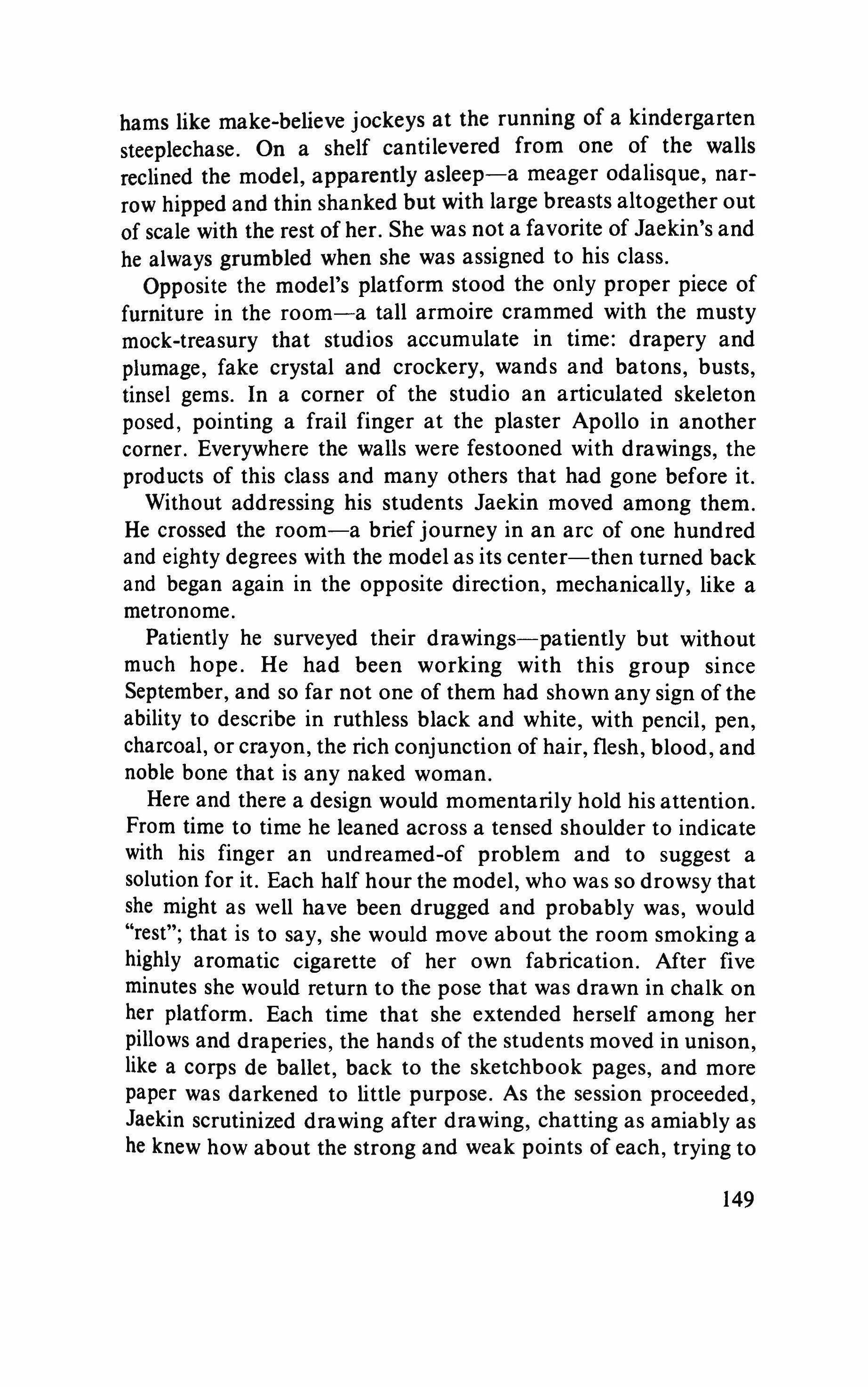
hams like make-believe jockeys at the running of a kindergarten steeplechase. On a shelf cantilevered from one of the walls reclined the model, apparently asleep-a meager odalisque, narrow hipped and thin shanked but with large breasts altogether out of scale with the rest of her. She was not a favorite of Jaekin's and he always grumbled when she was assigned to his class.
Opposite the model's platform stood the only proper piece of furniture in the room-a tall armoire crammed with the musty mock-treasury that studios accumulate in time: drapery and plumage, fake crystal and crockery, wands and batons, busts, tinsel gems. In a corner of the studio an articulated skeleton posed, pointing a frail finger at the plaster Apollo in another corner. Everywhere the walls were festooned with drawings, the products of this class and many others that had gone before it.
Without addressing his students Jaekin moved among them. He crossed the room-a brief journey in an arc of one hundred and eighty degrees with the model as its center-then turned back and began again in the opposite direction, mechanically, like a metronome.
Patiently he surveyed their drawings-patiently but without much hope. He had been working with this group since September, and so far not one of them had shown any sign of the ability to describe in ruthless black and white, with pencil, pen, charcoal, or crayon, the rich conjunction of hair, flesh, blood, and noble bone that is any naked woman.
Here and there a design would momentarily hold his attention. From time to time he leaned across a tensed shoulder to indicate with his finger an undreamed-of problem and to suggest a solution for it. Each half hour the model, who was so drowsy that she might as well have been drugged and probably was, would "rest"; that is to say, she would move about the room smoking a highly aromatic cigarette of her own fabrication. After five minutes she would return to the pose that was drawn in chalk on her platform. Each time that she extended herself among her pillows and draperies, the hands of the students moved in unison, like a corps de ballet, back to the sketchbook pages, and more paper was darkened to little purpose. As the session proceeded, Jaekin scrutinized drawing after drawing, chatting as amiably as he knew how about the strong and weak points of each, trying to
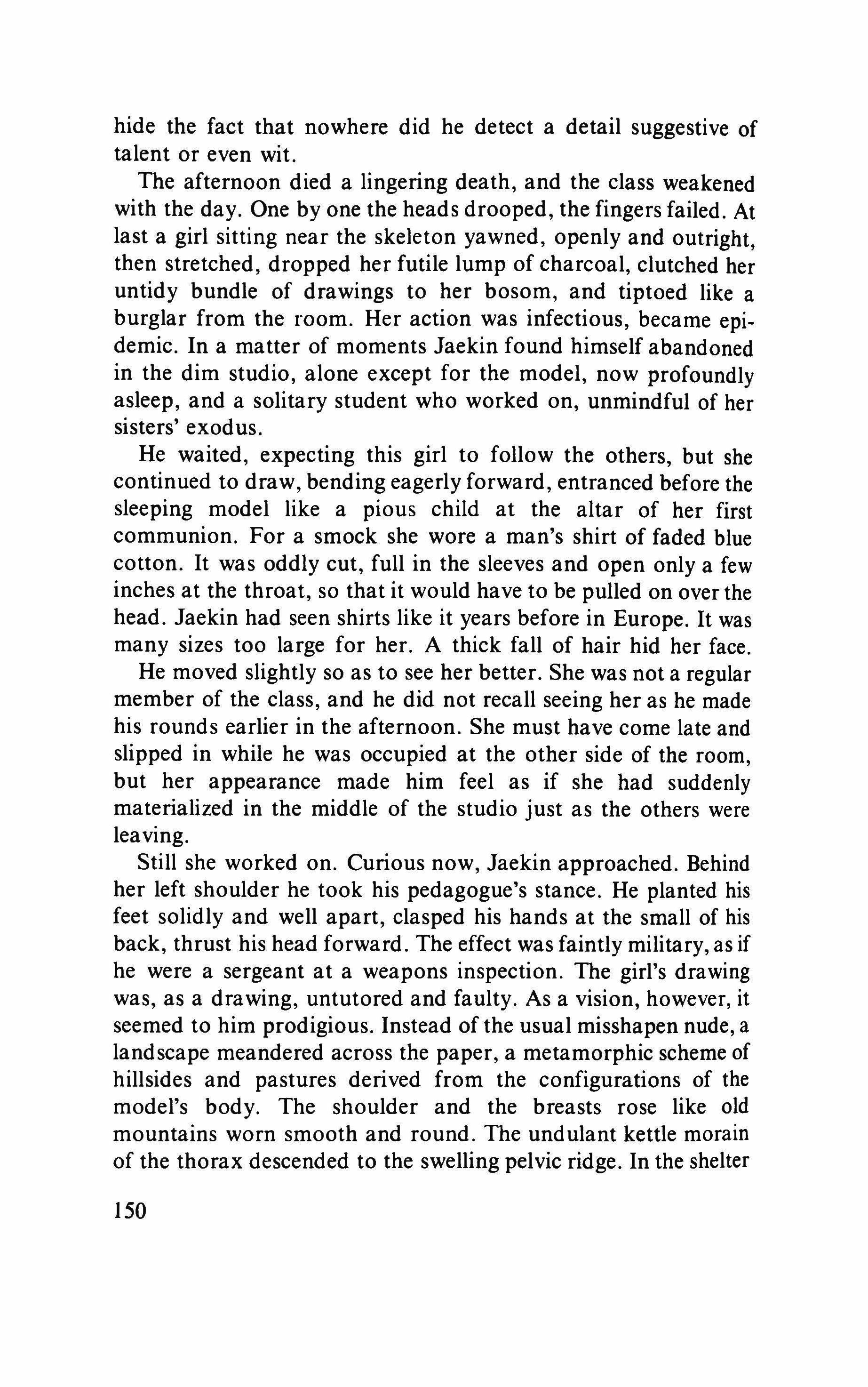
hide the fact that nowhere did he detect a detail suggestive of talent or even wit.
The afternoon died a lingering death, and the class weakened with the day. One by one the heads drooped, the fingers failed. At last a girl sitting near the skeleton yawned, openly and outright, then stretched, dropped her futile lump of charcoal, clutched her untidy bundle of drawings to her bosom, and tiptoed like a burglar from the room. Her action was infectious, became epidemic. In a matter of moments Jaekin found himself abandoned in the dim studio, alone except for the model, now profoundly asleep, and a solitary student who worked on, unmindful of her sisters' exodus.
He waited, expecting this girl to follow the others, but she continued to draw, bending eagerly forward, entranced before the sleeping model like a pious child at the altar of her first communion. For a smock she wore a man's shirt of faded blue cotton. It was oddly cut, full in the sleeves and open only a few inches at the throat, so that it would have to be pulled on over the head. Jaekin had seen shirts like it years before in Europe. It was many sizes too large for her. A thick fall of hair hid her face.
He moved slightly so as to see her better. She was not a regular member of the class, and he did not recall seeing her as he made his rounds earlier in the afternoon. She must have come late and slipped in while he was occupied at the other side of the room, but her appearance made him feel as if she had suddenly materialized in the middle of the studio just as the others were leaving.
Still she worked on. Curious now, Jaekin approached. Behind her left shoulder he took his pedagogue's stance. He planted his feet solidly and well apart, clasped his hands at the small of his back, thrust his head forward. The effect was faintly military, as if he were a sergeant at a weapons inspection. The girl's drawing was, as a drawing, untutored and faulty. As a vision, however, it seemed to him prodigious. Instead of the usual misshapen nude, a landscape meandered across the paper, a metamorphic scheme of hillsides and pastures derived from the configurations of the model's body. The shoulder and the breasts rose like old mountains worn smooth and round. The undulant kettle morain of the thorax descended to the swelling pelvic ridge. In the shelter
150
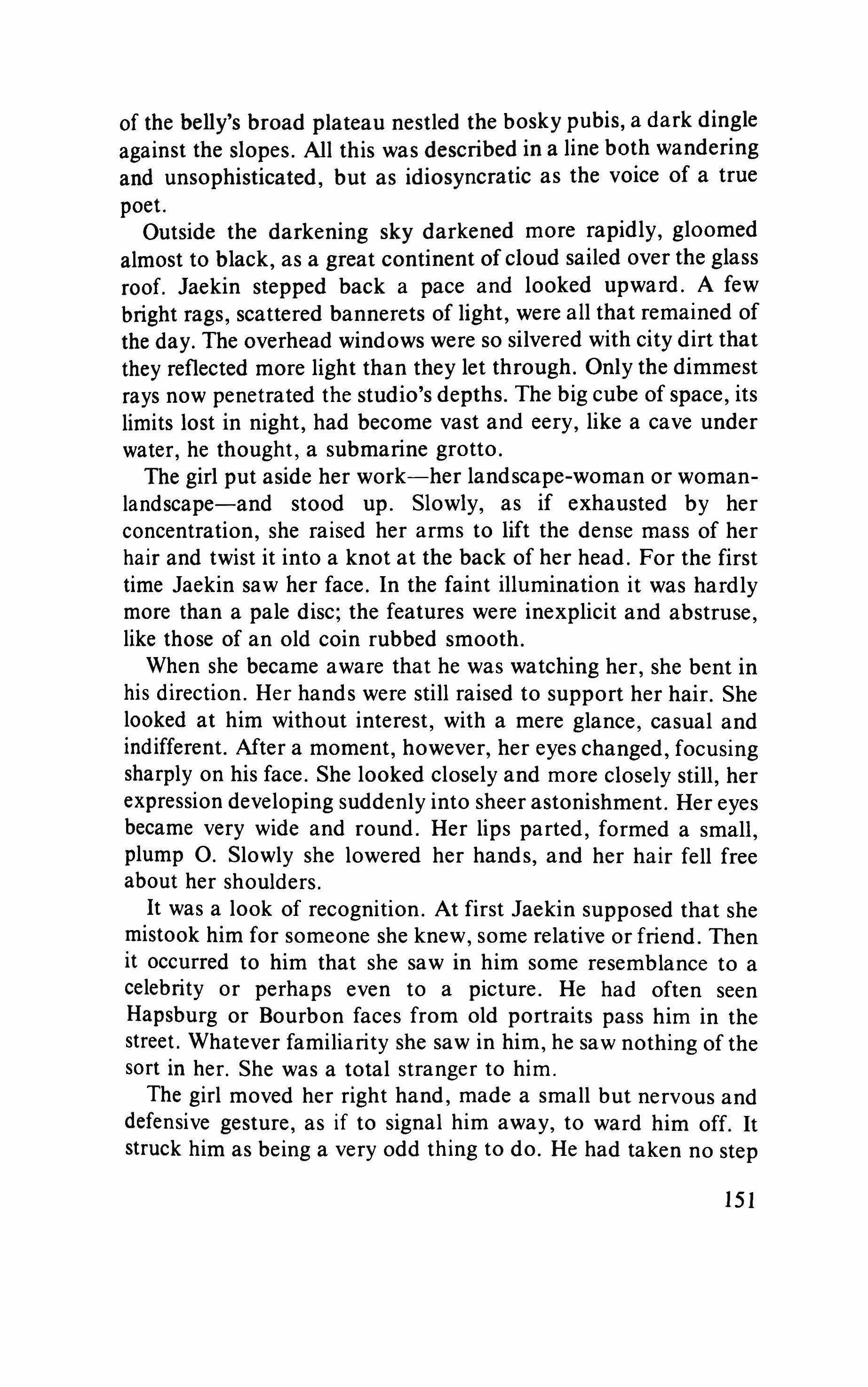
of the belly's broad plateau nestled the bosky pubis, a dark dingle against the slopes. All this was described in a line both wandering and unsophisticated, but as idiosyncratic as the voice of a true poet.
Outside the darkening sky darkened more rapidly, gloomed almost to black, as a great continent of cloud sailed over the glass roof. Jaekin stepped back a pace and looked upward. A few bright rags, scattered bannerets of light, were all that remained of the day. The overhead windows were so silvered with city dirt that they reflected more light than they let through. Only the dimmest rays now penetrated the studio's depths. The big cube of space, its limits lost in night, had become vast and eery, like a cave under water, he thought, a submarine grotto.
The girl put aside her work-her landscape-woman or womanlandscape-and stood up. Slowly, as if exhausted by her concentration, she raised her arms to lift the dense mass of her hair and twist it into a knot at the back of her head. For the first time Jaekin saw her face. In the faint illumination it was hardly more than a pale disc; the features were inexplicit and abstruse, like those of an old coin rubbed smooth.
When she became aware that he was watching her, she bent in his direction. Her hands were still raised to support her hair. She looked at him without interest, with a mere glance, casual and indifferent. After a moment, however, her eyes changed, focusing sharply on his face. She looked closely and more closely still, her expression developing suddenly into sheer astonishment. Her eyes became very wide and round. Her lips parted, formed a small, plump O. Slowly she lowered her hands, and her hair fell free about her shoulders.
It was a look of recognition. At first Jaekin supposed that she mistook him for someone she knew, some relative or friend. Then it occurred to him that she saw in him some resemblance to a celebrity or perhaps even to a picture. He had often seen Hapsburg or Bourbon faces from old portraits pass him in the street. Whatever familiarity she saw in him, he saw nothing of the sort in her. She was a total stranger to him.
The girl moved her right hand, made a small but nervous and defensive gesture, as if to signal him away, to ward him off. It struck him as being a very odd thing to do. He had taken no step
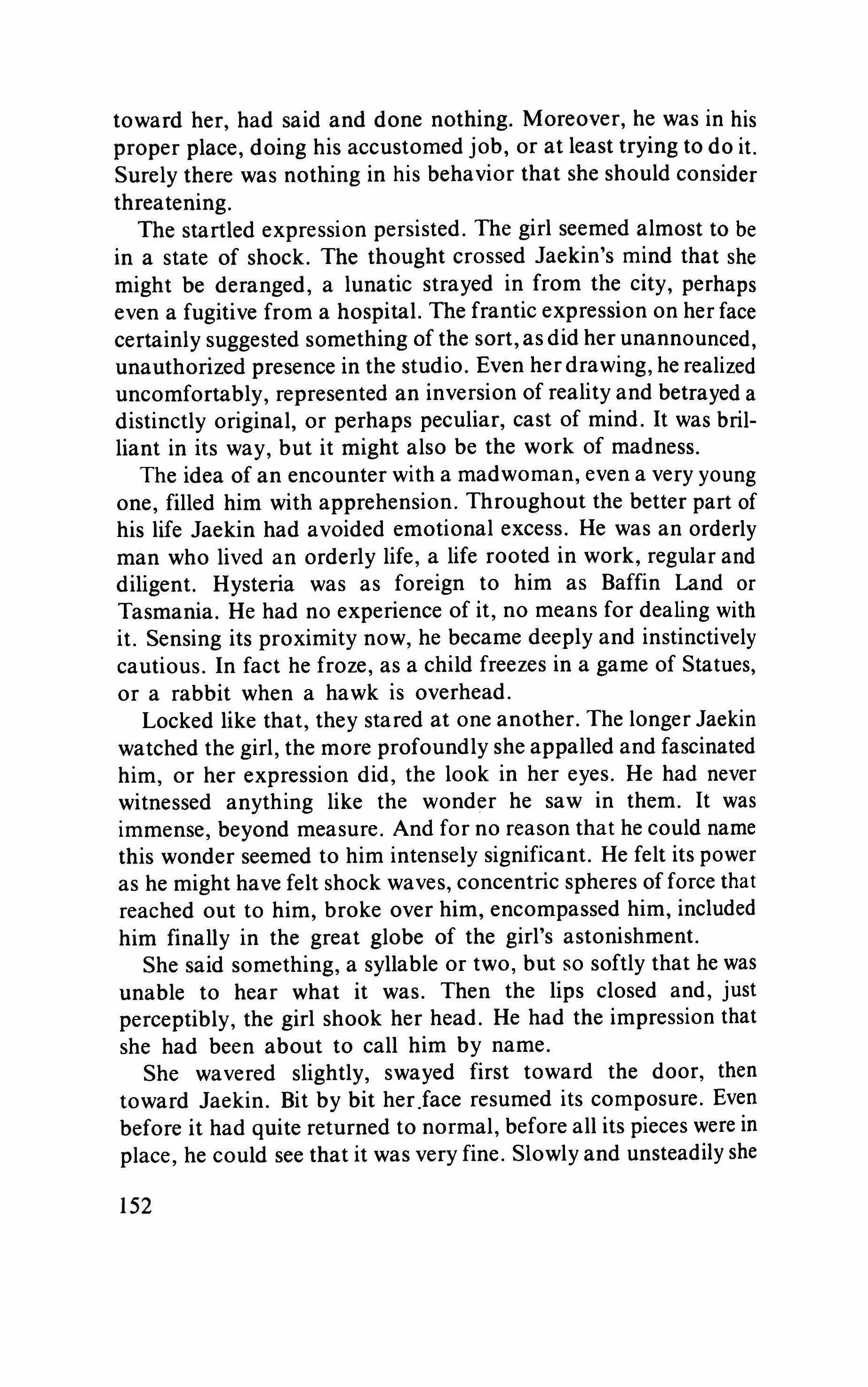
toward her, had said and done nothing. Moreover, he was in his proper place, doing his accustomed job, or at least trying to do it. Surely there was nothing in his behavior that she should consider threatening.
The startled expression persisted. The girl seemed almost to be in a state of shock. The thought crossed Jaekin's mind that she might be deranged, a lunatic strayed in from the city, perhaps even a fugitive from a hospital. The frantic expression on her face certainly suggested something of the sort, as did her unannounced, unauthorized presence in the studio. Even her drawing, he realized uncomfortably, represented an inversion of reality and betrayed a distinctly original, or perhaps peculiar, cast of mind. It was brilliant in its way, but it might also be the work of madness.
The idea of an encounter with a madwoman, even a very young one, filled him with apprehension. Throughout the better part of his life Jaekin had avoided emotional excess. He was an orderly man who lived an orderly life, a life rooted in work, regular and diligent. Hysteria was as foreign to him as Baffin Land or Tasmania. He had no experience of it, no means for dealing with it. Sensing its proximity now, he became deeply and instinctively cautious. In fact he froze, as a child freezes in a game of Statues, or a rabbit when a hawk is overhead.
Locked like that, they stared at one another. The longer Jaekin watched the girl, the more profoundly she appalled and fascinated him, or her expression did, the look in her eyes. He had never witnessed anything like the wonder he saw in them. It was immense, beyond measure. And for no reason that he could name this wonder seemed to him intensely significant. He felt its power as he might have felt shock waves, concentric spheres of force that reached out to him, broke over him, encompassed him, included him finally in the great globe of the girl's astonishment.
She said something, a syllable or two, but so softly that he was unable to hear what it was. Then the lips closed and, just perceptibly, the girl shook her head. He had the impression that she had been about to call him by name.
She wavered slightly, swayed first toward the door, then toward Jaekin. Bit by bit her.face resumed its composure. Even before it had quite returned to normal, before all its pieces were in place, he could see that it was very fine. Slowly and unsteadily she
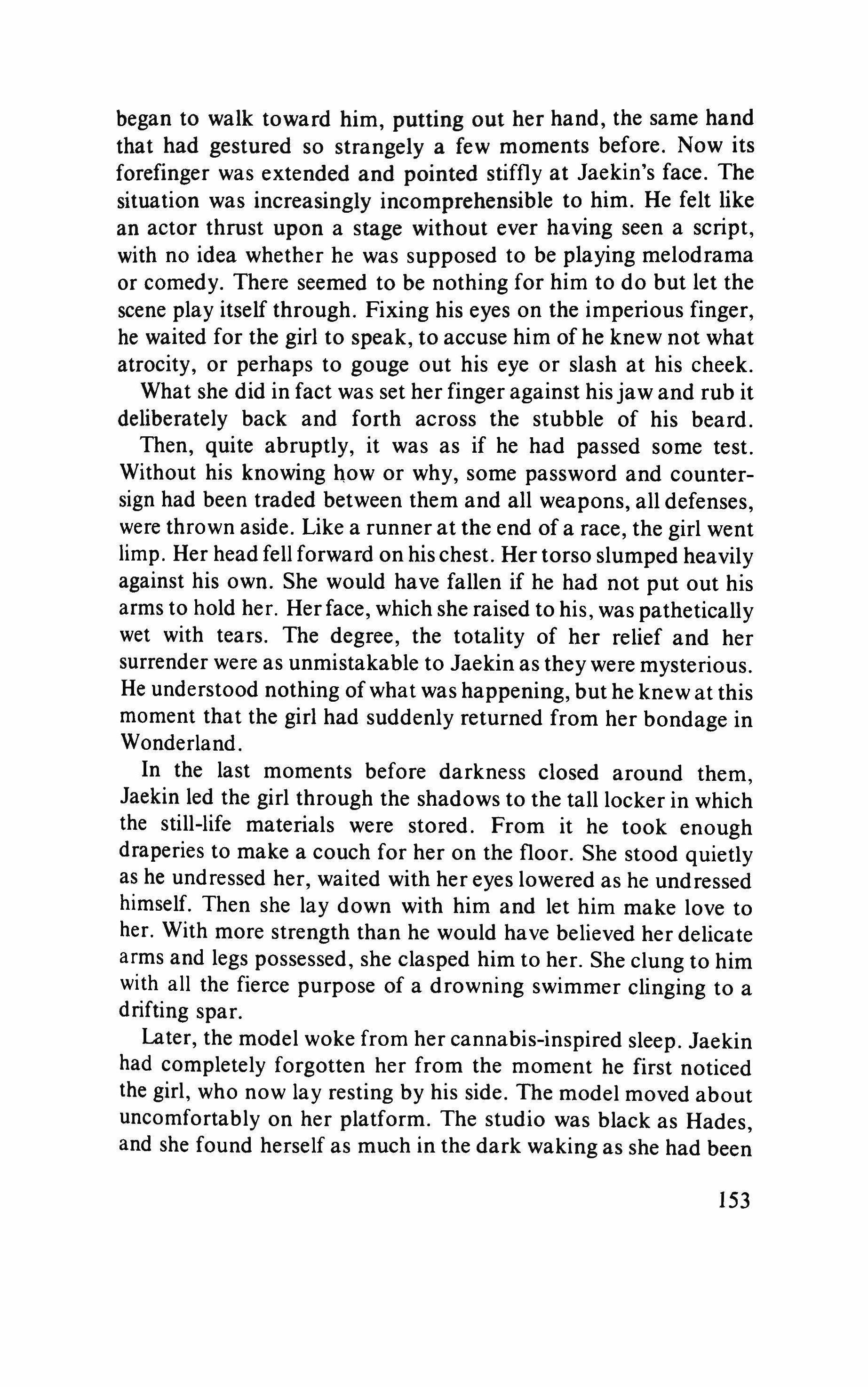
began to walk toward him, putting out her hand, the same hand that had gestured so strangely a few moments before. Now its forefinger was extended and pointed stiffly at Jaekin's face. The situation was increasingly incomprehensible to him. He felt like an actor thrust upon a stage without ever having seen a script, with no idea whether he was supposed to be playing melodrama or comedy. There seemed to be nothing for him to do but let the scene play itself through. Fixing his eyes on the imperious finger, he waited for the girl to speak, to accuse him of he knew not what atrocity, or perhaps to gouge out his eye or slash at his cheek.
What she did in fact was set her finger against his jawand rub it deliberately back and forth across the stubble of his beard.
Then, quite abruptly, it was as if he had passed some test. Without his knowing how or why, some password and countersign had been traded between them and all weapons, all defenses, were thrown aside. Like a runner at the end of a race, the girl went limp. Her head fell forward on his chest. Her torso slumped heavily against his own. She would have fallen if he had not put out his arms to hold her. Herface, which she raised to his, was pathetically wet with tears. The degree, the totality of her relief and her surrender were as unmistakable to Jaekin as they were mysterious. He understood nothing of what was happening, but he knew at this moment that the girl had suddenly returned from her bondage in Wonderland.
In the last moments before darkness closed around them, Jaekin led the girl through the shadows to the tall locker in which the still-life materials were stored. From it he took enough draperies to make a couch for her on the floor. She stood quietly as he undressed her, waited with her eyes lowered as he undressed himself. Then she lay down with him and let him make love to her. With more strength than he would have believed her delicate arms and legs possessed, she clasped him to her. She clung to him with all the fierce purpose of a drowning swimmer clinging to a drifting spar.
Later, the model woke from her cannabis-inspired sleep. Jaekin had completely forgotten her from the moment he first noticed the girl, who now lay resting by his side. The model moved about uncomfortably on her platform. The studio was black as Hades, and she found herself as much in the dark waking as she had been
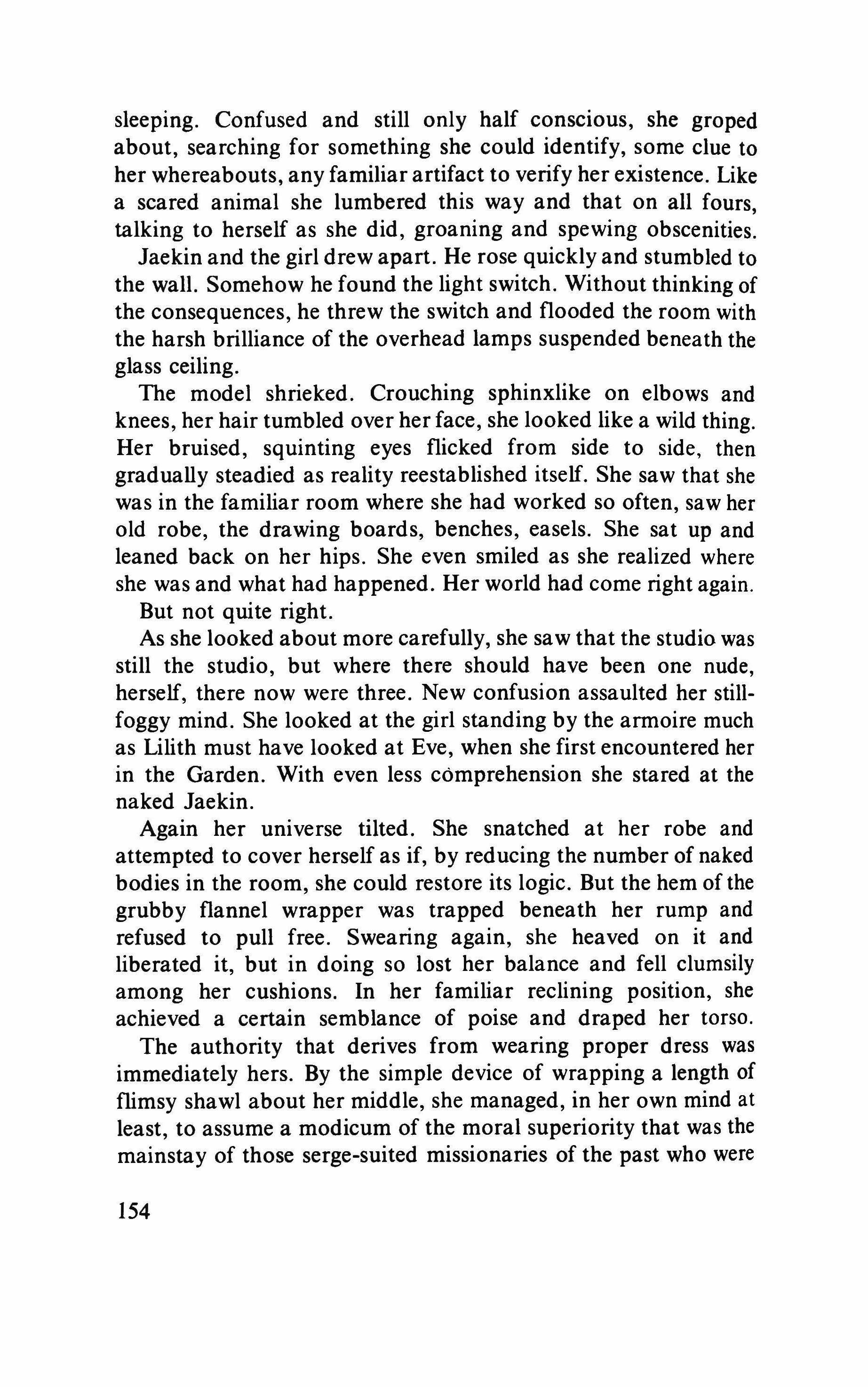
sleeping. Confused and still only half conscious, she groped about, searching for something she could identify, some clue to her whereabouts, any familiar artifact to verify her existence. Like a scared animal she lumbered this way and that on all fours, talking to herself as she did, groaning and spewing obscenities.
Jaekin and the girl drew apart. He rose quickly and stumbled to the wall. Somehow he found the light switch. Without thinking of the consequences, he threw the switch and flooded the room with the harsh brilliance of the overhead lamps suspended beneath the glass ceiling.
The model shrieked. Crouching sphinxlike on elbows and knees, her hair tumbled over her face, she looked like a wild thing. Her bruised, squinting eyes flicked from side to side, then gradually steadied as reality reestablished itself. She saw that she was in the familiar room where she had worked so often, saw her old robe, the drawing boards, benches, easels. She sat up and leaned back on her hips. She even smiled as she realized where she was and what had happened. Her world had come right again.
But not quite right.
As she looked about more carefully, she saw that the studio was still the studio, but where there should have been one nude, herself, there now were three. New confusion assaulted her stillfoggy mind. She looked at the girl standing by the armoire much as Lilith must have looked at Eve, when she first encountered her in the Garden. With even less comprehension she stared at the naked Jaekin.
Again her universe tilted. She snatched at her robe and attempted to cover herself as if, by reducing the number of naked bodies in the room, she could restore its logic. But the hem of the grubby flannel wrapper was trapped beneath her rump and refused to pull free. Swearing again, she heaved on it and liberated it, but in doing so lost her balance and fell clumsily among her cushions. In her familiar reclining position, she achieved a certain semblance of poise and draped her torso.
The authority that derives from wearing proper dress was immediately hers. By the simple device of wrapping a length of flimsy shawl about her middle, she managed, in her own mind at least, to assume a modicum of the moral superiority that was the mainstay of those serge-suited missionaries of the past who were
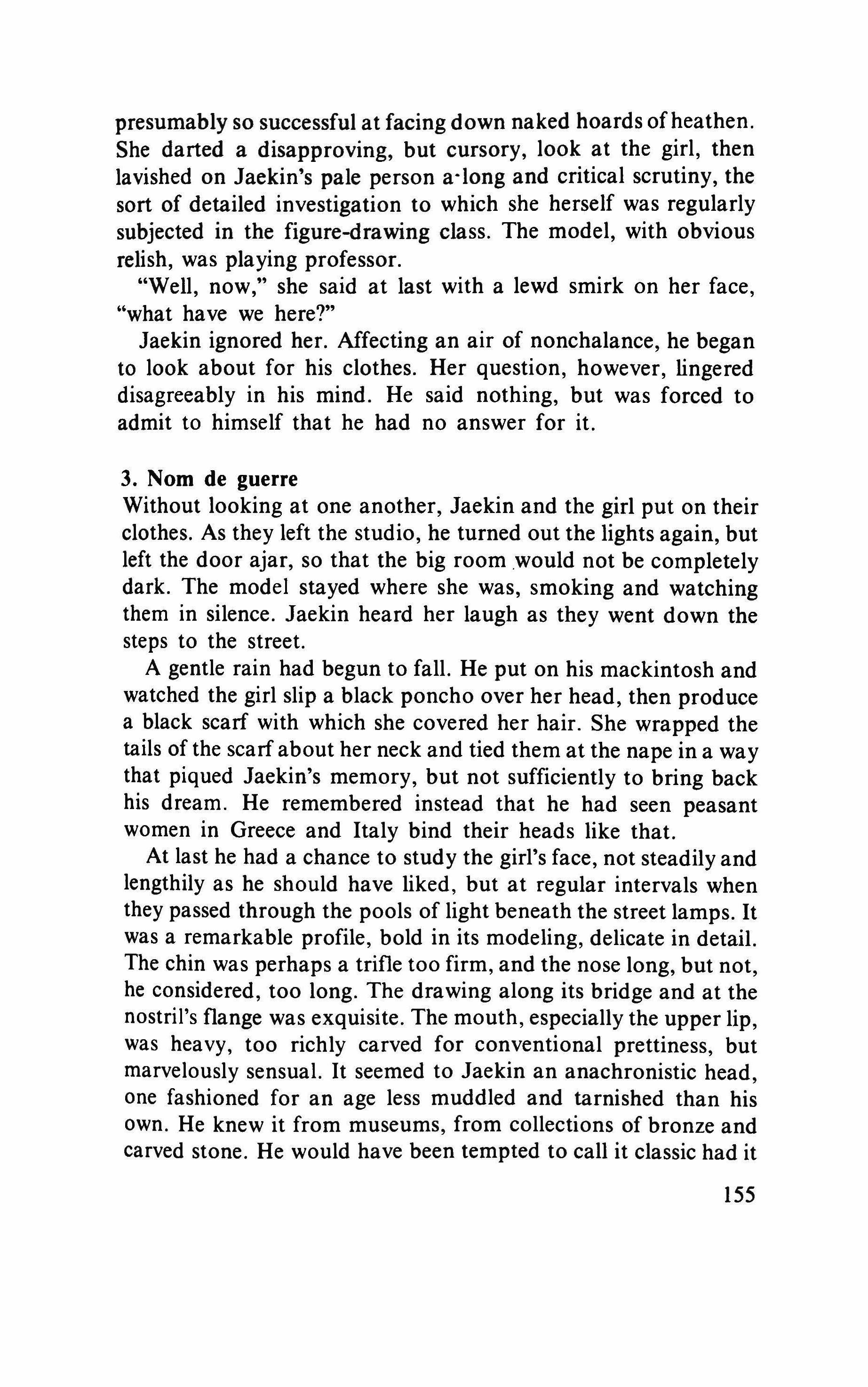
presumably so successful at facing down naked hoards of heathen. She darted a disapproving, but cursory, look at the girl, then lavished on Jaekin's pale person a-long and critical scrutiny, the sort of detailed investigation to which she herself was regularly subjected in the figure-drawing class. The model, with obvious relish, was playing professor.
"Well, now," she said at last with a lewd smirk on her face, "what have we here?"
Jaekin ignored her. Affecting an air of nonchalance, he began to look about for his clothes. Her question, however, lingered disagreeably in his mind. He said nothing, but was forced to admit to himself that he had no answer for it.
3. Nom de guerre
Without looking at one another, Jaekin and the girl put on their clothes. As they left the studio, he turned out the lights again, but left the door ajar, so that the big room would not be completely dark. The model stayed where she was, smoking and watching them in silence. Jaekin heard her laugh as they went down the steps to the street.
A gentle rain had begun to fall. He put on his mackintosh and watched the girl slip a black poncho over her head, then produce a black scarf with which she covered her hair. She wrapped the tails of the scarf about her neck and tied them at the nape in a way that piqued Jaekin's memory, but not sufficiently to bring back his dream. He remembered instead that he had seen peasant women in Greece and Italy bind their heads like that.
At last he had a chance to study the girl's face, not steadily and lengthily as he should have liked, but at regular intervals when they passed through the pools of light beneath the street lamps. It was a remarkable profile, bold in its modeling, delicate in detail. The chin was perhaps a trifle too firm, and the nose long, but not, he considered, too long. The drawing along its bridge and at the nostril's flange was exquisite. The mouth, especially the upper lip, was heavy, too richly carved for conventional prettiness, but marvelously sensual. It seemed to Jaekin an anachronistic head, one fashioned for an age less muddled and tarnished than his own. He knew it from museums, from collections of bronze and carved stone. He would have been tempted to call it classic had it
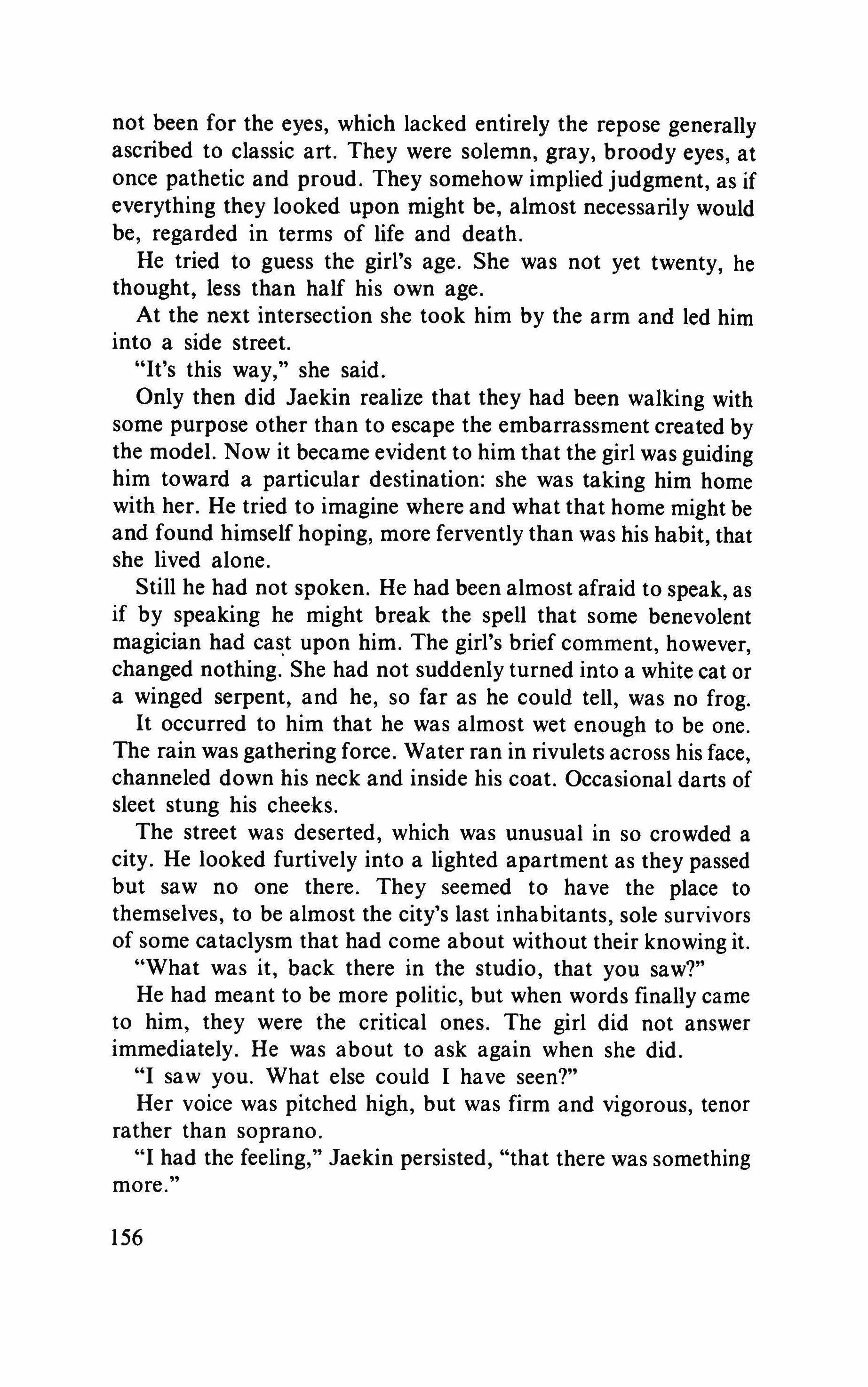
not been for the eyes, which lacked entirely the repose generally ascribed to classic art. They were solemn, gray, broody eyes, at once pathetic and proud. They somehow implied judgment, as if everything they looked upon might be, almost necessarily would be, regarded in terms of life and death.
He tried to guess the girl's age. She was not yet twenty, he thought, less than half his own age.
At the next intersection she took him by the arm and led him into a side street.
"It's this way," she said.
Only then did Jaekin realize that they had been walking with some purpose other than to escape the embarrassment created by the model. Now it became evident to him that the girl was guiding him toward a particular destination: she was taking him home with her. He tried to imagine where and what that home might be and found himself hoping, more fervently than was his habit, that she lived alone.
Still he had not spoken. He had been almost afraid to speak, as if by speaking he might break the spell that some benevolent magician had cast upon him. The girl's brief comment, however, changed nothing. She had not suddenly turned into a white cat or a winged serpent, and he, so far as he could tell, was no frog. It occurred to him that he was almost wet enough to be one. The rain was gathering force. Water ran in rivulets across his face, channeled down his neck and inside his coat. Occasional darts of sleet stung his cheeks.
The street was deserted, which was unusual in so crowded a city. He looked furtively into a lighted apartment as they passed but saw no one there. They seemed to have the place to themselves, to be almost the city's last inhabitants, sole survivors of some cataclysm that had come about without their knowing it.
"What was it, back there in the studio, that you saw?"
He had meant to be more politic, but when words finally came to him, they were the critical ones. The girl did not answer immediately. He was about to ask again when she did.
"I saw you. What else could 1 have seen?"
Her voice was pitched high, but was firm and vigorous, tenor rather than soprano.
"I had the feeling," Jaekin persisted, "that there was something more."
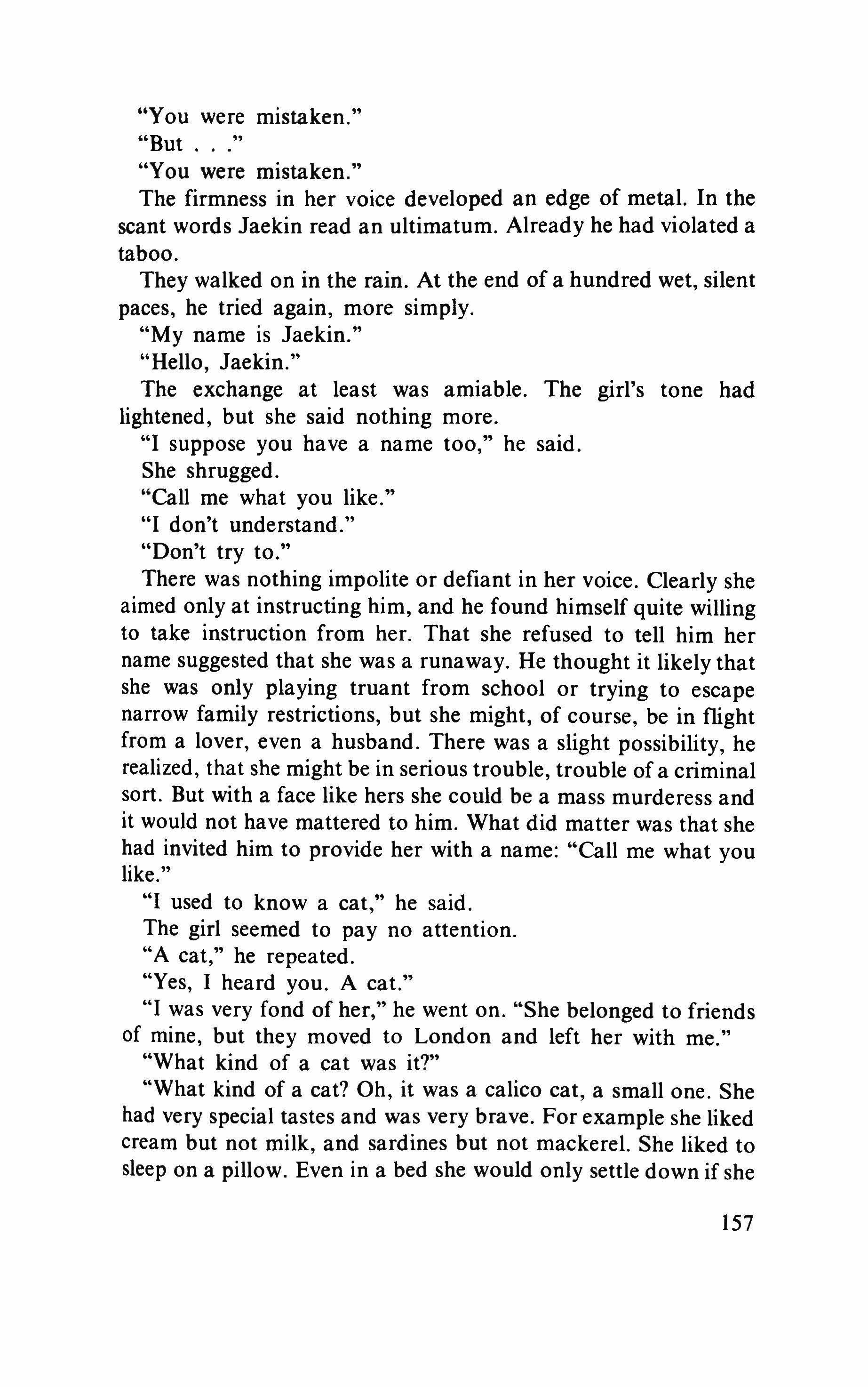
"You were mistaken."
"But
"You were mistaken."
The firmness in her voice developed an edge of metal. In the scant words Jaekin read an ultimatum. Already he had violated a taboo.
They walked on in the rain. At the end of a hundred wet, silent paces, he tried again, more simply.
"My name is Jaekin."
"Hello, Jaekin."
The exchange at least was amiable. The girl's tone had lightened, but she said nothing more.
"I suppose you have a name too," he said.
She shrugged.
"Call me what you like."
"I don't understand."
"Don't try to."
There was nothing impolite or defiant in her voice. Clearly she aimed only at instructing him, and he found himself quite willing to take instruction from her. That she refused to tell him her name suggested that she was a runaway. He thought it likely that she was only playing truant from school or trying to escape narrow family restrictions, but she might, of course, be in flight from a lover, even a husband. There was a slight possibility, he realized, that she might be in serious trouble, trouble of a criminal sort. But with a face like hers she could be a mass murderess and it would not have mattered to him. What did matter was that she had invited him to provide her with a name: "Call me what you like.
"I used to know a cat," he said.
The girl seemed to pay no attention.
"A cat," he repeated.
"Yes, I heard you. A cat."
"I was very fond of her," he went on. "She belonged to friends of mine, but they moved to London and left her with me."
"What kind of a cat was it?"
"What kind of a cat? Oh, it was a calico cat, a small one. She had very special tastes and was very brave. For example she liked cream but not milk, and sardines but not mackerel. She liked to sleep on a pillow. Even in a bed she would only settle down if she
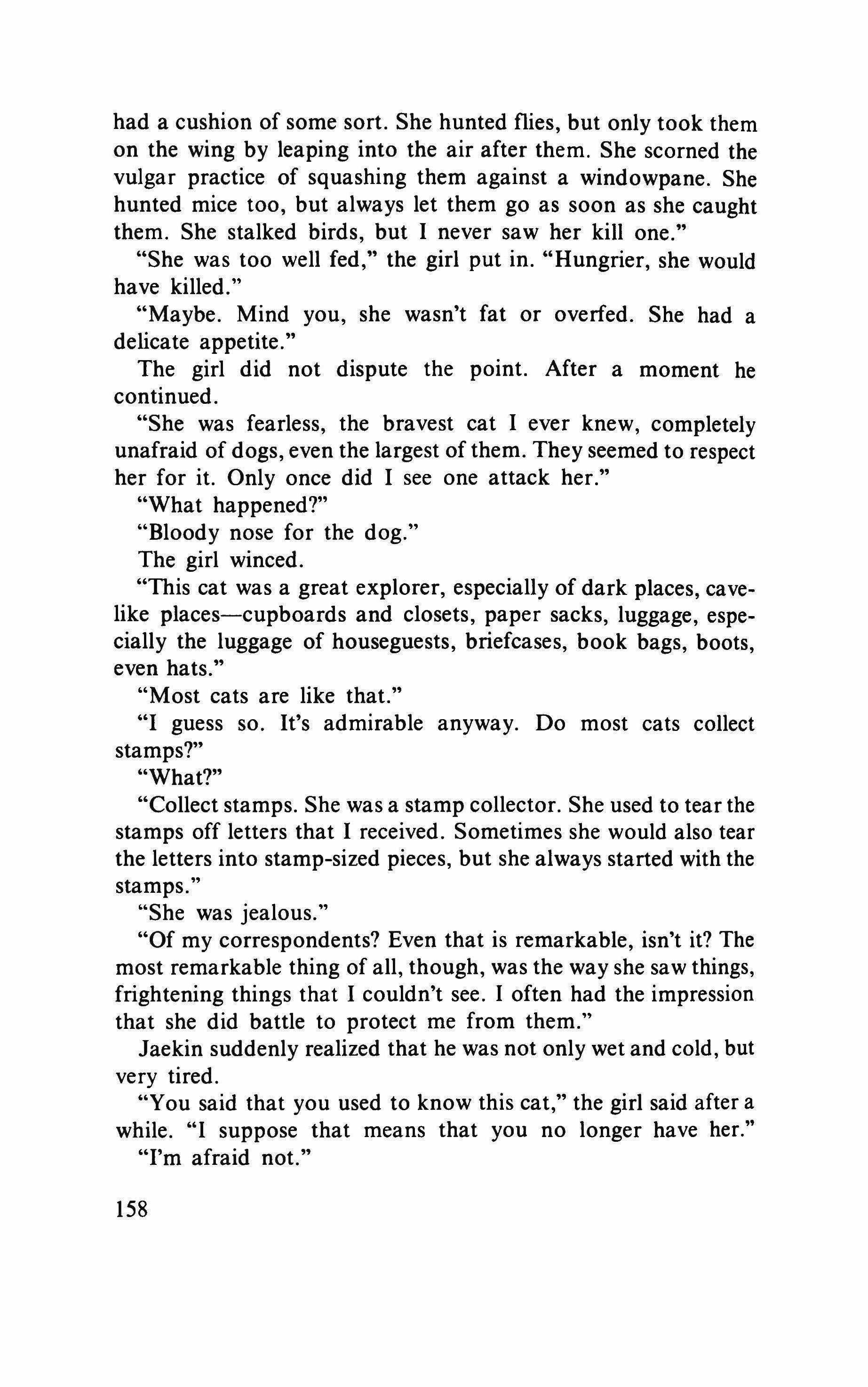
had a cushion of some sort. She hunted flies, but only took them on the wing by leaping into the air after them. She scorned the vulgar practice of squashing them against a windowpane. She hunted mice too, but always let them go as soon as she caught them. She stalked birds, but I never saw her kill one."
"She was too well fed," the girl put in. "Hungrier, she would have killed."
"Maybe. Mind you, she wasn't fat or overfed. She had a delicate appetite."
The girl did not dispute the point. After a moment he continued.
"She was fearless, the bravest cat I ever knew, completely unafraid of dogs, even the largest of them. They seemed to respect her for it. Only once did I see one attack her."
"What happened?"
"Bloody nose for the dog."
The girl winced.
"This cat was a great explorer, especially of dark places, cavelike places-cupboards and closets, paper sacks, luggage, especially the luggage of houseguests, briefcases, book bags, boots, even hats."
"Most cats are like that."
"I guess so. It's admirable anyway. Do most cats collect stamps?"
"What?"
"Collect stamps. She was a stamp collector. She used to tear the stamps off letters that I received. Sometimes she would also tear the letters into stamp-sized pieces, but she always started with the stamps."
"She was jealous."
"Of my correspondents? Even that is remarkable, isn't it? The most remarkable thing of all, though, was the way she saw things, frightening things that I couldn't see. I often had the impression that she did battle to protect me from them."
Jaekin suddenly realized that he was not only wet and cold, but very tired.
"You said that you used to know this cat," the girl said after a while. "1 suppose that means that you no longer have her."
"I'm afraid not."
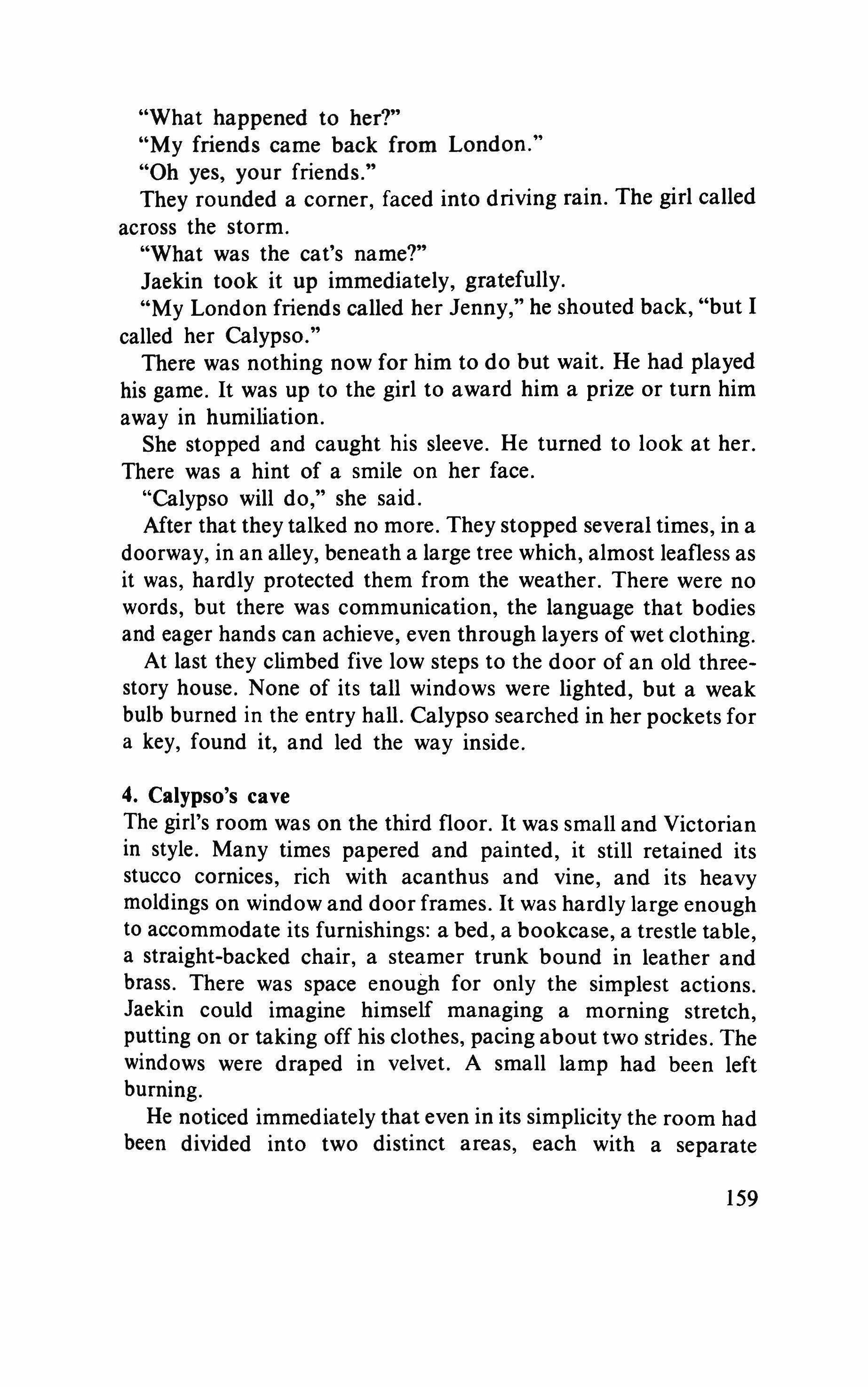
"What happened to her?"
"My friends came back from London."
"Oh yes, your friends."
They rounded a corner, faced into driving rain. The girl called across the storm.
"What was the eat's name?"
Jaekin took it up immediately, gratefully.
"My London friends called her Jenny," he shouted back, "but I called her Calypso."
There was nothing now for him to do but wait. He had played his game. It was up to the girl to award him a prize or turn him away in humiliation.
She stopped and caught his sleeve. He turned to look at her. There was a hint of a smile on her face.
"Calypso will do," she said.
After that they talked no more. They stopped several times, in a doorway, in an alley, beneath a large tree which, almost leafless as it was, hardly protected them from the weather. There were no words, but there was communication, the language that bodies and eager hands can achieve, even through layers of wet clothing.
At last they climbed five low steps to the door of an old threestory house. None of its tall windows were lighted, but a weak bulb burned in the entry hall. Calypso searched in her pockets for a key, found it, and led the way inside.
4. Calypso's cave
The girl's room was on the third floor. It was small and Victorian in style. Many times papered and painted, it still retained its stucco cornices, rich with acanthus and vine, and its heavy moldings on window and door frames. It was hardly large enough to accommodate its furnishings: a bed, a bookcase, a trestle table, a straight-backed chair, a steamer trunk bound in leather and brass. There was space enough for only the simplest actions. Jaekin could imagine himself managing a morning stretch, putting on or taking off his clothes, pacing about two strides. The windows were draped in velvet. A small lamp had been left burning.
He noticed immediately that even in its simplicity the room had been divided into two distinct areas, each with a separate
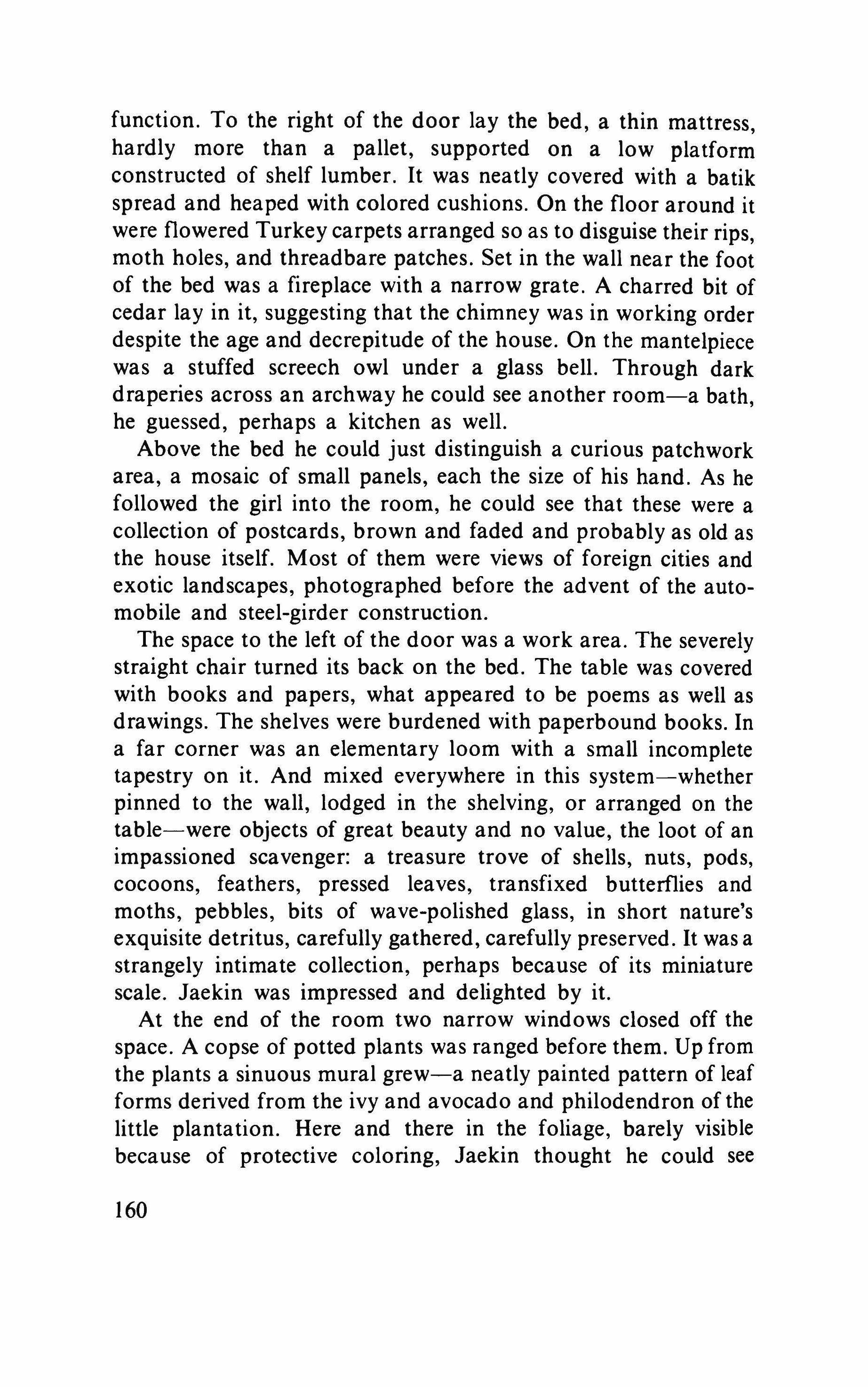
function. To the right of the door lay the bed, a thin mattress, hardly more than a pallet, supported on a low platform constructed of shelf lumber. It was neatly covered with a batik spread and heaped with colored cushions. On the floor around it were flowered Turkey carpets arranged so as to disguise their rips, moth holes, and threadbare patches. Set in the wall near the foot of the bed was a fireplace with a narrow grate. A charred bit of cedar lay in it, suggesting that the chimney was in working order despite the age and decrepitude of the house. On the mantelpiece was a stuffed screech owl under a glass bell. Through dark draperies across an archway he could see another room-a bath, he guessed, perhaps a kitchen as well.
Above the bed he could just distinguish a curious patchwork area, a mosaic of small panels, each the size of his hand. As he followed the girl into the room, he could see that these were a collection of postcards, brown and faded and probably as old as the house itself. Most of them were views of foreign cities and exotic landscapes, photographed before the advent of the automobile and steel-girder construction.
The space to the left of the door was a work area. The severely straight chair turned its back on the bed. The table was covered with books and papers, what appeared to be poems as well as drawings. The shelves were burdened with paperbound books. In a far corner was an elementary loom with a small incomplete tapestry on it. And mixed everywhere in this system-whether pinned to the wall, lodged in the shelving, or arranged on the table-were objects of great beauty and no value, the loot of an impassioned scavenger: a treasure trove of shells, nuts, pods, cocoons, feathers, pressed leaves, transfixed butterflies and moths, pebbles, bits of wave-polished glass, in short nature's exquisite detritus, carefully gathered, carefully preserved. It was a strangely intimate collection, perhaps because of its miniature scale. Jaekin was impressed and delighted by it.
At the end of the room two narrow windows closed off the space. A copse of potted plants was ranged before them. Up from the plants a sinuous mural grew-a neatly painted pattern of leaf forms derived from the ivy and avocado and philodendron of the little plantation. Here and there in the foliage, barely visible because of protective coloring, Jaekin thought he could see
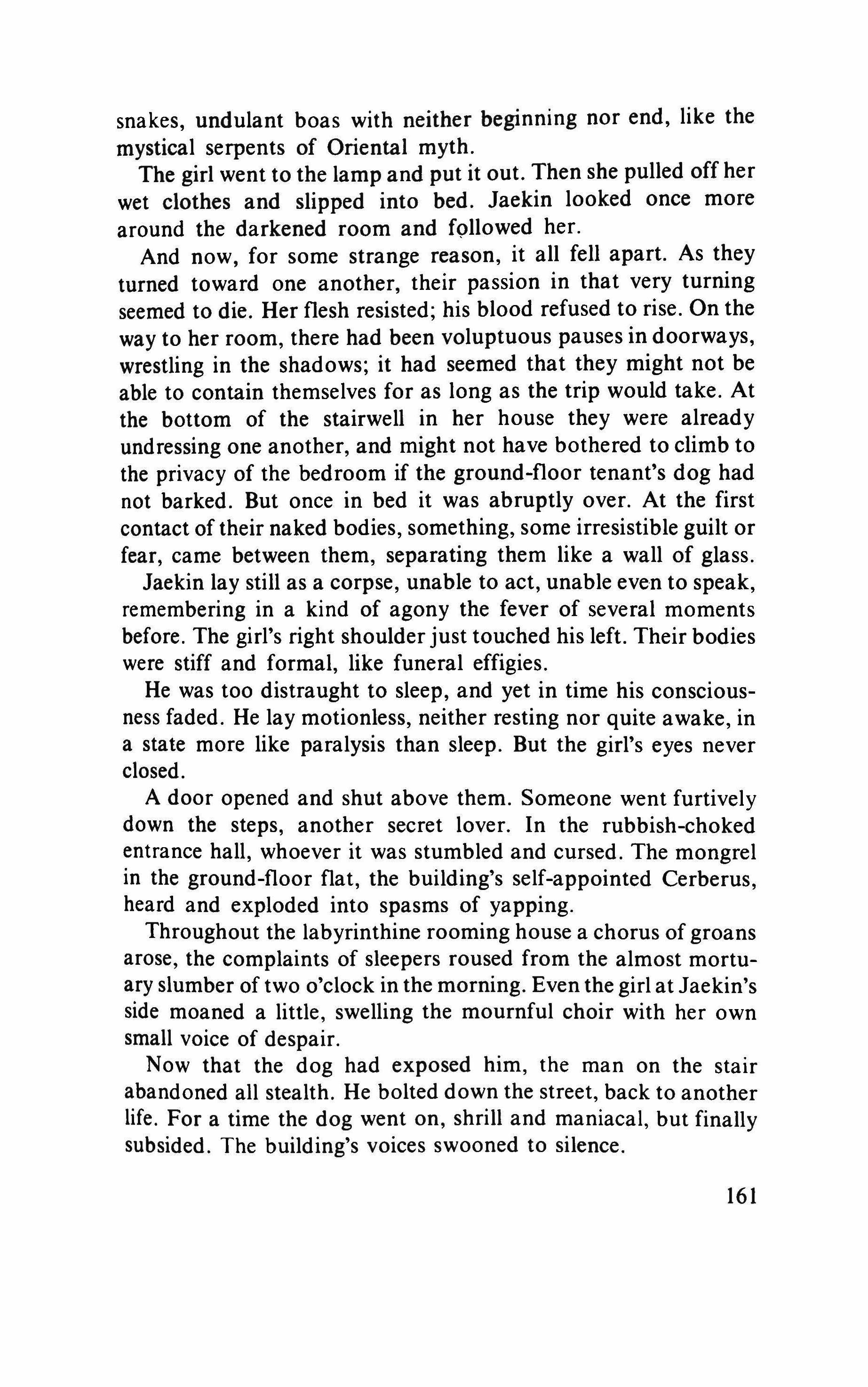
snakes, undulant boas with neither beginning nor end, like the mystical serpents of Oriental myth.
The girl went to the lamp and put it out. Then she pulled off her wet clothes and slipped into bed. Jaekin looked once more around the darkened room and followed her.
And now, for some strange reason, it all fell apart. As they turned toward one another, their passion in that very turning seemed to die. Her flesh resisted; his blood refused to rise. On the way to her room, there had been voluptuous pauses in doorways, wrestling in the shadows; it had seemed that they might not be able to contain themselves for as long as the trip would take. At the bottom of the stairwell in her house they were already undressing one another, and might not have bothered to climb to the privacy of the bedroom if the ground-floor tenant's dog had not barked. But once in bed it was abruptly over. At the first contact of their naked bodies, something, some irresistible guilt or fear, came between them, separating them like a wall of glass.
Jaekin lay still as a corpse, unable to act, unable even to speak, remembering in a kind of agony the fever of several moments before. The girl's right shoulder just touched his left. Their bodies were stiff and formal, like funeral effigies.
He was too distraught to sleep, and yet in time his consciousness faded. He lay motionless, neither resting nor quite awake, in a state more like paralysis than sleep. But the girl's eyes never closed.
A door opened and shut above them. Someone went furtively down the steps, another secret lover. In the rubbish-choked entrance hall, whoever it was stumbled and cursed. The mongrel in the ground-floor flat, the building's self-appointed Cerberus, heard and exploded into spasms of yapping.
Throughout the labyrinthine rooming house a chorus of groans arose, the complaints of sleepers roused from the almost mortuary slumber of two o'clock in the morning. Even the girl at Jaekin's side moaned a little, swelling the mournful choir with her own small voice of despair.
Now that the dog had exposed him, the man on the stair abandoned all stealth. He bolted down the street, back to another life. For a time the dog went on, shrill and maniacal, but finally subsided. The building's voices swooned to silence.
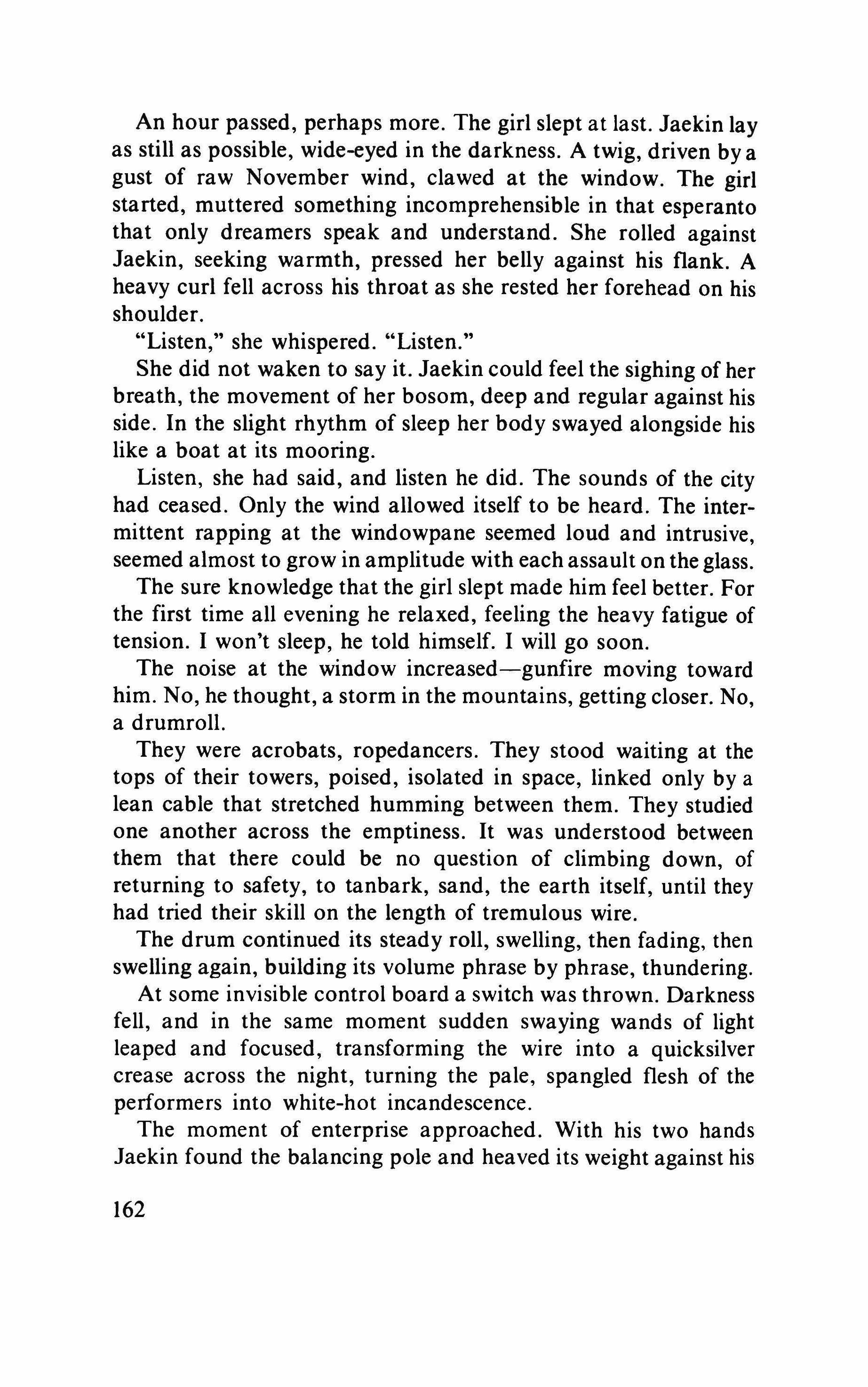
An hour passed, perhaps more. The girl slept at last. Jaekin lay as still as possible, wide-eyed in the darkness. A twig, driven by a gust of raw November wind, clawed at the window. The girl started, muttered something incomprehensible in that esperanto that only dreamers speak and understand. She rolled against Jaekin, seeking warmth, pressed her belly against his flank. A heavy curl fell across his throat as she rested her forehead on his shoulder.
"Listen," she whispered. "Listen."
She did not waken to say it. Jaekin could feel the sighing of her breath, the movement of her bosom, deep and regular against his side. In the slight rhythm of sleep her body swayed alongside his like a boat at its mooring.
Listen, she had said, and listen he did. The sounds of the city had ceased. Only the wind allowed itself to be heard. The intermittent rapping at the windowpane seemed loud and intrusive, seemed almost to grow in amplitude with each assault on the glass.
The sure knowledge that the girl slept made him feel better. For the first time all evening he relaxed, feeling the heavy fatigue of tension. I won't sleep, he told himself. I will go soon.
The noise at the window increased-gunfire moving toward him. No, he thought, a storm in the mountains, getting closer. No, a drumroll.
They were acrobats, ropedancers. They stood waiting at the tops of their towers, poised, isolated in space, linked only by a lean cable that stretched humming between them. They studied one another across the emptiness. It was understood between them that there could be no question of climbing down, of returning to safety, to tanbark, sand, the earth itself, until they had tried their skill on the length of tremulous wire.
The drum continued its steady roll, swelling, then fading, then swelling again, building its volume phrase by phrase, thundering.
At some invisible control board a switch was thrown. Darkness fell, and in the same moment sudden swaying wands of light leaped and focused, transforming the wire into a quicksilver crease across the night, turning the pale, spangled flesh of the performers into white-hot incandescence.
The moment of enterprise approached. With his two hands Jaekin found the balancing pole and heaved its weight against his
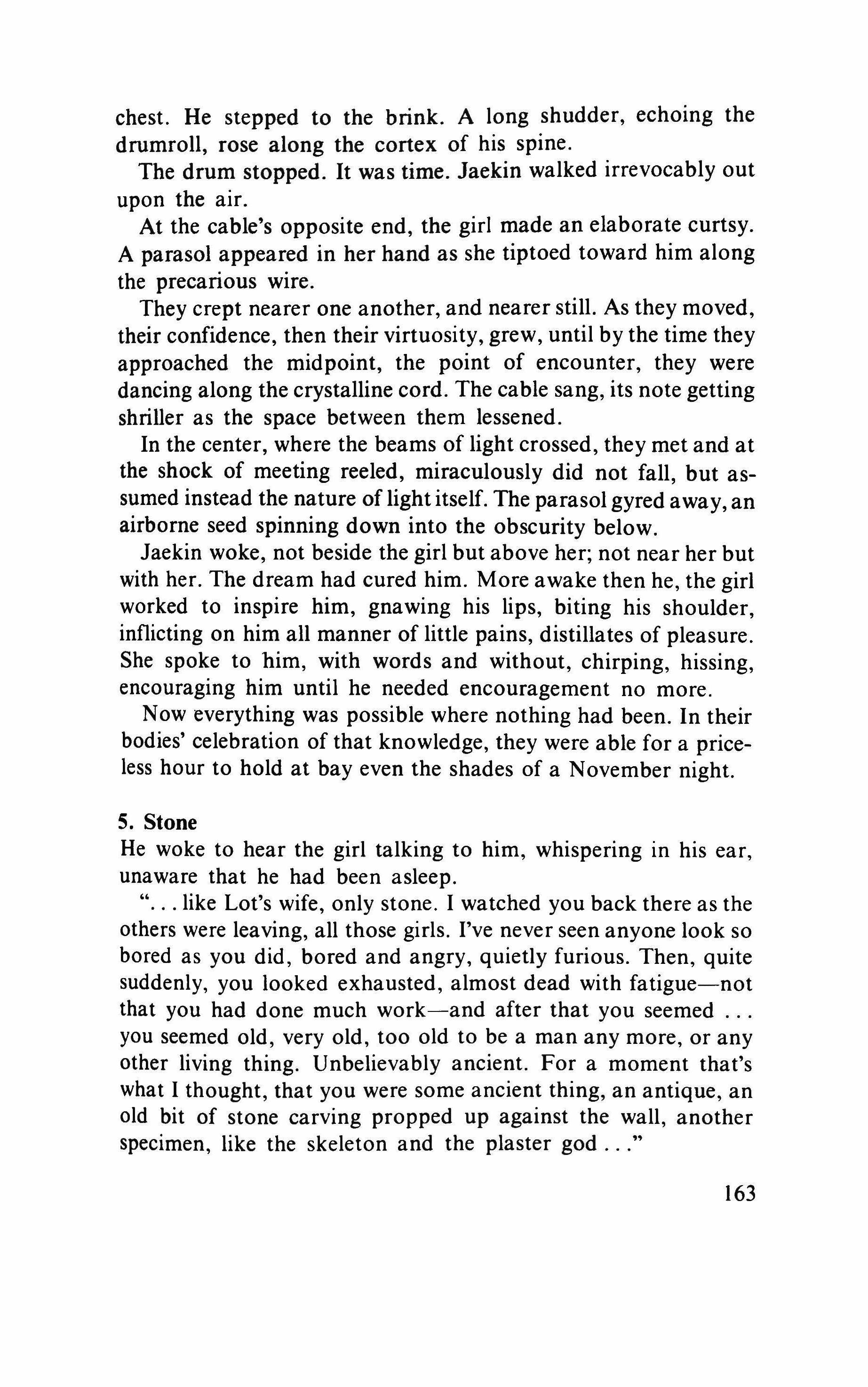
chest. He stepped to the brink. A long shudder, echoing the drumroll, rose along the cortex of his spine.
The drum stopped. It was time. Jaekin walked irrevocably out upon the air.
At the cable's opposite end, the girl made an elaborate curtsy. A parasol appeared in her hand as she tiptoed toward him along the precarious wire.
They crept nearer one another, and nearer still. As they moved, their confidence, then their virtuosity, grew, until by the time they approached the midpoint, the point of encounter, they were dancing along the crystalline cord. The cable sang, its note getting shriller as the space between them lessened.
In the center, where the beams of light crossed, they met and at the shock of meeting reeled, miraculously did not fall, but assumed instead the nature of light itself. The parasol gyred away, an airborne seed spinning down into the obscurity below.
Jaekin woke, not beside the girl but above her; not near her but with her. The dream had cured him. More awake then he, the girl worked to inspire him, gnawing his lips, biting his shoulder, inflicting on him all manner of little pains, distillates of pleasure. She spoke to him, with words and without, chirping, hissing, encouraging him until he needed encouragement no more.
Now everything was possible where nothing had been. In their bodies' celebration of that knowledge, they were able for a priceless hour to hold at bay even the shades of a November night.
He woke to hear the girl talking to him, whispering in his ear, unaware that he had been asleep. like Lot's wife, only stone. I watched you back there as the others were leaving, all those girls. I've never seen anyone look so bored as you did, bored and angry, quietly furious. Then, quite suddenly, you looked exhausted, almost dead with fatigue-not that you had done much work-and after that you seemed you seemed old, very old, too old to be a man any more, or any other living thing. Unbelievably ancient. For a moment that's what I thought, that you were some ancient thing, an antique, an old bit of stone carving propped up against the wall, another specimen, like the skeleton and the plaster god
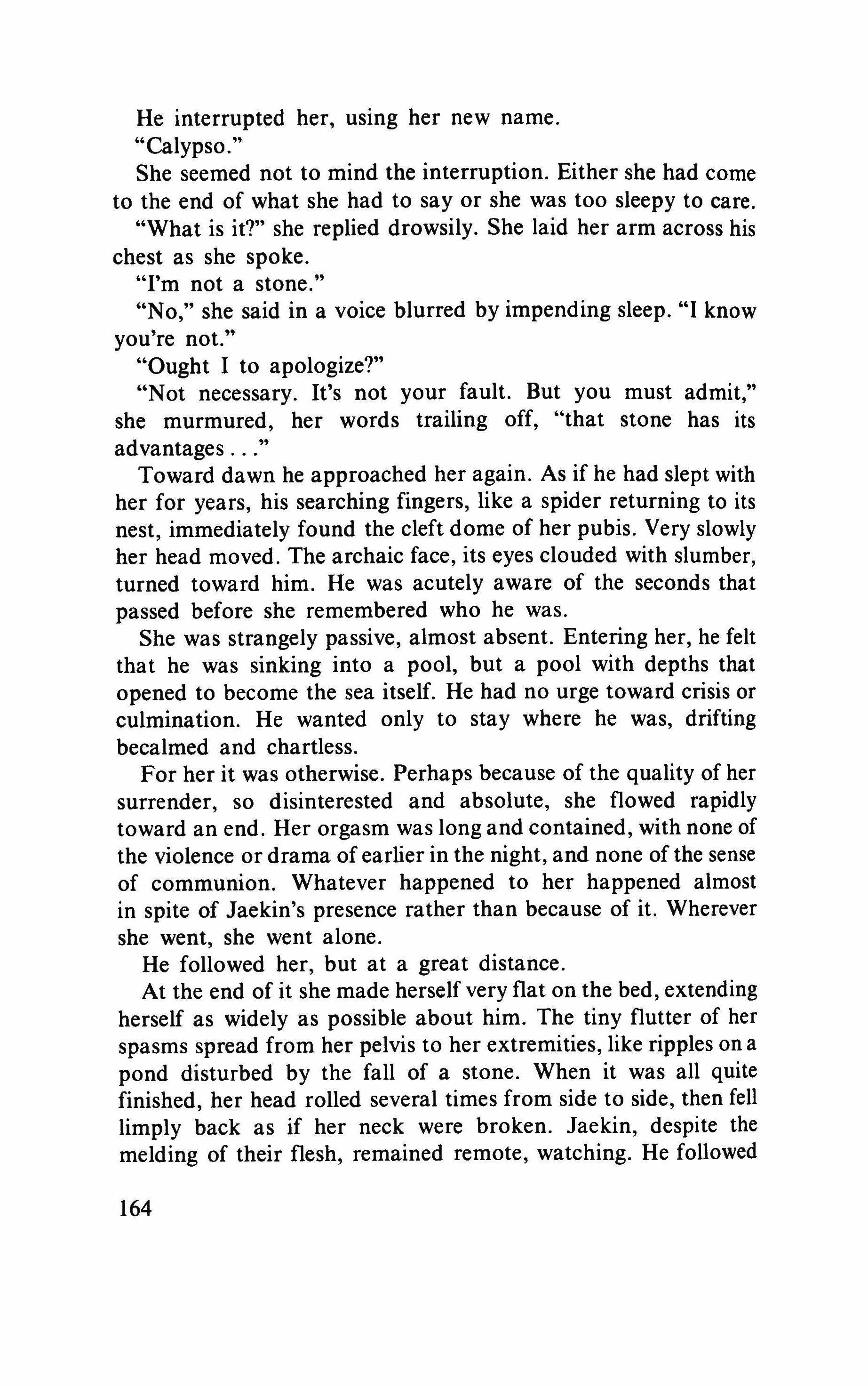
He interrupted her, using her new name. "Calypso."
She seemed not to mind the interruption. Either she had come to the end of what she had to say or she was too sleepy to care.
"What is it?" she replied drowsily. She laid her arm across his chest as she spoke.
"I'm not a stone."
"No," she said in a voice blurred by impending sleep. "1 know you're not."
"Ought 1 to apologize?"
"Not necessary. It's not your fault. But you must admit," she murmured, her words trailing off, "that stone has its advantages
Toward dawn he approached her again. As if he had slept with her for years, his searching fingers, like a spider returning to its nest, immediately found the cleft dome of her pubis. Very slowly her head moved. The archaic face, its eyes clouded with slumber, turned toward him. He was acutely aware of the seconds that passed before she remembered who he was.
She was strangely passive, almost absent. Entering her, he felt that he was sinking into a pool, but a pool with depths that opened to become the sea itself. He had no urge toward crisis or culmination. He wanted only to stay where he was, drifting becalmed and chartless.
For her it was otherwise. Perhaps because of the quality of her surrender, so disinterested and absolute, she flowed rapidly toward an end. Her orgasm was long and contained, with none of the violence or drama of earlier in the night, and none of the sense of communion. Whatever happened to her happened almost in spite of Jaekin's presence rather than because of it. Wherever she went, she went alone.
He followed her, but at a great distance.
At the end of it she made herself very flat on the bed, extending herself as widely as possible about him. The tiny flutter of her spasms spread from her pelvis to her extremities, like ripples on a pond disturbed by the fall of a stone. When it was all quite finished, her head rolled several times from side to side, then fell limply back as if her neck were broken. laekin, despite the melding of their flesh, remained remote, watching. He followed

with his eyes the lolling of her head-which was, he discovered with a certain grotesque thrill, imperfect, asymmetrical. The girl's left ear had a lobe, while her right had none.
6. Out and back
Jaekin got up at noon. The girl slept on like a child curled in a question mark. Careful not to disturb her, he went in search of a bath. He showered uncomfortably, battling the skimpy curtain that made a narrow plastic tube around him.
He left the steamy cubicle and toweled himself dry beside the bed. The girl had not moved. While he dressed he watched her, indulging his curiosity calmly and objectively as if she were a work of art. The amber hair hid her face and a quilt covered her to the waist, but he had the precise roundness of her breast to study, and the tight apex of her nipple. He discovered a small mole on her shoulder blade and observed that the hair in her armpit was lighter in tint than the hair of her head, which seemed to him, in his present state, extraordinary. There was a bruise on her right arm above the elbow. It made him remember the night and wonder how her thighs might be marked.
The room of course had changed. The evening before, he had entered a poor but fabulous chamber, a secret bower contrived somehow beyond reality. Now, in the bald light of midday, the painted walls had lost some of their enchantment. The murals were attractive, like the work of a good naive painter, and the color was far more subtle than he had guessed, but they were only paintings instead of magic.
On the floor beside the potted plants, where he had dropped it the night before, he found his raincoat-still damp, very rumpled, and smelling of mildew. It seemed a suitable cloak for the dreary world to which he was about to return. He looked again at the girl and felt his throat tighten as he remembered her warmth. Resisting the temptation to go back to her, he turned to the window. The day was gray, but brightening. Steam rose off the rooftops of the buildings across the street. Satisfied that the weather would not require him to wear the offensive coat, he threw it over his arm and crossed the room as quietly as possible to the door.
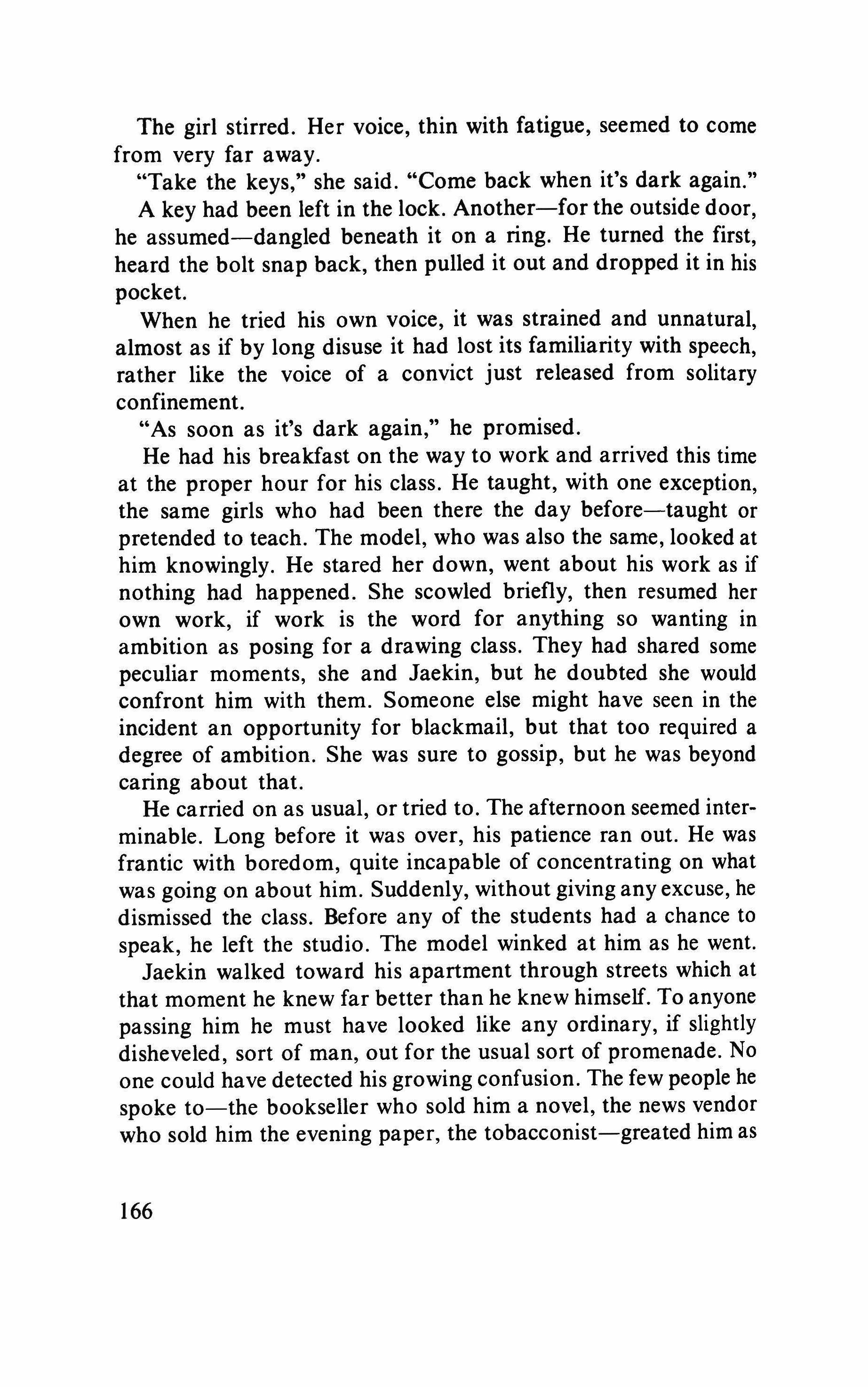
The girl stirred. Her voice, thin with fatigue, seemed to come from very far away.
"Take the keys," she said. "Come back when it's dark again."
A key had been left in the lock. Another-for the outside door, he assumed-dangled beneath it on a ring. He turned the first, heard the bolt snap back, then pulled it out and dropped it in his pocket.
When he tried his own voice, it was strained and unnatural, almost as if by long disuse it had lost its familiarity with speech, rather like the voice of a convict just released from solitary confinement.
"As soon as it's dark again," he promised.
He had his breakfast on the way to work and arrived this time at the proper hour for his class. He taught, with one exception, the same girls who had been there the day before-taught or pretended to teach. The model, who was also the same, looked at him knowingly. He stared her down, went about his work as if nothing had happened. She scowled briefly, then resumed her own work, if work is the word for anything so wanting in ambition as posing for a drawing class. They had shared some peculiar moments, she and Jaekin, but he doubted she would confront him with them. Someone else might have seen in the incident an opportunity for blackmail, but that too required a degree of ambition. She was sure to gossip, but he was beyond caring about that.
He carried on as usual, or tried to. The afternoon seemed interminable. Long before it was over, his patience ran out. He was frantic with boredom, quite incapable of concentrating on what was going on about him. Suddenly, without giving any excuse, he dismissed the class. Before any of the students had a chance to speak, he left the studio. The model winked at him as he went.
Jaekin walked toward his apartment through streets which at that moment he knew far better than he knew himself. To anyone passing him he must have looked like any ordinary, if slightly disheveled, sort of man, out for the usual sort of promenade. No one could have detected his growing confusion. The few people he spoke to-the bookseller who sold him a novel, the news vendor who sold him the evening paper, the tobacconist-greated him as
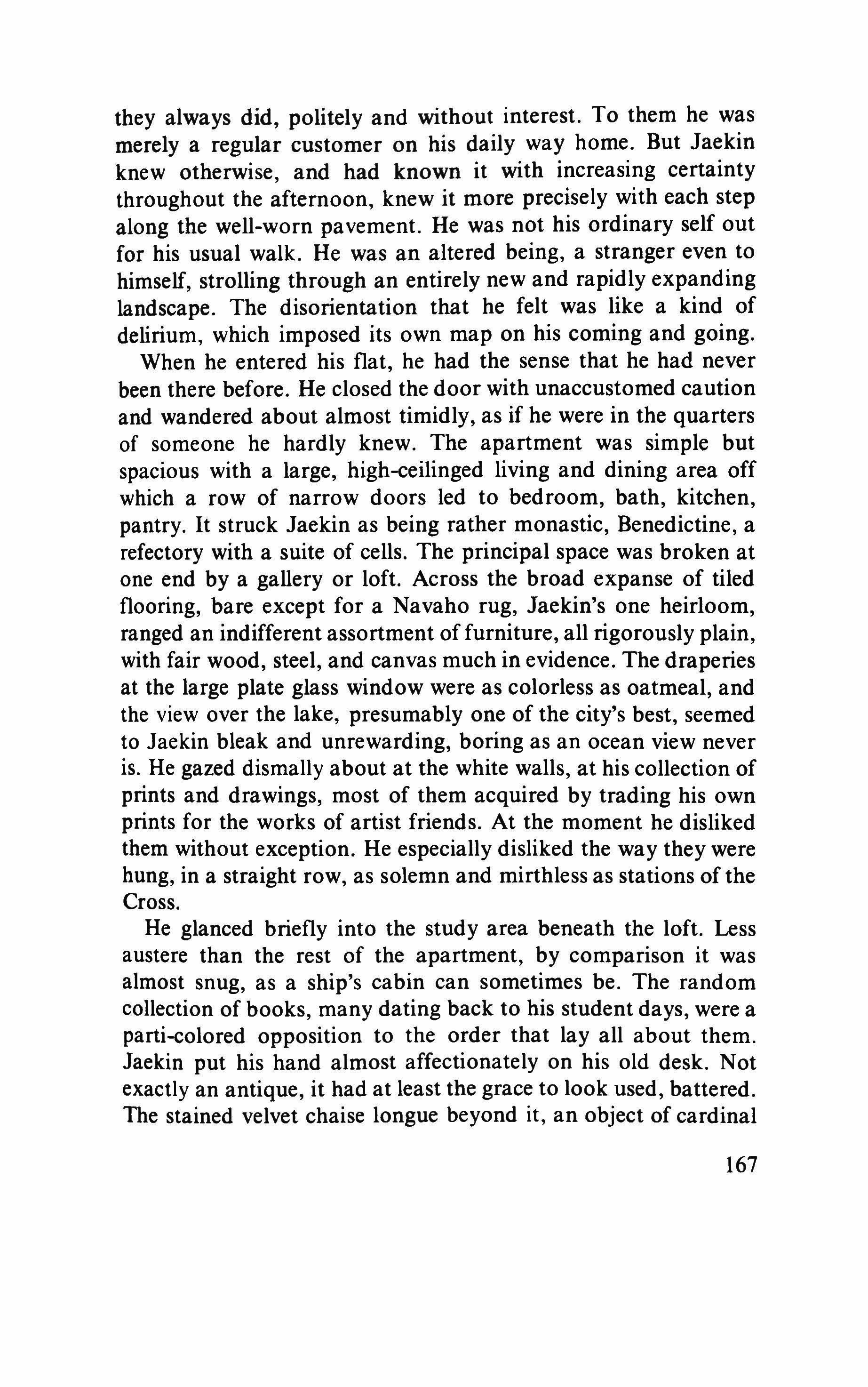
they always did, politely and without interest. To them he was merely a regular customer on his daily way home. But Jaekin knew otherwise, and had known it with increasing certainty throughout the afternoon, knew it more precisely with each step along the well-worn pavement. He was not his ordinary self out for his usual walk. He was an altered being, a stranger even to himself, strolling through an entirely new and rapidly expanding landscape. The disorientation that he felt was like a kind of delirium, which imposed its own map on his coming and going.
When he entered his flat, he had the sense that he had never been there before. He closed the door with unaccustomed caution and wandered about almost timidly, as if he were in the quarters of someone he hardly knew. The apartment was simple but spacious with a large, high-ceilinged living and dining area off which a row of narrow doors led to bedroom, bath, kitchen, pantry. It struck Jaekin as being rather monastic, Benedictine, a refectory with a suite of cells. The principal space was broken at one end by a gallery or loft. Across the broad expanse of tiled flooring, bare except for a Navaho rug, Jaekin's one heirloom, ranged an indifferent assortment of furniture, all rigorously plain, with fair wood, steel, and canvas much in evidence. The draperies at the large plate glass window were as colorless as oatmeal, and the view over the lake, presumably one of the city's best, seemed to Jaekin bleak and unrewarding, boring as an ocean view never is. He gazed dismally about at the white walls, at his collection of prints and drawings, most of them acquired by trading his own prints for the works of artist friends. At the moment he disliked them without exception. He especially disliked the way they were hung, in a straight row, as solemn and mirthless as stations of the Cross.
He glanced briefly into the study area beneath the loft. Less austere than the rest of the apartment, by comparison it was almost snug, as a ship's cabin can sometimes be. The random collection of books, many dating back to his student days, were a parti-colored opposition to the order that lay all about them. Jaekin put his hand almost affectionately on his old desk. Not exactly an antique, it had at least the grace to look used, battered. The stained velvet chaise longue beyond it, an object of cardinal
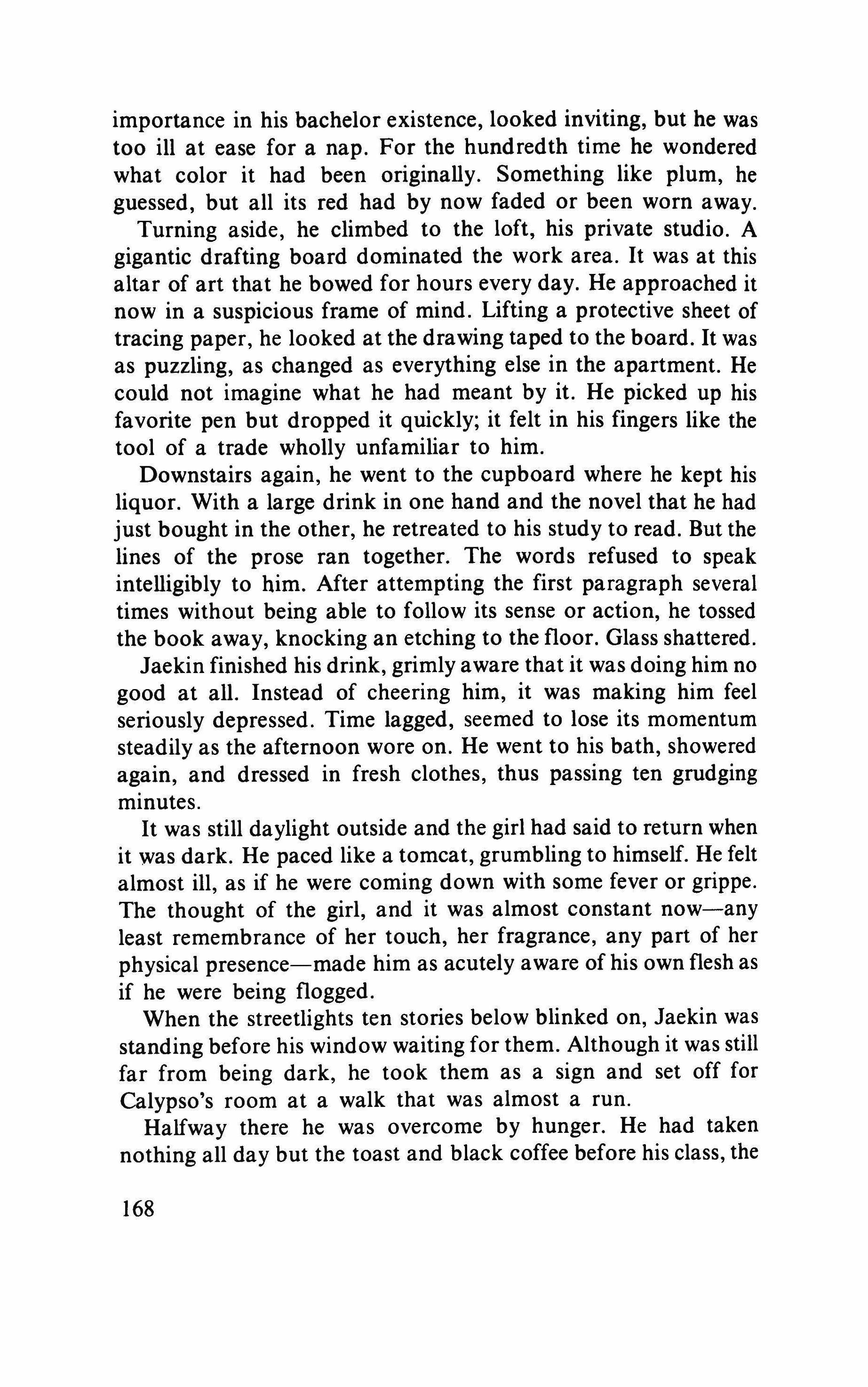
importance in his bachelor existence, looked inviting, but he was too ill at ease for a nap. For the hundredth time he wondered what color it had been originally. Something like plum, he guessed, but all its red had by now faded or been worn away.
Turning aside, he climbed to the loft, his private studio. A gigantic drafting board dominated the work area. It was at this altar of art that he bowed for hours every day. He approached it now in a suspicious frame of mind. Lifting a protective sheet of tracing paper, he looked at the drawing taped to the board. It was as puzzling, as changed as everything else in the apartment. He could not imagine what he had meant by it. He picked up his favorite pen but dropped it quickly; it felt in his fingers like the tool of a trade wholly unfamiliar to him.
Downstairs again, he went to the cupboard where he kept his liquor. With a large drink in one hand and the novel that he had just bought in the other, he retreated to his study to read. But the lines of the prose ran together. The words refused to speak intelligibly to him. After attempting the first paragraph several times without being able to follow its sense or action, he tossed the book away, knocking an etching to the floor. Glass shattered.
Jaekin finished his drink, grimly aware that it was doing him no good at all. Instead of cheering him, it was making him feel seriously depressed. Time lagged, seemed to lose its momentum steadily as the afternoon wore on. He went to his bath, showered again, and dressed in fresh clothes, thus passing ten grudging minutes.
It was still daylight outside and the girl had said to return when it was dark. He paced like a tomcat, grumbling to himself. He felt almost ill, as if he were coming down with some fever or grippe. The thought of the girl, and it was almost constant now-any least remembrance of her touch, her fragrance, any part of her physical presence-made him as acutely aware of his own flesh as if he were being flogged.
When the streetlights ten stories below blinked on, Jaekin was standing before his window waiting for them. Although it was still far from being dark, he took them as a sign and set off for Calypso's room at a walk that was almost a run.
Halfway there he was overcome by hunger. He had taken nothing all day but the toast and black coffee before his class, the
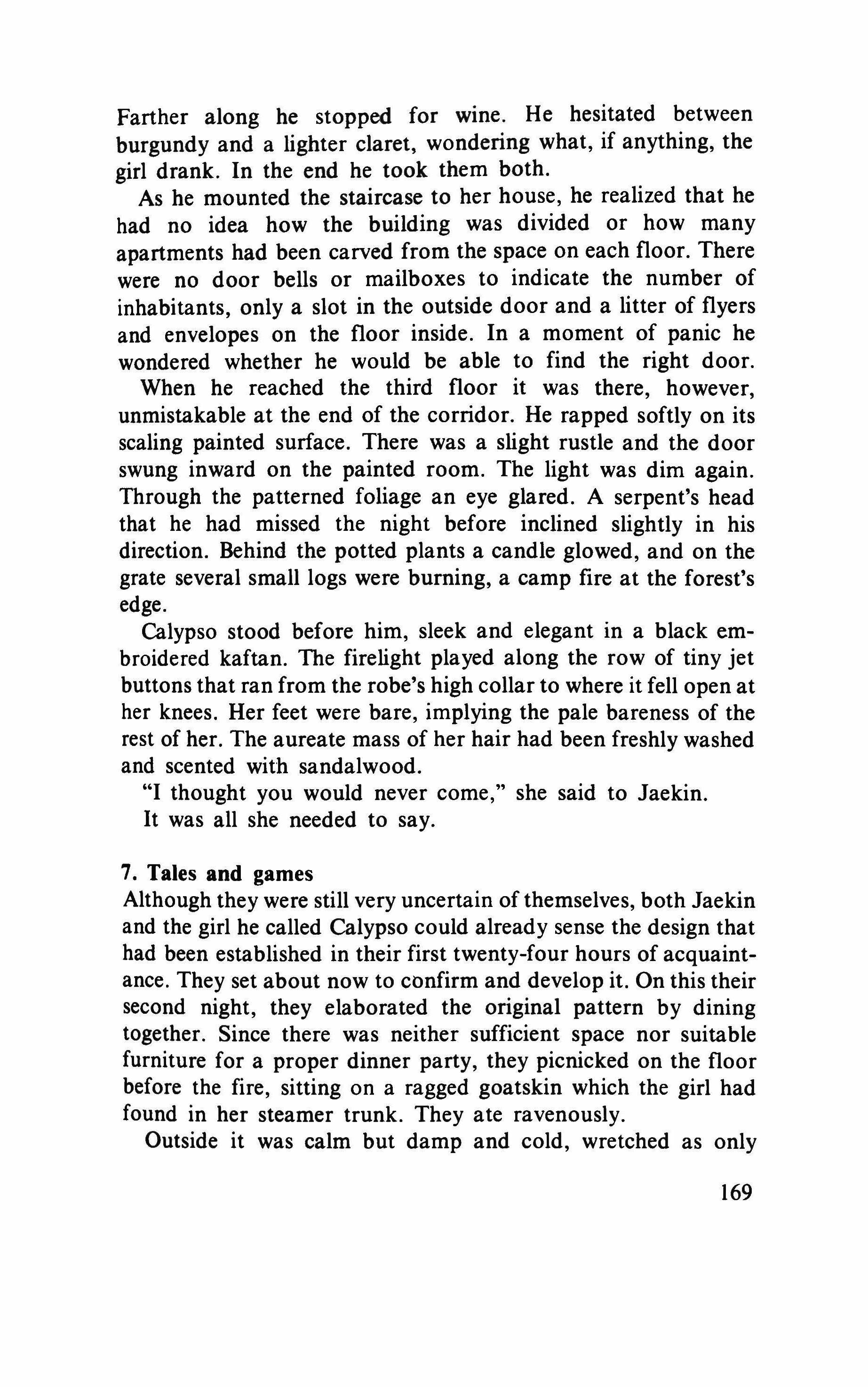
Farther along he stopped for wine. He hesitated between burgundy and a lighter claret, wondering what, if anything, the girl drank. In the end he took them both.
As he mounted the staircase to her house, he realized that he had no idea how the building was divided or how many apartments had been carved from the space on each floor. There were no door bells or mailboxes to indicate the number of inhabitants, only a slot in the outside door and a litter of flyers and envelopes on the floor inside. In a moment of panic he wondered whether he would be able to find the right door.
When he reached the third floor it was there, however, unmistakable at the end of the corridor. He rapped softly on its scaling painted surface. There was a slight rustle and the door swung inward on the painted room. The light was dim again. Through the patterned foliage an eye glared. A serpent's head that he had missed the night before inclined slightly in his direction. Behind the potted plants a candle glowed, and on the grate several small logs were burning, a camp fire at the forest's edge.
Calypso stood before him, sleek and elegant in a black embroidered kaftan. The firelight played along the row of tiny jet buttons that ran from the robe's high collar to where it fell open at her knees. Her feet were bare, implying the pale bareness of the rest of her. The aureate mass of her hair had been freshly washed and scented with sandalwood.
"I thought you would never come," she said to Jaekin. It was all she needed to say.
Although they were still very uncertain of themselves, both Jaekin and the girl he called Calypso could already sense the design that had been established in their first twenty-four hours of acquaintance. They set about now to confirm and develop it. On this their second night, they elaborated the original pattern by dining together. Since there was neither sufficient space nor suitable furniture for a proper dinner party, they picnicked on the floor before the fire, sitting on a ragged goatskin which the girl had found in her steamer trunk. They ate ravenously. Outside it was calm but damp and cold, wretched as only
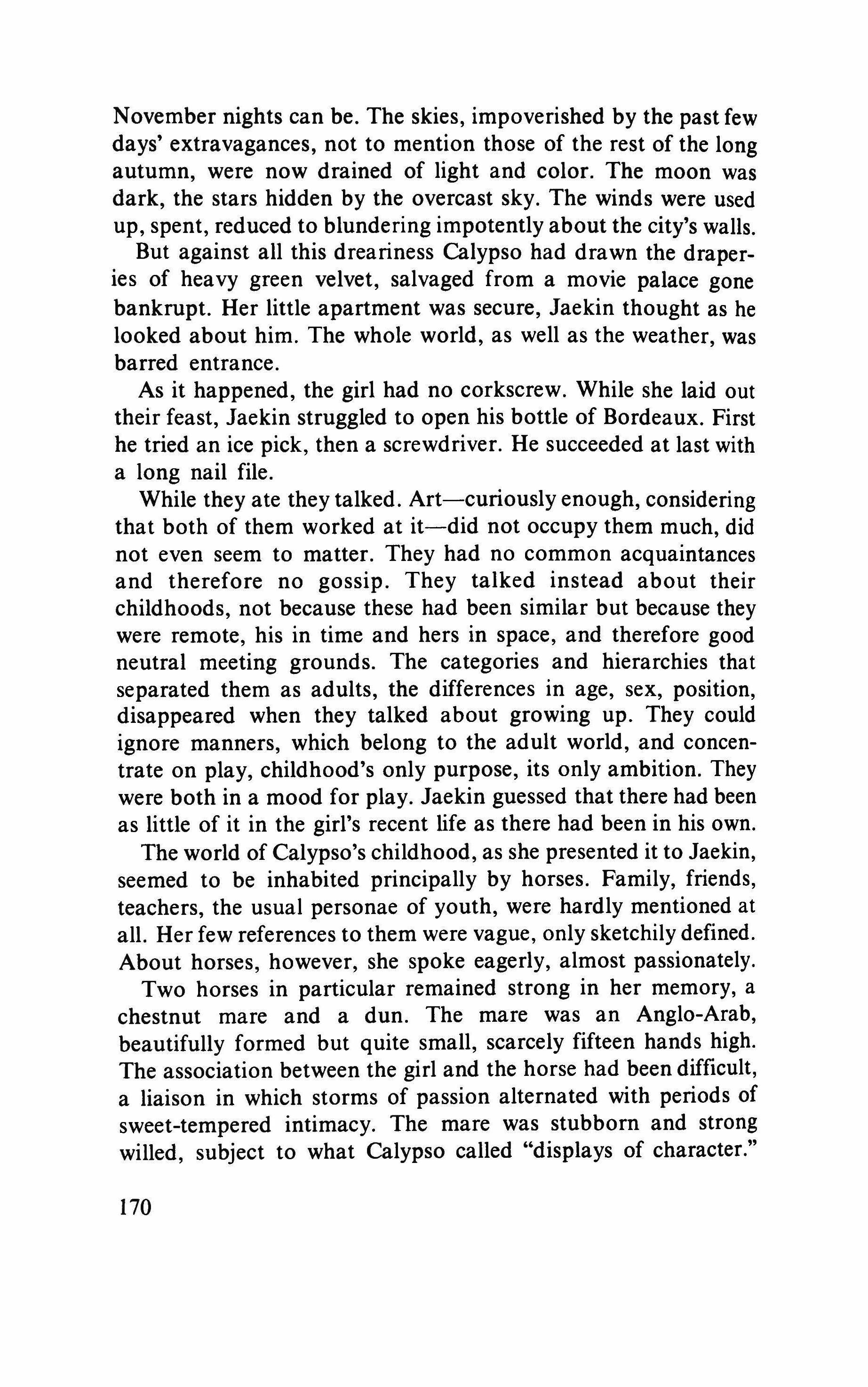
November nights can be. The skies, impoverished by the past few days' extravagances, not to mention those of the rest of the long autumn, were now drained of light and color. The moon was dark, the stars hidden by the overcast sky. The winds were used up, spent, reduced to blundering impotently about the city's walls.
But against all this dreariness Calypso had drawn the draperies of heavy green velvet, salvaged from a movie palace gone bankrupt. Her little apartment was secure, Jaekin thought as he looked about him. The whole world, as well as the weather, was barred entrance.
As it happened, the girl had no corkscrew. While she laid out their feast, Jaekin struggled to open his bottle of Bordeaux. First he tried an ice pick, then a screwdriver. He succeeded at last with a long nail file.
While they ate they talked. Art-curiously enough, considering that both of them worked at it-did not occupy them much, did not even seem to matter. They had no common acquaintances and therefore no gossip. They talked instead about their childhoods, not because these had been similar but because they were remote, his in time and hers in space, and therefore good neutral meeting grounds. The categories and hierarchies that separated them as adults, the differences in age, sex, position, disappeared when they talked about growing up. They could ignore manners, which belong to the adult world, and concentrate on play, childhood's only purpose, its only ambition. They were both in a mood for play. Jaekin guessed that there had been as little of it in the girl's recent life as there had been in his own.
The world of Calypso's childhood, as she presented it to Jaekin, seemed to be inhabited principally by horses. Family, friends, teachers, the usual personae of youth, were hardly mentioned at all. Her few references to them were vague, only sketchily defined. About horses, however, she spoke eagerly, almost passionately.
Two horses in particular remained strong in her memory, a chestnut mare and a dun. The mare was an Anglo-Arab, beautifully formed but quite small, scarcely fifteen hands high. The association between the girl and the horse had been difficult, a liaison in which storms of passion alternated with periods of sweet-tempered intimacy. The mare was stubborn and strong willed, subject to what Calypso called "displays of character."

Loud noises made her extremely nervous. Thunder had more than once caused her to bolt. On certain days she shied hysterically at fenceposts or hedges that she usually passed in perfect tranquillity. She kicked and misbehaved in crowded paddocks. Before each meet or hunt, the girl had been obliged to braid a red warning ribbon in her mare's tail to warn other riders to keep their distance.
"It was a very long tail," Calypso recalled affectionately. "And she had white stockings on all four feet. It brings good luck, some riders say, to ride a horse with four white feet."
"Did they bring you good luck?" Jaekin asked.
"The stockings?" She shrugged and looked past him into the fireplace. Jaekin followed her gaze and for a moment saw red mares dancing in the flames.
"I took a lot of punishment from her. She stepped on me. She bit me. She kicked me. She threw me more times than 1 can remember. But she never left any scars or broke any bones."
She thought a moment, then turned back to him.
"That's a kind of luck, isn't it?"
Jaekin tried not to look dubious.
"It sounds as if she were trying to kill you," he said.
"No, not kill me," Calypso said with conviction. "She was just trying to teach me. Anyway none of the punishment mattered. Nothing mattered except that she was beautiful and 1 adored her."
Jaekin could see the logic in that, although he could not have done so a few days before.
"And the dun?" he asked.
"Oh, the dun!" She smiled and held out her glass for more wine. "The dun gave me everything 1 asked him for."
Jaekin filled the girl's glass, then topped up his own. Sipping the claret, he wondered what she meant. He also wondered if she would ever love a man the way she had loved the chestnut mare.
They finished their beef in silence. When it was gone, Calypso asked him about his own childhood. He found that he had trouble speaking of it except in very general terms. The characters and decors of its little melodramas bored even him. His fondness for his mother and his admiration for his father were such plain emotions that he could not begin to describe them. There had
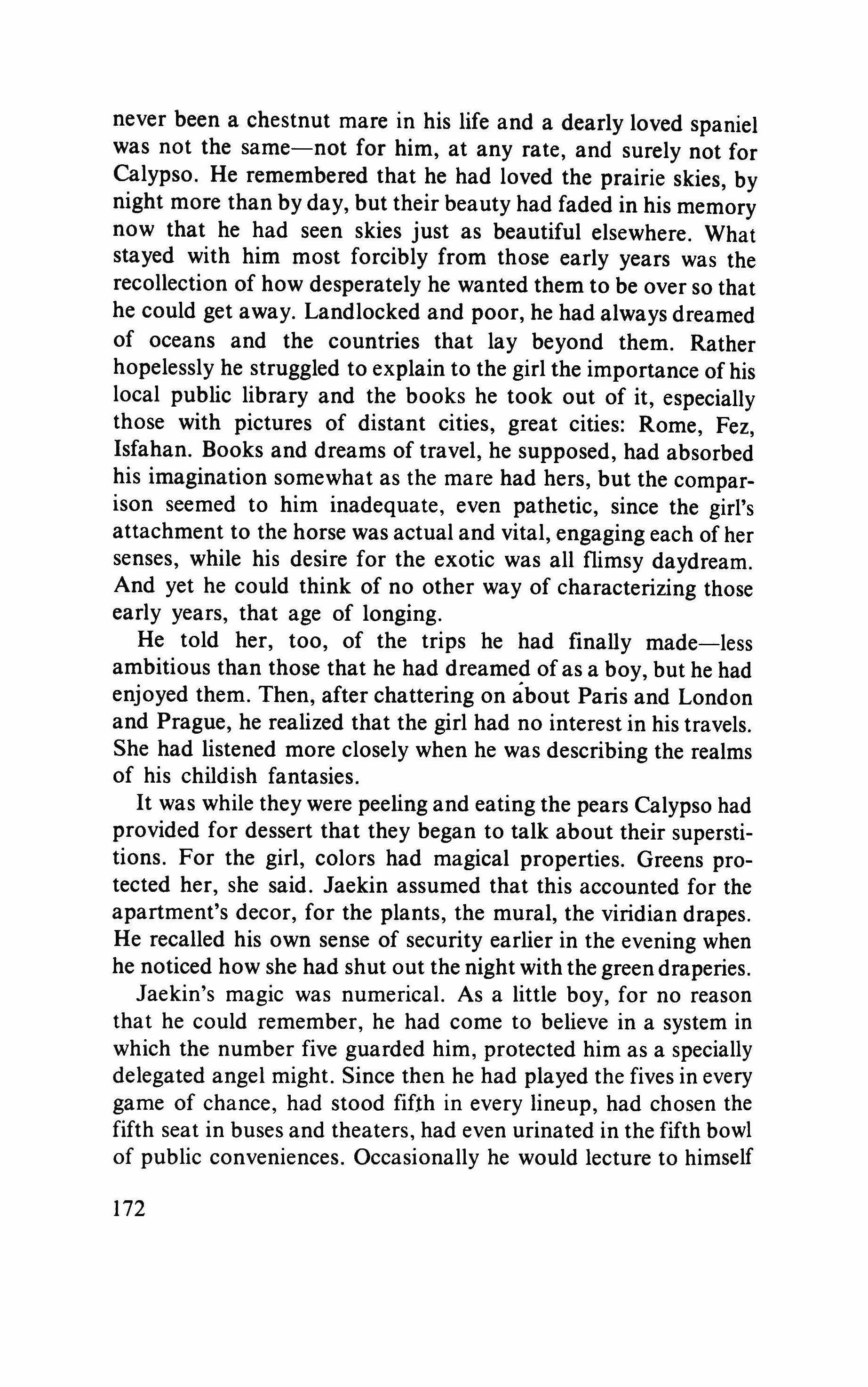
never been a chestnut mare in his life and a dearly loved spaniel was not the same-not for him, at any rate, and surely not for Calypso. He remembered that he had loved the prairie skies, by night more than by day, but their beauty had faded in his memory now that he had seen skies just as beautiful elsewhere. What stayed with him most forcibly from those early years was the recollection of how desperately he wanted them to be over so that he could get away. Landlocked and poor, he had always dreamed of oceans and the countries that lay beyond them. Rather hopelessly he struggled to explain to the girl the importance of his local public library and the books he took out of it, especially those with pictures of distant cities, great cities: Rome, Fez, Isfahan. Books and dreams of travel, he supposed, had absorbed his imagination somewhat as the mare had hers, but the comparison seemed to him inadequate, even pathetic, since the girl's attachment to the horse was actual and vital, engaging each of her senses, while his desire for the exotic was all flimsy daydream. And yet he could think of no other way of characterizing those early years, that age of longing.
He told her, too, of the trips he had finally made-less ambitious than those that he had dreamed of as a boy, but he had enjoyed them. Then, after chattering on about Paris and London and Prague, he realized that the girl had no interest in his travels. She had listened more closely when he was describing the realms of his childish fantasies.
It was while they were peeling and eating the pears Calypso had provided for dessert that they began to talk about their superstitions. For the girl, colors had magical properties. Greens protected her, she said. Jaekin assumed that this accounted for the apartment's decor, for the plants, the mural, the viridian drapes. He recalled his own sense of security earlier in the evening when he noticed how she had shut out the night with the green draperies.
Jaekin's magic was numerical. As a little boy, for no reason that he could remember, he had corne to believe in a system in which the number five guarded him, protected him as a specially delegated angel might. Since then he had played the fives in every game of chance, had stood fifth in every lineup, had chosen the fifth seat in buses and theaters, had even urinated in the fifth bowl of public conveniences. Occasionally he would lecture to himself
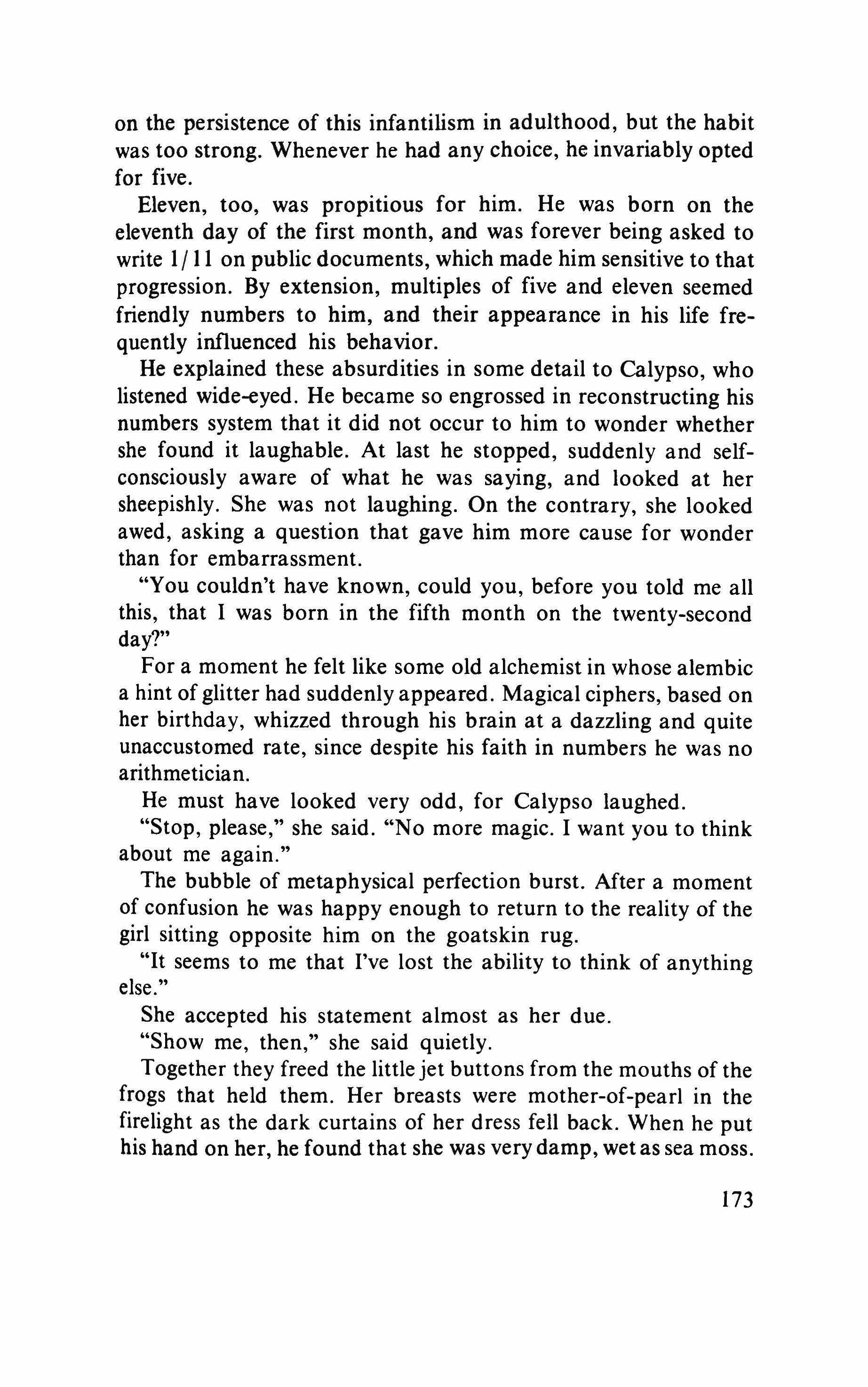
on the persistence of this infantilism in adulthood, but the habit was too strong. Whenever he had any choice, he invariably opted for five.
Eleven, too, was propitious for him. He was born on the eleventh day of the first month, and was forever being asked to write 1/11 on public documents, which made him sensitive to that progression. By extension, multiples of five and eleven seemed friendly numbers to him, and their appearance in his life frequently influenced his behavior.
He explained these absurdities in some detail to Calypso, who listened wide-eyed. He became so engrossed in reconstructing his numbers system that it did not occur to him to wonder whether she found it laughable. At last he stopped, suddenly and selfconsciously aware of what he was saying, and looked at her sheepishly. She was not laughing. On the contrary, she looked awed, asking a question that gave him more cause for wonder than for embarrassment.
"You couldn't have known, could you, before you told me all this, that I was born in the fifth month on the twenty-second day?"
For a moment he felt like some old alchemist in whose alembic a hint of glitter had suddenly appeared. Magical ciphers, based on her birthday, whizzed through his brain at a dazzling and quite unaccustomed rate, since despite his faith in numbers he was no arithmetician.
He must have looked very odd, for Calypso laughed.
"Stop, please," she said. "No more magic. I want you to think about me again."
The bubble of metaphysical perfection burst. After a moment of confusion he was happy enough to return to the reality of the girl sitting opposite him on the goatskin rug.
"It seems to me that I've lost the ability to think of anything else.
She accepted his statement almost as her due.
"Show me, then," she said quietly.
Together they freed the little jet buttons from the mouths of the frogs that held them. Her breasts were mother-of-pearl in the firelight as the dark curtains of her dress fell back. When he put his hand on her, he found that she was very damp, wet as sea moss.
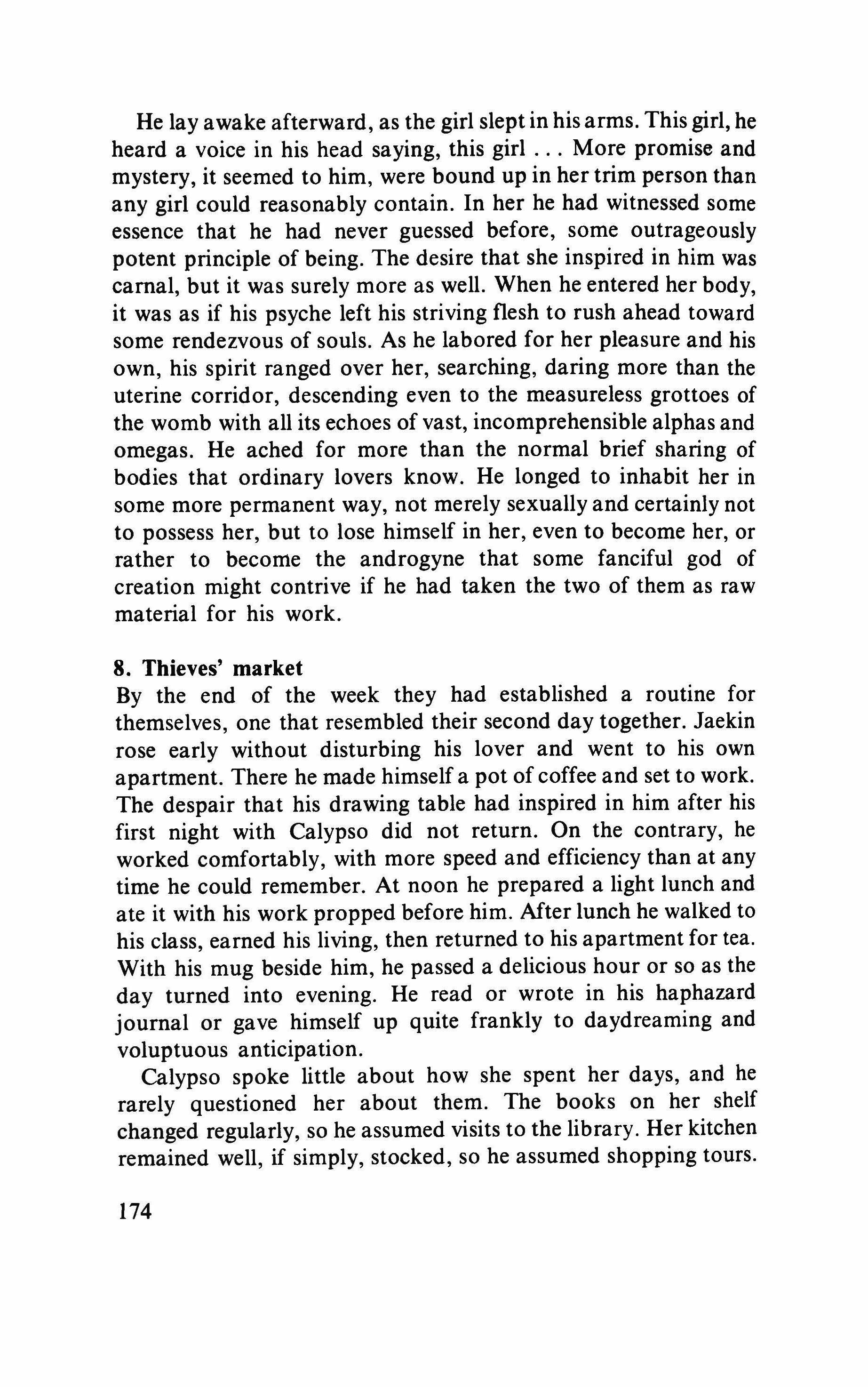
He lay awake afterward, as the girl slept in his arms. This girl, he heard a voice in his head saying, this girl More promise and mystery, it seemed to him, were bound up in her trim person than any girl could reasonably contain. In her he had witnessed some essence that he had never guessed before, some outrageously potent principle of being. The desire that she inspired in him was carnal, but it was surely more as well. When he entered her body, it was as if his psyche left his striving flesh to rush ahead toward some rendezvous of souls. As he labored for her pleasure and his own, his spirit ranged over her, searching, daring more than the uterine corridor, descending even to the measureless grottoes of the womb with all its echoes of vast, incomprehensible alphas and omegas. He ached for more than the normal brief sharing of bodies that ordinary lovers know. He longed to inhabit her in some more permanent way, not merely sexually and certainly not to possess her, but to lose himself in her, even to become her, or rather to become the androgyne that some fanciful god of creation might contrive if he had taken the two of them as raw material for his work.
By the end of the week they had established a routine for themselves, one that resembled their second day together. Jaekin rose early without disturbing his lover and went to his own apartment. There he made himself a pot of coffee and set to work. The despair that his drawing table had inspired in him after his first night with Calypso did not return. On the contrary, he worked comfortably, with more speed and efficiency than at any time he could remember. At noon he prepared a light lunch and ate it with his work propped before him. After lunch he walked to his class, earned his living, then returned to his apartment for tea. With his mug beside him, he passed a delicious hour or so as the day turned into evening. He read or wrote in his haphazard journal or gave himself up quite frankly to daydreaming and voluptuous anticipation.
Calypso spoke little about how she spent her days, and he rarely questioned her about them. The books on her shelf changed regularly, so he assumed visits to the library. Her kitchen remained well, if simply, stocked, so he assumed shopping tours.
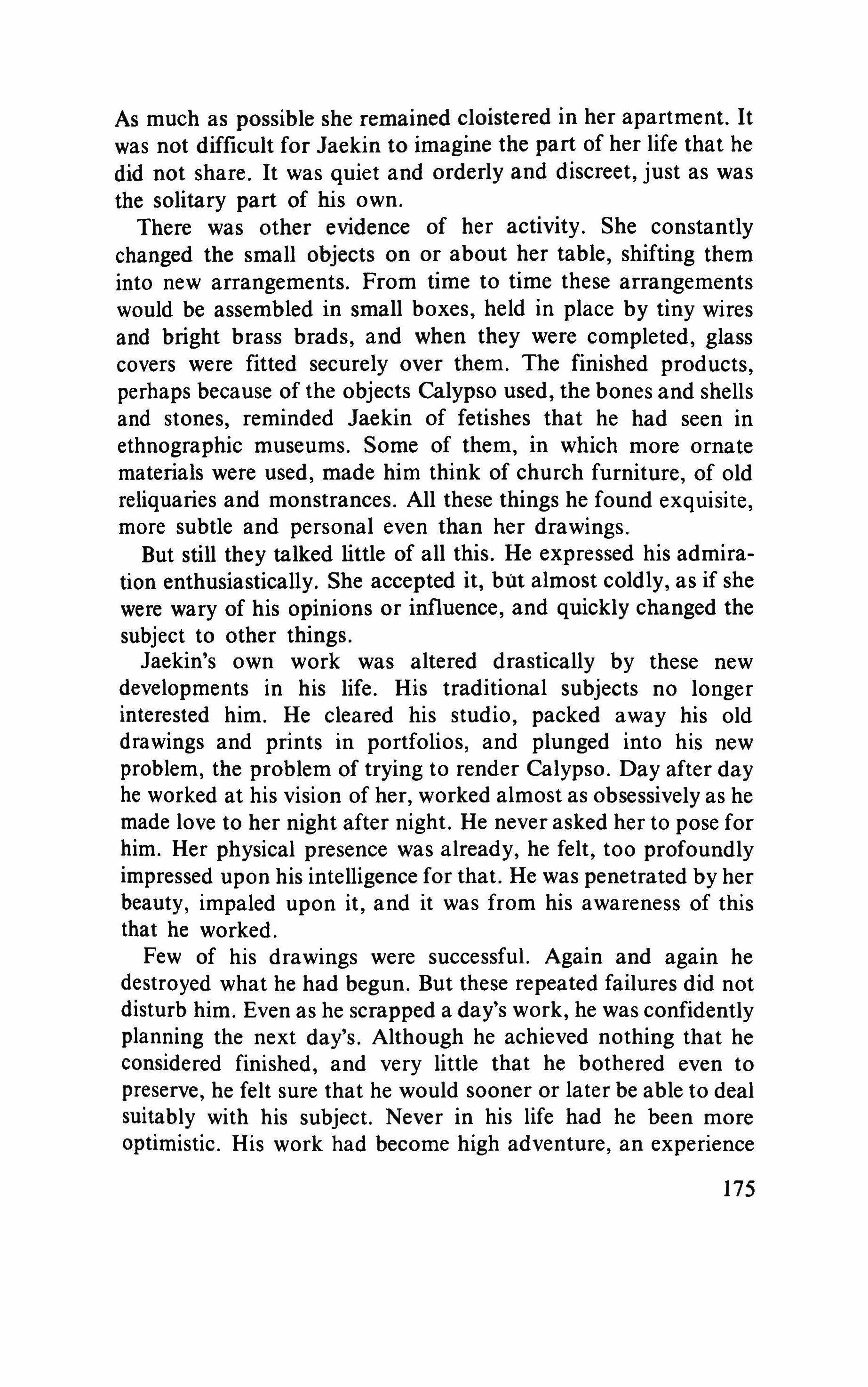
As much as possible she remained cloistered in her apartment. It was not difficult for Jaekin to imagine the part of her life that he did not share. It was quiet and orderly and discreet, just as was the solitary part of his own.
There was other evidence of her activity. She constantly changed the small objects on or about her table, shifting them into new arrangements. From time to time these arrangements would be assembled in small boxes, held in place by tiny wires and bright brass brads, and when they were completed, glass covers were fitted securely over them. The finished products, perhaps because of the objects Calypso used, the bones and shells and stones, reminded Jaekin of fetishes that he had seen in ethnographic museums. Some of them, in which more ornate materials were used, made him think of church furniture, of old reliquaries and monstrances. All these things he found exquisite, more subtle and personal even than her drawings.
But still they talked little of all this. He expressed his admiration enthusiastically. She accepted it, but almost coldly, as if she were wary of his opinions or influence, and quickly changed the subject to other things.
Jaekin's own work was altered drastically by these new developments in his life. His traditional subjects no longer interested him. He cleared his studio, packed away his old drawings and prints in portfolios, and plunged into his new problem, the problem of trying to render Calypso. Day after day he worked at his vision of her, worked almost as obsessively as he made love to her night after night. He never asked her to pose for him. Her physical presence was already, he felt, too profoundly impressed upon his intelligence for that. He was penetrated by her beauty, impaled upon it, and it was from his awareness of this that he worked.
Few of his drawings were successful. Again and again he destroyed what he had begun. But these repeated failures did not disturb him. Even as he scrapped a day's work, he was confidently planning the next day's. Although he achieved nothing that he considered finished, and very little that he bothered even to preserve, he felt sure that he would sooner or later be able to deal suitably with his subject. Never in his life had he been more optimistic. His work had become high adventure, an experience
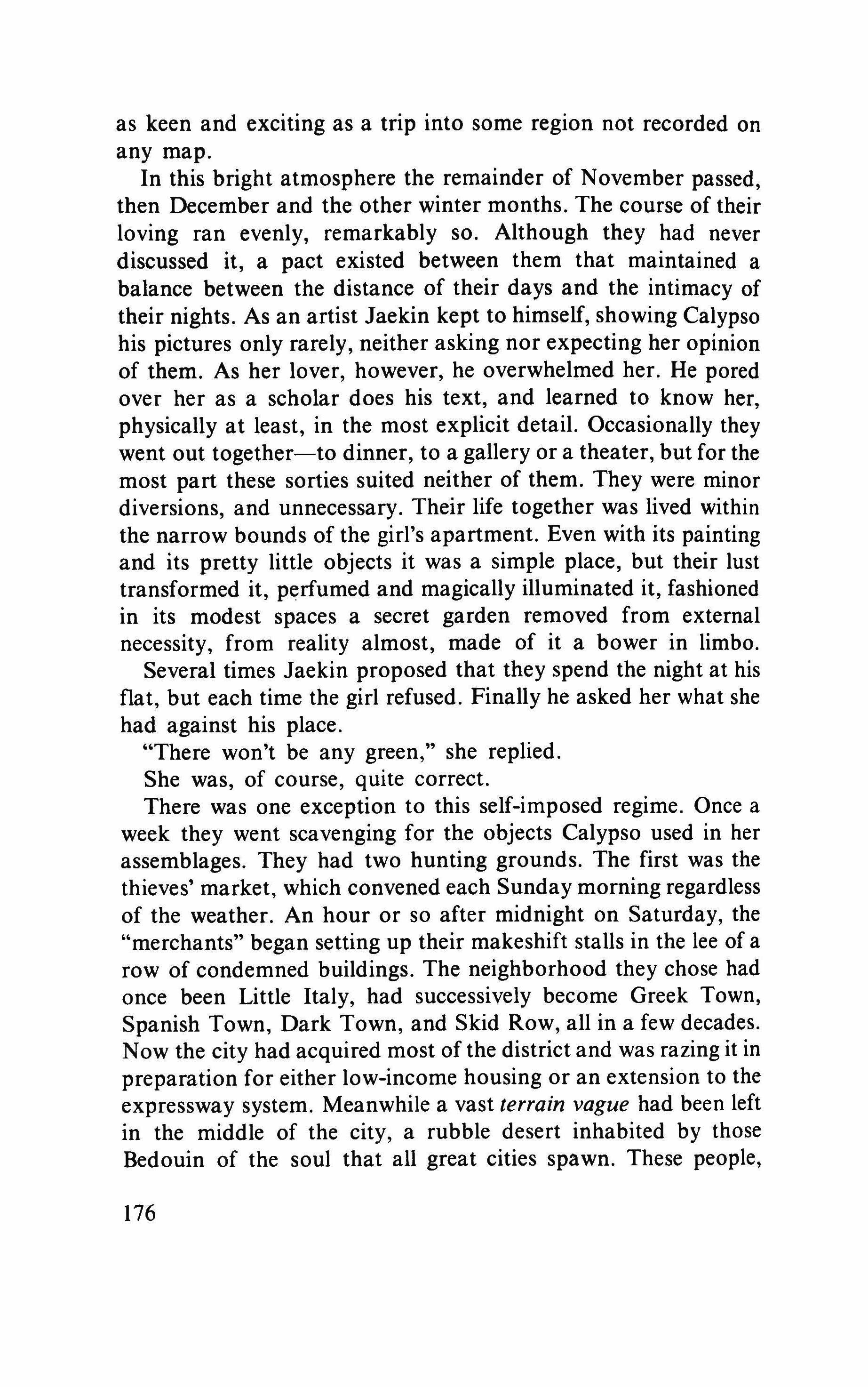
as keen and exciting as a trip into some region not recorded on any map.
In this bright atmosphere the remainder of November passed, then December and the other winter months. The course of their loving ran evenly, remarkably so. Although they had never discussed it, a pact existed between them that maintained a balance between the distance of their days and the intimacy of their nights. As an artist Jaekin kept to himself, showing Calypso his pictures only rarely, neither asking nor expecting her opinion of them. As her lover, however, he overwhelmed her. He pored over her as a scholar does his text, and learned to know her, physically at least, in the most explicit detail. Occasionally they went out together-to dinner, to a gallery or a theater, but for the most part these sorties suited neither of them. They were minor diversions, and unnecessary. Their life together was lived within the narrow bounds of the girl's apartment. Even with its painting and its pretty little objects it was a simple place, but their lust transformed it, perfumed and magically illuminated it, fashioned in its modest spaces a secret garden removed from external necessity, from reality almost, made of it a bower in limbo.
Several times Jaekin proposed that they spend the night at his flat, but each time the girl refused. Finally he asked her what she had against his place.
"There won't be any green," she replied.
She was, of course, quite correct.
There was one exception to this self-imposed regime. Once a week they went scavenging for the objects Calypso used in her assemblages. They had two hunting grounds. The first was the thieves' market, which convened each Sunday morning regardless of the weather. An hour or so after midnight on Saturday, the "merchants" began setting up their makeshift stalls in the lee of a row of condemned buildings. The neighborhood they chose had once been Little Italy, had successively become Greek Town, Spanish Town, Dark Town, and Skid Row, all in a few decades. Now the city had acquired most of the district and was razing it in preparation for either low-income housing or an extension to the expressway system. Meanwhile a vast terrain vague had been left in the middle of the city, a rubble desert inhabited by those Bedouin of the soul that all great cities spawn. These people,
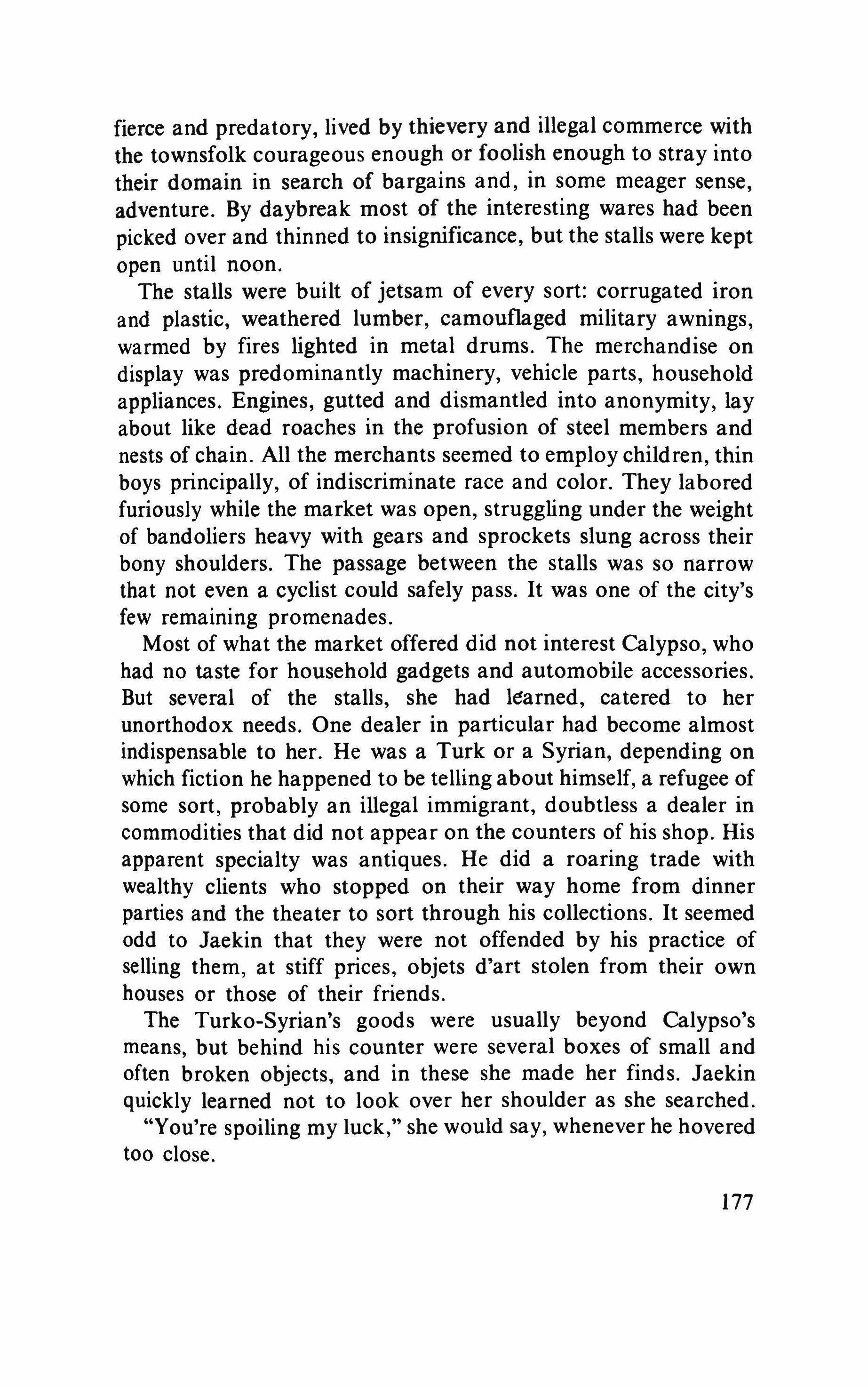
fierce and predatory, lived by thievery and illegal commerce with the townsfolk courageous enough or foolish enough to stray into their domain in search of bargains and, in some meager sense, adventure. By daybreak most of the interesting wares had been picked over and thinned to insignificance, but the stalls were kept open until noon.
The stalls were built of jetsam of every sort: corrugated iron and plastic, weathered lumber, camouflaged military awnings, warmed by fires lighted in metal drums. The merchandise on display was predominantly machinery, vehicle parts, household appliances. Engines, gutted and dismantled into anonymity, lay about like dead roaches in the profusion of steel members and nests of chain. All the merchants seemed to employ children, thin boys principally, of indiscriminate race and color. They labored furiously while the market was open, struggling under the weight of bandoliers heavy with gears and sprockets slung across their bony shoulders. The passage between the stalls was so narrow that not even a cyclist could safely pass. It was one of the city's few remaining promenades.
Most of what the market offered did not interest Calypso, who had no taste for household gadgets and automobile accessories. But several of the stalls, she had learned, catered to her unorthodox needs. One dealer in particular had become almost indispensable to her. He was a Turk or a Syrian, depending on which fiction he happened to be telling about himself, a refugee of some sort, probably an illegal immigrant, doubtless a dealer in commodities that did not appear on the counters of his shop. His apparent specialty was antiques. He did a roaring trade with wealthy clients who stopped on their way home from dinner parties and the theater to sort through his collections. It seemed odd to Jaekin that they were not offended by his practice of selling them, at stiff prices, objets d'art stolen from their own houses or those of their friends.
The Turko-Syrian's goods were usually beyond Calypso's means, but behind his counter were several boxes of small and often broken objects, and in these she made her finds. Jaekin quickly learned not to look over her shoulder as she searched.
"You're spoiling my luck," she would say, whenever he hovered too close.
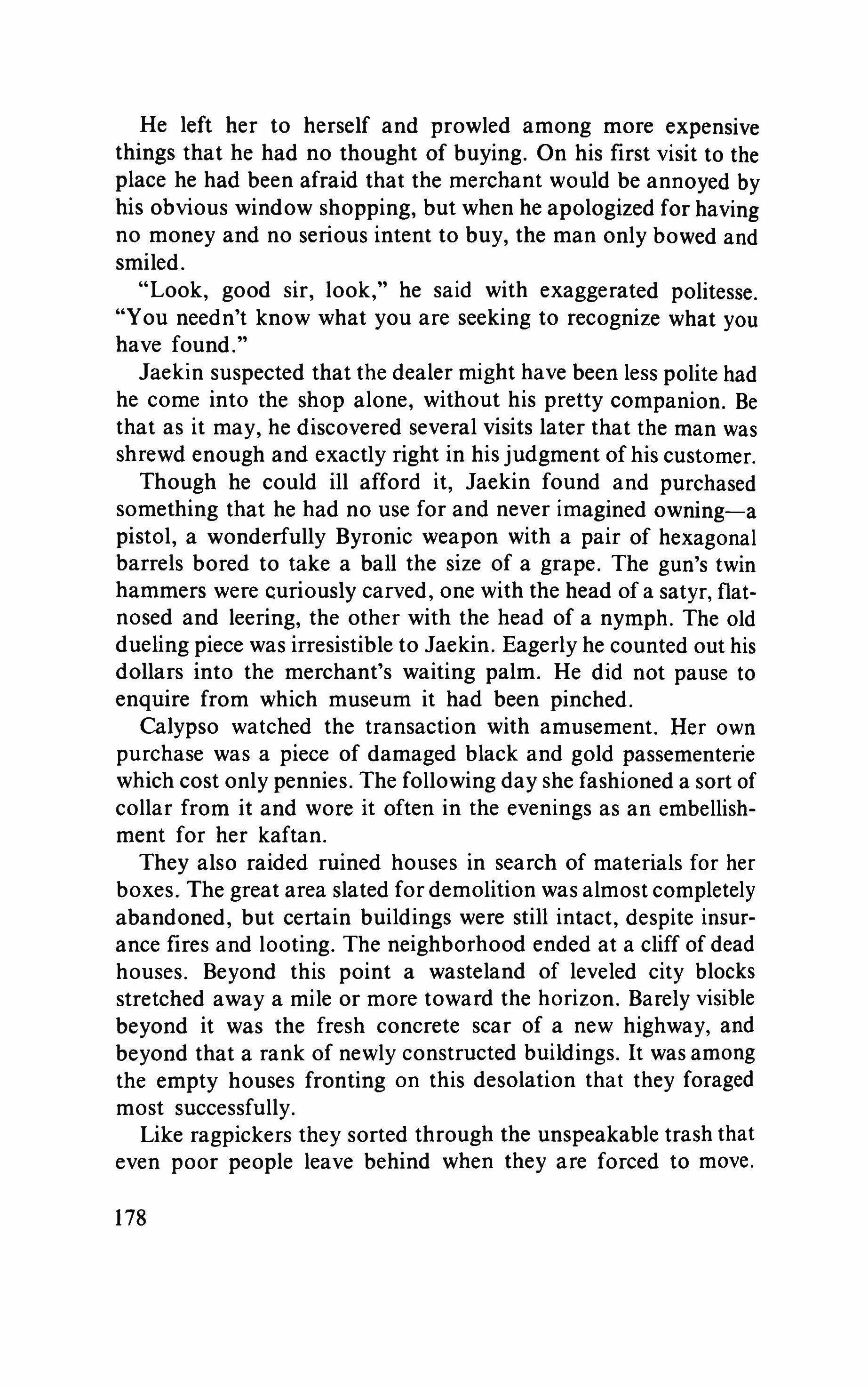
He left her to herself and prowled among more expensive things that he had no thought of buying. On his first visit to the place he had been afraid that the merchant would be annoyed by his obvious window shopping, but when he apologized for having no money and no serious intent to buy, the man only bowed and smiled.
"Look, good sir, look," he said with exaggerated politesse. "You needn't know what you are seeking to recognize what you have found."
Jaekin suspected that the dealer might have been less polite had he come into the shop alone, without his pretty companion. Be that as it may, he discovered several visits later that the man was shrewd enough and exactly right in his judgment of his customer.
Though he could ill afford it, Jaekin found and purchased something that he had no use for and never imagined owning-a pistol, a wonderfully Byronic weapon with a pair of hexagonal barrels bored to take a ball the size of a grape. The gun's twin hammers were curiously carved, one with the head of a satyr, flatnosed and leering, the other with the head of a nymph. The old dueling piece was irresistible to Jaekin. Eagerly he counted out his dollars into the merchant's waiting palm. He did not pause to enquire from which museum it had been pinched.
Calypso watched the transaction with amusement. Her own purchase was a piece of damaged black and gold passementerie which cost only pennies. The following day she fashioned a sort of collar from it and wore it often in the evenings as an embellishment for her kaftan.
They also raided ruined houses in search of materials for her boxes. The great area slated for demolition was almost completely abandoned, but certain buildings were still intact, despite insurance fires and looting. The neighborhood ended at a cliff of dead houses. Beyond this point a wasteland of leveled city blocks stretched away a mile or more toward the horizon. Barely visible beyond it was the fresh concrete scar of a new highway, and beyond that a rank of newly constructed buildings. It was among the empty houses fronting on this desolation that they foraged most successfully.
Like ragpickers they sorted through the unspeakable trash that even poor people leave behind when they are forced to move.
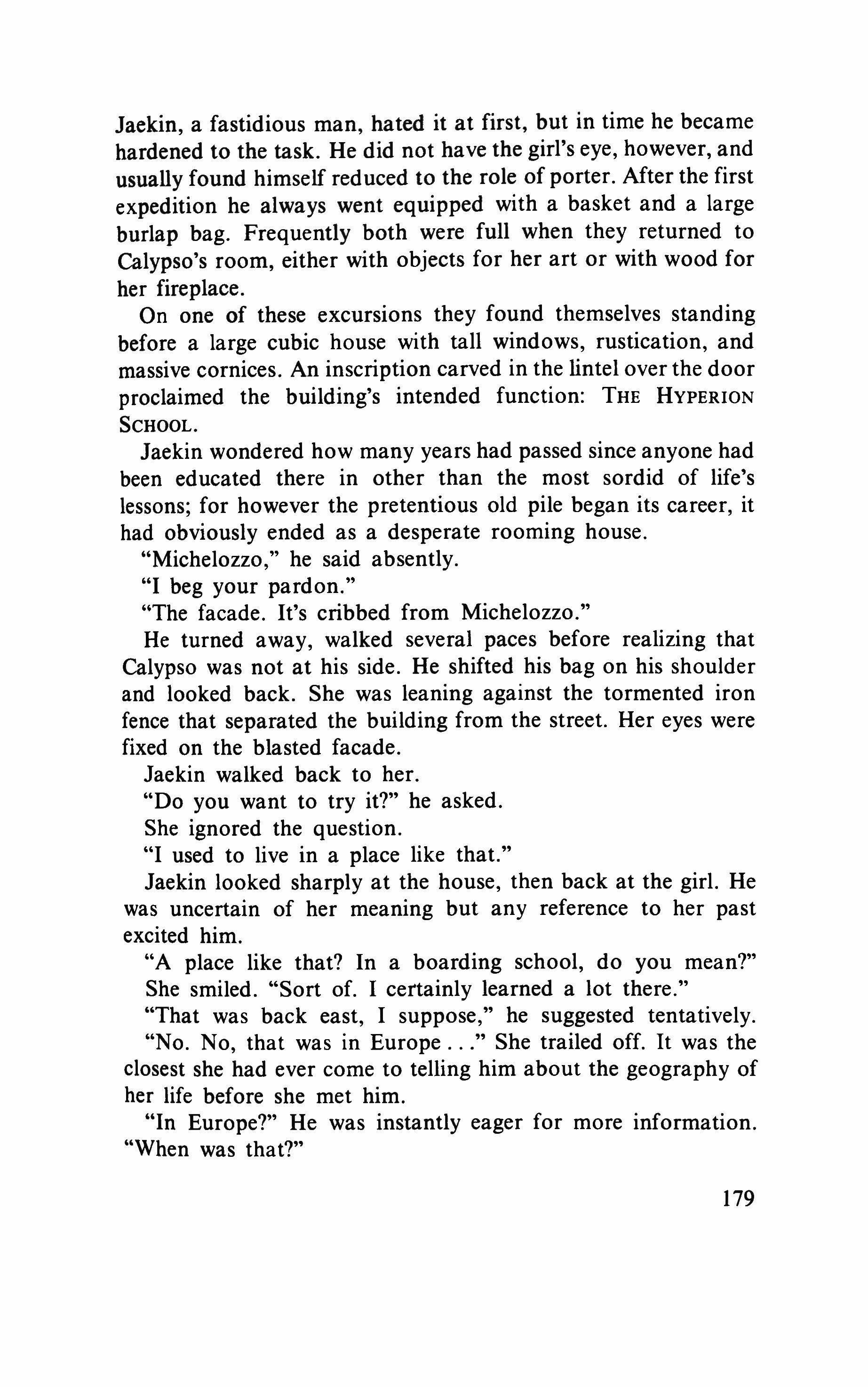
Jaekin, a fastidious man, hated it at first, but in time he became hardened to the task. He did not have the girl's eye, however, and usually found himself reduced to the role of porter. After the first expedition he always went equipped with a basket and a large burlap bag. Frequently both were full when they returned to Calypso's room, either with objects for her art or with wood for her fireplace.
On one of these excursions they found themselves standing before a large cubic house with tall windows, rustication, and massive cornices. An inscription carved in the lintel over the door proclaimed the building's intended function: THE HYPERION SCHOOL.
Jaekin wondered how many years had passed since anyone had been educated there in other than the most sordid of life's lessons; for however the pretentious old pile began its career, it had obviously ended as a desperate rooming house.
"Michelozzo," he said absently.
"I beg your pardon."
"The facade. It's cribbed from Michelozzo."
He turned away, walked several paces before realizing that Calypso was not at his side. He shifted his bag on his shoulder and looked back. She was leaning against the tormented iron fence that separated the building from the street. Her eyes were fixed on the blasted facade.
Jaekin walked back to her.
"Do you want to try it?" he asked.
She ignored the question.
"I used to live in a place like that."
Jaekin looked sharply at the house, then back at the girl. He was uncertain of her meaning but any reference to her past excited him.
"A place like that? In a boarding school, do you mean?"
She smiled. "Sort of. I certainly learned a lot there."
"That was back east, I suppose," he suggested tentatively.
"No. No, that was in Europe She trailed off. It was the closest she had ever come to telling him about the geography of her life before she met him.
"In Europe?" He was instantly eager for more information. "When was that?"
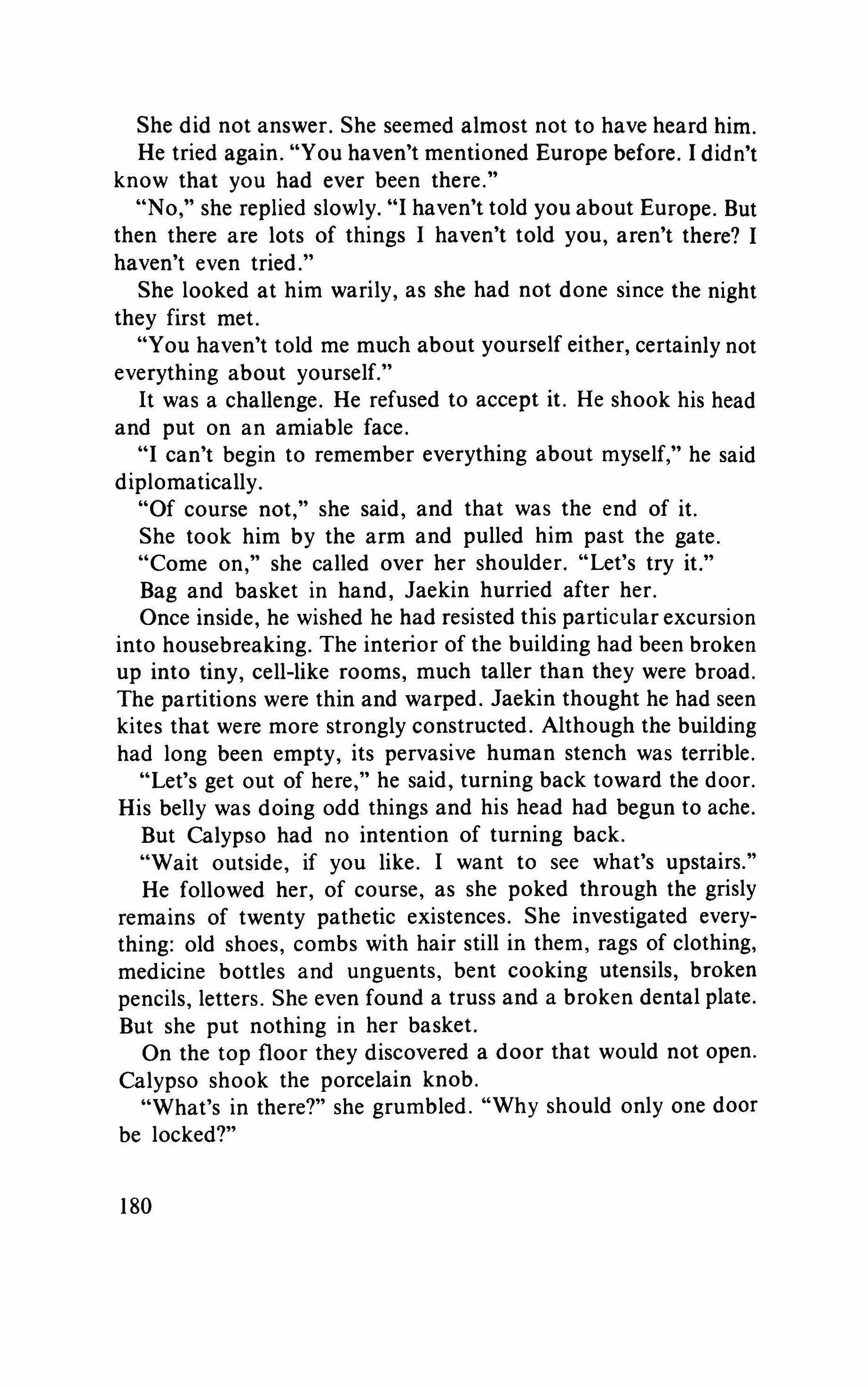
She did not answer. She seemed almost not to have heard him. He tried again. "You haven't mentioned Europe before. 1 didn't know that you had ever been there."
"No," she replied slowly. "I haven't told you about Europe. But then there are lots of things I haven't told you, aren't there? 1 haven't even tried."
She looked at him warily, as she had not done since the night they first met.
"You haven't told me much about yourself either, certainly not everything about yourself."
It was a challenge. He refused to accept it. He shook his head and put on an amiable face.
"I can't begin to remember everything about myself," he said diplomatically.
"Of course not," she said, and that was the end of it.
She took him by the arm and pulled him past the gate.
"Come on," she called over her shoulder. "Let's try it."
Bag and basket in hand, Jaekin hurried after her.
Once inside, he wished he had resisted this particular excursion into housebreaking. The interior of the building had been broken up into tiny, cell-like rooms, much taller than they were broad. The partitions were thin and warped. Jaekin thought he had seen kites that were more strongly constructed. Although the building had long been empty, its pervasive human stench was terrible.
"Let's get out of here," he said, turning back toward the door. His belly was doing odd things and his head had begun to ache.
But Calypso had no intention of turning back.
"Wait outside, if you like. 1 want to see what's upstairs."
He followed her, of course, as she poked through the grisly remains of twenty pathetic existences. She investigated everything: old shoes, combs with hair still in them, rags of clothing, medicine bottles and unguents, bent cooking utensils, broken pencils, letters. She even found a truss and a broken dental plate. But she put nothing in her basket.
On the top floor they discovered a door that would not open. Calypso shook the porcelain knob.
"What's in there?" she grumbled. "Why should only one door be locked?"
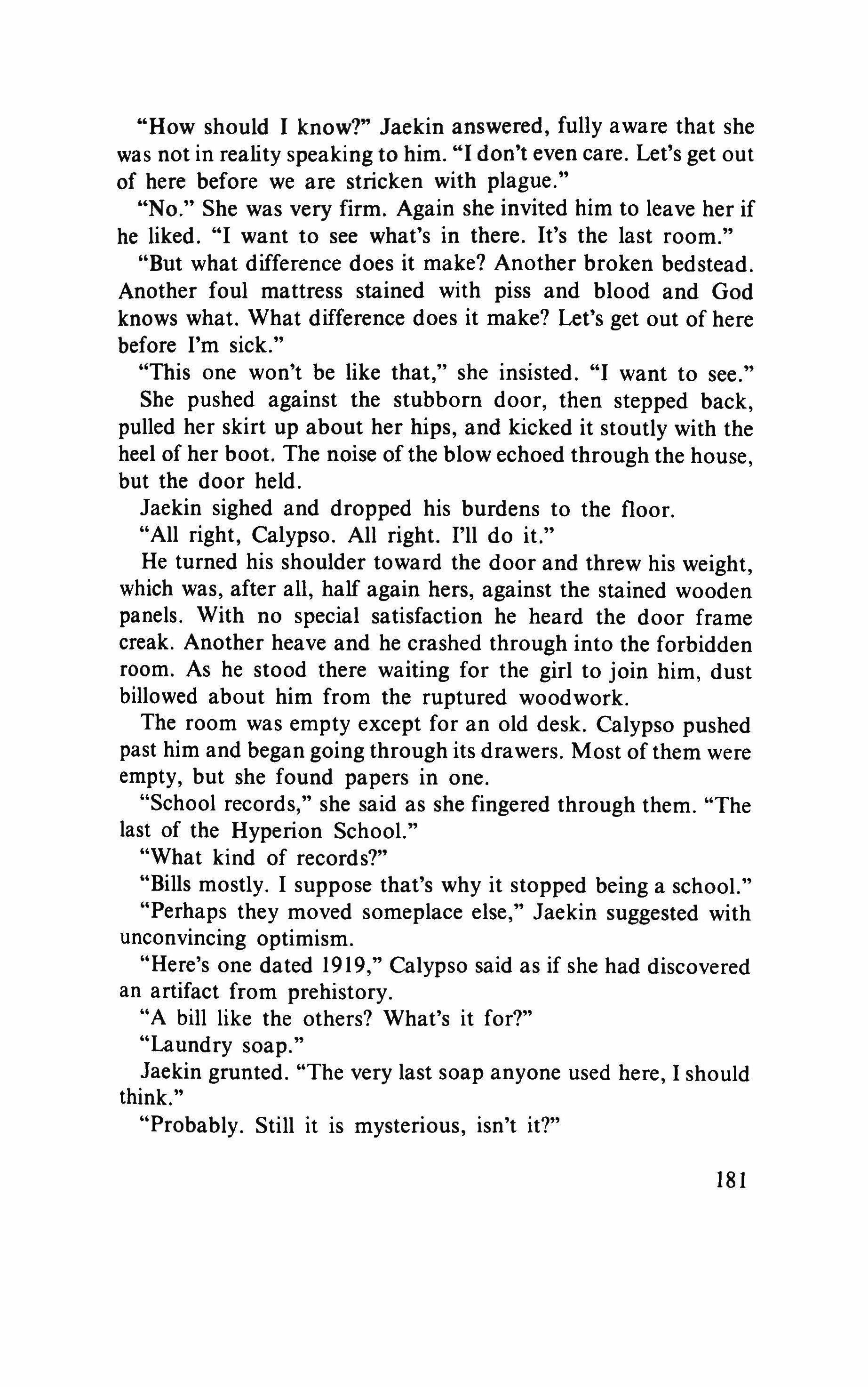
"How should I know?" Jaekin answered, fully aware that she was not in reality speaking to him. "I don't even care. Let's get out of here before we are stricken with plague."
"No." She was very firm. Again she invited him to leave her if he liked. "I want to see what's in there. It's the last room."
"But what difference does it make? Another broken bedstead. Another foul mattress stained with piss and blood and God knows what. What difference does it make? Let's get out of here before I'm sick."
"This one won't be like that," she insisted. "I want to see."
She pushed against the stubborn door, then stepped back, pulled her skirt up about her hips, and kicked it stoutly with the heel of her boot. The noise of the blow echoed through the house, but the door held.
Jaekin sighed and dropped his burdens to the floor.
"All right, Calypso. All right. I'll do it."
He turned his shoulder toward the door and threw his weight, which was, after all, half again hers, against the stained wooden panels. With no special satisfaction he heard the door frame creak. Another heave and he crashed through into the forbidden room. As he stood there waiting for the girl to join him, dust billowed about him from the ruptured woodwork.
The room was empty except for an old desk. Calypso pushed past him and began going through its drawers. Most of them were empty, but she found papers in one.
"School records," she said as she fingered through them. "The last of the Hyperion School."
"What kind of records?"
"Bills mostly. I suppose that's why it stopped being a school."
"Perhaps they moved someplace else," Jaekin suggested with unconvincing optimism.
"Here's one dated 1919," Calypso said as if she had discovered an artifact from prehistory.
"A bill like the others? What's it for?"
"Laundry soap."
Jaekin grunted. "The very last soap anyone used here, I should think."
"Probably. Still it is mysterious, isn't it?"
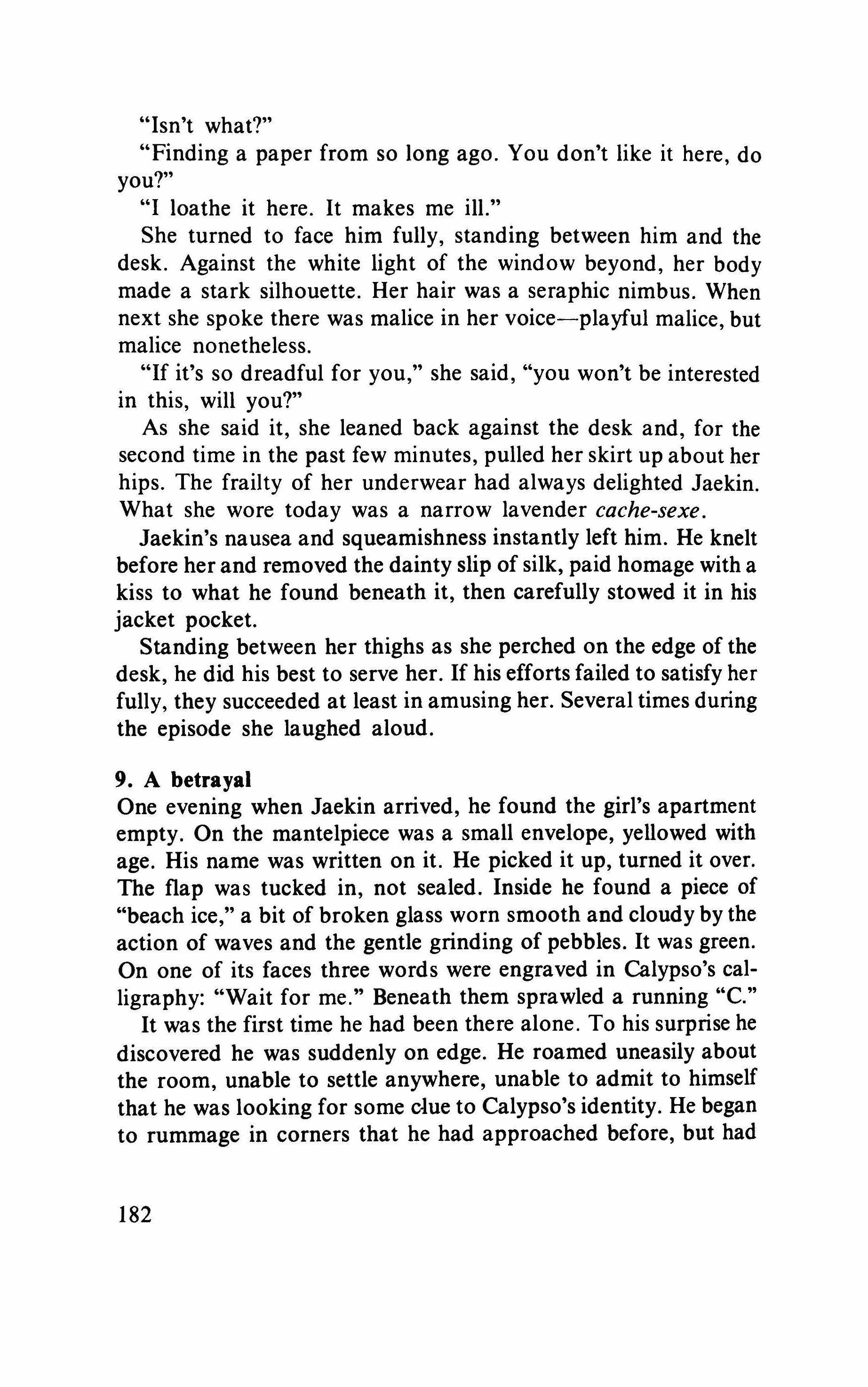
"Isn't what?"
"Finding a paper from so long ago. You don't like it here, do you?"
"I loathe it here. It makes me ill."
She turned to face him fully, standing between him and the desk. Against the white light of the window beyond, her body made a stark silhouette. Her hair was a seraphic nimbus. When next she spoke there was malice in her voice-playful malice, but malice nonetheless.
"If it's so dreadful for you," she said, "you won't be interested in this, will you?"
As she said it, she leaned back against the desk and, for the second time in the past few minutes, pulled her skirt up about her hips. The frailty of her underwear had always delighted Jaekin. What she wore today was a narrow lavender cache-sexe.
Jaekin's nausea and squeamishness instantly left him. He knelt before her and removed the dainty slip of silk, paid homage with a kiss to what he found beneath it, then carefully stowed it in his jacket pocket.
Standing between her thighs as she perched on the edge of the desk, he did his best to serve her. If his efforts failed to satisfy her fully, they succeeded at least in amusing her. Several times during the episode she laughed aloud.
One evening when Jaekin arrived, he found the girl's apartment empty. On the mantelpiece was a small envelope, yellowed with age. His name was written on it. He picked it up, turned it over. The flap was tucked in, not sealed. Inside he found a piece of "beach ice," a bit of broken glass worn smooth and cloudy by the action of waves and the gentle grinding of pebbles. It was green. On one of its faces three words were engraved in Calypso's calligraphy: "Wait for me." Beneath them sprawled a running "c."
It was the first time he had been there alone. To his surprise he discovered he was suddenly on edge. He roamed uneasily about the room, unable to settle anywhere, unable to admit to himself that he was looking for some clue to Calypso's identity. He began to rummage in corners that he had approached before, but had
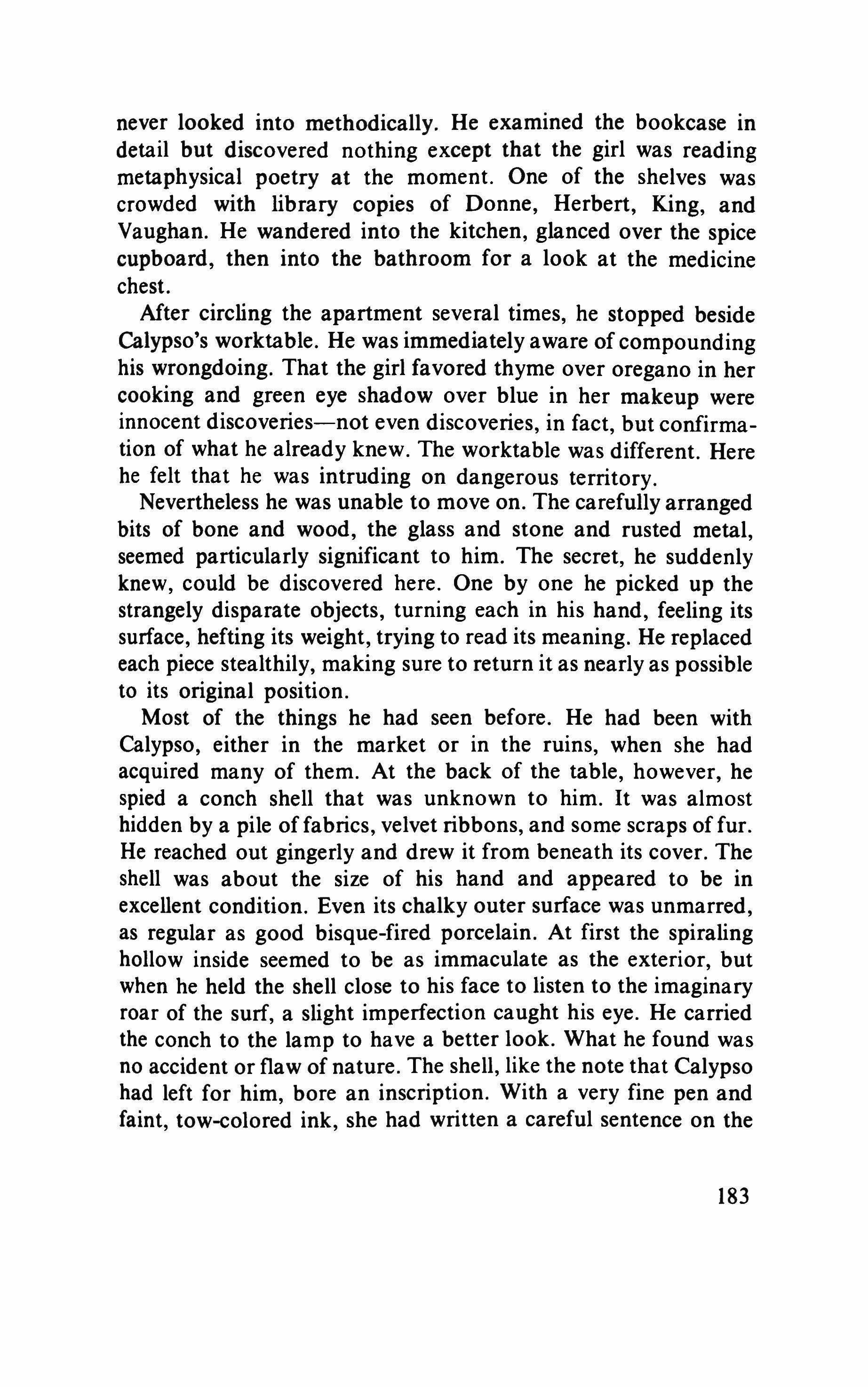
never looked into methodically. He examined the bookcase in detail but discovered nothing except that the girl was reading metaphysical poetry at the moment. One of the shelves was crowded with library copies of Donne, Herbert, King, and Vaughan. He wandered into the kitchen, glanced over the spice cupboard, then into the bathroom for a look at the medicine chest.
After circling the apartment several times, he stopped beside Calypso's worktable. He was immediately aware of compounding his wrongdoing. That the girl favored thyme over oregano in her cooking and green eye shadow over blue in her makeup were innocent discoveries-not even discoveries, in fact, but confirmation of what he already knew. The worktable was different. Here he felt that he was intruding on dangerous territory.
Nevertheless he was unable to move on. The carefully arranged bits of bone and wood, the glass and stone and rusted metal, seemed particularly significant to him. The secret, he suddenly knew, could be discovered here. One by one he picked up the strangely disparate objects, turning each in his hand, feeling its surface, hefting its weight, trying to read its meaning. He replaced each piece stealthily, making sure to return it as nearly as possible to its original position.
Most of the things he had seen before. He had been with Calypso, either in the market or in the ruins, when she had acquired many of them. At the back of the table, however, he spied a conch shell that was unknown to him. It was almost hidden by a pile of fabrics, velvet ribbons, and some scraps of fur. He reached out gingerly and drew it from beneath its cover. The shell was about the size of his hand and appeared to be in excellent condition. Even its chalky outer surface was unmarred, as regular as good bisque-fired porcelain. At first the spiraling hollow inside seemed to be as immaculate as the exterior, but when he held the shell close to his face to listen to the imaginary roar of the surf, a slight imperfection caught his eye. He carried the conch to the lamp to have a better look. What he found was no accident or flaw of nature. The shell, like the note that Calypso had left for him, bore an inscription. With a very fine pen and faint, tow-colored ink, she had written a careful sentence on the
polished nacre: Car if y a tant de choses que je n'ose pas vous dire
The words trailed away into illegibility deep down in the roseate core of the shell. What things, he wondered, did she not dare tell? And to whom? As he repeated the words, they began to seem vaguely familiar to him. The thought came that he was reading a quotation, a line of verse. Perhaps it was not a message at all, but merely a device for making the assemblages even more poetic in their effect than they already were. It was a comforting thought, and it married nicely with the preponderance of verse on the bookshelves.
He was about to return to Calypso's library to search for the line that he had discovered in the shell when he heard someone in the hall outside the door to the apartment. He leaped back to the table and guiltily pushed the shell under its heap of ribbons. By the time the girl had let herself into the room, he was standing again by the lamp.
"I'm sorry," he heard her say behind him. "Have you been waiting long? I decided that we needed some fruit and went to the Greek shop to get some. Were you bored?"
He turned to greet her. She was wearing dark glasses and a hat that cast a shadow across her face. If he had met her in the street, he probably would not have recognized her.
"No, no," he answered quickly. "I've only been here a few minutes myself."
He tried to look calm and evidently succeeded. Calypso went past him to the kitchen, unpacking on the way. He caught a glimpse of figs on a string, Maltese oranges, and a transparent sack of what seemed to be filberts.
But calm was not what he felt. His shameful right hand was trembling so badly that he shoved it deep into his trouser pocket so the girl would not see how nervous he was. It cowered there, the fingers tightly clenched and sweating, crowded together in the darkness.

10. Ikon and epigraph
Jaekin's art, as much as his life, was overwhelmed by the advent of Calypso. Her appearance marked the beginning of a new and 184
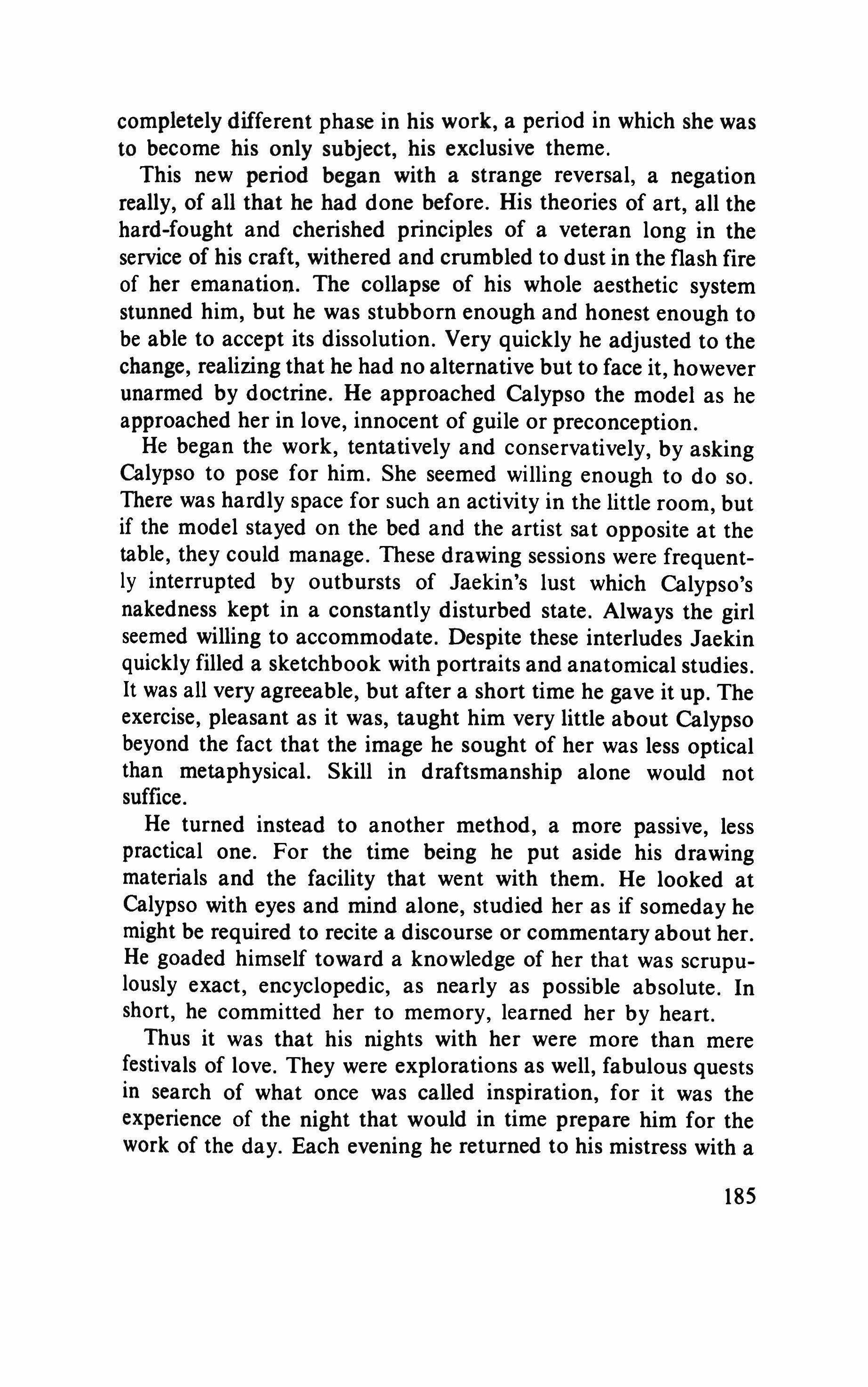
completely different phase in his work, a period in which she was to become his only subject, his exclusive theme.
This new period began with a strange reversal, a negation really, of all that he had done before. His theories of art, all the hard-fought and cherished principles of a veteran long in the service of his craft, withered and crumbled to dust in the flash fire of her emanation. The collapse of his whole aesthetic system stunned him, but he was stubborn enough and honest enough to be able to accept its dissolution. Very quickly he adjusted to the change, realizing that he had no alternative but to face it, however unarmed by doctrine. He approached Calypso the model as he approached her in love, innocent of guile or preconception.
He began the work, tentatively and conservatively, by asking Calypso to pose for him. She seemed willing enough to do so. There was hardly space for such an activity in the little room, but if the model stayed on the bed and the artist sat opposite at the table, they could manage. These drawing sessions were frequently interrupted by outbursts of Jaekin's lust which Calypso's nakedness kept in a constantly disturbed state. Always the girl seemed willing to accommodate. Despite these interludes Jaekin quickly filled a sketchbook with portraits and anatomical studies. It was all very agreeable, but after a short time he gave it up. The exercise, pleasant as it was, taught him very little about Calypso beyond the fact that the image he sought of her was less optical than metaphysical. Skill in draftsmanship alone would not suffice.
He turned instead to another method, a more passive, less practical one. For the time being he put aside his drawing materials and the facility that went with them. He looked at Calypso with eyes and mind alone, studied her as if someday he might be required to recite a discourse or commentary about her. He goaded himself toward a knowledge of her that was scrupulously exact, encyclopedic, as nearly as possible absolute. In short, he committed her to memory, learned her by heart.
Thus it was that his nights with her were more than mere festivals of love. They were explorations as well, fabulous quests in search of what once was called inspiration, for it was the experience of the night that would in time prepare him for the work of the day. Each evening he returned to his mistress with a

lover's hot eagerness, but also with the rarefied passion that an archaeologist takes with him when he approaches his particular site, his buried temple or sunken city. Somewhere in the back of his mind, Jaekin built a storeroom for the fragments of Calypso that he culled from their intimacy. As these shards accumulated, they began to suggest patterns to him, to imply richer and more complete forms than anyone of them alone described. As the year turned, Jaekin's familiarity with these disparate bits increased, until the time came when he could summon up, in imagination at least, large and potent passages of what seemed to him a singular vision of Calypso. Finally he felt that his ideas were sufficiently coherent, and his notes sufficiently abundant, to make possible a serious attempt to reconstruct his lady on a sheet of fine laid paper.
This reconstruction found its first expression in a mythological drawing. Jaekin drew the girl as Daphne bursting into leaf. He used silverpoint on a pale green paper that he tinted himself with thin washes of gesso, a technique that allowed him to work slowly, meditatively, and without much risk of irreparable error. Almost necessarily the silverpoint made the drawing seem archaic, gave it a flavor of the fifteenth century. This fact did not trouble him. He was not drawing with time in mind-not for his century, nor for its critics or dealers, nor even for his fellow artists. He was drawing for his model and no one else.
The Daphne became a series and was followed by other antique ladies: Ariadne with twine in her hand, Penthesilea mounted bareback, Psyche airborne, Euridice lost in the Underworld. Jaekin considered a Calypso, but decided against it. Somehow it seemed bad magic.
For weeks these narratives occupied Jaekin's mornings; then slowly he began to lose faith in them. The first burst of work energy passed and he began to look at what he was doing with an external and critical eye. It seemed to him now that Calypso was neither so delicate nor so sentimental as she appeared in the silverpoint drawings. He was missing, or perhaps failing to admit, her sharpness, her edge of melodrama, her touch of cruelty. His dissatisfaction grew each day until finally the process slowed and stopped. On the day that it did, after he had made his pot of tea (mate, as it happened), he laid all his winter's drawings out on his 186
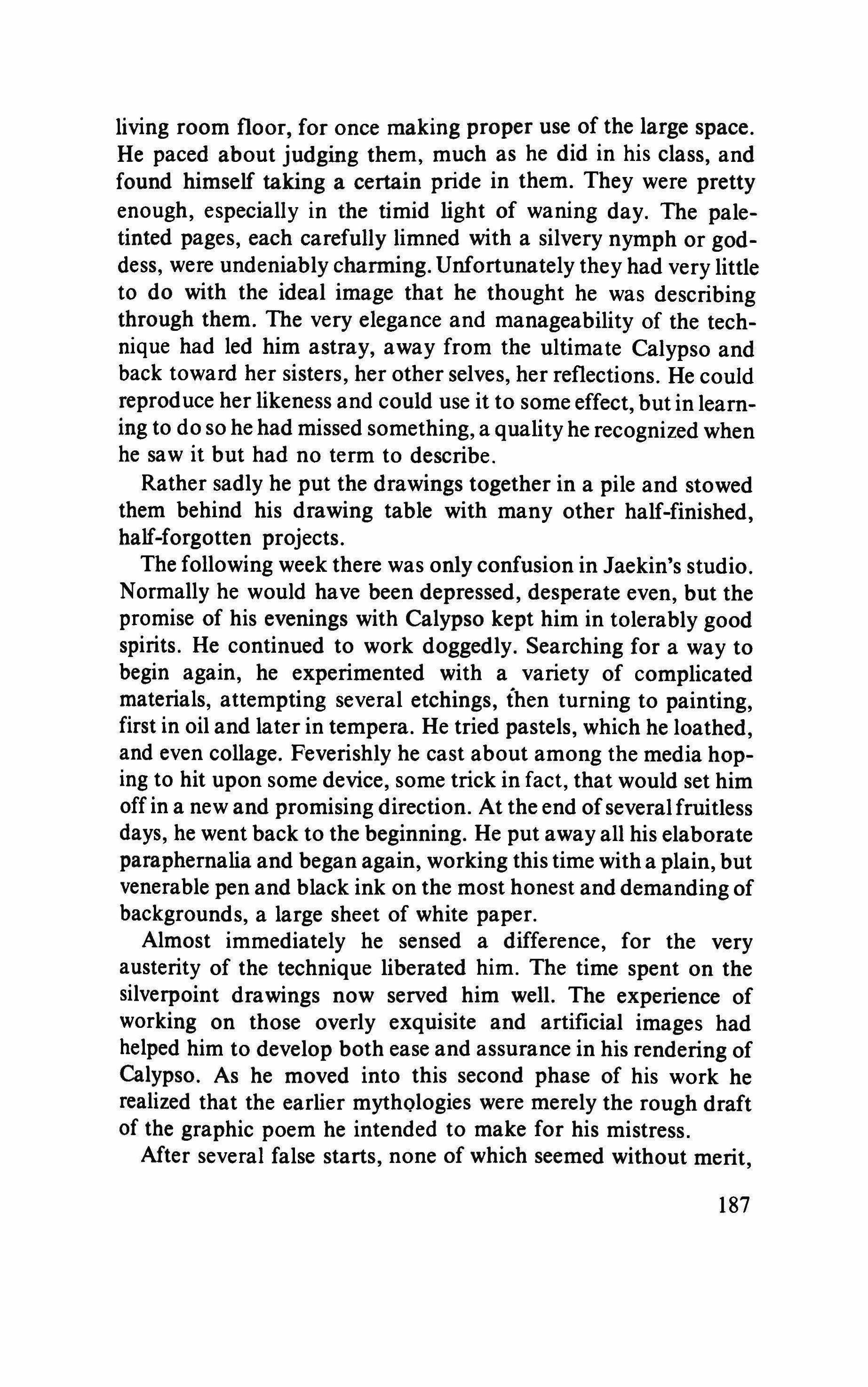
living room floor, for once making proper use of the large space. He paced about judging them, much as he did in his class, and found himself taking a certain pride in them. They were pretty enough, especially in the timid light of waning day. The paletinted pages, each carefully limned with a silvery nymph or goddess, were undeniably charming. Unfortunately they had very little to do with the ideal image that he thought he was describing through them. The very elegance and manageability of the technique had led him astray, away from the ultimate Calypso and back toward her sisters, her other selves, her reflections. He could reprod uce her likeness and could use it to some effect, but in learning to do so he had missed something, a quality he recognized when he saw it but had no term to describe.
Rather sadly he put the drawings together in a pile and stowed them behind his drawing table with many other half-finished, half-forgotten projects.
The following week there was only confusion in Jaekin's studio. Normally he would have been depressed, desperate even, but the promise of his evenings with Calypso kept him in tolerably good spirits. He continued to work doggedly. Searching for a way to begin again, he experimented with a variety of complicated materials, attempting several etchings, then turning to painting, first in oil and later in tempera. He tried pastels, which he loathed, and even collage. Feverishly he cast about among the media hoping to hit upon some device, some trick in fact, that would set him off in a new and promising direction. At the end ofseveral fruitless days, he went back to the beginning. He put away all his elaborate paraphernalia and began again, working this time with a plain, but venerable pen and black ink on the most honest and demanding of backgrounds, a large sheet of white paper.
Almost immediately he sensed a difference, for the very austerity of the technique liberated him. The time spent on the silverpoint drawings now served him well. The experience of working on those overly exquisite and artificial images had helped him to develop both ease and assurance in his rendering of Calypso. As he moved into this second phase of his work he realized that the earlier mythologies were merely the rough draft of the graphic poem he intended to make for his mistress.
After several false starts, none of which seemed without merit, 187
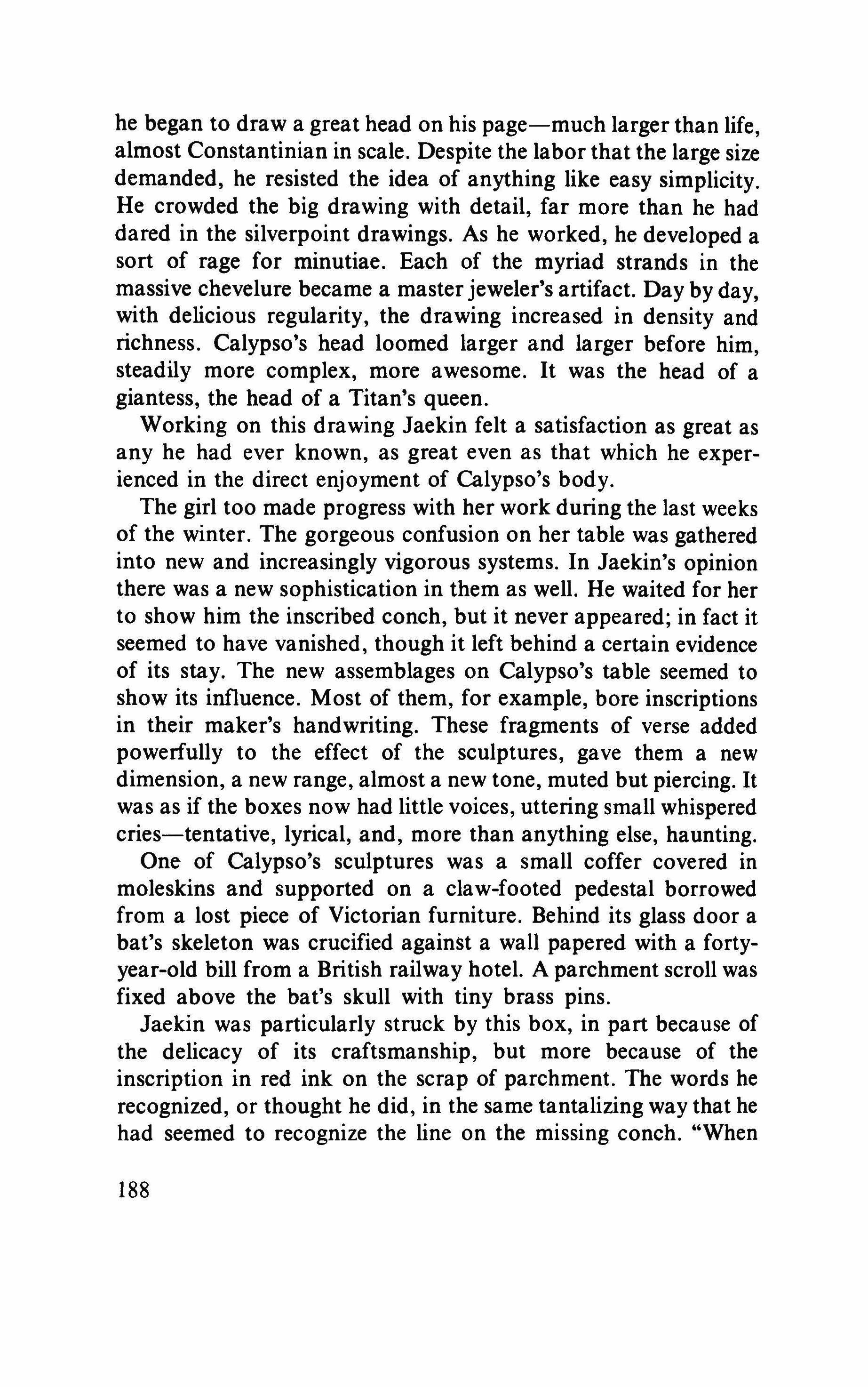
he began to draw a great head on his page-much larger than life, almost Constantinian in scale. Despite the labor that the large size demanded, he resisted the idea of anything like easy simplicity. He crowded the big drawing with detail, far more than he had dared in the silverpoint drawings. As he worked, he developed a sort of rage for minutiae. Each of the myriad strands in the massive chevelure became a master jeweler's artifact. Day by day, with delicious regularity, the drawing increased in density and richness. Calypso's head loomed larger and larger before him, steadily more complex, more awesome. It was the head of a giantess, the head of a Titan's queen.
Working on this drawing Jaekin felt a satisfaction as great as any he had ever known, as great even as that which he experienced in the direct enjoyment of Calypso's body.
The girl too made progress with her work during the last weeks of the winter. The gorgeous confusion on her table was gathered into new and increasingly vigorous systems. In Jaekin's opinion there was a new sophistication in them as well. He waited for her to show him the inscribed conch, but it never appeared; in fact it seemed to have vanished, though it left behind a certain evidence of its stay. The new assemblages on Calypso's table seemed to show its influence. Most of them, for example, bore inscriptions in their maker's handwriting. These fragments of verse added powerfully to the effect of the sculptures, gave them a new dimension, a new range, almost a new tone, muted but piercing. It was as if the boxes now had little voices, uttering small whispered cries-tentative, lyrical, and, more than anything else, haunting.
One of Calypso's sculptures was a small coffer covered in moleskins and supported on a claw-footed pedestal borrowed from a lost piece of Victorian furniture. Behind its glass door a bat's skeleton was crucified against a wall papered with a fortyyear-old bill from a British railway hotel. A parchment scroll was fixed above the bat's skull with tiny brass pins.
Jaekin was particularly struck by this box, in part because of the delicacy of its craftsmanship, but more because of the inscription in red ink on the scrap of parchment. The words he recognized, or thought he did, in the same tantalizing way that he had seemed to recognize the line on the missing conch. "When
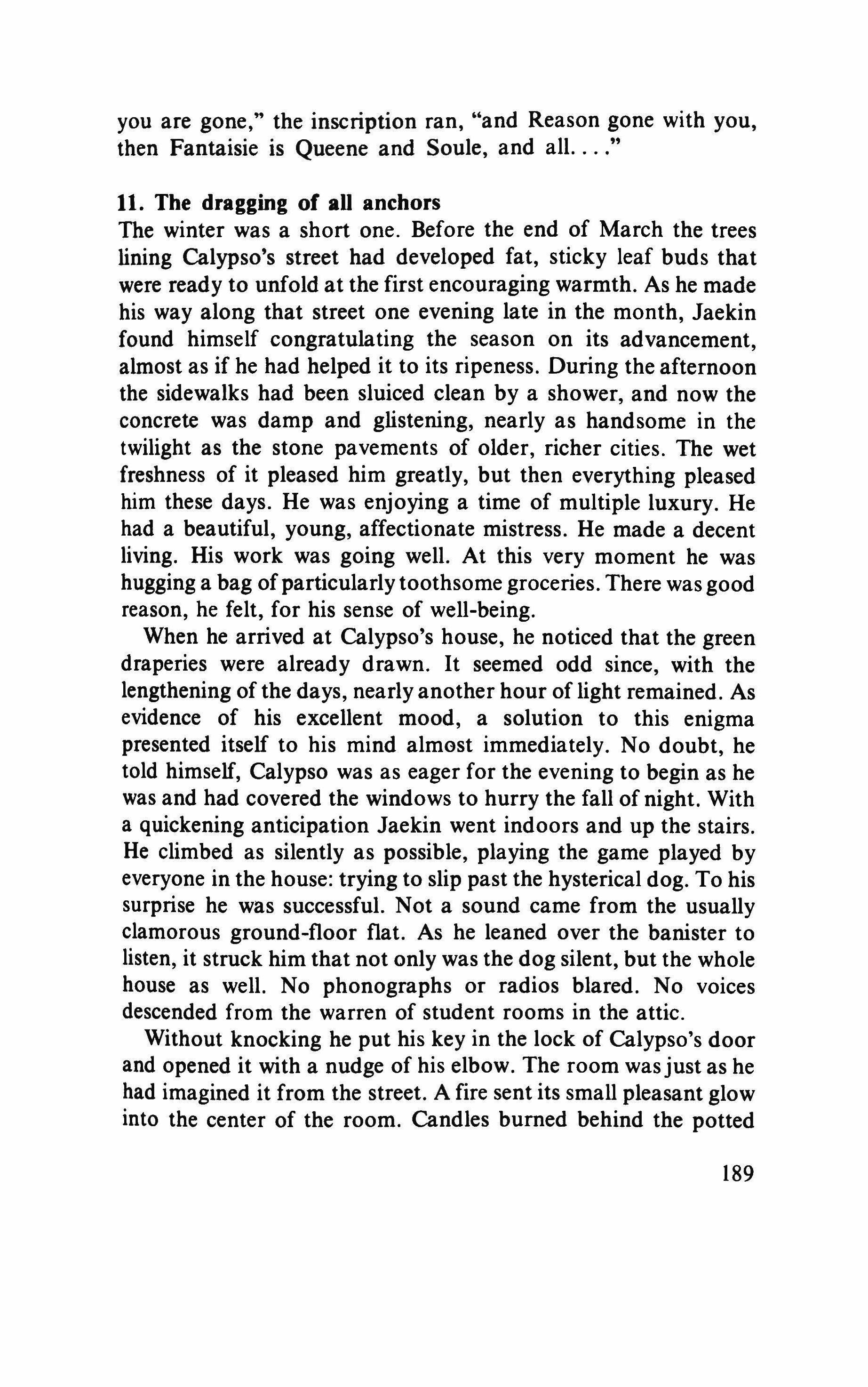
you are gone," the inscription ran, "and Reason gone with you, then Fantaisie is Queene and Soule, and all
The winter was a short one. Before the end of March the trees lining Calypso's street had developed fat, sticky leaf buds that were ready to unfold at the first encouraging warmth. As he made his way along that street one evening late in the month, Jaekin found himself congratulating the season on its advancement, almost as if he had helped it to its ripeness. During the afternoon the sidewalks had been sluiced clean by a shower, and now the concrete was damp and glistening, nearly as handsome in the twilight as the stone pavements of older, richer cities. The wet freshness of it pleased him greatly, but then everything pleased him these days. He was enjoying a time of multiple luxury. He had a beautiful, young, affectionate mistress. He made a decent living. His work was going well. At this very moment he was hugging a bag ofparticularly toothsome groceries. There was good reason, he felt, for his sense of well-being. When he arrived at Calypso's house, he noticed that the green draperies were already drawn. It seemed odd since, with the lengthening of the days, nearly another hour of light remained. As evidence of his excellent mood, a solution to this enigma presented itself to his mind almost immediately. No doubt, he told himself, Calypso was as eager for the evening to begin as he was and had covered the windows to hurry the fall of night. With a quickening anticipation Jaekin went indoors and up the stairs. He climbed as silently as possible, playing the game played by everyone in the house: trying to slip past the hysterical dog. To his surprise he was successful. Not a sound came from the usually clamorous ground-floor flat. As he leaned over the banister to listen, it struck him that not only was the dog silent, but the whole house as well. No phonographs or radios blared. No voices descended from the warren of student rooms in the attic. Without knocking he put his key in the lock of Calypso's door and opened it with a nudge of his elbow. The room was just as he had imagined it from the street. A fire sent its small pleasant glow into the center of the room. Candles burned behind the potted
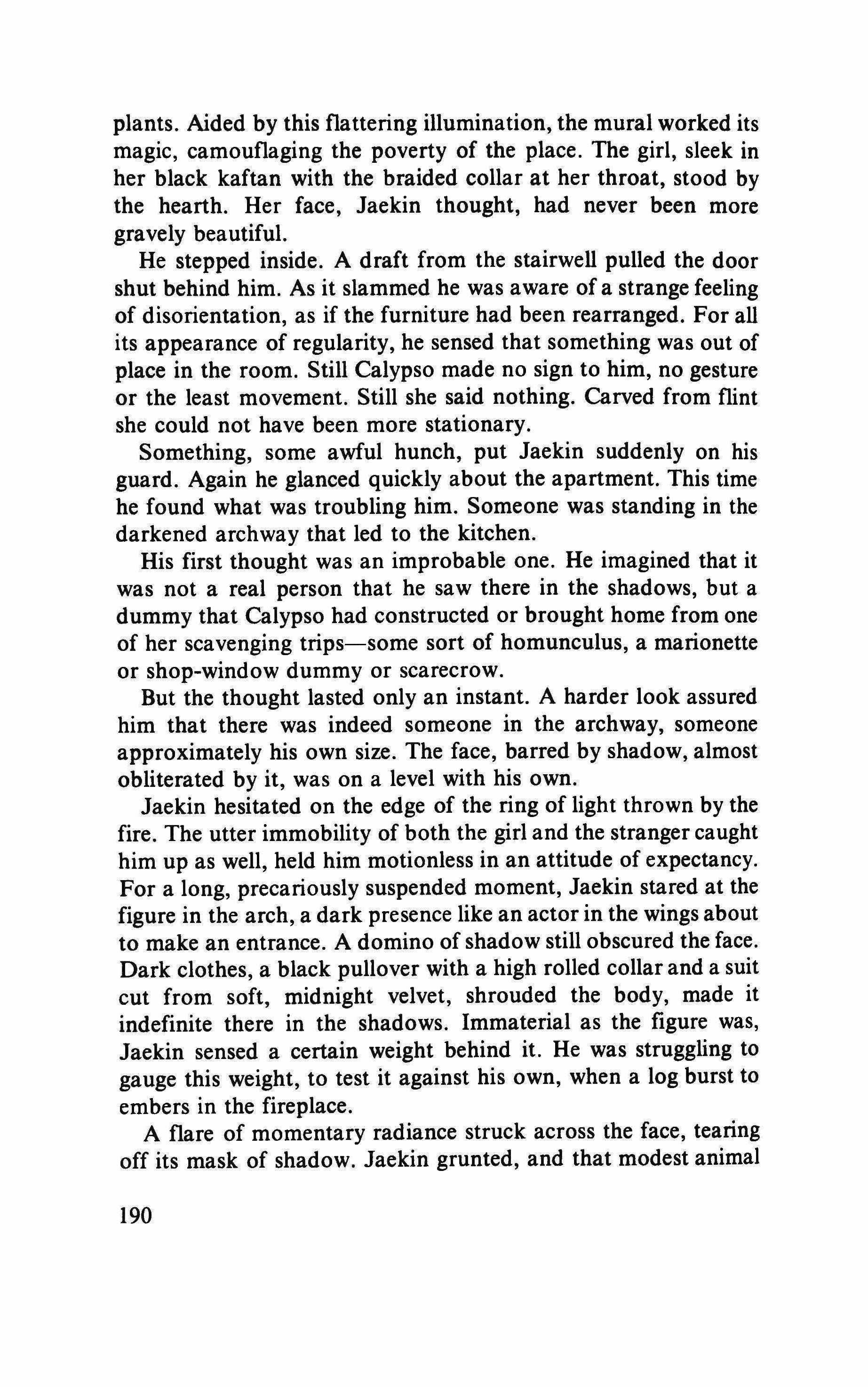
plants. Aided by this flattering illumination, the mural worked its magic, camouflaging the poverty of the place. The girl, sleek in her black kaftan with the braided collar at her throat, stood by the hearth. Her face, Jaekin thought, had never been more gravely beautiful.
He stepped inside. A draft from the stairwell pulled the door shut behind him. As it slammed he was aware of a strange feeling of disorientation, as if the furniture had been rearranged. For all its appearance of regularity, he sensed that something was out of place in the room. Still Calypso made no sign to him, no gesture or the least movement. Still she said nothing. Carved from flint she could not have been more stationary.
Something, some awful hunch, put Jaekin suddenly on his guard. Again he glanced quickly about the apartment. This time he found what was troubling him. Someone was standing in the darkened archway that led to the kitchen.
His first thought was an improbable one. He imagined that it was not a real person that he saw there in the shadows, but a dummy that Calypso had constructed or brought home from one of her scavenging trips-some sort of homunculus, a marionette or shop-window dummy or scarecrow.
But the thought lasted only an instant. A harder look assured him that there was indeed someone in the archway, someone approximately his own size. The face, barred by shadow, almost obliterated by it, was on a level with his own.
Jaekin hesitated on the edge of the ring of light thrown by the fire. The utter immobility of both the girl and the stranger caught him up as well, held him motionless in an attitude of expectancy. For a long, precariously suspended moment, Jaekin stared at the figure in the arch, a dark presence like an actor in the wings about to make an entrance. A domino of shadow still obscured the face. Dark clothes, a black pullover with a high rolled collar and a suit cut from soft, midnight velvet, shrouded the body, made it indefinite there in the shadows. Immaterial as the figure was, Jaekin sensed a certain weight behind it. He was struggling to gauge this weight, to test it against his own, when a log burst to embers in the fireplace.
A flare of momentary radiance struck across the face, tearing off its mask of shadow. Jaekin grunted, and that modest animal
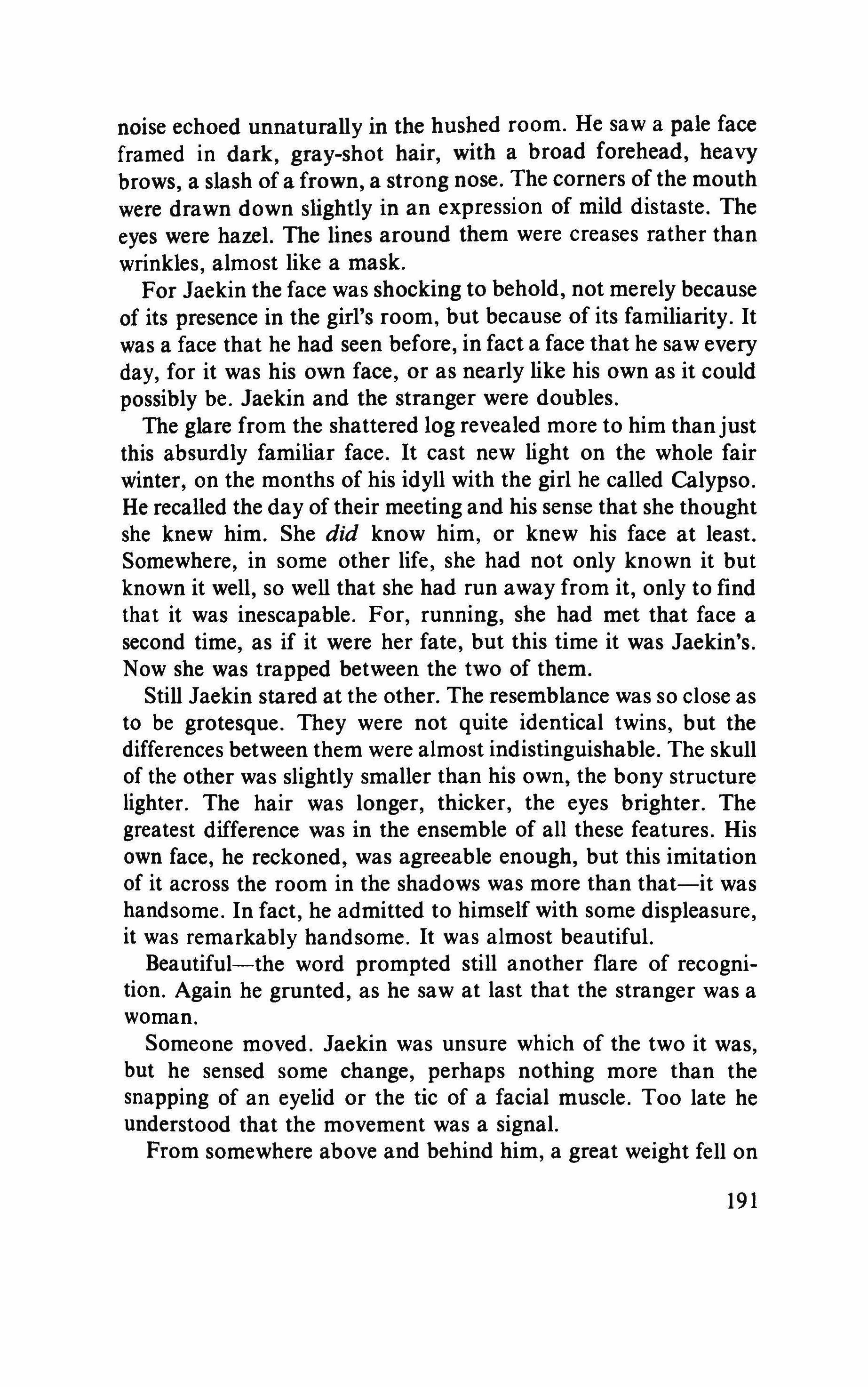
noise echoed unnaturally in the hushed room. He saw a pale face framed in dark, gray-shot hair, with a broad forehead, heavy brows, a slash of a frown, a strong nose. The corners of the mouth were drawn down slightly in an expression of mild distaste. The eyes were hazel. The lines around them were creases rather than wrinkles, almost like a mask.
For Jaekin the face was shocking to behold, not merely because of its presence in the girl's room, but because of its familiarity. It was a face that he had seen before, in fact a face that he saw every day, for it was his own face, or as nearly like his own as it could possibly be. Jaekin and the stranger were doubles.
The glare from the shattered log revealed more to him thanjust this absurdly familiar face. It cast new light on the whole fair winter, on the months of his idyll with the girl he called Calypso. He recalled the day of their meeting and his sense that she thought she knew him. She did know him, or knew his face at least. Somewhere, in some other life, she had not only known it but known it well, so well that she had run away from it, only to find that it was inescapable. For, running, she had met that face a second time, as if it were her fate, but this time it was Jaekin's. Now she was trapped between the two of them.
Still Jaekin stared at the other. The resemblance was so close as to be grotesque. They were not quite identical twins, but the differences between them were almost indistinguishable. The skull of the other was slightly smaller than his own, the bony structure lighter. The hair was longer, thicker, the eyes brighter. The greatest difference was in the ensemble of all these features. His own face, he reckoned, was agreeable enough, but this imitation of it across the room in the shadows was more than that-it was handsome. In fact, he admitted to himself with some displeasure, it was remarkably handsome. It was almost beautiful.
Beautiful-the word prompted still another flare of recognition. Again he grunted, as he saw at last that the stranger was a woman.
Someone moved. Jaekin was unsure which of the two it was, but he sensed some change, perhaps nothing more than the snapping of an eyelid or the tic of a facial muscle. Too late he understood that the movement was a signal.
From somewhere above and behind him, a great weight fell on
the back of Jaekin's neck. Still clutching the bag of groceries, he dropped to his knees on the carpeted floor.Kneeling there in the firelight, stunned and helpless as a ram in a slaughterhouse, he fixed his eyes on the intruder's fine face, which was suddenly hideous for all its beauty, all its familiarity. He waited for the second blow. It came, heavier than the first. A monstrous pain shot through the left side of his body from ear to heel. He swayed wildly, but still did not fall. The third stroke, the coup de grace, was longer in coming, but when it did come it was a mere bee sting in his shoulder. As he plunged forward into the darkness, he heard Calypso's voice. At the time he fancied that he knew what she was saying, but afterward he was never able to recover her words.
II
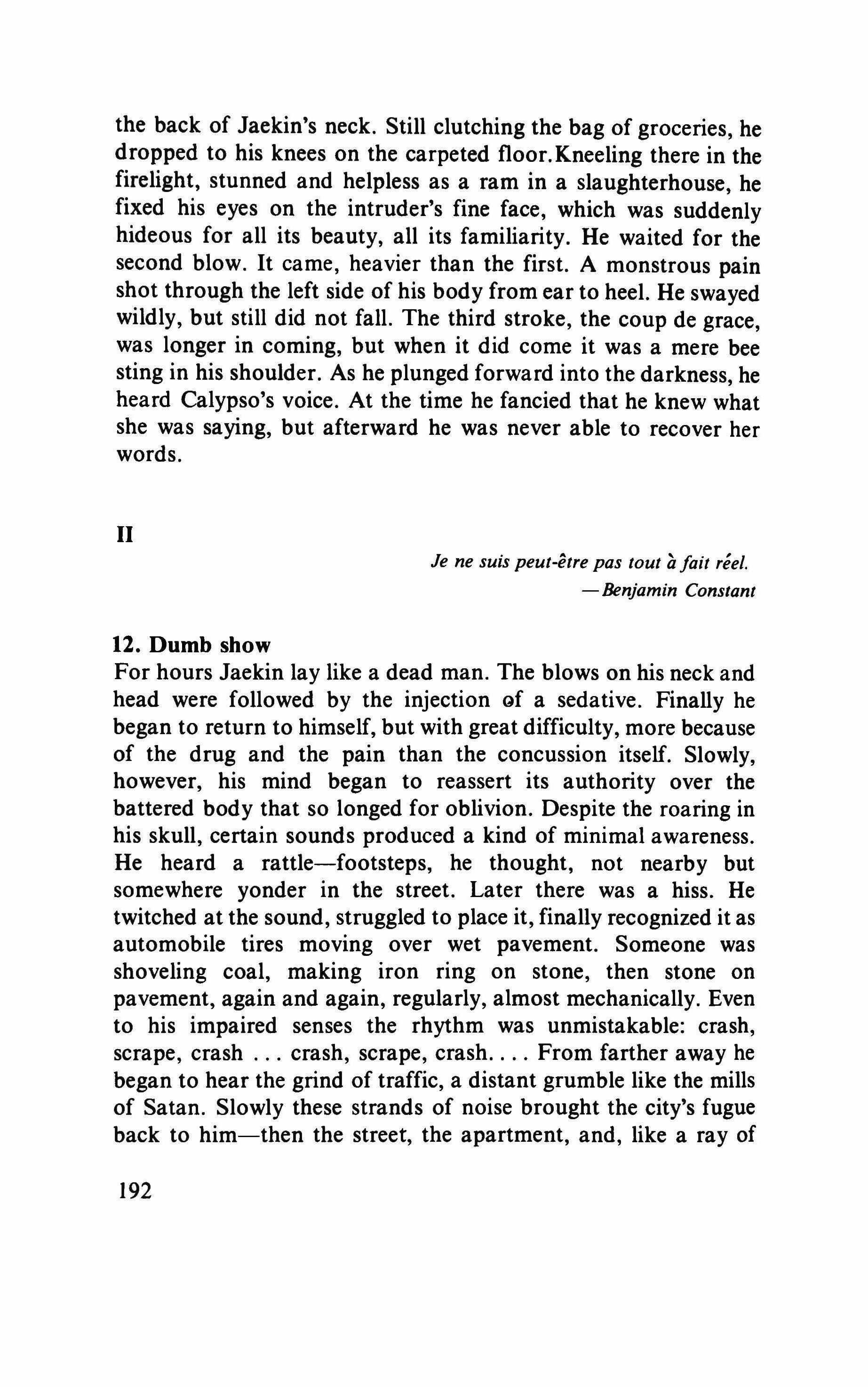
Je ne suis peut-etre pas tout a fait reel. - Benjamin Constant
12. Dumb show
For hours Jaekin lay like a dead man. The blows on his neck and head were followed by the injection of a sedative. Finally he began to return to himself, but with great difficulty, more because of the drug and the pain than the concussion itself. Slowly, however, his mind began to reassert its authority over the battered body that so longed for oblivion. Despite the roaring in his skull, certain sounds produced a kind of minimal awareness. He heard a rattle-footsteps, he thought, not nearby but somewhere yonder in the street. Later there was a hiss. He twitched at the sound, struggled to place it, finally recognized it as automobile tires moving over wet pavement. Someone was shoveling coal, making iron ring on stone, then stone on pavement, again and again, regularly, almost mechanically. Even to his impaired senses the rhythm was unmistakable: crash, scrape, crash crash, scrape, crash From farther away he began to hear the grind of traffic, a distant grumble like the mills of Satan. Slowly these strands of noise brought the city's fugue back to him-then the street, the apartment, and, like a ray of
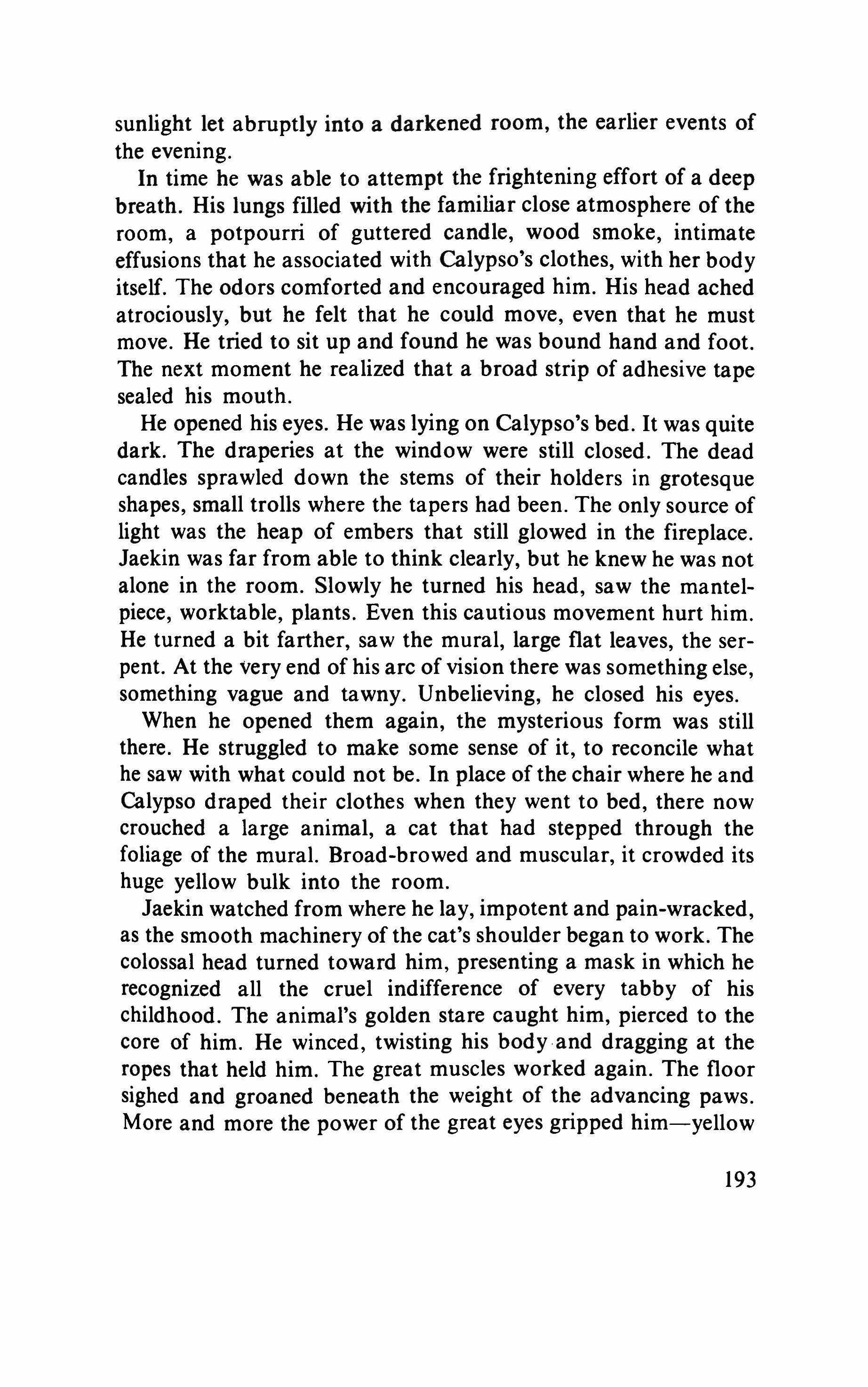
sunlight let abruptly into a darkened room, the earlier events of the evening.
In time he was able to attempt the frightening effort of a deep breath. His lungs filled with the familiar close atmosphere of the room, a potpourri of guttered candle, wood smoke, intimate effusions that he associated with Calypso's clothes, with her body itself. The odors comforted and encouraged him. His head ached atrociously, but he felt that he could move, even that he must move. He tried to sit up and found he was bound hand and foot. The next moment he realized that a broad strip of adhesive tape sealed his mouth.
He opened his eyes. He was lying on Calypso's bed. It was quite dark. The draperies at the window were still closed. The dead candles sprawled down the stems of their holders in grotesque shapes, small trolls where the tapers had been. The only source of light was the heap of embers that still glowed in the fireplace. Jaekin was far from able to think clearly, but he knew he was not alone in the room. Slowly he turned his head, saw the mantelpiece, worktable, plants. Even this cautious movement hurt him. He turned a bit farther, saw the mural, large flat leaves, the serpent. At the very end of his arc of vision there was something else, something vague and tawny. Unbelieving, he closed his eyes. When he opened them again, the mysterious form was still there. He struggled to make some sense of it, to reconcile what he saw with what could not be. In place of the chair where he and Calypso draped their clothes when they went to bed, there now crouched a large animal, a cat that had stepped through the foliage of the mural. Broad-browed and muscular, it crowded its huge yellow bulk into the room.
Jaekin watched from where he lay, impotent and pain-wracked, as the smooth machinery of the eat's shoulder began to work. The colossal head turned toward him, presenting a mask in which he recognized all the cruel indifference of every tabby of his childhood. The animal's golden stare caught him, pierced to the core of him. He winced, twisting his body and dragging at the ropes that held him. The great muscles worked again. The floor sighed and groaned beneath the weight of the advancing paws. More and more the power of the great eyes gripped him-yellow
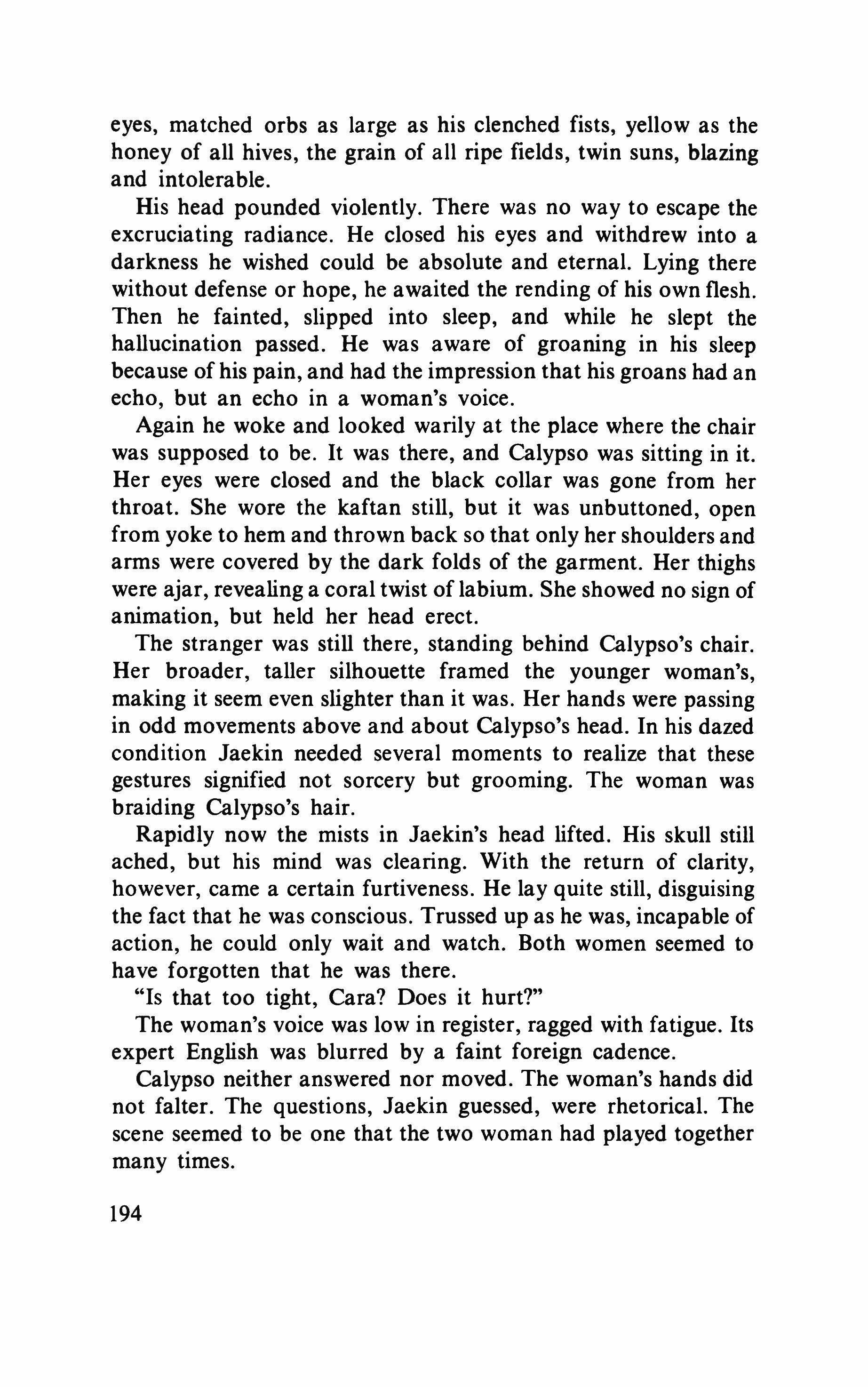
eyes, matched orbs as large as his clenched fists, yellow as the honey of all hives, the grain of all ripe fields, twin suns, blazing and intolerable.
His head pounded violently. There was no way to escape the excruciating radiance. He closed his eyes and withdrew into a darkness he wished could be absolute and eternal. Lying there without defense or hope, he awaited the rending of his own flesh. Then he fainted, slipped into sleep, and while he slept the hallucination passed. He was aware of groaning in his sleep because of his pain, and had the impression that his groans had an echo, but an echo in a woman's voice.
Again he woke and looked warily at the place where the chair was supposed to be. It was there, and Calypso was sitting in it. Her eyes were closed and the black collar was gone from her throat. She wore the kaftan still, but it was unbuttoned, open from yoke to hem and thrown back so that only her shoulders and arms were covered by the dark folds of the garment. Her thighs were ajar, revealing a coral twist of labium. She showed no sign of animation, but held her head erect.
The stranger was still there, standing behind Calypso's chair. Her broader, taller silhouette framed the younger woman's, making it seem even slighter than it was. Her hands were passing in odd movements above and about Calypso's head. In his dazed condition Jaekin needed several moments to realize that these gestures signified not sorcery but grooming. The woman was braiding Calypso's hair.
Rapidly now the mists in Jaekin's head lifted. His skull still ached, but his mind was clearing. With the return of clarity, however, came a certain furtiveness. He lay quite still, disguising the fact that he was conscious. Trussed up as he was, incapable of action, he could only wait and watch. Both women seemed to have forgotten that he was there.
"Is that too tight, Cara? Does it hurt?"
The woman's voice was low in register, ragged with fatigue. Its expert English was blurred by a faint foreign cadence.
Calypso neither answered nor moved. The woman's hands did not falter. The questions, Jaekin guessed, were rhetorical. The scene seemed to be one that the two woman had played together many times.
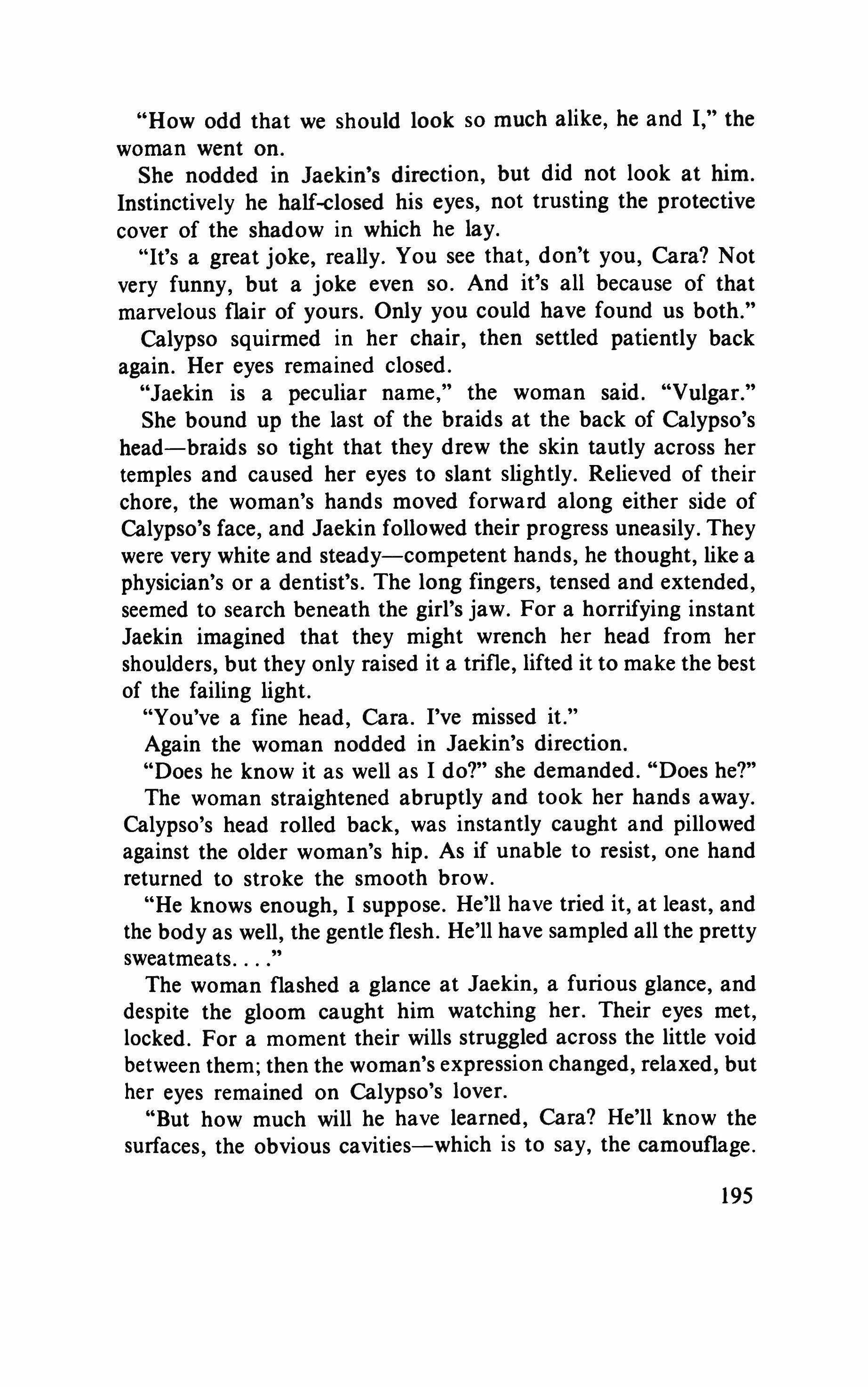
"How odd that we should look so much alike, he and I," the woman went on.
She nodded in Jaekin's direction, but did not look at him. Instinctively he half-closed his eyes, not trusting the protective cover of the shadow in which he lay.
"It's a great joke, really. You see that, don't you, Cara? Not very funny, but a joke even so. And it's all because of that marvelous flair of yours. Only you could have found us both."
Calypso squirmed in her chair, then settled patiently back again. Her eyes remained closed.
"Jaekin is a peculiar name," the woman said. "Vulgar."
She bound up the last of the braids at the back of Calypso's head-braids so tight that they drew the skin tautly across her temples and caused her eyes to slant slightly. Relieved of their chore, the woman's hands moved forward along either side of Calypso's face, and Jaekin followed their progress uneasily. They were very white and steady-competent hands, he thought, like a physician's or a dentist's. The long fingers, tensed and extended, seemed to search beneath the girl's jaw. For a horrifying instant Jaekin imagined that they might wrench her head from her shoulders, but they only raised it a trifle, lifted it to make the best of the failing light.
"You've a fine head, Cara. I've missed it."
Again the woman nodded in Jaekin's direction.
"Does he know it as well as I do?" she demanded. "Does he?"
The woman straightened abruptly and took her hands away. Calypso's head rolled back, was instantly caught and pillowed against the older woman's hip. As if unable to resist, one hand returned to stroke the smooth brow.
"He knows enough, I suppose. He'll have tried it, at least, and the body as well, the gentle flesh. He'll have sampled all the pretty sweatmeats
The woman flashed a glance at Jaekin, a furious glance, and despite the gloom caught him watching her. Their eyes met, locked. For a moment their wills struggled across the little void between them; then the woman's expression changed, relaxed, but her eyes remained on Calypso's lover.
"But how much will he have learned, Cara? He'll know the surfaces, the obvious cavities-which is to say, the camouflage.
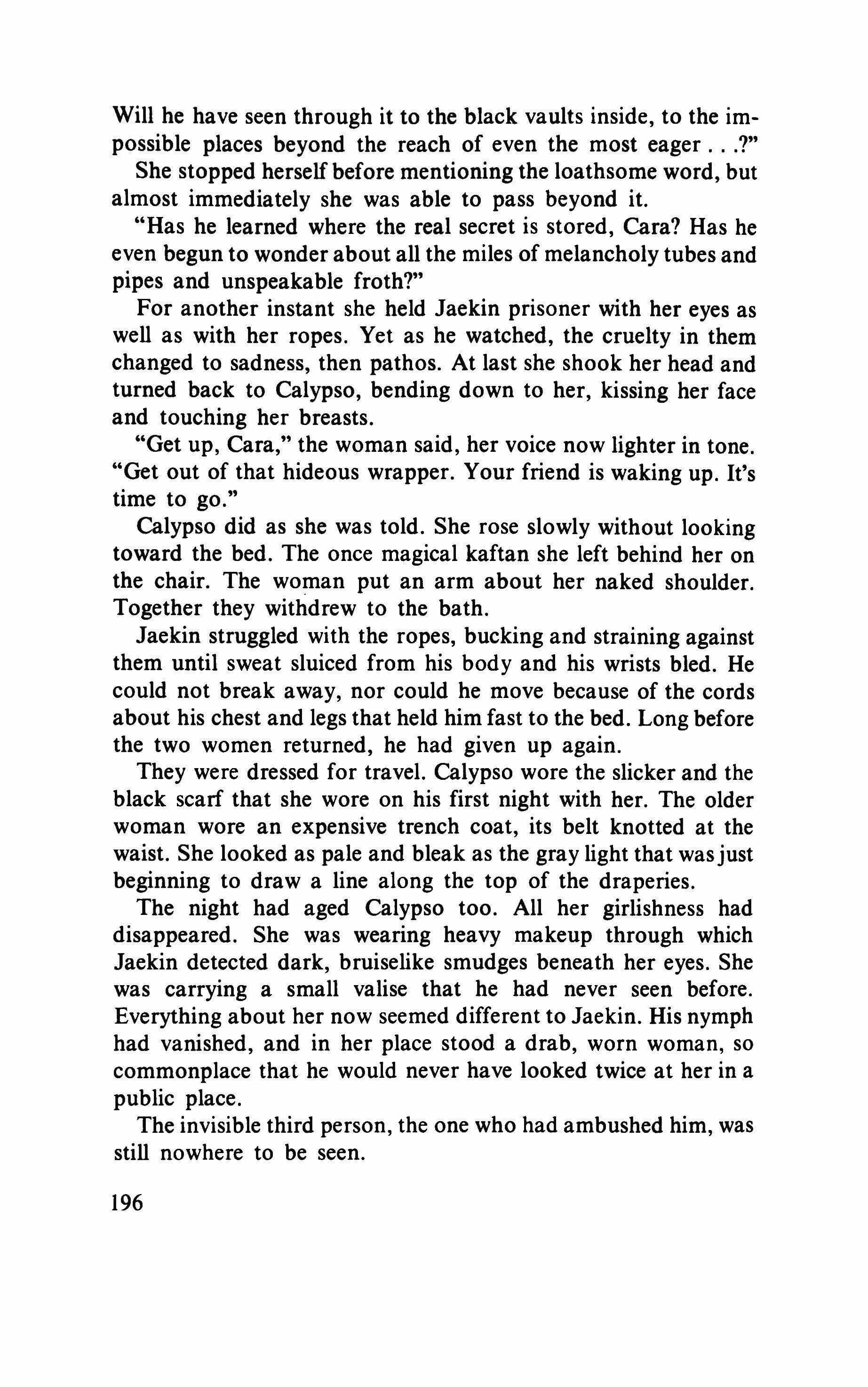
Will he have seen through it to the black vaults inside, to the impossible places beyond the reach of even the most eager ?"
She stopped herself before mentioning the loathsome word, but almost immediately she was able to pass beyond it.
"Has he learned where the real secret is stored, Cara? Has he even begun to wonder about all the miles of melancholy tubes and pipes and unspeakable froth?"
For another instant she held Jaekin prisoner with her eyes as well as with her ropes. Yet as he watched, the cruelty in them changed to sadness, then pathos. At last she shook her head and turned back to Calypso, bending down to her, kissing her face and touching her breasts.
"Get up, Cara," the woman said, her voice now lighter in tone. "Get out of that hideous wrapper. Your friend is waking up. It's time to go."
Calypso did as she was told. She rose slowly without looking toward the bed. The once magical kaftan she left behind her on the chair. The woman put an arm about her naked shoulder. Together they withdrew to the bath.
Jaekin struggled with the ropes, bucking and straining against them until sweat sluiced from his body and his wrists bled. He could not break away, nor could he move because of the cords about his chest and legs that held him fast to the bed. Long before the two women returned, he had given up again.
They were dressed for travel. Calypso wore the slicker and the black scarf that she wore on his first night with her. The older woman wore an expensive trench coat, its belt knotted at the waist. She looked as pale and bleak as the gray light that was just beginning to draw a line along the top of the draperies.
The night had aged Calypso too. All her girlishness had disappeared. She was wearing heavy makeup through which Jaekin detected dark, bruiselike smudges beneath her eyes. She was carrying a small valise that he had never seen before. Everything about her now seemed different to Jaekin. His nymph had vanished, and in her place stood a drab, worn woman, so commonplace that he would never have looked twice at her in a public place.
The invisible third person, the one who had ambushed him, was still nowhere to be seen.
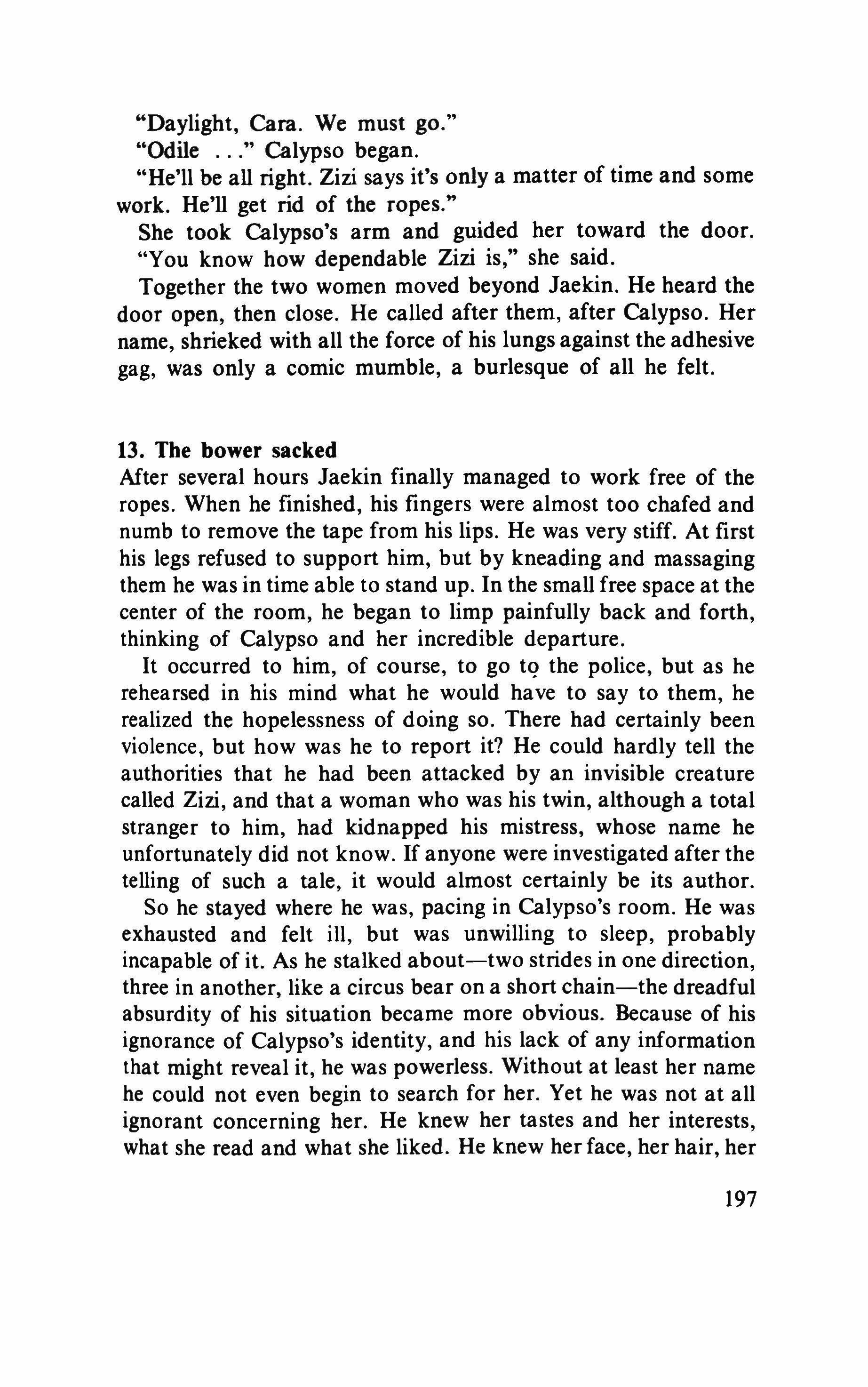
"Daylight, Cara. We must go."
"Odile Calypso began.
"He'll be all right. Zizi says it's only a matter of time and some work. He'll get rid of the ropes."
She took Calypso's arm and guided her toward the door.
"You know how dependable Zizi is," she said.
Together the two women moved beyond Jaekin, He heard the door open, then close. He called after them, after Calypso. Her name, shrieked with all the force of his lungs against the adhesive gag, was only a comic mumble, a burlesque of all he felt.
13. The bower sacked
After several hours Jaekin finally managed to work free of the ropes. When he finished, his fingers were almost too chafed and numb to remove the tape from his lips. He was very stiff. At first his legs refused to support him, but by kneading and massaging them he was in time able to stand up. In the small free space at the center of the room, he began to limp painfully back and forth, thinking of Calypso and her incredible departure.
It occurred to him, of course, to go to the police, but as he rehearsed in his mind what he would have to say to them, he realized the hopelessness of doing so. There had certainly been violence, but how was he to report it? He could hardly tell the authorities that he had been attacked by an invisible creature called Zizi, and that a woman who was his twin, although a total stranger to him, had kidnapped his mistress, whose name he unfortunately did not know. If anyone were investigated after the telling of such a tale, it would almost certainly be its author.
So he stayed where he was, pacing in Calypso's room. He was exhausted and felt ill, but was unwilling to sleep, probably incapable of it. As he stalked about-two strides in one direction, three in another, like a circus bear on a short chain-the dreadful absurdity of his situation became more obvious. Because of his ignorance of Calypso's identity, and his lack of any information that might reveal it, he was powerless. Without at least her name he could not even begin to search for her. Yet he was not at all ignorant concerning her. He knew her tastes and her interests, what she read and what she liked. He knew her face, her hair, her 197
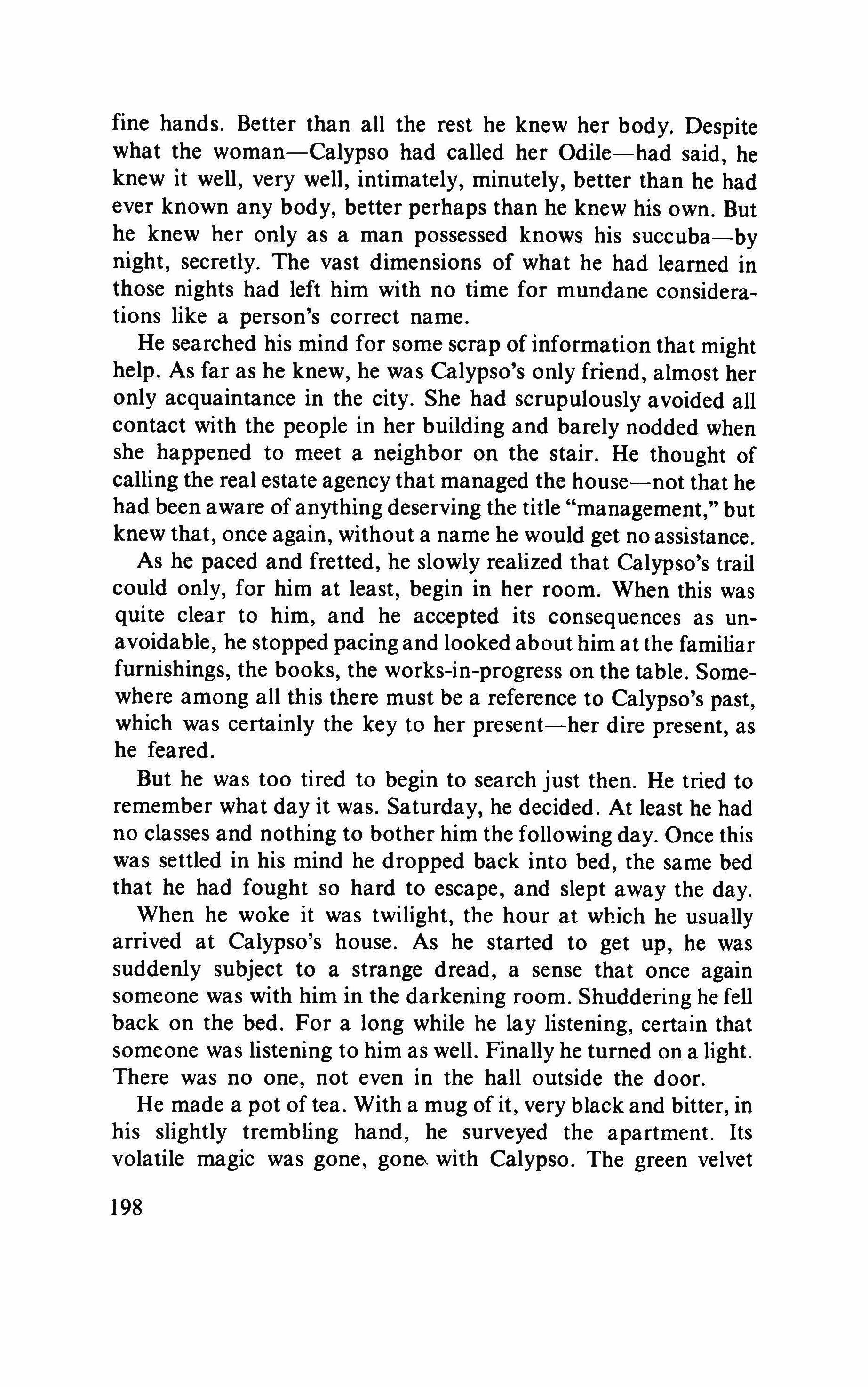
fine hands. Better than all the rest he knew her body. Despite what the woman-Calypso had called her Odile-had said, he knew it well, very well, intimately, minutely, better than he had ever known any body, better perhaps than he knew his own. But he knew her only as a man possessed knows his succuba-by night, secretly. The vast dimensions of what he had learned in those nights had left him with no time for mundane considerations like a person's correct name.
He searched his mind for some scrap of information that might help. As far as he knew, he was Calypso's only friend, almost her only acquaintance in the city. She had scrupulously avoided all contact with the people in her building and barely nodded when she happened to meet a neighbor on the stair. He thought of calling the real estate agency that managed the house-not that he had been aware of anything deserving the title "management," but knew that, once again, without a name he would get no assistance.
As he paced and fretted, he slowly realized that Calypso's trail could only, for him at least, begin in her room. When this was quite clear to him, and he accepted its consequences as unavoidable, he stopped pacing and looked about him at the familiar furnishings, the books, the works-in-progress on the table. Somewhere among all this there must be a reference to Calypso's past, which was certainly the key to her present-her dire present, as he feared.
But he was too tired to begin to search just then. He tried to remember what day it was. Saturday, he decided. At least he had no classes and nothing to bother him the following day. Once this was settled in his mind he dropped back into bed, the same bed that he had fought so hard to escape, and slept away the day.
When he woke it was twilight, the hour at which he usually arrived at Calypso's house. As he started to get up, he was suddenly subject to a strange dread, a sense that once again someone was with him in the darkening room. Shuddering he fell back on the bed. For a long while he lay listening, certain that someone was listening to him as well. Finally he turned on a light. There was no one, not even in the hall outside the door.
He made a pot of tea. With a mug of it, very black and bitter, in his slightly trembling hand, he surveyed the apartment. Its volatile magic was gone, gone. with Calypso. The green velvet
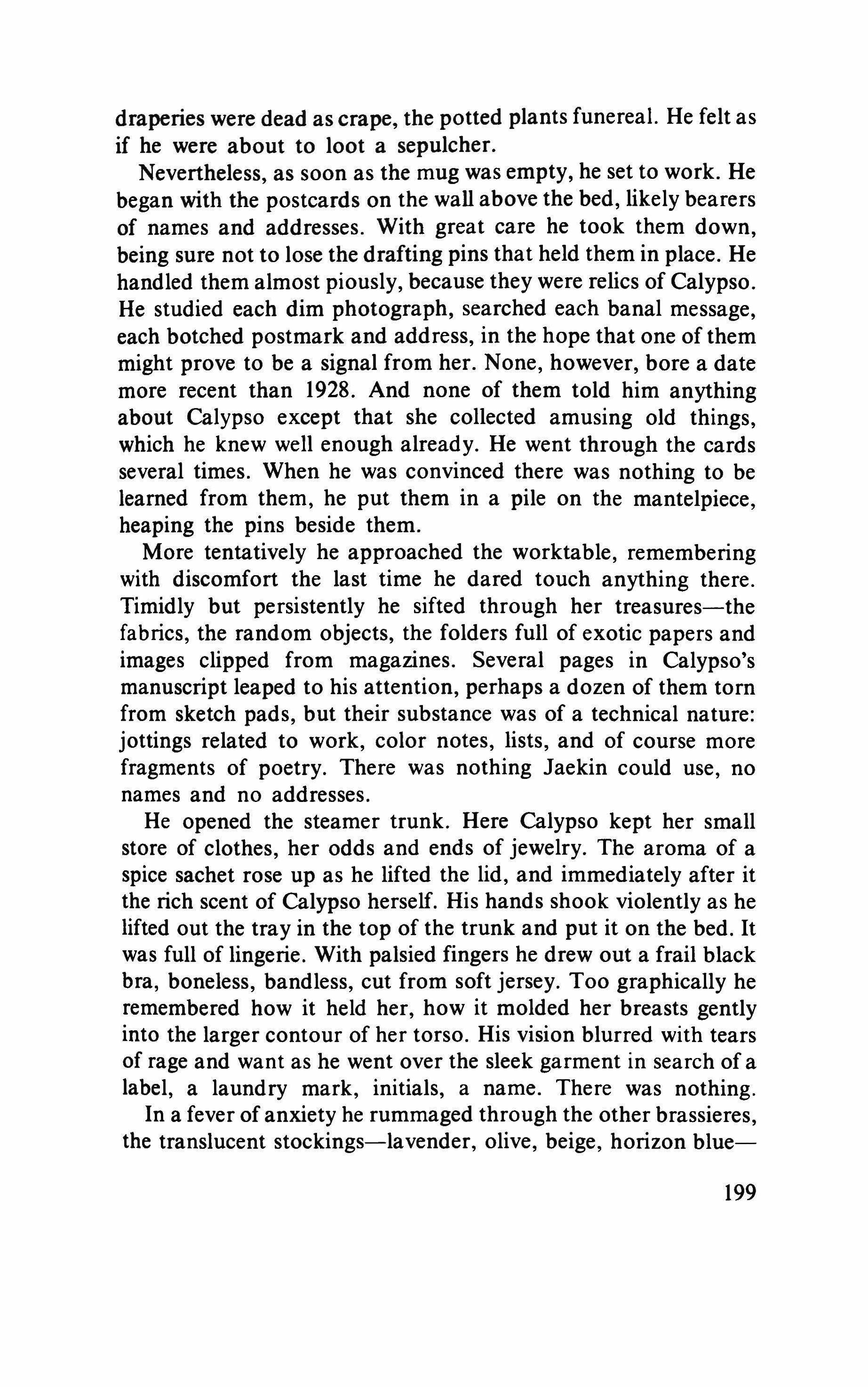
draperies were dead as crape, the potted plants funereal. He felt as if he were about to loot a sepulcher.
Nevertheless, as soon as the mug was empty, he set to work. He began with the postcards on the wall above the bed, likely bearers of names and addresses. With great care he took them down, being sure not to lose the drafting pins that held them in place. He handled them almost piously, because they were relics of Calypso. He studied each dim photograph, searched each banal message, each botched postmark and address, in the hope that one of them might prove to be a signal from her. None, however, bore a date more recent than 1928. And none of them told him anything about Calypso except that she collected amusing old things, which he knew well enough already. He went through the cards several times. When he was convinced there was nothing to be learned from them, he put them in a pile on the mantelpiece, heaping the pins beside them.
More tentatively he approached the worktable, remembering with discomfort the last time he dared touch anything there. Timidly but persistently he sifted through her treasures-the fabrics, the random objects, the folders full of exotic papers and images clipped from magazines. Several pages in Calypso's manuscript leaped to his attention, perhaps a dozen of them torn from sketch pads, but their substance was of a technical nature: jottings related to work, color notes, lists, and of course more fragments of poetry. There was nothing Jaekin could use, no names and no addresses.
He opened the steamer trunk. Here Calypso kept her small store of clothes, her odds and ends of jewelry. The aroma of a spice sachet rose up as he lifted the lid, and immediately after it the rich scent of Calypso herself. His hands shook violently as he lifted out the tray in the top of the trunk and put it on the bed. It was full of lingerie. With palsied fingers he drew out a frail black bra, boneless, bandless, cut from soft jersey. Too graphically he remembered how it held her, how it molded her breasts gently into the larger contour of her torso. His vision blurred with tears of rage and want as he went over the sleek garment in search of a label, a laundry mark, initials, a name. There was nothing. In a fever of anxiety he rummaged through the other brassieres, the translucent stockings-lavender, olive, beige, horizon blue-
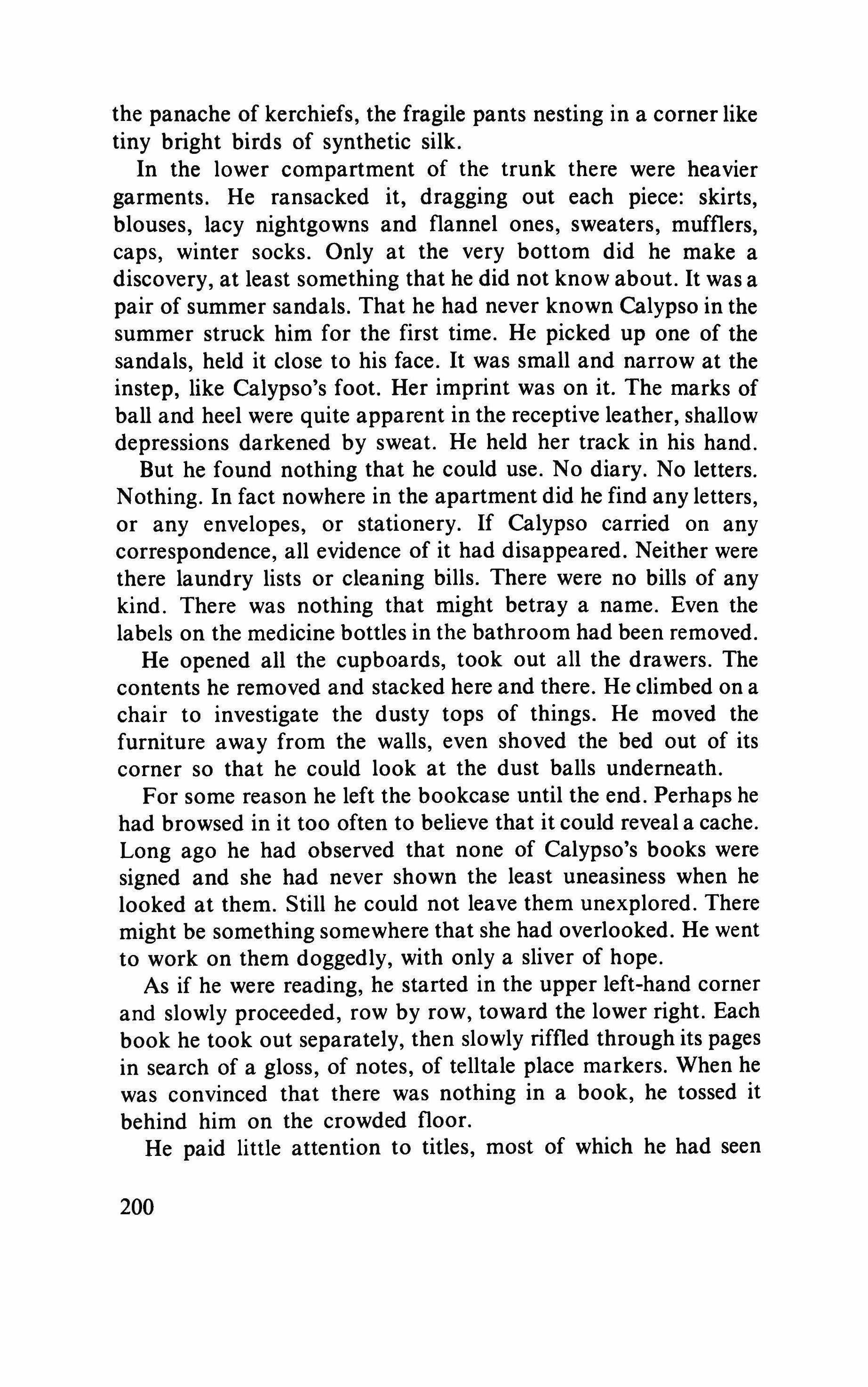
the panache of kerchiefs, the fragile pants nesting in a corner like tiny bright birds of synthetic silk.
In the lower compartment of the trunk there were heavier garments. He ransacked it, dragging out each piece: skirts, blouses, lacy nightgowns and flannel ones, sweaters, mufflers, caps, winter socks. Only at the very bottom did he make a discovery, at least something that he did not know about. It was a pair of summer sandals. That he had never known Calypso in the summer struck him for the first time. He picked up one of the sandals, held it close to his face. It was small and narrow at the instep, like Calypso's foot. Her imprint was on it. The marks of ball and heel were quite apparent in the receptive leather, shallow depressions darkened by sweat. He held her track in his hand.
But he found nothing that he could use. No diary. No letters. Nothing. In fact nowhere in the apartment did he find any letters, or any envelopes, or stationery. If Calypso carried on any correspondence, all evidence of it had disappeared. Neither were there laundry lists or cleaning bills. There were no bills of any kind. There was nothing that might betray a name. Even the labels on the medicine bottles in the bathroom had been removed.
He opened all the cupboards, took out all the drawers. The contents he removed and stacked here and there. He climbed on a chair to investigate the dusty tops of things. He moved the furniture away from the walls, even shoved the bed out of its corner so that he could look at the dust balls underneath.
For some reason he left the bookcase until the end. Perhaps he had browsed in it too often to believe that it could reveal a cache.
Long ago he had observed that none of Calypso's books were signed and she had never shown the least uneasiness when he looked at them. Still he could not leave them unexplored. There might be something somewhere that she had overlooked. He went to work on them doggedly, with only a sliver of hope.
As if he were reading, he started in the upper left-hand corner and slowly proceeded, row by row, toward the lower right. Each book he took out separately, then slowly riffled through its pages in search of a gloss, of notes, of telltale place markers. When he was convinced that there was nothing in a book, he tossed it behind him on the crowded floor.
He paid little attention to titles, most of which he had seen
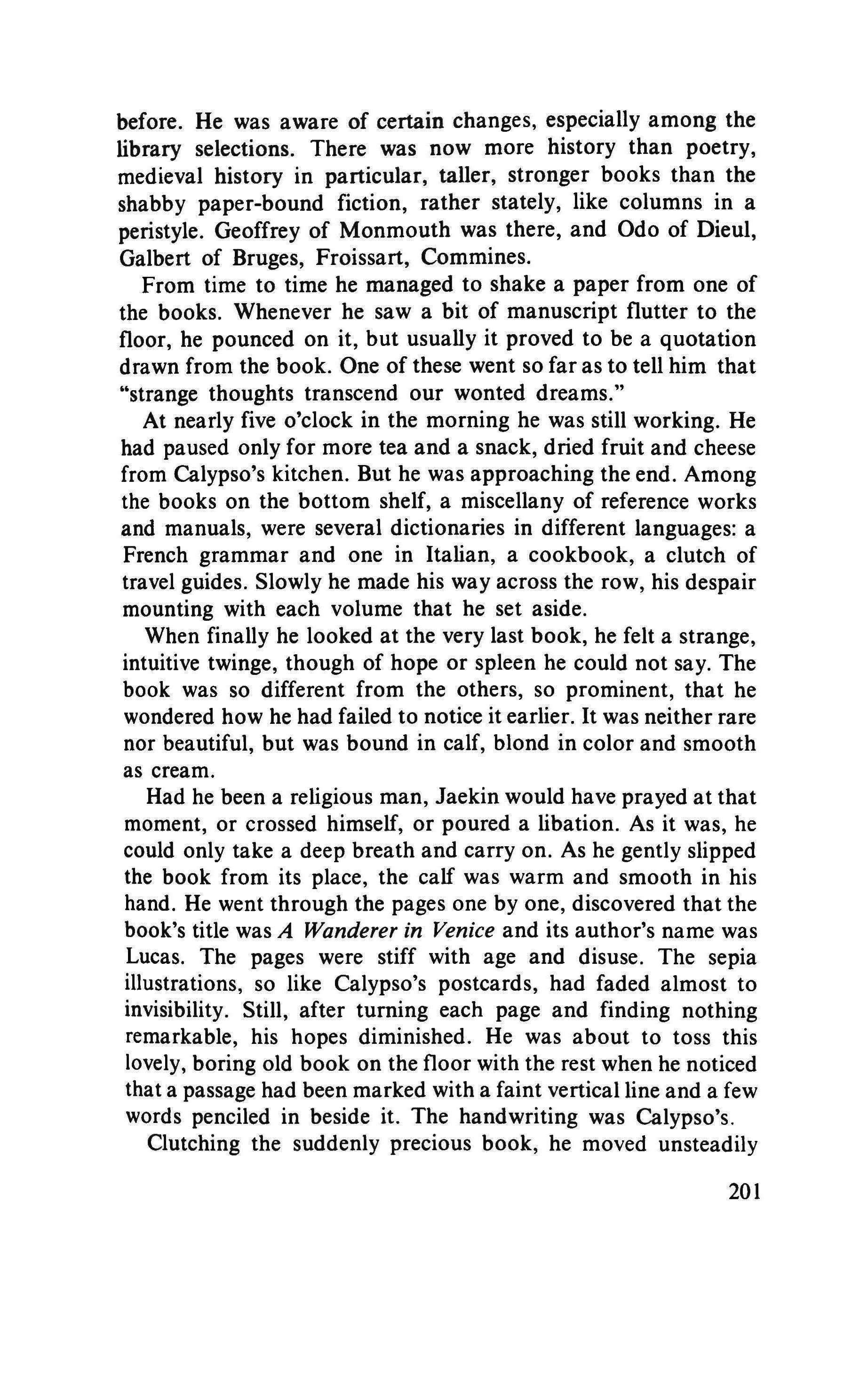
before. He was aware of certain changes, especially among the library selections. There was now more history than poetry, medieval history in particular, taller, stronger books than the shabby paper-bound fiction, rather stately, like columns in a peristyle. Geoffrey of Monmouth was there, and Odo of Dieul, Galbert of Bruges, Froissart, Commines.
From time to time he managed to shake a paper from one of the books. Whenever he saw a bit of manuscript flutter to the floor, he pounced on it, but usually it proved to be a quotation drawn from the book. One of these went so far as to tell him that "strange thoughts transcend our wonted dreams."
At nearly five o'clock in the morning he was still working. He had paused only for more tea and a snack, dried fruit and cheese from Calypso's kitchen. But he was approaching the end. Among the books on the bottom shelf, a miscellany of reference works and manuals, were several dictionaries in different languages: a French grammar and one in Italian, a cookbook, a clutch of travel guides. Slowly he made his way across the row, his despair mounting with each volume that he set aside.
When finally he looked at the very last book, he felt a strange, intuitive twinge, though of hope or spleen he could not say. The book was so different from the others, so prominent, that he wondered how he had failed to notice it earlier. It was neither rare nor beautiful, but was bound in calf, blond in color and smooth as cream.
Had he been a religious man, Jaekin would have prayed at that moment, or crossed himself, or poured a libation. As it was, he could only take a deep breath and carryon. As he gently slipped the book from its place, the calf was warm and smooth in his hand. He went through the pages one by one, discovered that the book's title was A Wanderer in Venice and its author's name was Lucas. The pages were stiff with age and disuse. The sepia illustrations, so like Calypso's postcards, had faded almost to invisibility. Still, after turning each page and finding nothing remarkable, his hopes diminished. He was about to toss this lovely, boring old book on the floor with the rest when he noticed that a passage had been marked with a faint vertical line and a few words penciled in beside it. The handwriting was Calypso's.
Clutching the suddenly precious book, he moved unsteadily
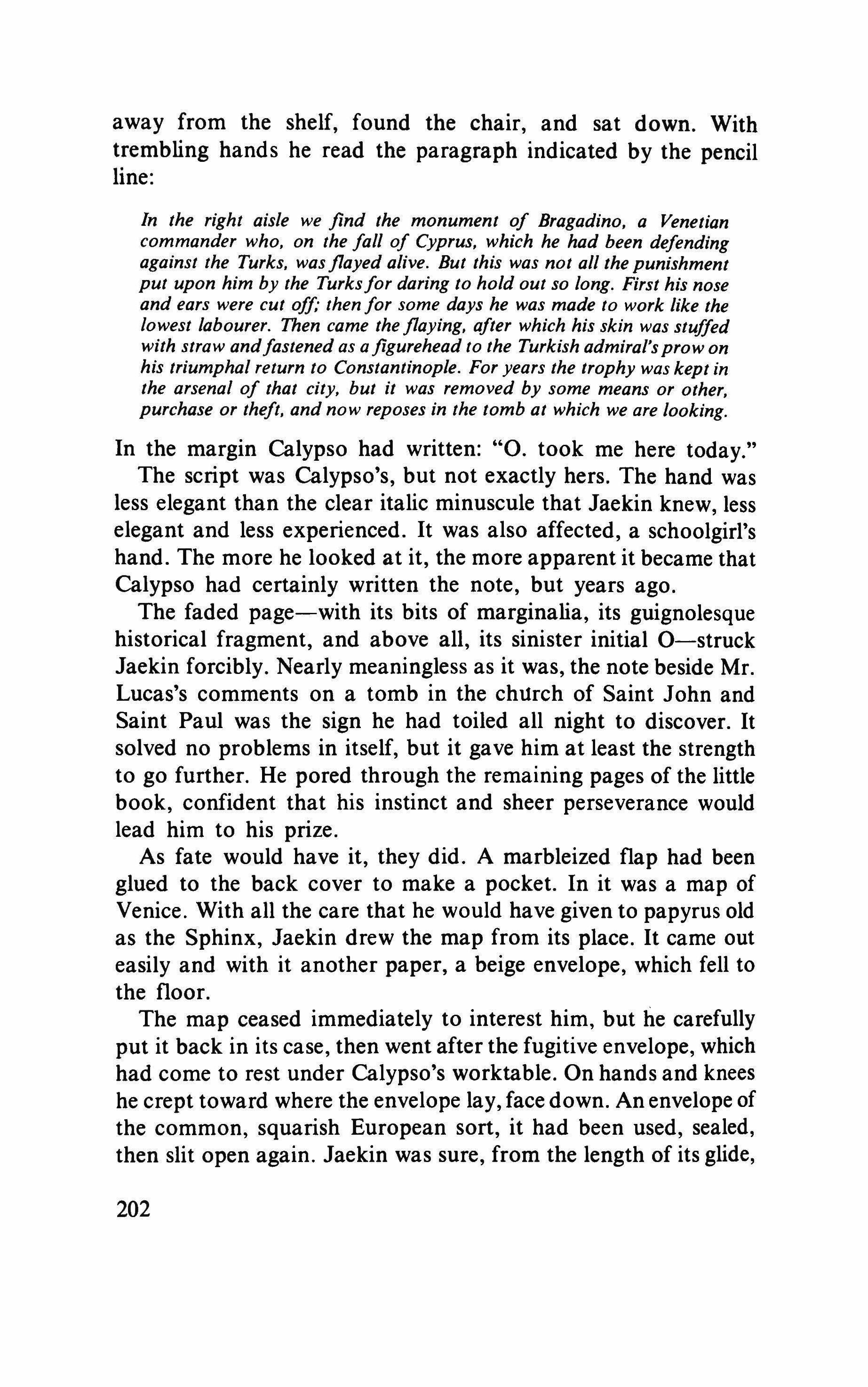
away from the shelf, found the chair, and sat down. With trembling hands he read the paragraph indicated by the pencil line:
In the right aisle we find the monument of Bragadino, a Venetian commander who. on the fall of Cyprus. which he had been defending against the Turks. was flayed alive. But this was not all the punishment put upon him by the Turksfor daring to hold out so long. First his nose and ears were cut off: then for some days he was made to work like the lowest labourer. Then came the flaying. after which his skin was stuffed with straw andfastened as a figurehead to the Turkish admiral'sprow on his triumphal return to Constantinople. For years the trophy was kept in the arsenal of that city. but it was removed by some means or other. purchase or theft. and now reposes in the tomb at which we are looking. In the margin Calypso had written: "0. took me here today."
The script was Calypso's, but not exactly hers. The hand was less elegant than the clear italic minuscule that Jaekin knew, less elegant and less experienced. It was also affected, a schoolgirl's hand. The more he looked at it, the more apparent it became that Calypso had certainly written the note, but years ago.
The faded page-with its bits of marginalia, its guignolesque historical fragment, and above all, its sinister initial O-struck Jaekin forcibly. Nearly meaningless as it was, the note beside Mr. Lucas's comments on a tomb in the church of Saint John and Saint Paul was the sign he had toiled all night to discover. It solved no problems in itself, but it gave him at least the strength to go further. He pored through the remaining pages of the little book, confident that his instinct and sheer perseverance would lead him to his prize.
As fate would have it, they did. A marbleized flap had been glued to the back cover to make a pocket. In it was a map of Venice. With all the care that he would have given to papyrus old as the Sphinx, Jaekin drew the map from its place. It came out easily and with it another paper, a beige envelope, which fell to the floor.
The map ceased immediately to interest him, but he carefully put it back in its case, then went after the fugitive envelope, which had come to rest under Calypso's worktable. On hands and knees he crept toward where the envelope lay, face down. An envelope of the common, squarish European sort, it had been used, sealed, then slit open again. Jaekin was sure, from the length of its glide,
202
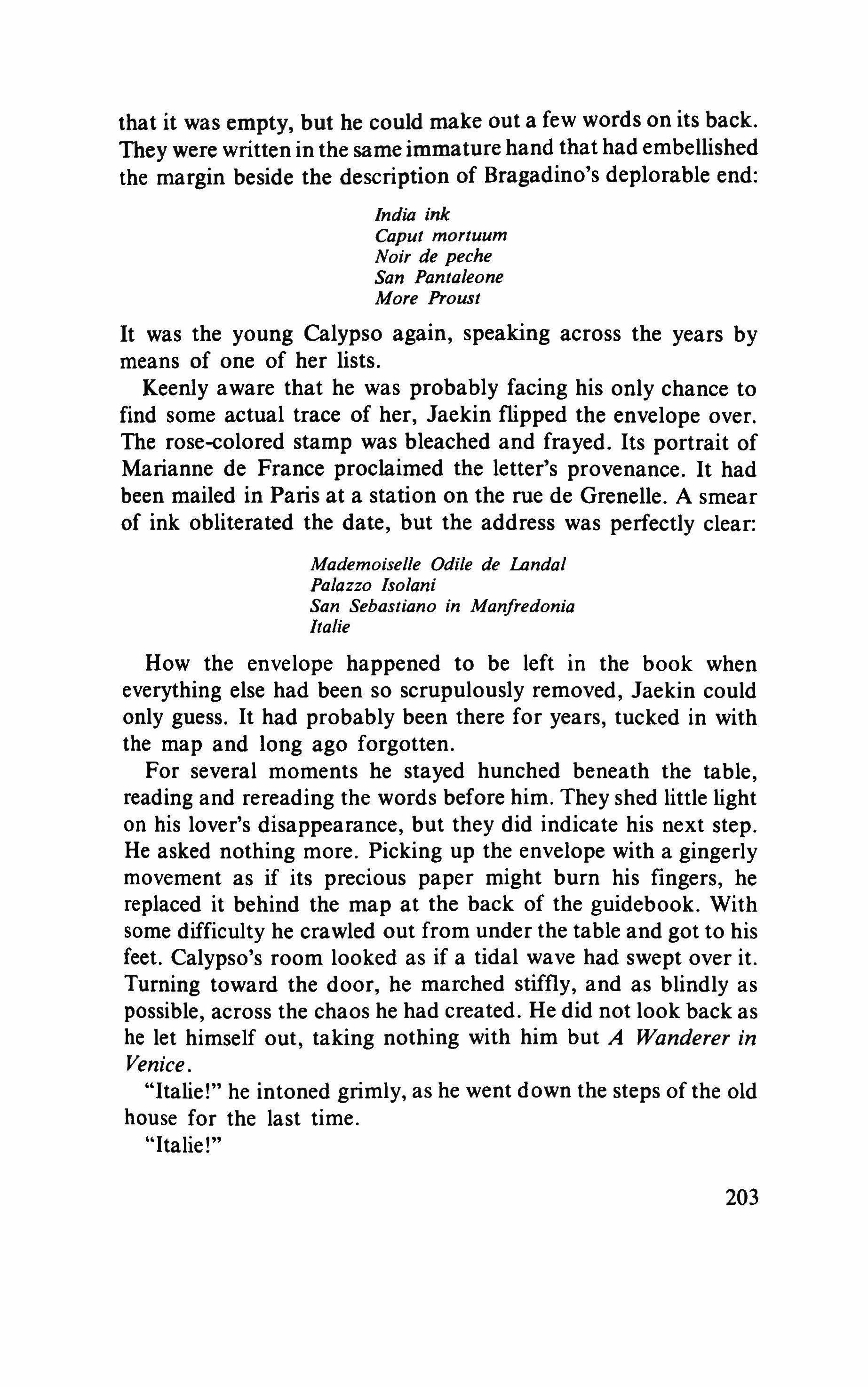
that it was empty, but he could make out a few words on its back. They were written in the same immature hand that had embellished the margin beside the description of Bragadino's deplorable end:
India ink
Caput mortuum
Noir de peche
San Pantaleone
More Proust
It was the young Calypso again, speaking across the years by means of one of her lists.
Keenly aware that he was probably facing his only chance to find some actual trace of her, Jaekin flipped the envelope over. The rose-colored stamp was bleached and frayed. Its portrait of Marianne de France proclaimed the letter's provenance. It had been mailed in Paris at a station on the rue de Grenelle. A smear of ink obliterated the date, but the address was perfectly clear:
Mademoiselle Odile de Landal Palazzo Isolani
San Sebastiano in Manfredonia
ItalieHow the envelope happened to be left in the book when everything else had been so scrupulously removed, Jaekin could only guess. It had probably been there for years, tucked in with the map and long ago forgotten.
For several moments he stayed hunched beneath the table, reading and rereading the words before him. They shed little light on his lover's disappearance, but they did indicate his next step. He asked nothing more. Picking up the envelope with a gingerly movement as if its precious paper might burn his fingers, he replaced it behind the map at the back of the guidebook. With some difficulty he crawled out from under the table and got to his feet. Calypso's room looked as if a tidal wave had swept over it. Turning toward the door, he marched stiffly, and as blindly as possible, across the chaos he had created. He did not look back as he let himself out, taking nothing with him but A Wanderer in Venice.
"Italie!" he intoned grimly, as he went down the steps of the old house for the last time.
"Italie!"
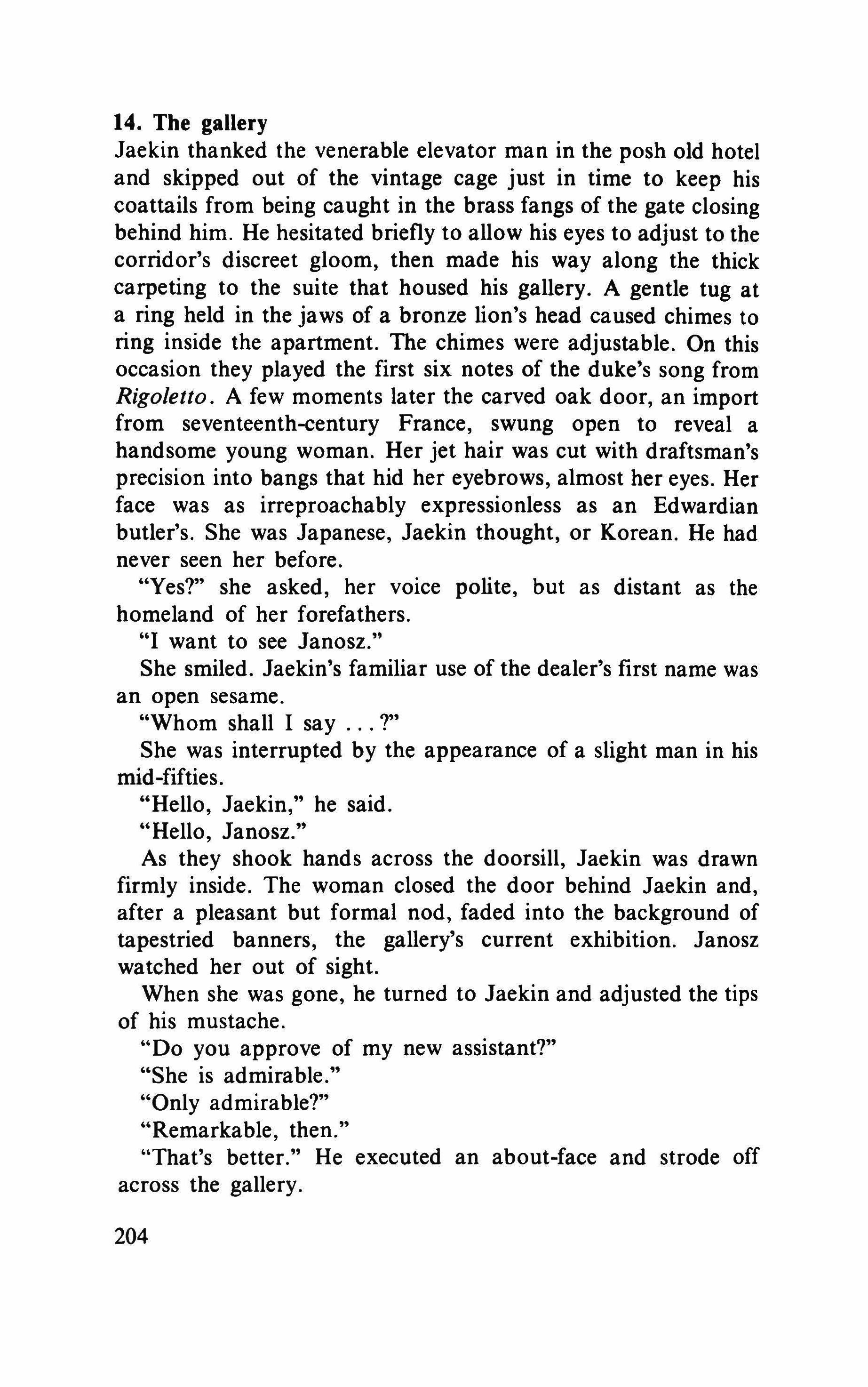
14. The gallery
Jaekin thanked the venerable elevator man in the posh old hotel and skipped out of the vintage cage just in time to keep his coattails from being caught in the brass fangs of the gate closing behind him. He hesitated briefly to allow his eyes to adjust to the corridor's discreet gloom, then made his way along the thick carpeting to the suite that housed his gallery. A gentle tug at a ring held in the jaws of a bronze lion's head caused chimes to ring inside the apartment. The chimes were adjustable. On this occasion they played the first six notes of the duke's song from Rigo/etto. A few moments later the carved oak door, an import from seventeenth-century France, swung open to reveal a handsome young woman. Her jet hair was cut with draftsman's precision into bangs that hid her eyebrows, almost her eyes. Her face was as irreproachably expressionless as an Edwardian butler's. She was Japanese, Jaekin thought, or Korean. He had never seen her before.
"Yes?" she asked, her voice polite, but as distant as the homeland of her forefathers.
"I want to see Janosz."
She smiled. Jaekin's familiar use of the dealer's first name was an open sesame.
"Whom shall 1 say ?"
She was interrupted by the appearance of a slight man in his mid-fifties.
"Hello, Jaekin," he said.
"Hello, Janosz."
As they shook hands across the doorsill, Jaekin was drawn firmly inside. The woman closed the door behind Jaekin and, after a pleasant but formal nod, faded into the background of tapestried banners, the gallery's current exhibition. Janosz watched her out of sight.
When she was gone, he turned to Jaekin and adjusted the tips of his mustache.
"Do you approve of my new assistant?"
"She is admirable."
"Only admirable?"
"Remarkable, then."
"That's better." He executed an about-face and strode off across the gallery. 204
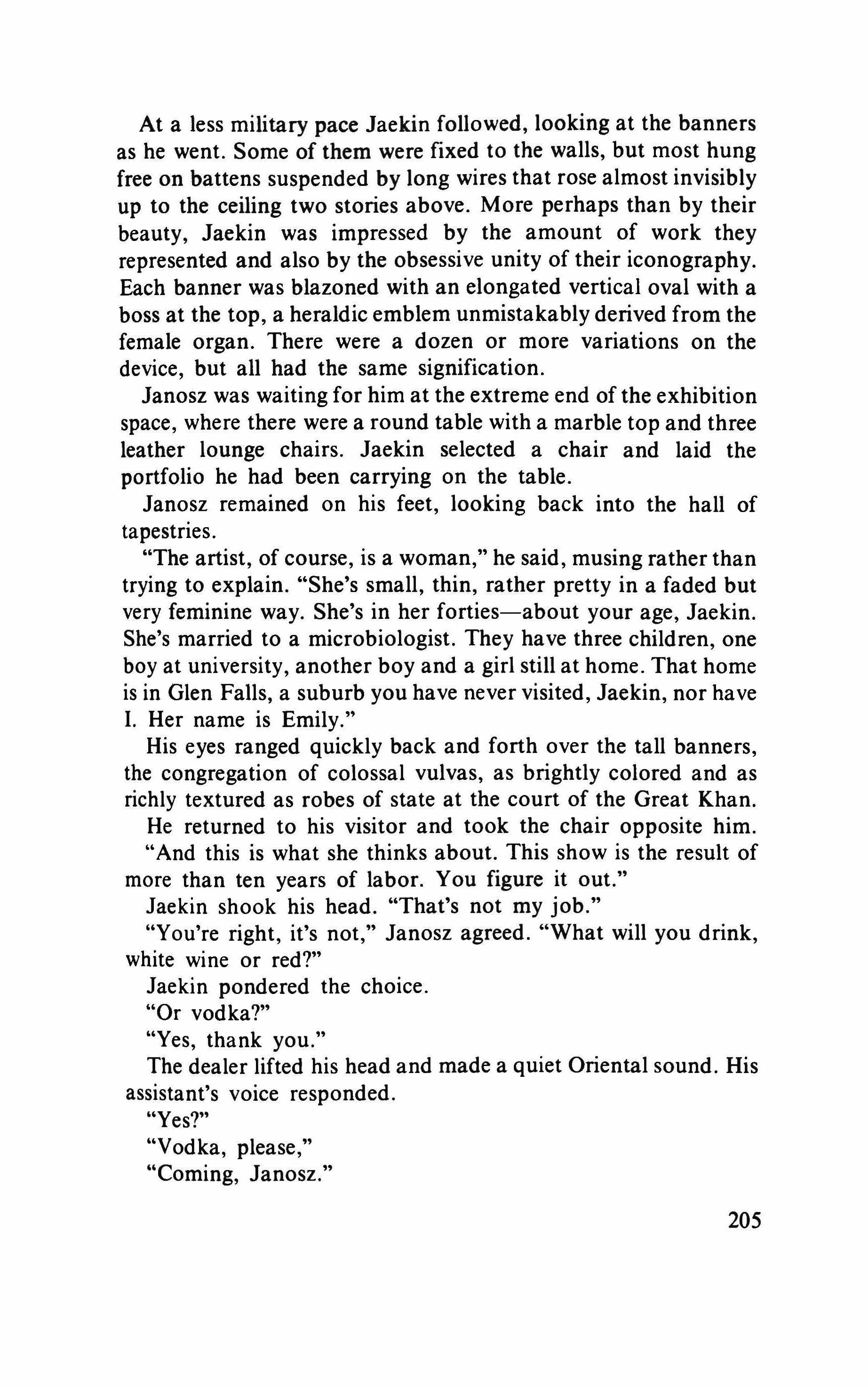
At a less military pace Jaekin followed, looking at the banners as he went. Some of them were fixed to the walls, but most hung free on battens suspended by long wires that rose almost invisibly up to the ceiling two stories above. More perhaps than by their beauty, Jaekin was impressed by the amount of work they represented and also by the obsessive unity of their iconography. Each banner was blazoned with an elongated vertical oval with a boss at the top, a heraldic emblem unmistakably derived from the female organ. There were a dozen or more variations on the device, but all had the same signification.
Janosz was waiting for him at the extreme end of the exhibition space, where there were a round table with a marble top and three leather lounge chairs. Jaekin selected a chair and laid the portfolio he had been carrying on the table.
Janosz remained on his feet, looking back into the hall of tapestries.
"The artist, of course, is a woman," he said, musing rather than trying to explain. "She's small, thin, rather pretty in a faded but very feminine way. She's in her forties-about your age, Jaekin. She's married to a microbiologist. They have three children, one boy at university, another boy and a girl still at home. That home is in Glen Falls, a suburb you have never visited, Jaekin, nor have I. Her name is Emily."
His eyes ranged quickly back and forth over the tall banners, the congregation of colossal vulvas, as brightly colored and as richly textured as robes of state at the court of the Great Khan. He returned to his visitor and took the chair opposite him.
"And this is what she thinks about. This show is the result of more than ten years of labor. You figure it out."
Jaekin shook his head. "That's not my job."
"You're right, it's not," Janosz agreed. "What will you drink, white wine or red?"
Jaekin pondered the choice.
"Or vodka?"
"Yes, thank you."
The dealer lifted his head and made a quiet Oriental sound. His assistant's voice responded.
"Yes?"
"Vodka, please," "Coming, Janosz."
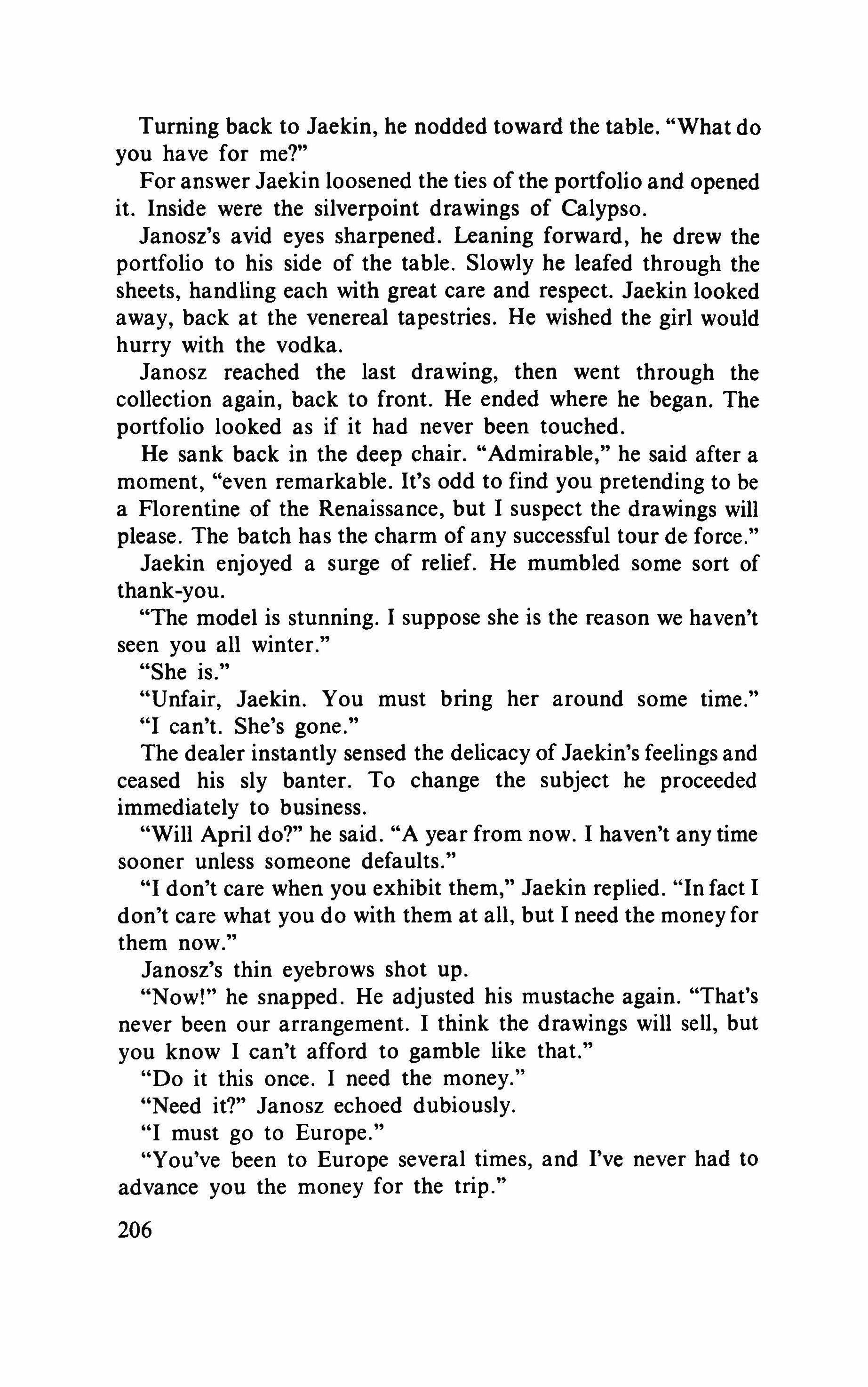
Turning back to Jaekin, he nodded toward the table. "What do you have for me?"
For answer Jaekin loosened the ties of the portfolio and opened it. Inside were the silverpoint drawings of Calypso.
Janosz's avid eyes sharpened. Leaning forward, he drew the portfolio to his side of the table. Slowly he leafed through the sheets, handling each with great care and respect. Jaekin looked away, back at the venereal tapestries. He wished the girl would hurry with the vodka.
Janosz reached the last drawing, then went through the collection again, back to front. He ended where he began. The portfolio looked as if it had never been touched.
He sank back in the deep chair. "Admirable," he said after a moment, "even remarkable. It's odd to find you pretending to be a Florentine of the Renaissance, but I suspect the drawings will please. The batch has the charm of any successful tour de force."
Jaekin enjoyed a surge of relief. He mumbled some sort of thank-you.
"The model is stunning. 1 suppose she is the reason we haven't seen you all winter."
"She is."
"Unfair, Jaekin. You must bring her around some time."
"I can't. She's gone."
The dealer instantly sensed the delicacy of Jaekin's feelings and ceased his sly banter. To change the subject he proceeded immediately to business.
"Will April do?" he said. "A year from now. 1 haven't any time sooner unless someone defaults."
"I don't care when you exhibit them," Jaekin replied. "In fact 1 don't care what you do with them at all, but 1 need the money for them now."
Janosz's thin eyebrows shot up.
"Now!" he snapped. He adjusted his mustache again. "That's never been our arrangement. 1 think the drawings will sell, but you know 1 can't afford to gamble like that."
"Do it this once. 1 need the money."
"Need it?" Janosz echoed dubiously.
"I must go to Europe."
"You've been to Europe several times, and I've never had to advance you the money for the trip."
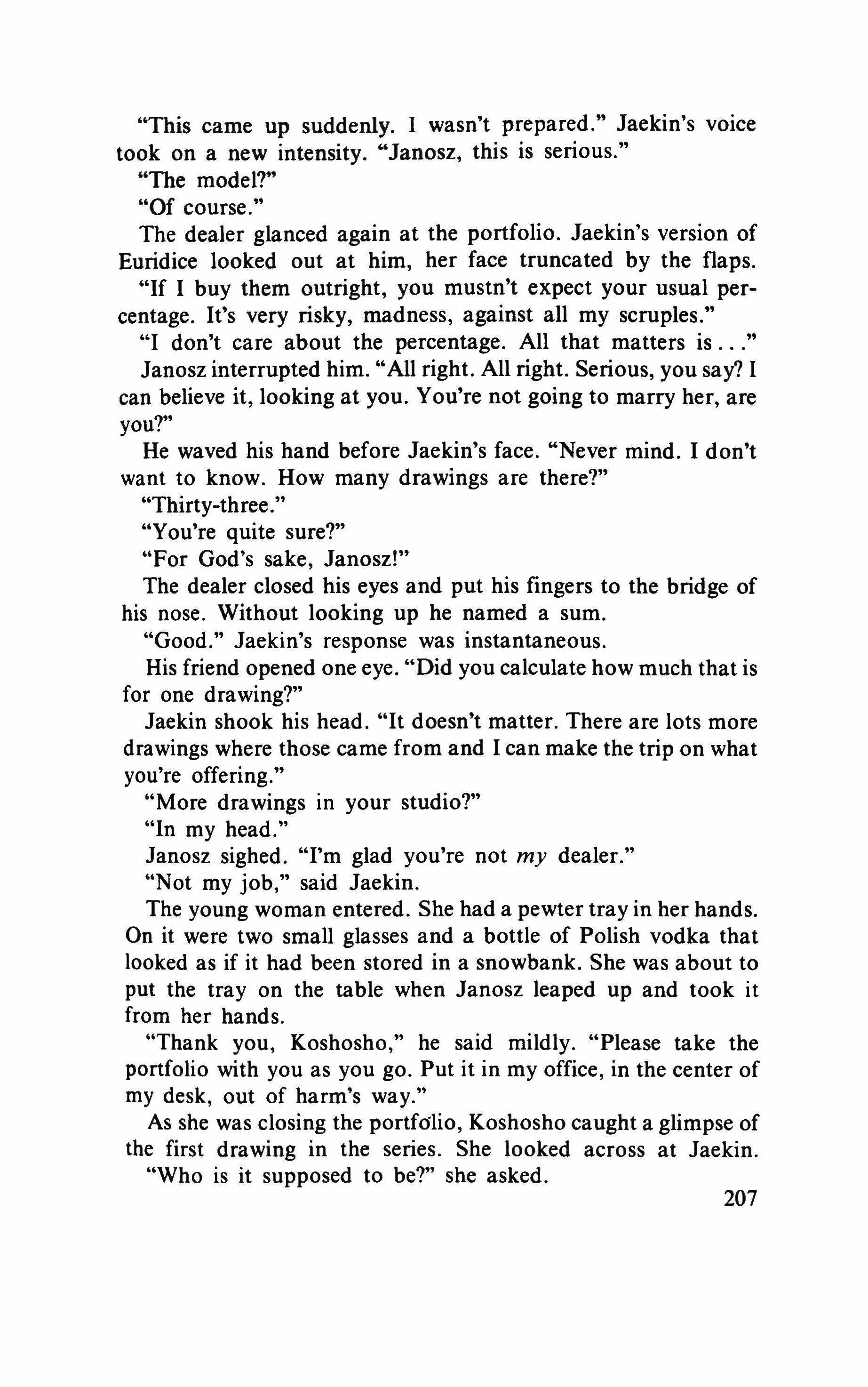
"This came up suddenly. 1 wasn't prepared." Jaekin's voice took on a new intensity. "Janosz, this is serious."
"The model?"
"Of course."
The dealer glanced again at the portfolio. Jaekin's version of Euridice looked out at him, her face truncated by the flaps. "If I buy them outright, you mustn't expect your usual percentage. It's very risky, madness, against all my scruples."
"I don't care about the percentage. All that matters is Janosz interrupted him. "All right. All right. Serious, you say? I can believe it, looking at you. You're not going to marry her, are you?"
He waved his hand before Jaekin's face. "Never mind. I don't want to know. How many drawings are there?"
"Thirty-three."
"You're quite sure?"
"For God's sake, Janosz!"
The dealer closed his eyes and put his fingers to the bridge of his nose. Without looking up he named a sum. "Good." Jaekin's response was instantaneous. His friend opened one eye. "Did you calculate how much that is for one drawing?"
Jaekin shook his head. "It doesn't matter. There are lots more drawings where those came from and I can make the trip on what you're offering."
"More drawings in your studio?"
"In my head."
Janosz sighed. "I'm glad you're not my dealer."
"Not my job," said Jaekin.
The young woman entered. She had a pewter tray in her hands. On it were two small glasses and a bottle of Polish vodka that looked as if it had been stored in a snowbank. She was about to put the tray on the table when Janosz leaped up and took it from her hands.
"Thank you, Koshosho," he said mildly. "Please take the portfolio with you as you go. Put it in my office, in the center of my desk, out of harm's way."
As she was closing the portfolio, Koshosho caught a glimpse of the first drawing in the series. She looked across at Jaekin. "Who is it supposed to be?" she asked.
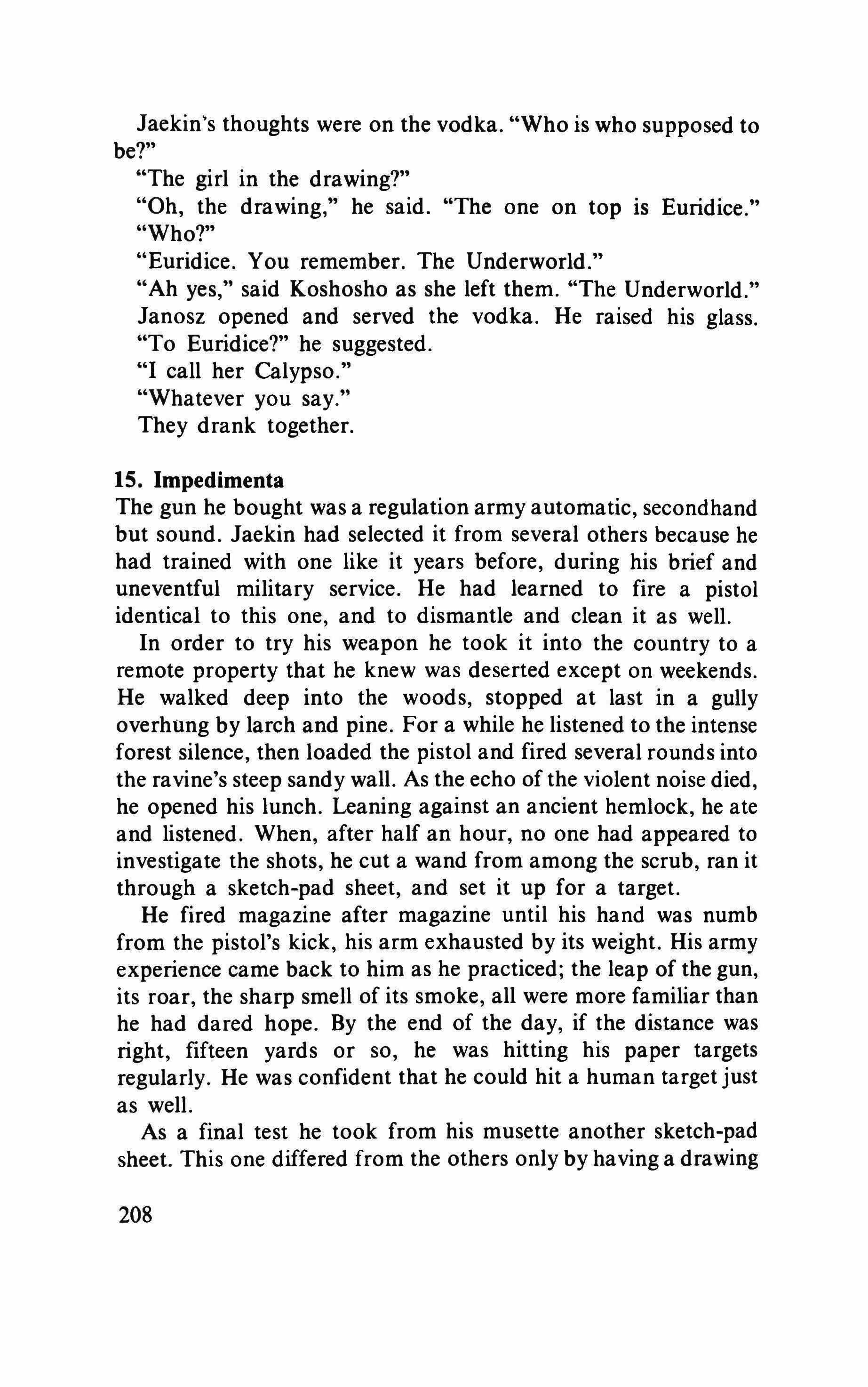
Jaekin's thoughts were on the vodka. "Who is who supposed to be?"
"The girl in the drawing?"
"Oh, the drawing," he said. "The one on top is Euridice." "Who?"
"Euridice. You remember. The Underworld." "Ah yes," said Koshosho as she left them. "The Underworld." Janosz opened and served the vodka. He raised his glass. "To Euridice?" he suggested. "I call her Calypso."
"Whatever you say." They drank together.
The gun he bought was a regulation army automatic, secondhand but sound. Jaekin had selected it from several others because he had trained with one like it years before, during his brief and uneventful military service. He had learned to fire a pistol identical to this one, and to dismantle and clean it as well.
In order to try his weapon he took it into the country to a remote property that he knew was deserted except on weekends. He walked deep into the woods, stopped at last in a gully overhung by larch and pine. For a while he listened to the intense forest silence, then loaded the pistol and fired several rounds into the ravine's steep sandy wall. As the echo of the violent noise died, he opened his lunch. Leaning against an ancient hemlock, he ate and listened. When, after half an hour, no one had appeared to investigate the shots, he cut a wand from among the scrub, ran it through a sketch-pad sheet, and set it up for a target. He fired magazine after magazine until his hand was numb from the pistol's kick, his arm exhausted by its weight. His army experience came back to him as he practiced; the leap of the gun, its roar, the sharp smell of its smoke, all were more familiar than he had dared hope. By the end of the day, if the distance was right, fifteen yards or so, he was hitting his paper targets regularly. He was confident that he could hit a human target just as well.
As a final test he took from his musette another sketch-pad sheet. This one differed from the others only by having a drawing
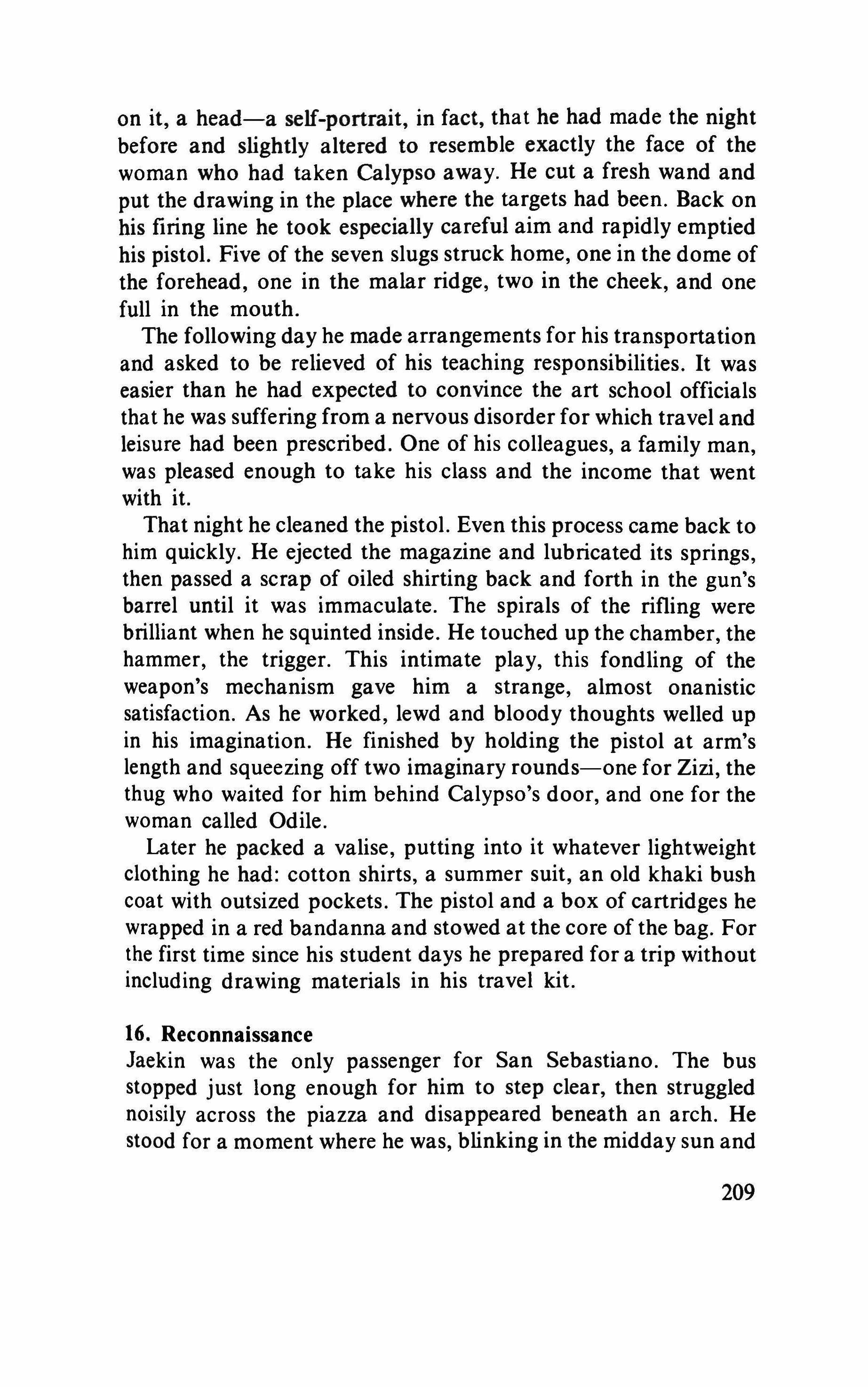
on it, a head-a self-portrait, in fact, that he had made the night before and slightly altered to resemble exactly the face of the woman who had taken Calypso away. He cut a fresh wand and put the drawing in the place where the targets had been. Back on his firing line he took especially careful aim and rapidly emptied his pistol. Five of the seven slugs struck home, one in the dome of the forehead, one in the malar ridge, two in the cheek, and one full in the mouth.
The following day he made arrangements for his transportation and asked to be relieved of his teaching responsibilities. It was easier than he had expected to convince the art school officials that he was suffering from a nervous disorder for which travel and leisure had been prescribed. One of his colleagues, a family man, was pleased enough to take his class and the income that went with it.
That night he cleaned the pistol. Even this process came back to him quickly. He ejected the magazine and lubricated its springs, then passed a scrap of oiled shirting back and forth in the gun's barrel until it was immaculate. The spirals of the rifling were brilliant when he squinted inside. He touched up the chamber, the hammer, the trigger. This intimate play, this fondling of the weapon's mechanism gave him a strange, almost onanistic satisfaction. As he worked, lewd and bloody thoughts welled up in his imagination. He finished by holding the pistol at arm's length and squeezing off two imaginary rounds-one for Zizi, the thug who waited for him behind Calypso's door, and one for the woman called Odile.
Later he packed a valise, putting into it whatever lightweight clothing he had: cotton shirts, a summer suit, an old khaki bush coat with outsized pockets. The pistol and a box of cartridges he wrapped in a red bandanna and stowed at the core of the bag. For the first time since his student days he prepared for a trip without including drawing materials in his travel kit.
Jaekin was the only passenger for San Sebastiano. The bus stopped just long enough for him to step clear, then struggled noisily across the piazza and disappeared beneath an arch. He stood for a moment where he was, blinking in the midday sun and
209
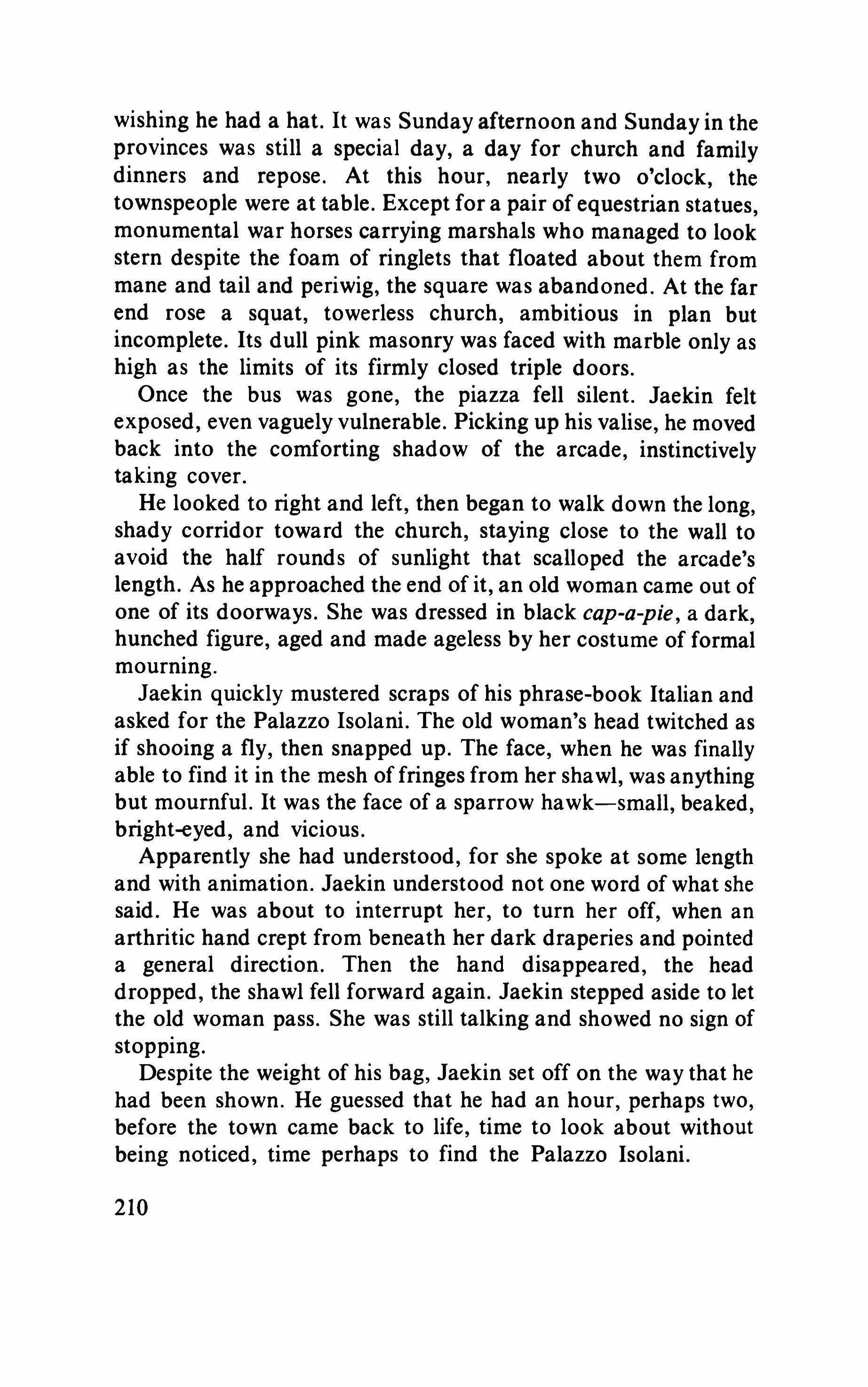
wishing he had a hat. It was Sunday afternoon and Sunday in the provinces was still a special day, a day for church and family dinners and repose. At this hour, nearly two o'clock, the townspeople were at table. Except for a pair of equestrian statues, monumental war horses carrying marshals who managed to look stern despite the foam of ringlets that floated about them from mane and tail and periwig, the square was abandoned. At the far end rose a squat, towerless church, ambitious in plan but incomplete. Its dull pink masonry was faced with marble only as high as the limits of its firmly closed triple doors.
Once the bus was gone, the piazza fell silent. Jaekin felt exposed, even vaguely vulnerable. Picking up his valise, he moved back into the comforting shadow of the arcade, instinctively taking cover.
He looked to right and left, then began to walk down the long, shady corridor toward the church, staying close to the wall to avoid the half rounds of sunlight that scalloped the arcade's length. As he approached the end of it, an old woman came out of one of its doorways. She was dressed in black cap-a-pie, a dark, hunched figure, aged and made ageless by her costume of formal mourning.
Jaekin quickly mustered scraps of his phrase-book Italian and asked for the Palazzo Isolani. The old woman's head twitched as if shooing a fly, then snapped up. The face, when he was finally able to find it in the mesh of fringes from her shawl, was anything but mournful. It was the face of a sparrow hawk-small, beaked, bright-eyed, and vicious.
Apparently she had understood, for she spoke at some length and with animation. Jaekin understood not one word of what she said. He was about to interrupt her, to turn her off, when an arthritic hand crept from beneath her dark draperies and pointed a general direction. Then the hand disappeared, the head dropped, the shawl fell forward again. Jaekin stepped aside to let the old woman pass. She was still talking and showed no sign of stopping.
Despite the weight of his bag, Jaekin set off on the way that he had been shown. He guessed that he had an hour, perhaps two, before the town came back to life, time to look about without being noticed, time perhaps to find the Palazzo Isolani.
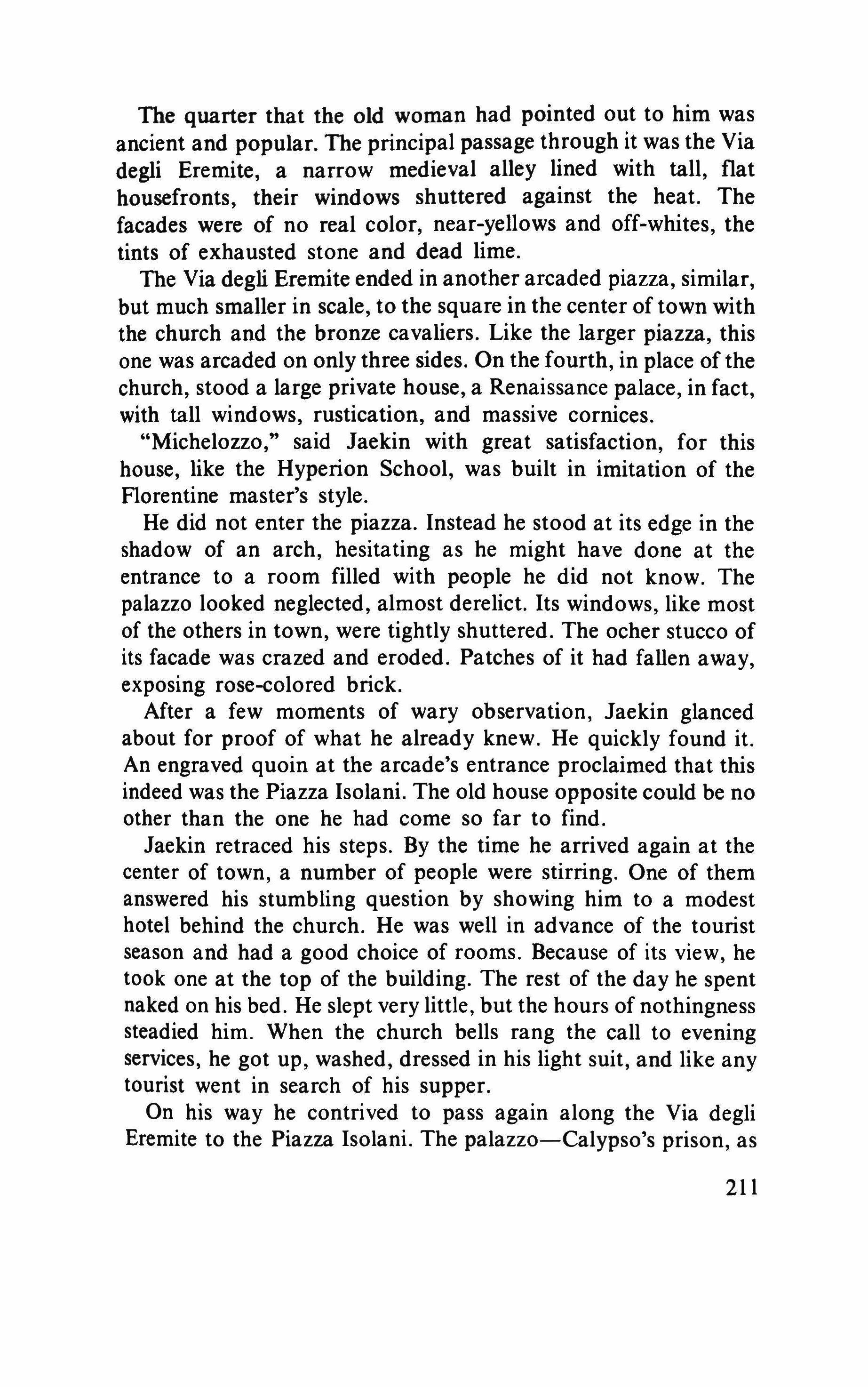
The quarter that the old woman had pointed out to him was ancient and popular. The principal passage through it was the Via degli Eremite, a narrow medieval alley lined with tall, flat housefronts, their windows shuttered against the heat. The facades were of no real color, near-yellows and off-whites, the tints of exhausted stone and dead lime.
The Via degli Eremite ended in another arcaded piazza, similar, but much smaller in scale, to the square in the center of town with the church and the bronze cavaliers. Like the larger piazza, this one was arcaded on only three sides. On the fourth, in place of the church, stood a large private house, a Renaissance palace, in fact, with tall windows, rustication, and massive cornices.
"Michelozzo," said Jaekin with great satisfaction, for this house, like the Hyperion School, was built in imitation of the Florentine master's style.
He did not enter the piazza. Instead he stood at its edge in the shadow of an arch, hesitating as he might have done at the entrance to a room filled with people he did not know. The palazzo looked neglected, almost derelict. Its windows, like most of the others in town, were tightly shuttered. The ocher stucco of its facade was crazed and eroded. Patches of it had fallen away, exposing rose-colored brick.
After a few moments of wary observation, Jaekin glanced about for proof of what he already knew. He quickly found it. An engraved quoin at the arcade's entrance proclaimed that this indeed was the Piazza Isolani. The old house opposite could be no other than the one he had come so far to find.
Jaekin retraced his steps. By the time he arrived again at the center of town, a number of people were stirring. One of them answered his stumbling question by showing him to a modest hotel behind the church. He was well in advance of the tourist season and had a good choice of rooms. Because of its view, he took one at the top of the building. The rest of the day he spent naked on his bed. He slept very little, but the hours of nothingness steadied him. When the church bells rang the call to evening services, he got up, washed, dressed in his light suit, and like any tourist went in search of his supper.
On his way he contrived to pass again along the Via degli Eremite to the Piazza Isolani. The palazzo-Calypso's prison, as
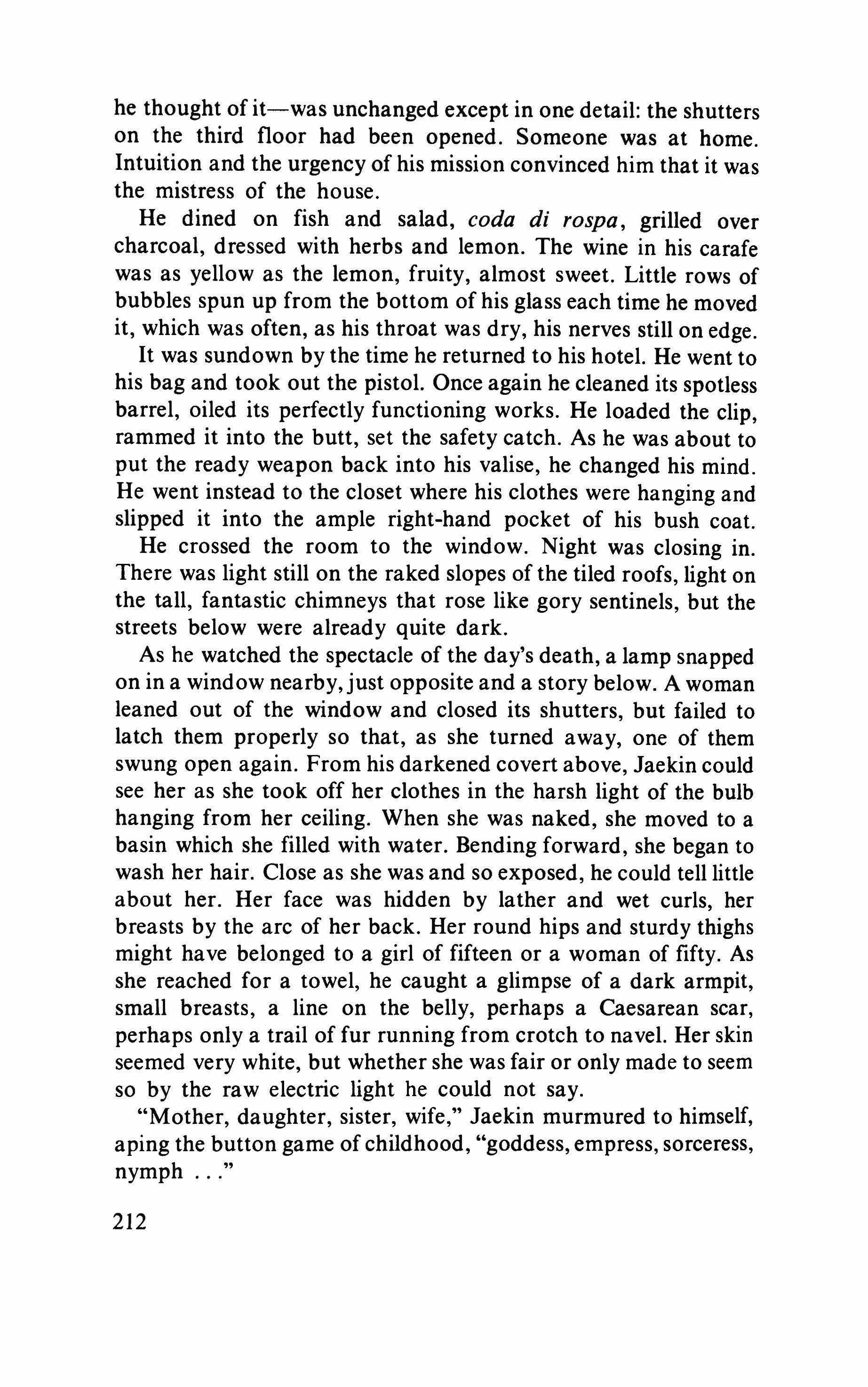
he thought of it-was unchanged except in one detail: the shutters on the third floor had been opened. Someone was at home. Intuition and the urgency of his mission convinced him that it was the mistress of the house.
He dined on fish and salad, coda di rospa, grilled over charcoal, dressed with herbs and lemon. The wine in his carafe was as yellow as the lemon, fruity, almost sweet. Little rows of bubbles spun up from the bottom of his glass each time he moved it, which was often, as his throat was dry, his nerves still on edge.
It was sundown by the time he returned to his hotel. He went to his bag and took out the pistol. Once again he cleaned its spotless barrel, oiled its perfectly functioning works. He loaded the clip, rammed it into the butt, set the safety catch. As he was about to put the ready weapon back into his valise, he changed his mind. He went instead to the closet where his clothes were hanging and slipped it into the ample right-hand pocket of his bush coat.
He crossed the room to the window. Night was closing in. There was light still on the raked slopes of the tiled roofs, light on the tall, fantastic chimneys that rose like gory sentinels, but the streets below were already quite dark.
As he watched the spectacle of the day's death, a lamp snapped on in a window nearby,just opposite and a story below. A woman leaned out of the window and closed its shutters, but failed to latch them properly so that, as she turned away, one of them swung open again. From his darkened covert above, Jaekin could see her as she took off her clothes in the harsh light of the bulb hanging from her ceiling. When she was naked, she moved to a basin which she filled with water. Bending forward, she began to wash her hair. Close as she was and so exposed, he could tell little about her. Her face was hidden by lather and wet curls, her breasts by the arc of her back. Her round hips and sturdy thighs might have belonged to a girl of fifteen or a woman of fifty. As she reached for a towel, he caught a glimpse of a dark armpit, small breasts, a line on the belly, perhaps a Caesarean scar, perhaps only a trail of fur running from crotch to navel. Her skin seemed very white, but whether she was fair or only made to seem so by the raw electric light he could not say.
"Mother, daughter, sister, wife," Jaekin murmured to himself, aping the button game of childhood, "goddess, empress, sorceress, nymph
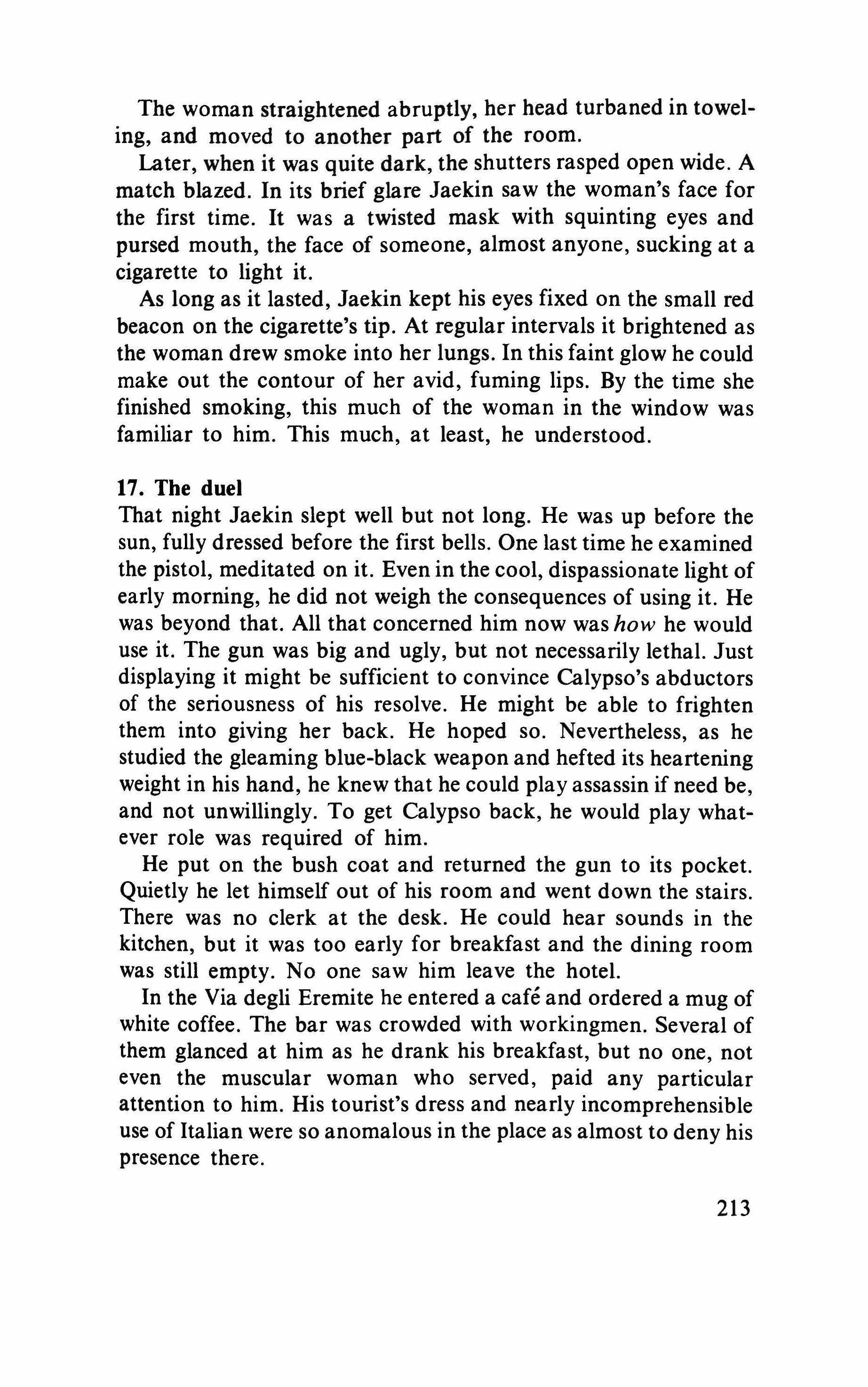
The woman straightened abruptly, her head turbaned in toweling, and moved to another part of the room.
Later, when it was quite dark, the shutters rasped open wide. A match blazed. In its brief glare Jaekin saw the woman's face for the first time. It was a twisted mask with squinting eyes and pursed mouth, the face of someone, almost anyone, sucking at a cigarette to light it.
As long as it lasted, Jaekin kept his eyes fixed on the small red beacon on the cigarette's tip. At regular intervals it brightened as the woman drew smoke into her lungs. In this faint glow he could make out the contour of her avid, fuming lips. By the time she finished smoking, this much of the woman in the window was familiar to him. This much, at least, he understood.
17. The duel
That night Jaekin slept well but not long. He was up before the sun, fully dressed before the first bells. One last time he examined the pistol, meditated on it. Even in the cool, dispassionate light of early morning, he did not weigh the consequences of using it. He was beyond that. All that concerned him now was how he would use it. The gun was big and ugly, but not necessarily lethal. Just displaying it might be sufficient to convince Calypso's abductors of the seriousness of his resolve. He might be able to frighten them into giving her back. He hoped so. Nevertheless, as he studied the gleaming blue-black weapon and hefted its heartening weight in his hand, he knew that he could play assassin if need be, and not unwillingly. To get Calypso back, he would play whatever role was required of him.
He put on the bush coat and returned the gun to its pocket. Quietly he let himself out of his room and went down the stairs. There was no clerk at the desk. He could hear sounds in the kitchen, but it was too early for breakfast and the dining room was still empty. No one saw him leave the hotel.
In the Via degli Eremite he entered a cafe and ordered a mug of white coffee. The bar was crowded with workingmen. Several of them glanced at him as he drank his breakfast, but no one, not even the muscular woman who served, paid any particular attention to him. His tourist's dress and nearly incomprehensible use of Italian were so anomalous in the place as almost to deny his presence there.
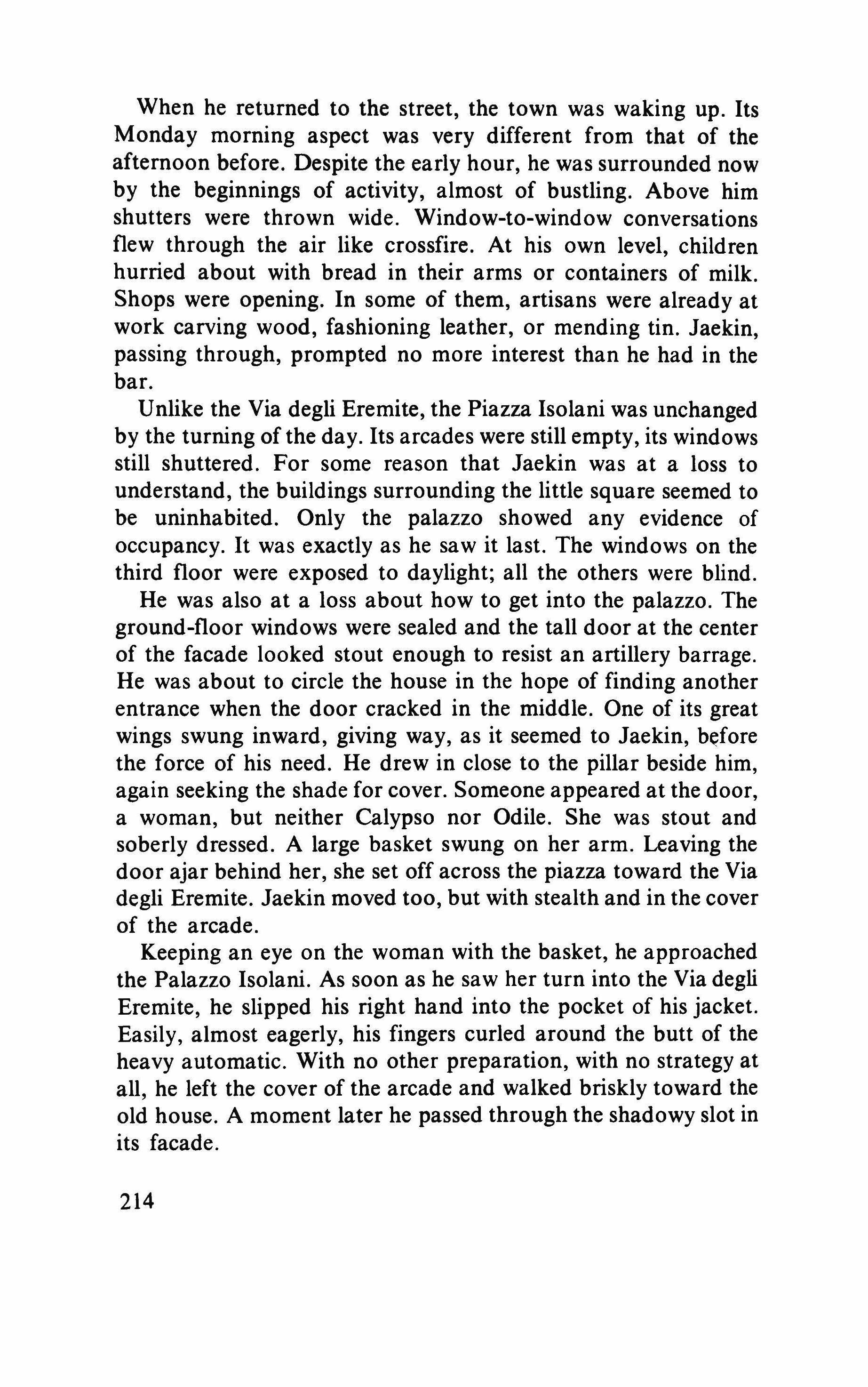
When he returned to the street, the town was waking up. Its Monday morning aspect was very different from that of the afternoon before. Despite the early hour, he was surrounded now by the beginnings of activity, almost of bustling. Above him shutters were thrown wide. Window-to-window conversations flew through the air like crossfire. At his own level, children hurried about with bread in their arms or containers of milk. Shops were opening. In some of them, artisans were already at work carving wood, fashioning leather, or mending tin. Jaekin, passing through, prompted no more interest than he had in the bar.
Unlike the Via degli Eremite, the Piazza Isolani was unchanged by the turning ofthe day. Its arcades were still empty, its windows still shuttered. For some reason that Jaekin was at a loss to understand, the buildings surrounding the little square seemed to be uninhabited. Only the palazzo showed any evidence of occupancy. It was exactly as he saw it last. The windows on the third floor were exposed to daylight; all the others were blind. He was also at a loss about how to get into the palazzo. The ground-floor windows were sealed and the tall door at the center of the facade looked stout enough to resist an artillery barrage. He was about to circle the house in the hope of finding another entrance when the door cracked in the middle. One of its great wings swung inward, giving way, as it seemed to Jaekin, before the force of his need. He drew in close to the pillar beside him, again seeking the shade for cover. Someone appeared at the door, a woman, but neither Calypso nor Odile. She was stout and soberly dressed. A large basket swung on her arm. Leaving the door ajar behind her, she set off across the piazza toward the Via degli Eremite. Jaekin moved too, but with stealth and in the cover of the arcade.
Keeping an eye on the woman with the basket, he approached the Palazzo Isolani. As soon as he saw her turn into the Via degli Eremite, he slipped his right hand into the pocket of his jacket. Easily, almost eagerly, his fingers curled around the butt of the heavy automatic. With no other preparation, with no strategy at all, he left the cover of the arcade and walked briskly toward the old house. A moment later he passed through the shadowy slot in its facade.
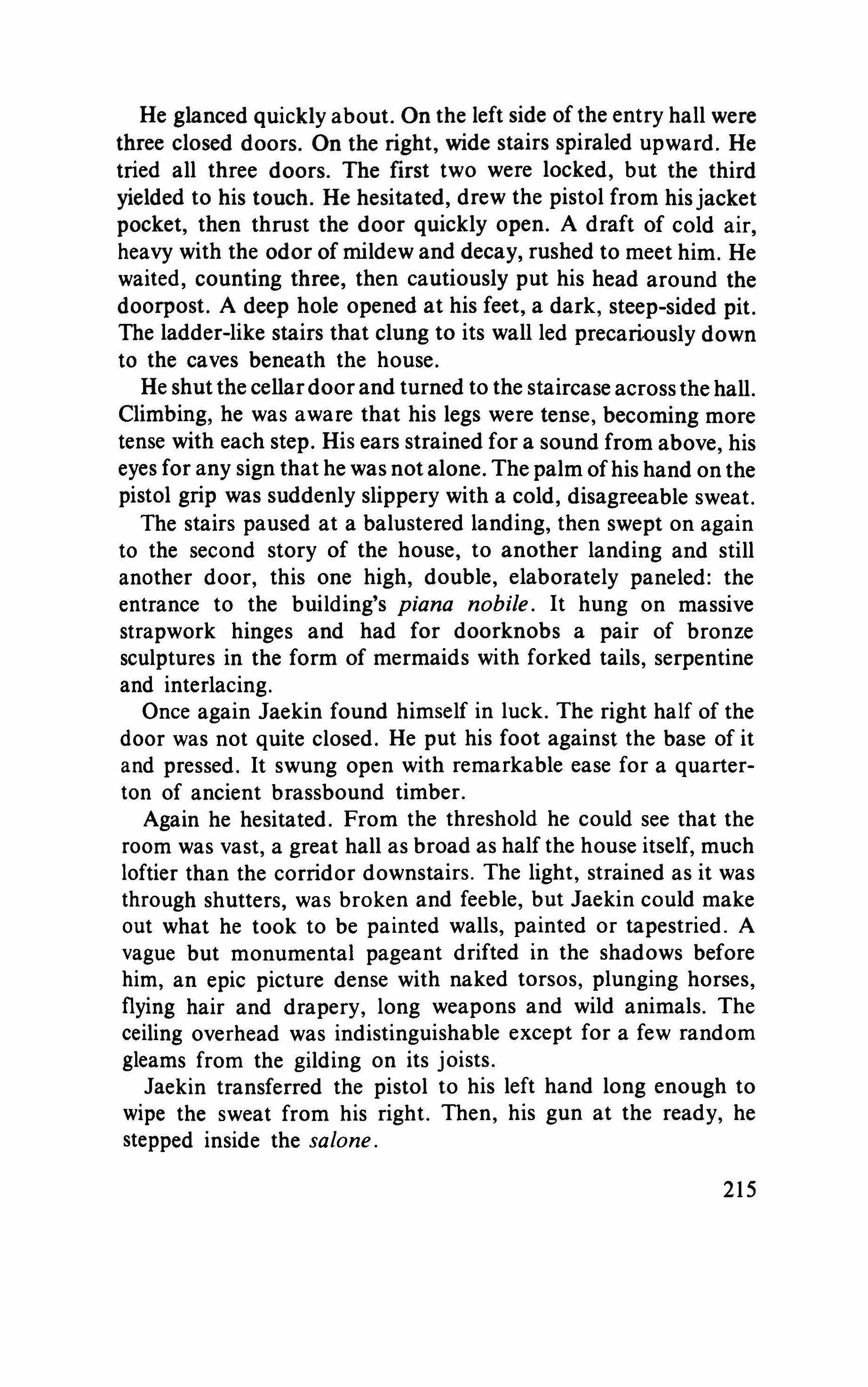
He glanced quickly about. On the left side of the entry hall were three closed doors. On the right, wide stairs spiraled upward. He tried all three doors. The first two were locked, but the third yielded to his touch. He hesitated, drew the pistol from hisjacket pocket, then thrust the door quickly open. A draft of cold air, heavy with the odor of mildew and decay, rushed to meet him. He waited, counting three, then cautiously put his head around the doorpost. A deep hole opened at his feet, a dark, steep-sided pit. The ladder-like stairs that clung to its wall led precariously down to the caves beneath the house.
He shut the cellar door and turned to the staircase across the hall. Climbing, he was aware that his legs were tense, becoming more tense with each step. His ears strained for a sound from above, his eyes for any sign that he was not alone. The palm ofhis hand on the pistol grip was suddenly slippery with a cold, disagreeable sweat.
The stairs paused at a balustered landing, then swept on again to the second story of the house, to another landing and still another door, this one high, double, elaborately paneled: the entrance to the building's piano nobile. It hung on massive strapwork hinges and had for doorknobs a pair of bronze sculptures in the form of mermaids with forked tails, serpentine and interlacing.
Once again Jaekin found himself in luck. The right half of the door was not quite closed. He put his foot against the base of it and pressed. It swung open with remarkable ease for a quarterton of ancient brassbound timber.
Again he hesitated. From the threshold he could see that the room was vast, a great hall as broad as half the house itself, much loftier than the corridor downstairs. The light, strained as it was through shutters, was broken and feeble, but Jaekin could make out what he took to be painted walls, painted or tapestried. A vague but monumental pageant drifted in the shadows before him, an epic picture dense with naked torsos, plunging horses, flying hair and drapery, long weapons and wild animals. The ceiling overhead was indistinguishable except for a few random gleams from the gilding on its joists.
Jaekin transferred the pistol to his left hand long enough to wipe the sweat from his right. Then, his gun at the ready, he stepped inside the salone.
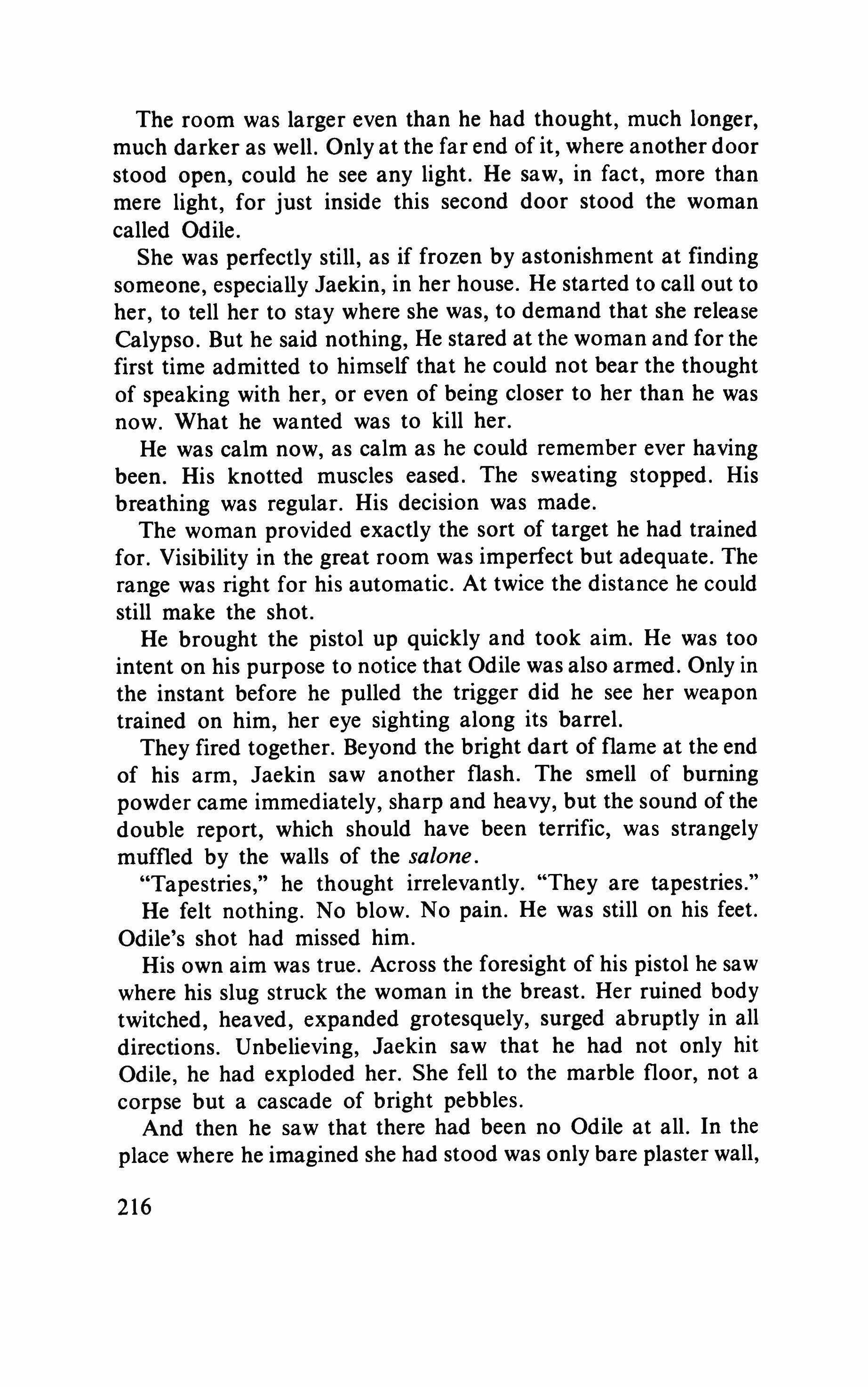
The room was larger even than he had thought, much longer, much darker as well. Only at the far end of it, where another door stood open, could he see any light. He saw, in fact, more than mere light, for just inside this second door stood the woman called Odile.
She was perfectly still, as if frozen by astonishment at finding someone, especially Jaekin, in her house. He started to call out to her, to tell her to stay where she was, to demand that she release Calypso. But he said nothing, He stared at the woman and for the first time admitted to himself that he could not bear the thought of speaking with her, or even of being closer to her than he was now. What he wanted was to kill her.
He was calm now, as calm as he could remember ever having been. His knotted muscles eased. The sweating stopped. His breathing was regular. His decision was made.
The woman provided exactly the sort of target he had trained for. Visibility in the great room was imperfect but adequate. The range was right for his automatic. At twice the distance he could still make the shot.
He brought the pistol up quickly and took aim. He was too intent on his purpose to notice that Odile was also armed. Only in the instant before he pulled the trigger did he see her weapon trained on him, her eye sighting along its barrel.
They fired together. Beyond the bright dart of flame at the end of his arm, Jaekin saw another flash. The smell of burning powder came immediately, sharp and heavy, but the sound of the double report, which should have been terrific, was strangely muffled by the walls of the salone.
"Tapestries," he thought irrelevantly. "They are tapestries."
He felt nothing. No blow. No pain. He was still on his feet. Odile's shot had missed him.
His own aim was true. Across the foresight of his pistol he saw where his slug struck the woman in the breast. Her ruined body twitched, heaved, expanded grotesquely, surged abruptly in all directions. Unbelieving, Jaekin saw that he had not only hit Odile, he had exploded her. She fell to the marble floor, not a corpse but a cascade of bright pebbles.
And then he saw that there had been no Odile at all. In the place where he imagined she had stood was only bare plaster wall, 216
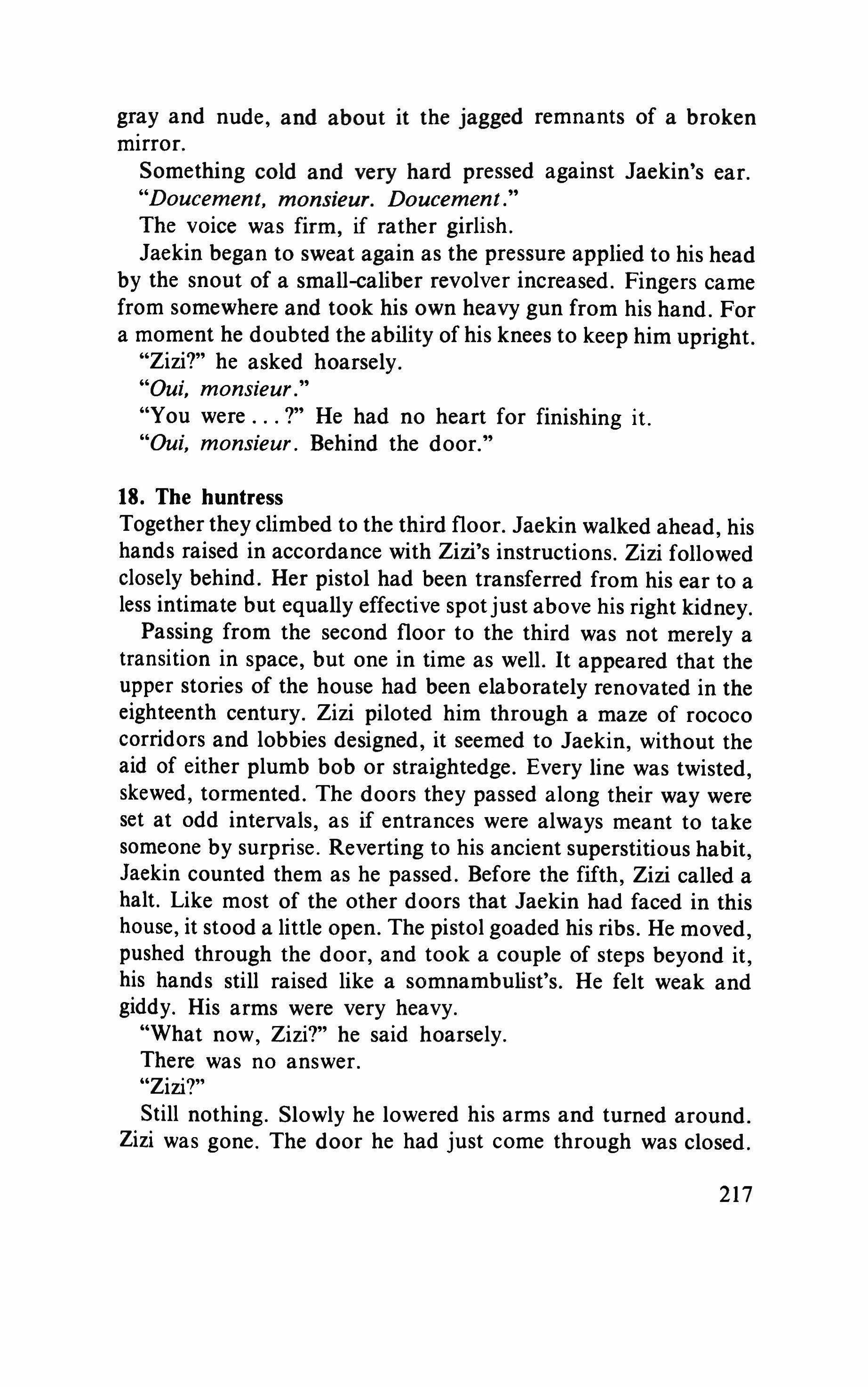
gray and nude, and about it the jagged remnants of a broken mirror.
Something cold and very hard pressed against Jaekin's ear. "Doucement, monsieur. Doucement."
The voice was firm, if rather girlish.
Jaekin began to sweat again as the pressure applied to his head by the snout of a small-caliber revolver increased. Fingers came from somewhere and took his own heavy gun from his hand. For a moment he doubted the ability of his knees to keep him upright. "Zizi?" he asked hoarsely.
"Oui, monsieur."
"You were ?" He had no heart for finishing it.
"Oui, monsieur. Behind the door."
18. The huntress
Together they climbed to the third floor. Jaekin walked ahead, his hands raised in accordance with Zizi's instructions. Zizi followed closely behind. Her pistol had been transferred from his ear to a less intimate but equally effective spotjust above his right kidney.
Passing from the second floor to the third was not merely a transition in space, but one in time as well. It appeared that the upper stories of the house had been elaborately renovated in the eighteenth century. Zizi piloted him through a maze of rococo corridors and lobbies designed, it seemed to Jaekin, without the aid of either plumb bob or straightedge. Every line was twisted, skewed, tormented. The doors they passed along their way were set at odd intervals, as if entrances were always meant to take someone by surprise. Reverting to his ancient superstitious habit, Jaekin counted them as he passed. Before the fifth, Zizi called a halt. Like most of the other doors that Jaekin had faced in this house, it stood a little open. The pistol goaded his ribs. He moved, pushed through the door, and took a couple of steps beyond it, his hands still raised like a somnambulist's. He felt weak and giddy. His arms were very heavy.
"What now, Zizi?" he said hoarsely.
There was no answer.
"Zizi?"
Still nothing. Slowly he lowered his arms and turned around. Zizi was gone. The door he had just come through was closed. 217
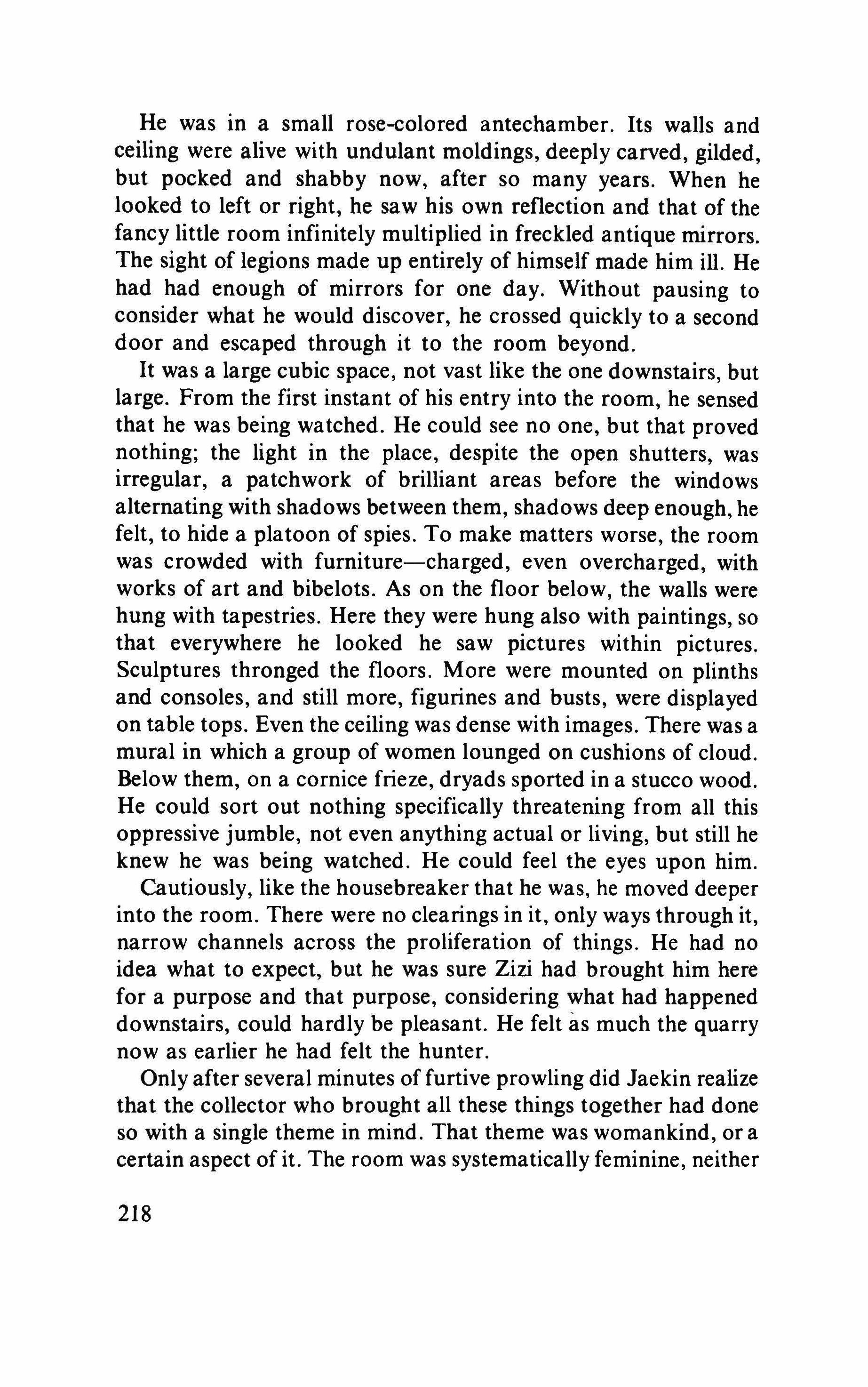
He was in a small rose-colored antechamber. Its walls and ceiling were alive with undulant moldings, deeply carved, gilded, but pocked and shabby now, after so many years. When he looked to left or right, he saw his own reflection and that of the fancy little room infinitely multiplied in freckled antique mirrors. The sight of legions made up entirely of himself made him ill. He had had enough of mirrors for one day. Without pausing to consider what he would discover, he crossed quickly to a second door and escaped through it to the room beyond.
It was a large cubic space, not vast like the one downstairs, but large. From the first instant of his entry into the room, he sensed that he was being watched. He could see no one, but that proved nothing; the light in the place, despite the open shutters, was irregular, a patchwork of brilliant areas before the windows alternating with shadows between them, shadows deep enough, he felt, to hide a platoon of spies. To make matters worse, the room was crowded with furniture-charged, even overcharged, with works of art and bibelots. As on the floor below, the walls were hung with tapestries. Here they were hung also with paintings, so that everywhere he looked he saw pictures within pictures. Sculptures thronged the floors. More were mounted on plinths and consoles, and still more, figurines and busts, were displayed on table tops. Even the ceiling was dense with images. There was a mural in which a group of women lounged on cushions of cloud. Below them, on a cornice frieze, dryads sported in a stucco wood. He could sort out nothing specifically threatening from all this oppressive jumble, not even anything actual or living, but still he knew he was being watched. He could feel the eyes upon him.
Cautiously, like the housebreaker that he was, he moved deeper into the room. There were no clearings in it, only ways through it, narrow channels across the proliferation of things. He had no idea what to expect, but he was sure Zizi had brought him here for a purpose and that purpose, considering what had happened downstairs, could hardly be pleasant. He felt as much the quarry now as earlier he had felt the hunter.
Only after several minutes of furtive prowling did Jaekin realize that the collector who brought all these things together had done so with a single theme in mind. That theme was womankind, or a certain aspect of it. The room was systematically feminine, neither
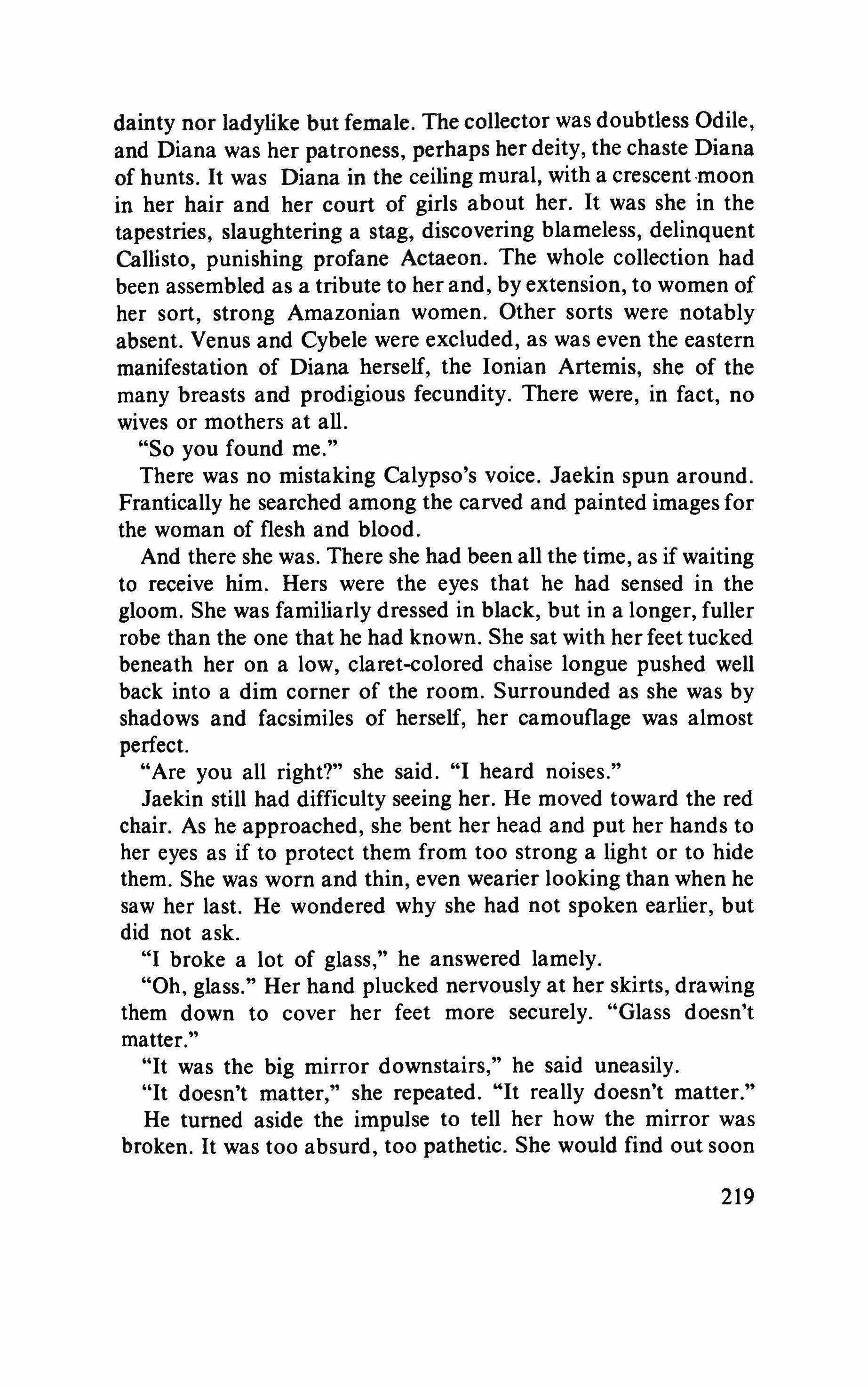
dainty nor ladylike but female. The collector was doubtless Odile, and Diana was her patroness, perhaps her deity, the chaste Diana of hunts. It was Diana in the ceiling mural, with a crescent ·moon in her hair and her court of girls about her. It was she in the tapestries, slaughtering a stag, discovering blameless, delinquent Callisto, punishing profane Actaeon. The whole collection had been assembled as a tribute to her and, by extension, to women of her sort, strong Amazonian women. Other sorts were notably absent. Venus and Cybele were excluded, as was even the eastern manifestation of Diana herself, the Ionian Artemis, she of the many breasts and prodigious fecundity. There were, in fact, no wives or mothers at all.
"So you found me."
There was no mistaking Calypso's voice. Jaekin spun around. Frantically he searched among the carved and painted images for the woman of flesh and blood.
And there she was. There she had been all the time, as if waiting to receive him. Hers were the eyes that he had sensed in the gloom. She was familiarly dressed in black, but in a longer, fuller robe than the one that he had known. She sat with her feet tucked beneath her on a low, claret-colored chaise longue pushed well back into a dim corner of the room. Surrounded as she was by shadows and facsimiles of herself, her camouflage was almost perfect.
"Are you all right?" she said. "I heard noises."
Jaekin still had difficulty seeing her. He moved toward the red chair. As he approached, she bent her head and put her hands to her eyes as if to protect them from too strong a light or to hide them. She was worn and thin, even wearier looking than when he saw her last. He wondered why she had not spoken earlier, but did not ask.
"I broke a lot of glass," he answered lamely. "Oh, glass." Her hand plucked nervously at her skirts, drawing them down to cover her feet more securely. "Glass doesn't matter."
"It was the big mirror downstairs," he said uneasily. "It doesn't matter," she repeated. "It really doesn't matter." He turned aside the impulse to tell her how the mirror was broken. It was too absurd, too pathetic. She would find out soon
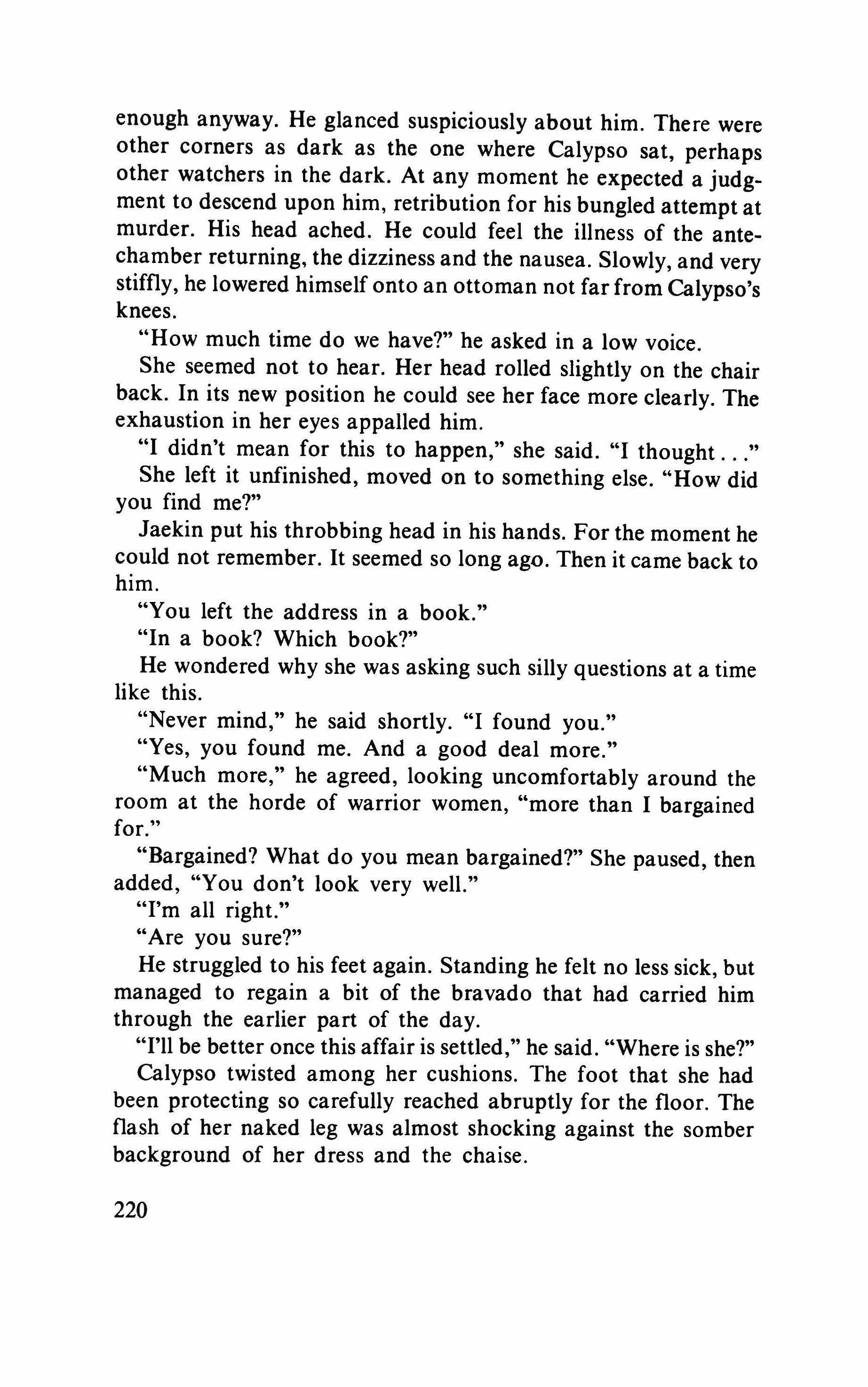
enough anyway. He glanced suspiciously about him. There were other corners as dark as the one where Calypso sat, perhaps other watchers in the dark. At any moment he expected a judgment to descend upon him, retribution for his bungled attempt at murder. His head ached. He could feel the illness of the antechamber returning, the dizziness and the nausea. Slowly, and very stiffly, he lowered himself onto an ottoman not far from Calypso's knees.
"How much time do we have?" he asked in a low voice.
She seemed not to hear. Her head rolled slightly on the chair back. In its new position he could see her face more clearly. The exhaustion in her eyes appalled him.
"I didn't mean for this to happen," she said. "I thought She left it unfinished, moved on to something else. "How did you find me?"
Jaekin put his throbbing head in his hands. For the moment he could not remember. It seemed so long ago. Then it came back to him.
"You left the address in a book."
"In a book? Which book?"
He wondered why she was asking such silly questions at a time like this.
"Never mind," he said shortly. "I found you."
"Yes, you found me. And a good deal more."
"Much more," he agreed, looking uncomfortably around the room at the horde of warrior women, "more than I bargained for."
"Bargained? What do you mean bargained?" She paused, then added, "You don't look very well."
"I'm all right."
"Are you sure?"
He struggled to his feet again. Standing he felt no less sick, but managed to regain a bit of the bravado that had carried him through the earlier part of the day.
"I'll be better once this affair is settled," he said. "Where is she?"
Calypso twisted among her cushions. The foot that she had been protecting so carefully reached abruptly for the floor. The flash of her naked leg was almost shocking against the somber background of her dress and the chaise. 220
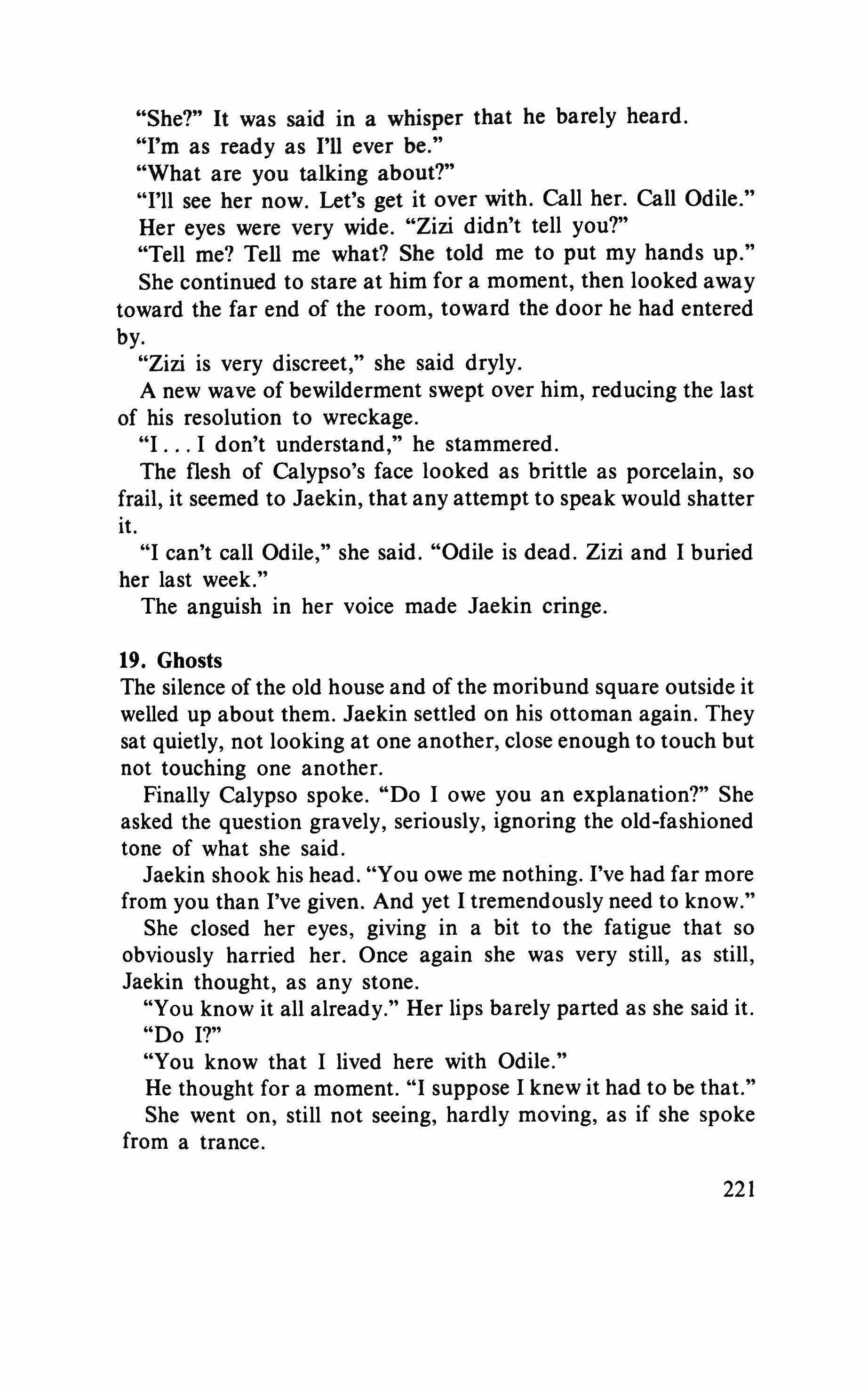
"She?" It was said in a whisper that he barely heard.
"I'm as ready as I'll ever be."
"What are you talking about?"
"I'll see her now. Let's get it over with. Call her. Call Odile." Her eyes were very wide. "Zizi didn't tell you?"
"Tell me? Tell me what? She told me to put my hands up."
She continued to stare at him for a moment, then looked away toward the far end of the room, toward the door he had entered by.
"Zizi is very discreet," she said dryly.
A new wave of bewilderment swept over him, reducing the last of his resolution to wreckage.
"I 1 don't understand," he stammered.
The flesh of Calypso's face looked as brittle as porcelain, so frail, it seemed to Jaekin, that any attempt to speak would shatter it.
"I can't call Odile," she said. "Odile is dead. Zizi and 1 buried her last week."
The anguish in her voice made Jaekin cringe.
The silence of the old house and of the moribund square outside it welled up about them. Jaekin settled on his ottoman again. They sat quietly, not looking at one another, close enough to touch but not touching one another.
Finally Calypso spoke. "Do lowe you an explanation?" She asked the question gravely, seriously, ignoring the old-fashioned tone of what she said.
Jaekin shook his head. "You owe me nothing. I've had far more from you than I've given. And yet 1 tremendously need to know."
She closed her eyes, giving in a bit to the fatigue that so obviously harried her. Once again she was very still, as still, Jaekin thought, as any stone.
"You know it all already." Her lips barely parted as she said it.
"Do I?"
"You know that 1 lived here with Odile."
He thought for a moment. "I suppose 1 knew it had to be that."
She went on, still not seeing, hardly moving, as if she spoke from a trance. 221
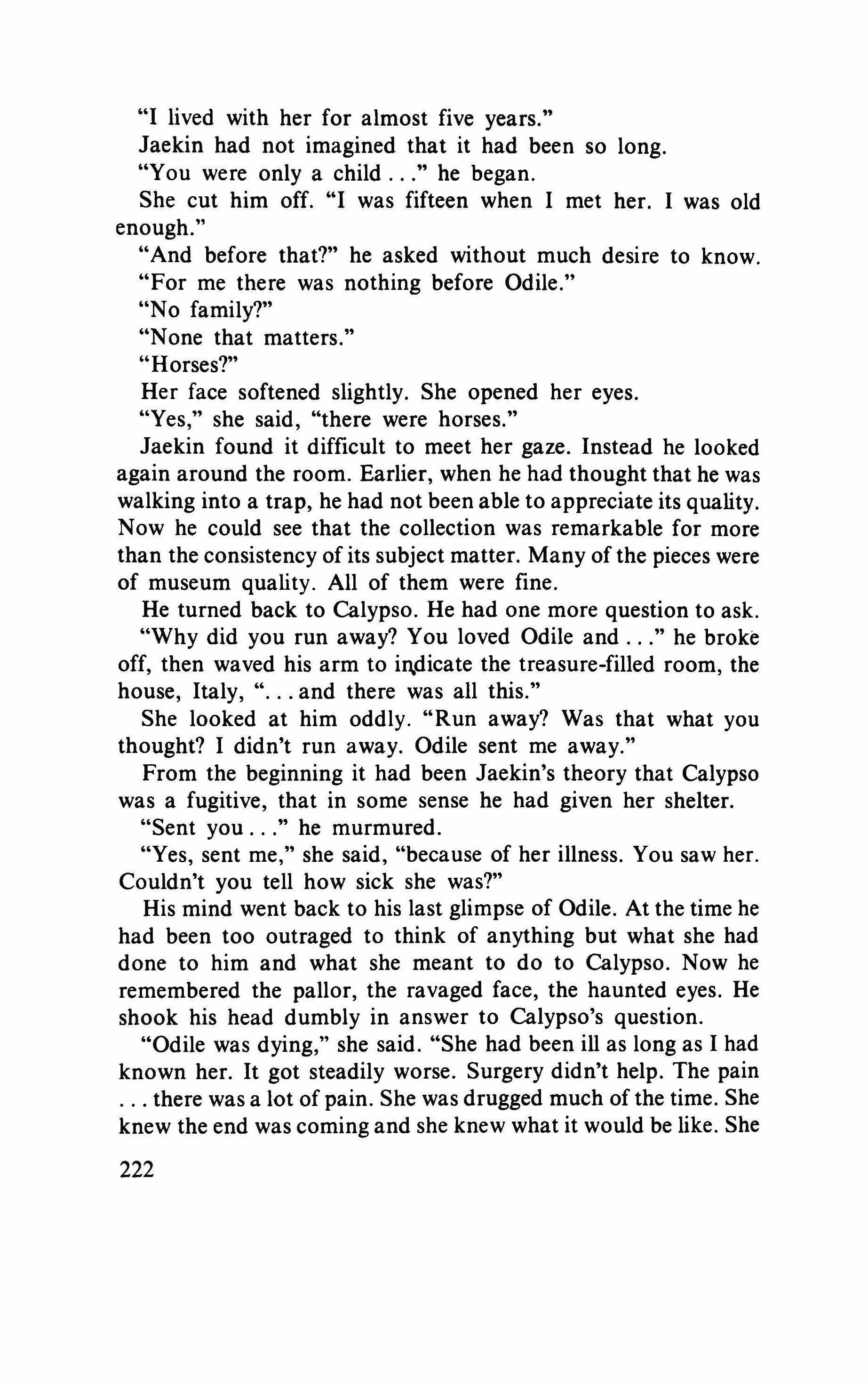
"I lived with her for almost five years."
Jaekin had not imagined that it had been so long.
"You were only a child he began.
She cut him off. "I was fifteen when I met her. I was old enough."
"And before that?" he asked without much desire to know. "For me there was nothing before Odile."
"N0 family?"
"None that matters."
"Horses?"
Her face softened slightly. She opened her eyes. "Yes," she said, "there were horses."
Jaekin found it difficult to meet her gaze. Instead he looked again around the room. Earlier, when he had thought that he was walking into a trap, he had not been able to appreciate its quality. Now he could see that the collection was remarkable for more than the consistency of its subject matter. Many of the pieces were of museum quality. All of them were fine.
He turned back to Calypso. He had one more question to ask.
"Why did you run away? You loved Odile and " he broke off, then waved his arm to indicate the treasure-filled room, the house, Italy, and there was all this."
She looked at him oddly. "Run away? Was that what you thought? I didn't run away. Odile sent me away."
From the beginning it had been Jaekin's theory that Calypso was a fugitive, that in some sense he had given her shelter.
"Sent you he murmured.
"Yes, sent me," she said, "because of her illness. You saw her. Couldn't you tell how sick she was?"
His mind went back to his last glimpse of Odile. At the time he had been too outraged to think of anything but what she had done to him and what she meant to do to Calypso. Now he remembered the pallor, the ravaged face, the haunted eyes. He shook his head dumbly in answer to Calypso's question.
"Odile was dying," she said. "She had been ill as long as I had known her. It got steadily worse. Surgery didn't help. The pain there was a lot of pain. She was drugged much of the time. She knew the end was coming and she knew what it would be like. She
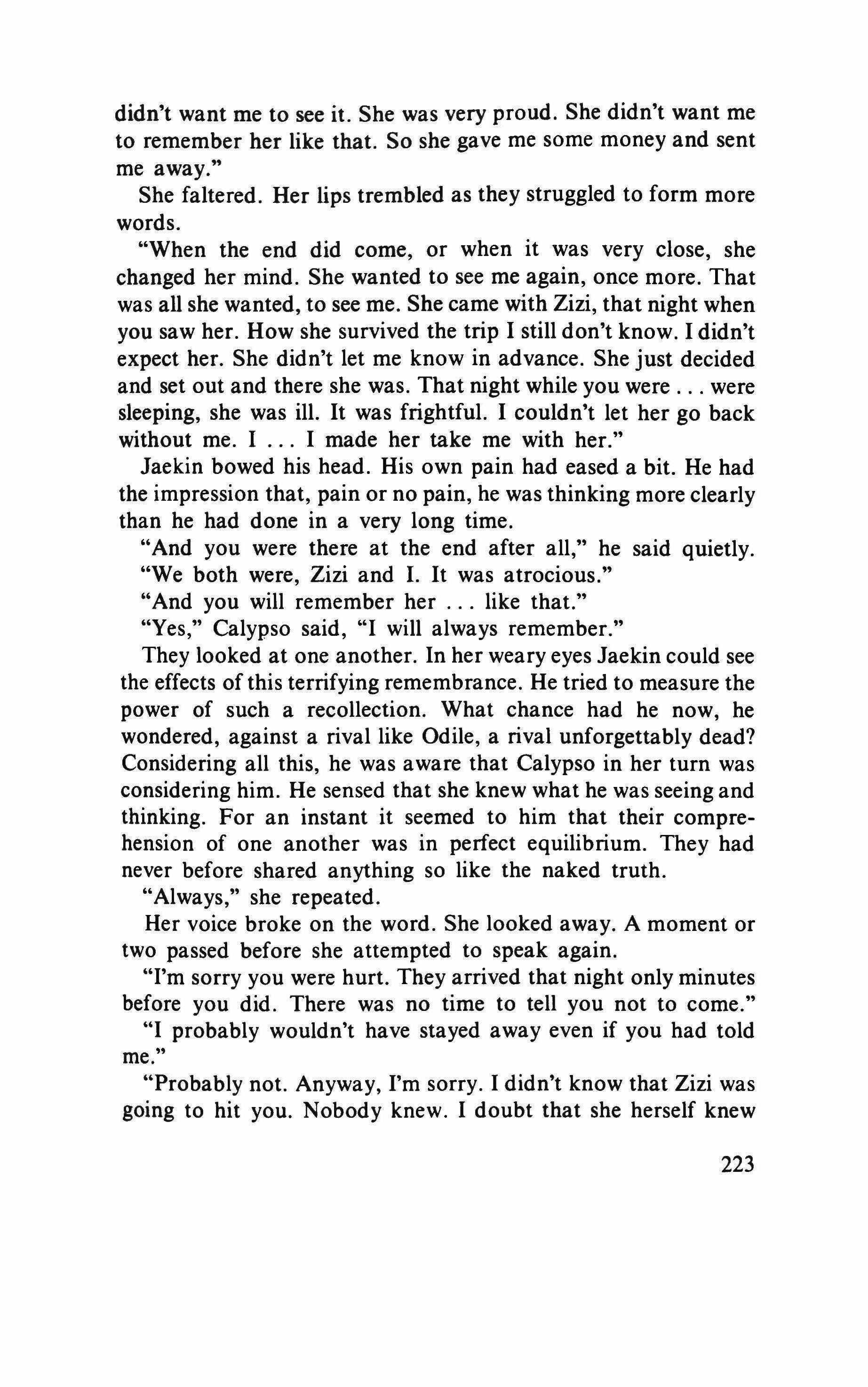
didn't want me to see it. She was very proud. She didn't want me to remember her like that. So she gave me some money and sent me away."
She faltered. Her lips trembled as they struggled to form more words.
"When the end did come, or when it was very close, she changed her mind. She wanted to see me again, once more. That was all she wanted, to see me. She came with Zizi, that night when you saw her. How she survived the trip I still don't know. I didn't expect her. She didn't let me know in advance. She just decided and set out and there she was. That night while you were were sleeping, she was ill. It was frightful. I couldn't let her go back without me. I I made her take me with her."
Jaekin bowed his head. His own pain had eased a bit. He had the impression that, pain or no pain, he was thinking more clearly than he had done in a very long time.
"And you were there at the end after all," he said quietly.
"We both were, Zizi and I. It was atrocious."
"And you will remember her like that."
"Yes," Calypso said, "I will always remember."
They looked at one another. In her weary eyes Jaekin could see the effects of this terrifying remembrance. He tried to measure the power of such a recollection. What chance had he now, he wondered, against a rival like Odile, a rival unforgettably dead? Considering all this, he was aware that Calypso in her turn was considering him. He sensed that she knew what he was seeing and thinking. For an instant it seemed to him that their comprehension of one another was in perfect equilibrium. They had never before shared anything so like the naked truth.
"Always," she repeated.
Her voice broke on the word. She looked away. A moment or two passed before she attempted to speak again.
"I'm sorry you were hurt. They arrived that night only minutes before you did. There was no time to tell you not to come."
"I probably wouldn't have stayed away even if you had told me."
"Probably not. Anyway, I'm sorry. 1 didn't know that Zizi was going to hit you. Nobody knew. 1 doubt that she herself knew
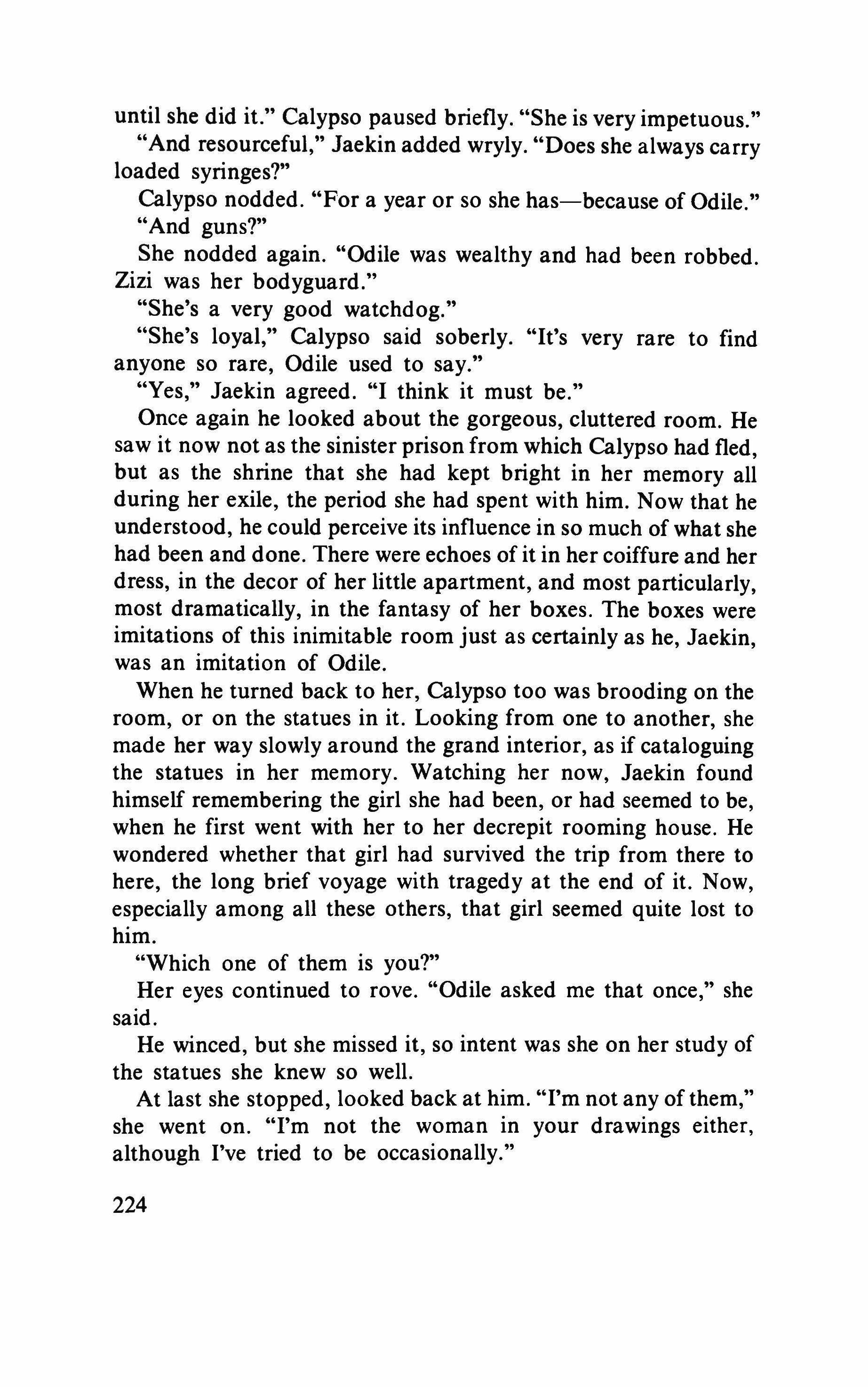
until she did it." Calypso paused briefly. "She is very impetuous."
"And resourceful," Jaekin added wryly. "Does she always carry loaded syringes?"
Calypso nodded. "For a year or so she has-because of Odile."
"And guns?"
She nodded again. "Odile was wealthy and had been robbed. Zizi was her bodyguard."
"She's a very good watchdog."
"She's loyal," Calypso said soberly. "It's very rare to find anyone so rare, Odile used to say."
"Yes," Jaekin agreed. "I think it must be."
Once again he looked about the gorgeous, cluttered room. He saw it now not as the sinister prison from which Calypso had fled, but as the shrine that she had kept bright in her memory all during her exile, the period she had spent with him. Now that he understood, he could perceive its influence in so much of what she had been and done. There were echoes of it in her coiffure and her dress, in the decor of her little apartment, and most particularly, most dramatically, in the fantasy of her boxes. The boxes were imitations of this inimitable room just as certainly as he, Jaekin, was an imitation of Odile.
When he turned back to her, Calypso too was brooding on the room, or on the statues in it. Looking from one to another, she made her way slowly around the grand interior, as if cataloguing the statues in her memory. Watching her now, Jaekin found himself remembering the girl she had been, or had seemed to be, when he first went with her to her decrepit rooming house. He wondered whether that girl had survived the trip from there to here, the long brief voyage with tragedy at the end of it. Now, especially among all these others, that girl seemed quite lost to him.
"Which one of them is you?"
Her eyes continued to rove. "Odile asked me that once," she said.
He winced, but she missed it, so intent was she on her study of the statues she knew so well.
At last she stopped, looked back at him. "I'm not any of them," she went on. "I'm not the woman in your drawings either, although I've tried to be occasionally." 224
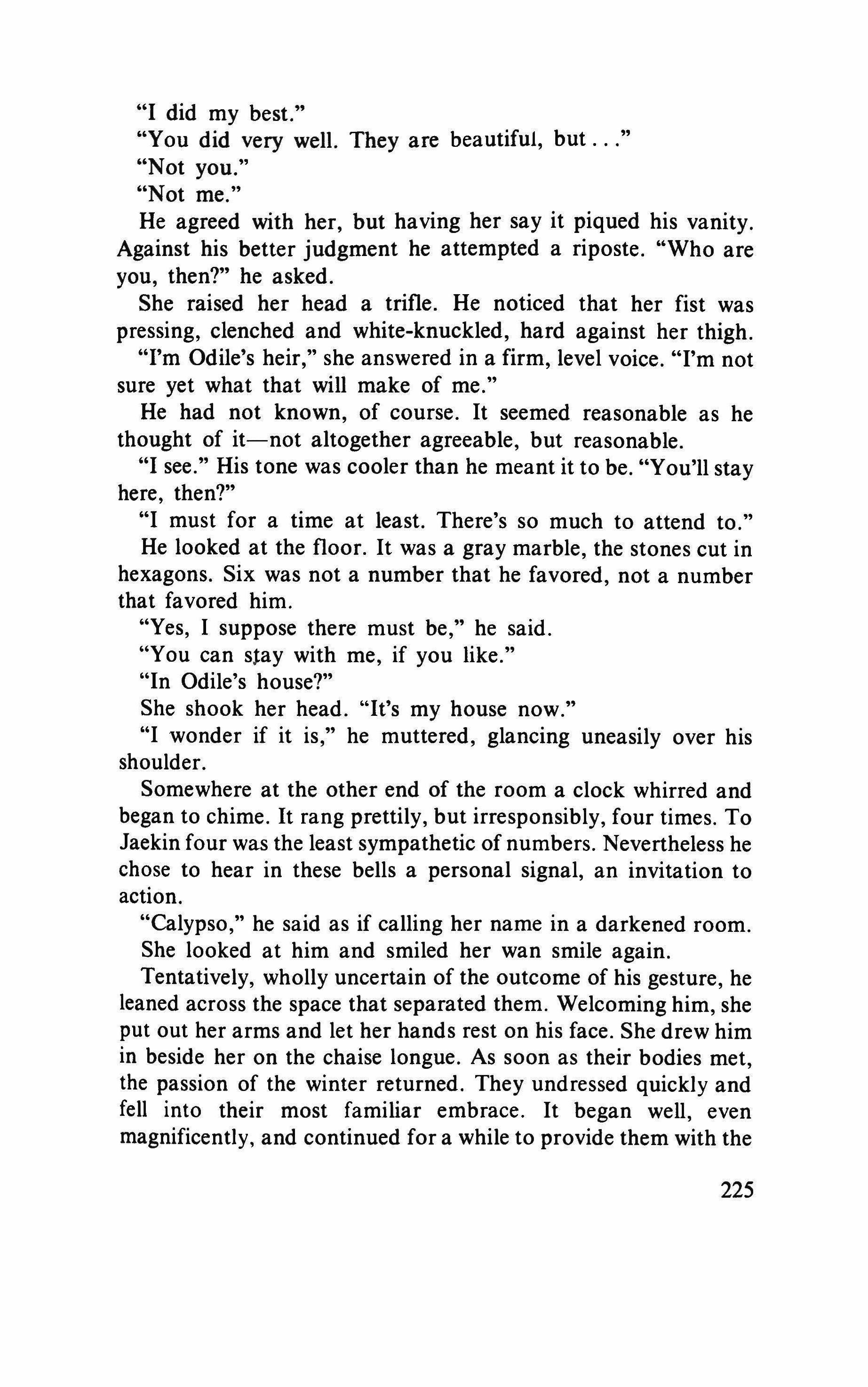
"I did my best."
"You did very well. They are beautiful, but "Not you."
"Not me."
He agreed with her, but having her say it piqued his vanity. Against his better judgment he attempted a riposte. "Who are you, then?" he asked.
She raised her head a trifle. He noticed that her fist was pressing, clenched and white-knuckled, hard against her thigh.
"I'm Odile's heir," she answered in a firm, level voice. "I'm not sure yet what that will make of me."
He had not known, of course. It seemed reasonable as he thought of it-not altogether agreeable, but reasonable.
"I see." His tone was cooler than he meant it to be. "You'll stay here, then?"
"I must for a time at least. There's so much to attend to."
He looked at the floor. It was a gray marble, the stones cut in hexagons. Six was not a number that he favored, not a number that favored him.
"Yes, I suppose there must be," he said.
"You can stay with me, if you like."
"In Odile's house?"
She shook her head. "It's my house now."
"I wonder if it is," he muttered, glancing uneasily over his shoulder.
Somewhere at the other end of the room a clock whirred and began to chime. It rang prettily, but irresponsibly, four times. To Jaekin four was the least sympathetic of numbers. Nevertheless he chose to hear in these bells a personal signal, an invitation to action.
"Calypso," he said as if calling her name in a darkened room. She looked at him and smiled her wan smile again.
Tentatively, wholly uncertain of the outcome of his gesture, he leaned across the space that separated them. Welcoming him, she put out her arms and let her hands rest on his face. She drew him in beside her on the chaise longue. As soon as their bodies met, the passion of the winter returned. They undressed quickly and fell into their most familiar embrace. It began well, even magnificently, and continued for a while to provide them with the
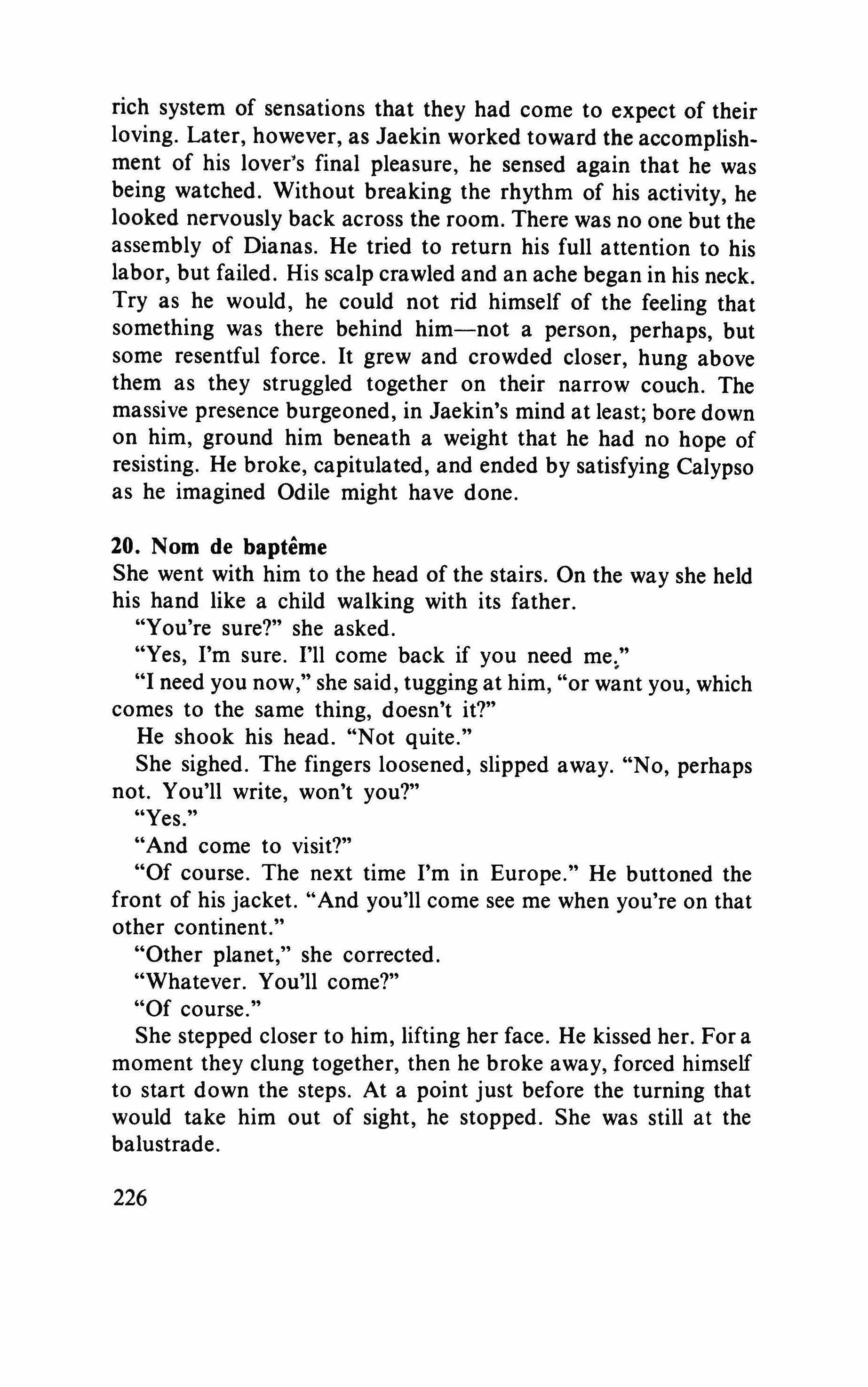
rich system of sensations that they had come to expect of their loving. Later, however, as Jaekin worked toward the accomplishment of his lover's final pleasure, he sensed again that he was being watched. Without breaking the rhythm of his activity, he looked nervously back across the room. There was no one but the assembly of Dianas. He tried to return his full attention to his labor, but failed. His scalp crawled and an ache began in his neck. Try as he WOUld, he could not rid himself of the feeling that something was there behind him-not a person, perhaps, but some resentful force. It grew and crowded closer, hung above them as they struggled together on their narrow couch. The massive presence burgeoned, in Jaekin's mind at least; bore down on him, ground him beneath a weight that he had no hope of resisting. He broke, capitulated, and ended by satisfying Calypso as he imagined Odile might have done.
20. Nom de bapteme
She went with him to the head of the stairs. On the way she held his hand like a child walking with its father.
"You're sure?" she asked.
"Yes, I'm sure. I'll come back if you need me,"
"I need you now," she said, tugging at him, "or want you, which comes to the same thing, doesn't it?"
He shook his head. "Not quite."
She sighed. The fingers loosened, slipped away. "No, perhaps not. You'll write, won't you?"
"Yes."
"And come to visit?"
"Of course. The next time I'm in Europe." He buttoned the front of his jacket. "And you'll come see me when you're on that other continent."
"Other planet," she corrected.
"Whatever. You'll come?"
"Of course."
She stepped closer to him, lifting her face. He kissed her. For a moment they clung together, then he broke away, forced himself to start down the steps. At a point just before the turning that would take him out of sight, he stopped. She was still at the balustrade.
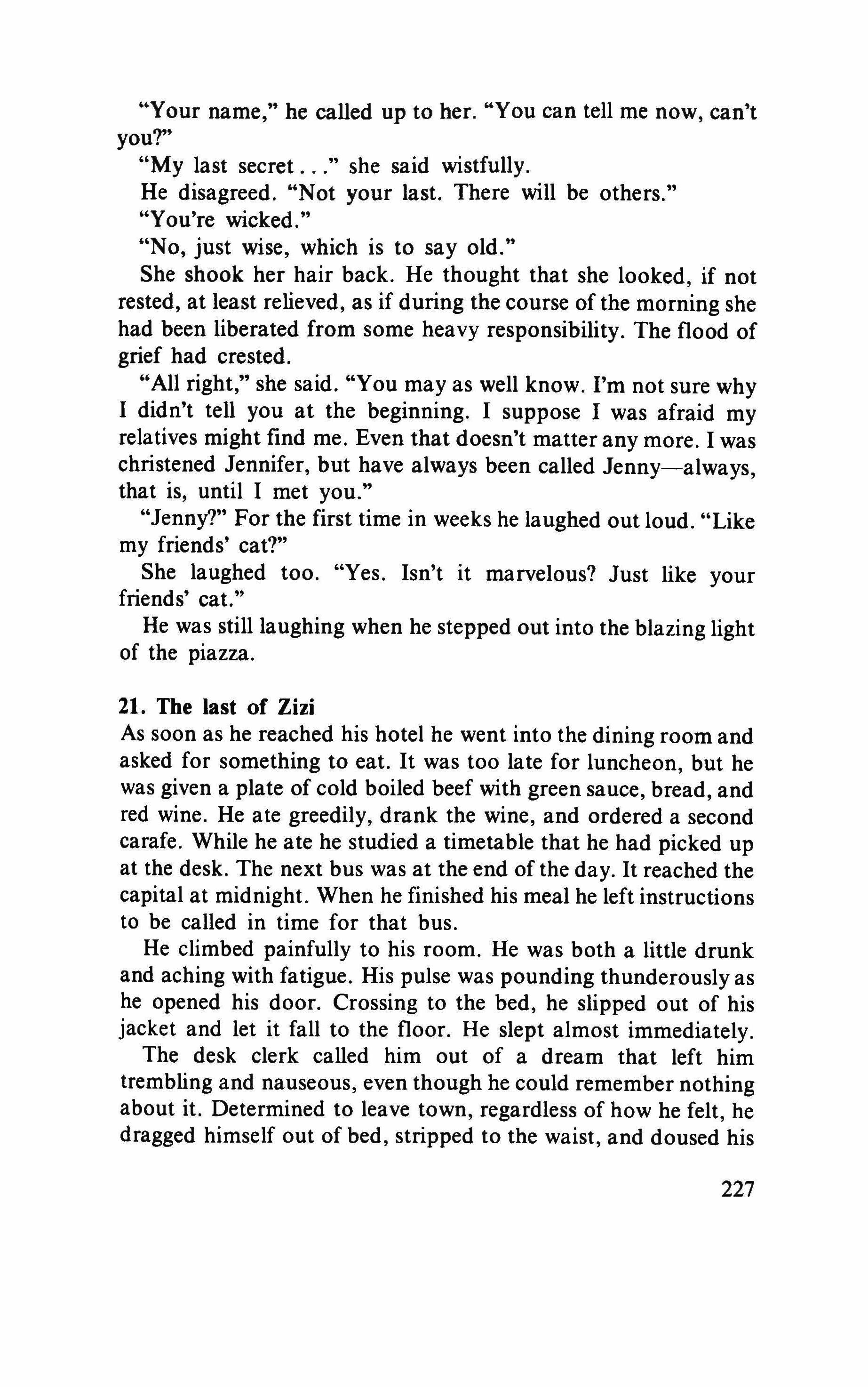
"Your name," he called up to her. "You can tell me now, can't you?"
"My last secret she said wistfully. He disagreed. "Not your last. There will be others."
"You're wicked."
"No, just wise, which is to say old."
She shook her hair back. He thought that she looked, if not rested, at least relieved, as if during the course of the morning she had been liberated from some heavy responsibility. The flood of grief had crested.
"All right," she said. "You may as well know. I'm not sure why I didn't tell you at the beginning. I suppose I was afraid my relatives might find me. Even that doesn't matter any more. I was christened Jennifer, but have always been called Jenny-always, that is, until I met you."
"Jenny?" For the first time in weeks he laughed out loud. "Like my friends' cat?"
She laughed too. "Yes. Isn't it marvelous? Just like your friends' cat."
He was still laughing when he stepped out into the blazing light of the piazza.
21. The last of Zizi
As soon as he reached his hotel he went into the dining room and asked for something to eat. It was too late for luncheon, but he was given a plate of cold boiled beef with green sauce, bread, and red wine. He ate greedily, drank the wine, and ordered a second carafe. While he ate he studied a timetable that he had picked up at the desk. The next bus was at the end of the day. It reached the capital at midnight. When he finished his meal he left instructions to be called in time for that bus.
He climbed painfully to his room. He was both a little drunk and aching with fatigue. His pulse was pounding thunderously as he opened his door. Crossing to the bed, he slipped out of his jacket and let it fall to the floor. He slept almost immediately.
The desk clerk called him out of a dream that left him trembling and nauseous, even though he could remember nothing about it. Determined to leave town, regardless of how he felt, he dragged himself out of bed, stripped to the waist, and doused his
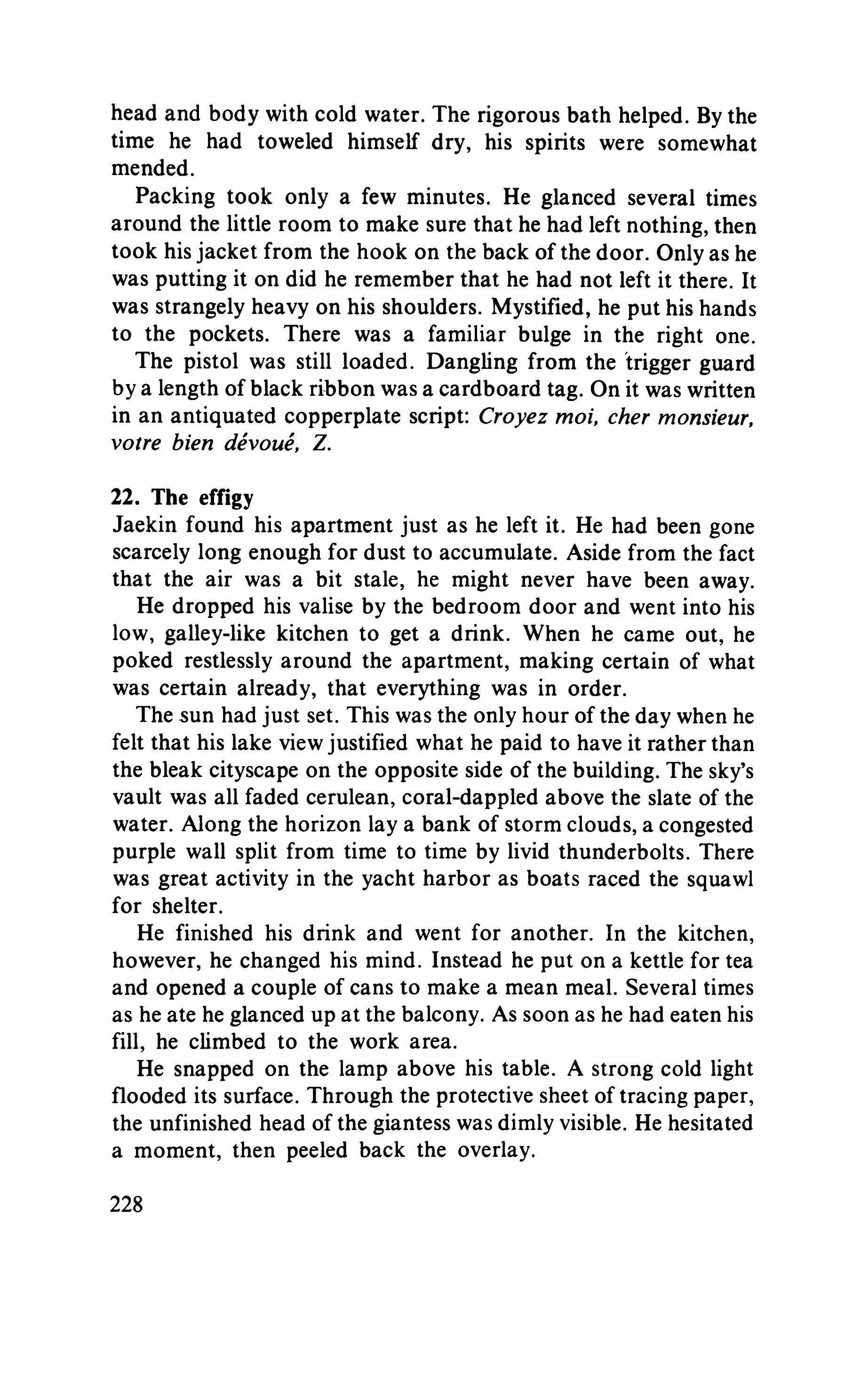
head and body with cold water. The rigorous bath helped. By the time he had toweled himself dry, his spirits were somewhat mended.
Packing took only a few minutes. He glanced several times around the little room to make sure that he had left nothing, then took his jacket from the hook on the back of the door. Only as he was putting it on did he remember that he had not left it there. It was strangely heavy on his shoulders. Mystified, he put his hands to the pockets. There was a familiar bulge in the right one.
The pistol was still loaded. Dangling from the 'trigger guard by a length of black ribbon was a cardboard tag. On it was written in an antiquated copperplate script: Croyez moi, cher monsieur, votre bien devoue, Z.
22. The effigy Jaekin found his apartment just as he left it. He had been gone scarcely long enough for dust to accumulate. Aside from the fact that the air was a bit stale, he might never have been away.
He dropped his valise by the bedroom door and went into his low, galley-like kitchen to get a drink. When he came out, he poked restlessly around the apartment, making certain of what was certain already, that everything was in order.
The sun had just set. This was the only hour of the day when he felt that his lake view justified what he paid to have it rather than the bleak cityscape on the opposite side of the building. The sky's vault was all faded cerulean, coral-dappled above the slate of the water. Along the horizon lay a bank of storm clouds, a congested purple wall split from time to time by livid thunderbolts. There was great activity in the yacht harbor as boats raced the squawl for shelter.
He finished his drink and went for another. In the kitchen, however, he changed his mind. Instead he put on a kettle for tea and opened a couple of cans to make a mean meal. Several times as he ate he glanced up at the balcony. As soon as he had eaten his fill, he climbed to the work area.
He snapped on the lamp above his table. A strong cold light flooded its surface. Through the protective sheet of tracing paper, the unfinished head of the giantess was dimly visible. He hesitated a moment, then peeled back the overlay. 228
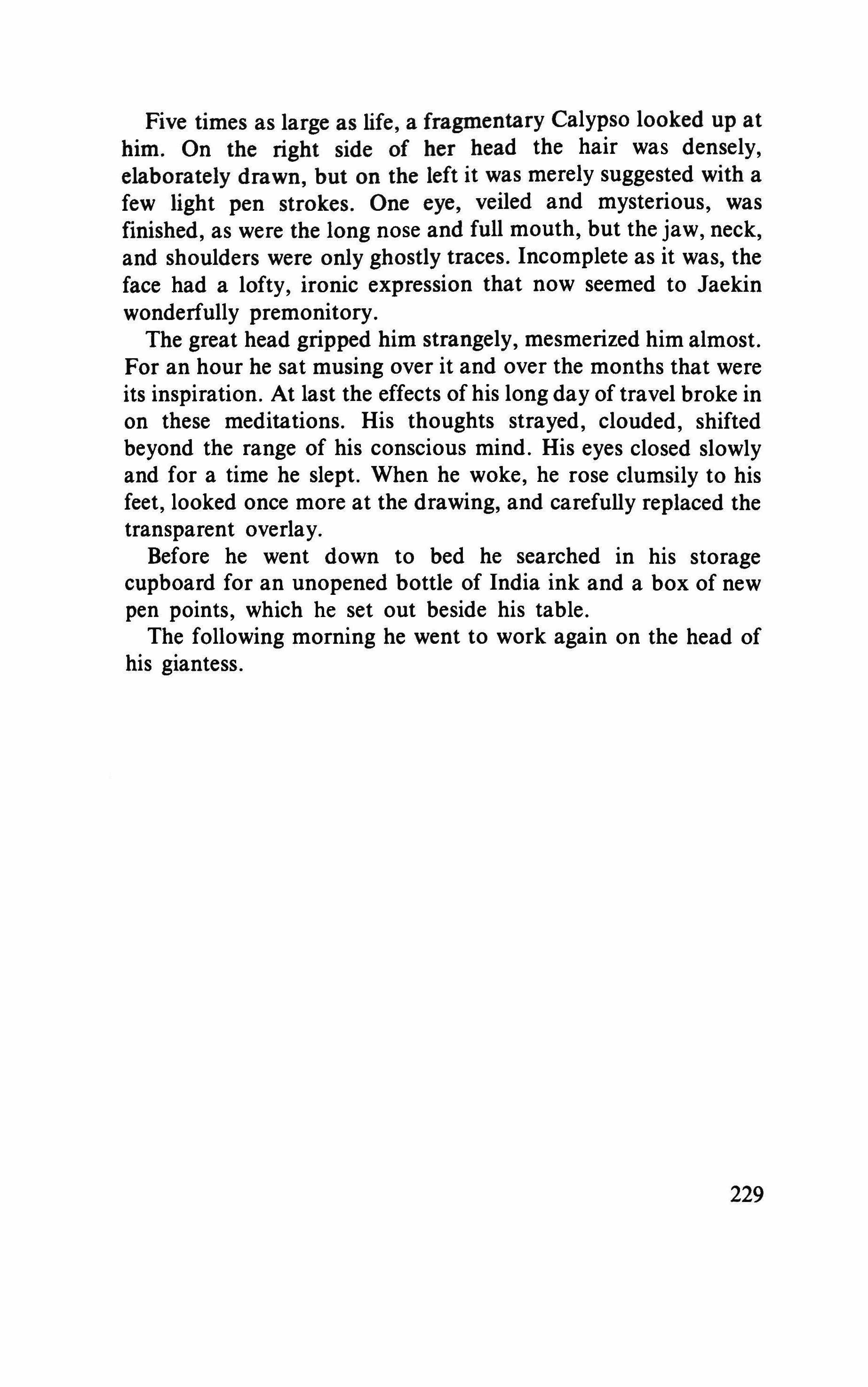
Five times as large as life, a fragmentary Calypso looked up at him. On the right side of her head the hair was densely, elaborately drawn, but on the left it was merely suggested with a few light pen strokes. One eye, veiled and mysterious, was finished, as were the long nose and full mouth, but the jaw, neck, and shoulders were only ghostly traces. Incomplete as it was, the face had a lofty, ironic expression that now seemed to Jaekin wonderfully premonitory.
The great head gripped him strangely, mesmerized him almost. For an hour he sat musing over it and over the months that were its inspiration. At last the effects of his long day of travel broke in on these meditations. His thoughts strayed, clouded, shifted beyond the range of his conscious mind. His eyes closed slowly and for a time he slept. When he woke, he rose clumsily to his feet, looked once more at the drawing, and carefully replaced the transparent overlay.
Before he went down to bed he searched in his storage cupboard for an unopened bottle of India ink and a box of new pen points, which he set out beside his table.
The following morning he went to work again on the head of his giantess.

Quiz, in Hell, was making the point that he had been slain.
"You're dead, you're a dead man, just one more goner," Lesefario said.
"No, no. My pop's a dead man, all the folks on the old man's side with their bad histories and amok blood counts-they're dead men. I was definitely slain. Smited. Blasted. Here today gone today. Slain absolutely. And none of the amenities, let me tell you, no last words or final cigarette, the blindfold unoffered. It was as if I'd gotten in to start my car and-boom! Like someone ambushed, snuffed byunions, eating in restaurants and rushed by hit men."
"Do you know who did it?"
"I've got my suspicions, I'm working on it, I have some leads. I've- Hey- Where are you going? Hey."
But Lesefario was gone, vanished in Hell's vast smokescreen, the fiery fog that was its climate.
Because it was the fate of the damned to run, of course-not jog, run-their piss on fire and their shit molten, boiling sperm
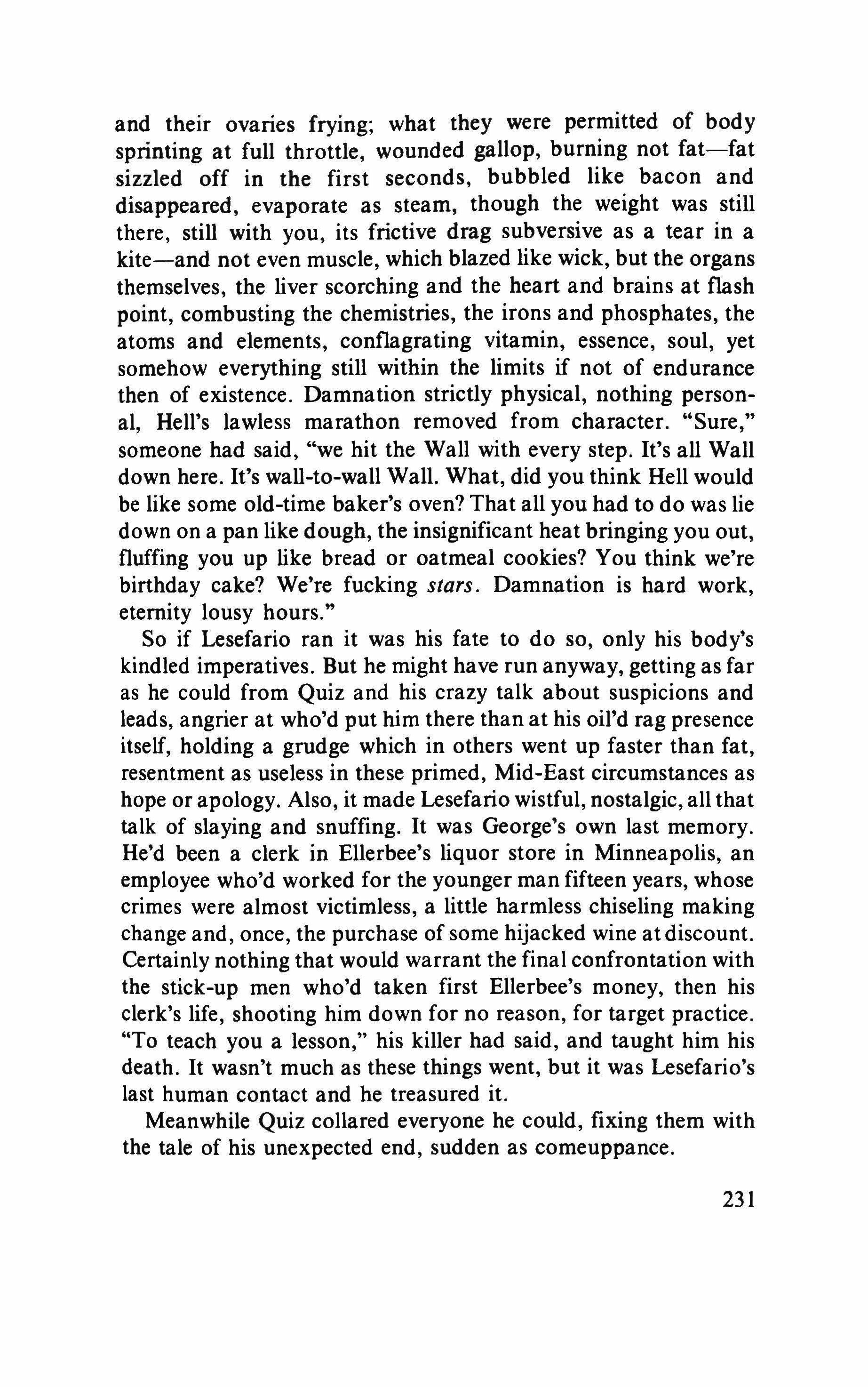
and their ovaries frying; what they were permitted of body sprinting at full throttle, wounded gallop, burning not fat-fat sizzled off in the first seconds, bubbled like bacon and disappeared, evaporate as steam, though the weight was still there, still with you, its frictive drag subversive as a tear in a kite-and not even muscle, which blazed like wick, but the organs themselves, the liver scorching and the heart and brains at flash point, combusting the chemistries, the irons and phosphates, the atoms and elements, conflagrating vitamin, essence, soul, yet somehow everything still within the limits if not of endurance then of existence. Damnation strictly physical, nothing personal, Hell's lawless marathon removed from character. "Sure," someone had said, "we hit the Wall with every step. It's all Wall down here. It's wall-to-wall Wall. What, did you think Hell would be like some old-time baker's oven? That all you had to do was lie down on a pan like dough, the insignificant heat bringing you out, fluffing you up like bread or oatmeal cookies? You think we're birthday cake? We're fucking stars. Damnation is hard work, eternity lousy hours."
So if Lesefario ran it was his fate to do so, only his body's kindled imperatives. But he might have run anyway, getting as far as he could from Quiz and his crazy talk about suspicions and leads, angrier at who'd put him there than at his oil'd rag presence itself, holding a grudge which in others went up faster than fat, resentment as useless in these primed, Mid-East circumstances as hope or apology. Also, it made Lesefario wistful, nostalgic, all that talk of slaying and snuffing. It was George's own last memory. He'd been a clerk in Ellerbee's liquor store in Minneapolis, an employee who'd worked for the younger man fifteen years, whose crimes were almost victimless, a little harmless chiseling making change and, once, the purchase of some hijacked wine at discount. Certainly nothing that would warrant the final confrontation with the stick-up men who'd taken first Ellerbee's money, then his clerk's life, shooting him down for no reason, for target practice. "To teach you a lesson," his killer had said, and taught him his death. It wasn't much as these things went, but it was Lesefario's last human contact and he treasured it.
Meanwhile Quiz collared everyone he could, fixing them with the tale of his unexpected end, sudden as comeuppance.
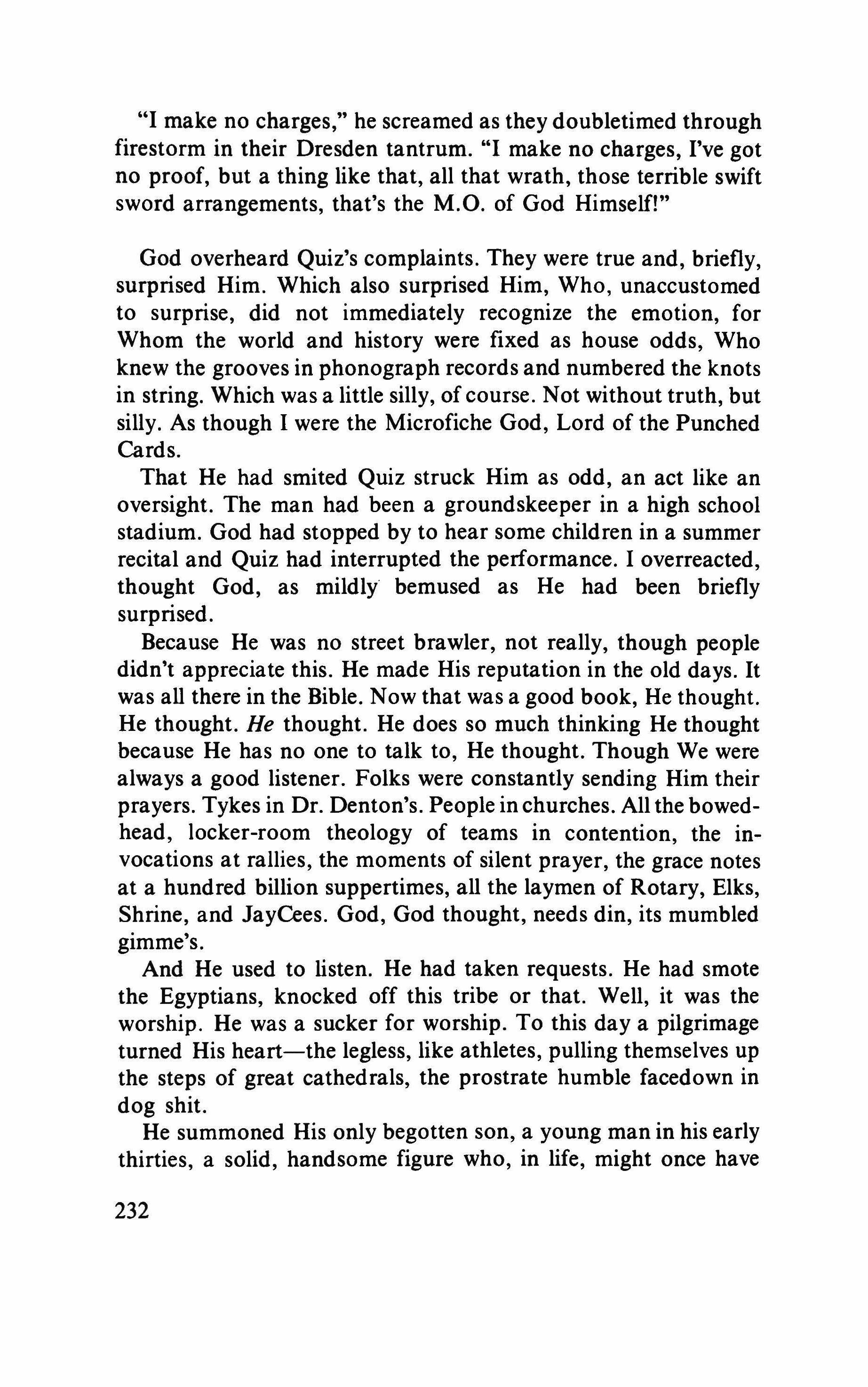
"I make no charges," he screamed as they doubletimed through firestorm in their Dresden tantrum. "I make no charges, I've got no proof, but a thing like that, all that wrath, those terrible swift sword arrangements, that's the M.D. of God Himself!"
God overheard Quiz's complaints. They were true and, briefly, surprised Him. Which also surprised Him, Who, unaccustomed to surprise, did not immediately recognize the emotion, for Whom the world and history were fixed as house odds, Who knew the grooves in phonograph records and numbered the knots in string. Which was a little silly, of course. Not without truth, but silly. As though I were the Microfiche God, Lord of the Punched Cards.
That He had smited Quiz struck Him as odd, an act like an oversight. The man had been a groundskeeper in a high school stadium. God had stopped by to hear some children in a summer recital and Quiz had interrupted the performance. I overreacted, thought God, as mildly bemused as He had been briefly surprised.
Because He was no street brawler, not really, though people didn't appreciate this. He made His reputation in the old days. It was all there in the Bible. Now that was a good book, He thought. He thought. He thought. He does so much thinking He thought because He has no one to talk to, He thought. Though We were always a good listener. Folks were constantly sending Him their prayers. Tykes in Dr. Denton's. People in churches. All the bowedhead, locker-room theology of teams in contention, the invocations at rallies, the moments of silent prayer, the grace notes at a hundred billion suppertimes, all the laymen of Rotary, Elks, Shrine, and JayCees. God, God thought, needs din, its mumbled gimme's.
And He used to listen. He had taken requests. He had smote the Egyptians, knocked off this tribe or that. Well, it was the worship. He was a sucker for worship. To this day a pilgrimage turned His heart-the legless, like athletes, pulling themselves up the steps of great cathedrals, the prostrate humble facedown in dog shit.
He summoned His only begotten son, a young man in his early thirties, a solid, handsome figure who, in life, might once have 232
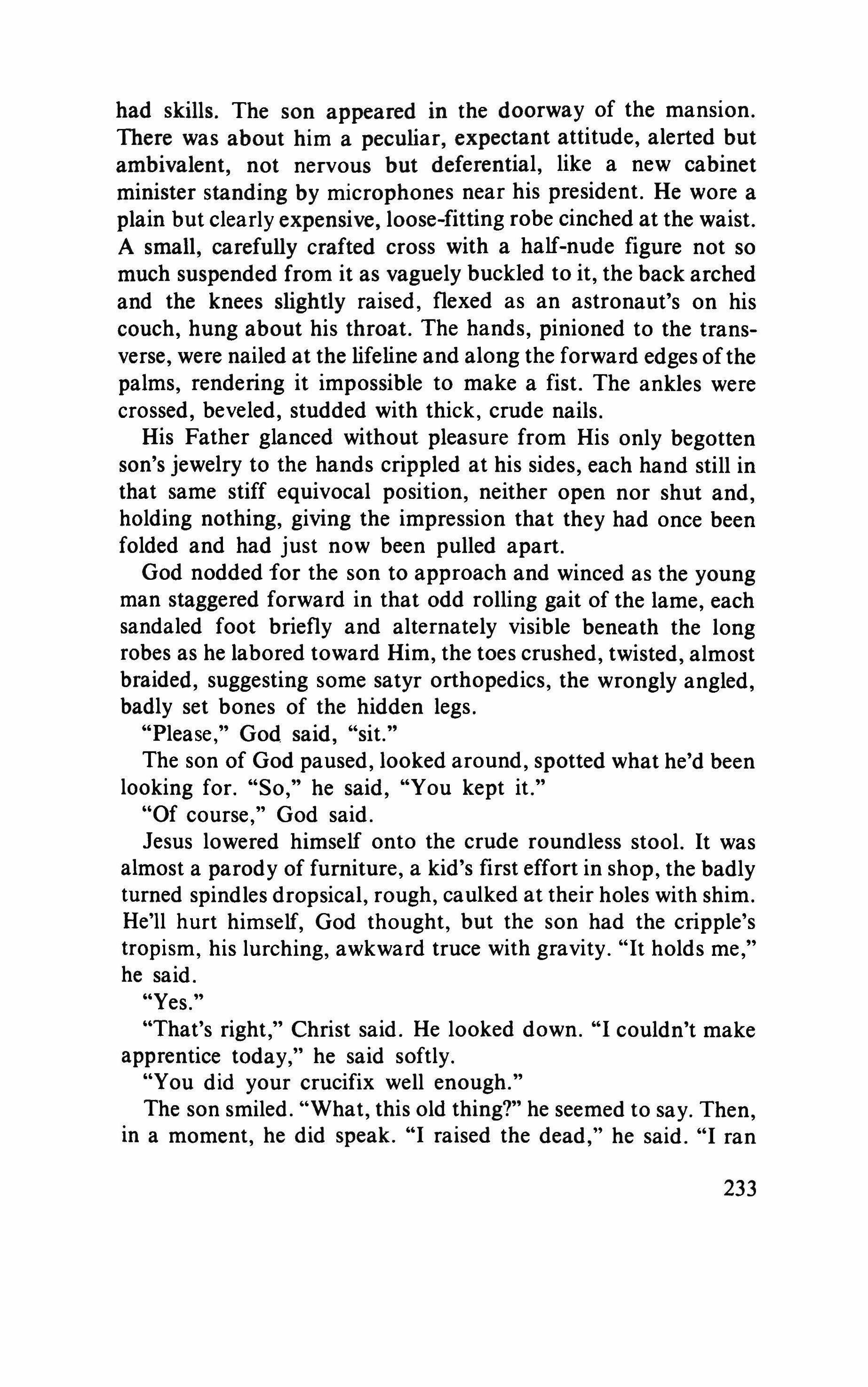
had skills. The son appeared in the doorway of the mansion. There was about him a peculiar, expectant attitude, alerted but ambivalent, not nervous but deferential, like a new cabinet minister standing by microphones near his president. He wore a plain but clearly expensive, loose-fitting robe cinched at the waist. A small, carefully crafted cross with a half-nude figure not so much suspended from it as vaguely buckled to it, the back arched and the knees slightly raised, flexed as an astronaut's on his couch, hung about his throat. The hands, pinioned to the transverse, were nailed at the lifeline and along the forward edges ofthe palms, rendering it impossible to make a fist. The ankles were crossed, beveled, studded with thick, crude nails.
His Father glanced without pleasure from His only begotten son's jewelry to the hands crippled at his sides, each hand still in that same stiff equivocal position, neither open nor shut and, holding nothing, giving the impression that they had once been folded and had just now been pulled apart.
God nodded for the son to approach and winced as the young man staggered forward in that odd rolling gait of the lame, each sandaled foot briefly and alternately visible beneath the long robes as he labored toward Him, the toes crushed, twisted, almost braided, suggesting some satyr orthopedics, the wrongly angled, badly set bones of the hidden legs.
"Please," God said, "sit."
The son of God paused, looked around, spotted what he'd been looking for. "So," he said, "You kept it."
"Of course," God said.
Jesus lowered himself onto the crude roundless stool. It was almost a parody of furniture, a kid's first effort in shop, the badly turned spindles dropsical, rough, caulked at their holes with shim. He'll hurt himself, God thought, but the son had the cripple's tropism, his lurching, awkward truce with gravity. "It holds me," he said.
"Yes."
"That's right," Christ said. He looked down. "I couldn't make apprentice today," he said softly.
"You did your crucifix well enough."
The son smiled. "What, this old thing?" he seemed to say. Then, in a moment, he did speak. "I raised the dead," he said. "I ran
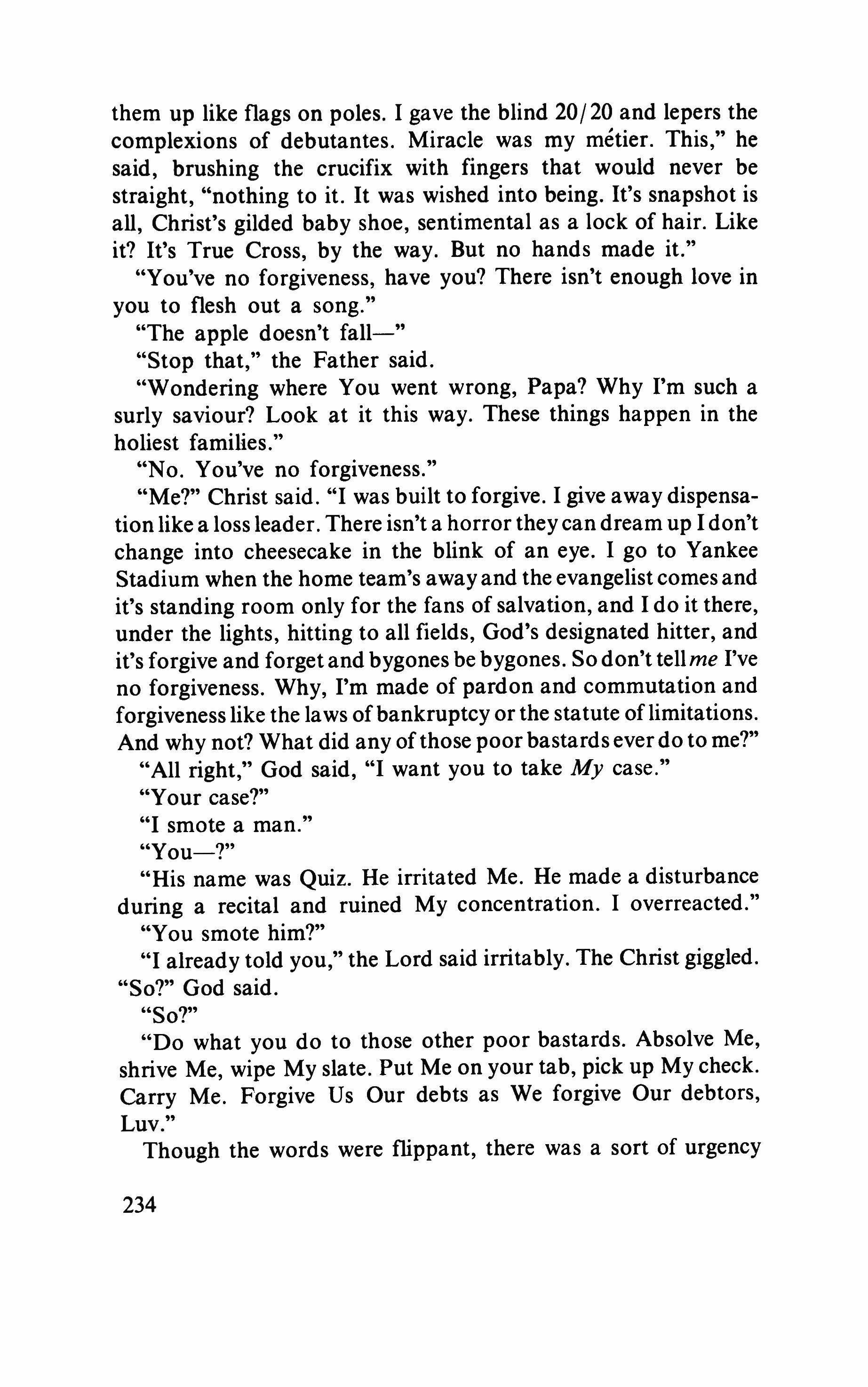
them up like flags on poles. I gave the blind 20/20 and lepers the complexions of debutantes. Miracle was my metier. This," he said, brushing the crucifix with fingers that would never be straight, "nothing to it. It was wished into being. It's snapshot is all, Christ's gilded baby shoe, sentimental as a lock of hair. Like it? It's True Cross, by the way. But no hands made it."
"You've no forgiveness, have you? There isn't enough love in you to flesh out a song."
"The apple doesn't fall-to "Stop that," the Father said.
"Wondering where You went wrong, Papa? Why I'm such a surly saviour? Look at it this way. These things happen in the holiest families."
"No. You've no forgiveness."
"Me?" Christ said. "I was built to forgive. I give away dispensation like a loss leader. There isn't a horror they can dream up I don't change into cheesecake in the blink of an eye. I go to Yankee Stadium when the home team's away and the evangelist comes and it's standing room only for the fans of salvation, and I do it there, under the lights, hitting to all fields, God's designated hitter, and it's forgive and forget and bygones be bygones. So don't tell me I've no forgiveness. Why, I'm made of pardon and commutation and forgiveness like the laws ofbankruptcy or the statute of limitations. And why not? What did any of those poor bastards ever do to me?"
"All right," God said, "I want you to take My case."
"Your case?"
"I smote a man."
"You-?"
"His name was Quiz. He irritated Me. He made a disturbance during a recital and ruined My concentration. I overreacted."
"You smote him?"
"I already told you," the Lord said irritably. The Christ giggled. "So?" God said.
"So?"
"Do what you do to those other poor bastards. Absolve Me, shrive Me, wipe My slate. Put Me on your tab, pick up My check. Carry Me. Forgive Us Our debts as We forgive Our debtors, Luv."
Though the words were flippant, there was a sort of urgency
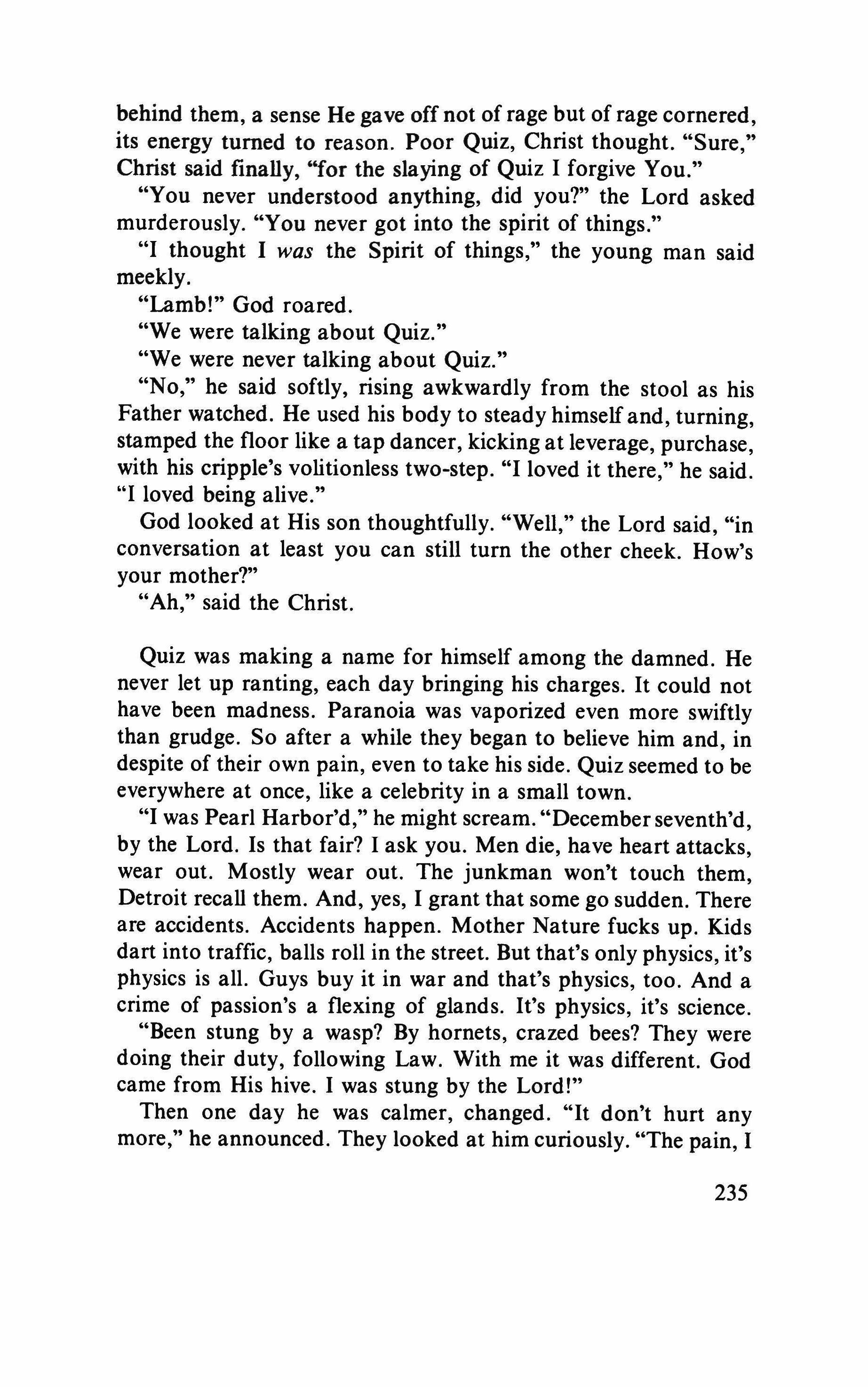
behind them, a sense He gave off not of rage but of rage cornered, its energy turned to reason. Poor Quiz, Christ thought. "Sure," Christ said finally, ''for the slaying of Quiz I forgive You."
"You never understood anything, did you?" the Lord asked murderously. "You never got into the spirit of things."
"I thought I was the Spirit of things," the young man said meekly.
"Lamb!" God roared.
"We were talking about Quiz."
"We were never talking about Quiz."
"No," he said softly, rising awkwardly from the stool as his Father watched. He used his body to steady himselfand, turning, stamped the floor like a tap dancer, kicking at leverage, purchase, with his cripple's volitionless two-step. "I loved it there," he said. "I loved being alive."
God looked at His son thoughtfully. "Well," the Lord said, "in conversation at least you can still tum the other cheek. How's your mother?"
"Ah," said the Christ.
Quiz was making a name for himself among the damned. He never let up ranting, each day bringing his charges. It could not have been madness. Paranoia was vaporized even more swiftly than grudge. So after a while they began to believe him and, in despite of their own pain, even to take his side. Quiz seemed to be everywhere at once, like a celebrity in a small town.
"I was Pearl Harbor'd," he might scream. "December seventh'd, by the Lord. Is that fair? I ask you. Men die, have heart attacks, wear out. Mostly wear out. The junkman won't touch them, Detroit recall them. And, yes, I grant that some go sudden. There are accidents. Accidents happen. Mother Nature fucks up. Kids dart into traffic, balls roll in the street. But that's only physics, it's physics is all. Guys buy it in war and that's physics, too. And a crime of passion's a flexing of glands. It's physics, it's science.
"Been stung by a wasp? By hornets, crazed bees? They were doing their duty, following Law. With me it was different. God came from His hive. I was stung by the Lord!"
Then one day he was calmer, changed. "It don't hurt any more," he announced. They looked at him curiously. "The pain, I 235
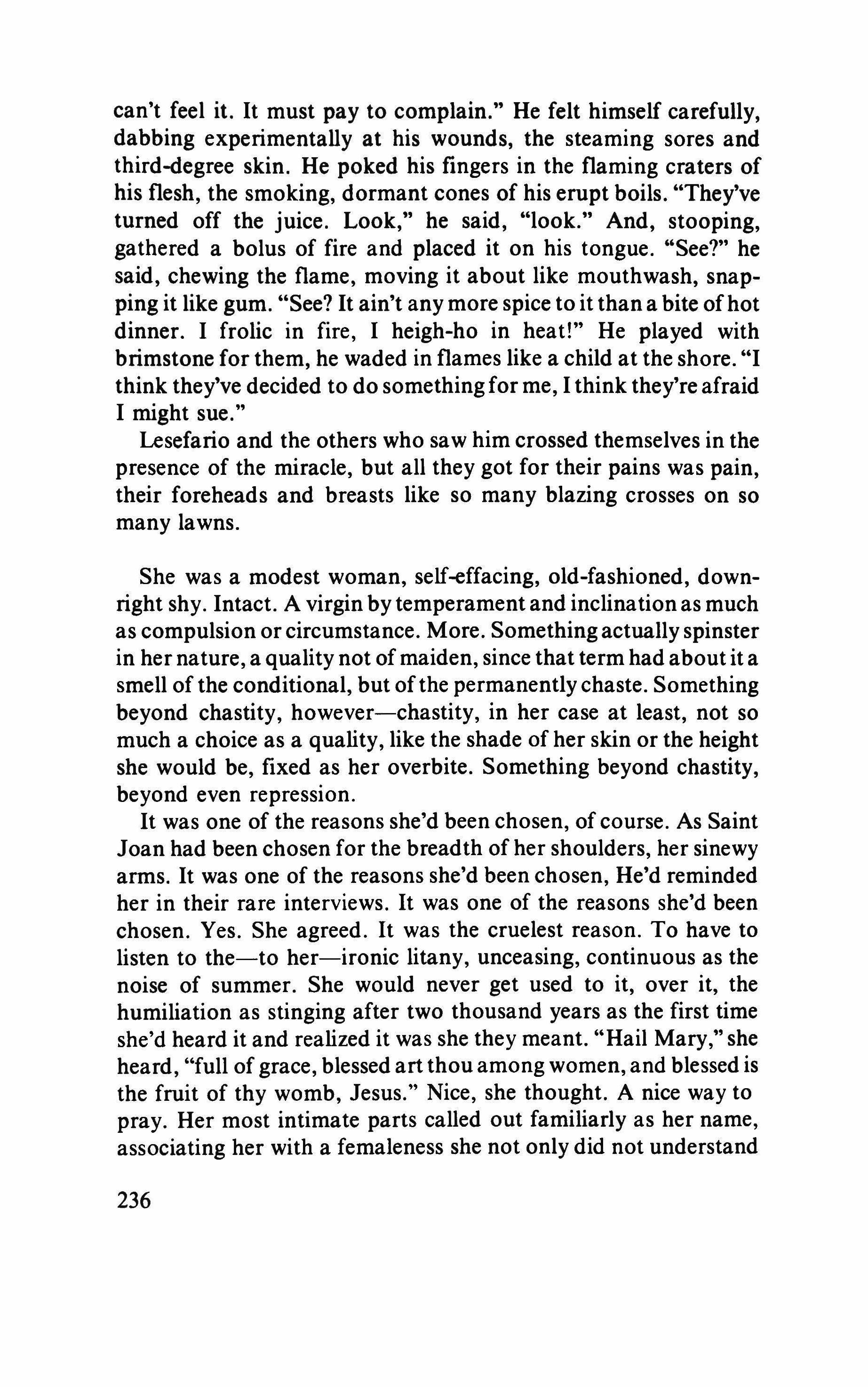
can't feel it. It must pay to complain." He felt himself carefully, dabbing experimentally at his wounds, the steaming sores and third-degree skin. He poked his fingers in the flaming craters of his flesh, the smoking, dormant cones of his erupt boils. "They've turned off the juice. Look," he said, "look." And, stooping, gathered a bolus of fire and placed it on his tongue. "See?" he said, chewing the flame, moving it about like mouthwash, snapping it like gum. "See? It ain't any more spice to it than a bite ofhot dinner. I frolic in fire, I heigh-ho in heat!" He played with brimstone for them, he waded in flames like a child at the shore. "I think they've decided to do something for me, I think they're afraid I might sue."
Lesefario and the others who saw him crossed themselves in the presence of the miracle, but all they got for their pains was pain, their foreheads and breasts like so many blazing crosses on so many lawns.
She was a modest woman, self-effacing, old-fashioned, downright shy. Intact. A virginbytemperament and inclination as much as compulsion or circumstance. More. Somethingactually spinster in her nature, a quality not of maiden, since that term had about it a smell of the conditional, but ofthe permanently chaste. Something beyond chastity, however-chastity, in her case at least, not so much a choice as a quality, like the shade of her skin or the height she would be, fixed as her overbite. Something beyond chastity, beyond even repression.
It was one of the reasons she'd been chosen, of course. As Saint Joan had been chosen for the breadth of her shoulders, her sinewy arms. It was one of the reasons she'd been chosen, He'd reminded her in their rare interviews. It was one of the reasons she'd been chosen. Yes. She agreed. It was the cruelest reason. To have to listen to the-to her-ironic litany, unceasing, continuous as the noise of summer. She would never get used to it, over it, the humiliation as stinging after two thousand years as the first time she'd heard it and realized it was she they meant. "Hail Mary," she heard, "full of grace, blessed art thou among women, and blessed is the fruit of thy womb, Jesus." Nice, she thought. A nice way to pray. Her most intimate parts called out familiarly as her name, associating her with a femaleness she not only did not understand
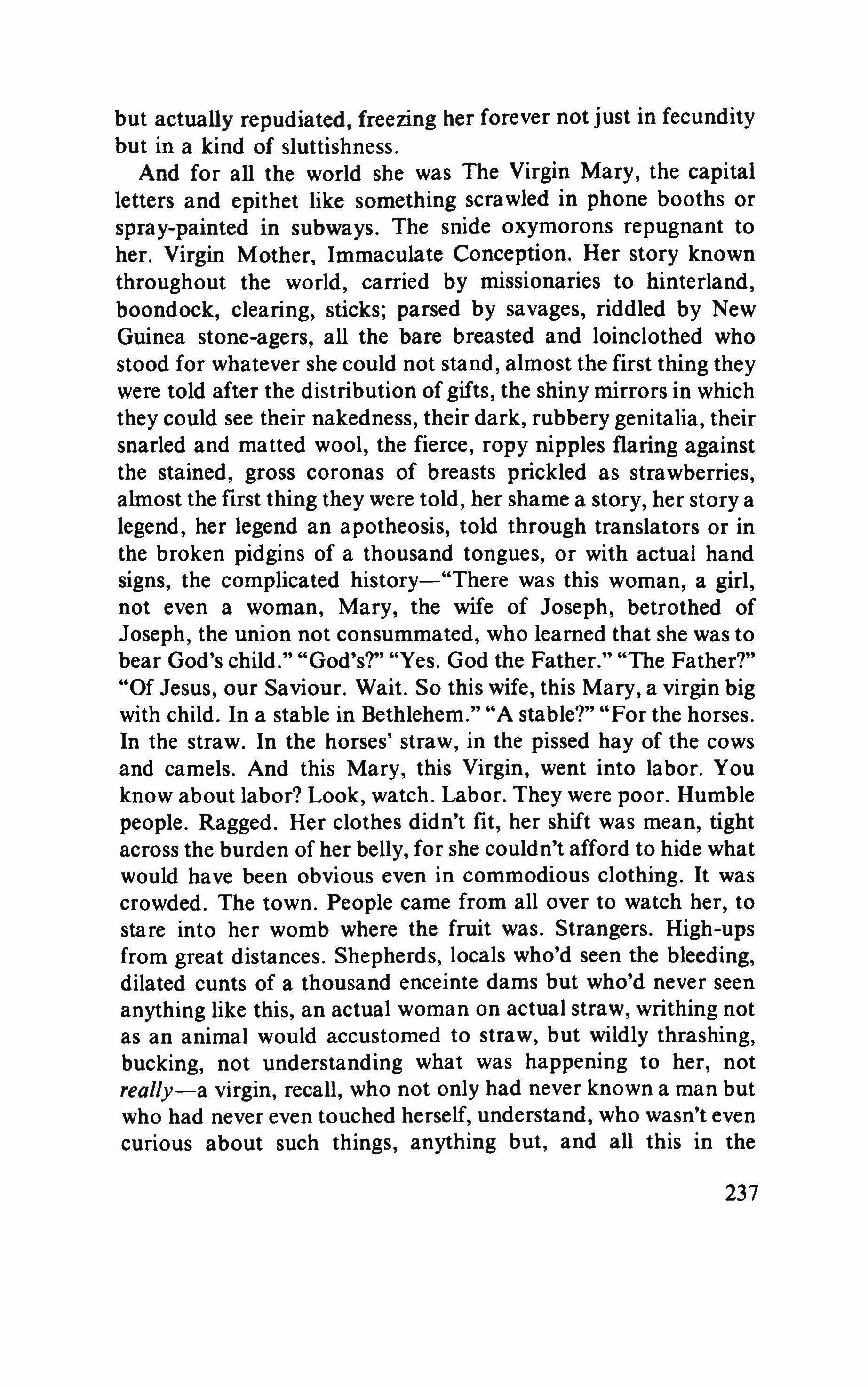
but actually repudiated, freezing her forever not just in fecundity but in a kind of sluttishness.
And for all the world she was The Virgin Mary, the capital letters and epithet like something scrawled in phone booths or spray-painted in subways. The snide oxymorons repugnant to her. Virgin Mother, Immaculate Conception. Her story known throughout the world, carried by missionaries to hinterland, boondock, clearing, sticks; parsed by savages, riddled by New Guinea stone-agers, all the bare breasted and loinclothed who stood for whatever she could not stand, almost the first thing they were told after the distribution of gifts, the shiny mirrors in which they could see their nakedness, their dark, rubbery genitalia, their snarled and matted wool, the fierce, ropy nipples flaring against the stained, gross coronas of breasts prickled as strawberries, almost the first thing they were told, her shame a story, her story a legend, her legend an apotheosis, told through translators or in the broken pidgins of a thousand tongues, or with actual hand signs, the complicated history-"There was this woman, a girl, not even a woman, Mary, the wife of Joseph, betrothed of Joseph, the union not consummated, who learned that she was to bear God's child." "God's?" "Yes. God the Father." "The Father?" "Of Jesus, our Saviour. Wait. So this wife, this Mary, a virgin big with child. In a stable in Bethlehem." "A stable?" "For the horses. In the straw. In the horses' straw, in the pissed hay of the cows and camels. And this Mary, this Virgin, went into labor. You know about labor? Look, watch. Labor. They were poor. Humble people. Ragged. Her clothes didn't fit, her shift was mean, tight across the burden of her belly, for she couldn't afford to hide what would have been obvious even in commodious clothing. It was crowded. The town. People came from all over to watch her, to stare into her womb where the fruit was. Strangers. High-ups from great distances. Shepherds, locals who'd seen the bleeding, dilated cunts of a thousand enceinte dams but who'd never seen anything like this, an actual woman on actual straw, writhing not as an animal would accustomed to straw, but wildly thrashing, bucking, not understanding what was happening to her, not really-a virgin, recall, who not only had never known a man but who had never even touched herself, understand, who wasn't even curious about such things, anything but, and all this in the 237
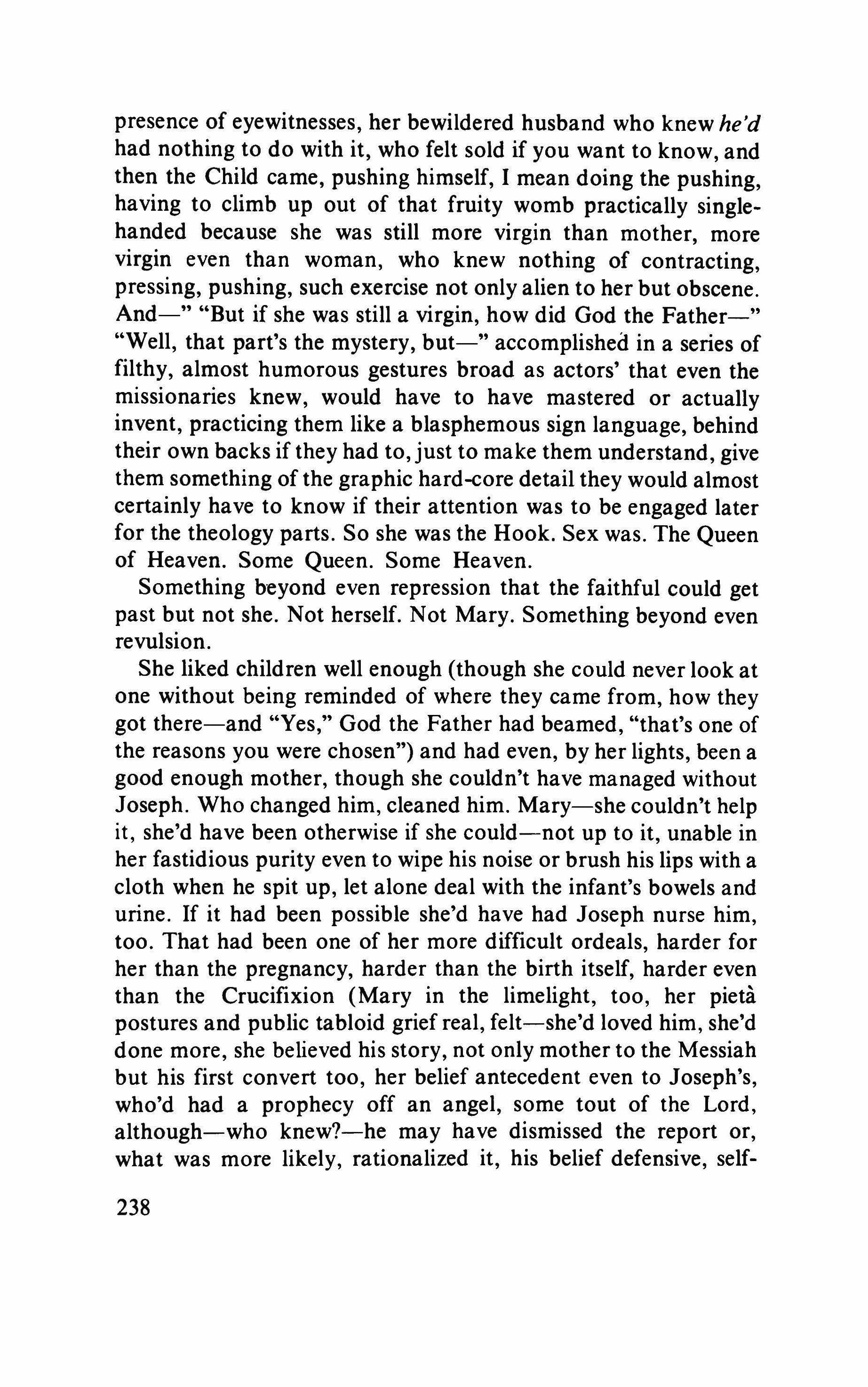
presence of eyewitnesses, her bewildered husband who knew he'd had nothing to do with it, who felt sold if you want to know, and then the Child came, pushing himself, I mean doing the pushing, having to climb up out of that fruity womb practically singlehanded because she was still more virgin than mother, more virgin even than woman, who knew nothing of contracting, pressing, pushing, such exercise not only alien to her but obscene. And-" "But if she was still a virgin, how did God the Father-" "Well, that part's the mystery, but-" accomplished in a series of filthy, almost humorous gestures broad as actors' that even the missionaries knew, would have to have mastered or actually invent, practicing them like a blasphemous sign language, behind their own backs if they had to, just to make them understand, give them something of the graphic hard-core detail they would almost certainly have to know if their attention was to be engaged later for the theology parts. So she was the Hook. Sex was. The Queen of Heaven. Some Queen. Some Heaven. Something beyond even repression that the faithful could get past but not she. Not herself. Not Mary. Something beyond even revulsion.
She liked children well enough (though she could never look at one without being reminded of where they came from, how they got there-and "Yes," God the Father had beamed, "that's one of the reasons you were chosen") and had even, by her lights, been a good enough mother, though she couldn't have managed without Joseph. Who changed him, cleaned him. Mary-she couldn't help it, she'd have been otherwise if she could-not up to it, unable in her fastidious purity even to wipe his noise or brush his lips with a cloth when he spit up, let alone deal with the infant's bowels and urine. If it had been possible she'd have had Joseph nurse him, too. That had been one of her more difficult ordeals, harder for her than the pregnancy, harder than the birth itself, harder even than the Crucifixion (Mary in the limelight, too, her pieta postures and public tabloid grief real, felt-she'd loved him, she'd done more, she believed his story, not only mother to the Messiah but his first convert too, her belief antecedent even to Joseph's, who'd had a prophecy off an angel, some tout of the Lord, although-who knew?-he may have dismissed the report or, what was more likely, rationalized it, his belief defensive, self-
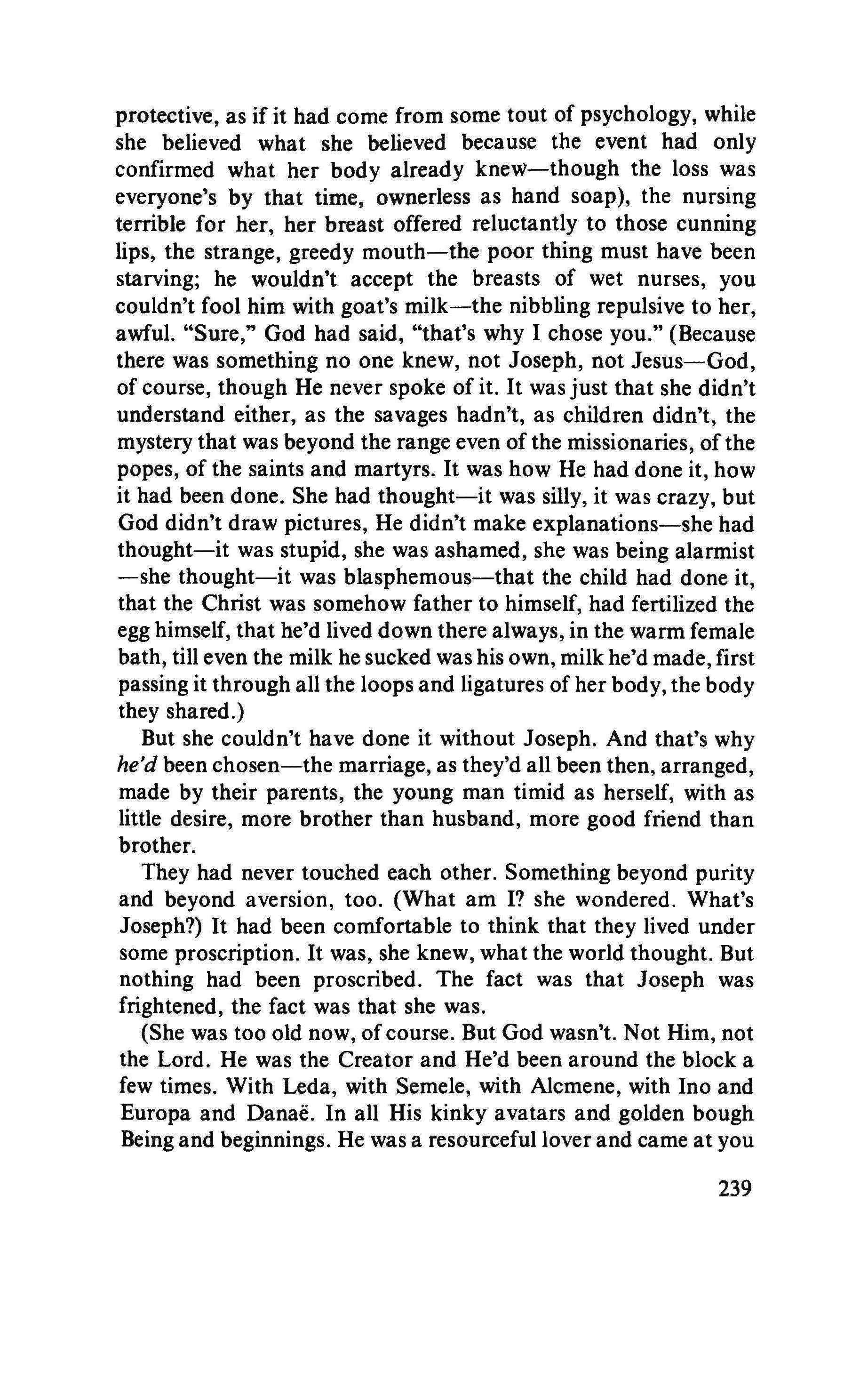
protective, as if it had come from some tout of psychology, while she believed what she believed because the event had only confirmed what her body already knew-though the loss was everyone's by that time, ownerless as hand soap), the nursing terrible for her, her breast offered reluctantly to those cunning lips, the strange, greedy mouth-the poor thing must have been starving; he wouldn't accept the breasts of wet nurses, you couldn't fool him with goat's milk-the nibbling repulsive to her, awful. "Sure," God had said, "that's why I chose you." (Because there was something no one knew, not Joseph, not Jesus-God, of course, though He never spoke of it. It was just that she didn't understand either, as the savages hadn't, as children didn't, the mystery that was beyond the range even of the missionaries, of the popes, of the saints and martyrs. It was how He had done it, how it had been done. She had thought-it was silly, it was crazy, but God didn't draw pictures, He didn't make explanations-she had thought-it was stupid, she was ashamed, she was being alarmist -she thought-it was blasphemous-that the child had done it, that the Christ was somehow father to himself, had fertilized the egg himself, that he'd lived down there always, in the warm female bath, till even the milk he sucked was his own, milk he'd made, first passing it through all the loops and ligatures of her body, the body they shared.)
But she couldn't have done it without Joseph. And that's why he'd been chosen-the marriage, as they'd all been then, arranged, made by their parents, the young man timid as herself, with as little desire, more brother than husband, more good friend than brother.
They had never touched each other. Something beyond purity and beyond aversion, too. (What am I? she wondered. What's Joseph?) It had been comfortable to think that they lived under some proscription. It was, she knew, what the world thought. But nothing had been proscribed. The fact was that Joseph was frightened, the fact was that she was.
(She was too old now, of course. But God wasn't. Not Him, not the Lord. He was the Creator and He'd been around the block a few times. With Leda, with Semele, with Alcmene, with Ino and Europa and Danae. In all His kinky avatars and golden bough Being and beginnings. He was a resourceful lover and came at you
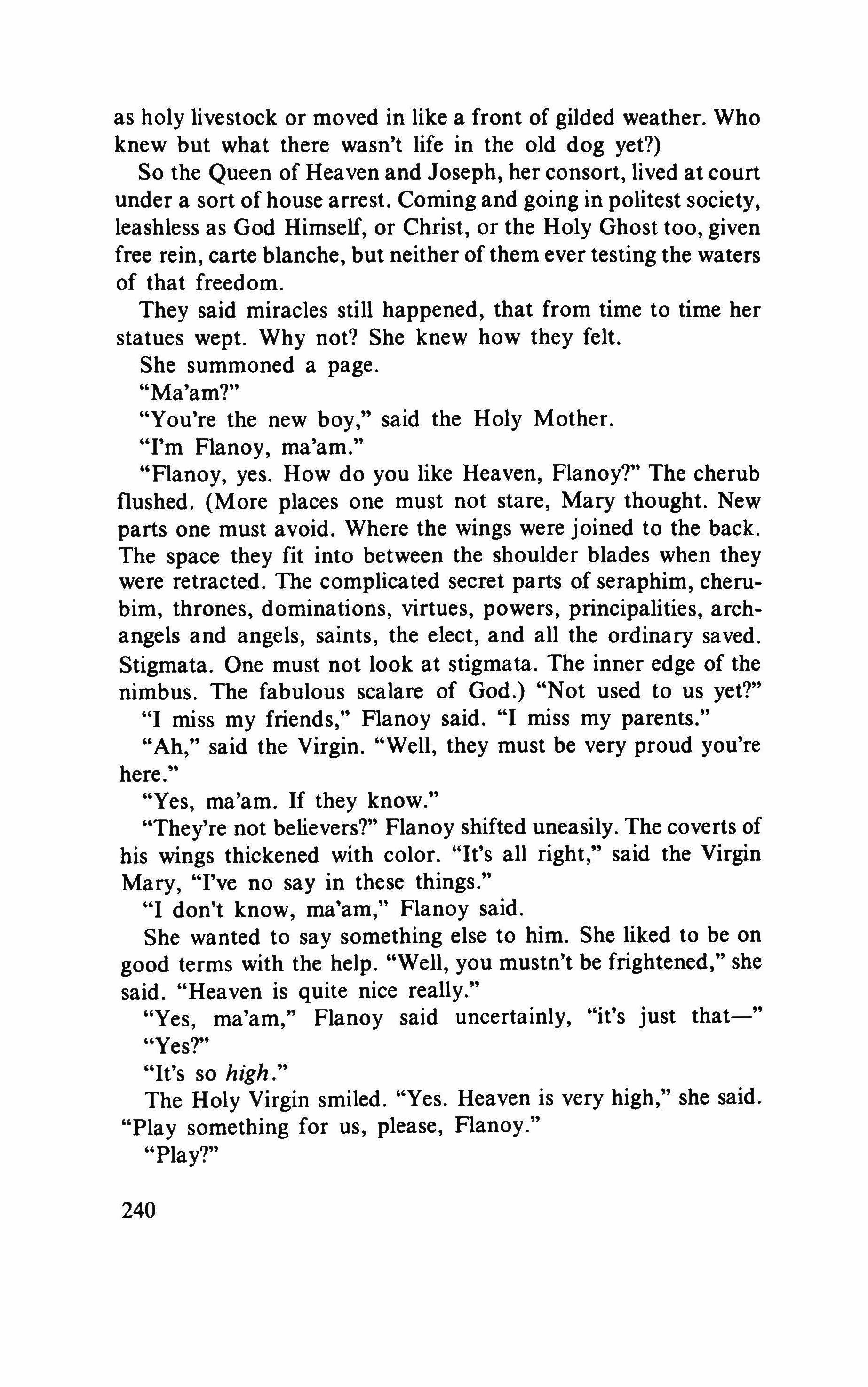
as holy livestock or moved in like a front of gilded weather. Who knew but what there wasn't life in the old dog yet?)
So the Queen of Heaven and Joseph, her consort, lived at court under a sort of house arrest. Coming and going in politest society, leashless as God Himself, or Christ, or the Holy Ghost too, given free rein, carte blanche, but neither of them ever testing the waters of that freedom.
They said miracles still happened, that from time to time her statues wept. Why not? She knew how they felt.
She summoned a page.
"Ma'am?"
"You're the new boy," said the Holy Mother.
"I'm Flanoy, ma'am."
"Flanoy, yes. How do you like Heaven, Flanoy?" The cherub flushed. (More places one must not stare, Mary thought. New parts one must avoid. Where the wings were joined to the back. The space they fit into between the shoulder blades when they were retracted. The complicated secret parts of seraphim, cherubim, thrones, dominations, virtues, powers, principalities, archangels and angels, saints, the elect, and all the ordinary saved. Stigmata. One must not look at stigmata. The inner edge of the nimbus. The fabulous scalare of God.) "Not used to us yet?"
"I miss my friends," Flanoy said. "I miss my parents."
"Ah," said the Virgin. "Well, they must be very proud you're here."
"Yes, ma'am. If they know."
"They're not believers?" Flanoy shifted uneasily. The coverts of his wings thickened with color. "It's all right," said the Virgin Mary, "I've no say in these things."
"I don't know, ma'am," Flanoy said.
She wanted to say something else to him. She liked to be on good terms with the help. "Well, you mustn't be frightened," she said. "Heaven is quite nice really."
"Yes, ma'am," Flanoy said uncertainly, "it's just that-" "Yes?"
"It's so high."
The Holy Virgin smiled. "Yes. Heaven is very high," she said. "Play something for us, please, Flanoy." "Play?" 240
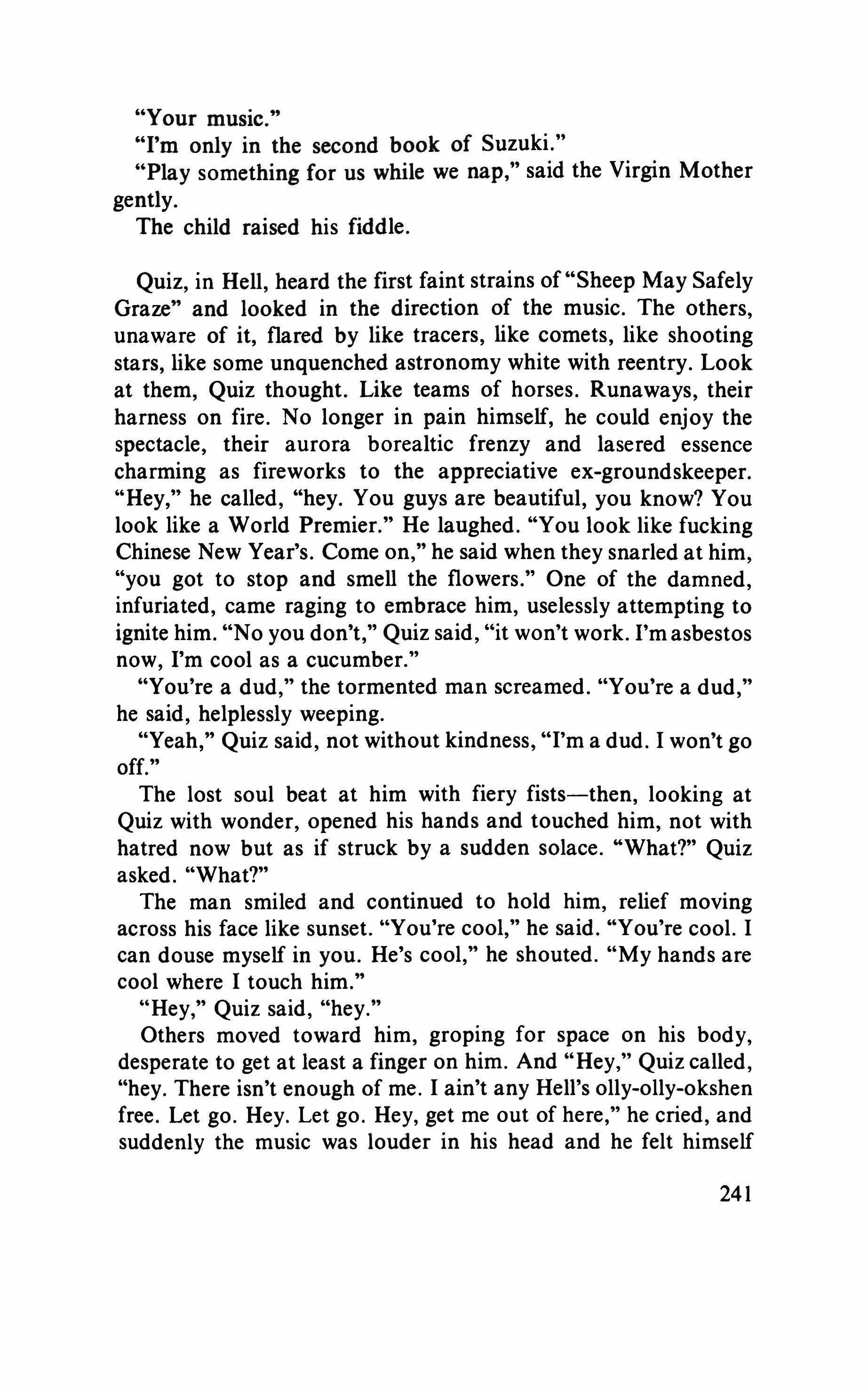
"Your music."
"I'm only in the second book of Suzuki."
"Play something for us while we nap," said the Virgin Mother gently.
The child raised his fiddle.
Quiz, in Hell, heard the first faint strains of "Sheep May Safely Graze" and looked in the direction of the music. The others, unaware of it, flared by like tracers, like comets, like shooting stars, like some unquenched astronomy white with reentry. Look at them, Quiz thought. Like teams of horses. Runaways, their harness on fire. No longer in pain himself, he could enjoy the spectacle, their aurora borealtic frenzy and lasered essence charming as fireworks to the appreciative ex-groundskeeper. "Hey," he called, "hey. You guys are beautiful, you know? You look like a World Premier." He laughed. "You look like fucking Chinese New Year's. Come on," he said when they snarled at him, "you got to stop and smell the flowers." One of the damned, infuriated, came raging to embrace him, uselessly attempting to ignite him. "No you don't," Quiz said, "it won't work. I'm asbestos now, I'm cool as a cucumber."
"You're a dud," the tormented man screamed. "You're a dud," he said, helplessly weeping.
"Yeah," Quiz said, not without kindness, "I'm a dud. I won't go off."
The lost soul beat at him with fiery fists-then, looking at Quiz with wonder, opened his hands and touched him, not with hatred now but as if struck by a sudden solace. "What?" Quiz asked. "What?"
The man smiled and continued to hold him, relief moving across his face like sunset. "You're cool," he said. "You're cool. I can douse myself in you. He's cool," he shouted. "My hands are cool where I touch him."
"Hey," Quiz said, "hey."
Others moved toward him, groping for space on his body, desperate to get at least a finger on him. And "Hey," Quiz called, "hey. There isn't enough of me. I ain't any Hell's olly-olly-okshen free. Let go. Hey. Let go. Hey, get me out of here," he cried, and suddenly the music was louder in his head and he felt himself
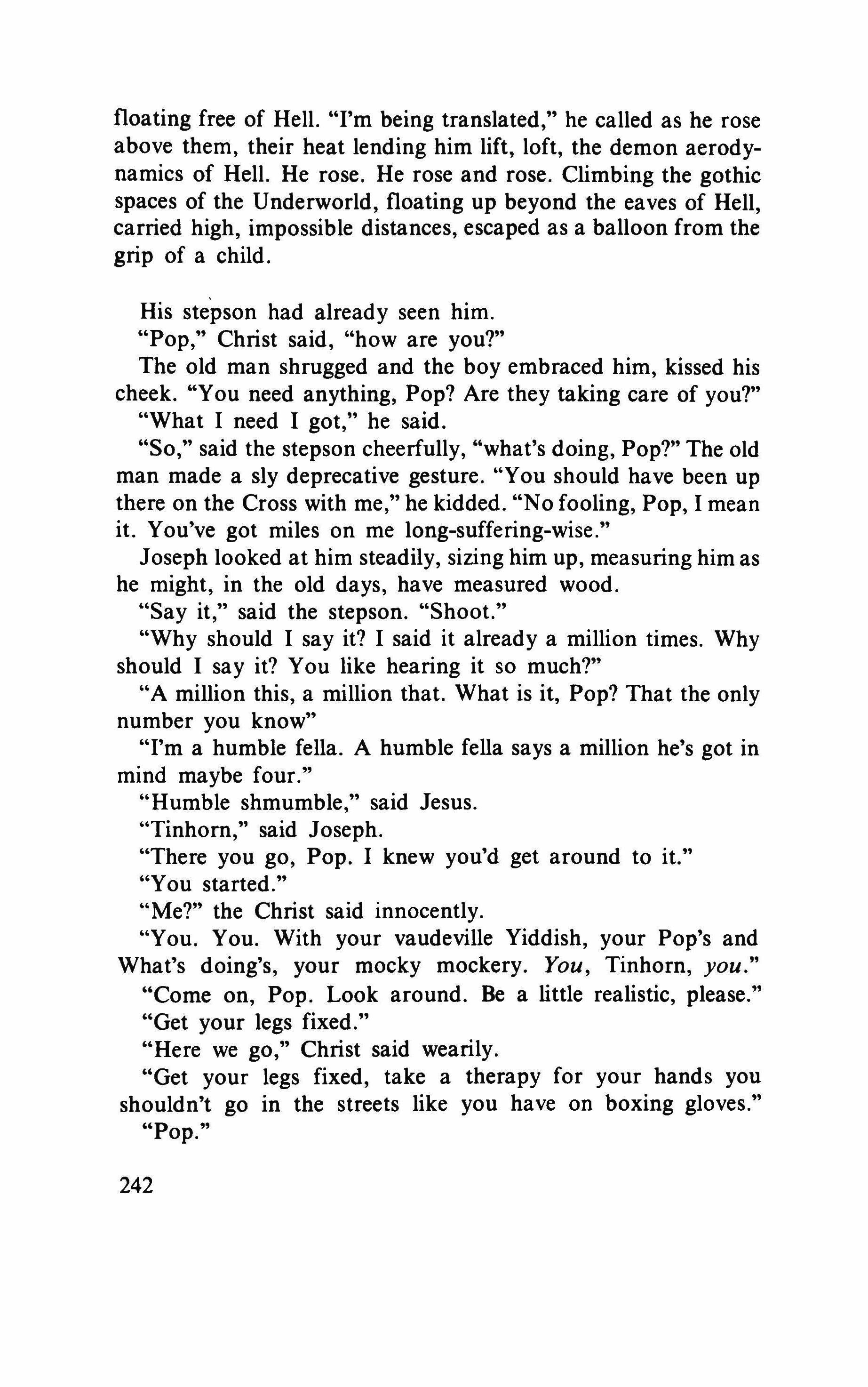
floating free of Hell. "I'm being translated," he called as he rose above them, their heat lending him lift, loft, the demon aerodynamics of Hell. He rose. He rose and rose. Climbing the gothic spaces of the Underworld, floating up beyond the eaves of Hell, carried high, impossible distances, escaped as a balloon from the grip of a child.
His stepson had already seen him. "Pop," Christ said, "how are you?"
The old man shrugged and the boy embraced him, kissed his cheek. "You need anything, Pop? Are they taking care of you?"
"What I need I got," he said.
"So," said the stepson cheerfully, "what's doing, Pop?" The old man made a sly deprecative gesture. "You should have been up there on the Cross with me," he kidded. "No fooling, Pop, I mean it. You've got miles on me long-suffering-wise."
Joseph looked at him steadily, sizing him up, measuring him as he might, in the old days, have measured wood.
"Say it," said the stepson. "Shoot."
"Why should I say it? I said it already a million times. Why should I say it? You like hearing it so much?"
"A million this, a million that. What is it, Pop? That the only number you know"
"I'm a humble fella. A humble fella says a million he's got in mind maybe four."
"Humble shmumble," said Jesus.
"Tinhorn," said Joseph.
"There you go, Pop. I knew you'd get around to it."
"You started."
"Me?" the Christ said innocently.
"You. You. With your vaudeville Yiddish, your Pop's and What's doing's, your mocky mockery. You, Tinhorn, you."
"Come on, Pop. Look around. Be a little realistic, please."
"Get your legs fixed."
"Here we go," Christ said wearily.
"Get your legs fixed, take a therapy for your hands you shouldn't go in the streets like you have on boxing gloves." "Pop."
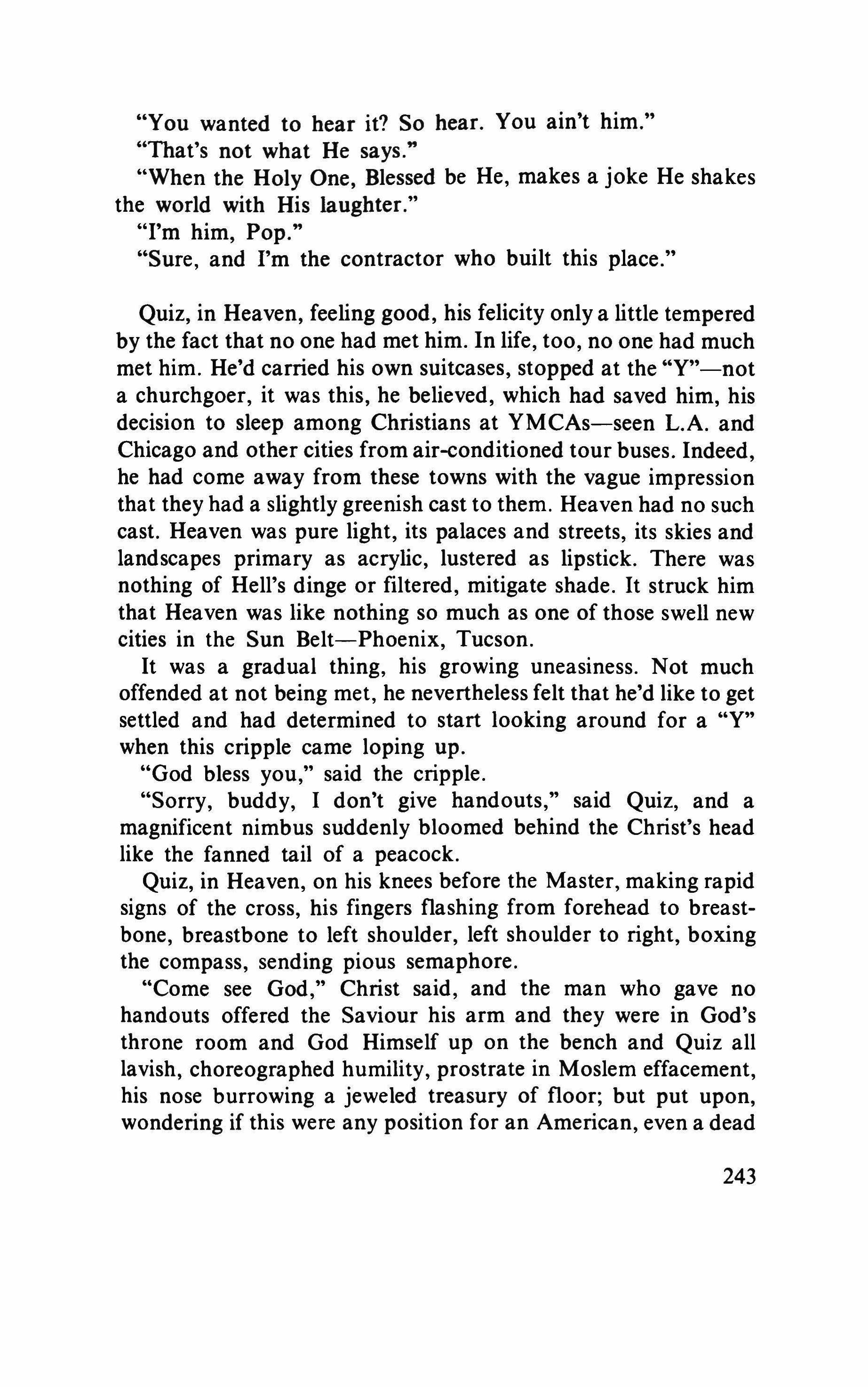
"You wanted to hear it? So hear. You ain't him."
"That's not what He says."
"When the Holy One, Blessed be He, makes a joke He shakes the world with His laughter."
"I'm him, Pop."
"Sure, and I'm the contractor who built this place."
Quiz, in Heaven, feeling good, his felicity only a little tempered by the fact that no one had met him. In life, too, no one had much met him. He'd carried his own suitcases, stopped at the "Y"-not a churchgoer, it was this, he believed, which had saved him, his decision to sleep among Christians at YMCAs-seen L.A. and Chicago and other cities from air-conditioned tour buses. Indeed, he had come away from these towns with the vague impression that they had a slightly greenish cast to them. Heaven had no such cast. Heaven was pure light, its palaces and streets, its skies and landscapes primary as acrylic, lustered as lipstick. There was nothing of Hell's dinge or filtered, mitigate shade. It struck him that Heaven was like nothing so much as one of those swell new cities in the Sun Belt-Phoenix, Tucson.
It was a gradual thing, his growing uneasiness. Not much offended at not being met, he nevertheless felt that he'd like to get settled and had determined to start looking around for a "Y" when this cripple came loping up.
"God bless you," said the cripple.
"Sorry, buddy, I don't give handouts," said Quiz, and a magnificent nimbus suddenly bloomed behind the Christ's head like the fanned tail of a peacock.
Quiz, in Heaven, on his knees before the Master, making rapid signs of the cross, his fingers flashing from forehead to breastbone, breastbone to left shoulder, left shoulder to right, boxing the compass, sending pious semaphore.
"Come see God," Christ said, and the man who gave no handouts offered the Saviour his arm and they were in God's throne room and God Himself up on the bench and Quiz all lavish, choreographed humility, prostrate in Moslem effacement, his nose burrowing a jeweled treasury of floor; but put upon, wondering if this were any position for an American, even a dead
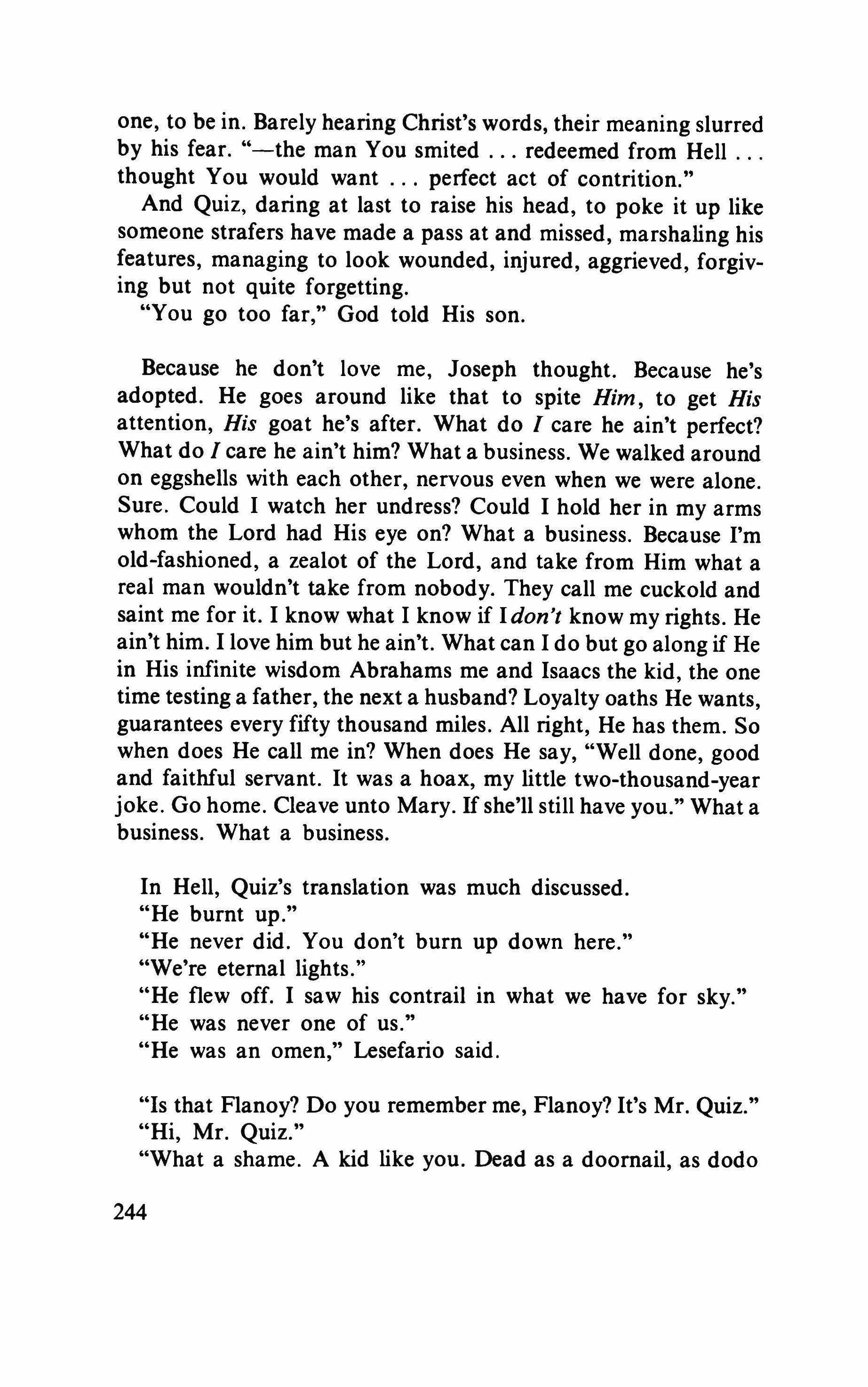
one, to be in. Barely hearing Christ's words, their meaning slurred by his fear. "-the man You smited redeemed from Hell thought You would want perfect act of contrition."
And Quiz, daring at last to raise his head, to poke it up like someone strafers have made a pass at and missed, marshaling his features, managing to look wounded, injured, aggrieved, forgiving but not quite forgetting.
"You go too far," God told His son.
Because he don't love me, Joseph thought. Because he's adopted. He goes around like that to spite Him, to get His attention, His goat he's after. What do I care he ain't perfect? What do I care he ain't him? What a business. We walked around on eggshells with each other, nervous even when we were alone. Sure. Could I watch her undress? Could I hold her in my arms whom the Lord had His eye on? What a business. Because I'm old-fashioned, a zealot of the Lord, and take from Him what a real man wouldn't take from nobody. They call me cuckold and saint me for it. I know what I know if I don't know my rights. He ain't him. I love him but he ain't. What can I do but go along if He in His infinite wisdom Abrahams me and Isaacs the kid, the one time testing a father, the next a husband? Loyalty oaths He wants, guarantees every fifty thousand miles. All right, He has them. So when does He call me in? When does He say, "Well done, good and faithful servant. It was a hoax, my little two-thousand-year joke. Go home. Cleave unto Mary. If she'll still have you." What a business. What a business.
In Hell, Quiz's translation was much discussed.
"He burnt up."
"He never did. You don't burn up down here."
"We're eternal lights."
"He flew off. I saw his contrail in what we have for sky."
"He was never one of us."
"He was an omen," Lesefario said.
"Is that Flanoy? Do you remember me, Flanoy? It's Mr. Quiz."
"Hi, Mr. Quiz."
"What a shame. A kid like you. Dead as a doornail, as dodo
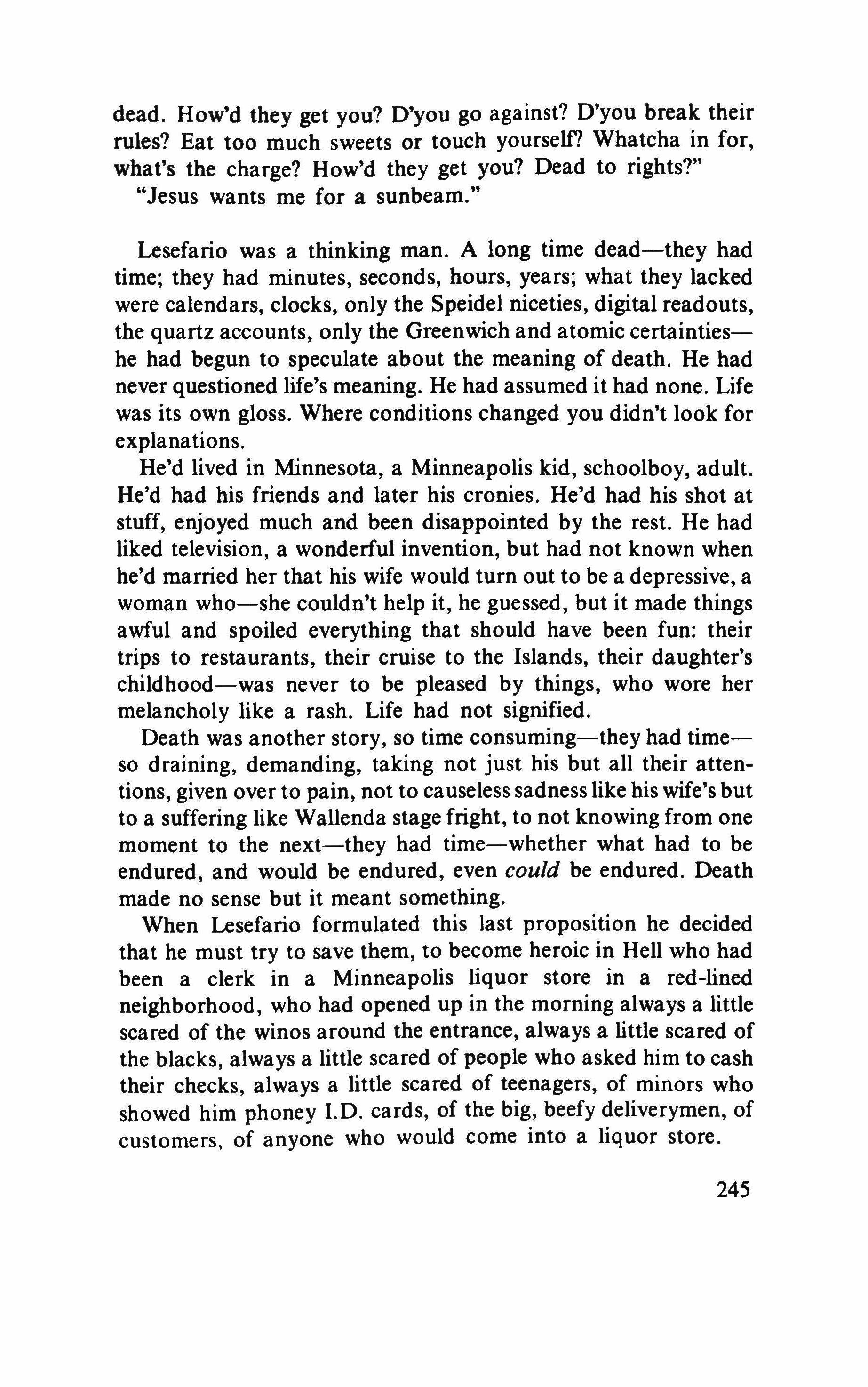
dead. How'd they get you? D'you go against? D'you break their rules? Eat too much sweets or touch yourself? Whatcha in for, what's the charge? How'd they get you? Dead to rights?"
"Jesus wants me for a sunbeam."
Lesefario was a thinking man. A long time dead-they had time; they had minutes, seconds, hours, years; what they lacked were calendars, clocks, only the Speidel niceties, digital readouts, the quartz accounts, only the Greenwich and atomic certaintieshe had begun to speculate about the meaning of death. He had never questioned life's meaning. He had assumed it had none. Life was its own gloss. Where conditions changed you didn't look for explanations.
He'd lived in Minnesota, a Minneapolis kid, schoolboy, adult. He'd had his friends and later his cronies. He'd had his shot at stuff, enjoyed much and been disappointed by the rest. He had liked television, a wonderful invention, but had not known when he'd married her that his wife would turn out to be a depressive, a woman who-she couldn't help it, he guessed, but it made things awful and spoiled everything that should have been fun: their trips to restaurants, their cruise to the Islands, their daughter's childhood-was never to be pleased by things, who wore her melancholy like a rash. Life had not signified.
Death was another story, so time consuming-they had timeso draining, demanding, taking not just his but all their attentions, given over to pain, not to causeless sadness like his wife's but to a suffering like Wallenda stage fright, to not knowing from one moment to the next-they had time-whether what had to be endured, and would be endured, even could be endured. Death made no sense but it meant something.
When Lesefario formulated this last proposition he decided that he must try to save them, to become heroic in Hell who had been a clerk in a Minneapolis liquor store in a red-lined neighborhood, who had opened up in the morning always a little scared of the winos around the entrance, always a little scared of the blacks, always a little scared of people who asked him to cash their checks, always a little scared of teenagers, of minors who showed him phoney I.D. cards, of the big, beefy deliverymen, of customers, of anyone who would come into a liquor store.
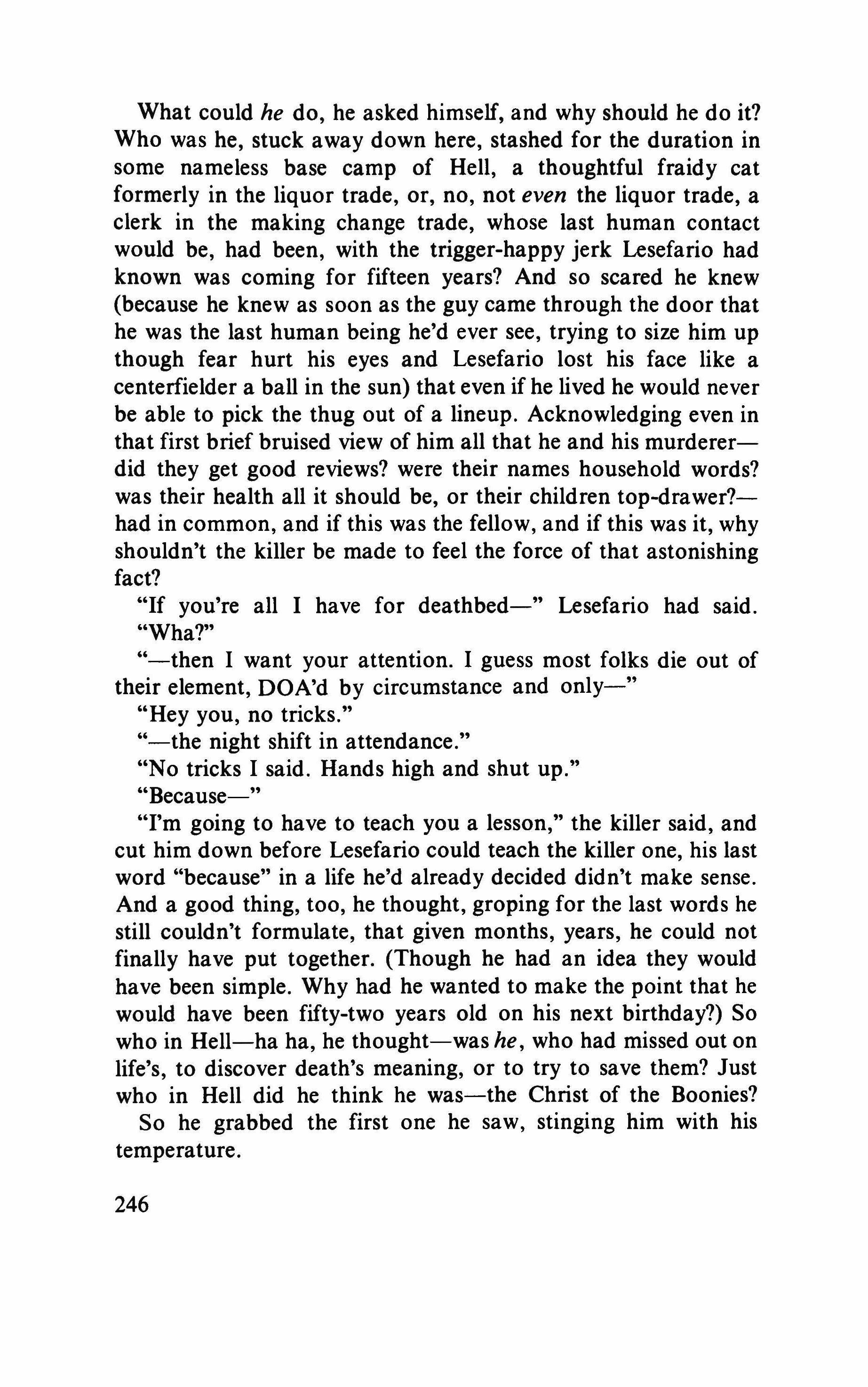
What could he do, he asked himself, and why should he do it? Who was he, stuck away down here, stashed for the duration in some nameless base camp of Hell, a thoughtful fraidy cat formerly in the liquor trade, or, no, not even the liquor trade, a clerk in the making change trade, whose last human contact would be, had been, with the trigger-happy jerk Lesefario had known was coming for fifteen years? And so scared he knew (because he knew as soon as the guy came through the door that he was the last human being he'd ever see, trying to size him up though fear hurt his eyes and Lesefario lost his face like a centerfielder a ball in the sun) that even if he lived he would never be able to pick the thug out of a lineup. Acknowledging even in that first brief bruised view of him all that he and his murdererdid they get good reviews? were their names household words? was their health all it should be, or their children top-drawer?had in common, and if this was the fellow, and if this was it, why shouldn't the killer be made to feel the force of that astonishing fact?
"If you're all I have for deathbed-" Lesefario had said. "Wha?"
"-then I want your attention. I guess most folks die out of their element, DOA'd by circumstance and only-"
"Hey you, no tricks."
"-the night shift in attendance."
"No tricks I said. Hands high and shut up."
"Because-"
"I'm going to have to teach you a lesson," the killer said, and cut him down before Lesefario could teach the killer one, his last word "because" in a life he'd already decided didn't make sense. And a good thing, too, he thought, groping for the last words he still couldn't formulate, that given months, years, he could not finally have put together. (Though he had an idea they would have been simple. Why had he wanted to make the point that he would have been fifty-two years old on his next birthday?) So who in Hell-ha ha, he thought-was he, who had missed out on life's, to discover death's meaning, or to try to save them? Just who in Hell did he think he was-the Christ of the Boonies?
So he grabbed the first one he saw, stinging him with his temperature.
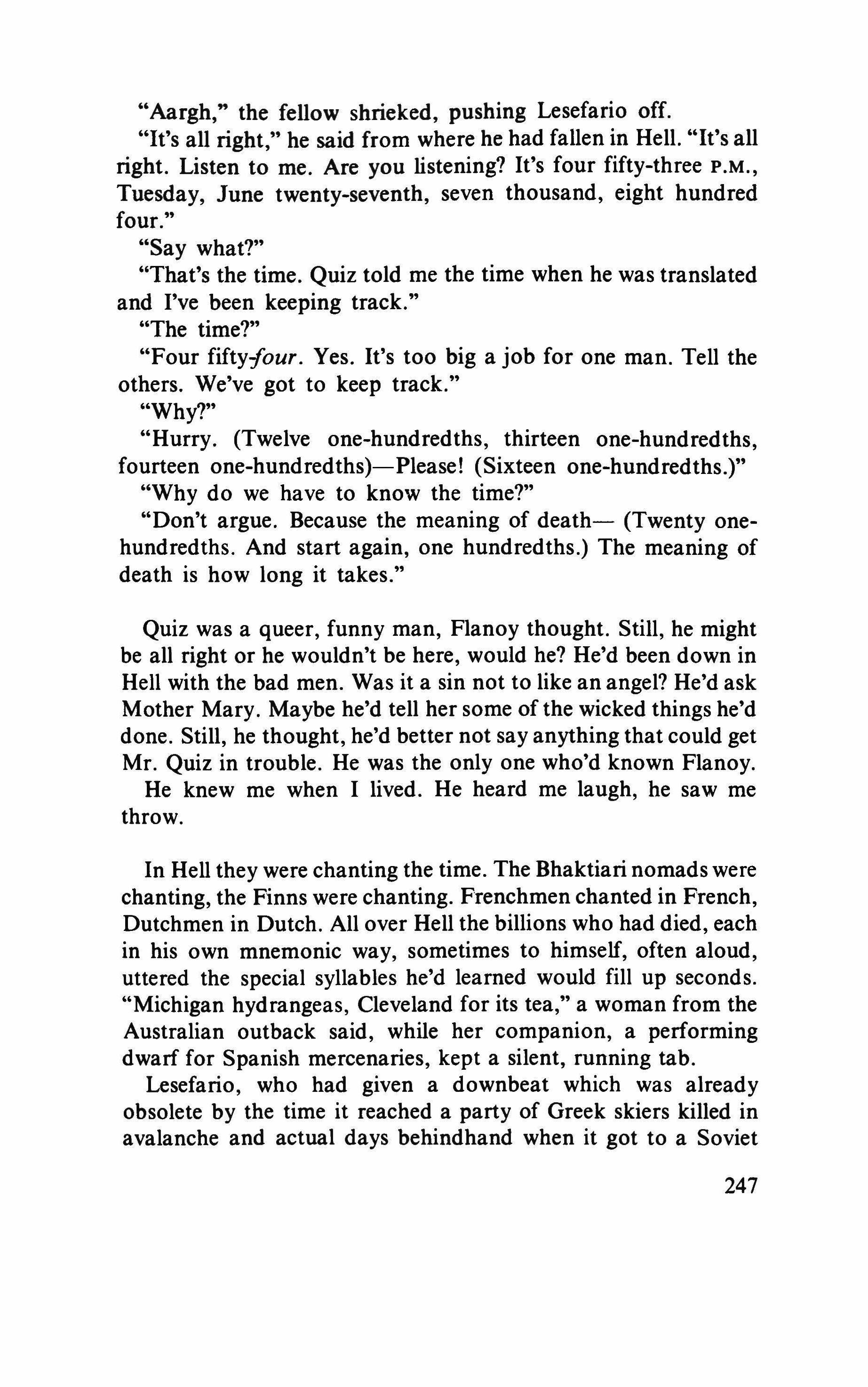
"Aargh," the fellow shrieked, pushing Lesefario off.
"It's all right," he said from where he had fallen in Hell. "It's all right. Listen to me. Are you listening? It's four fifty-three P.M., Tuesday, June twenty-seventh, seven thousand, eight hundred four."
"Say what?"
"That's the time. Quiz told me the time when he was translated and I've been keeping track."
"The time?"
"Four fifty:four. Yes. It's too big a job for one man. Tell the others. We've got to keep track."
"Why?"
"Hurry. (Twelve one-hundredths, thirteen one-hundredths, fourteen one-hundredths)-Please! (Sixteen one-hundredths.)"
"Why do we have to know the time?"
"Don't argue. Because the meaning of death- (Twenty onehundredths. And start again, one hundredths.) The meaning of death is how long it takes."
Quiz was a queer, funny man, Flanoy thought. Still, he might be all right or he wouldn't be here, would he? He'd been down in Hell with the bad men. Was it a sin not to like an angel? He'd ask Mother Mary. Maybe he'd tell her some of the wicked things he'd done. Still, he thought, he'd better not say anything that could get Mr. Quiz in trouble. He was the only one who'd known Flanoy. He knew me when I lived. He heard me laugh, he saw me throw.
In Hell they were chanting the time. The Bhaktiari nomads were chanting, the Finns were chanting. Frenchmen chanted in French, Dutchmen in Dutch. All over Hell the billions who had died, each in his own mnemonic way, sometimes to himself, often aloud, uttered the special syllables he'd learned would fill up seconds. "Michigan hydrangeas, Cleveland for its tea," a woman from the Australian outback said, while her companion, a performing dwarf for Spanish mercenaries, kept a silent, running tab.
Lesefario, who had given a downbeat which was already obsolete by the time it reached a party of Greek skiers killed in avalanche and actual days behindhand when it got to a Soviet
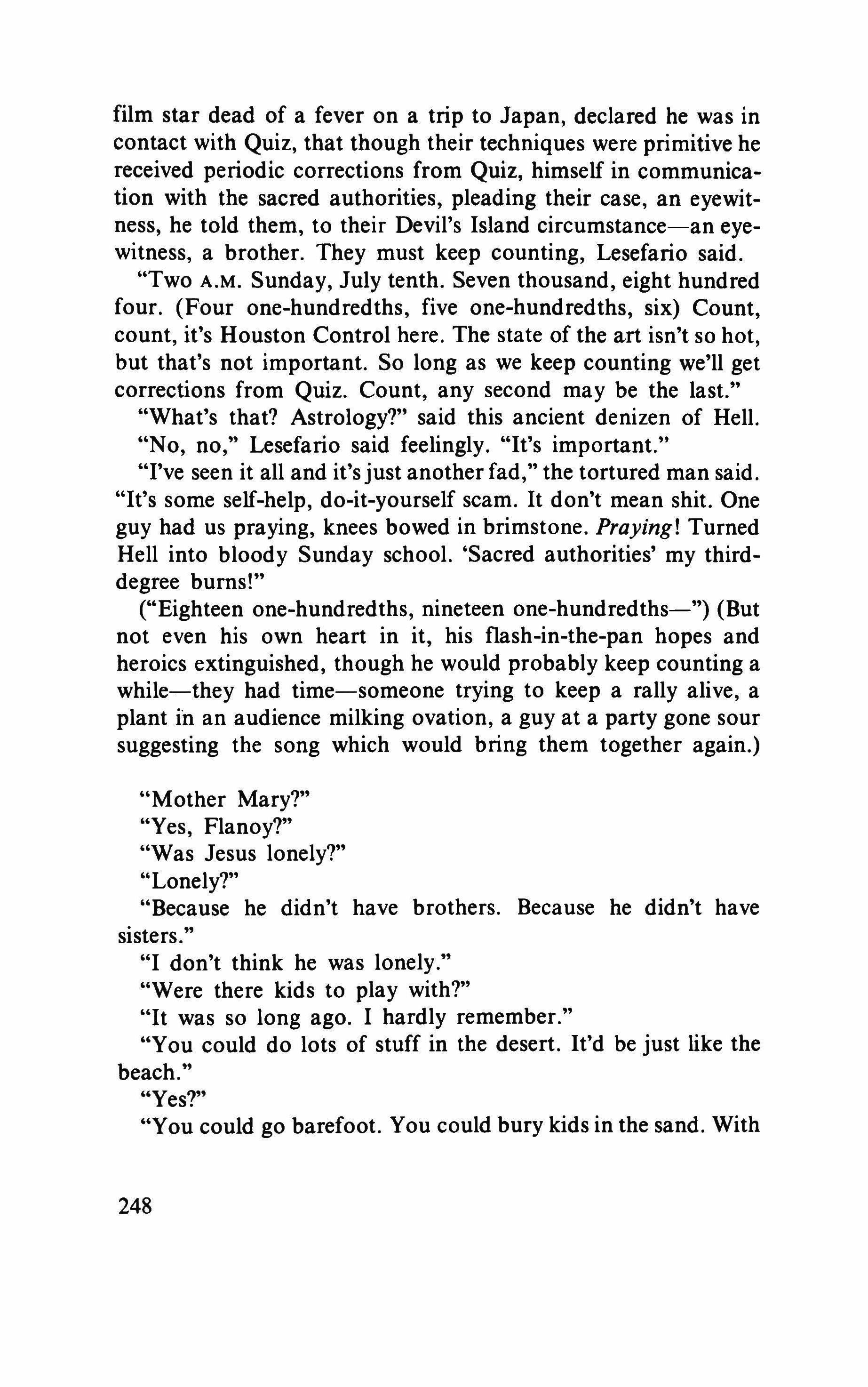
film star dead of a fever on a trip to Japan, declared he was in contact with Quiz, that though their techniques were primitive he received periodic corrections from Quiz, himself in communication with the sacred authorities, pleading their case, an eyewitness, he told them, to their Devil's Island circumstance-an eyewitness, a brother. They must keep counting, Lesefario said.
"Two A.M. Sunday, July tenth. Seven thousand, eight hundred four. (Pour one-hundredths, five one-hundredths, six) Count, count, it's Houston Control here. The state of the art isn't so hot, but that's not important. So long as we keep counting we'll get corrections from Quiz. Count, any second may be the last."
"What's that? Astrology?" said this ancient denizen of Hell.
"No, no," Lesefario said feelingly. "It's important."
"I've seen it all and it's just another fad," the tortured man said. "It's some self-help, do-it-yourself scam. It don't mean shit. One guy had us praying, knees bowed in brimstone. Praying! Turned Hell into bloody Sunday school. 'Sacred authorities' my thirddegree burns!"
("Eighteen one-hundredths, nineteen one-hundredths-") (But not even his own heart in it, his flash-in-the-pan hopes and heroics extinguished, though he would probably keep counting a while-they had time-someone trying to keep a rally alive, a plant in an audience milking ovation, a guy at a party gone sour suggesting the song which would bring them together again.)
"Mother Mary?"
"Yes, Flanoy?"
"Was Jesus lonely?"
"Lonely?"
"Because he didn't have brothers. Because he didn't have sisters."
"I don't think he was lonely."
"Were there kids to play with?"
"It was so long ago. I hardly remember."
"You could do lots of stuff in the desert. It'd be just like the beach."
"Yes?"
"You could go barefoot. You could bury kids in the sand. With
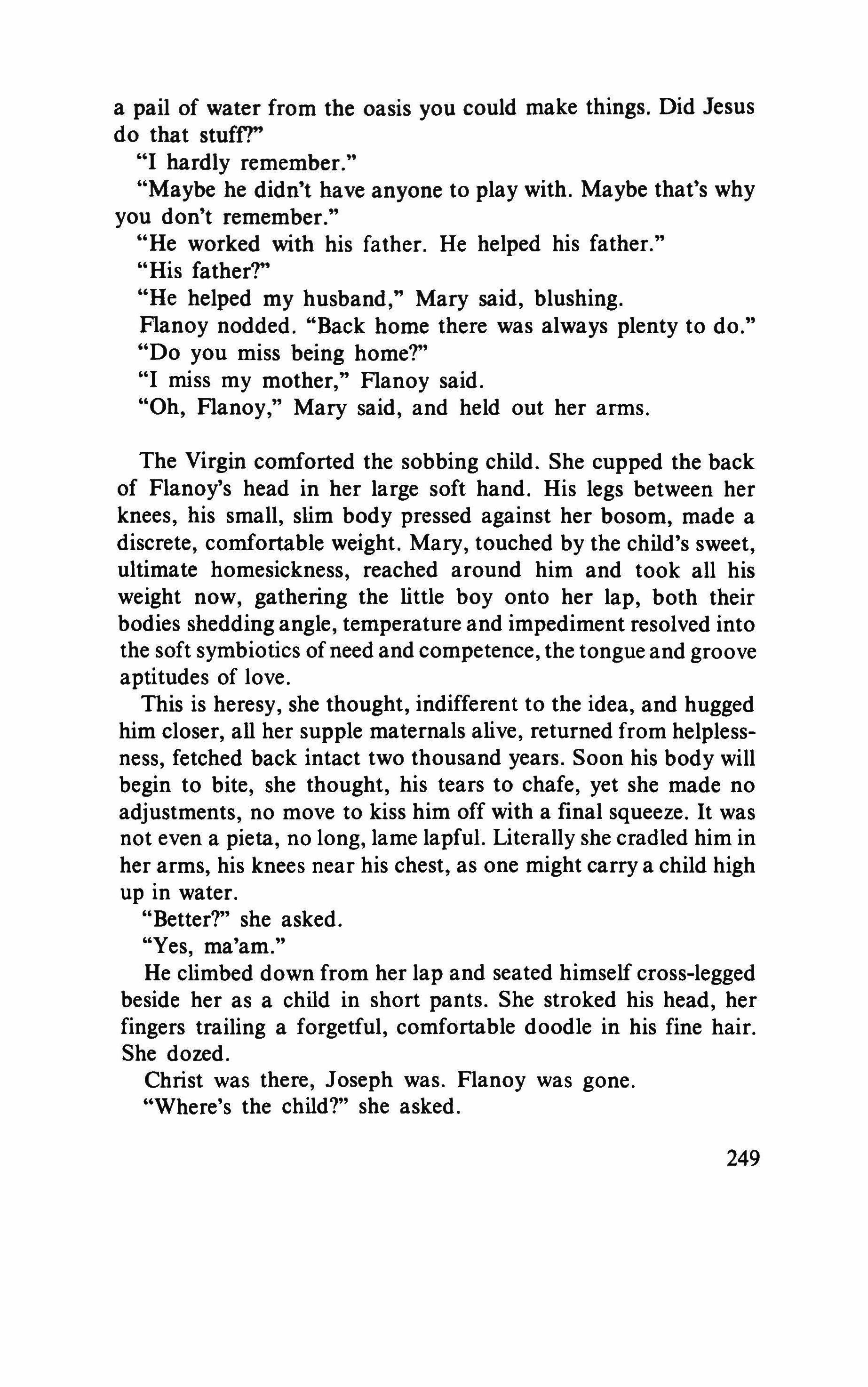
a pail of water from the oasis you could make things. Did Jesus do that stuff!"
"I hardly remember."
"Maybe he didn't have anyone to play with. Maybe that's why you don't remember."
"He worked with his father. He helped his father."
"His father?"
"He helped my husband," Mary said, blushing. Flanoy nodded. "Back home there was always plenty to do."
"Do you miss being home?"
"I miss my mother," Flanoy said.
"Oh, Flanoy," Mary said, and held out her arms.
The Virgin comforted the sobbing child. She cupped the back of Flanoy's head in her large soft hand. His legs between her knees, his small, slim body pressed against her bosom, made a discrete, comfortable weight. Mary, touched by the child's sweet, ultimate homesickness, reached around him and took all his weight now, gathering the little boy onto her lap, both their bodies shedding angle, temperature and impediment resolved into the soft symbiotics of need and competence, the tongue and groove aptitudes of love.
This is heresy, she thought, indifferent to the idea, and hugged him closer, all her supple maternals alive, returned from helplessness, fetched back intact two thousand years. Soon his body will begin to bite, she thought, his tears to chafe, yet she made no adjustments, no move to kiss him off with a final squeeze. It was not even a pieta, no long, lame lapful. Literally she cradled him in her arms, his knees near his chest, as one might carry a child high up in water.
"Better?" she asked.
"Yes, ma'am."
He climbed down from her lap and seated himself cross-legged beside her as a child in short pants. She stroked his head, her fingers trailing a forgetful, comfortable doodle in his fine hair. She dozed.
Christ was there, Joseph was. Flanoy was gone.
"Where's the child?" she asked.
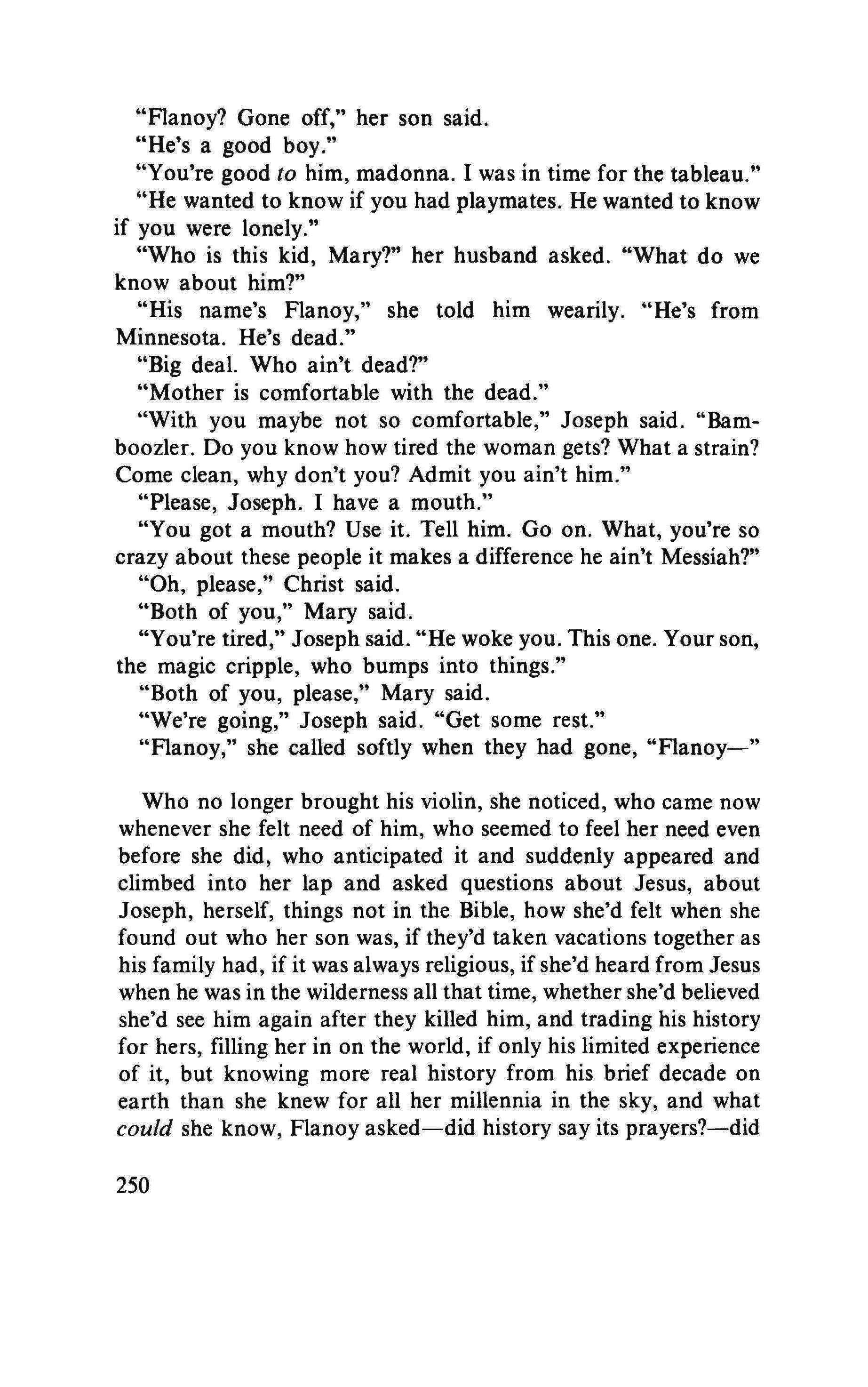
"Flanoy? Gone off," her son said.
"He's a good boy."
"You're good to him, madonna. I was in time for the tableau."
"He wanted to know if you had playmates. He wanted to know if you were lonely."
"Who is this kid, Mary?" her husband asked. "What do we know about him?"
"His name's Flanoy," she told him wearily. "He's from Minnesota. He's dead."
"Big deal. Who ain't dead?"
"Mother is comfortable with the dead."
"With you maybe not so comfortable," Joseph said. "BamboozIer. Do you know how tired the woman gets? What a strain? Come clean, why don't you? Admit you ain't him."
"Please, Joseph. I have a mouth."
"You got a mouth? Use it. Tell him. Go on. What, you're so crazy about these people it makes a difference he ain't Messiah?"
"Oh, please," Christ said.
"Both of you," Mary said.
"You're tired," Joseph said. "He woke you. This one. Your son, the magic cripple, who bumps into things."
"Both of you, please," Mary said.
"We're going," Joseph said. "Get some rest."
"Flanoy," she called softly when they had gone, "Flanoy-"
Who no longer brought his violin, she noticed, who came now whenever she felt need of him, who seemed to feel her need even before she did, who anticipated it and suddenly appeared and climbed into her lap and asked questions about Jesus, about Joseph, herself, things not in the Bible, how she'd felt when she found out who her son was, if they'd taken vacations together as his family had, if it was always religious, if she'd heard from Jesus when he was in the wilderness all that time, whether she'd believed she'd see him again after they killed him, and trading his history for hers, filling her in on the world, if only his limited experience of it, but knowing more real history from his brief decade on earth than she knew for all her millennia in the sky, and what could she know, Flanoy asked-did history say its prayers?-did
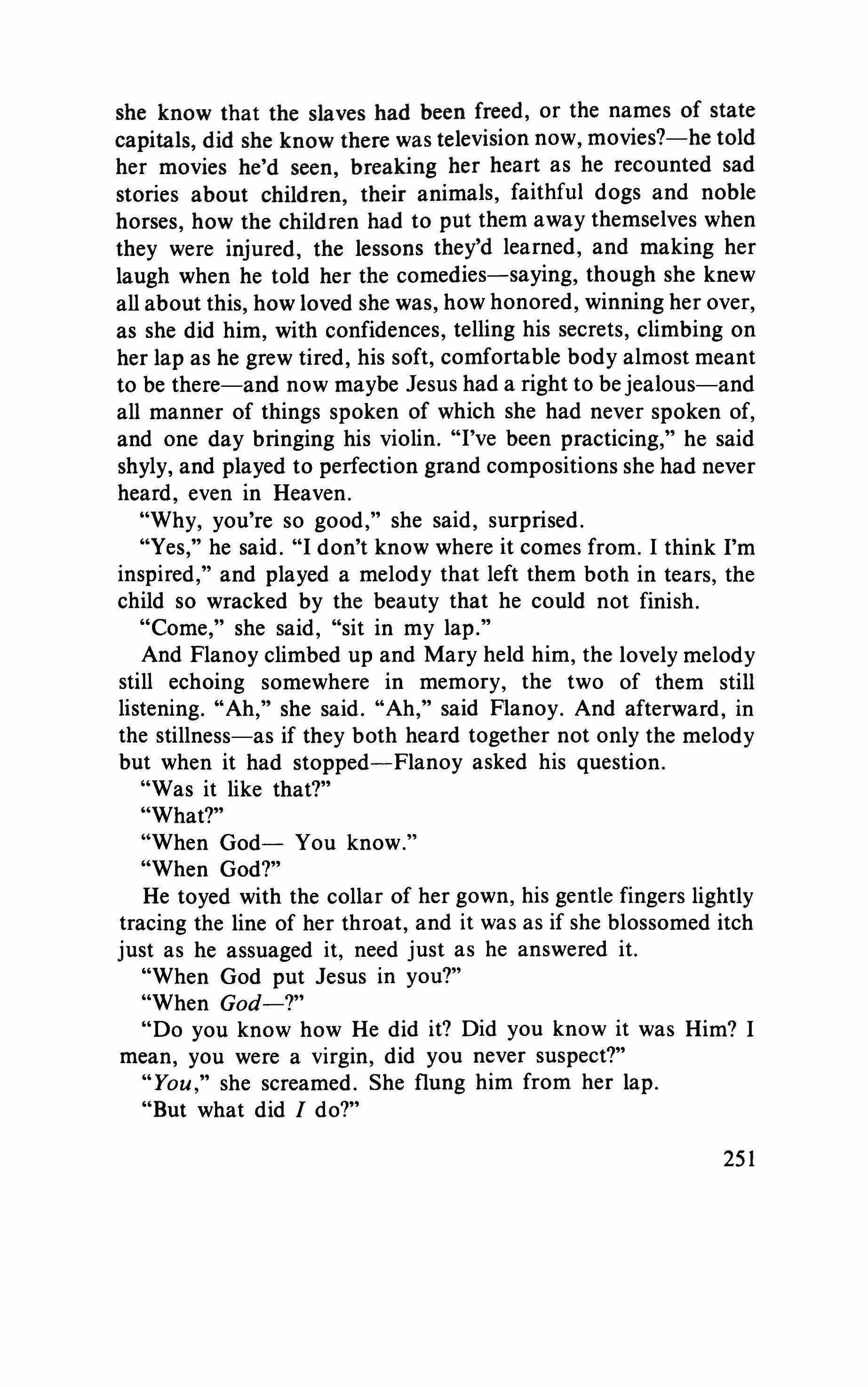
she know that the slaves had been freed, or the names of state capitals, did she know there was television now, movies?-he told her movies he'd seen, breaking her heart as he recounted sad stories about children, their animals, faithful dogs and noble horses, how the children had to put them away themselves when they were injured, the lessons they'd learned, and making her laugh when he told her the comedies-saying, though she knew all about this, how loved she was, how honored, winning her over, as she did him, with confidences, telling his secrets, climbing on her lap as he grew tired, his soft, comfortable body almost meant to be there-and now maybe Jesus had a right to bejealous-and all manner of things spoken of which she had never spoken of, and one day bringing his violin. "I've been practicing," he said shyly, and played to perfection grand compositions she had never heard, even in Heaven.
"Why, you're so good," she said, surprised. "Yes," he said. "I don't know where it comes from. I think I'm inspired," and played a melody that left them both in tears, the child so wracked by the beauty that he could not finish.
"Come," she said, "sit in my lap."
And Flanoy climbed up and Mary held him, the lovely melody still echoing somewhere in memory, the two of them still listening. "Ah," she said. "Ah," said Flanoy. And afterward, in the stillness-as if they both heard together not only the melody but when it had stopped-Flanoy asked his question.
"Was it like that?"
"What?"
"When God- You know."
"When God?"
He toyed with the collar of her gown, his gentle fingers lightly tracing the line of her throat, and it was as if she blossomed itch just as he assuaged it, need just as he answered it.
"When God put Jesus in you?"
"When God-?"
"Do you know how He did it? Did you know it was Him? I mean, you were a virgin, did you never suspect?"
"You," she screamed. She flung him from her lap.
"But what did I do?"

"You're at me again. Wasn't one time enough?"
"What did I do?" Flanoy asked, crying. "I didn't do anything. What did I do?" he sobbed, and ran from the room.
"I'm carrying His child!" screamed the Virgin Mary.
God gave a gala, a levee at the Lord's.
All Heaven turned out. "Gimrne," He said, "that old-time religion." His audience beamed. They cheered, they ate it up. They nudged each other in Paradise. "What did I tell you?" He demanded over their enthusiasm. "It's terrific, isn't it? I told you it would be terrific. All you ever had to do was play nice. Are you disappointed? Is this Heaven? Is this God's country? In your wildest dreams-let Me hear it. Good-in your wildest dreams, did you dream such a Treasury, this museum Paradise? Did you dream My thrones and dominions, My angels in flyover? My seraphim disporting like dolphins, tumbling God's sky in high Heaven's high acrobacy? Did you imagine the miracles casual as card tricks, or ever suspect free lunch could taste so good? They should see you now, eh? They should see you now, trembling in rapture like neurological rut. Delicious, correct? Piety a la mode! That's it, that's right. Sing hallelujah! Sing Hizzoner's hosannas, Jehovah's gee whiz! Well," God said, "that's enough, that will do." He looked toward the Holy Family, studying them for a moment. "Not like the creche, eh?" He said. "Well is it? Is it?" He demanded of Jesus.
"No," Christ said softly.
"No," God said, "not like the creche. Just look at this placethe dancing waters and indirect lighting. I could put gambling in here, off-track betting. Oh, oh, My costume jewelry ways, My game show vision. Well, it's the public. You've got to give it what it wants. Yes, Jesus?"
"Yes," Jesus said.
"It just doesn't look lived in, is that what you think?"
"Call on someone else," Christ said.
"Sure," God said. "I'm Hero of Heaven. I call on Myself."
That was when He began His explanations. He revealed the secrets of books, of pictures and music, telling them all manner of things-why marches were less rousing than waltzes, lieder more stirring than scat, why landscapes were to be preferred over 252
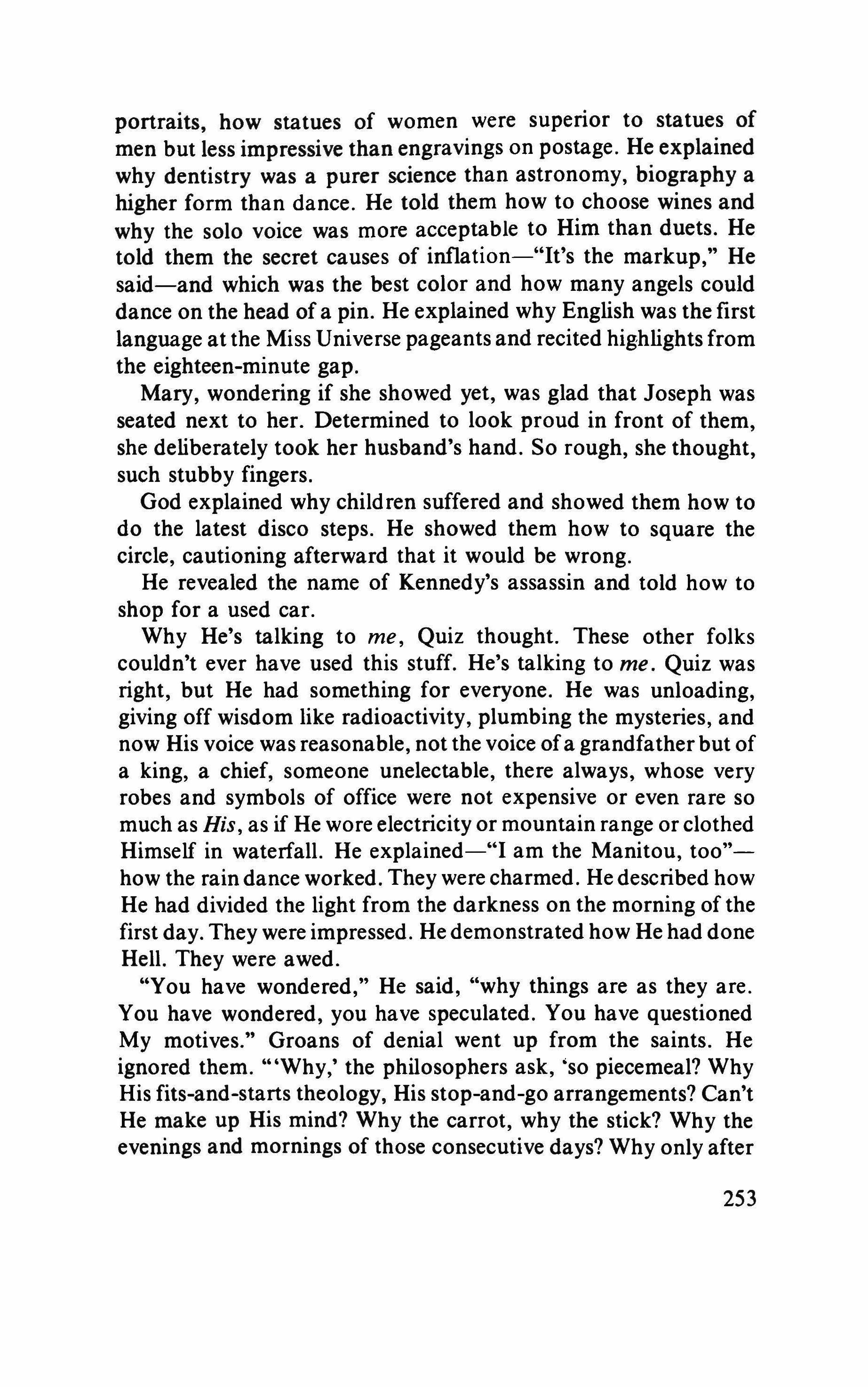
portraits, how statues of women were superior to statues of men but less impressive than engravings on postage. He explained why dentistry was a purer science than astronomy, biography a higher form than dance. He told them how to choose wines and why the solo voice was more acceptable to Him than duets. He told them the secret causes of inflation-"It's the markup," He said-and which was the best color and how many angels could dance on the head of a pin. He explained why English was the first language at the Miss Universe pageants and recited highlights from the eighteen-minute gap.
Mary, wondering if she showed yet, was glad that Joseph was seated next to her. Determined to look proud in front of them, she deliberately took her husband's hand. So rough, she thought, such stubby fingers.
God explained why children suffered and showed them how to do the latest disco steps. He showed them how to square the circle, cautioning afterward that it would be wrong.
He revealed the name of Kennedy's assassin and told how to shop for a used car.
Why He's talking to me, Quiz thought. These other folks couldn't ever have used this stuff. He's talking to me. Quiz was right, but He had something for everyone. He was unloading, giving off wisdom like radioactivity, plumbing the mysteries, and now His voice was reasonable, not the voice of a grandfather but of a king, a chief, someone unelectable, there always, whose very robes and symbols of office were not expensive or even rare so much as His, as if He wore electricity or mountain range or clothed Himself in waterfall. He explained-"I am the Manitou, too"how the rain dance worked. They were charmed. He described how He had divided the light from the darkness on the morning of the first day. They were impressed. He demonstrated how He had done Hell. They were awed.
"You have wondered," He said, "why things are as they are. You have wondered, you have speculated. You have questioned My motives." Groans of denial went up from the saints. He ignored them. '''Why,' the philosophers ask, 'so piecemeal? Why His fits-and-starts theology, His stop-and-go arrangements? Can't He make up His mind? Why the carrot, why the stick? Why the evenings and mornings of those consecutive days? Why only after 253
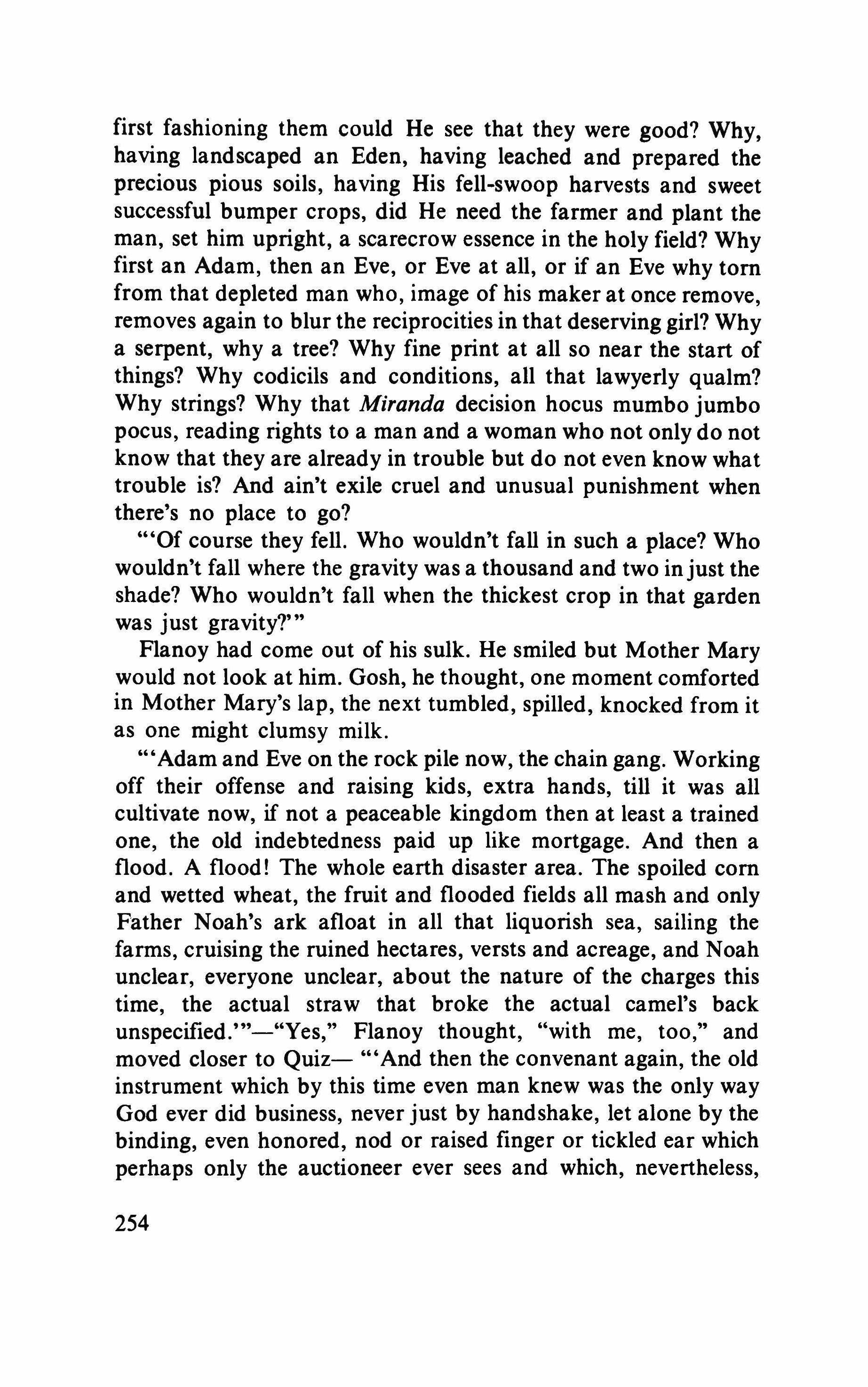
first fashioning them could He see that they were good? Why, having landscaped an Eden, having leached and prepared the precious pious soils, having His fell-swoop harvests and sweet successful bumper crops, did He need the farmer and plant the man, set him upright, a scarecrow essence in the holy field? Why first an Adam, then an Eve, or Eve at all, or if an Eve why tom from that depleted man who, image of his maker at once remove, removes again to blur the reciprocities in that deserving girl? Why a serpent, why a tree? Why fine print at all so near the start of things? Why codicils and conditions, all that lawyerly qualm? Why strings? Why that Miranda decision hocus mumbo jumbo pocus, reading rights to a man and a woman who not only do not know that they are already in trouble but do not even know what trouble is? And ain't exile cruel and unusual punishment when there's no place to go?
'''Of course they fell. Who wouldn't fall in such a place? Who wouldn't fall where the gravity was a thousand and two injust the shade? Who wouldn't fall when the thickest crop in that garden was just gravity?"
Flanoy had come out of his sulk. He smiled but Mother Mary would not look at him. Gosh, he thought, one moment comforted in Mother Mary's lap, the next tumbled, spilled, knocked from it as one might clumsy milk.
"'Adam and Eve on the rock pile now, the chain gang. Working off their offense and raising kids, extra hands, till it was all cultivate now, if not a peaceable kingdom then at least a trained one, the old indebtedness paid up like mortgage. And then a flood. A flood! The whole earth disaster area. The spoiled com and wetted wheat, the fruit and flooded fields all mash and only Father Noah's ark afloat in all that liquorish sea, sailing the farms, cruising the ruined hectares, versts and acreage, and Noah unclear, everyone unclear, about the nature of the charges this time, the actual straw that broke the actual camel's back unspecified."'-"Yes," Flanoy thought, "with me, too," and moved closer to Quiz- "'And then the convenant again, the old instrument which by this time even man knew was the only way God ever did business, never just by handshake, let alone by the binding, even honored, nod or raised finger or tickled ear which perhaps only the auctioneer ever sees and which, nevertheless,
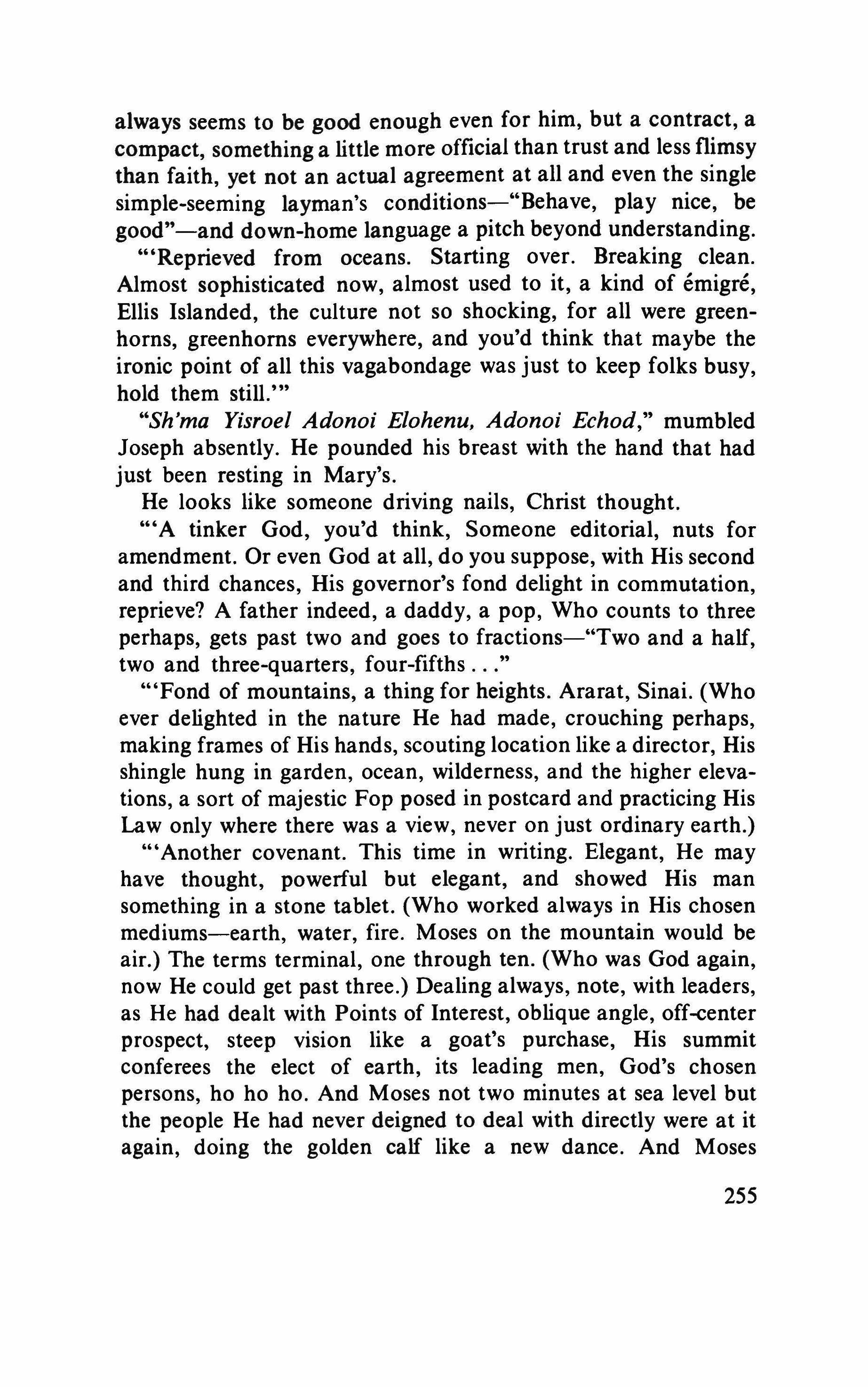
always seems to be good enough even for him, but a contract, a compact, something a little more official than trust and less flimsy than faith, yet not an actual agreement at all and even the single simple-seeming layman's conditions-"Behave, play nice, be good"-and down-home language a pitch beyond understanding.
'''Reprieved from oceans. Starting over. Breaking clean. Almost sophisticated now, almost used to it, a kind of emigre, Ellis Islanded, the culture not so shocking, for all were greenhorns, greenhorns everywhere, and you'd think that maybe the ironic point of all this vagabondage was just to keep folks busy, hold them still."
"Sh'ma Yisroel Adonoi Elohenu, Adonoi Echod," mumbled Joseph absently. He pounded his breast with the hand that had just been resting in Mary's.
He looks like someone driving nails, Christ thought.
A tinker God, you'd think, Someone editorial, nuts for amendment. Or even God at all, do you suppose, with His second and third chances, His governor's fond delight in commutation, reprieve? A father indeed, a daddy, a pop, Who counts to three perhaps, gets past two and goes to fractions-"Two and a half, two and three-quarters, four-fifths
"'Fond of mountains, a thing for heights. Ararat, Sinai. (Who ever delighted in the nature He had made, crouching perhaps, making frames of His hands, scouting location like a director, His shingle hung in garden, ocean, wilderness, and the higher elevations, a sort of majestic Fop posed in postcard and practicing His Law only where there was a view, never on just ordinary earth.)
"'Another covenant. This time in writing. Elegant, He may have thought, powerful but elegant, and showed His man something in a stone tablet. (Who worked always in His chosen mediums-earth, water, fire. Moses on the mountain would be air.) The terms terminal, one through ten. (Who was God again, now He could get past three.) Dealing always, note, with leaders, as He had dealt with Points of Interest, oblique angle, off-center prospect, steep vision like a goat's purchase, His summit conferees the elect of earth, its leading men, God's chosen persons, ho ho ho. And Moses not two minutes at sea level but the people He had never deigned to deal with directly were at it again, doing the golden calf like a new dance. And Moses
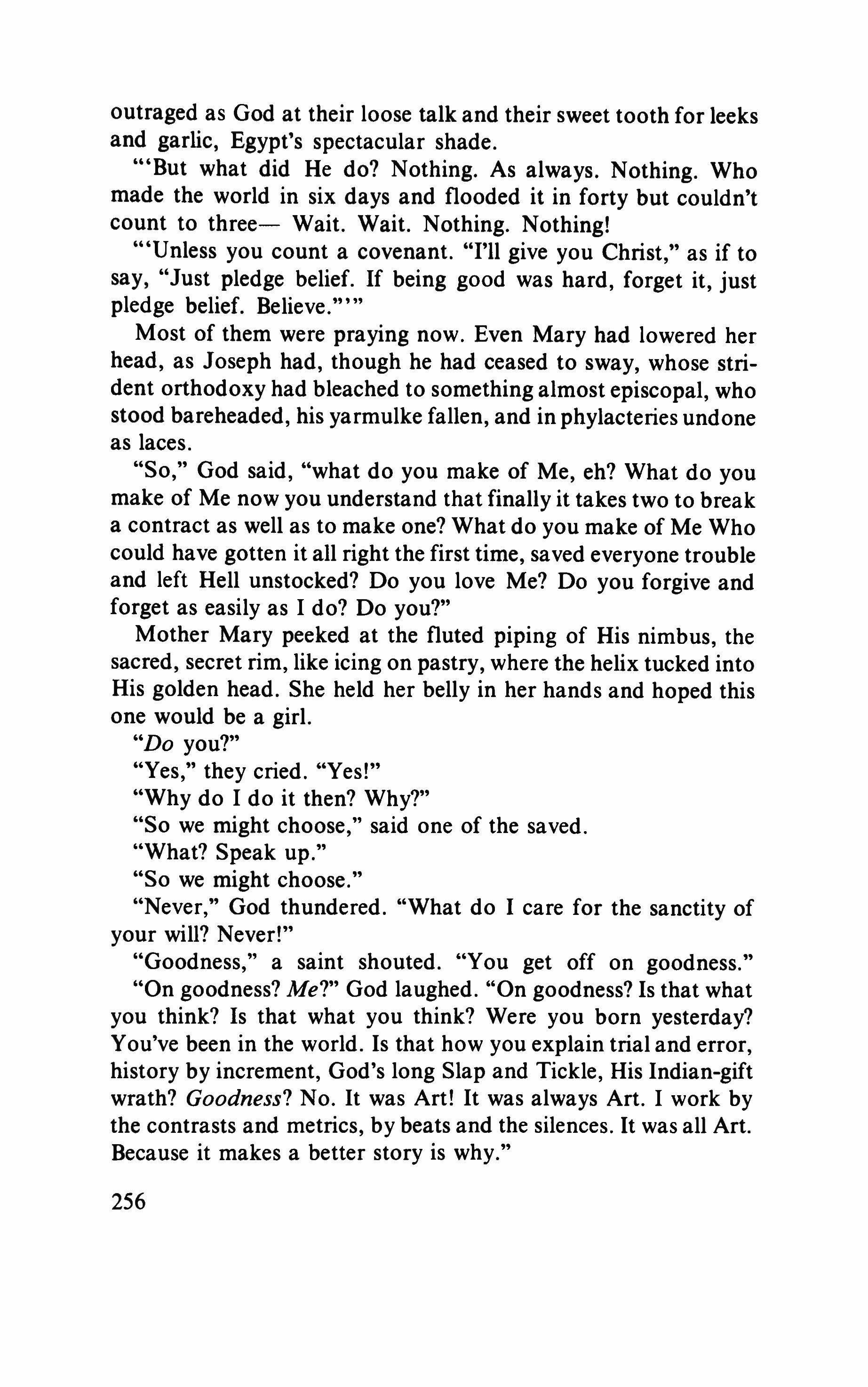
outraged as God at their loose talk and their sweet tooth for leeks and garlic, Egypt's spectacular shade.
'''But what did He do? Nothing. As always. Nothing. Who made the world in six days and flooded it in forty but couldn't count to three- Wait. Wait. Nothing. Nothing!
'''Unless you count a covenant. "I'll give you Christ," as if to say, "Just pledge belief. If being good was hard, forget it, just pledge belief. Believe."'"
Most of them were praying now. Even Mary had lowered her head, as Joseph had, though he had ceased to sway, whose strident orthodoxy had bleached to something almost episcopal, who stood bareheaded, his yarmulke fallen, and in phylacteries undone as laces.
"So," God said, "what do you make of Me, eh? What do you make of Me now you understand that finally it takes two to break a contract as well as to make one? What do you make of Me Who could have gotten it all right the first time, saved everyone trouble and left Hell unstocked? Do you love Me? Do you forgive and forget as easily as I do? Do you?"
Mother Mary peeked at the fluted piping of His nimbus, the sacred, secret rim, like icing on pastry, where the helix tucked into His golden head. She held her belly in her hands and hoped this one would be a girl.
"Do you?"
"Yes," they cried. "Yes!"
"Why do I do it then? Why?"
"So we might choose," said one of the saved.
"What? Speak up."
"So we might choose."
"Never," God thundered. "What do I care for the sanctity of your will? Never!"
"Goodness," a saint shouted. "You get off on goodness."
"On goodness? Me?" God laughed. "On goodness? Is that what you think? Is that what you think? Were you born yesterday? You've been in the world. Is that how you explain trial and error, history by increment, God's long Slap and Tickle, His Indian-gift wrath? Goodness? No. It was Art! It was always Art. I work by the contrasts and metrics, by beats and the silences. It was all Art. Because it makes a better story is why."
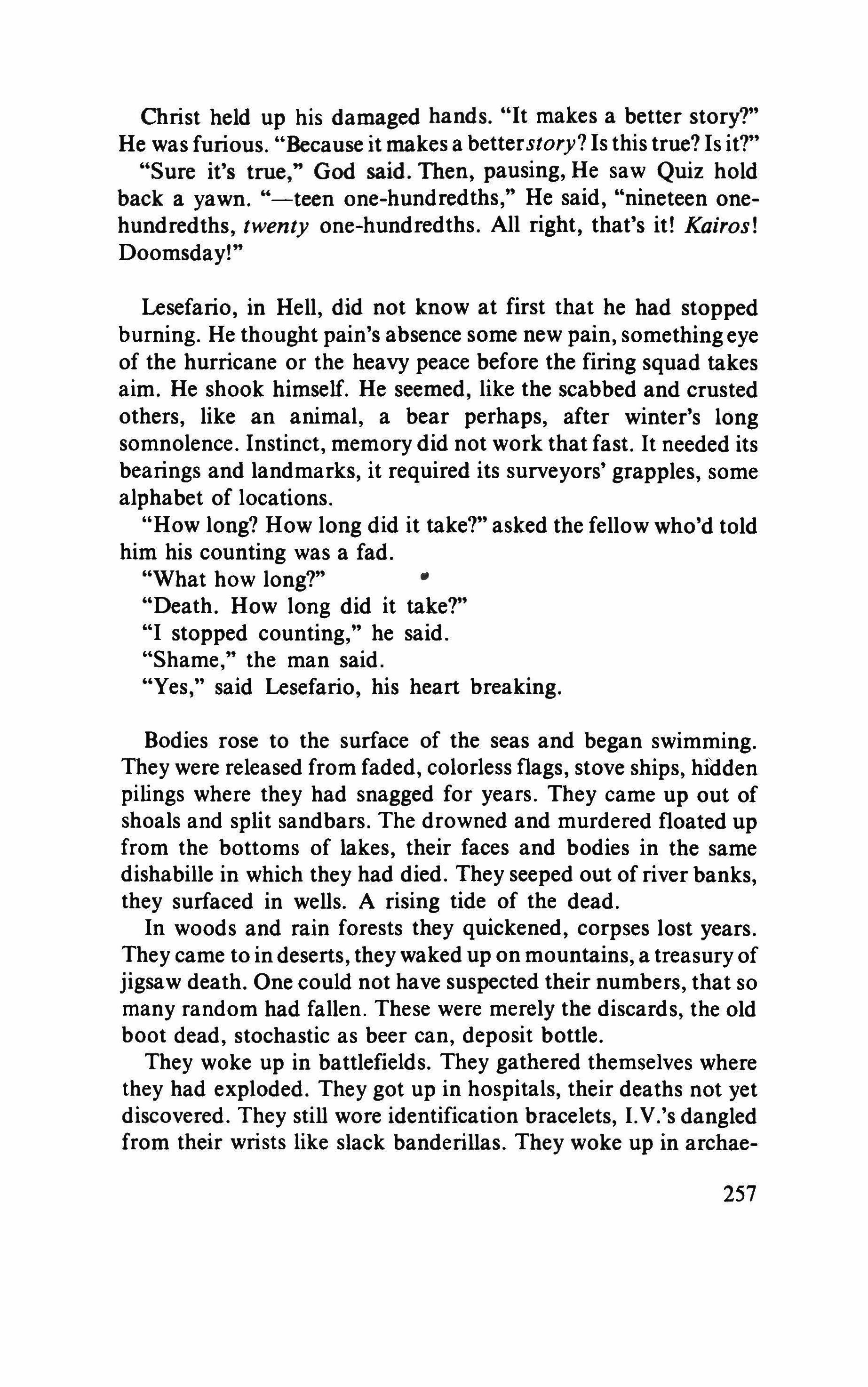
Christ held up his damaged hands. "It makes a better story?" He was furious. "Because it makes a betterstory? Is this true? Is it?"
"Sure it's true," God said. Then, pausing, He saw Quiz hold back a yawn. "-teen one-hundredths," He said, "nineteen onehundredths, twenty one-hundredths. All right, that's it! Kairost Doomsday!"
Lesefario, in Hell, did not know at first that he had stopped burning. He thought pain's absence some new pain, something eye of the hurricane or the heavy peace before the firing squad takes aim. He shook himself. He seemed, like the scabbed and crusted others, like an animal, a bear perhaps, after winter's long somnolence. Instinct, memory did not work that fast. It needed its bearings and landmarks, it required its surveyors' grapples, some alphabet of locations.
"How long? How long did it take?" asked the fellow who'd told him his counting was a fad.
"What how long?"
"Death. How long did it take?"
"I stopped counting," he said.
"Shame," the man said.
"Yes," said Lesefario, his heart breaking.
Bodies rose to the surface of the seas and began swimming. They were released from faded, colorless flags, stove ships, hidden pilings where they had snagged for years. They came up out of shoals and split sandbars. The drowned and murdered floated up from the bottoms of lakes, their faces and bodies in the same dishabille in which they had died. They seeped out of river banks, they surfaced in wells. A rising tide of the dead.
In woods and rain forests they quickened, corpses lost years. They came to in deserts, they waked up on mountains, a treasury of jigsaw death. One could not have suspected their numbers, that so many random had fallen. These were merely the discards, the old boot dead, stochastic as beer can, deposit bottle.
They woke up in battlefields. They gathered themselves where they had exploded. They got up in hospitals, their deaths not yet discovered. They still wore identification bracelets, I.V.'s dangled from their wrists like slack banderillas. They woke up in archae-
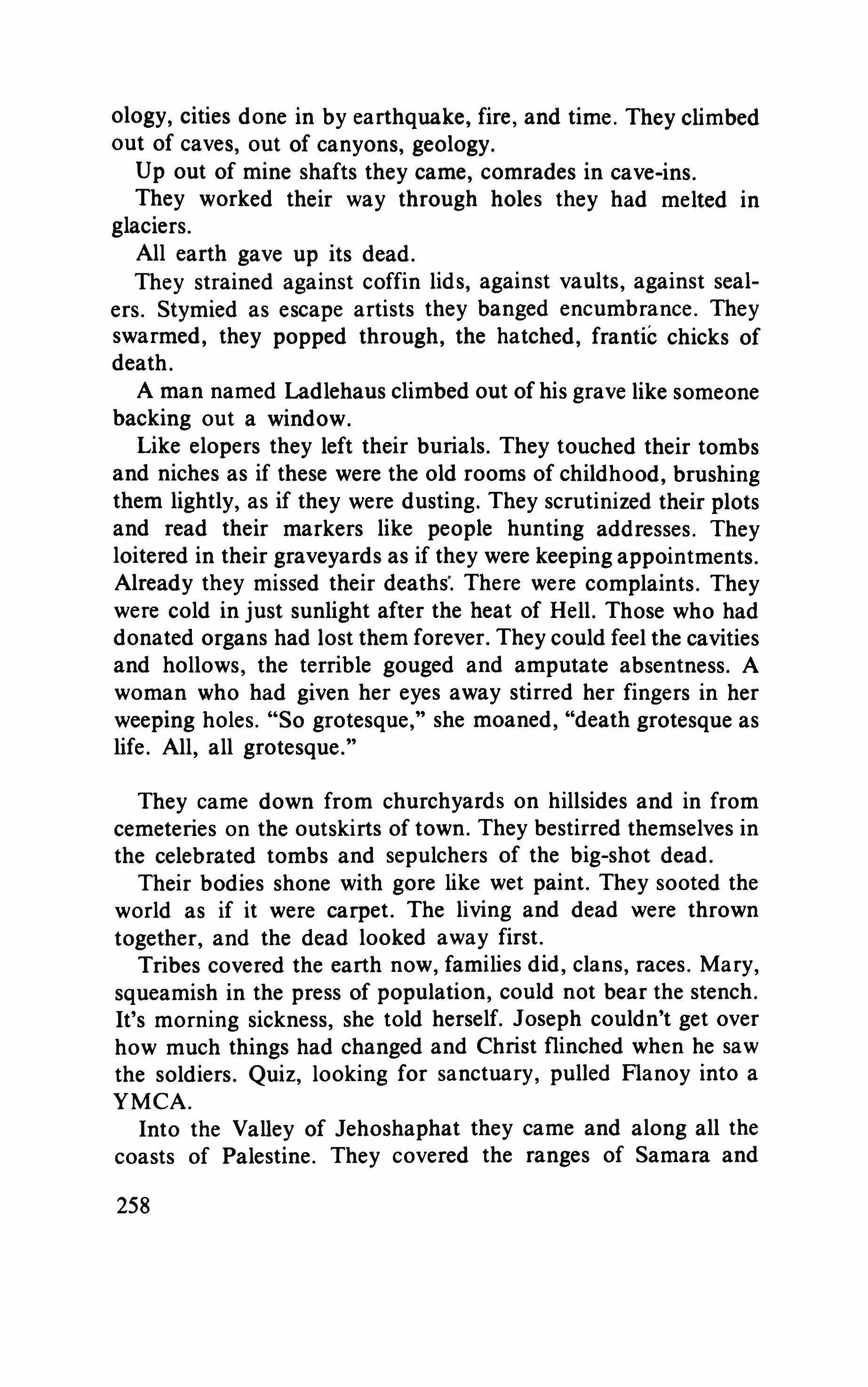
ology, cities done in by earthquake, fire, and time. They climbed out of caves, out of canyons, geology.
Up out of mine shafts they came, comrades in cave-ins.
They worked their way through holes they had melted in glaciers.
All earth gave up its dead.
They strained against coffin lids, against vaults, against sealers. Stymied as escape artists they banged encumbrance. They swarmed, they popped through, the hatched, frantic chicks of death.
A man named Ladlehaus climbed out of his grave like someone backing out a window.
Like elopers they left their burials. They touched their tombs and niches as if these were the old rooms of childhood, brushing them lightly, as if they were dusting. They scrutinized their plots and read their markers like people hunting addresses. They loitered in their graveyards as if they were keeping appointments. Already they missed their deaths'. There were complaints. They were cold in just sunlight after the heat of Hell. Those who had donated organs had lost them forever. They could feel the cavities and hollows, the terrible gouged and amputate absentness. A woman who had given her eyes away stirred her fingers in her weeping holes. "So grotesque," she moaned, "death grotesque as life. All, all grotesque."
They came down from churchyards on hillsides and in from cemeteries on the outskirts of town. They bestirred themselves in the celebrated tombs and sepulchers of the big-shot dead. Their bodies shone with gore like wet paint. They sooted the world as if it were carpet. The living and dead were thrown together, and the dead looked away first.
Tribes covered the earth now, families did, clans, races. Mary, squeamish in the press of population, could not bear the stench. It's morning sickness, she told herself. Joseph couldn't get over how much things had changed and Christ flinched when he saw the soldiers. Quiz, looking for sanctuary, pulled Flanoy into a YMCA.
Into the Valley of Jehoshaphat they came and along all the coasts of Palestine. They covered the ranges of Samara and 258
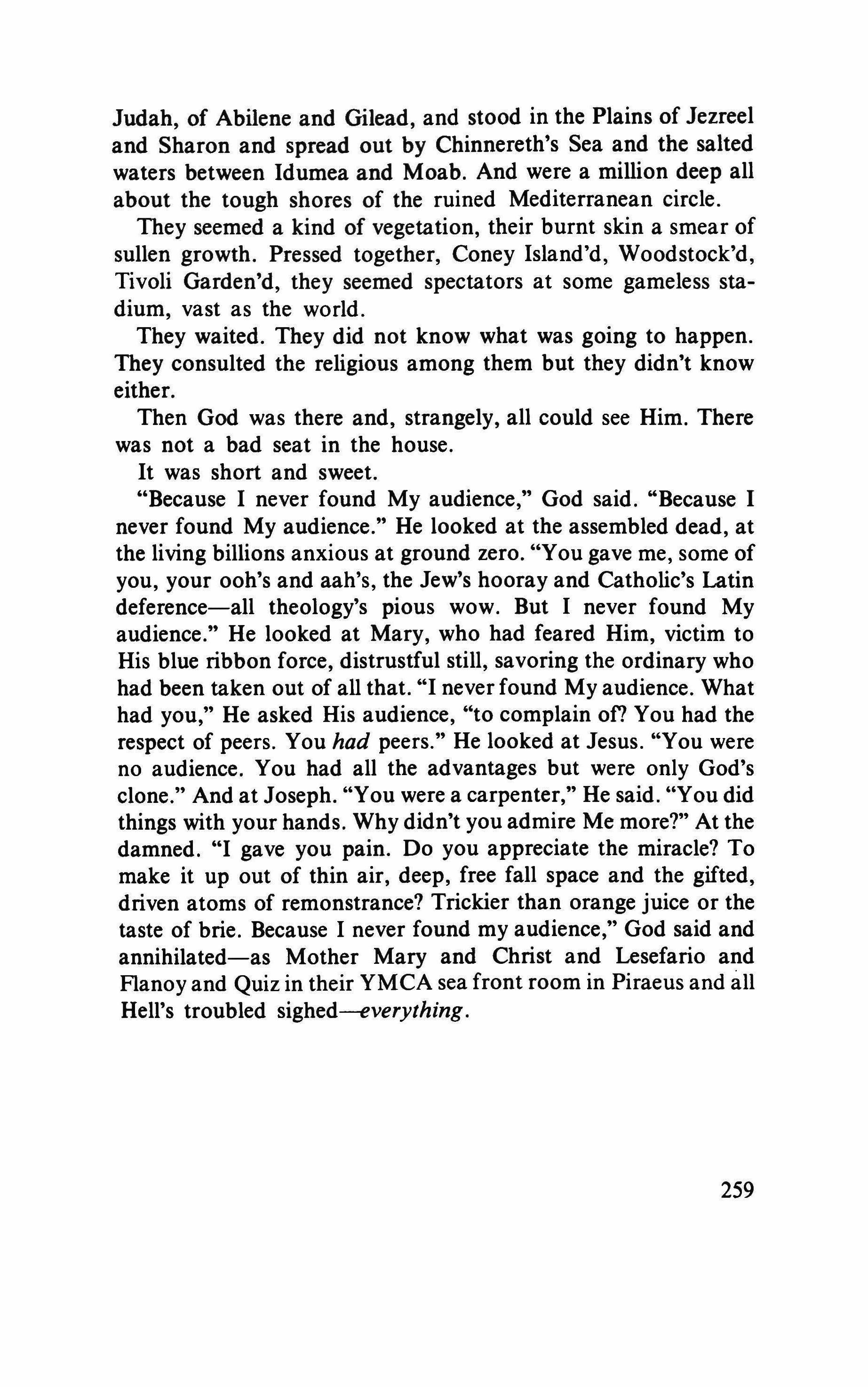
Judah, of Abilene and Gilead, and stood in the Plains of Jezreel and Sharon and spread out by Chinnereth's Sea and the salted waters between Idumea and Moab. And were a million deep all about the tough shores of the ruined Mediterranean circle.
They seemed a kind of vegetation, their burnt skin a smear of sullen growth. Pressed together, Coney Island'd, Woodstock'd, Tivoli Garden'd, they seemed spectators at some gameless stadium, vast as the world.
They waited. They did not know what was going to happen. They consulted the religious among them but they didn't know either.
Then God was there and, strangely, all could see Him. There was not a bad seat in the house.
It was short and sweet.
"Because 1 never found My audience," God said. "Because 1 never found My audience." He looked at the assembled dead, at the living billions anxious at ground zero. "You gave me, some of you, your ooh's and aah's, the Jew's hooray and Catholic's Latin deference-all theology's pious wow. But 1 never found My audience." He looked at Mary, who had feared Him, victim to His blue ribbon force, distrustful still, savoring the ordinary who had been taken out of all that. "I never found My audience. What had you," He asked His audience, "to complain of! You had the respect of peers. You had peers." He looked at Jesus. "You were no audience. You had all the advantages but were only God's clone." And at Joseph. "You were a carpenter," He said. "You did things with your hands. Why didn't you admire Me more?" At the damned. "I gave you pain. Do you appreciate the miracle? To make it up out of thin air, deep, free fall space and the gifted, driven atoms of remonstrance? Trickier than orange juice or the taste of brie. Because 1 never found my audience," God said and annihilated-as Mother Mary and Christ and Lesefario and Flanoyand Quiz in their YMCA sea front room in Piraeus and all Hell's troubled sighed---everything.

Fine sale books at 50-90% off list price
BOTTOM DOGS, FROM FLUSHING TO CALVARY, THOSE WHO PERISH
Edward Dahlberg, (pap) 5.95 1.49
An omnibus volume of Dahlberg's great novels of the 30s. (Min.rva)
THE FALL INTO TIME
E.M. Cioran. 5.95
THE NEW GODS
E.M. Cioran. 5.95 1.98
THE TEMPTATION TO EXIST
E.M. Cioran. (pap) 3.95 1.00
Philosophy with "all the beauty of pressed leaves, petals shut off from their odors, yet what is retained has its own emotion, & here it is powerful & sustained."··W.H. Gass. (Quad)
REBIRTH OF COSMOLOGY
J. Merteau-Ponrv. 12.50 2.98
An extraordinary account of man's attempt to understand the structures of knowledge & the universe. (RH)
OF MORTAL LOVE
William Gerhardie. 7.95 1.98
THE POLYGLOTS
William Gerhardie. 7.95 1.98
PRETTY CREATURES
William Gerhardie. 8.95 1.98
New, definitive editions of Gerhardie's great novels from the 205 &: 305. "He is a comic writer of genius but his art is profoundly serious."·-c.P. Snow. (St. Martin's)
BIOLOGY & THE FUTURE OF MAN
Ptullp Handler, ed. 12.50 3.98
A one-veturne encyclopedia on the subject, jargonless, provocative, and living up to its own best intentions. (Oxford)
DOSTOEVSKY: Reminiscences
Anna Dostoevsky. (pap) 5.95 1.98
Dostoevsky's daughter's memoir is "indispensable, uniquely intimate & revealing. the simple, glowing history of a great love. "-Helen Muchnic. (Liv.right)
DOSTOEVSKY'S NOTEBOOKS FOR'A RAW YOUTH'
Wasiolek, ed. Terras, tr. 15.00 3.98
"One feels like an eavesdropper on Dostoevsky's artistic self-communings.: ···E.J. Simmons, NYTBR. (Chi)
PIRANDELLO
Gaspar. Giudice. 12.95 2.98
The first biography to appear in English of the great Italian playwright. (Oxford)
A SCANDALOUS WOMAN & Other
Stories
Edna O'Brien. 6.95 "In ,111 these stories, O'Brien writes with extraordinary effectiveness & power ··Anthony West. (HBl)
LETTERS ON LITERATURE & POLITICS: 1912·1972
Edmund Wilson. 20.00 7.98 Wilson's greatness shmes through in his leners. (FSG)
T. S. ELIOT
Stephen Spender. 8.95 3.98 "undoubtedly the best introduction to the poet yet published."--C.B.Cox, Sunday Telegraph. (Viking)
SELECTED STORIES
Nadine Gordimer. 10.00 2.98
She's "one of the half-dozen best short story writers in English today." --A. Twaite, Observer. (Viking)
CELINE
Patrick McCarthy. 10.00
"beautifully written at last Celine has found his biographer."-·New Society. (Viking)
EZRA POUND
Donald Davie. 7.95
"As this new Pound book proves, (Davie) must be one of the finest poet-crltlcs since the death of Randall Jarr.II.'···Robert lowell. (Viking)
DREAM JOURNEY
James Hanley. 9.95 1.98
"There is no English novelist writing today to compare to James Hanley." -NYTimes. (Horizon)
THE EVENING COLONNADE
Cyril Connolly. 15.00
Essays on literature & aesthetics with "not a single cliche of thought or style.'···K.nn.th Clark. (HBl)
J\)HN DRYDEN: Four Comedies
JOHN DRYDEN: Four Tragedies 12.00 ea. 3.98
Eight of Dryden's most representative plays in two handsome volumes. (U. Chicago)
LOVING FRIENDS: A Portrait of Bloomsbury
DaVId Gadd. 6.95 1.98
"More books on this cluster of friends will be written. It will surprise me if any of them are as good "David Garnett. (H BJ)
POETRY REPRINT SERIES
Reprints of original editions, each bound in blue buckram, dust Iacketless, wrapped in cellophane.
OVER THE BRAZIER. Robt. Graves
SEA GARDEN. H. D.
HARMONIUM. Wallac. Stevens
MOUNT ZION. John Betiernan
EARTH TRIUMPHANT. C. Aiken
St. Martin',. 25.00 4.98
HOW TOWRITE
Gertrude Stein. (pap) 3.95 1.98
More than a manual, this volume presses, chides & cajoles our language. (Urie)
LATIN AMERICAN REVOLUTIONARY POETRY
Robert Marqu.z, ee. 16.50 3.98
A large, bilingual anthology. (MR)
THE PRINCESS CASAMASSIMA
Henry [ames. (pap) 5.95 1.98
One of H J 's best novels, about a woman caught between the quest for social justice & the beauty of a decadent civilization. (Apollo)
A BOOK OF SONNETS
Robert Nye, ed. 12.50 2.98
350 sonnets written from the 16th cent. to the present: poems for every possible preoccupation. (Oxford)
SELECTED POLITICAL WRITINGS
Rosa Luxemburg. 11.50 4.98
A collection of the major writings of the famed economist & political theorist of the European socialist movement. (Monthly ReView)
MARGINS OF PRECISION: Essays in LoSic & Language
Max Black. 12.50 2.98
Essays by a major American philosopher. (Cornell)
HEARING SECRET HARMONIES
Anthony Powell. 7.95 1.49
The last novel, set in the 60s, of Powell's comic and "incalculably brilliant series."-Time. (Little, Brown)
To order
Send check or money order - or use your American Express, Master Charge or VISA. Include $2.00 to cover postage and handling.
Continuous publication since 1912
There is nothing quite like it anywhere else: Poetry has had imitators, but has so far survived them all. It is an American Institution. To poetry-readers abroad it is still the magazine to which we look first, to make us aware of whatever new poetic talent appears in the U.S.A
T. S. ELIOT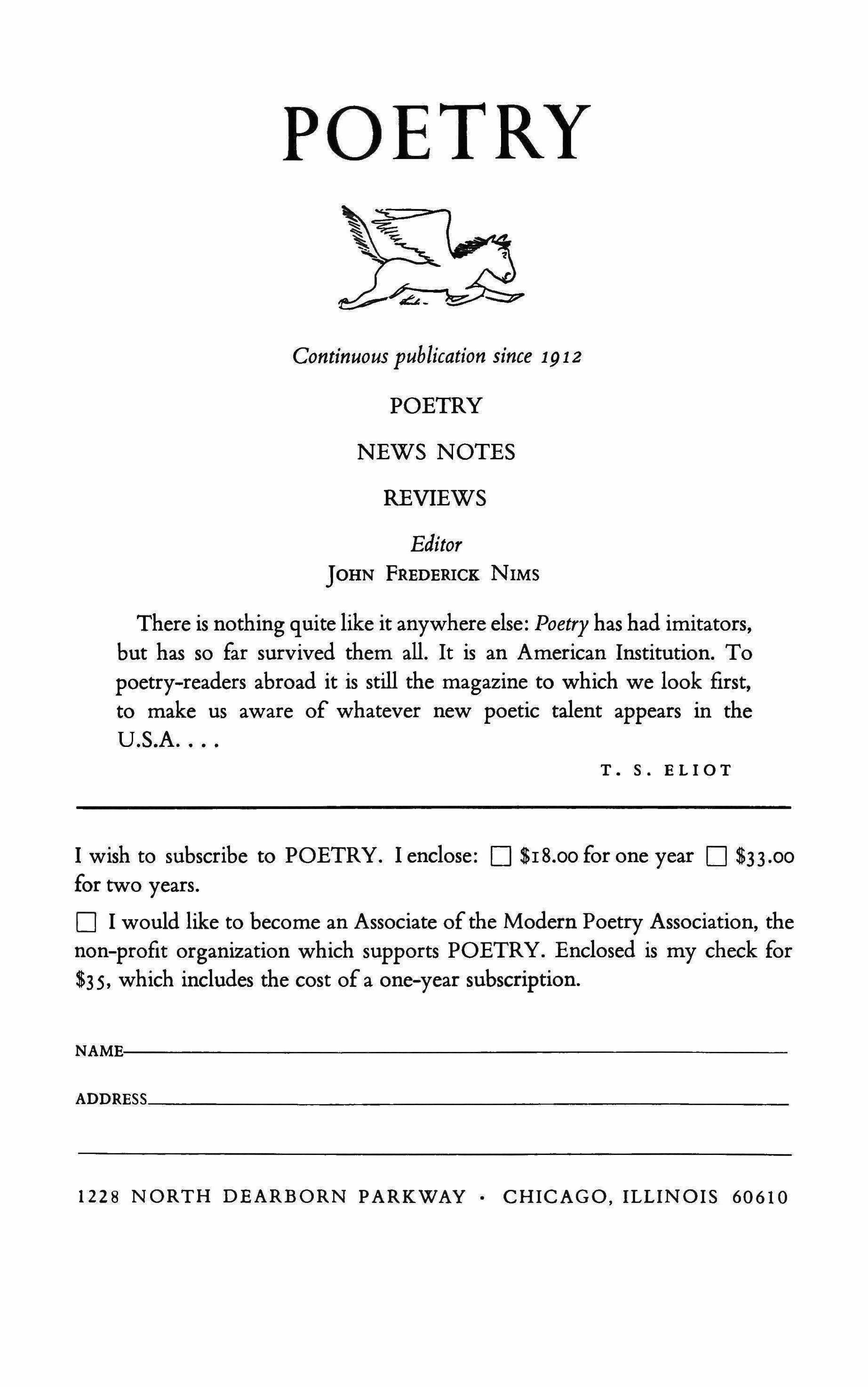
I wish to subscribe to POETRY. I enclose: D $18.00 for one year D $33.00 for two years.
D I would like to become an Associate ofthe Modern Poetry Association, the non-profit organization which supports POETRY. Enclosed is my check for $35, which includes the cost of a one-year subscription.
W EST 3 0 T H STREET. NEW YORK. 1 000 1
The American Poetry Series. 17
ROBERT HA55
$7.95 CLOTH

"In our poetry's running fusillade between the visionary recital and the naturalistic view. between Emerson and Thoreau. between Wallace Stevens and William Carlos Williams. Robert Hass seems to me to stand surprisingly and graciously-in the line of fire."
-Richard HowardCUR T I 5 B. BRA D FOR D
$5.95 PAPER
Yeats put his writing through innumerable drafts and changes before publication. From �. massive and almost illegible pile of manuscripts. Bradford collected. transcribed and edited with commentary a large assortment of characteristic poems. A vital book for those interested in Yeats. in modem poetry. and in the creative process itself. A bridged.
Neglected Books of the 20th Century Provence
FORD MADOX FORD
$6.95 PA PER
Ford Madox Ford-author. editor. critic-is recognized as a major figure in twentieth-century literature. In this sometimes philosophical. sometimes reminiscent. and always entertaining book he reflects on literature and history. tradition and culture. food and wine. bullfights and Courts of Love. and compares the life of the Mediterranean countries with that of the industrialized North. First published in 1935 but long out of print. Provence is a delightful. rich. and unforgettable book.
$15.00 C LOT H
This second, revised edition of The Structure of Verse is the most important collection of essays on the art of poetry. The notable contributors include Ezra Pound. I.A. Richards. Robert Graves. Northrup Frye. and Stanley Kunitz. Ranging from theoretical essays on rhyme. meter. and rhythm to T. S. Eliot's reflections on free verse and Theodore Roethke's 'What Do I Like?'; the book is an essential guide and manual for anyone interested in the writing and reading of poetry.
CritialIaqairy, an enterprill tIIat II..,aD poIIible to ratore for Criticism its riPtfuI hoa., naawiy: alltate of perpetual Crisis
Kenneth Burke, dedication of"A Critical Load
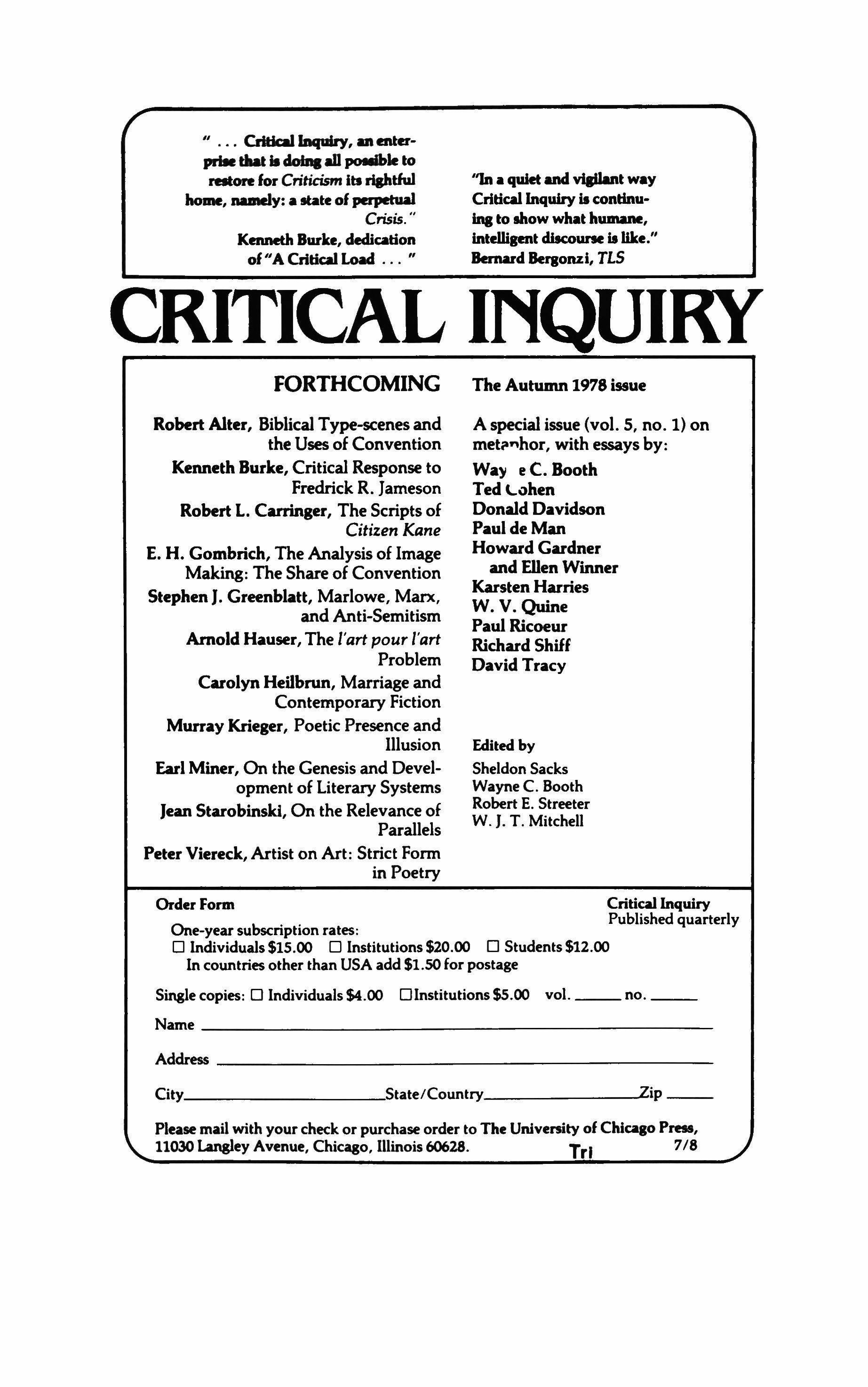
"In a quiet and viplant way Critical Inquiry is continuina to show what humane, inteUipnt discourte is like."
Bernard 8erRonzi, TLS
Robert Alter, Biblical Type-scenes and the Uses of Convention
Kenneth Burke, Critical Response to Fredrick R. Jameson
Robert L. Carringer, The Scripts of Citizen Kane
E. H. Gombrich, The Analysis of Image Making: The Share of Convention
Stephen J. Greenblatt, Marlowe, Marx, and Anti-Semitism
Arnold Hauser, The tart pour tart Problem
Carolyn Heilbrun, Marriage and Contemporary Fiction
Murray Krieger, Poetic Presence and Illusion
Earl Miner, On the Genesis and Development of Literary Systems
Jean Starobinski, On the Relevance of Parallels
Peter Viereck, Artist on Art: Strict Form in Poetry
The Autumn 1978 issue
A special issue (vol. 5, no. 1) on met .,hor, with essays by: Wa� e C. Booth
TedL"hen
Donald Davidson
Paul de Man
Howard Gardner and Ellen Winner
Karsten Harries
W. V. Quine
Paul Ricoeur
Richard Shiff
David Tracy
Edited by
Sheldon Sacks
Wayne C. Booth
Robert E. Streeter
W. J. T. Mitchell
Name
Ad�
"8orges is a world writer, because he knows all the rules and knows how and when to break them. His literary life has been a long struggle to liberate the word, to give it a new vitality in an age when it is constantly under attack. He is a magician of language, but like all the best tricksters and po'ets he makes us feel when the trick is revealed and the poem is said, that it was always there, somewhere unexpressed within us" (Frank Macshane, in "Borges the Craftsman").
Originally published as a special issue of Tri-Quarterly magazine, Prose for Borges is a collection of tributes, criticisms, and commentary on the Latin American author who has become so important to American readers. The essays explore the nature of Borges' art, his place in the literary history of the Americas, and the important themes and symbols of his writings. A collection of photos and an interview with his sister, Norah Borges, provide a personal glimpse of Borges and recount his family history.
Contributors to Prose for Borges include: Richard Howard, Mary Kinzie, Ronald Christ, Nestor Ibarra, Alastair Reid, Emir Rodriguez Monegal, R. H. W. Dillard, Humberto M. Rasi, Adolfo Bioy Casares, Kenneth Fields, Jaime Alazraki, Ben Belitt, Anthony Kerrigan, John C. Murchison, Robert Alter, John Wright, Alexander Coleman, Frank Macshane, Carter Wheelock, Victoria Ocampo, John Hollander, and Norman Thomas di Giovanni.
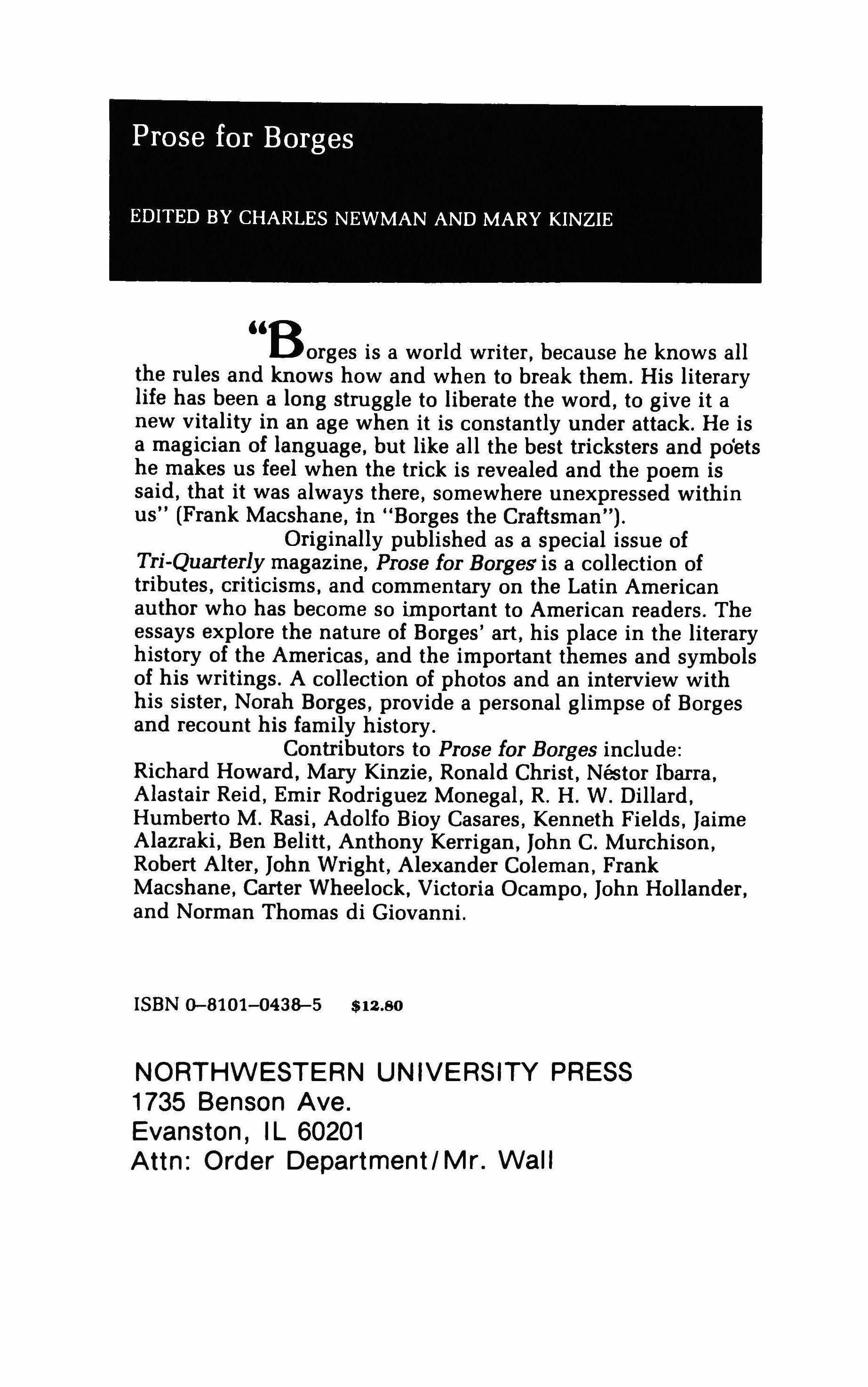
ISBN 0-8101-0438-5 $12.80
NORTHWESTERN UNIVERSITY PRESS 1735 Benson Ave. Evanston, I L 60201
Attn: Order Departmentl Mr. Wall
The 1978 collections are published in cloth at $7.95 and in
paperback at $3.95 each. Order them from your bookseller or from the University of Illinois Press.
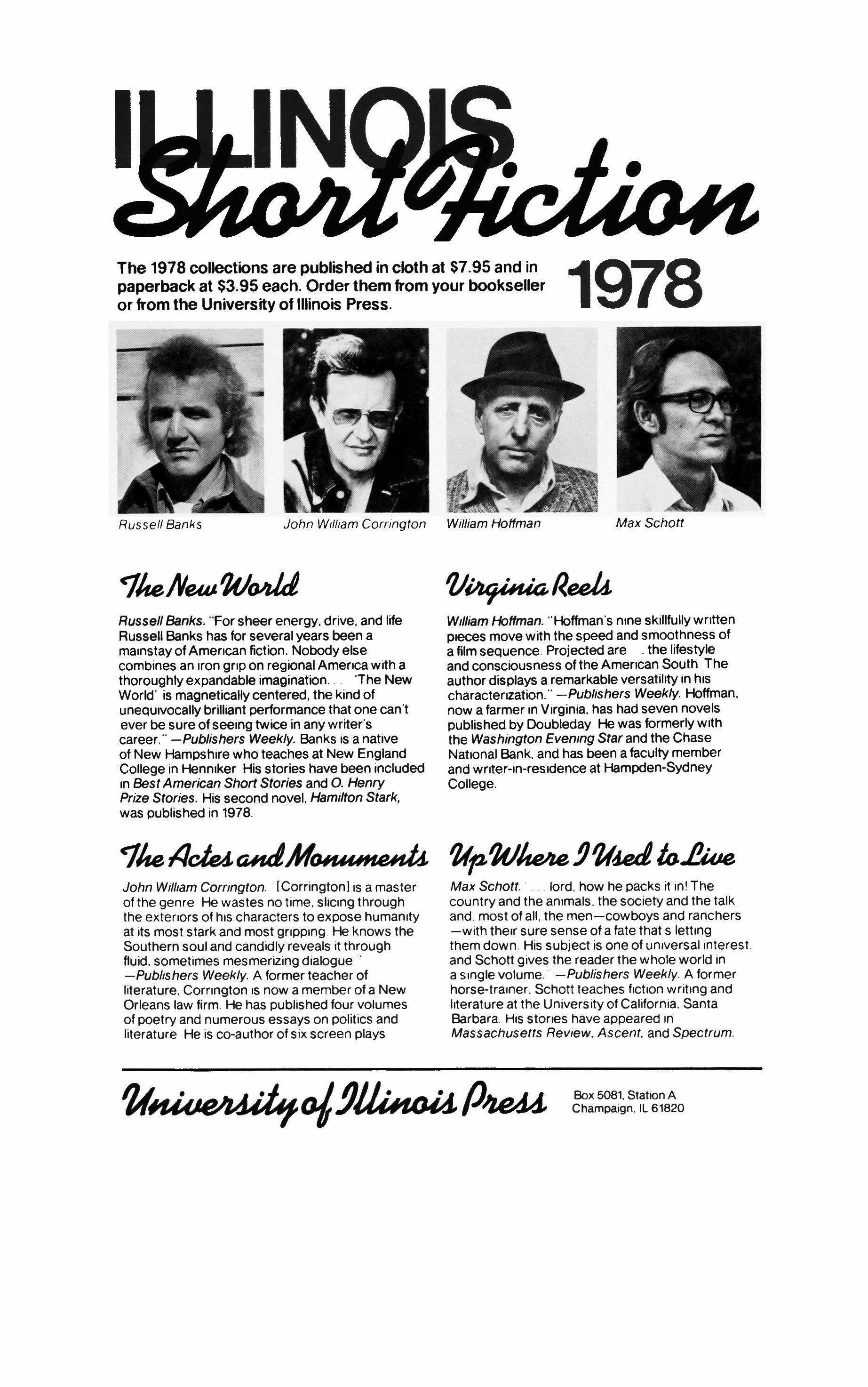
Russell Banks. "For sheer energy. drive. and life Russell Banks has for several years been a mainstay of American fiction. Nobody else combines an Iron grip on regional America with a thoroughly expandable imagination. 'The New World' is magneticallycentered. the kind of unequivocally brilliant performance that one can't ever be sure ofseeing twice in any writer's career." -Publishers Weekly. Banks IS a native of New Hampshire who teaches at New England College In Henniker His stories have been included In Best American Short Stories and O. Henry Prize Stories. His second novel. Hamiffon Stark, was published in 1978.
John Wi/llam Corrington. 'ICornnqtonl is a master of the genre He wastes no time. sliCing through the extenors of rus characters to expose humanity at ItS most stark and most gripping. He knows the Southern soul and candidly reveals It through fluid. sometimes mesmerizing dialogue =Pubhsners Weekly. A former teacher of literature. COrrington IS now a member of a New Orleans law firm. He has published four volumes of poetry and numerous essays on politics and literature He is co-author of six screen plays
William Hoffman. "Hoffman's nine skillfully written pieces move with the speed and smoothness of a film sequence. Projected are the lifestyle and consciousness of the American South The author displays a remarkable versatility In hiS characterization." -Publishers Weekly. Hoffman. now a farmer In Virginia. has had seven novels published by Doubleday. He was formerly with the Washington Evenmg Star and the Chase National Bank. and has been a faculty member and wnter-m-residence at Hampden-Sydney College.
Max Schott. lord. how he packs it Inl The country and the animals. the society and the talk and. most of all. the men-cowboys and ranchers -With their sure sense of a fate that s letting them down. His subject is one of universal Interest. and Schott gives the reader the whole world in a Single volume. -Publishers Weekly. A former horse-trainer. Schott teaches ncnon writing and literature at the uruversitv of California. Santa Barbara HIS stories have appeared In Massachusetts Review. Ascent. and Spectrum.
Box 5081. Station A Champaign. IL 61820
